Legend of the Five Rings: First Edition by Traveller
It's not Japan okay
Original SA postLegend of the Five Rings First Edition
It's not Japan okay
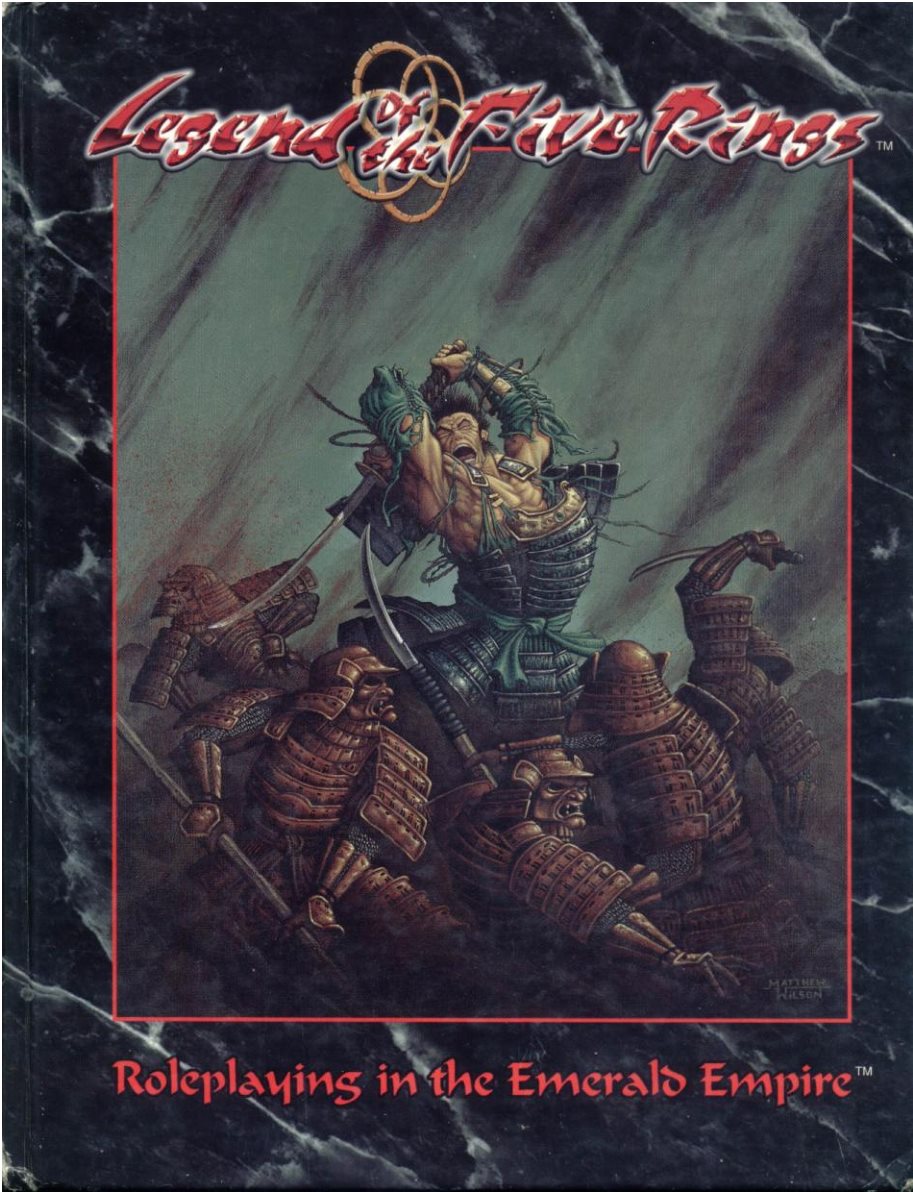
So '90s you'd think this was an Image comic cover
Oh, shit! It's 1997, a new CCG is rising up to face against Magic the Gathering, and it's all about high flying samurai fantasy action. And then they made an RPG about it, who would've thought? Legend of the Five Rings is one of the better known samurai fantasy RPGs, set in the land of Rokugan. The samurai clans of the Emerald Empire vie for supremacy, in the battlefield and in the courts, while unspeakable enemies plot in the shadows and gather their forces in the blasted lands south of the Empire. AEG's flagship product, L5R was the jumpoff point for many elfgame writers, among them the controversial John Wick himself. The things we'll see! But to be fair, Wick alone did not write up the whole game and setting. In fact...
the man himself after the credits posted:
Without these folks, this would have been a diceless game with five Traits I would have never paid attention to, a bunch of Skills I wouldn't keep track of and a 350 page Book of Void. Just mentioning them here doesn't do justice to the work they did to make sure this book came right.
Those who stand alone, fall alone.
Thank you, thank you. Thank you all.
- JW
So, yeah. Anyway!
Once we get past the mandatory "what is an RPG?" section, we get a crash pronouncing guide for Rokuganese, the language of Rokugan. It's "based" on Japanese, as much as a McBurger is "based" on a burger. There's a glossary of Rokuganese words and phrases so that you can sound kawaii as hell. "Abunai!" "Hayaku!" "Doro Teikoku no Hito!" That is supposed to mean 'Imperial Road', by the way. Long story short: Rokuganese is really, really bad Japanese, to the point of cringe. It was 1997, but still. But to the actual game!
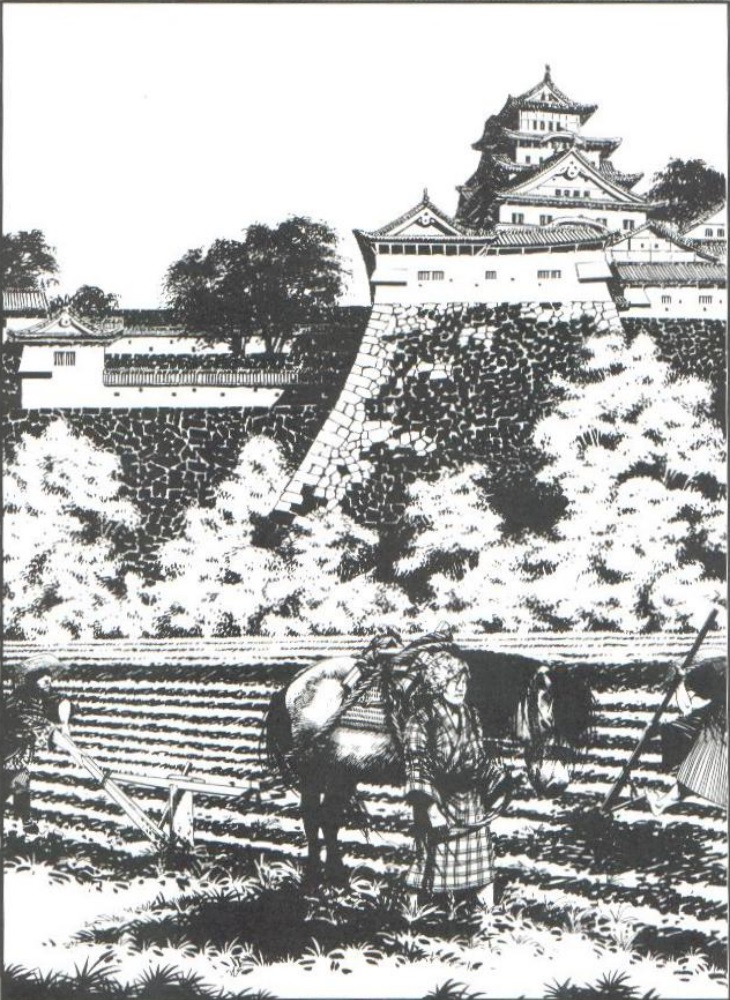
Just fucking with you, this is the Hârnmaster Japan sourcebook.
The first chapter, the Book of Earth, deals with the setting. And as expected, we are treated to the wonders of RPG fiction. It is a cold, rainy night, and a ne'er-do-well called Ginawa is playing dice at a roadside inn with other samurai and merchants. He seems to have a grim past, but right now he's more concerned about making a big score. And he does! There's some grumbling from the audience, but they cough up the money. Just as Ginawa bids everyone good night, a drunk samurai tries to stop him and get him to play until he recoups all his losses. To make it worse, he's armed even though all samurai are supposed to leave their weapons at the entrance. The drunkard calls Ginawa a coward, which gets our guy somewhat miffed - enough to stop his clumsy sword blow and break his arm over his leg. Though drunk, the samurai remembers not to cry in pain. The police in the form of a squad of armored and armed samurai arrive, Ginawa tries to explain he was just defending himself, but turns out the drunkard was actually the local magistrate! The samurai politely ask him to come along, and he is revealed to be a ronin, a masterless samurai. Leaving some money for the innkeeper to pay for a priest to purify the blood he has shed, he goes along to meet the local daimyo (lord), Ataka. There is some talk between them, and the daimyo decides to replace the useless magistrate for a more capable subordinate, Hijiko - the leader of the samurai that took Ginawa in. She is now his head magistrate, which leaves a post that Ginawa, with his skills could easily fill. He feels misgivings about it, since he has failed a master once already, but Ataka is having none of it. Ginawa accepts, but when he reveals his name everyone but the daimyo become very, very anxious about him. See, Ginawa is the carrier of one of the spooky-as-shit Iuchiban blades, forged by the BLOOD SPEAKERS! Ataka still lets him in, because he
Mythology time! Or history. Might as well be the same, I mean, it is a fantasy game. In the time before time, Nothing created the world through fear of being alone, desire for companionship, and regret at actually creating the world (the three Original Sins). After that, three gods that cannot be named (because they gave up their names) created one man and one woman to give shape to the world.This couple started naming things, and named each other: Lord Moon and Lady Sun. As they named the world and all that it contained, a race called the Naga became the world's first civilization. They went to sleep when Lord Moon, who chased Lady Sun across the skies, caught up with her. Nine months later, she gave him nine children: Hida, Doji, Togashi, Akodo, Shiba, Bayushi, Shinjo, Fu Leng and Hantei. In a very Greek twist, Lord Moon decided the children of the Sun and the Moon would grow to be greater than he, and he decided to eat them all. Lady Sun could not stop him, and cried tears that fell to the earth, but got him drunk and replaced the last child, Hantei, with a rock. For years (maybe centuries) Hantei trained in secret under Lady Sun to fight his father. He challenged him, cut up his brothers and sisters from his belly and won, but they fell to the earth. Fu Leng fell away from them along with one of Lord Moon's hands, and in his panic he dragged Hantei down with him, away from Heaven.

Aw, look at lil' Fu Leng with that tiny skull on his clothes

Hantei and his remaining siblings, the Kami, were no longer gods, but not mortals either. Where the blood of Lord Moon and the tears of Lady Sun gathered together, they formed people, men and women. The celestial children gathered them and decided to teach them the beginnings of civilization itself. They also held a grand tournament to decide who would lead them: all the siblings fought except Togashi, who saw what would happen. The last duel was between Akodo and Hantei; the latter won, the former swore eternal loyalty, and Togashi made a prophecy that when the last Akodo fell, so would the last Hantei. The newly enthroned Emperor and his siblings created several Clans according to their wishes and abilities, and spread across the land - but suddenly, an army of foul creatures fell upon the fledgling Empire. Fu Leng was back, and he had been corrupted by crashing so hard in the earth he fell underground. The armies of the Empire could not fight back the nightmarish hordes, and everything seemed lost until one little man, Shinsei, told Hantei he could defeat his brother. At first he did not believe him, but the little man proved to be incredibly wise. Shiba's transcription of Hantei's talks with Shinsei became the Tao of Shinsei, one of the cornerstornes of Rokugani religion. The wise man required seven mortal warriors to journey with him to Fu Leng's realm: they would be the first samurai, a word that means "servant." So they went, one from each Clan, and nothing was heard from them until suddenly Fu Leng's army lost its strength and the Empire's forces crushed them. Only one samurai returned, however: it was the Scorpion samurai, dying and clutching twelve scrolls and an enchanted obsidian hand.
A thousand of years have passed. The Kami passed away in various forms, leaving the business of running the Empire to their children. There are now seven Great Clans for each of the Kami, along with a number of Minor Clans created as reward for heroic acts of lesser samurai. They are the Crab (brave and brutish), Crane (cultured and urbane), Dragon (mysterious and isolated), Lion (brave and honorable), Phoenix (philosophical and pacifist), Scorpion (sneaky and stabby) and the Unicorn (outgoing and foreign).
Geography! Rokugan is rocky and mountainous, surrounded by mountain ranges on three sides and the ocean to the east. Only a fifth of the land is flat, the rest is various flavors of hills, valleys and mountains. The climate goes from cold and snow-heavy winters to sultry, long summers. Disasters like earthquakes and tsunami are regular. Its society is very regimented and class-conscious, and the common belief is that everyone has their place and bad things happen to those that try to cheat their destiny. As can be presumed, the Emperor is at the top of the chain, and under it there are many daimyo that swear fealty to him and rule in his name. The samurai caste is the highest of them all, and the only one allowed to carry katana and wakizashi, symbols of nobility. Those are further divided into the Emperor at the top, clan daimyo, family daimyo regular samurai, non-fighting samurai caste people. and masterless ronin. Below them there's the heimin, the 'half-people'. Again they are subdivided: peasants at the top, craftsmen in the middle, merchant in the lowest rung. Samurai can kill a heimin if they feel their honor has been compromised by their rudeness, so heimin try to be very obsequious to samurai. Under them there's the hinin, the 'non-people.' This includes criminals, entertainers and gamblers as well as the eta, the undercaste that deals with labor considered physically and spiritually unclean like leather working or disposing of human corpses. Killing hinin is not a crime for samurai, but killing particular hinin (like a samurai's favorite geisha) may carry other consequences.
(note: you probably shouldn't use words like 'heimin' or 'eta' around actual Japanese people.)
Women can belong to any of these castes, but their roles are slightly different. Those who take up arms are known as samurai-ko, and they must take vows of celibacy since they can't serve both their husband and their daimyo.
 Which doesn't meant they don't take lovers but it's scandalous enough to send them to a nunnery if they're caught. Marriages are all arranged and romance doesn't come into it, but it bears noting that the wife is the one that actually runs the house; the husband receives a stipend from his wife but it is the woman that actually handles their finances. A man's extramarital affairs are ignored by society, but samurai are expected to be discreet so that they don't insult their wives' families. A samurai's schooling begins early, taking up around nine years of their childhood. At around 13 to 20 years, they undergo their
gempukku ceremony to become legal adults. They're considered young until the age of 20, then 'middle-aged' until 40, at which age they're supposed to go into a monastery and retire from public life. Many samurai scoff at that, and even officially retired 'monks' usually stay behind as powers behind the throne and such. The ultimate test of courage for a samurai is
seppuku, ritual suicide, and the game warns that it should not be taken lightly in games. Peasant lives are less complicated, but they also have to deal with all the bullshit that comes with being of lower station, including punishing taxes and such. Rokugan's favorite food is rice, along with fish, seafood and vegetables. Red meat is looked down on, and nobility believes it makes them smell dirty. Usual clothing includes the kimono robe, usually including a samurai's clan colors and their
mon (heraldic device).
Which doesn't meant they don't take lovers but it's scandalous enough to send them to a nunnery if they're caught. Marriages are all arranged and romance doesn't come into it, but it bears noting that the wife is the one that actually runs the house; the husband receives a stipend from his wife but it is the woman that actually handles their finances. A man's extramarital affairs are ignored by society, but samurai are expected to be discreet so that they don't insult their wives' families. A samurai's schooling begins early, taking up around nine years of their childhood. At around 13 to 20 years, they undergo their
gempukku ceremony to become legal adults. They're considered young until the age of 20, then 'middle-aged' until 40, at which age they're supposed to go into a monastery and retire from public life. Many samurai scoff at that, and even officially retired 'monks' usually stay behind as powers behind the throne and such. The ultimate test of courage for a samurai is
seppuku, ritual suicide, and the game warns that it should not be taken lightly in games. Peasant lives are less complicated, but they also have to deal with all the bullshit that comes with being of lower station, including punishing taxes and such. Rokugan's favorite food is rice, along with fish, seafood and vegetables. Red meat is looked down on, and nobility believes it makes them smell dirty. Usual clothing includes the kimono robe, usually including a samurai's clan colors and their
mon (heraldic device).
Bushido is the code of the warrior that all samurai (are supposed to) adhere to. It emphasizes virtue, courage, loyalty, sincerity and excellence. Sincerity should be noted as not being the same as honesty: it is the ability to appear honest. Pointing out uncomfortable truths is not honorable because it causes a scene and brings embarrassment to everyone. A samurai's word is still valid, however - if they say they'll do something, they're expected to do it or die trying. Samurai are also expected to avenge insults and crimes against their family: for instance, if one samurai kills another, the deceased's family may appeal to their daimyo to talk to the killer's daimyo and arrange a proper blood feud. The death must be public for the feud to be valid, and once the challenger or the challenged die in this formal duel, the matter is (supposed to be) settled.
A samurai's sword is supposed to be their soul. They're very particular about them: not only are samurai the sole caste that may carry them legally, but disrespecting a sword is akin to disrespecting the samurai's ancestors. Even touching it can be grounds for insult and a duel. Because of all of this, etiquette is very important: people tend to ignore realities rather than embarrass themselves pointing them out. They're super polite to each other even though many people know most samurai are punks that need to be put in their place. Social rituals like gift-giving are very important and formal.
Again with society: the Emperor is at the top, and around him there are the Imperial Families, his blood relatives. These have no actual power, but they have direct access to the Emperor's ear and use it to trade favors and resources with the clans. The Imperial Magistrates are the Emperor's justice, commanded by the Emerald Champion. They do everything from manning way stations in the imperial roads to stopping assassination attempts, solving crimes against the Empire or even fighting Shadowlands raiders. Justice is ruthless, but it only considers direct testimony and confessions. Samurai may be punished with orders to commit seppuku, refusal to accept a seppuku request (forcing the samurai to live in shame) or granting seppuku with a wooden blade (because they're not believed to have the guts to go through with it.) Lesser crimes are punished with everything from public beatings to house arrest. The seven great Clan daimyos or Champions hold the real military power in Rokugan, as well as direct control over the land. They have their own magistrates as well, investigating crime and shady dealings in their provinces and keeping an eye on suspicious regions. Each clan comprises several families, all of which have a daimyo of their own. A samurai swears fealty to their family, the family swears it to their Clan Champion, and they swear it to the Emperor.
The chapter ends with a quick review of the rules. L5R is a d10 dicepool-based system called Roll and Keep. Rolls are usually made against a Target Number (say, 15), and a player rolls a number of dice and gets to keep some of them to try and meet or beat the TN. That's for Simple rolls; Contested rolls when one character tries to stop another from doing a thing are done against a relevant stat x 5 as the TN. If one makes the roll and the other fails, that's it: if both succeed, the highest roller wins, and if neither do the contest carries on. Players may also deliberately Raise their TNs by 5. Each Raise brings a better effect, like more damage in a weapon strike. Usually, rolls are of the Trait + Skill type, where you roll as many dice as points in the relevant trait and skill you have and keep as many as trait points you have. Dice that roll a 10 explode: you keep them, and roll them again.
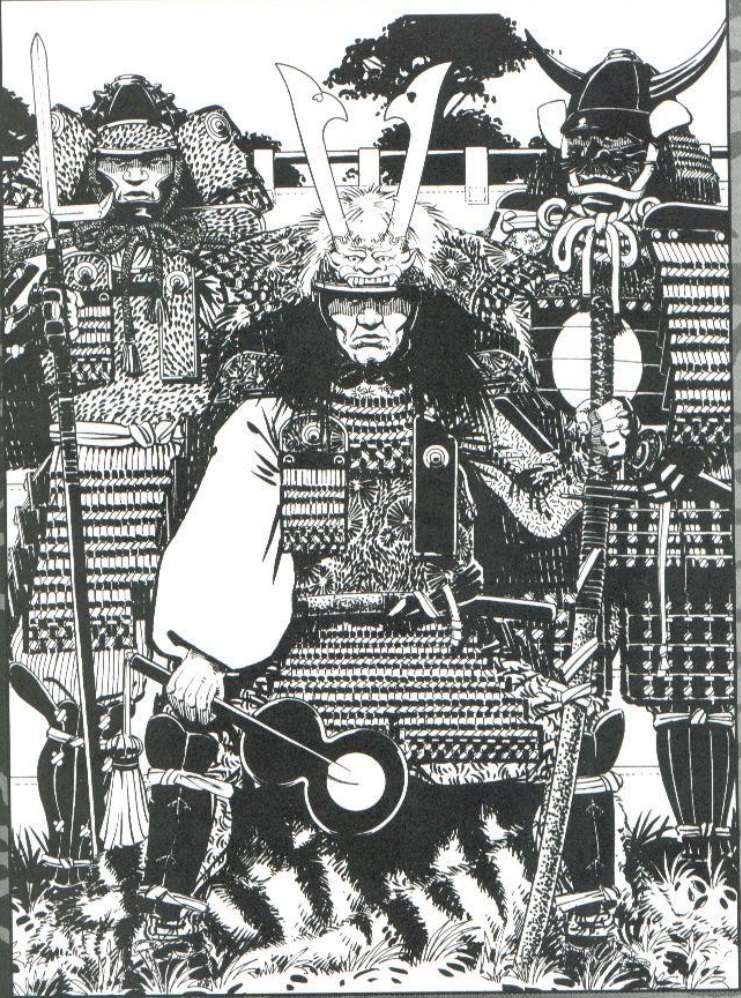
Roll your Swag + Style, keep everything

Next: highborn PCs, jury's out on whether they're doomed, murderous or manchildren
Dark Secret: Likes Elfgames Unironically
Original SA post Legend of the Five Rings First EditionDark Secret: Likes Elfgames Unironically
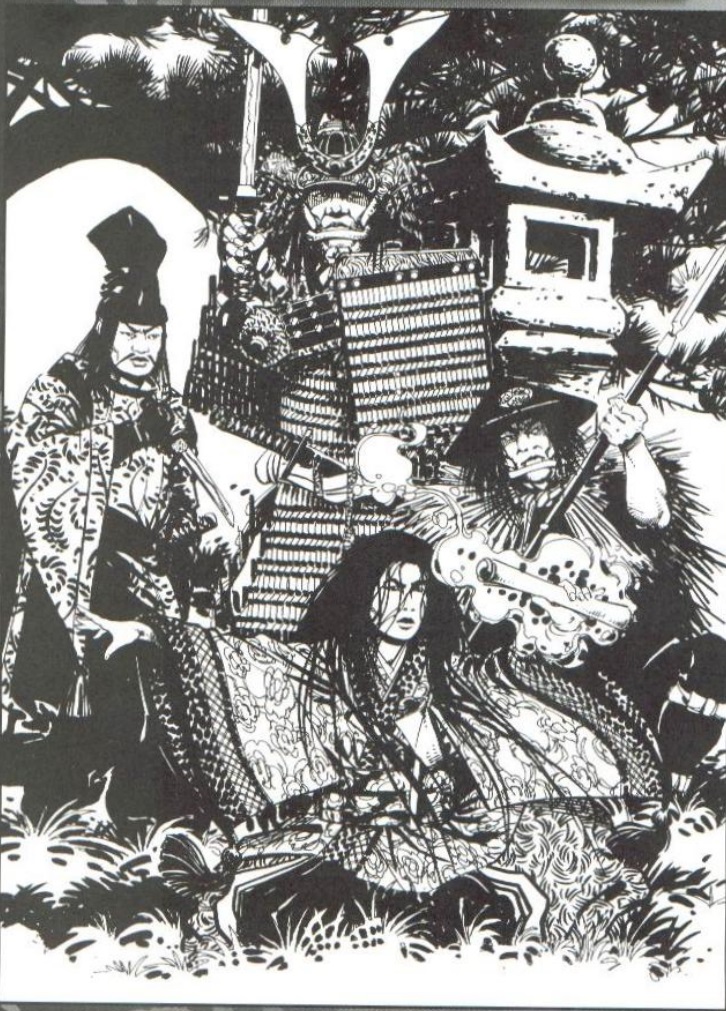
I think you're supposed to protect the geeky wizard instead of hiding behind him, guys.
The second chapter, the Book of Water, is dedicated to character generation. What's that? You want more RPG FICTION? You got it! Ginawa rides with Hijiko. They're on a mission, and she doesn't appreciate his lack of manners. He's rubbing his belly after a good meal! Perhaps his skill is as dull as his manners. Ginawa takes the hint and they stop to engage in a mock duel with a couple of sticks. It's over quickly, and Hijiko smugs a little because she had him beat. Ginawa knows it's true (she made him overcompensate more than necessary) , but he doesn't want to show it. He grumbles and jumps a little when she catches him talking to himself - only ninja skulk about! Hijiko laughs: everyone knows ninja are peasant superstitions, but Ginawa has seen them. Hijiko asks when... Ginawa replies that it was the night his lord was killed. Foot well stuck in mouth, Hijiko tries to apologize, but Ginawa brushes it off. He has nightmares that night that keep him up and clutching his sword like a PTSD-ing veteran. Later, they meet the Scorpion magistrates they're supposed to meet: the Lion and the Crane are about to engage in a battle and both the Scorpions and Ataka (a Lion himself) want to know how it'll play out. Ginawa is rude to them, the Scorpions aren't too hot on him either, and Hijiko alternates between pulling rank on Ginawa and keeping from laughing at his antics. Travel papers are shown, they agree to ride together. Ginawa notes that Hijiko doesn't like them either, but she just muses that they gain nothing by fucking them over. This is when Ginawa tells the story of the frog and the scorpion: a scorpion asks a frog for a ride across a river, the frog refuses because the scorpion will poison him, the scorpion is like "lol no" and the frog is like "lol ok" and of course the scorpion stings the frog midway and dooms them both. It's in their nature.
Scorpions are kinda dicks is what the book is saying.
So, characters! Players should start with a concept before taking pencil to character sheet, to really bring them to life, you know? Characters are more than just some numbers and notes. We get a number of questions to define the concept, from basic stuff like "what clan does the character belong to" and "are they a bushi or a shugenja" to "are they married? do they have children?" (Note that there are a couple of matriarchal families in Rokugan, the Matsu and Otaku, where the usual wife-husband roles are reversed) and "what do their parents think of them?" We also get notes on samurai archetypes: brash, noble, courtier, reluctant, rogue, scholar. This is just fluff so far, no hard numbers or anything. Names are made up according to what sounds "easy" or "fun" to pronounce from a list of syllables. It's Rokugan, not Japan!
The numbers show up now. Each character is defined by five Rings. They are Earth, Water, Fire, Air and Void. The first four have Traits attached to them. Earth has Stamina and Willpower, Water has Strength and Perception, Fire has Agility and Intelligence, and Air has Reflexes and Awareness. These are all rated from 1 to 5; a Ring's value is the least of its Traits. Void has no traits, and it's sort of an ur-Ring that encompasses them all. Characters have a reserve of Void Points that can be used to enhance rolls or power certain techniques. Characters also have Skills, stuff they know how to do. A character picks a Clan, a Family within the Clan and a School where the character trained to become a bushi (fighter) or shugenja (spellcaster/vaguely defined priest). Note that you don't have to attend a school just because it has your family's name on it (so you can have Kuni bushi or Kakita shugenja, for instance) Each School has different techniques, starting Techniques and gear, and other attributes. Characters get 25 Character Points to distribute between their traits and skills, as well as purchasing Advantages. Of course, this is a '90s game so there have to be Disadvantages you can get for more sweet Character Points, though you can only get a maximum of 10 extra points from Disadvantages. Skills can be raised up to a maximum of two ranks at chargen (so max skill rating starting out is 3 for school skills and 2 for the rest) at a cost of 1 CP per skill point, while traits are raised at 8 CP per rank and 12 to raise the Void Ring. Characters have Wounds, which serve to show how much damage they can take before going down. Wounds have levels, and each level equals Earth x 2 Wound points. As you go down in levels your character takes more and more penalties to their dice rolls until they're Down, Out or Dead. A '90s game with a death spiral? Perish the thought.
Furthermore, characters have Honor. No, not talking about that other honor. Honor is rated from 0 to 5. At high Honor ranks, characters become more rigid and inflexible, but also more noble and trustworthy and viceversa. A character's starting Honor depends on their Clan and school, and usually goes from 1 to 3. Each Honor rank is made of ten Honor points, which are gained or lost depending on the character's actions and deeds. Honor can also be increased with CP or decreased to get extra CP at chargen. Characters also have Insight, a measure of how well known they're in Rokugan, which is the sum of all Rings multiplied by ten plus all their skill points. Their School Rank is how advanced they are in their school's techniques, and they must accumulate more Insight (by increasing Skills and Rings) to progress in their School. When they hit a new Insight rank (Characters will have some 110-130ish starting Insight) at 150 and then every 25 points after, they can go back to their school sensei and
Skills! They have several divisions depending on how honorable or dishonorable they are. High Skills are for noble characters and performing them is honorable. Somehow Acting is a High skill even though we were told actors were hinin before. Oh well! They also comprise stuff like Etiquette, Calligraphy, History, Lore (of various kinds, like Shadowlands Lore or Shugenja Lore), Heraldry, Horsemanship, Investigation, Meditation Music, Poetry and Sincerity (lying your ass off is honorable, see) The Shintao skill must be raised to 3 or more in order to increase Traits past 5, so hit your books if you want to get really swole. Bugei skills are martial ones. All weapons have their own weapon skill except for swords, which all are covered by Kenjutsu. Archery rolls use Reflexes rather than Agility as expected because Rokugani archers use their instinct over barbarian tricks like actually aiming at stuff. There's also things like Battle (how to command and fight as an organized unit), Defense, Jiujutsu (punch a motherfucker) Iaijutsu (the fast draw, used to strike in the first round of combat instead of wasting time pulling your blade out and for formal iaijutsu duels) and "sumai" Wrestling. Merchant skills are not dishonorable, but neither are they honorable. They cover stuff like Craft (of all kinds, though weapon and armor crafting is honorable) Commerce (how to handle money, dishonorable for samurai) and Herbalism. Low skills are dishonorable. Forgery, Gambling, Poison, Seduction, Stealth, Torture. Don't get caught using these. While some skills have clear methods of use (Meditation is one hour of concentration and a TN20 roll to recover all Void Points) many don't, even stuff like Medicine, Poison or Horsemanship.
Advantages and Disadvantages. Let's see! For good stuff, you can get Absolute Direction (1 point, you never get lost, +2 dice to any rolls to figure out where you are), Blackmail (you have dirt on someone, costs are equal to target's glory rank and one point less for Scorpions, so by RAW you could have dirt on every last peasant and merchant and Scorpions could have dirt on every Glory 1 samurai forever) Different School (5 points, you can take a School outside your clan), Great Destiny (4 points, you have an important destiny and can escape certain death once per story) Inheritance (you get an ancestral item, costs go from 3 to 20! and the exact effects are pure GM fiat
 ) Large (you're huge, 2 points, 1 for Crabs) or True Friend (your NPC friend sticks for you, costs depend on the friend's position and the depth of their devotion). Bad stuff includes
Bad Fortune (1 point, you roll on a table that includes things like 'you lack one item from your starting gear' to 'a very important roll in your future will automatically fail, eat it')
Black Sheep (5 points, your family hates you and treats you as eta and you can't progress in your school beyond Rank 1
) Large (you're huge, 2 points, 1 for Crabs) or True Friend (your NPC friend sticks for you, costs depend on the friend's position and the depth of their devotion). Bad stuff includes
Bad Fortune (1 point, you roll on a table that includes things like 'you lack one item from your starting gear' to 'a very important roll in your future will automatically fail, eat it')
Black Sheep (5 points, your family hates you and treats you as eta and you can't progress in your school beyond Rank 1
 ),
Chemical Dependency (3 points you're addicted to something, like alcohol or opium),
Dark Secret (5 points, there's some seppuku-worthy shit in your past that someone might just dig up)
Haunted (an ancestor ghost spooks you, costs depend on how often they show up in a story)
Social Disadvantage (3 points, you lose 1 Glory rank each time you take this, ronin must have at least 3 points of Social Disadvantage) or True Love (3 points, you're in love and when you have to choose between your ~*true love*~ and your Clan you have to spend a Void Point to do so and if you lose your love's favor you can't spend Void Points at all until you get it back)
),
Chemical Dependency (3 points you're addicted to something, like alcohol or opium),
Dark Secret (5 points, there's some seppuku-worthy shit in your past that someone might just dig up)
Haunted (an ancestor ghost spooks you, costs depend on how often they show up in a story)
Social Disadvantage (3 points, you lose 1 Glory rank each time you take this, ronin must have at least 3 points of Social Disadvantage) or True Love (3 points, you're in love and when you have to choose between your ~*true love*~ and your Clan you have to spend a Void Point to do so and if you lose your love's favor you can't spend Void Points at all until you get it back)
And now, the Clans! A neat thing about the clan pages is that they're in color and they summarize the character generation rules, so you can create a character with less page flipping. In true '90s fashion, we also get stereotypes of what Clans think of the others. How exciting!
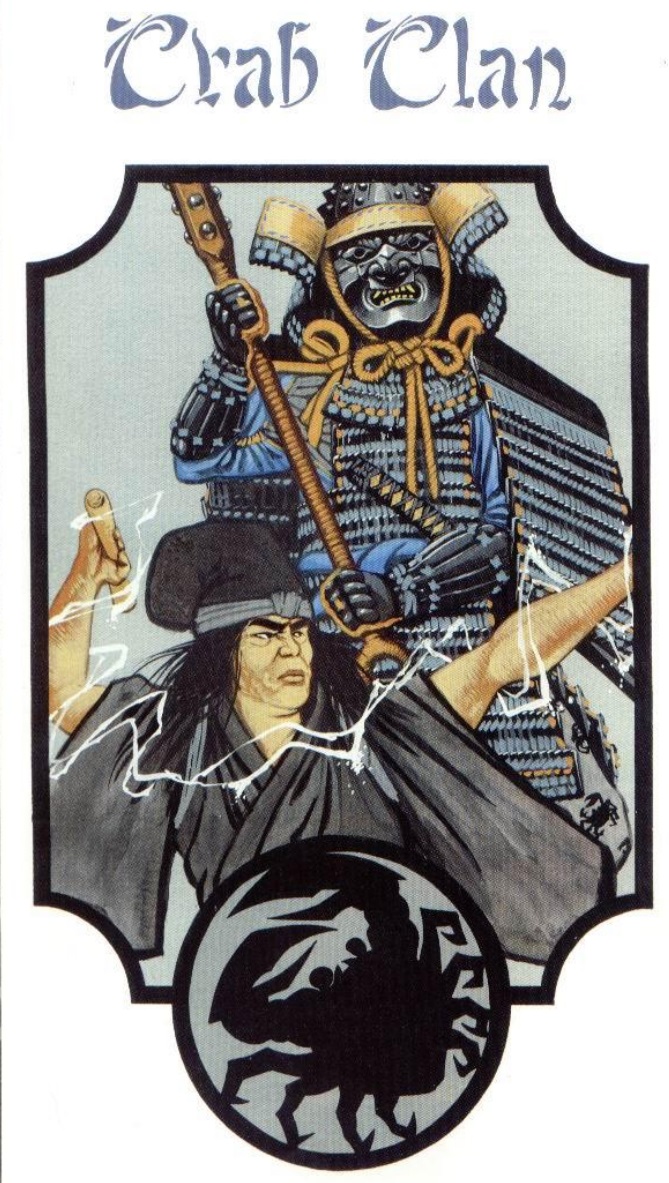
The Crab Clan lives in the southwest corner of the Empire, facing Fu Leng's Shadowlands for a thousand years. They are used to fighting under terrible conditions against foes that outnumber them three to one. They believe in honesty over sincerity, which doesn't make them many friends in Rokugan's courts, and they loathe being lied to. As far as they are concerned, the strong rule over the weak: the first Hantei beat the first Hida so they owe fealty, but if a Hida could take the throne from a Hantei they would do so without hesitation. The families of the Crab are the Hida (+1 Strength), the main family of the Clan; the Kuni (+1 Intelligence), the sinister-looking shugenja family; and the Yasuki (+1 Awareness), politicians and merchants that serve as the Crab's diplomats and link to the outside world. The Yasuki used to be a Crane family, but they shifted loyalties around the time of the first Crane-Crab war and the Crane hate them for it.
The Crab's shugenja school is the Kuni school. +1 to Willpower, starting Honor 1.5, they get a free Raise to Earth spells. Their skills are Calligraphy, Defense, Kenjutsu, Meditation, Shadowlands Lore, any one High skill and any one weapon skill. Their beginning spells are Sense, Commune, Summon, 3 Earth spells, 2 Fire spells and 1 Water spell.
Their bushi school is the Hida school (+1 Stamina, starting Honor 1.5). Its skills are Archery, Battle, Defense, Jiujutsu, Kenjutsu, Shadowlands Lore and Tetsubo.
- Rank 1: the bushi adds Earth to the total of their attack and damage rolls, and they can use heavy armor without penalties.
- Rank 2: Once a day, they may spend one Void Point to make a TN 20 Earth roll that negates all damage from a single blow.
- Rank 3: the bushi gets two attacks per turn.
- Rank 4: the bushi may sacrifice 3 Wound points at the beginning of a turn to keep an additional die in attack and damage rolls.
- Rank 5: the bushi can spend a Void point each turn and make a single action even if they are Down, Out or Dead.
The
 est dudes.
est dudes.
Stereotypes posted:
Crane: They exploit the favor system to the extreme, to the point of ridiculousness. They rely on those favors and the Emperor's graces to save them from destruction.
Dragon: Who knows anything about the Dragon? They remain hidden away in their mountain keeps and 'contemplate truth.' Send one of their samurai out with me to the Shadowlands and I'll show him truth.
Lion: It is the Lion whom we respect most. Their courage and strength are the reason. They do not claim nobility as the Crane do, but allow their actions to speak for them. However, that does not change the fact that they are all pompous fools.
Phoenix: They may be weak, but they are also willing to acknowledge their weakness. Still, I have seen what a Phoenix shugenja can do, and I would not mind having one on my side the next time the Shadowlands invade.
Scorpion: The Crane relies on favors and the Scorpion relies on secrets. Both are cowards; the Scorpion is just more clever about it.
Unicorn: Theirs is a mighty force to contend with, but they rely too heavily on their speed. We acknowledge the right of the strong, not the lucky.
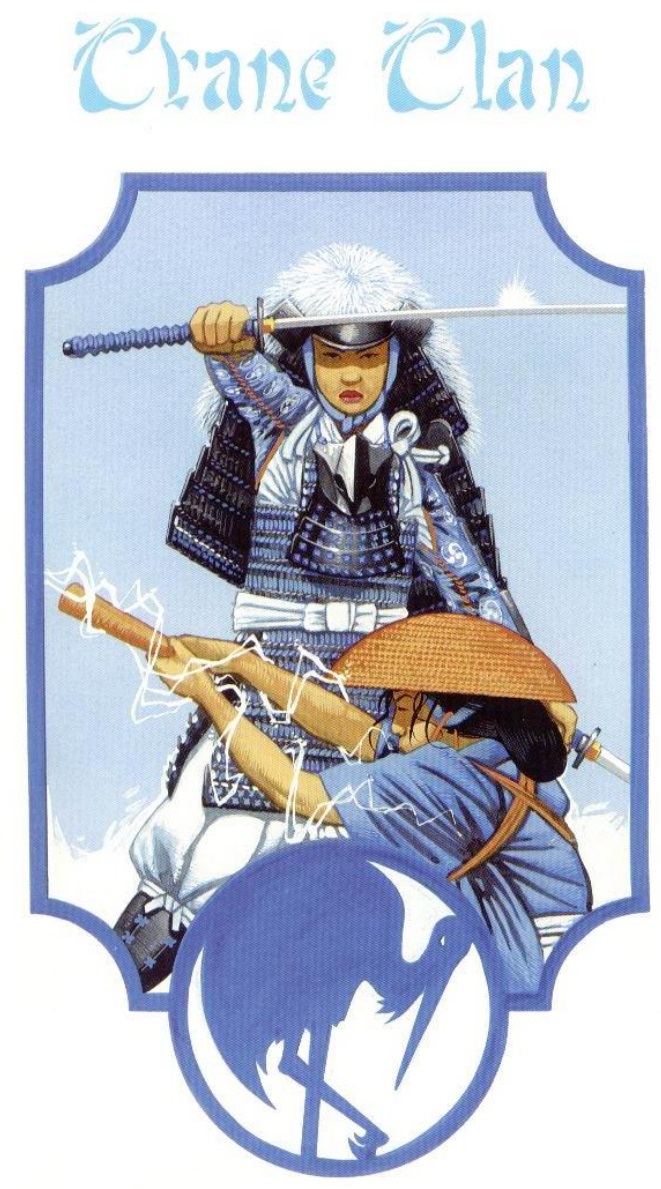
The Crane Clan lives to the east, by the coast. They use political maneuvering to keep their position as advisors to the Emperor. All Emperors marry Crane ladies, so all Emperors have had a Crane as their mother. Many daimyo also have Cranes as their mothers, so the clan can call in favors from almost all clans at any time. They've also attracted the finest swordsmen in the Empire to teach at their dojo, and attending their iaijutsu school is one of the greatest (and most expensive) honors a samurai can get. Their families are the Doji (+1 Awareness), whose leader is Doji Satsume, "probably the most famous warrior-poet of the Empire" and also maybe the guy in the book's cover; the Kakita (+1 Agility), whose fencing school is the most famous of the Empire; and the peaceful Asahina (+1 Perception), formerly a Phoenix family that went to the Crane when a Phoenix shugenja was saved by a Kakita samurai-maiden.
The Crane's shugenja school is the Asahina school. +1 Awareness, 3.5 starting Honor. They get a free raise to Air spells. Their skills are Etiquette, Meditation, Shintao, Calligraphy, and any three High skills. Their beginning spells are Sense, Commune, Summon, 3 Air spells, 2 Earth spells and 1 Water spell.
Their bushi school is the Kakita school (+1 Reflexes, 3.5 starting Honor.) Their skills are Archery, Etiquette, Iaijutsu, Kenjutsu, Sincerity, any High skill, and any High or Bugei skill.
- Rank 1: the bushi adds Iaijutsu to initiative rolls and may use Iaijutsu instead of Kenjutsu.
- Rank 2: the bushi may raise the TN by any value instead of 5 during iaijutsu duels.
- Rank 3: the bushi may spend more than one Void Point in iaijutsu duels.
- Rank 4: the bushi may attack twice per turn.
- Rank 5: before initiative is rolled, the bushi may make a Void vs Void roll with their opponent. If the bushi wins, they may attack them with a TN of 5.
The
 est dudes.
est dudes.
Stereotypes posted:
Crab: There is more to bushido than swordplay. Their strength and courage is admirable, but their lack of respect for civilization is their downfall. A stubborn, arrogant and uneducated brute you must pacify with a pretty wife: that is a Crab.
Dragon: I would not pretend to understand their ways. All I know of the Dragon is their devotion to mysteries and their tattoos. We are seldom able to procure favors from the Dragon, for they are reluctant to step outside their monastic temples.
Lion: The Lion are our most dangerous rivals. They despise us for our position and how we gained it. Their lack of skill in the court has not improved their position at all, and neither has their hot headed pride.
Phoenix: Of all the other Clans, we respect them most of all. They are a civilized Clan who understands the necessity of our ways. Never lose favor with the Phoenix, for the knowledge of a single shugenja can be worth more than a thousand samurai.
Scorpion: Our most brilliant foe. There is nothing more convincing than the smile of a Scorpion. Once they discover your secrets, you will never be free from their manipulations.
Unicorn: Their distance from us is unfortunate for there is much we can gain from them. They have only returned to the Empire in the past two hundred years, and are eager for allies in our uncertain Empire. Any man who is eager for allies owns something you can gain.
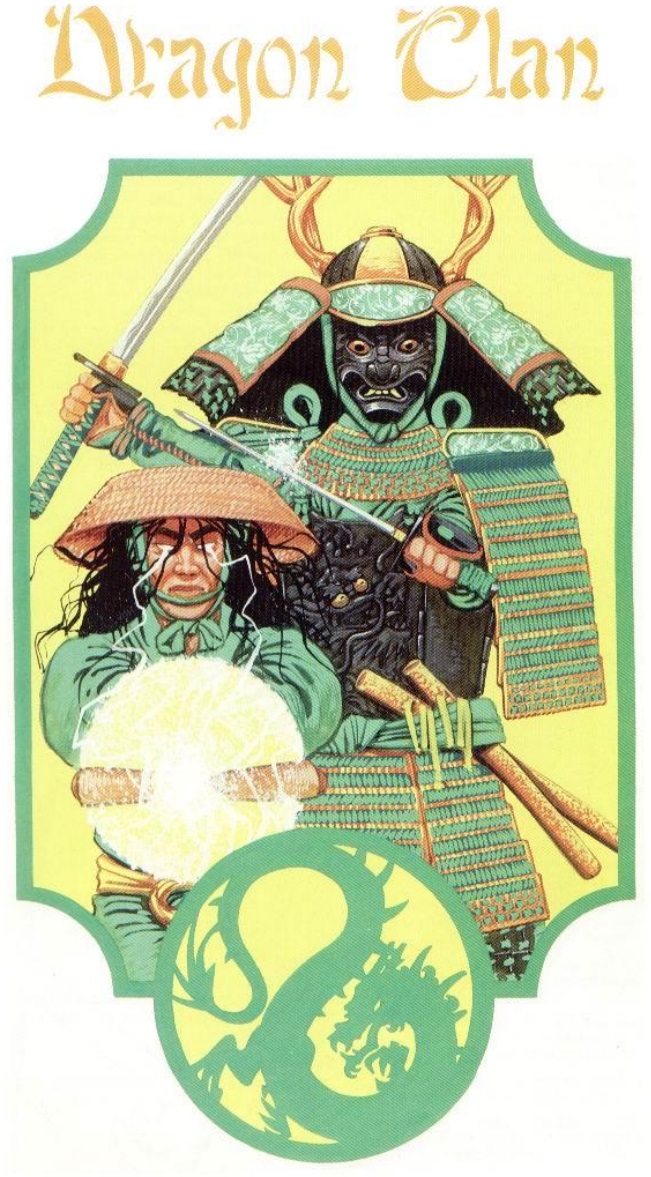
The Dragon Clan lives up north in the mountains. Togashi retired to those mountains a thousand years ago and it wasn't until three samurai joined him in the mountains that the Dragon Clan was born. Everything since then is just speculation. There are rumored to be many secret orders in the clan, one of which - the ise zumi tattooed monks - is part of Rokugan's popular culture, with fanciful stories about monks that fly in the air, shift their shapes and breathe fire. Their shugenja have unexplained powers, but other shugenja claim that they do not understand the basic points of magic. Their bushi schools teaches how to fight with both wakizashi and katana, and while Kakita practitioners scoff at the thought they do so to rep their school instead of actually lacking respect for the Dragon technique. Their families are the Togashi (+1 Agility), ruled by the mysterious Togashi Yokuni and home to the ise zumi order; the Mirumoto (+1 any Trait), known for their adaptability; and the Agasha (+1 Awareness), the most "traditional" of the Dragon families.
Their shugenja school is the Agasha school. +1 any Trait, 2.5 starting Honor. They get a free Raise to Fire spells. Their skills are Shintao, History, Calligraphy, Meditation and any High or Bugei skill. Their beginning spells are Sense, Commune, Summon, 3 Fire spells, 2 Earth spells and 1 Air spell.
Their bushi school is the Mirumoto school (+1 any Trait, 2.5 starting Honor) Their skills are Archery, Defense, Kenjutsu, Meditation, Shugenja Lore, any one High or Bugei skill.
- Rank 1: the bushi gets +5 to their TN to be hit as long as they're wielding both katana and wakizashi.
- Rank 2: the bushi gets 2 attacks per turn.
- Rank 3: the bushi can spend a Void point to give a spell targeting them a free Raise, or to increase their TN in 5.
- Rank 4: if the bushi kills an opponent with an attack, it does not count as one of their attacks this round and may attack again immediately.
- Rank 5: the bushi gets 3 attacks per turn.
The
 est dudes.
est dudes.
Stereotypes posted:
Crab: The Crab hides in his shell. The seagull lifts him in the sky and drops him and then eats the crushed remains. The badger turns him over and eats him inside out. His shell is his weakness. If he casts away his weakness, he can use his pincers.
Crane: Relying on the weakness of others is ignoring one's own strengths.
Lion: The Lion is sleepy until roused, and then it is ferocious. If you keep the Lion sleepy, it is of no danger to you, but also reluctant to come to your aid.
Phoenix: They are brothers reborn in the fires of knowledge. We are both seeking the same thing, but our roads are different. Sometimes they cross, however, and then we regain our bearings, learn how close we are and - sometimes - decide to switch paths.
Scorpion: Do not be misled. It is not the pincers that can kill you. It is the tail it keeps hidden behind its back.
Unicorn: They say the sighting of an Unicorn is good luck. Fortune is theirs, but she is a fickle mistress, easily turned against you with baubles and empty praise.
Next: the other clans, and a new and completely inferior character type.
OG Stabbers
Original SA post Legend of the Five Rings First EditionOG Stabbers
I forgot to mention how Experience works. Characters get XP points as they play the game. They're spent in a similar manner to CP, but raising a skill costs as much XP as the new skill rating and a trait costs (new trait rank x 5) Surely nothing can go wrong when CP do not equal XP!
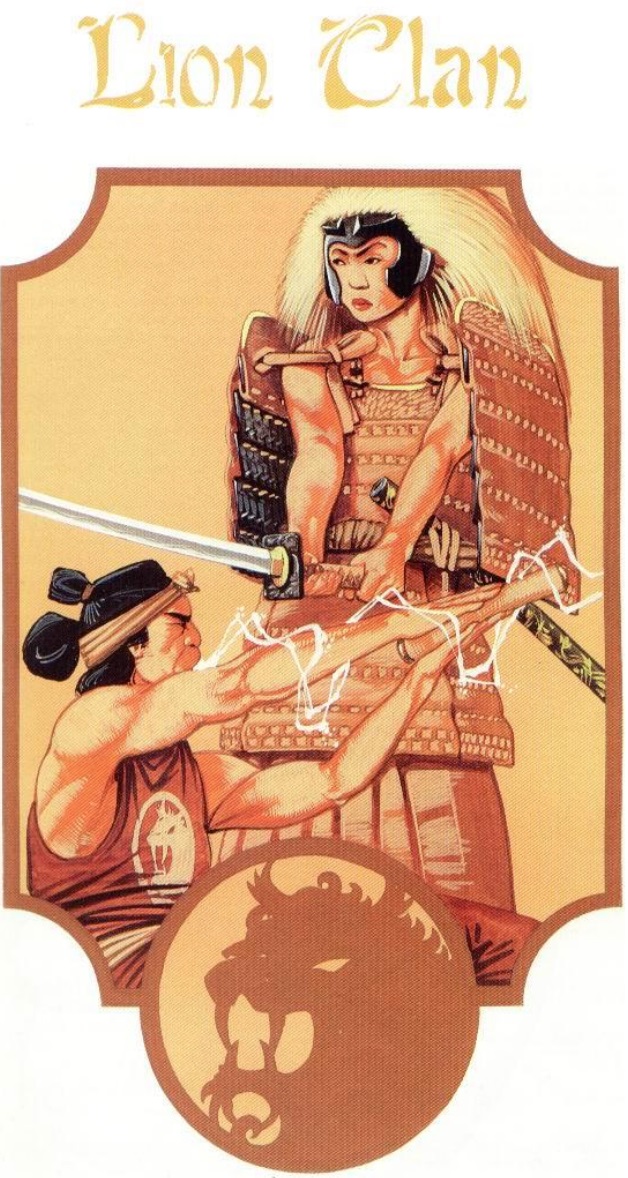
The Lion Clan lives around the center of Rokugan and is the clan of honorable punches (whereas the Crab are the clan of dirty punches). They have the largest army, even larger than the Crab who have to fight Hell on Earth every day. Legends say that Akodo, the Kami of the Lion, chose a warrior called Matsu as his bride instead of a pretty Doji girl. Matsu took the courtship as an insult and dueled him for control of the Clan: it's a famous story, represented in plays and novels, that always ends with Matsu losing to Akodo but not being forced to marry him. Generally the Lion are considered to be sticklers for tradition and o'ld-fashioned, but also the greatest warriors and generals - no army with an Akodo at its head has ever lost a battle, apparently. Their families are the Akodo (+1 Perception), ruled by Akodo Toturi, the greatest strategist of the Empire; the Matsu (+1 Strength), matriarchal and rivals to the Akodo for preeminence in the Clan; and the Kitsu (+1 Intelligence) who don't have a good reputation in shugenja circles due to their old fashioned ways.
Their shugenja school is the Kitsu school. +1 to Intelligence, 3.5 Honor. They get a free raise to Water spells. Their skills are Calligraphy, Etiquette Heraldry, History, meditation, any High skill and any Bugei skill. Their spells are Sense, Commune, Summon, 3 Water spells, 2 Fire spells and 1 Earth spell.
Their bushi school is the Akodo school (+1 to Strength, 3.5 Honor) Their skills are Bard, Battle, Defense, History, Kenjutsu, Archery and any other Noble skill.
- Rank 1: the bushi may ignore the opponent's armor or get a Free Raise for damage or called shots.
- Rank 2: the bushi adds their Honor to their total attack and damage rolls.
- Rank 3: the bushi may attack twice per turn.
- Rank 4: the bushi no longer needs to make Raises for called shots. Still necessary for extra damage, however.
- Rank 5: if the bushi makes Raises in any roll and fails it but beats the original TN, the roll still succeeds without the extra Raises.
The
 est dudes.
what is that yodotai i do not know what you are talking about
est dudes.
what is that yodotai i do not know what you are talking about
Stereotypes posted:
Crab: They are courageous and fearless in their duty, and we owe them much for the protection they have given us. We respect them for their strength and cunning on the battlefield (even if their manners are a bit uncouth), but we do not trust them.
Crane: They are quick to gather their gold and their favors, but are slow to move to the battlefield. If they are so unwilling to part with their money, how unwilling will they be to part with their lives?
Dragon: Like the Crane, they spend too much time in their temples and not enough time learning the ways of the world. If they truly wished to find wisdom, they will come down from their mountains, for they cannot find it up there.
Phoenix: What can be said of the Dragon can doubly be said of the Phoenix. Their samurai are soft, relying on shugenja to support their courage. Distrust any who speak of peace when the battle has already been engaged.
Scorpion: A Scorpion is to be despised, but never underestimated. Trust a Scorpion to betray you, and betray you in such a way that you have no choice of recourse. That is their way, and it is as deadly as any other.
Unicorn: Their horses are mighty and their tactics are sound, but they are not used to our ways. They have spent too long a time away the Empire, and they have much to learn, and we should be the ones who teach them.
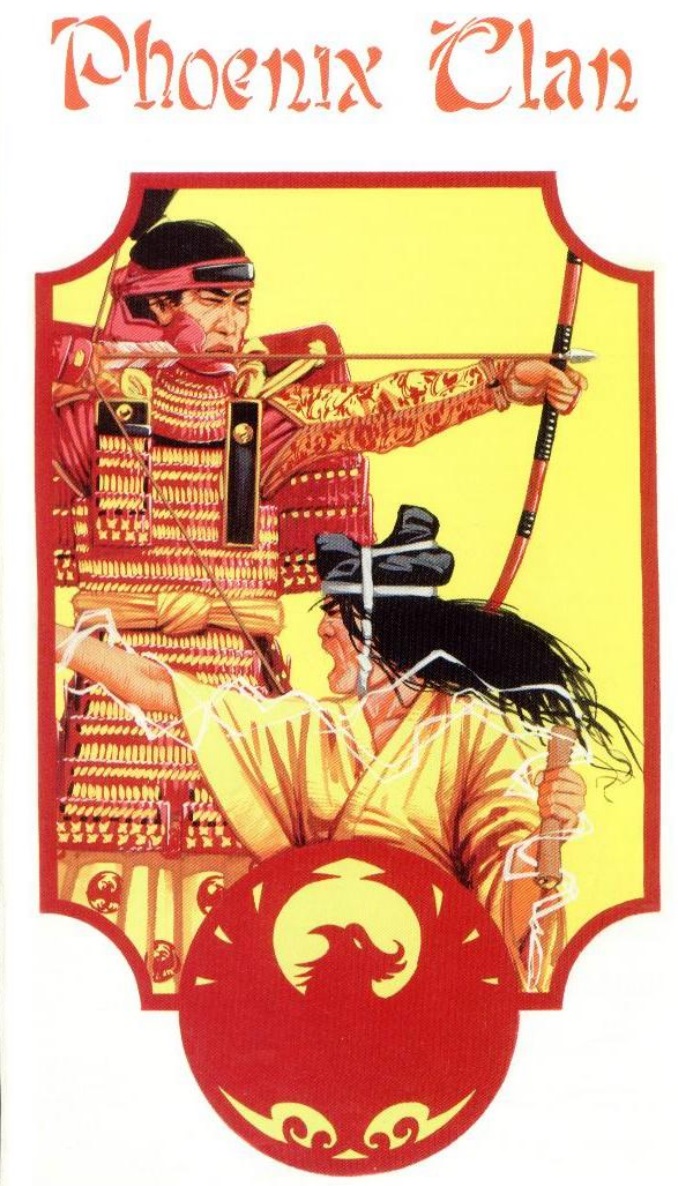
The Phoenix Clan live up northeast, on the opposite end from the Crab and the Shadowlands. The first shugenja were their ancestors, an order of holy men that worshiped and coaxed the Fortunes and lesser kami into creating magical effects. The Kami Shiba brought them together and merged their ways with the Tao of Shinsei, creating the underpinnings of Rokugani philosophy. Only one of the Clan's families has a bushido school; everyone else focuses on shugenja and scholarly studies. They are the least militant of all the Clans and prefer peaceful solutions over everything. It's not like Phoenix bushi are cowards, but Phoenix shugenja (the real leaders of the clan) are reluctant to get drawn into conflict. Their families are the Isawa (+1 Awareness), whose Five Elemental Masters train the most gifted students into the magical arts; the Shiba (+1 Intelligence), who are the Clan Champion's family even though it is the Five Elemental Masters who truly rule the Clan; and the Asako (+1 Perception), the greatest historians of the Empire, though the Lion's Ikoma family may dispute that. Who are the Ikoma and why didn't they show up in the Lion writeup? Buy the relevant clanbook, sucker!
Their shugenja school is the Isawa school. +1 Void, 2.5 Honor. They get a free Raise on Rital spells, and may use any number of Void Points when casting spells. Their skills are Calligraphy, Investigation, Meditation, Shintao, Theology and other two High skills. Their spells are Sense, Commune, Summon, 3 of any Element, 2 of any other Element and 1 of any other Element.
Their bushi school is the Shiba school (+1 Intelligence, 2.5 Honor) Their skills are Tea Ceremony, Defense, Kenjutsu, Meditation, Naginata, Shintao and Archery.
- Rank 1: the bushi may add their Void score to any attack or damage roll. They may also spend up to their Void Point maximum in a single action.
- Rank 2: the bushi may spend a Void Point to increase or reduce the TN of any spell that targets them in 5.
- Rank 3: the bushi may spend a Void Point to gain an extra non-attack action per Round.
- Rank 4: the bushi may attack twice per turn.
- Rank 5: the bushi may spend a Void Point to substitute their Void score for any Trait or Skill until the end of the turn.
The
 est dudes.
est dudes.
Stereotypes posted:
Crab: They perform a necessary duty for the Empire, but that does not make them noble. They would take the Empire if they could, which makes them selfish, brutish and short-sighted. Only together can we survive.
Crane: They also understand that philosophy cannot be practiced during war. Their efforts to keep Rokugan peaceful are admirable, and we should help them whenever we can.
Dragon: Their way is a different way. They know secrets that would take us a lifetime to learn. We have much to gain from an alliance with them, and yet, they are so reluctant...
Lion: We and the Lion serve the same purpose. If only they could recognize that. They see us as weak, but we are not. We must maintain truce with the Lions lest we fall prey to their anger.
Scorpion: They are Masters in their own right. They have learned the rules of society and exploit them to their own means. No other Clan in Rokugan understands the subtleties of power as they do, and that is why we are so much alike.
Unicorn: They are young, brash and foolish. They rely on a single advantage and hope that fortune will carry them the rest of the way. But their strength coupled with our wisdom can prove to be a powerful alliance.
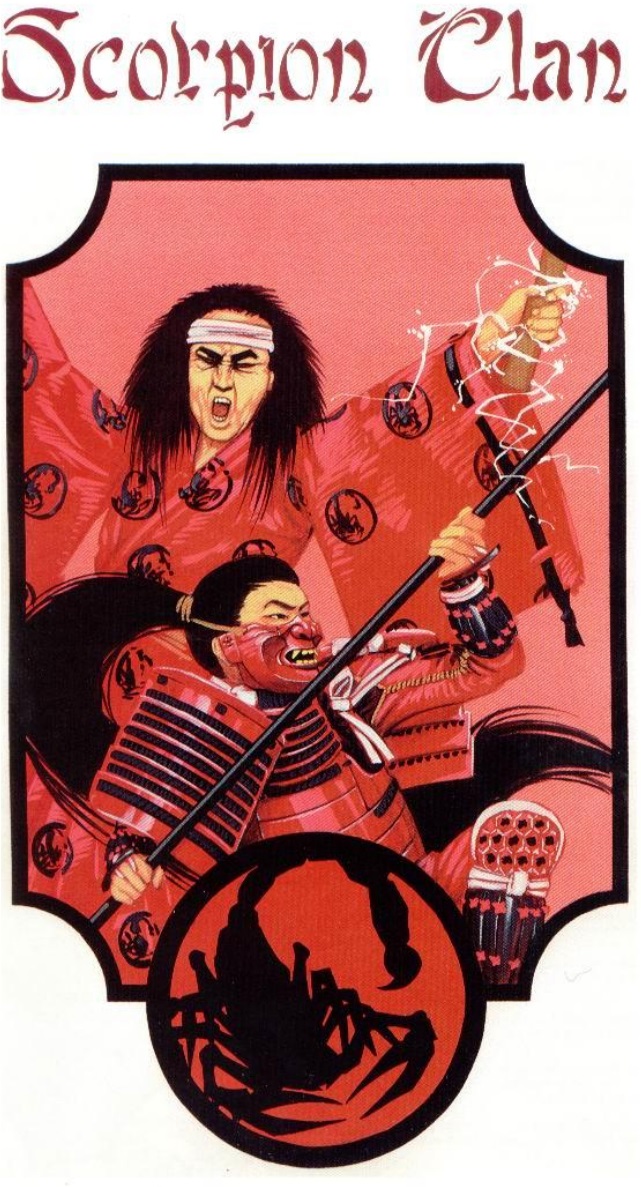
Just look at how that guy is all RAISE THE ROOF
The Scorpion Clan live in a central position, sandwiched between Lion and Crab. They know stuff, secret stuff, and they make sure that you know that they know. That is how they survive: they keep the secrets of others. They don't have the strongest warriors or the most powerful shugenja, so they make do with skullduggery, sneakiness and the odd blackmail attempt or assassination. They have used their own poor fame, combined it with Rokugan's social mores and turned it into a weapon. You can't trust them, but they can be useful to you... A good question is why the other Clans don't just team up to kill the Scorpion. Well, it's
Their shugenja school is the Soshi school. +1 to Awareness, 1.5 Honor. They get a free raise to Air spells. Their skills are Calligraphy, Court or Etiquette, Meditation, Sincerity, Theology or Shintao, and another two High skills. Their spells are Sense, Commune, Summon, plus 3 Air spells, 2 Water spells and 1 Fire spell.
Their bushi school is the Bayushi school (+1 Intelligence, 1.5 Honor) Their skills are Defense, Iaijutsu, Kenjutsu, Stealth, Sincerity, Archery and Poison. Stealth and Poison? But those are Low skills! Dishonorable!
- Rank 1: the bushi rolls two dice for initiative and keeps them both.
- Rank 2: the bushi may feint with an Agility + Kenjutsu skill against the opponent's Reflexes x 5. Success means the opponent's TN to be hit is 5 next round.
- Rank 3: the bushi may disarm their opponent with an Agility + Kenjutsu roll against the opponent's weapon skill x 5. With two Raises, the bushi may keep the weapon.
- Rank 4: the bushi may attack twice per turn.
- Rank 5: the bushi may declare Raises in an attack roll after rolling the dice.
The
 est dudes.
est dudes.
Stereotypes posted:
Crab: The Crab (much like everyone else) would destroy us if they could. They are as ambitious as we are, but are undisciplined and untrained in the arts of subtlety, and that is why they make such excellent allies.
Crane: A Crane is more afraid of shame than any other, and also have many secrets to keep. They hide behind masks as much as we do, but theirs are made of paper and easy to strip away.
Dragon: They are unashamed of what they are, which is why they pose the greatest danger to our plans.
Lion: A Lion is more like a dog than a cat. He is easy to train and quick to dispose of when you have no more need of him.
Phoenix: Like the Dragon, they are difficult to manipulate because of their introspection. You cannot tempt them with greed or flesh, for they love only their precious knowledge.
Unicorn: They are young, strong, fast and naive. Could you ask for a better ally?
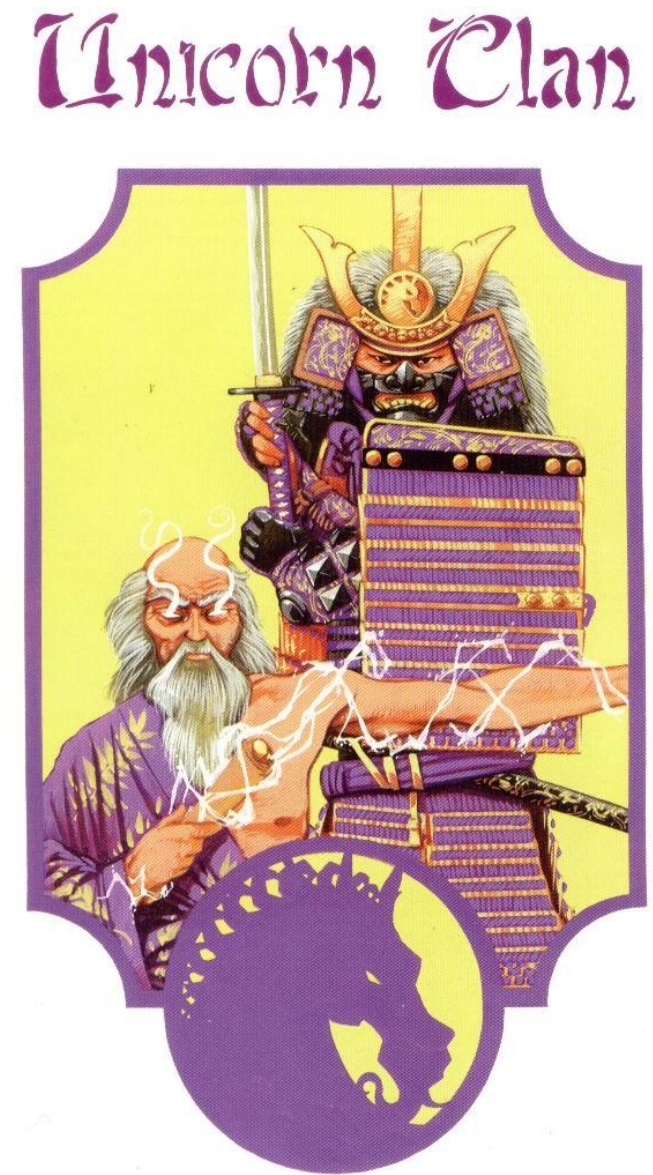
The Unicorn Clan is located northwest, over the Crab. Back in the time of the Kami, Hantei ordered his sister Shinjo and her followers to explore the world beyond the mountains. She took her people and went away for around 800 years. 200 years back, they came back with fabulous wealth, foreign customs and, most importantly, powerful warhorses the likes of which were unknown in Rokugan. They fit their new culture and customs in Rokugan's social fabric, but even now there are still many people who see them as uneducated youngsters at best and foreign barbarians at worst. All Clans can agree, however, that Unicorn cavalry is the best in the Empire. Their families are the Shinjo (+1 Reflexes), ruled by Clan Champion Shinjo "Master of the Four Winds" Yokatsu; the Otaku (+1 Agility), who have much in common with the Matsu family (women in power, swift attacks); and the Iuchi (+1 Awareness), a shugenja family with a lot of foreign tricks unknown in Rokugan at large.
Their shugenja school is the Iuchi school. +1 Perception, 2.5 Honor. They get a Free Raise for Air spells. Their skills are Calligraphy, Hunting, Defense, Horsemanship, Herbalism, Meditation and another Bugei skill. Their spells are Sense, Commune, Summon, 3 Air spells, 2 Fire spells and 1 Earth spell.
Their bushi school is the Shinjo school (+1 Agility, 2.5 Honor) Their skills are Hunting, Defense, Horsemanship 2, Kenjutsu, Naginata and Archery (based on Agility instead of Reflexes)
- Rank 1: The bushi adds their Horsemanship to any skill while mounted. (Tea ceremonies on horseback? Sure!)
- Rank 2: The bushi may 'parry', an unknown ability in Rokugan. When they go Full Defense, their TN to be hit is (Reflexes + Defense + Kenjutsu) x 5.
- Rank 3: The bushi may attack twice per turn.
- Rank 4: If the bushi fails a physical action roll done with Raises while mounted but still beats the original TN, the roll succeeds without Raises.
- Rank 5: The bushi may reroll any roll they make. They must keep the second roll, and they may reroll an already successful roll for a better result.
The
 est dudes.
est dudes.
Stereotypes posted:
Crab: We have much in common with them. Many disdain the crab because the duty they chose makes them 'dirty.' Those who make such judgments must also feel that we are 'dirty.' Remember what Shinsei said: 'Find allies in your enemy's foes.'
Crane: The Crane have welcomed us with open arms since the first day we arrived. They could have done as the Lion has done, but they took the risk of bringing shame to themselves for our sakes, and so we protect their borders from those who would cover their rightful position.
Dragon: They have never been kind to us, but they also have never been cruel. They are just asmuch strangers to Rokugan as we.
Lion: They despise us because we are not like them and envy what we have. If they could they would destroy us and take what they want. They are the enemy of the Crane, and so they are also our enemy.
Phoenix: The Phoenix have acknowledged our rightful place in the Empire, but that is all. They speak to us kindly, as if we were children. If they value knowledge, then they should treat us with more respect, for who else has seen the lands to the North? Certainly not them.
Scorpion: We are told to mistrust them and they tell us not to trust others. Who shall we listen to? Both of them, of course.
Finally, we have Ronin. Who are poor enough that they don't get art. Ronin are samurai that for some reason or other have no family or Clan, and so have no family name. They're considered to be just above non-warrior samurai in the Celestial Order, but generally they have a low reputation. They have no master to answer to but few people will care to teach family arts to a fallen warrior. Ronin can be bushi or shugenja, and there are two kinds. Clan Ronin are former Clan members that lost favor with their Lord. They're made with the regular chargen rules, but must take Social Disadvantage (Ronin) and cannot progress in their school beyond the first rank. True Ronin never had a clan in the first place. They must take the Social Disadvantage as well, but they get 45 CP to make their character. They don't get Family or School trait benefits, however, and can only raise a Skill or Trait up to 3 at chargen just like regular characters. True Ronin bushi have no techniques, while True Ronin shugenja start with Sense, Commune, Summon and 7 spells with a Mastery Level equal to their Ring rank plus one. Their skills are Hunting and any other six skills, and they may use Low skills without losing Honor. They start with 2.5 Honor. Bushi gear is also pretty poor and they get little money, while shugenja gear is average compared to the clan outfits. 45 CP sounds like a lot, but clan samurai get two free trait points, as well as the all-important techniques and a higher social position. And good luck finding new spells as a ronin shugenja!
Point is, Ronin are the
 est dudes. They don't even get stereotypes.
est dudes. They don't even get stereotypes.
Next: DRAMATICAL MURDER
Legend of the Initiative Roll
Original SA post Legend of the Five Rings First EditionLegend of the Initiative Roll
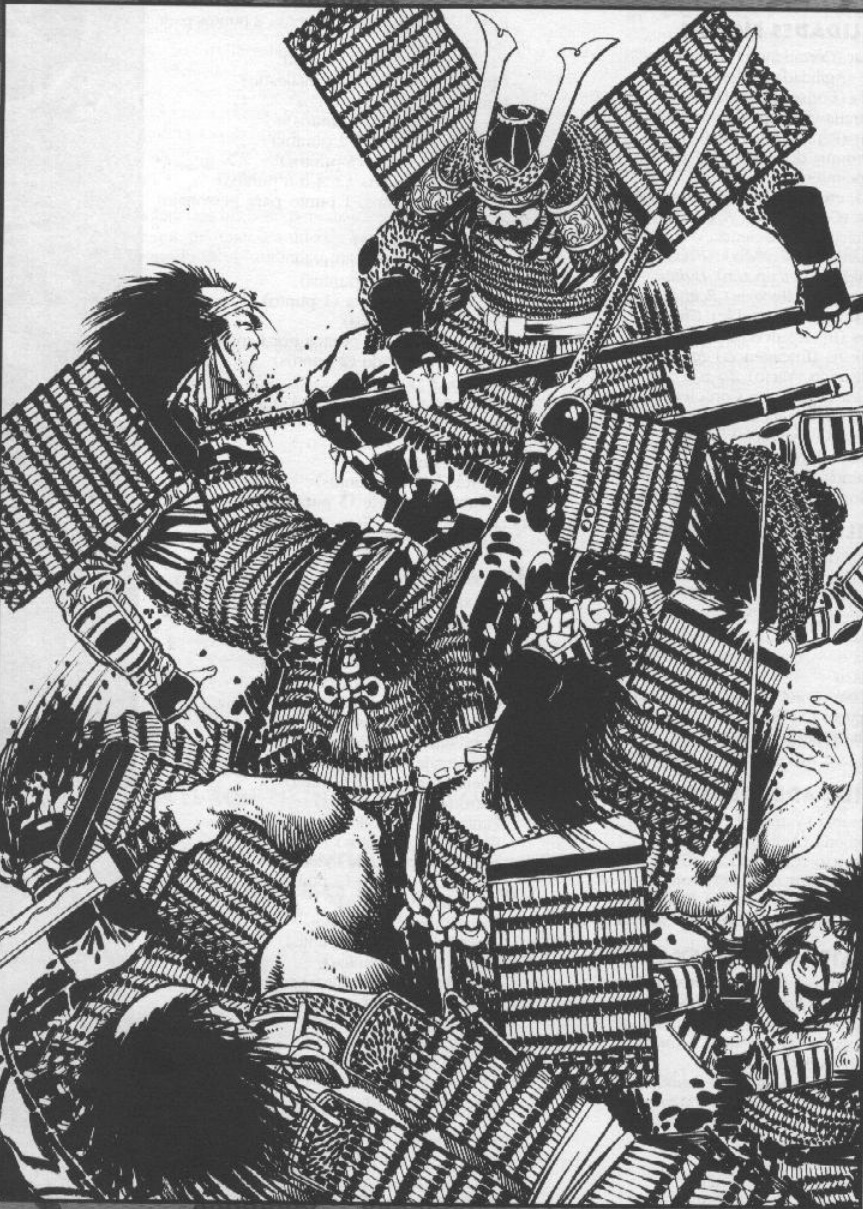
Holy shit the art took a sudden Birthright tour here
It's time for the Book of Fire! That is to say, the main game system chapter. What's that, you can't wait to hear what Ginawa and company are up to? Me neither! Ginawa, Hijiko and their Scorpion companions line up at a vantage point to watch the Lion and the Crane armies about to fight each other. They must be very close or the Matsu general leading the Lion has a very loud voice, because Ginawa can hear his boasting loud and clear! He seems to know things about the Matsu... maybe too much! Anyway, Ginawa helpfully explains to Hijiko the Crane strategy. The Crane general shows up, asks politely that the Lion surrender, the Lion general is "lol no" and the Crane general is "lol u suck" and the Lion general is like "oh now it's on" and they get ready for a duel! Both Hijiko and Ginawa can tell that the Lion is no match for the Crane, and sure enough, the Matsu general is cut down. The battle begins and it looks like the Crane had it... until the Crane general gets an arrow to the throat for his troubles. An arrow fired from somewhere too close, and wouldn't you know - the Scorpions are gone. Ginawa is on the case before Hijiko can stop them, while the battle rages on. The Scorpions were hiding nearby, also watching the battle. They deny any involvement with the death of the Crane, but Ginawa is having none of it. The Scorpions decide to take care of the insolent ronin, Ginawa draws his cursed sword... and things get really, really ugly.
While Skills are associated with certain Traits, it is the system's intent that any skill can be rolled with any trait depending on circumstances. For instance, Stamina + Horsemanship could be used for a long, tiresome ride, or Intelligence + Kenjutsu when the character wants to identify someone's sword technique. All the traits can get some use with all skills, with the possible exception of Strength which is just used in straight Trait rolls or other situations that require raw muscle (like hacking through a guy) In Trait + Skill rolls, normally you roll the sum of both stats and keep the Trait ones. In pure Trait rolls you keep everything. The usual TN for stuff is 15, and while other difficulties are given in multiples of 5 for convenience there's no reason why the GM couldn't call a TN of 14 or 23 for a roll. Raises increase a roll's TN in 5 to cause a greater effect; a character can only make Raises up to their Void rank. A player can call for Raises if they want a specific effect, or the GM can tell them how many Raises it takes to do something particularly hard. A Free Raise gives the benefit of a Raise without actually increasing the TN: these come from school techniques, special circumstances, buffs and so on. Blind Rolls are made when the GM doesn't want to give the TN of a roll or even what roll is being made. However, if the player is not informed of the TN the GM must grant them all the Raises that they could have gotten if they beat the hidden TN. Contested Rolls are made between two characters, rolling against the relevant Trait times five. As mentioned before, the winner is the one that succeeds, or if both succeed the one that makes the most Raises or scores the highest gets a marginal victory. Mutual failure just means the contest carries on. However many dice you get to roll, you can only roll a maximum of ten dice in a single roll. When characters work together, one is chosen as the primary actor and the rest add their Skill ratings to their roll, or give them a single extra dice per helper if the roll only involves a Trait.
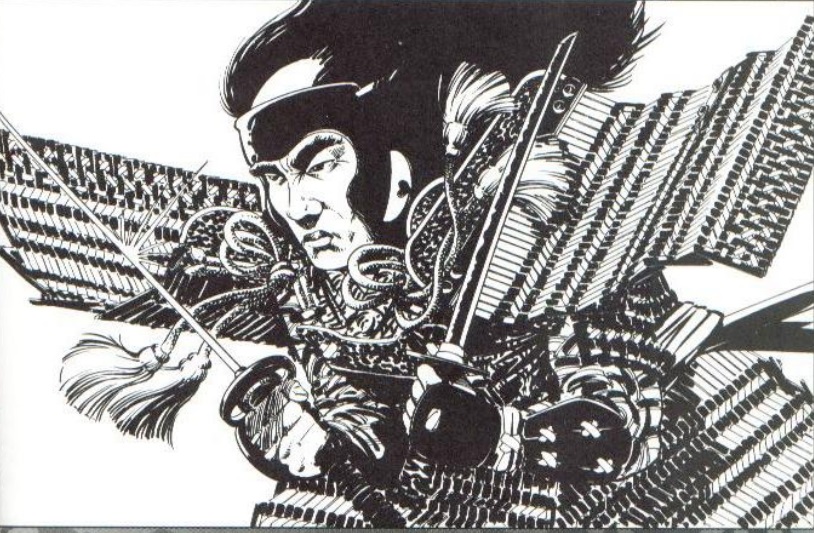
Bwahaha, look at this nerd with huge head and tiny arms
Void! Spending a Void Point raises one of your Traits in 1 for that roll, basically representing a character getting into "the zone" and performing beyond normal capabilities. A character normally can only spend one Void Point per roll. Spending points does not mean the Void rank goes down, though! Void Point are recovered fully at the beginning of an adventure, after a night's sleep, with a TN 20 Meditation roll or a Void + Tea Ceremony roll that recovers 1 point if performed successfully (Tea Ceremonies can be done for more than one people) The game tells us that novices may think high Traits are better than high Skills, but that is not the case! Skills give more dice, so you have more choices about what to keep and ignore, and any of those extra dice could explode. The idea is that characters with wound penalties are more affected if they have less Skills and experience. Sure, okay.
Honor! L5R seems to assume that rolls can be made against PCs to change their mind about stuff, seducing or manipulating them. There's no actual social conflict system. Anyway, when a character is forced to make an action they consider dishonorable, and/or blow the Willpower roll to resist it, they may make a Honor roll as the last resort. They roll their Honor rank against a GM-assigned TN, and if they succeed they resist the temptation and gain one Honor point. If they fail, they lose a whole Honor rank as their confidence in themselves is shaken. Which is a really huge thing for one blown roll, really.
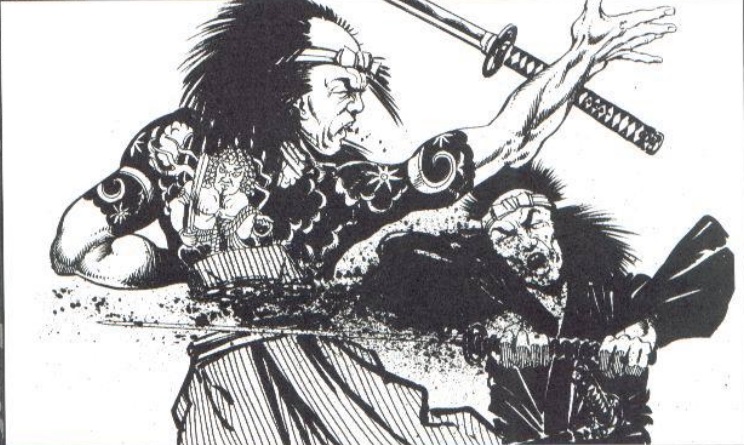
Fucking exploding tens, seriously
Combat! We have two systems for combat here. The first one is Skirmish, for two to around a dozen characters involved. Initiative is rolled as 1d10 + Reflexes. This d10 may also explode. The combatants are ranked from highest to lowest Initiative, and then they declare their actions in reverse order so that faster characters can anticipate slower actions. Each skirmish is broken down into five-second Turns, where each character may attempt one thing. A character may attempt one of the following Maneuvers in a Turn:
- Standard Attack : the character strikes at a foe. Normally the TN to hit someone is their Reflexes x 5, modified by things like armor, combat conditions, etc. Some monsters may have a fixed TN. If they hit, they get to roll for damage. This is usually an Agility + Kenjutsu roll, but not always!
- Full Attack: as Standard Attack, but the character rolls an extra two dice. Their own TN to be hit is 5 until the end of the turn, though!
- Full Defense: the character focuses on staying alive. This can only be done with at least one rank of the Defense skill. The TN to hit a Full Defending character is their Reflexes x 5, but the attacker must drop any dice that roll less than the defender's Reflexes + Defense.
- Ranged Attack: similar to Standard Attack, with possible modifiers for cover and such. Note that most Rokugani archers use Reflexes instead of Agility for their Archery rolls (aiming is literally a foreign Unicorn trick)
- Other Action: miscellaneous stuff. If a character really isn't trying to get out of the way, their TN to be hit is 5.
Once all actions are declared, the GM works through them from highest initiative downwards. Right! Raises in combat can be used for a number of things. Usually they can be used to increase the damage (1 extra damage die), or to perform called shots to hit a particular area of the opponent's body. The exact effects of doing so are left to the GM, as is the number of Raises needed to hit a given area. So you can do things from striking at their arms up to giving them a close moustache shave.

It's Samurai Getting Fucked O'Clock here
Damage! All weapons have a damage rating, expressed as a R&K number. For instance, a katana has a DR of 3k2. You add your Strength to the first number and keep the dice the weapon tells you. Damage from spells, poisons or other sources has a DR that is usually given as a single number, which just means you roll that many dice and keep them all. Getting wounded sucks, as you go down the wound levels. Characters have 0, -1, -2, -3, -4, Down, Out and Dead wound levels, where each level has (Earth x 2) Wounds. When you're wounded, you roll less dice depending on the level you're at (see, going first matters). A Down character can barely crawl and whisper, and the TN to hit them is 5. An Out character is knocked unconscious for as many hours as Wounds they have at this level. To die, a character must completely fill out their Dead level. Healing is slow without magic: after a night's sleep a character recovers their Stamina in Wounds. At the GM's discretion, Down or Out characters may suffer more lasting consequences.
Iaijutsu Duels! These get their own rules. First of all, both duelists make Awareness + Iaijutsu rolls at TN 15. Success lets them know one of the following: their opponent's Agility, Iaijutsu or Void. Raises can be made to learn more. After this roll is made, a duelist may acknowledge defeat. This is honorable, but if the other duelist wants to carry on the duel they must stay or be branded a coward. If the duel continues, the TN to hit a duelist is 5. The character with the highest Reflexes may choose Focus or Strike. If they Focus, they Raise the TN in 5. The other duelist may choose between Focus or Strike as well. Each character may Focus up to their Void rank. Once one chooses Strike, from preference or because they cannot Focus anymore, their opponent attacks rolling against the last TN they bid for. This is Agility + Iaijutsu. If the attacker misses or does not kill the other duelist, then they may strike back, at a TN that should be 5 less than the first attacker's TN. In case of hitting, damage is Strength + Katana DR, plus any Raises due to Focus. If both duelists are still standing after the initial trade of blows, they may continue fighting a regular kenjutsu skirmish, or consider their honor satisfied if it was a first-blood duel or a simple test of skill.
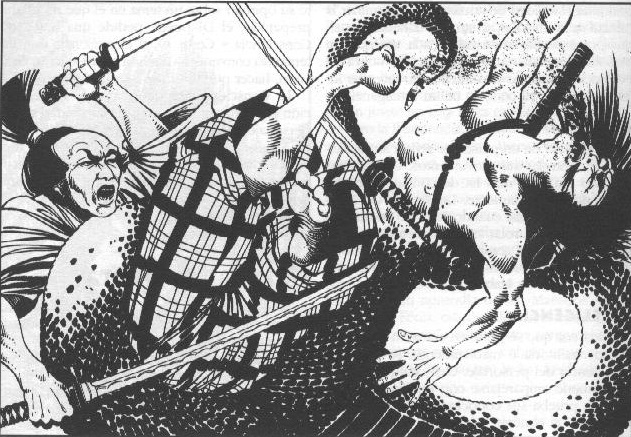
Fuck off snekman, you're not worthy of iaijutsu now smell my foot
Battles are for big mass engagements. The rules for actually handling the mass combat are extremely simplistic (contested Perception + Battle rolls between each side's generals); instead, what the Battle rules are for is to determine individual character's fates. Each Battle round, a character determines where they will be fighting: Reserves, Disengaged, Engaged or Heavily Engaged, from less to more danger. After this declaration is made, the GM determines how the battle is faring for each side (winning, losing, even). Then, each character rolls 1d10 and adds their Water+Battle to this number, and compares it to a table to see how they fared that round. Each result has a number of Wound Dice that the characters automatically take that turn; characters subtract Reflexes + Defense from that number. Wearing heavy armor or being a shugenja also reduces the damage taken. They also score a number of Glory Dice to add to their Glory. Going on the offensive when your side is losing can be very Glorious, and very hard to survive! Staying back where it's safe will get you through the battle, but with little to show for it. A Battle result may also indicate a Duel (an enemy hero sees you and you must engage them in a skirmish - it is possible even to start an iaijutsu duel, because people will leave you two alone to do so so as to not insult either of you) or a Heroic Opportunity (a cool thing happens - maybe you get a shot at the enemy general, ride down the enemy archers, get a chance to rescue an wounded ally (or enemy!) and so on.
Glory! Here we have some lines on how to earn and lose it. Things that score you points: avenging blood feuds, fighting in battles, completing quests, crafting quality weapons and armor, defeating enemies (defeating Shadowlands enemies is less glorious because it is considered unclean) giving and receiving gifts, getting married (the bride gets her Glory raised up to one below her husband, while he gets as many Glory points as his new father in law's Glory rank - marry well, bud!) performing honorable actions, performing well in court, proclaiming romances (care must be taken - you want to be loud in your love and devotion but in a way that doesn't reveal who your love is, because samurai are not supposed to fall in love) and so on. These actions have to be public, however, and they only count when the daimyo acknowledges them and grants Glory to the character. Glory is much easier to lose, and the only real way to completely stop Glory loss is to commit seppuku. Losing Glory does not require the daimyo to acknowledge the actions (the court can gossip well enough alone) but acknowledgement from a superior makes the Glory loss higher. A character may apologize with an Awareness + Sincerity roll versus the lord or offended party's Awareness x 5: this is a ritual apology that involves a lot of crying and kow-towing. Inglorious deeds include: failing to award Glory (imagine that you're a Lion lord that refuses to award Glory to the snooty Kakita bushi that just won your tournament), publicly losing Honor, being reprimanded in public by a superior, losing your composure, breaking a promise, showing cowardice (half of all your Glory if you retreat from combat!), engaging in criminal activity, eating or drinking too much, using Low skills in public, refusing a contest, refusing a lord's request, or being caught committing treason (Glory to 0 and forget about seppuku, buster!)
Finally we get the weapons list. Swords are everything from small aiguchi and tanto to huge no-dachi. Katana and wakizashi are there too: they're good weapons but not the utter best thing. They're also mighty expensive, though you shouldn't need to buy one unless something terrible happens. Polearms roll an additional Initiative die when fighting opponents with shorter weapons. There is the "die tsuchi" (die? Die... wait, like the English word? DAI TSUCHI, FUCKS) warhammer, the iconic naginata, the ono battle axe, and the Crab favorite, the tetsubo. Though some weapons are better than others: the die tsuchi deals the same damage as the tetsubo, 2k2, and both ignore enemy armor, but the tetsubo does not get the polearm initiative bonus for some reason. Plus, the tsuchi is cheaper, I dunno. Bows include the dai-kyu for mounted usage and the yumi when you are on foot. Damage depends on the arrows being used: a regular "ya" arrow deals 2k2 damage, while armor piercing arrows deal 1k2 ignoring enemy armor and "watakusi" (?) flesh cutters deal 3k3 but double the enemy's armor protection. Peasant weapons were developed by monks to help peasants defend themselves against bandits and drunk samurai. They include martial arts staples like the bo, the nunchaku and the tonfa. Super cheap, but it's shameful for samurai to use them. Armor is super simple: there is light armor that adds +5 to the TN to be hit, and heavy armor that adds +10 to the TN but also increases the TN of any physical action in 5. It is not bought, the clan gives armor to their samurai and replaces it when damaged. Shugenja are not supposed to wear armor, since they are not bushi, but some still do and risk offending some bushi because of it.
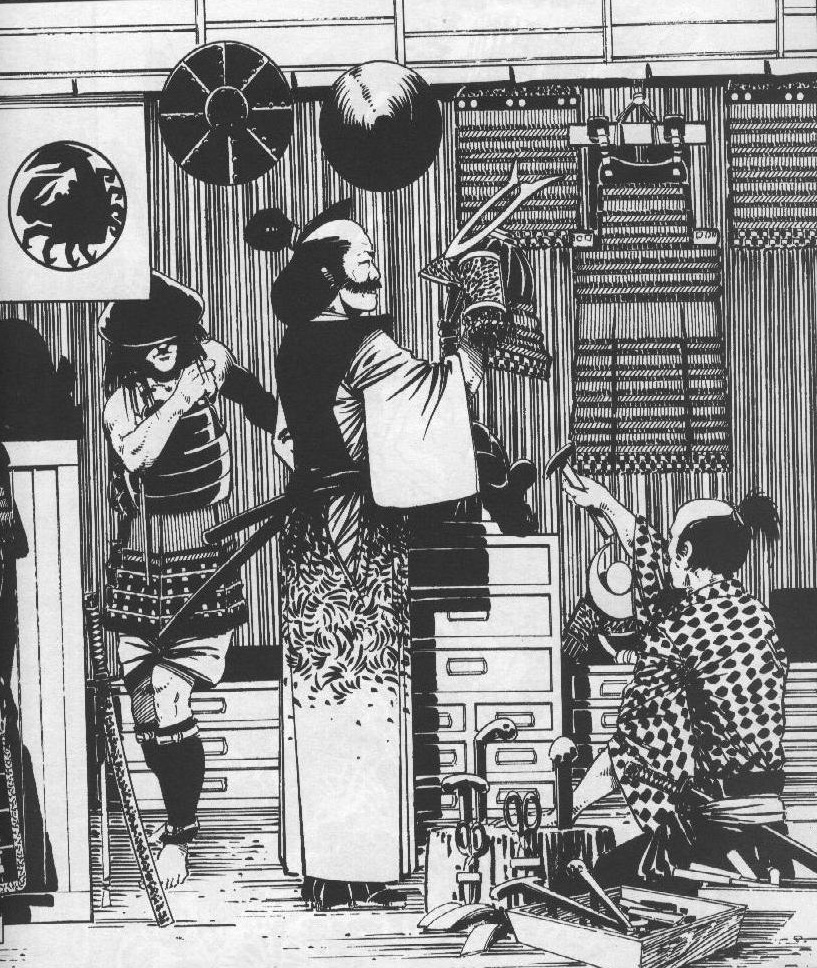
Samurai are never too far away from their swords, not even in the loo probably.
Next: spellcasters that aren't spellcasters???
Seriously not a spell you guys
Original SA post Legend of the Five Rings First EditionSeriously not a spell you guys
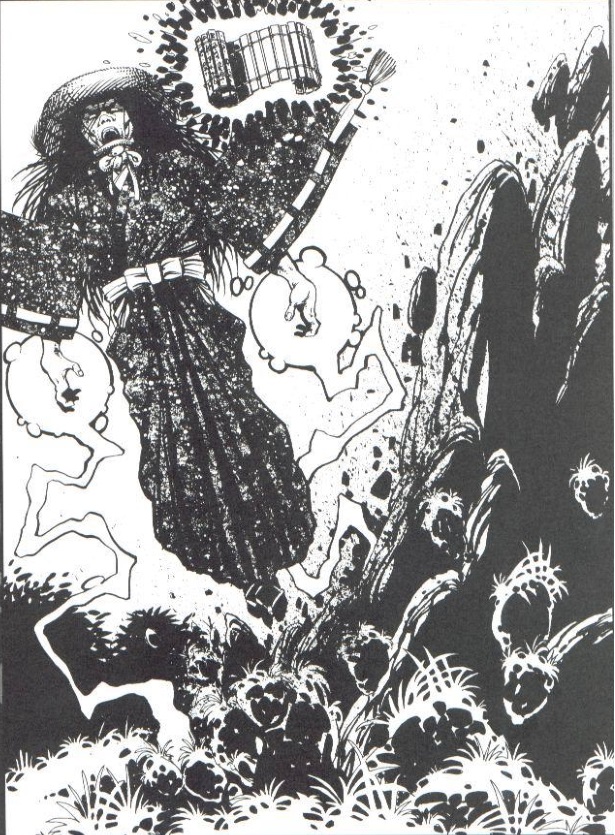
It's a prayer! Totally different!
Book of Air time! This is the magic and religion chapter. Ginawa wakes up suddenly under the rain, surrounded by the remains of the Scorpion magistrates. His sword seems to hum in satisfaction! He panics, cries and generally flips out until Hijiko arrives to the scene of the carnage, as well as a mysterious newcomer - Isawa Tadaka, a Phoenix magistrate. Tadaka realizes what's going on and starts a ritual to cleanse the disturbed Ginawa's soul from his evil blade's influence, and after some creepy chanting he gets Ginawa to let out fiery light from his eyes, chest and mouth (
 ) before falling unconscious. Hijiko is still catching up, but she thanks Tadaka for what he has done and then they engage in light conversation. She doesn't really know much about shugenja, and he is only too happy to explain... until Ginawa wakes up and presses a dagger to his throat. Hijiko rebukes him, Ginawa lets the shugenja go, and they all decide to head back to Ataka while the Phoenix keeps the Iuchiban blade and the ronin sulks. Some thanks!
) before falling unconscious. Hijiko is still catching up, but she thanks Tadaka for what he has done and then they engage in light conversation. She doesn't really know much about shugenja, and he is only too happy to explain... until Ginawa wakes up and presses a dagger to his throat. Hijiko rebukes him, Ginawa lets the shugenja go, and they all decide to head back to Ataka while the Phoenix keeps the Iuchiban blade and the ronin sulks. Some thanks!
The Celestial Order is how Rokugani believe the universe is structured. Everything has a pattern, from seasons to human life, and thus fortune telling is a popular pursuit. People reincarnate over and over: in each life, they have a dharma (their 'duty' in this life, that they're not supposed to shirk) and kharma (the soul's energy, which makes the soul progress until divinity through each reincarnation) Religion in Rokugan does not have much of a formal structure. The Emperor is the nominal head, but each Clan has its own religious structure. In the heavenly Celestial Order, at the top there is Amaterasu, the Lady Sun, followed by the Children of the Sun and the Moon, the original Kami, and then come the Fortunes, gods of sorts that are the object of most people's prayers. Fortunes are further divided into the Seven Fortunes of Good Luck (Daikoku, Ebisu, Benten, Bishamon, Fukurokujin, Jurojin, Hotei) and the Lesser Fortunes, which are usually mortal men and women elevated to Fortune rank by Emperors because of their deeds. Ancestors are also worshiped, particularly each samurai family's founder.
Shugenja! They are more than just sorcerers. They are priests that teach rituals, preserve the names of the Fortunes, measure time and are generally the most educated class of the Empire. Shugenja learn how to communicate with the Fortunes and kami, and carry school-ciphered scrolls with the appropriate rituals and chants. Shugenja magic creeps out some of the peasantry, because it is too close to maho (black magic) for them. Maho is an ugly thing that requires the maho-tsukai ("servant of magic") to pledge their name to an oni and shed blood to acquire arcane power. Maho is a capital crime in Rokugan, and not even a samurai's family will defend them if caught performing it. Peasants settle for their own "magic," fortune-telling through astrology and throwing stones and coins, as well as random superstitions that may or may not work.
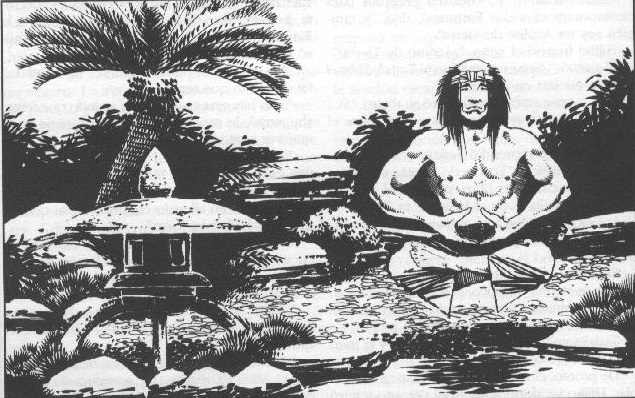
Swolezard. Considering how Rings work, mental swole has to come with physical swole to power magic.
Shinsei! Many shugenja see wisdom on the words of the little man and turn to a monastic life, shaving their heads and living in isolation. There are many versions of "Shinseism," integrated with the veneration of the Fortunes and kami, and one of the most recent teaches that only facing the temptations and evil of the world can true wisdom be found: this is Shintao, and has become popular among the samurai caste. Monks are treated as heimin peasants, and lose their position once they assume their new role. In theory, at least. Shinsei teaches that the soul must be released from its ignorance, greed and passions. Only by excising those vices from the soul can illumination be achieved. Those who do so are called noshin, and are worshiped somewhat like Fortunes but in a much simpler, less formal manner. Weakness comes from focusing of the material instead of the spiritual, the flesh is only temporal and so on. One of the "radical" aspects of Shinsei's teachings is that anyone can achieve enlightenment, if they so wish.
Magic objects are known as nemuranai or "awakened" objects. (It literally means "(that which)does not sleep") These are rare, a ronin isn't going to find a warehouse of +1 katana anytime soon. Plus, technically all objects are "magic" because they all have a spirit. Nemuranai are all ancient and not deliberately created (except when they are, heh) but their spirits are awakened through their proximity to those of great honor and glory. Each is unique and must be treated respectfully if the character doesn't want to hit a streak of bad luck. Ghosts are mentioned here for some reason as souls that have not received a proper burial and wander the world of the living with some purpose, either good or wicked. But more information on the GM chapter for those!
Shugenja magic can influence and alter the world around a shugenja through the power of the elements and the Fortunes. It cannot bring the dead back to life; dealing with corpses is maho. It cannot create life either, and it cannot influence the tides, the moon or the stars. Shugenja are not "spellcasters", they just know how to speak to the Elements and the Fortunes, and get them to listen. So now let's talk about how shugenja cast spells!
 Spells have a TN and an Element, and to cast one the shugenja must have the relevant spell scroll and roll the relevant Ring + their School Rank. A shugenja may try to cast spells of any given element as many times as their Ring rank. For every night of restful sleep or two hours of meditation, they recover one "spell slot." Spells can be further manipulated through Raises: each spell explains what exactly happens with the use of Raises. Greater range, more targets, more damage, etc. Some spells are
Rituals, designed so that more than one shugenja can help casting it (though a single shugenja can cast Rituals alone) These helpers add their School Rank to the dice the primary caster rolls, but they still keep only their own Ring. Some spells with a continuous effect require greater or lesser
Concentration: some can be maintained with ease, and some require the shugenja to stay still and focus on the energies being released. If a shugenja maintaining a spell is hit or otherwise disturbed, they must make a Willpower roll against a TN that varies depending on the required concentration. Each spell also has a
Mastery Level, that regulates how long it takes to copy a spell scroll as well as a shugenja's ability to take the spell as an
innate ability, no longer needing to have the spell scroll. Their Ring + School Rank must meet or exceed the Mastery Level and spend 3 XP (or 3 CP as an Advantage in chargen), and if the shugenja has a mastered spell's scroll and uses it they get a Free Raise. Spells can be cast carefully (double casting time for a Free Raise) or hurriedly (Raise to reduce casting time in 1 action)
Spells have a TN and an Element, and to cast one the shugenja must have the relevant spell scroll and roll the relevant Ring + their School Rank. A shugenja may try to cast spells of any given element as many times as their Ring rank. For every night of restful sleep or two hours of meditation, they recover one "spell slot." Spells can be further manipulated through Raises: each spell explains what exactly happens with the use of Raises. Greater range, more targets, more damage, etc. Some spells are
Rituals, designed so that more than one shugenja can help casting it (though a single shugenja can cast Rituals alone) These helpers add their School Rank to the dice the primary caster rolls, but they still keep only their own Ring. Some spells with a continuous effect require greater or lesser
Concentration: some can be maintained with ease, and some require the shugenja to stay still and focus on the energies being released. If a shugenja maintaining a spell is hit or otherwise disturbed, they must make a Willpower roll against a TN that varies depending on the required concentration. Each spell also has a
Mastery Level, that regulates how long it takes to copy a spell scroll as well as a shugenja's ability to take the spell as an
innate ability, no longer needing to have the spell scroll. Their Ring + School Rank must meet or exceed the Mastery Level and spend 3 XP (or 3 CP as an Advantage in chargen), and if the shugenja has a mastered spell's scroll and uses it they get a Free Raise. Spells can be cast carefully (double casting time for a Free Raise) or hurriedly (Raise to reduce casting time in 1 action)
Spells time! There are no Void spells, for now.
Basic
All of these spells can be used with all elements.
- Sense: the shugenja can sense a material or object made of the element. Gold in a mountain, drinkable water, a particular scent.
- Commune: the shugenja talks with the sleeping spirit of an object. The answer depends on the shugenja's politeness and the nature of the questioned spirit, they usually can only respond to simple questions though.
- Summon: the shugenja summons a fistful of the element, taking it from somewhere else in Rokugan. Casting time depends on just how far away the element is, so good luck summoning water in the desert.
- Counterspell: the spell is cast against a target shugenja using the opposite element they are casting (Earth vs Air, Water vs Fire). Success raises the target shugenja's spell TN in 5 per raise. This spell can be taken instead of one of the shugenja's school spells at chargen.
Earth
These spells deal with resistance, resolve, and health.
- Benevolent Protection of Shinsei: Ritual, prevents any creature from entering a 30-foot radius circle around the shugenja unless it succeeds at a contested Willpower x 5 roll vs the shugenja's Void + the casters's Ranks. The range is multiplied tenfold in a temple, and the shugenja's Void counts as 3 higher to ward evil away from a temple.
- Calling the Elements: Ritual, weeds and brambles pop up from the ground, hindering movement.
- Courage of the Seven Thunders: Ritual, the target takes 3 less damage per round per shugenja participating in the ritual, and a further 3 less damage if they're attacked by a Shadowlands-tainted creature. This spell doesn't work if the target isn't part of one of the Seven Great Clans because of reasons. Maybe they're missing KAMI GENES.
- Earthquake: Earthquake! All actions are at -2 in the area of the quake and they may take damage from things falling on their heads or something. The center of the quake is "any point the shugenja can see clearly."
- Earth's Stagnation: the shugenja uses the target's own Earth to slow them down. -1 die to any physical action, plus an extra -1 per raise. Base TN is only 5, so rack up those penalties! Focused concentration, though.
- Elemental Ward: Any spells cast against the target have their casting TN increased in 5, plus an extra 5 per Raise.
- Fires from the Forge: any man-made item or piece of gear is repaired back to its original state. Any magic the object had is lost.
- Force of Will: The target suffers one less die of wound penalties.
- Hands of Jurojin: the target is healed of disease and poison. The casting TN depends on the virulence of the malady and how long it has been left untreated, but ask your GM about it.
- Immortal Steel: Ritual, this spell can only be cast once on a metal weapon. It raises its DR in 1 permanently, so a 3k2 katana becomes 4k3. TN 30, though.
- Jade Strike: DR 3 against a Shadowlands-tainted creature. Also known as "how Crab shugenja say hello"

- Sharing the Strength of Many: Ritual, the target gets an additional die to roll per shugenja participating in the ritual. Lasts ten rounds by default!
- Strike at the Roots: TN is the target's Earth x 5, if successful all Earth rolls they make are made as if their Earth is 1. This doesn't change their Wound levels.
- Tetsubo of Earth: all elements have a spell that summons an elemental weapon. It has a DR of 3 and uses the same skill as the physical weapon. This is the Earth version. A Raise can be made to change the weapon type.
- Tomb of Jade: TN of the target's Earth x 5, if successful the target's skin becomes jade and they cannot move. Then, it's shugenja's Earth + School Rank versus the target's Earth. Each time the target fails, they take a DR of 2 as their Tainted flesh becomes jade. The shugenja can only maintain this spell a number of rounds equal to their Earth, and after using it the shugenja's Earth is reduced to 1 for that same number of rounds.

Eat, uh... earth cobwebs? Let's go with that.
Water
These spells deal with cleansing, clarity, and transformation.
- Bo of Water: Water's weapon spell.
- Blessing of Purity: Like Hands of Jurojin, but instead of a variable TN it has a fixed TN of 10 and then the target must succeed at a TN 10 Honor roll. The shugenja gets a free Raise in a temple to Amaterasu and can attempt to remove evil spirits, but then the Honor roll is contested by the spirit's Earth.
- Calm Mind: if successful, the target is rid of fear and other mind-altering effects.
- Castle of Water: creates a moat of water around the shugenja. The water is completely normal and drinkable.
- Heart of Nature: the shugenja establishes a bond with an animal, that will generally be friendly to the caster and become violent if they come to harm. The caster can make an Awareness check to tell how far the animal is. It used to be a "secret spell of the Unicorn Clan."
- The Path to Inner Peace: target heals a Wound Level, they heal an extra Level with Raises. The spell only heals Wounds, so if you somehow end taking 17 damage and with an eye torn off you'll just heal the damage but keep an eyepatch.
- Reflections of Pan Ku: caster's sight becomes blurry, but they can see shimmering around magic items.
- Reflective Pool: cast on a pool of water, the shugenja may see an area they are familiar with. No sound, though.
- Reversal of Fortunes: target may reroll one unsuccessful roll for the duration of the spell (10 actions)
- Sympathetic Energies: caster may transfer 2 Ring points from one target to another. TN is Target Ring x 5, lasts 3 Rounds. Rings or Traits cannot be reduced to less than 1.
- Torrential Rain: make it rain! Visibility is reduced to 1 foot (!) and all actions are at -3 dice.
- The Ties that Bind: caster may get a vision of an item or person they're seeking, up to one mile (more with Raises). They must be familiar with the item or hold something belonging to the person.

Mirror, mirror, who is the HOLY FUCK IT'S A DRAGON.
Fire
Fire spells have to do with destruction, flames, and insight.
- Amaterasu's Anger: a flash from the shugenja blinds everyone around them if they fail a Reflexes roll against the caster's Fire x 5. Blinded people have a dice penalty equal to the caster's Fire.
- Amaterasu's Blessing: Light! Lasts 1 minute normally, can be increased with raises (with 7 Raises it lasts a month)
- Biting Steel: target weapon rolls an extra die for attack and damage. If the subject is rolling ten dice already, an additional die is kept instead.
- Evil Ward: the caster draws a symbol on the ground, and Shadowlands creatures that approach within thirty feet burn (DR 2) as long as they stay in range.
- The Fires that Cleanse: both caster and target are engulfed in flame. DR 5, caster takes half as much damage as the target. Anyone in 10 feet must make a Reflexes + Defense roll at TN 20 or burn like the caster.
- Fires of Purity: target rolls and keeps an additional die for all rolls. It lasts a number of rounds equal to the target's Honor.
- The Fire from Within: Fireball! More raises means more targets. DR equals the caster's Fire.
- The Fury of Osano-Wo: target building is hit by lightning until it collapses. It needs a full hour of casting at total concentration, so it is of little use in sieges and such. Much larger buildings can take just partial damage.
- Heart of the Inferno: Huge fireball! DR is 6 to everyone in a ten-foot area, with a Reflexes + Defense TN 15 roll to save for half damage. The caster must burn the spell scroll to cast it.
- Inflame: the caster sets something on fire. If the item is held by someone, the TN is their Water x 5. By custom it is not used against enemy shugenja's spell scrolls, doing so is cause for a blood feud!
- Katana of Fire: Fire's weapon spell.
- Wings of Fire: fly away, nerd. Target may fly at Fire x 5 feet per round. Additional raises are necessary if the target is heavily burdened.

"Okay you're just being a dick now, Isawa-san."
Air
Air spells have to do with motion, illusion, storms and manipulation.
- Accounts of Shorihotsu: this spell reveals what some other shugenja is casting. TN is target spell's Mastery times five.
- Benten's Touch: target may keep an additional die in social Awareness rolls.
- By the Light of Lord Moon: caster can see items that are deliberately hidden: traps, false bottoms and so on. Merely hiding from view (like putting a sword in a jar) doesn't trigger the spell. But isn't that hiding? Magically hidden stuff takes a Perception + Shugenja Lore roll against the spell's Mastery x 5.
- Call upon the Wind: target flies through the air. The shugenja controls the flight, not the target. Unwilling targets can resist with Earth x 5.
- Cloak of Night: the caster conceals a target item of a character. It must be something they can carry without using both hands. Very noticeable things (a screaming baby, the Emperor's crown, etc.) can increase the casting TN.
- Command the Mind: Oooh! Two rolls: casting against the target's Willpower x 5, then the target has to roll Perception against the shugenja's Air x 5. If they blow this roll, the caster may implant a thought that the target will believe as their own. Subtle suggestions are good, wildly different thoughts will be unconvincing.
- Echoes on the Wind: caster may leave a message in a place that will be heard by a designated person (or just anyone), as if the shugenja were whispering in their ear. Raises can be made to increase the length of the message. or to make it repeat indefinitely.
- Essence of Air: the shugenja lowers all their Rings to 1 except Air. They become imperceptible unless they do something that could be witnessed (opening a door, talking, picking something up) This gives a potential witness a Perception roll against their Air x 5. Even then, losing track of the shugenja even for a moment makes the spell kick in again. It takes full concentration (so they can walk, but slowly) but Raises can be made to reduce the concentration level.
- Know the Mind: caster may read the target's surface thoughts. These are usually vague impressions, but they can use Raises to dig in deeper. The GM can decide that this is a very confusing experience for the target, perhaps stunning them.
- Know the Shadows: the caster melds into the shadows (TN to see the target or attack them at range is increased by 5 plus Raises) There needs to be shadows of some sort, casting the spell under direct sunlight is no good.
- Mists of Illusion: the shugenja creates a very convincing static man-sized illusion. Awareness roll at TN 15 to realize the illusion. Raises can make the illusion move, increase the number of illusions, and so on.
- Nature's Touch: the shugenja may ask one question of an animal, and understand the answer.
- Quiescence of Air: Silence, 5' Radius, centered on the caster. This will ruin any further spellcasting for its duration.
- Secrets on the Wind: caster can hear things in an area they're familiar with, as if they were there. Range is 10 miles + Raises, with Perception rolls necessary for soft or indistinct sounds.
- Tempest of Air: the caster blows air at the target. Missile attacks from the target are not possible, and if they fail an Air vs Earth roll the target is knocked off.
- Way of Deception: magical disguise. It's ruined if touched, and a Perception + Shugenja Lore roll can discern the illusion but without revealing who hides under it.
- Whispering Winds: the shugenja can tell if the last thing the target said was a lie. TN is target's Intelligence x 5, but this only tells what the target feels about the truth of their statement. Raises can be made to tell how big the lie is, or even the objective truth regardless of the target's beliefs.
- Wind-Borne Slumbers: Sleep. Target must succeed at an Earth vs caster's Air x 5 roll or go to sleep. They wake up if someone approaches within a foot or if they are damaged.
- Wind-Borne Speed: Target is sent away at (caster's Air x 10) feet per round. Watch out for dense forests.
- Wind's Distractions: Wind spirits harass the target. The TN of anything they do is at +5 per spirit bothering them (more spirits can be summoned with Raises), or +10 for shugenja trying to cast.
- Yari of Air: Air's weapon spell.

The shugenja is totally holding wind here, hurr hurr. it is a fart joke
Next: GM advice! The wonders we'll see! The blatant lies! The actually cool things!
Badabing'd by non-existent ninja
Original SA post Legend of the Five Rings First EditionBadabing'd by non-existent ninja
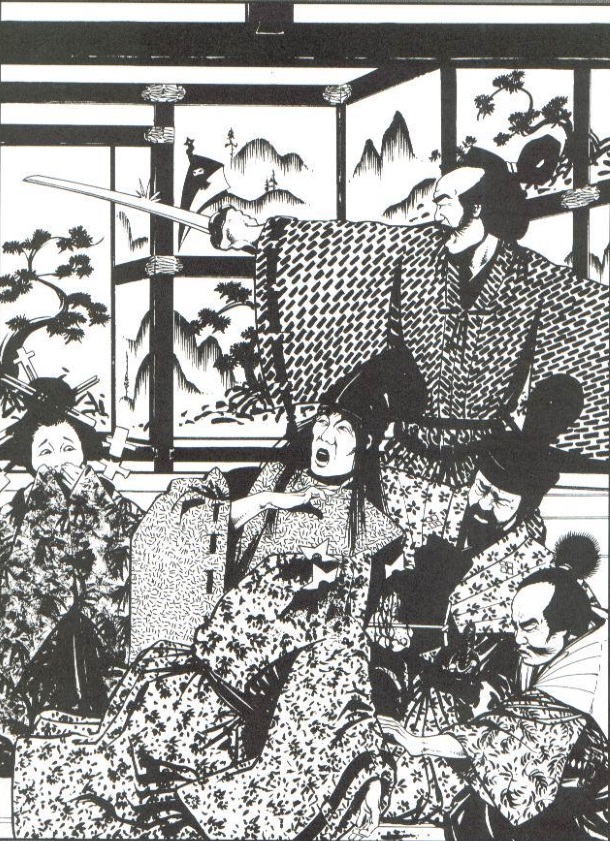
No! The tiny ninja!
Time to wrap this up with the GM section of the book, the Book of Void! And also time to wrap up this fucking RPG fiction. Ginawa and the gang go to report to the daimyo Ataka, and they're served rice while they wait. Ginawa demonstrates poor table manners! Hijiko and Tadaka disapprove, -1 point. When they see Ataka, Hijiko starts talking but Ginawa interrupts her with his account of the Scorpion's treachery. Hijiko gets understandably pissed, and by now she's had enough of Ginawa to the point of almost raising her sword - but Ataka gets her to pipe down, quickly. Tadaka confirms that the arrow that killed the Crane general had been manipulated with Air magics. Ataka ponders on this, then starts talking to Hijiko about her complaints over Ginawa and--- he shuts up. Because he just got a lethal dose of shuriken in the back! Ninja! Ginawa is the only one able to react to this: Hijiko loses her cool and starts sobbing, while Tadaka is paralyzed with unexplainable fear. Ginawa is reluctant to draw his sword again, but realizes he has no choice... and then the point of view changes to the real world, because this is all an ongoing game of Legend of the Five Rings!
 Hijiko's player has just blown her Willpower roll to resist the ninja's fear magic, and she decides to try a Honor roll in spite of the GM's warning that she'll lose a full rank if she blows this. She spends a Void point, and succeeds! Tadaka's player is not so lucky. Ginawa rolls for control of himself now that he has his blade, and makes it! The ninja is nowhere to be seen: it's a Contested roll and Ginawa has to beat a Perception roll of 30. ("It's a ninja! They're trained for that kind of stuff.") The player and the GM roll off, and boom! Ginawa spots the ninja and tells Hijiko about it. Initiative rolls are made, Ginawa's action comes up... he throws the Iuchiban blade at the ninja. Everyone shuts up in disbelief. It'll be a very high TN, the GM says, but that's okay. Ginawa will use a Void Point!
Hijiko's player has just blown her Willpower roll to resist the ninja's fear magic, and she decides to try a Honor roll in spite of the GM's warning that she'll lose a full rank if she blows this. She spends a Void point, and succeeds! Tadaka's player is not so lucky. Ginawa rolls for control of himself now that he has his blade, and makes it! The ninja is nowhere to be seen: it's a Contested roll and Ginawa has to beat a Perception roll of 30. ("It's a ninja! They're trained for that kind of stuff.") The player and the GM roll off, and boom! Ginawa spots the ninja and tells Hijiko about it. Initiative rolls are made, Ginawa's action comes up... he throws the Iuchiban blade at the ninja. Everyone shuts up in disbelief. It'll be a very high TN, the GM says, but that's okay. Ginawa will use a Void Point!
This is the GM section. It starts with practical advice, assuming that it's the GM's first time running L5R, or even any RPG at all. It says that running Rokugan is a true challenge, since it's not a traditional fantasy scenario where players play thieves and rogues wandering the country in search of dungeons and random adventure. No, this is a highly ordered society, and PCs will be at the service of demanding lords. So! First of all, it's good to listen to the players. Do they want a punchy game? Do they want a talky courtier game? Once the GM gets the idea, they can start limiting the character options to fit the type of game the players want. Some clans may be left on the side, that sorta thing. Picking a theme for the game helps: war, questing, exploration (of the Shadowlands, to be precise), mystery, romance, tragedy...
wat posted:
A classic twist of mystery is murdering the characters themselves. Making them wake up with poison in their lips and only ten hours to find the killer (to get the antidote) is a classic twist of the mystery murder.
The character's role in the events must be considered as well. A simple answer is making them soldiers under a daimyo, but that gives them little control. Ronin have freedom to go wherever and serve whoever they want, but they have little reason to stick together and issues of internal loyalty can become dangerous. Ronin need a reason to stick close: maybe they're all siblings, or servants to a murdered lord. PCs can be courtiers in the Emperor's court, trying to get ahead of the other clans. There's spies and ninja to deal with, ronin bandits stealing gold for bribes, and more. And everyone can use a bodyguard. Probably the easiest way to get multi-clan parties together is making them magistrates of the Emerald Champion: they have authority, a broad mandate and a reason to go on Imperial roads solving trouble, dealing with bandits and monsters and so on. There's some classic plots to reference once theme and role are set. Rescuing the princess, defeating the evil warlock, taking down the tyrannical dictator, redeeming the lost friend. All of which happen in Star Wars! Clever, isn't it?
That's it for the GM-as-author. Once everyone is at the table, the GM-as-referee comes up. Keeping the fast rules in mind (pick a TN, assign Trait + Skill, roll) is foremost, everything else is just personal style. Oh, I guess we don't need this whole book after all! There are two GM types: the "dice" GM that lets the dice roll where they may, and the "story" GM that only uses the dice as a guide, if anything. The game leans towards the story GM, though it does mention that the GM having absolute control of the plot is a disadvantage as much as a boon. Most GMs fall somewhere between both extremes, but whatever the case is: be fair. Don't start changing the rules under the players' noses. They'll lose their trust in you, you will lose your authority, and the game will be the worst for it. The GM-as-narrator is the one that makes the game come to real life. Don't tell the players that the daimyo is mad and yelling: get mad, and get yelling. Describe things using all five senses. Change your voice depending on the NPC that you are playing at the moment, use the NPC's appropriate body language. Think of the scenes you have in mind, and how you will talk and move during them. Make action scenes fast and exciting; make mystery scenes slow and threatening. And remember: if you're a beginner, tell that to your friends. Do your best, and they'll understand if you fuck up.
And now, cheat! All GMs cheat. Seriously! If one of your players gets it in their head that they want to throw their wakizashi at the Emperor and you can't get them to reconsider? Describe how the Emperor is wounded and now the PC is surrounded by fifty angry samurai (that you didn't know existed until a couple of seconds ago), and now the PC is without a weapon. Oni just murdered one of your favorite PCs with exploding dice behind the screen? Shake your head, and describe meekly how the oni beat the crap out of the PC, leaving them with 1 wound. It's cheating, but it keeps the PC in play, and it keeps the player having fun. Sometimes players will try to remember the correct etiquette for a given situation. You can make them sweat with skill rolls, assume their characters know how to play things out, or let other players kibitz OOC so that everyone knows how to act. But hey, in the end some players might just not get proper etiquette even when it's fundamental for the plot. That's why the PCs have the relevant skill: so that players don't need to. Some players with more RL charisma love acting out court scenes, but as long as they aren't hogging too much spotlight letting them act can be fun to watch. And it's unfair to expect players to know how to act socially if you don't show them proper customs, particularly in a society as strict as Rokugan. Show them how NPCs talk to the Emperor, make them flashback to their first tea ceremony. Using etiquette gives flavor to the game, even if it can feel like a hurdle.
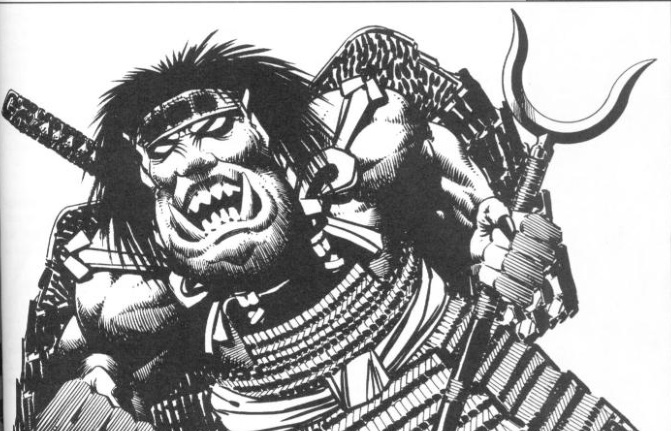
Show proper etiquette or you'll get fifty of these fuckers in your face.
There's also some fluff on advanced GMing techniques: narrating prologue and epilogue "cutscenes" to get the players interested in the plot, showing side scenes ("as you guys track down the oni that stole the ancient sword of the Crab, Hida Kisada valiantly fights off an army of the Shadowlands, wondering if you'll make it!") and flashbacks. Sometimes this will require some cooperation on the players' part since it'll require them to ignore information you'll give when playing, though. Using the physical environment
where you are playing the game also helps: turn off the lights and use lamps and candles, get a Noh music CD, serve Japanese finger food. But, whatever you do, do not bring a real sword to the game. It's bolded, in fact. Just don't, no game is worth getting actually hurt. Live action roleplaying is becoming more and more popular, and there will be a L5R Live Action supplement in the future, but two guidelines are present: NO TOUCHING and NO SWORDS. Which really, just makes sense.
We get a list of important NPCs now from all clans. Hida Kisada is the head of the Crab Clan. He's way past retirement age but with no signs of wanting to quit the job. He thinks Rokugan needs a strong leader, and the "old man" (the Emperor) isn't cut for it. Maybe the Crab should take up that post. His son Hida Yakamo is the stereotypical Crab warrior: large, brutish, and arrogant. He is not pleasant and feels no reason to be - the rest of the Empire lives because of him and he is owed respect for it. The Crane has Doji Hoturi, son of the Clan daimyo and an unabashed womanizer suddenly thrust into a position of power after his father became the Emerald Champion. His sensei, Kakita Toshimoko, runs the Crane fencing school. He is a guy that loves partying, hitting on the ladies and having a good time, but becomes ice cold when in a duel and grows really sad for the people that he has to cut down. The Dragon has Togashi Yokuni, the Clan Champion, who has never been seen without his ancestral armor. People have never even seen him eat or sleep, and only a few have talked to him but no one remembers his voice. Mirumoto Hitomi is a surprisingly scrutable Dragon - she is angry as hell, having seen Hida Yakamo kill his brother unfairly in a duel. She is very good with a sword, and only thinks of avenging her brother. The Lion has Akodo Toturi, chief military advisor to the Emperor and a great general, but less good in the political arena: recently a Crane general took Lion lands and the Emerald Champion (a Crane) consolidated their wins in court. He is thoughtful and considerate. Matsu Tsuko is the head of the Matsu family, a fiery and brash woman that hates how the Crane is pushing the Lion around and thinks Toturi is not fit to lead the clan. The Phoenix has Shiba Ujimitsu, the Clan daimyo whose authority only reaches the safekeeping of the Phoenix clan. He has MYSTERIOUS DREAMS. Isawa Tadaka, our buddy from the Ginawa story, is a rising star with a strong (almost unhealthy) interest in the Shadowlands and ways to defeat them. The Scorpion has Bayushi Shoju, Clan Champion and a guy that knows a shitload of secrets over a shitload of people; and Bayushi Kachiko, who is probably not a developer's pet character or anything. The Unicorn has Shinjo Yokatsu, a man that feels uncomfortable with Rokugan even though he rules his clan, and Otaku Kamoko, leader of the Battle Maidens, an all-women shock cavalry force. Finally, we see two ronin: Dairya is one of the most notable masters of iaijutsu and kenjutsu in Rokugan, wandering the land and killing samurai and bandits alike; and Ginawa himself, who could have been a Lion, a Scorpion or something else entirely.
Nemuranai! The game tells us that the more magic items are in PC hands, the less magic they really are. The campaign loses realism and combat loses importance. But if only one or two PCs get nemuranai, the others may get envious. Nemuranai should be treated like characters. Each is ancient, perhaps even a family ancestor spirit. Treating them correctly may unlock abilities no one knew about, while mishandling them will make characters lose their advantages. Enchanted swords have a long history in Rokugan, since they are ~*the most perfect weapon*~ and all An enchanted sword can have a higher DR (4k2, 3k3, 4k3 or more) and other abilities like rerolling all 1s or substituting them for the wielder's Fire rating or whatever. And then it's on to specific examples. Bloodswords, also known as "Kenchi" are what our man Ginawa had in his story. There are rumored to be four ofthe suckers. Bloodswords have a rank that starts at 1 and grows by killing as many people as their rank, so a starting bloodsword needs to kill one man to go to rank 2, two to go to rank 3 and so on. Every time a bloodsword rolls for damage, any die that rolls less than the rank can be rerolled. However, any time the wielder faces a tense situation they must roll Willpower against the bloodsword's rank x 5 or flip out and attack until they can make another Willpower roll to sheathe the blade. Crystal katana are made because of Crab experiments on using crystal against the Shadowlands. Apparently, purified crystal has a deleterious effect on Tainted things. Crystal weapons have a strength that goes from 1 to 5: when a tainted creature approaches, the crystal can repel them by making a roll with their rank against TN 15, while the creature rolls against the crystal's strength x 5. Success, and the crystal repels them. If they ever come into contact, the crystal makes another contested roll, dealing its strength as DR on a success. Ancestral swords are the most famous of Rokugan, owned by the Seven clans. We get an example of two: Bitter is a sword made by a Dragon shugenja/samurai/weaponsmith (aren't shugenja already samurai?) that deals extra damage to low-Honor characters but makes the wielder flip out even in inconvenient situations when facing them; and Honorable, its companion shortsword that has a DR equal to the wielder's Honor and is kept by the Dragon for honorable, painless seppuku. Other objects include Crane good luck origami, a ring that may or may not be used by non-existent ninja, a couple of matched rings of Scorpion make used to spy on people, an Unicorn bonsai tree that makes anyone that focuses on it very tiny, and a mirror that lets people challenge each other to MIND DUELS.
And now, Ninja! Who don't exist and players should not read any further. Also, there's no information for making ninja PCs because they are too powerful and unbalancing. Anyway! Ninja are experts in espionage and deceit. No daimyo will ever admit to using ninja, but every last one of them have considered using their skills. The ninja "clan" is related to the Scorpion but are effectively independent. All the way back in the early Empire, the first Hantei asked his brother Bayushi to build a spy network that would secure his dynasty's possession of the Emerald Throne, with the proviso that betraying his trust would mean the end of his line. Bayushi agreed and the NINJA CULT was born, from humble origins (pay a guy to watch and report) to detailed espionage and infiltration training. By the time of Hantei X, there were rumors that the Scorpion spies were using black magic to achieve their goals. The Emperor called the Scorpion Champion of the time and asked him to explain himself; the Champion instead said that the network would be immediately dismantled. Suspicious, the Emperor ordered all the ninja to present themselves to the Emerald Champion for questioning. Only about one in five did, and they were all put to death for black magic use - including the Scorpion Champion's own brother, Aramoro. It was assumed that the spy network was put down for good, but instead they went underground and became truly invisible. The Emerald Champion was killed an exact year later, with his hands and head cut off - the traditional punishment for warlocks. Now the ninja are an independent organization: they recruit from the peasants and are friendly with Scorpion, but they are not the same. The three main ninja families are:
- Bayushi: the oldest and with the most ties to the Great Clans. They are no longer directly related with the Scorpion Bayushi, though it is rumored that they take Bayushi samurai children for training.
- Goju: the ninja shugenja. If they are not butt-deep in black magic, they are true masters of illusion.
- Ninube: masters of disguise and infiltration. They are raised with several identities instead of one from childhood.
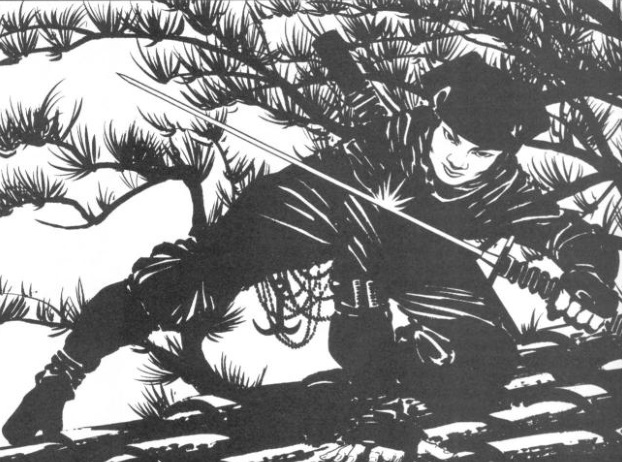
What a dashing non-existing fellow.
Ninja are not super martial artists. They are not good fighters, but they can distract and confuse a whole group of people and make their getaway. It is rumored that their mundane abilities prepare the ninja to accept dark magics, or maybe they drink Oni blood! The truth may never be known, and is probably irrelevant. After another warning to keep ninja away from players, we get some rules to make ninja. First, pick a Family, just like Clan samurai. Bayushi get +1 Reflexes, Goju get +1 Intelligence, Ninube get +1 Awareness. The Bayushi Ninja school (+1 Agility)] has as skills Acrobatics, Acting, Defense, Explosives, Sleight-of-Hand, Mimic, Poison and any 3 Ninjutsu. Many of these are ninja-only. Ninja get specializations for their skills, but it's not clear how they work. Ninjutsu, for instance, is the skill to use any of the ninja tools of myth (hidden blades, climbing claws, yawara sticks and so on) and is a single skill for all of them. The skills usually have greater effect than those available to samurai: Disguise, for instance, gives the ninja a full new persona per rank, while Shinobi (ninja Stealth) lets the character hide in plain sight and has any would-be observer roll Perception against the ninja's Willpower + Shinobi. Their Rank 1 technique is Distraction: it is a special maneuver that raises their TN to be hit in +10 or +20, but increases the TN of anything the ninja tries to do in +10 or +20 as well. There are three sample ninja NPCs: Bayushi Aramoro is named after the legendary ninja, and is the Scorpion daimyo's brother. There is a tradition in the Bayushi samurai that the second-born son is offered to the Bayushi ninja, apparently, He is tall, strong, the chief of security of the Scorpion palace, and in love with Bayushi Kachiko, his sister in law. Goju Ededei is an ugly little man, a shugenja ninja with a sinister reputation and the Disadvantage to prove it - but no one can associate it with him, since he's a fucking ninja. He takes a single eye from each of his kills, and keeps them in magic jars for his collection. Ninube Hirariko is an infiltration expert with four identities, including the favorite geisha of the Crane daimyo. Spooky! Also, a later sourcebook called "Way of Shadow" will let us play a ninja campaign, the book says.
This is a gigantic lie.
Creatures! Here we get your actual monsters and the like. Monsters get Rings, an attack roll, a damage roll, a TN to be hit, and Armor which works differently from PC armor: any die that comes up less than the monster's Armor is treated as a 1. They have much simpler wound levels: a goblin gets 6- -1 and 12 - Dead, for instance. Monsters can also cause Fear (Willpower roll against the Fear x 5, those who fail cannot use Void Pointsa and must ignore all dice that roll under the Fear rating), have Multiple Attacks per round (self-explanatory) or have Invulnerability (mundane weapons only cause 1 Wound of damage, only crystal, jade or nemuranai weapons may harm them properly and evil GMs can decide that only one of those can do so)
Goblins are Fu Leng's attempt at making men. They're twisted mockeries of humans, dumb and hateful. They're used by oni as cannon fodder, and throw themselves recklessly into combat. Some of them are larger and slightly smarter: they are known as warmongers and serve as their leaders in combat. Yorei are ghosts, with all sorts of powers. They cannot be touched if they do not wish so, and pass through solid objects, but they cannot move through jade - even a jade coin can pin them in place. The most common ghosts are gaki (blood drinking assholes), shi-ryo (ancestor spirits, sometimes helpful and sometimes hateful), ubume (the ghosts of women that died in childbirth, they cannot move on until their child is 'born' and that needs someone to hold the spirit child as they grow heavier and heavier in their arms), and goryo (vengeful spirits that want to take their killers to justice, or torture them endlessly) Shapeshifters, known as "hengoyokai" by the Rokugani, are spirits able to take a physical form. Most take animal shape, but they can also be trees, flowers or pretty much anything, even humans. Kitsune are tricksters and consummate liars, but are generally benevolent. They like to make fun of humans, but they mean them no harm. They can be very attractive to the opposite sex, and there are many tales of foxwives that fall for men. Kumo are not nearly as nice: they are a race of giant spiders that prefer to keep their own company and eat whatever they catch on their large webs.
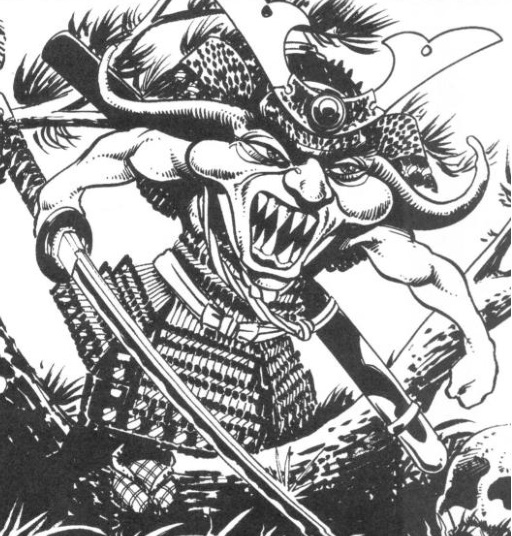
Apparently, these ugly dudes "breed like rabbits."

Ratlings or Nezumi are a race that lived in what is now the Shadowlands, before Fu Leng's fall. Their civilization was destroyed in the chaos, and have spread throughout Rokugan trying to survive. They are not affected by the taint of the Shadowlands at all, and Crab samurai learn their language and use them as scouts. There are stats for regular ratlings, ratling 'bushi' and ratling 'shugenja' (they use blood for their rituals, but it's not maho) They sometimes use weapons and armor looted from dead Crab warriors. Ogres are Fu Leng's second attempt at creating life. They are much stronger and tougher than goblins, but still not too bright. They are the easiest of Fu Leng's creatures to find in Rokugan proper, since they do not move in large groups and can get past the Crab defenses easily. Zombies can be created by warlocks attaching a porcelain mask to a corpse and invoking a lesser evil spirit to take control of it. Humans that die in the Shadowlands also rise as zombies.They are super tough, but they have no real will of their own. They lose one limb per Wound level they lose and if they lose their head (or a called shot is successfully made) they go down in a heap. But they only have a single Wound level with 60 Wounds, so I guess by RAW they'll never lose bits without a called hit!
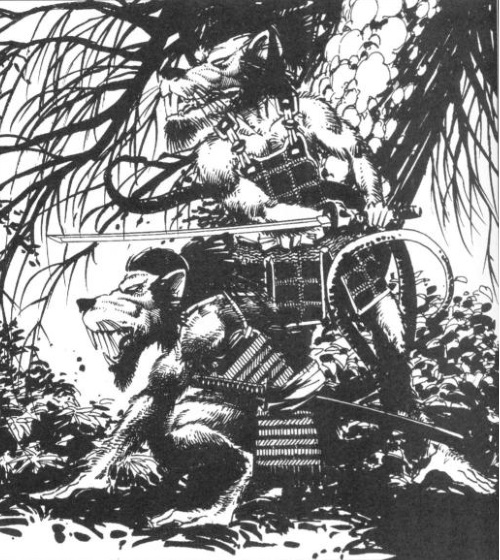
Sneaky is not always evil, or Scorpion-y.
Kenku are an ancient race of crow-men from the time of the Naga. They can use weapons and other objects, and are very inquisitive and curious. They teach things to those who seek them out and are worthy, love shiny things, and many kenjutsu masters of old have had kenku as their sensei. Their understanding of the universe also lets them cause spell-like effects. Kappa are small humanoids that like to trick travellers to ambush them and feed on them. They have a small indentation on top of their head that they must keep full of water at all times, or they become helpless. They're strangely polite even to their victims, though. Pennaggolan are a type of vampire, a flying head trailing intestines and guts behind it. They squeeze the life out of their victims before feeding. They can pass for humans but need to use their natural shape when feeding, and their intestines become full of blood when they do so. They get around this by soaking them in vinegar, which speeds their digestion process.
Oni are the most dangerous creatures in the book, servants to Fu Leng himself. All Oni are invulnerable and have all sorts of powers. They are evil spirits granted physical shape by Fu Leng's will or by black magic. When an Oni is summoned, they take the name and part of the essence of a participant in the ceremony. The oni is bound to this person, but as time passes they absorb more and more of their chi until the human being loses itself and the oni takes everything. When this happens, the Oni is free and can do as they please, including the ability to produce lesser spawn of itself. There are four oni described here: Kyoso is a vaguely feminine demon that attacks with great beams of power as well as spells. Three times per round, too! And when they hit with their unholy fire, the target must make a Void roll against TN 10 or lose one Void Point, or fall unconscious if they have no points. Shikibu are orange dwarfs with blue beards that can recover their shape if they are destroyed by taking over a nearby corpse; they like fighting near properly prepared "meat stores" because of this. Akuma are horrible beasts that destroy entire villages for kicks. When they hit with their flaming tongues, they leave burning saliva that causes 1 die of Wounds per round until doused with vinegar or alcohol. Tsuburu are giant living gullets that don't even bother moving around: they teleport and devour humans whole, loving the death rattles they hear inside their stomachs. Strength vs Strength roll to catch someone, then they swallow them up and the poor bastard takes 1 die of Woudns per round until they get help. So yeah, watch out for these puzzle boss assholes.
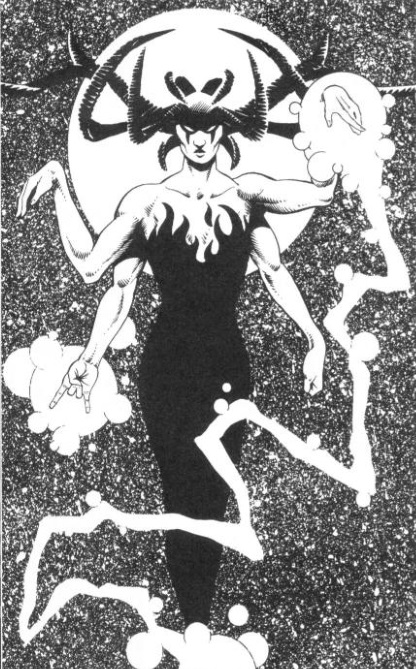
Pretty elegant for a walking TPK.
Now it is time for the usual introductory adventure! The Ceremony of the Samurai is an adventure meant for new characters, players and GMs. PCs go to the Topaz Championship in the city of Tsuma, a championship meant for young samurai about to go through gempukku. They may earn honor, or die trying. Fun! Characters should know each other from childhood or have a reason to stick around together: maybe two traveled together to Tsuma, meeting a third on the way who was friends with the fourth, and so on. When the characters are on the road, they meet an old man who will try to get away and let the noble samurai pass, only to fall in the nearby river. Perception against TN 15 to notice that the local cranes were not bothered by the sudden splash... the old man is Megumi, the Fortune of Heroic Guidance, and is testing the players. They are not penalized if they leave the man be, but if they help the 'old man' will thank them profusely and offer a free tea ceremony while answering questions about Tsuma and the Topaz Championship. Megumi is carrying a katana, which should be illegal for a peasant to carry: he will only say that he is "keeping it for his master." He also make boiling tea just from mixing the contents from two small pouches: TN 5 Herbalism roll to realize this should not happen, but Megumi will brush it off. A successful Tea Ceremony roll for each PC (TN 9) gives one Void Point. But wait, why would they be missing Void Points this early into the adventure? Whoever went first to rescue Megumi will be offered the katana or the coffer he is carrying: they must perform the proper gift-giving ritual (rejecting it twice, accepting it at the third attempt) or the gift will disappear after the old man is gone. The katana is of exceptional make, 5k2, while the coffer has one spell of the GM's choice. Megumi will let the PCs stay at his home while he is outside: he will transform into a crane once the PCs have lost sight of him. Later, the PCs will meet Yasuki Jodeiga, a Crab peddler. If the PCs peruse his wares, they must roll Awareness against Jodeiga's 6k3 Commerce roll or leave his stall half a koku poorer and with some small useless trinket. SOCIAL SKILLS.
Tsuma is a Crane city, but it has holdings belonging to other Clans as well. One is a Scorpion "tea house" that sells some kickass sake and serves at the Scorpion's clandestine HQ in the city, while the other is an Unicorn trading house full of rare foreign goods. There's also a temple to the Seven Fortunes and the Kakita kenjutsu school, as well as Megumi's flat, but little else of interest to PCs. The day before the tournament begins, the Emperor arrives by boat! It's a great event with all the required pomp and spectacle. He has Lady Bayushi Kachiko, beautiful and with "non-traditional" clothes, with him. His son is also coming with him: a veteran Crab samurai will elbow one of the PCs and note how "Squid-sama" is showing up. The PC can try calling the Crab out on his insolence, but they will probably get their ass kicked and at any rate it's only the word from a child against that of a veteran warrior. There are some rumors of the Lion and Crane going to war, the Emperor refusing to abdicate for his son and so on. Also there is a young Scorpion bushi, Bayushi Sugai, who will be the PCs' nemesis this adventure.
And then it's off to the Tournament itself! It comprises several different tests. Each character must score five points to complete their gempukku, and only those who do can enter the third day iaijutsu competition and the fealty ceremony that follows. Those who fail must try another gempukku ceremony next season. The PCs and the other contestants will be under the watch of their superiors, so they better be on their best behavior. The tests of the first day include Sumai (contested Sumai roll), Heraldry (TN 20 Perception + Heraldry roll), Athletics (several Resistance or Agility + Athletics rolls through an obstacle course; Bayushi Sugai has laid guide ropes for him and traps for the other contestants like bags full of fucking 2k1 damage angry wasps), before a two-hour break. Then it's on to Horsemanship (Horsemanship rolls to move through an obstacle course, then attack rolls to strike with a sword and with an arrow at targets) and an Etiquette quiz (Etiquette/Law/Lore: Bushido rolls against TN 15, the GM is encouraged to introduce aspects of Rokugan's society using the answers of this quiz) So far, so good!
And now it's time for a cutscene.

The PCs are invited to dinner with all the bigwigs. Mostly the youngsters will be left alone, since the bigshots all have important stuff to discuss, including Badger Clan Champion Ichiro Akitomo. When PCs are about to leave, they are joined by fellow competitor Otaku Shiko, and they have a nice night walk, interrupted by swordplay sounds. Hm! The PCs go to check this out, and they find five corpses, including Ichiro Akitomo. Bayushi Sugai shows up with a bloodied katana, asking what's going on. See, the Lion wanted the Badger as ally in their fight with the Crane, but the Scorpion fucked this up by sending Sugai and Bayushi Aramoro to murder the Badger Champion, ruin the Lion's plans and dishonoring the Crane for failing to protect him. Sugai did his job but was actually surprised by the PCs, and tries to intimidate them into complying with his orders. Shiko doesn't trust him one bit. Eventually they all go to get some guards, and everyone is questioned. Sugai says that he heard the fighting, saw the killer get away, and managed to kill him before he did. There are no other witnesses, and not even Sugai could have killed six men on his own, so even though it's obvious to people that he is involved somehow they must let him walk. Except that Shiko says a little too loud that Sugai has to be the killer, a duel is instantly arranged to keep appearances, and the poor Unicorn is legally murdered by Sugai.
The PCs get to do nothing during all of this. It's a tutorial scenario, see.
Next day, no one even brings up the incident. The first test of the day is the Arms test: characters are squared off and they fight with any melee weapon they choose (the training weapons used only keep one die for damage). It is the second most prestigious test of the Championship. Then it's time for Poetry (the players themselves must compose a 5-7-5 haiku on a subject chosen by Kachiko, then make a skill roll); Court (like the Etiquette contest, only with the Court skill); and a two-hour break. The last tests of the day are Go (as in, the board game - Perception + Battle rolls), Archery (TN 10, 15, and 20 Archery rolls; Sugai will sabotage the PCs' bows, so the GM is supposed to secretly add 5 to the TN and just shrug when they fail, TN 25 Perception to notice the sabotage) and Hunting.
Oh boy. Hunting.
The PCs have four hours to go into the nearby woods and find 3 Tsu Fish eggs. Tsu Fish are amphibious fish whose eggs are considered a delicacy. Now, PCs can help each other here (though the GM does not have to point this out) since everyone can win this test. The TN to find the eggs is 14 for Perception + Hunting. Actually getting them requires an Agility + Stealth roll against TN 16 to keep the Tsu Fish from flipping out (they hit like a truck in a swarm), and Agility + Athletics against TN 13 to climb the trees and take the eggs from them. So far, so good!
And then the PCs are ambushed by ronin hired by Sugai. They are more than the PCs and they have a shugenja ready to cast Wind-Borne Sleep. The ronin have no stats. If the PCs hand over the eggs? Fine. If no? They die, and the GM rolls time back because it is a learning experience. No sense in fighting when there is no honor to win in it. They'll have to save appearances claiming they failed to find the eggs, while Sugai and the Scorpions enjoy a yummy egg dinner that night.
Next day: PCs that have their five points are good. Those who don't, poor bastards. If they happened to be Matsu? See, Matsu Tsuko had pulled aside all Matsu PCs and NPC at the beginning of the tournament and told them that if they blew this, they had to seppuku to cleanse this taint. Yeah. This ceremony is very formal and solemn, but as a small consolation the player may make another PC equivalent to the one they're losing and they get all the XP for the adventure. Hope you didn't want to play that PC anyway!

The final test of the day is the Iaijutsu tournament. This is the greatest test of skill in the tournament, and it is solved as a knockdown series of iaijutsu duels. There is no time to rest or recover Void Points or Wounds between duels, but the swords they use only keep a single die for damage. After everything is said and done, the successful character get to perform a fealty ceremony for their clan. Banzai!
Also, Megumi shows up, reveals himself as a Fortune, and says that the PCs are "the chosen ones" before fucking off.

The winner of the Championship gets 4 koku, an exceptional katana (4k3), 10 Honor points and 8 XP. Second place gets a fine katana (4k2), 3 koku, 10 Honor points and 6 XP. The rest get 1 koku and 4 XP. After that, we get a list of the VIPs, the other contestants with their stats, including Sugai, poor Shiko, and some loser ronin called Toku.
There is a probability table after this, handy to know just how hard will making a TN 20 roll be for a PC rolling 5k3, several maps of castles and buildings, and a geography list. Do you want to visit places like Toshi Ranbo Wo Shien Shite Reigisaho (the City of Violence Under Courtliness) or Otosan Uchi (the Imperial Capital)? There you go. The Japanese never gets any better. With the credits, a reading list that includes the Book of the Five Rings and Eiji Yoshikawa's Musashi, John Wick announcing he will marry Jennifer on New Year 1998
 and some quick reference pages, that's it!
and some quick reference pages, that's it!
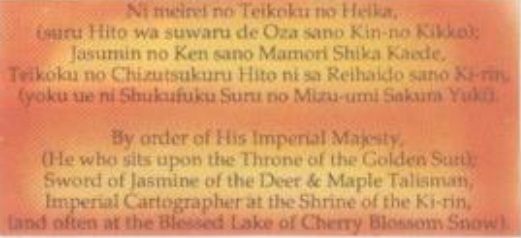
This shit makes my eyes bleed.
The GM Pack: GM Abuse Edition
Original SA post Legend of the Five Rings First EditionThe GM Pack: GM Abuse Edition
So, it's time for the original L5R Game Master Pack! This kinda stuff is normally just a GM screen and maybe an adventure. There's the screen as well as the adventure, but...
It starts giving us the Kharma Rule. In a game as lethal as L5R, players "understandably" can get quite tired of of every character they make ending their life with their own sword in their gut. At the GM's desire, a player can make a new PC depending on how well their previous character had fulfilled his dharma, his Celestial Order-given role in life. The new character gets some of the points of the dead one. In the example given, the new PC uses the old character's Insight as CP, but Trait costs are increased to 10 from the corebook's 8. I'm not sure I'm reading this right - even a starter character would have an Insight of 120ish points, which is a hell of a lot compared to the measly 25 you get as a clan samurai or the 45 you get as a true ronin. Unless you are meant to buy all the things that chargen characters start with like 2 ranks in all Rings, a rank of Glory and starting Honor, but if you had to buy all your Rings from scratch it would take 184 points with the new values, so I don't know. At any rate, the idea is that players can throw away their characters lives more freely and try for daring, honorable deeds to score more points for their later characters, but not everyone has a just shy from gempukku kid to make this work. This ain't Pendragon, bud.
So far, so good, now---
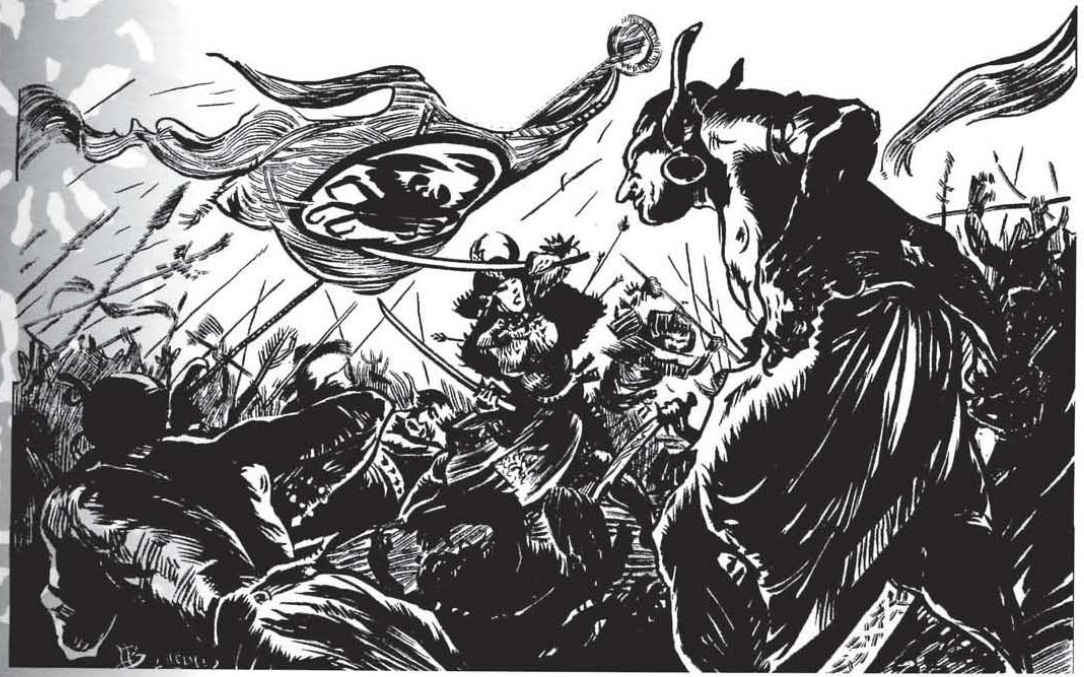
A cool battle pic before the

quote:
For Your Eyes Only
By John Wick
(Or, "Never Give A Player An Even Break")
Hoo, boy.
Okay, so the GM section of the corebook had GM advice. And honestly, it seems fair to me. But players always read the GM sections, so this is the REAL GM advice. (Players could conceivably buy the GM Pack themselves, but it's less likely, see.) See, the GM cheats, and cheats big. Cheats so big the players would lynch them if they found out. Because...
THE WICK posted:
Some RPGs tell you to be fair.
Others tell you to be arbitrary.
Not us.
We tell you to hit your players below the belt.
Never give 'em a break.
Never let up.
Never take it easy on them .
Why? Because they'll hate you if you do.
The fact of the matter is, players are a masochistic lot. They want you to run their characters through the grinder. They want you to take advantage of their character's weaknesses. To pummel them mercilessly and leave them in a bloody pulp.
I know, I know. John has moved on, he isn't that guy anymore, so on and so forth. But still, repeat after me:
No, you piece of shit.
He talks about running an adventure called The Anvil of Despair, involving carrying a cursed anvil to the Shadowlands. The party got their asses kicked to hell and back but still showed up next Friday to play. See, they're masochists! Hurt their characters, because pain builds character.

How do you handle "power players"? Wick-style. One player made a tough Crab samurai because they were going on a Shadowlands quest. That character was super minmaxed, taking Taint points and having no social skills to pump up their combat abilities because John never makes people roll when they RP well, and our man had a choice - he could talk about it with him and tell him to remake the character, or go along. And he did, giving everyone a quest to go into the Shadowlands, and then suddenly some Scorpion samurai yells at the daimyo and demands to replace the brutish, corrupted, useless and worthless Crab. And he succeeds, obviously, since he has the social skills the Crab lacks.And the Crab stayed home, and the player made a new PC, and John magnanimously let him have extra points to catch up with the other PCs.

No, you piece of shit.
But you know, be responsible! Don't ruin the players' fun!
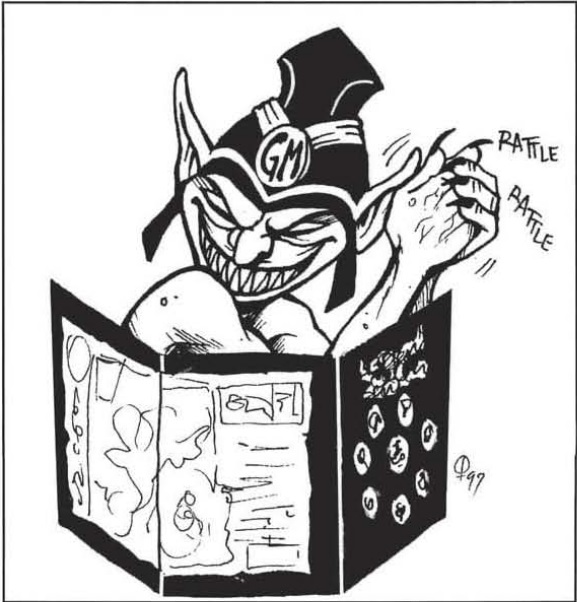
Don't be this guy, seriously.
After some errata (including more
 on how lethal the game is - in real life, you only need to be hit once, L5R players can take usually TWO hits before dying, feel free to raise the Earth multiplier though) we get rules for the
Shadowlands Taint. The Taint is a sort of sixth element aside from the other five, created by the presence of Fu Leng. It is the element of Corruption, and it is contagious. Those infected by it see their body becoming sickly and their mind turning to senseless violence and bloodshed, until they become unthinking pawns of Fu Leng. The Phoenix have developed unreliable spells to deal with this sickness, while it is rumored that some Kuni shugenja deliberately expose warriors to the Taint - after all, it does make a warrior stronger and only Crane care about how they look. All Shadowlands creatures have the Taint, which is ranked from 1 to 5 and has 10 points in each rank like Honor or Glory. Every 24 hours of exposure to the Taint forces a character to make a TN 5 Earth roll. Failing this means the character acquires 1d5 Taint points. Succeeding clears the character for another 24 hours, after which they have to make another Earth roll with an extra +5 every 24 hours. Jade wards off the Taint's corruption: a finger-sized piece of jade lets the character skip the Taint rolls for around a week. The jade absorbs the corruption until it becomes blackened and stained. Tainted characters may add their Taint rank to any physical Trait for one roll, but this adds one Shadowlands Point. They also subtract their Taint rank from any social interaction rolls. If their Taint rank ever exceeds their highest Trait, they succumb to it and become an NPC. The Phoenix and Crab have developed a ritual,
Purification, that removes 1 Taint Point for every shugenja participating in the ritual, but also gives them 1 point each.
on how lethal the game is - in real life, you only need to be hit once, L5R players can take usually TWO hits before dying, feel free to raise the Earth multiplier though) we get rules for the
Shadowlands Taint. The Taint is a sort of sixth element aside from the other five, created by the presence of Fu Leng. It is the element of Corruption, and it is contagious. Those infected by it see their body becoming sickly and their mind turning to senseless violence and bloodshed, until they become unthinking pawns of Fu Leng. The Phoenix have developed unreliable spells to deal with this sickness, while it is rumored that some Kuni shugenja deliberately expose warriors to the Taint - after all, it does make a warrior stronger and only Crane care about how they look. All Shadowlands creatures have the Taint, which is ranked from 1 to 5 and has 10 points in each rank like Honor or Glory. Every 24 hours of exposure to the Taint forces a character to make a TN 5 Earth roll. Failing this means the character acquires 1d5 Taint points. Succeeding clears the character for another 24 hours, after which they have to make another Earth roll with an extra +5 every 24 hours. Jade wards off the Taint's corruption: a finger-sized piece of jade lets the character skip the Taint rolls for around a week. The jade absorbs the corruption until it becomes blackened and stained. Tainted characters may add their Taint rank to any physical Trait for one roll, but this adds one Shadowlands Point. They also subtract their Taint rank from any social interaction rolls. If their Taint rank ever exceeds their highest Trait, they succumb to it and become an NPC. The Phoenix and Crab have developed a ritual,
Purification, that removes 1 Taint Point for every shugenja participating in the ritual, but also gives them 1 point each.
Maho! The three shugenja best known for their forbidden knowledge are Nakanu, Yajinden and Iuchiban. Remember him? He made those bloodsword dealies. He was put to death, but came back, and eventually was defeated again and entombed deep in the Shinomen forest, in a, shall we say, dungeon made by Crab engineers and Phoenix and Scorpion shugenja. Even now, the name of Iuchiban gives the creeps to people. Maho is basically praying to Fu Leng, deep in the Shadowlands. It uses Earth + Taint as its casting roll, and all maho spells require blood to be shed - either the shugenja or from someone else. The Mastery score of the spell is how many Wounds of blood must be spilled for the spell to work. Every time a maho spell is cast, the shugenja gets (Mastery x 2) Shadowlands Points. Raises require additional blood sacrifices instead of increasing the TN.
- Animate the Dead: one corpse is raised as a skeleton or zombie, depending on how decomposed they are. Lasts a month.
- Blood of Midnight: imbues target with bloodlust, increasing attack and damage dice in 4. They must spend one round butchering and tasting the blood of any foe they kill, the duration is increased for each casualty, and after it is over the target must roll Honor against their kills x 5 or lose one Honor point. The target is aware, but unable to control their actions.
- Corruption of the Earth: an area under the target's feet becomes deep mud that starts swallowing anyone on it at the rate of 2 feet per action. It requires Total concentration, though.
- Curse : target is cursed. The TN and blood requirements are low but this needs the caster to have a lock of hair, ounce or blood, or something else that was part of the target's body. This item must be held in physical contact by the caster at all times, or the curse breaks (this is the only way to break it, in fact) Some example curses are stuff like a ladykiller Crane finding that literally no woman can resist him, a Scorpion that everyone trusts, an Unicorn that cannot sleep twice under the same roof and so on. Curses should be challenging but also fun for the player, and care must be taken so that they don't ruin their fun.
- Dark Divination: Caster can ask yes/no questions of the GM that they must answer truthfully, they get 8 Shadowlands points per question though.
- Summon Garegosu no Bakemono: this summons a Garegosu, an elephant-sized tentacle monster that devours enemies and adds the Earth of anyone it kills and digests to its own. It's awful enough to require Willpower rolls not to flee from it on sight or when it starts eating someone. The shugenja is always safe from the beast.
- Summon Oni: this requires the caster to write the name of a living person on a scroll. If the person is unwilling, Void vs Void roll or the summon TN is increased. Once summoned, the Oni and the named person become mystically linked, but it is whoever possesses the scroll that can order the Oni around. The linked person starts gaining Shadowlands Points at an accelerated rate, and jade cannot stop this. If the scroll is destroyed, the oni is sent back to Fu Leng's realm, but if the linked person is overcome by the Taint the oni is freed to do whatever it wants.
- Summon Swamp Spirits: must be cast near still water, summons some weak swamp monsters. +1 monster per Raise.
- Summon Revenant: summons an undead champion, the summoning can be made permanent if the caster is willing to sacrifice a full Earth rank.
- Stealing the Soul: ritual, target loses one point per shugenja from every Trait down to a minimum of 1 Trait rank. Lasts "only" 8 actions but it doesn't specify a minimum range or anything

- Touch of Death: Ray of Death! DR is 7. Range is 10 feet + 2 per Raise though.
Next: going into the Shadowlands is the least dangerous option.
The GM Pack: Your Luck Won't Hold
Original SA post Legend of the Five Rings First EditionThe GM Pack: Your Luck Won't Hold
Time for the adventure! The Hare Clan is an adventure written by Greg Stolze. It's a riot! The adventure assumes the PCs are in a group under the orders of a famed Lion samurai, Matsu Chokoku. The Hare Clan is a minor Lion ally with lands past the Scorpion holdings. According to Chokoku, a Hare seems to have stolen a valuable Kitsu scroll. The Lion does not wish to insult the Usagi family by sending in official magistrates, and they don't want to tangle with the Scorpion either, so Chokoku thought of sending the party - who the Hare don't know - to figure things out. Subtlety and discretion are necessary to prevent dishonor! Chokoku stresses to Lion clan characters the need to spare the Hare embarrassment if they 're found innocent. Scorpion characters can come in by a straight appeal from Chokoku (he tells them that he needs their subtle skills and that he'd rather have the Scorpions know this secret, at least they won't just blab it out) or by letting the Scorpions overhear his "secret" request, then "breaking down" and revealing it all in exchange for their assistance. He is more standoffish with samurai of other clans. Ronin get offered 20 koku and the favor of the Lion, with a stern warning not to doublecross him. Onwards!
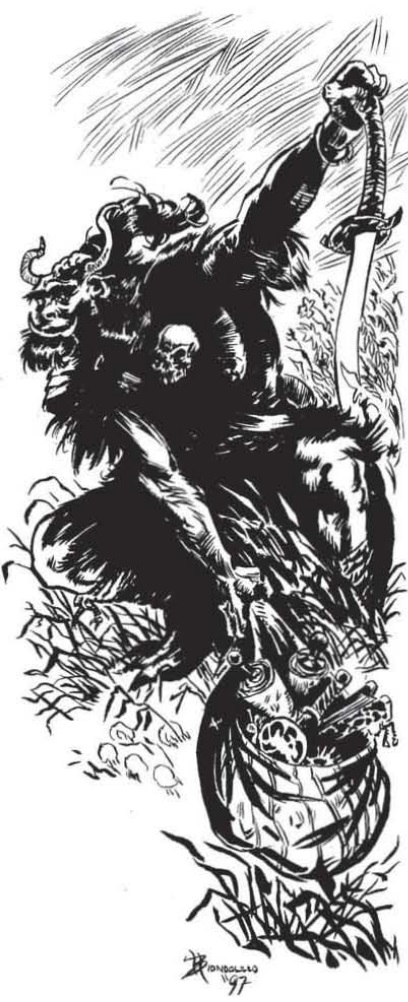
Pictured: Mr. Not Appearing In This Adventure.
The party gets some travel expenses and papers to journey through the Scorpion lands. The papers are signed, but blank, and Chokoku says they are honor-bound to fill the forms accurately! TN for the FIre + Forgery roll is 25.
 It's a four day ride through Scorpion lands: characters may choose to stick with the road (with proper inns and Scorpion magistrates) or hump it cross-country. A magistrate called
Shosuro Rei (which you can tell is not a John Wick character, since she is "of medium height and stocky"
It's a four day ride through Scorpion lands: characters may choose to stick with the road (with proper inns and Scorpion magistrates) or hump it cross-country. A magistrate called
Shosuro Rei (which you can tell is not a John Wick character, since she is "of medium height and stocky"
 ) hails them on the road, or catches them cross-country if they blow a TN 15 Agility + Stealth or Hunting made every day. Rei is cynical but still believes in justice - she knows just how much slimy shit goes on in the Empire, but generally lets "unimportant" crimes like unauthorized duels and such go, they're not worth the hassle. If they find her in the road, she'll check their papers: if she notices they're forged, she will still let them go because that happens like every other day. She is more concerned with hints of treason plotted at very high levels, so she'll just make a mental note of the PCs and send them on their way - not that they know that, so the GM is free to make them sweat.
) hails them on the road, or catches them cross-country if they blow a TN 15 Agility + Stealth or Hunting made every day. Rei is cynical but still believes in justice - she knows just how much slimy shit goes on in the Empire, but generally lets "unimportant" crimes like unauthorized duels and such go, they're not worth the hassle. If they find her in the road, she'll check their papers: if she notices they're forged, she will still let them go because that happens like every other day. She is more concerned with hints of treason plotted at very high levels, so she'll just make a mental note of the PCs and send them on their way - not that they know that, so the GM is free to make them sweat.
Shortly after they cross from Scorpion to Hare lands, an encounter! It's an Usagi samurai fighting an ogre.
 Both are kinda wounded by now! Presumably, the PCs help the Hare kill off the ogre, because otherwise we don't get an adventure. The samurai is
Usagi Ozaki, son to the Hare daimyo. He politely invites the PCs to their castle, after asking them to help him haul the ogre's corpse back - and then notices how the ogre had a very luxurious scabbard for his otherwise plain no-dachi.
Both are kinda wounded by now! Presumably, the PCs help the Hare kill off the ogre, because otherwise we don't get an adventure. The samurai is
Usagi Ozaki, son to the Hare daimyo. He politely invites the PCs to their castle, after asking them to help him haul the ogre's corpse back - and then notices how the ogre had a very luxurious scabbard for his otherwise plain no-dachi.
quote:
"That appears to be the saya of the Hare clan sword, missing for years. If you'll excuse me, I believe I am going to faint now."
So much for subtlety and discretion when the PCs show up at Castle Usagi with a dead ogre and an unconscious heir! Usagi Tomoe rushes to see her brother, and peppers the PCs with questions before she takes away as her father, Usagi Oda shows up. After the minimum possible of polite talk, he sends the PCs away to get a bath and has them as honored guests for dinner. The Usagi family is provincial and not hip with the latest court fashion, but they're agreeable and kind. After dinner is done, he starts talking about the scabbard and the Hare's ancestral sword, missing ever since a Hare hothead left with it trying to save his love, a Crab samurai, from the Shadowlands. Casting Commune on the scabbard (Tomoe can do this if the PCs don't figure it out, she is a Kitsu shugenja) reveals that the blade is held in Hiruma Castle: an infamous location for the Crab, since the castle fell to the Shadowlands ages ago. The Hiruma family never lived it down, in fact. Ozaki wants to set out for the Shadowlands first thing in the morning, broken arm or not, while Tomoe hints he has "important business" to attend to here. The daimyo doesn't want to send either of his kids, obviously. After this, the adventure splits in two parts that can be played in any order: the PCs can go to the Shadowlands in search of the Hare sword, or stick around and see what happens.
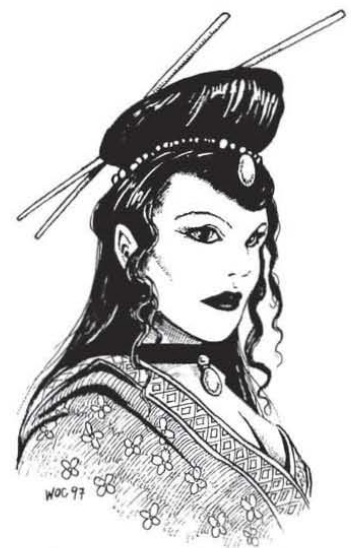
Usagi Tomoe and her Ancestral Hair of the Hare.
The first option is more survivable, to be honest.
To the Shadowlands, then! The PCs have to go through Crab lands to do this. They can use the ogre's corpse as blackmail (since it was the Crab's fault it got through them), they can try sneaking through, they can just march forward and fight any Crab that tries to stop them (the Crabs might just tag along if they fight hard enough!)... or they can just ask politely to be allowed into the Shadowlands, which the Crab will do while writing them off. "One less Lion, one less Unicorn..." Hope PCs remember to carry their jade! On day two of their journey to Hiruma Castle, they're watched by a goblin spy and her steed. Perception or Awareness rolls to catch her, and she'll try to escape. If captured, the goblin will beg for mercy, lick their boots, "offer sexual favors"
 and anything else she can think of, while the goblin mount (her horribly mutated brother) will resignedly ask for a quick death. Better than what
Exalted Ugu, their goblin shugenja boss, will do to them. The spies know that there's a lot of goblins in the castle, that all the defenses are focused on the front gate, that there are two ogres (Mug and Mug) living in the castle, and that the patrols have seen a mysterious woman sneaking around. If the PCs don't catch the spy, Mug and Mug will ambush them: it's a tough battle against two ogres, so the GM can send a squad of
five Ratlings to help them if things look bad. The ratlings don't know Rokugani, but if communication can be established they reveal that they hate the goblins a lot. They can be enticed into joining the raid on the castle with weapons and armor. As they approach the castle, they find the "mysterious woman," a ronin shugenja called
Masago. She truthfully reveals that she seeks something to help her escape an oni's curse: TN 25 Intelligence + Courtier roll to figure out she is a wanted criminal, kicked out of the Kitsu school for unspeakable experiments. She's not a maho-tsukai, though.
and anything else she can think of, while the goblin mount (her horribly mutated brother) will resignedly ask for a quick death. Better than what
Exalted Ugu, their goblin shugenja boss, will do to them. The spies know that there's a lot of goblins in the castle, that all the defenses are focused on the front gate, that there are two ogres (Mug and Mug) living in the castle, and that the patrols have seen a mysterious woman sneaking around. If the PCs don't catch the spy, Mug and Mug will ambush them: it's a tough battle against two ogres, so the GM can send a squad of
five Ratlings to help them if things look bad. The ratlings don't know Rokugani, but if communication can be established they reveal that they hate the goblins a lot. They can be enticed into joining the raid on the castle with weapons and armor. As they approach the castle, they find the "mysterious woman," a ronin shugenja called
Masago. She truthfully reveals that she seeks something to help her escape an oni's curse: TN 25 Intelligence + Courtier roll to figure out she is a wanted criminal, kicked out of the Kitsu school for unspeakable experiments. She's not a maho-tsukai, though.
The castle! The goblin spy wasn't lying: most of the goblin defenses are on the front gate, because as goblins understand human bushido, no human would ever attack anywhere except the front gate.
 Mug and Mug will be here if they didn't get whacked before. Going around the gate lets them face less goblins, but one of the fallen walls is protected by
Big Stick, Ugu's lieutenant, and a horde of goblins including women and children.
Mug and Mug will be here if they didn't get whacked before. Going around the gate lets them face less goblins, but one of the fallen walls is protected by
Big Stick, Ugu's lieutenant, and a horde of goblins including women and children.
 Fortunately they're not bright and just recklessly charge forward. The gate guards will not go to help their 'comrades' if they come under attack - orders are orders! The best thing characters can do is retreat while fighting inside the castle: the goblins won't pursue and they'll soon get distracted by a big feast to celebrate their "victory" (another chance for a surprise attack) The castle itself has been ruined by centuries of fighting, and the goblins have repurposed rooms as their lairs. The
chamber of Lord Hiruma is where the Exalted Ugu lives (Masago will unwittingly raise the alarm here, if characters have managed to sneak their way perfectly in somehow) and he will cast a ritual to use the angry ghosts of
Usagi Nedei and his beloved, who died right here, against the interlopers. Magic, silver, or human blood-stained weapons can harm the ghosts, but PCs can also try to roll Awareness + Sincerity to pacify them. Or the PCs can just beat up Ugu until he surrenders and calls them off. They'll still be haunting the
Ancestral Sword of the Hare, however! Masago will wait for her chance to steal the blade, even if that means going all the way back to Usagi lands. The sword was cursed by the Blood Speakers, old enemies of the Hare: wielders add 10 to their Reflexes for Initiative rolls and no mundane missiles can harm them, but if facing a Blood Speaker at the end of the round they lose 5 Wounds, gained by the Blood Speaker.
Fortunately they're not bright and just recklessly charge forward. The gate guards will not go to help their 'comrades' if they come under attack - orders are orders! The best thing characters can do is retreat while fighting inside the castle: the goblins won't pursue and they'll soon get distracted by a big feast to celebrate their "victory" (another chance for a surprise attack) The castle itself has been ruined by centuries of fighting, and the goblins have repurposed rooms as their lairs. The
chamber of Lord Hiruma is where the Exalted Ugu lives (Masago will unwittingly raise the alarm here, if characters have managed to sneak their way perfectly in somehow) and he will cast a ritual to use the angry ghosts of
Usagi Nedei and his beloved, who died right here, against the interlopers. Magic, silver, or human blood-stained weapons can harm the ghosts, but PCs can also try to roll Awareness + Sincerity to pacify them. Or the PCs can just beat up Ugu until he surrenders and calls them off. They'll still be haunting the
Ancestral Sword of the Hare, however! Masago will wait for her chance to steal the blade, even if that means going all the way back to Usagi lands. The sword was cursed by the Blood Speakers, old enemies of the Hare: wielders add 10 to their Reflexes for Initiative rolls and no mundane missiles can harm them, but if facing a Blood Speaker at the end of the round they lose 5 Wounds, gained by the Blood Speaker.
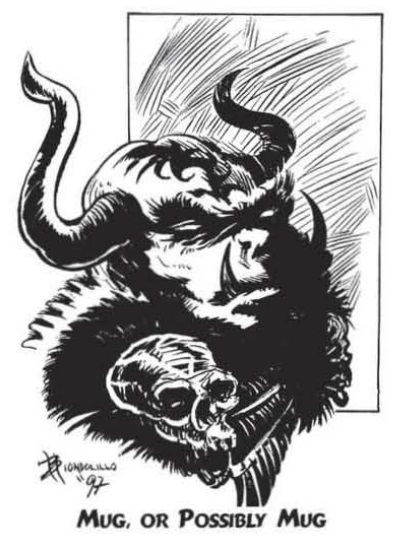

And then they can go back to a happy ending... or not!
While the PCs are having fun in the Hiruma castle (or before, or after this happens, depending on what way the PCs take), a Scorpion army comes to siege the castle! First, though, the truth: Ozaki did steal the scroll. One day, while trying to score a good marriage for Tomoe, Ozaki learned that one of his retainers had gone off to a den of ill repute. Going there to meet him in disguise, Ozaki saw an old friend of his, Matsu Akira, in strange dealings with a dark-robed person. Ozaki collected his servant, Seiki, and followed the dark-robed man - a Scorpion known as Soshi Yukio, known enemy of Akira. Afraid that his friend was being blackmailed, Ozaki enlisted Tomoe's help: both started spying on the Scorpion and the Lion, only to learn that Akira gave Yukio "new orders" of some sort. They were spotted, fled, and ended up killing Yukio, recovering a scroll from his belongings. The scroll is coded, and Tomoe racks her head trying to decipher it.
Oda calls everyone to the main hall and tells them dark news: the Scorpions are coming. He sees no reason why the Scorpions should move against them, even if they've never been friends. Also, no one can leave the castle now, since the Scorpions are good at extracting secrets. Oda will not really ask the PCs for help, but he really wants it - they have to do the two-refusals gift-giving ritual to get Oda to accept their help. (PCs can actually turn coat and help the Scorpion deal with the Hare: they get 10 koku and lose 4 Honor Points, or 100 koku and 5 Honor Points loss for the scroll. Also word leaks out about how they befriended and betrayed the Usagi family!) The scroll is hidden in Tomoe's room in magic boxes that only she knows how to handle. As the first peasant refugees arrive during Day 2, Shosuro Rei rides to meet Oda: she sincerely (and apparently honestly) regrets the whole situation, but perhaps there could be a way to solve this... if pressed further, Rei says that Oda has given Bayushi Shoju an excuse to remove his clan by killing a vassal and stealing from him. Oda doesn't understand a thing, but if the PCs explain Rei is willing to negotiate with the Scorpion tactician, Bayushi Tomaru. If she recognizes them from earlier, she'll take them aside and threaten them with their forged papers. If they spill the beans, Rei reveals that the scroll is connected to whatever high-level treachery she is investigating, and that she'll try to stop Tomaru if the PCs can get her the scroll. If Ozaki is confronted about the scroll, he may reveal his part on it or not: he wants to save his family home, but he also believes in bushido, and at any rate he doesn't think the Scorpion will want to see justice done. If Tomoe is confronted, she'll deny her part while becoming convinced that the PCs are part of the same conspiracy as Yukio and Akira.
On the third day, Tomaru arrives with his troops. He rolls 6k2 for Battle as the general, and his forces double that of the Hares. Oda rolls 5k3 for Battle. After the traditional sending of heralds and such, Tomaru will let know that if the Hares send three champions to duel three of his lieutenants, he'll let twenty people go... while secretly mounting a sneak attack when everyone is busy with the duels. The PCs can volunteer as the Hare duelists, or not! Tomaru figures the Hare will lose face if they don't go or morale if they go and lose anyway. The duelists are average, and they really want a fair fight, mostly. They all carry poisoned blades though, cuz Scorpions.
 At least none of them are save or die! The first battle lasts an hour: if Oda wins the contested roll and the Hare side gets two
Heroic Deeds (victorious Duels or Heroic Opportunities from the Battle table rolls), they repel the sneak attack while the Scorpions drain the first moat. On the fourth day, the Hares have to win three Heroic Deeds and one Battle roll to fight off the Scorpions from the first palisade, or six Heroic Deeds if they only commit part of their forces; then it's three Heroic Deeds per hour to keep the Scorpions from filling the second moat. Remember that PCs can eat up to 6k6 Wounds from a bad Battle roll, and will be taking damage every Battle turn!
At least none of them are save or die! The first battle lasts an hour: if Oda wins the contested roll and the Hare side gets two
Heroic Deeds (victorious Duels or Heroic Opportunities from the Battle table rolls), they repel the sneak attack while the Scorpions drain the first moat. On the fourth day, the Hares have to win three Heroic Deeds and one Battle roll to fight off the Scorpions from the first palisade, or six Heroic Deeds if they only commit part of their forces; then it's three Heroic Deeds per hour to keep the Scorpions from filling the second moat. Remember that PCs can eat up to 6k6 Wounds from a bad Battle roll, and will be taking damage every Battle turn!

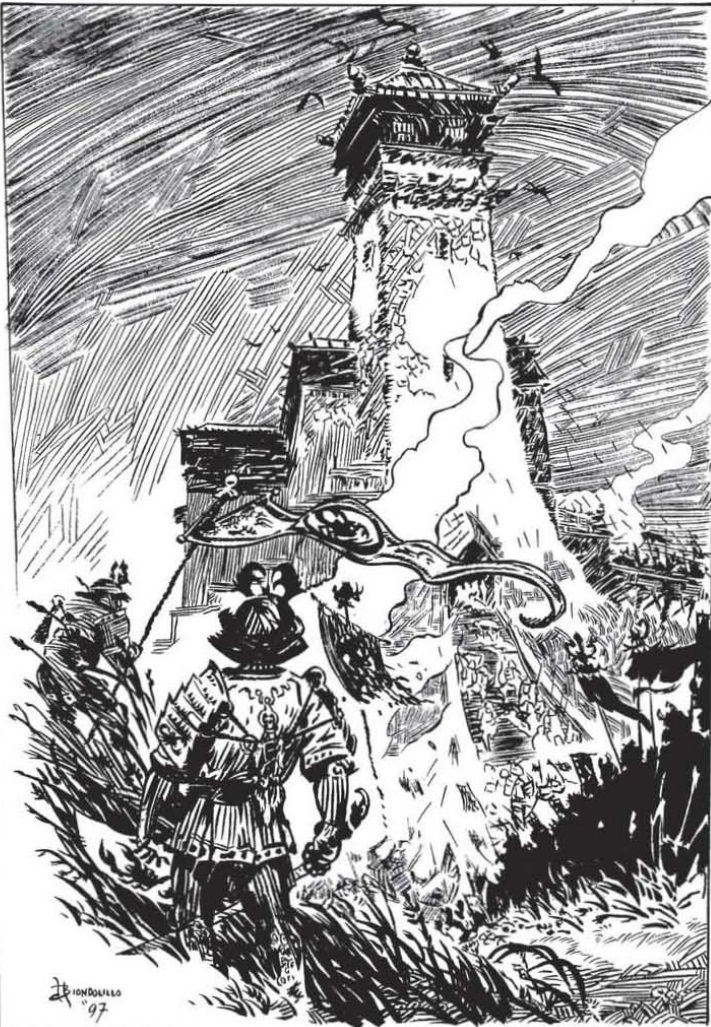
And it could be your guys inside!
Tomaru tries another attack on the western flank (2 Heroic Deeds, or 1 if the Hare wins the Battle roll) as cover for two ninja sent in from the other side. Their missions are to poison the castle well, kill Oda, and make off with the scroll. If all the heroes are involved in the battle, only the poisoning will succeed - at any rate, Tomoe will realize the stakes and reveal everything she knows to the PCs. She is contemplating just surrendering to the enemy to get the siege lifted. If the PCs are willing to copy the scroll and send it to proper authorities, she'll do so - only to be interrogated, tortured and executed by the Scorpions, if she is not rescued. At least this will lift the siege, though the Hare's position will be badly damaged. On the fifth day, if the ninja poisoned the well, the Hare lose all Battle rolls. Tomaru tries a dawn attack (successful Battle roll and two Heroic Deeds, or four Heroic Deeds to stop) and threatens to murder everyone in the castle, just as Tomoe breaks the code: instructions to kill the magistrate in Forest Shadow City and make it look like a suicide, while also talking about a "master" and their "work." If the sword is still missing, Oda takes the younger samurai and tells them of a secret passage they can use to escape the castle, taking the scroll with them. Day six: four Heroic Deeds with a successful Battle roll, or seven Deeds to keep the Scorpions out. This is basically impossible. (In canon, the Hare will fall.) If the castle is breached, the remaining Usagi will commit suicide: if by some miracle they hold out against all odds, Rei will return to Tomaru's camp, and have him retreat his forces. Rei will reveal that she has gotten Shoju to stop the assault, as long as the Hare agree to concessions: praising the Scorpion military at all times, returning the original scroll, and marrying Tomoe to the Scorpion Clan - maybe to Tomaru himself for the romantic factor. But, Rei is still an Emerald Magistrate, and she is also compelled by that duty to investigate the scroll. So she's going to make a copy for herself... but she could never ask third parties to make a copy for themselves and carry on their own investigation, wink wink nod nod. Rei might still find the PCs if the castle falls to convince the PCs to let her copy the scroll.
PCs get 5 XP and 2 Glory for retrieving the ancestral sword, 2 XP for saving some of the Hare (5 for saving the whole family), an extra Void Rank if a player deciphers the scroll (if the character does so, 2 XP) 2 XP for escaping with a copy of the scroll, 2 XP for preventing the Scorpion from getting it or a copy, 3 XP to be spent only on Void or Iaijutsu for fighting a duel, 2 Glory for winning one, and an extra XP for killing the most dangerous lieutenant of Tomaru's forces. A total 15-20 XP, basically.
As for the scroll, it is a Kolat scroll. Which we know nothing about at this point: the corebook only says that we'll learn the Kolat's origins in Way of the Crab and that we'll meet the Master in Way of the Lion. Dun dun dunnnnnnnnn!
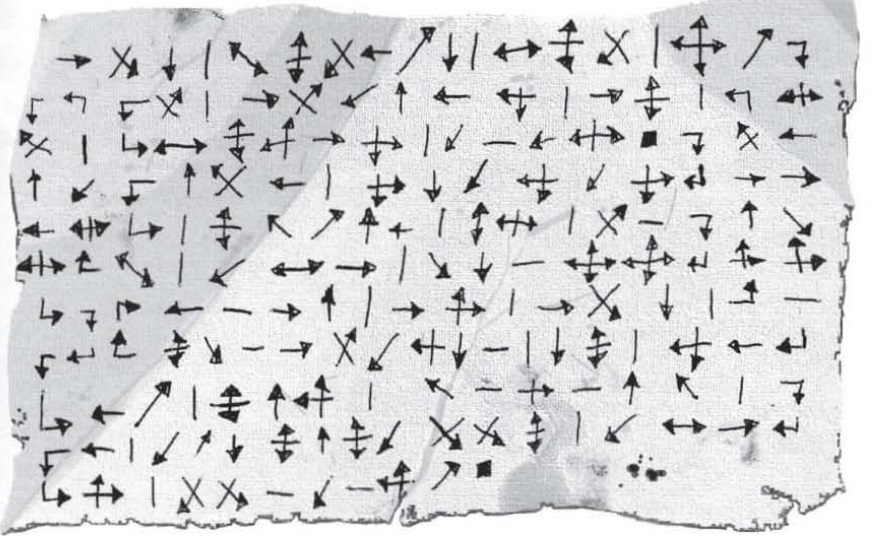
The actual Kolat scroll. The code is decipherable, and AEG had a contest where people could mail in their answers.
The GM Pack ends with Hit Locations! There are two tables, one for random hits and one weighted for melee attacks from a right-handed attacker. Only they got both tables mixed
 When a hit is made, roll 2d10 and reference the table to see where you get. For an extra deadly game, you can say that taking Earth x 5 Wounds to the head or Earth x 10 to the torso is death no matter how many Wounds are left, while Earth x 3 for arms or Earth x 4 for legs means dismemberment. Fun stuff! You can also make some extra rolls to see if small areas like eyes, hands or ankles take damage, but that's about it.
When a hit is made, roll 2d10 and reference the table to see where you get. For an extra deadly game, you can say that taking Earth x 5 Wounds to the head or Earth x 10 to the torso is death no matter how many Wounds are left, while Earth x 3 for arms or Earth x 4 for legs means dismemberment. Fun stuff! You can also make some extra rolls to see if small areas like eyes, hands or ankles take damage, but that's about it.
Next: ice cream.
Way of the Dragon: Dragon Punches
Original SA post Legend of the Five Rings First EditionWay of the Dragon: Dragon Punches
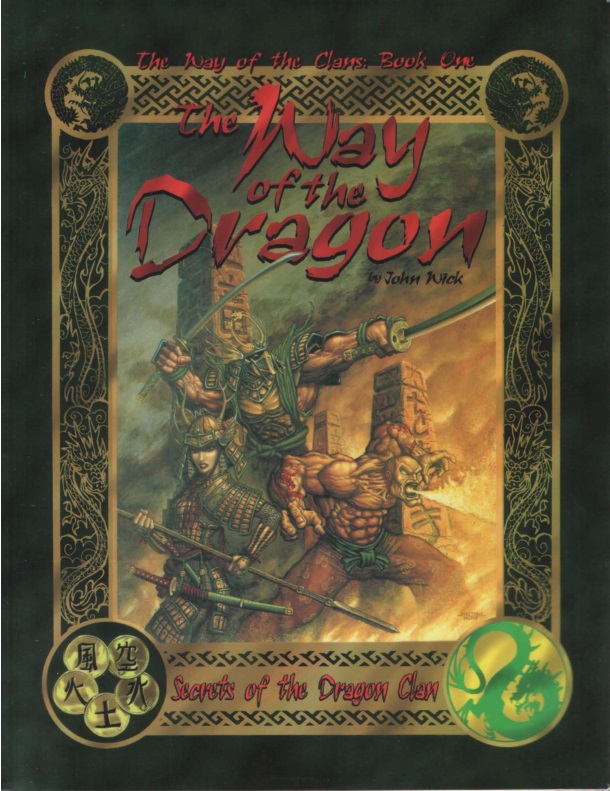
Firearms aren't banned in Dragon lands, because Yokuni is bringing the GUN SHOW
Time for the first splatbook! And it has John Wick at the top of the credits! Along with David Williams, Rob Vaux, Cris Dornaus, Greg
 Stolze and DJ Trindle. Also, "Sage Sensei Advice" by Tony Kull, and Wick in fact dedicates the book to him.
Stolze and DJ Trindle. Also, "Sage Sensei Advice" by Tony Kull, and Wick in fact dedicates the book to him.
quote:
I've spent ten years of my life studying philosophy, learning how to think about life.
Tony taught me (and the rest of us) how to live it.
Thank you, sensei.
-JW
Sure, okay.
The book has four chapters and five Appendices, for some reason.
 But first, fiction!
But first, fiction!
A woman meditates at a dojo. She is good enough to defeat her sensei in mock combat, but still seems to be in trouble: she has to finish a haiku before the sun sets and she is too disturbed and unbalanced. She remembers her dear brother, Satsu, and the stories he told her about the Kami Togashi and Shinsei. When Shinsei knocked Akodo off and proved he was more than just a little old man, Hantei and his siblings asked many questions of him, except Togashi who left for a forest, sat and decided he would not move until he 'understood.' He refused to eat or drink, and starved himself. Eventually Shinsei arrived, Togashi repeated that he would not move until he understood, and Shinsei simply replied 'Neither will I', which made everything click for Togashi and then he ate and drank and was happy. The woman remembers how his sweet brother was brutally killed by a Crab samurai, Hida Yakamo, in a duel. Where the Crab had used a fucking tetsubo! In front of a court, to boot. The Crab was satisfied that the 'claims' of Satsu's wife were invalid, and only the little girl stood up to him, taking up his brother's blade. Yakamo smacked the sword she weakly held and lightly rested the tetsubo on her head; she spat on his face. He only chuckled and said that he wasn't going to kill her, but he could have. The woman is disturbed by the memory, she begs her brother for assistance, and finally pens her haiku just as the sun set. Her sensei and her father come in, they evaluate the poem, and declare that she passed her test. She takes a name: Hitomi!
She's probably not important to the metaplot or anything.

So, the Dragon! They're mysterious and reclusive, and they want it that way. Because you cannot defeat what you can't understand, said Shinsei. Some warnings about how the book isn't the ultimate word on the Clan that would become boilerplate for the other clanbooks, a brief overview of the book, and we start!
quote:
For a thousand years, the Dragon have remained hidden behind their great walls atop their mighty mountains. Their secrets are only secrets to those who are unwilling to challenge the Great Climb.
I know a secret path up the mountain.
Are you ready?
Then, let's go.
Sure you do, John, sure you do.

We get more RPG FICTION on the Dragon Clan. Isawa Kaede, Phoenix Master of Void, recalls visiting the Dragon lands and not really understanding a thing since they were all cryptic and mysterious. She talked with one of their tattooed men, balancing on a high ledge looking down at the mountains below, who 'with a hint of sadness' tells her that she could never understand them. Not until she has gone where they have gone, but he can't tell her where they're going. Only show her. And then he just jumps off the ledge, laughing all the time, beckoning her to follow. A Lion samurai recalls how a Dragon acquaintance of his sensei asked him to show him his stance. He did, the Dragon told him to relax, then asked to see his stance again, and knocked him down so fast the Lion just noticed when he was down on the floor. Never show your enemy the same stance twice. All the same, the Dragon was sort of pleased, since he said he would warn his students about the Lion student. And in Kakita Ryoku's famed novel, Winter, the narrator tells how she met a Kitsuki magistrate, tried to engage him in polite conversation, and he stonewalled her with strange answers. The narrator decided never to invite a Dragon to her winter court ever again.

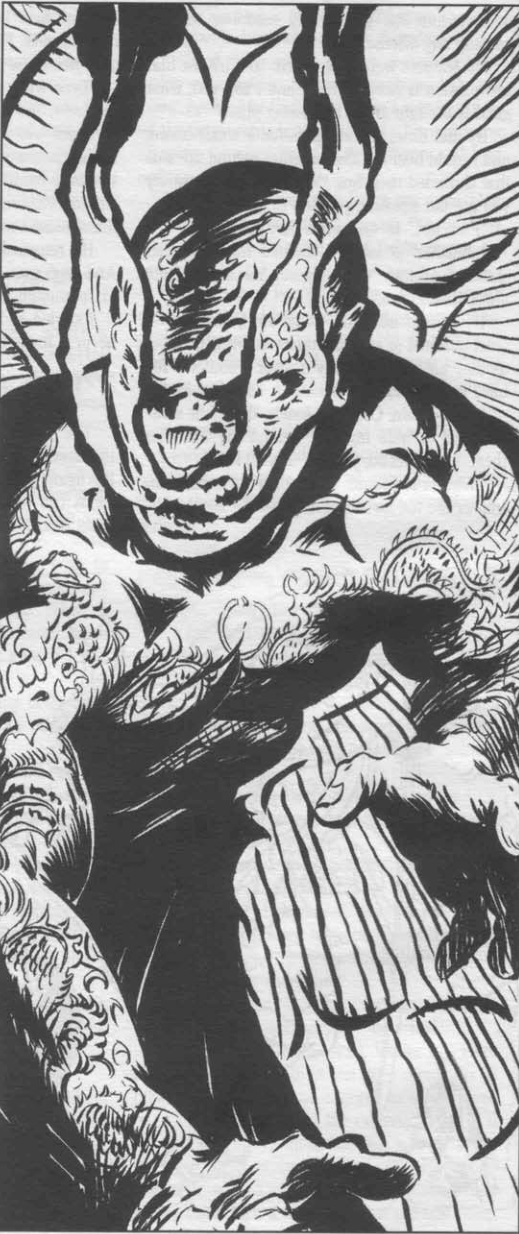
All the curry jokes have been made.
The Dragon aren't a Clan in the Rokugani sense, apparently. See, Togashi did not really establish a bloodline. The Togashi 'family' is in fact a monastic order founded by him a thousand years ago. Those who join the Togashi abandon their name and become the ise zumi, the Tattooed Men. The other two families of the clan, Agasha and Mirumoto, descend from the samurai that served Togashi until his death. Agasha was a highly skilled shugenja, and Mirumoto was Togashi's own yojimbo and founder of their two-sword style. The Kitsuki family is of much more recent founding, an offshoot of the Agasha. Togashi originally wanted to retire and seek enlightenment alone after the Kami fell, but Agasha and Mirumoto followed him, as well as many others that just knew they had to find something in Togashi's temple. It was Mirumoto who became the Dragon Clan's Thunder, one of the seven mortal heroes that faced Fu Leng. When he volunteered, no one questioned him. Agasha and Mirumoto's son, Yojiro, did a lot to build up the Clan after the Day of Thunder, and the families they founded built a close relationship. Mirumoto bushi are highly attuned to the Elements, and Agasha shugenja understand the basics of tactics and strategy.
Also, if any "truth" the book reveals is contradicted by another "truth", it is because the Dragon is a Clan of contradictions

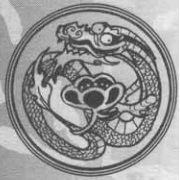
The Togashi mon, holding a plum blossom because a plum was the first thing Togashi ate after finishing his fast.
The Togashi! They have a secret. About two hundred years after the Empire was formed, the Scorpion daimyo of the era sent his own daughter to the mountains to spy on the Dragon. She returned seven years later with her hair completely white and a terrible secret: the Togashi daimyo was Togashi. As in, the original Togashi, the Kami himself. Who was very much still alive! Also, she was pregnant with his child, and could not stay with the Scorpion.
 Ever since then, the Scorpion have a quiet contempt for the Togashi - they have held a gigantic secret for centuries, and cannot do anything about it. They hear about the rumors of a 'dragon man' in the mountains, think of Togashi's child, and wonder. The Togashi castle is shown in maps as being connected by road to the Kitsuki castle, but in truth the road hits a dead end like three miles in. There is no true path to the Togashi castle, only the one one makes. Also, the castle may or may not be partly in the spirit world, as there are many divergent accounts of its appearance - carved on the side of a mountain, located at the bottom of a ravine, and so on. The Togashi have little in the way of physical records of their history, since they don't believe in history in the first place - only living memory. Those who seek enlightenment must make their own way to the castle, take up their vows, and then kill their parents (leave behind everything that they know to be true), kill their teacher (go out into the world and find their own path), then kill the self (become completely selfless, living life one moment at the time) Wandering Dragon monks are known all over Rokugan, and tales of their mystical feats and magic tattoos are legendary. Wick says non-Togashi can get tattoos, but they cost around 22 CP (most of a chargen character's CP allotment) and they should have a good story to go along with it!
Ever since then, the Scorpion have a quiet contempt for the Togashi - they have held a gigantic secret for centuries, and cannot do anything about it. They hear about the rumors of a 'dragon man' in the mountains, think of Togashi's child, and wonder. The Togashi castle is shown in maps as being connected by road to the Kitsuki castle, but in truth the road hits a dead end like three miles in. There is no true path to the Togashi castle, only the one one makes. Also, the castle may or may not be partly in the spirit world, as there are many divergent accounts of its appearance - carved on the side of a mountain, located at the bottom of a ravine, and so on. The Togashi have little in the way of physical records of their history, since they don't believe in history in the first place - only living memory. Those who seek enlightenment must make their own way to the castle, take up their vows, and then kill their parents (leave behind everything that they know to be true), kill their teacher (go out into the world and find their own path), then kill the self (become completely selfless, living life one moment at the time) Wandering Dragon monks are known all over Rokugan, and tales of their mystical feats and magic tattoos are legendary. Wick says non-Togashi can get tattoos, but they cost around 22 CP (most of a chargen character's CP allotment) and they should have a good story to go along with it!
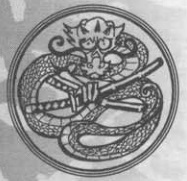
The Mirumoto mon. Dragon holding two swords, that's about it.
The Mirumoto are much more regimented than the Togashi. The family daimyo also acts as the clan daimyo most of the time, with only the Togashi daimyo having greater authority. This leaves the Togashi order time to seek illumination. The Mirumoto daimyo gets to keep stuff like taxes, so there's hardly reason to complain about this arrangement
 The Dragon has an army of around 200,000 men, roughly average for one of the Clans. There is some talk about how the army is organized, and mention of how Glory ranks equal to army ranking: a Glory 1 character is a
hohei (private), then it goes up to
nikutai ('corporal', but the word means corporal as in 'corporal punishment', fucking faux-Japanese)
gunso (sergeant),
chui (lieutenant),
taisa (colonel),
shireikan (commander) and
rikugunshokan (general) Characters can end up in a command position, with all the responsibilities and perks that it implies. It's also possible for a character with less than adequate battlefield skills to end up with a command, though the Mirumoto prefer to put people with proven skills in such positions; appearance-minded people like the Crane have a lower-ranking "advisor" to these wonders to avoid disasters and because it is polite.
The Dragon has an army of around 200,000 men, roughly average for one of the Clans. There is some talk about how the army is organized, and mention of how Glory ranks equal to army ranking: a Glory 1 character is a
hohei (private), then it goes up to
nikutai ('corporal', but the word means corporal as in 'corporal punishment', fucking faux-Japanese)
gunso (sergeant),
chui (lieutenant),
taisa (colonel),
shireikan (commander) and
rikugunshokan (general) Characters can end up in a command position, with all the responsibilities and perks that it implies. It's also possible for a character with less than adequate battlefield skills to end up with a command, though the Mirumoto prefer to put people with proven skills in such positions; appearance-minded people like the Crane have a lower-ranking "advisor" to these wonders to avoid disasters and because it is polite.
Mirumoto himself was a cunning tactician, and also a brilliant duelist. Also, kind of a bully and asshole. The treatise his son wrote on his style, Niten, is studied all over Rokugan, but this doesn't mean his school is so respected. Many bushi still consider it the "coward's school." The story of the Mirumoto family, as the Dragon's main fighting force, has several great battles. In the Battle of the Sleeping River, the Dragon stood side by side with the Clans to fight Iuchiban and his Blood Speakers. The Battle of the Cherry Blossom Lake was a Lion-Scorpion battle that seemed like an easy victory for the former until the Dragon showed up as unexpected allies for the Scorpions - secretly, Togashi was repaying the Scorpion daimyo for his daughter. The Battle of Kyuden Tonbo happened because of the minor Dragonfly Clan, born from a Mirumoto samurai and an Isawa shugenja. The Isawa's spurned lover, an Akodo, sent his forces against the fledgling Clan, but Dragon and Phoenix armies appeared and made it clear that the Lion would not be able to touch the Dragonfly. The Akodo did not forget the slight, and at the Battle of the Great Climb he sieged the Dragon fortresses while carefully skirting around Dragonfly lands. The Dragons held, but ultimately they surrendered, and the Akodo demanded a duel against the Dragonfly daimyo, who accepted and fell without even drawing his sword. Then the Akodo reached too far and declared himself ruler of the Dragonfly, but the fallen samurai's son demanded a rematch duel and killed him instead, and that's why the Lion hates the Dragonfly's guts. The Battle of Kenson Gakka, where the Lion took a Scorpion stronghold and killed everyone down to the last woman and child, was a reverse of Cherry Blossom Lake: the Dragon turned up as Lion allies. The Dragon general mysteriously died a couple of weeks later.
 Finally, in the
Battle of White Stag, the Dragon and the other Clans stood against a
gaijin invading force armed with rifles and cannons. Ever since then, firearms have been forbidden in Rokugan, but gunpowder is here to stay, to produce spectacular fireworks and the odd mysterious explosion now and then. Mirumoto training starts at a young age, and their gempukku ceremony involves writing a spontaneous haiku based on Shinsei's famous response to Togashi, "Neither will I." The family daimyo is Mirumoto Hitomi, more on her later.
Finally, in the
Battle of White Stag, the Dragon and the other Clans stood against a
gaijin invading force armed with rifles and cannons. Ever since then, firearms have been forbidden in Rokugan, but gunpowder is here to stay, to produce spectacular fireworks and the odd mysterious explosion now and then. Mirumoto training starts at a young age, and their gempukku ceremony involves writing a spontaneous haiku based on Shinsei's famous response to Togashi, "Neither will I." The family daimyo is Mirumoto Hitomi, more on her later.
We then get some excerpts of Niten!
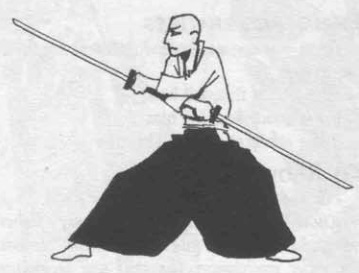
Apparently this stance is powerful enough that if enemies know "the Way" they will instantly surrender. Seriously.
quote:
WHY THIS SCHOOL IS CALLED THE TWO-SWORD SCHOOL
I have spent many years on the road, and I have fought forty-seven duels, and I have never lost. This is because I employ a technique that has no anchors to tradition. I employ a technique that teaches movement rather than memorization. My school is called niten, for I use both of my swords, not just the katana. Those who ask why do not understand my thinking. They will attempt to build a house with nails but no hammer...
quote:
LET HIM GO BY
When the enemy charges us with urgency and strength, let him go by.
A sidestep is quicker than a charge, and puts you in a position where negotiation means nothing.
quote:
THE VIRTUE OF WALKING
Many schools teach a "secret stepping technique." I have no such technique. It is as I have said, in my school, all movement is natural.
quote:
THREE ALTERNATIVES
When you engage the enemy, there are three alternatives.
If he attacks first, kill him.
If you attack first, kill him.
If you attack at once, kill him.
So basically, Mirumoto and his son were low-rent Miyamoto Musashi.
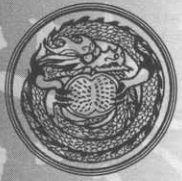
The Agasha mon, dragon holding a pomegranate, since you open it and INFINITE POSSIBILITIES also pretty good on a hot day
The Agasha! They're the most "traditional" family, as noted earlier. Agasha herself was devoted to observing and recording the natural world, and her journal expressed her love of nature with vivid descriptions and detailed sketches of plants and animals. They also included mysterious symbols that some thought to be stylized representations of her subjects, or some sort of grand code, or the spirits of the flora and fauna. Hundreds of years later, a shugenja discovered a secret code hidden in the post of the original scroll. Agasha's marks were symbols for certain elements of the plants and animals. Every thing in nature was a "little hidden puzzle," and thus Agasha's code is known as the Nazo Bubun no Agasha (Puzzle Pieces of Agasha) So basically, she figured out fuckin' chemistry! The Agasha school has dedicated itself to studying these natural puzzles, and they have made great advances in metallurgy (they invented steel, but apparently Scorpion spies stole their secret and gave it to all other clans) as well as agriculture, and potentially genetic experimentation since there are rumors of chimeric animals roaming the Dragon mountains. In short, they're
 as fuck. Their individual schools are called "Foundries" due to their early metallurgy experiments.
as fuck. Their individual schools are called "Foundries" due to their early metallurgy experiments.
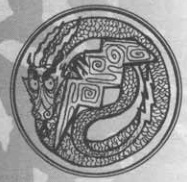
The Kitsuki mon. Dragon holding a lightning bolt that looks like a maze for reasons. Illuminate the darkness, bring justice, etc.
The Kitsuki! They come from a shugenja called Agasha Kitsuki. He had little interest for shugenja metaphysics, but was very interested in people. The human mind was the puzzle he wanted to solve, and he studied with tricksters and magicians, something his teachers decried as "peasant magic." Eventually, his sensei told him after repeated offenses to shape up or be expelled... but next morning he was found dead in his room with Kitsuki's wakizashi. Twenty-four hours later, Kitsuki had found the real guilty party, with evidence and a confession. Kitsuki grew to be respected as a magistrate, and eventually granted permission to found his own samurai family. The Kitsuki are very trusted by the Mirumoto because of their keen insight to solve crimes and stop Scorpion and Crane plots. They are not as accomplished courtiers as they are, but instead have an uncanny ability to cut through lies and find the truth. The Crab and Unicorn Clans respect them for this, while the other Clans keep them at a distance for the same reason. Since the Rokugani justice system prizes confessions and ignores hard evidence, many times the Kitsuki end up facing accusations from high-ranked people that they find to be involved in dastardly plots. Also, they are on the trail of the ninja, and while the ninja are killing Kitsuki who get too close to them, others pick up where they left and keep finding more clues! Also there's a friendly rivalry between Agasha and Kitsuki, and the former call the latter "little brother/sister" because that totally doesn't get annoying.
Next: YOGA FIRE
Way of the Dragon: I thought it was Buddha Fire
Original SA post Legend of the Five Rings First EditionWay of the Dragon: I thought it was Buddha Fire
It's time for new character options! In true and proper '90s fashion, we get new skills in the clanbooks. Ichi Miru is a Kitsuki-only skill and it's basically cold reading, Sherlock Holmes style. A High skill! Mountaineer is climbing mountains, surviving in them, and all that jazz. High or Low, depending if you're samurai or heimin/hinin. Nazodo is a Dragon-only High skill that works the same as Investigation, but can also be used for puzzles, riddles and logic games, as well as figuring out portents and omens. Kagaku is an Agasha/Kitsuki High skill and it's basically chemistry. Craft: Tattooing is self-explanatory, while Craft: Mitsugusuri (well, mizugusuri) is the art of making magical potions. Both of those are Merchant skills, like all other Crafts.
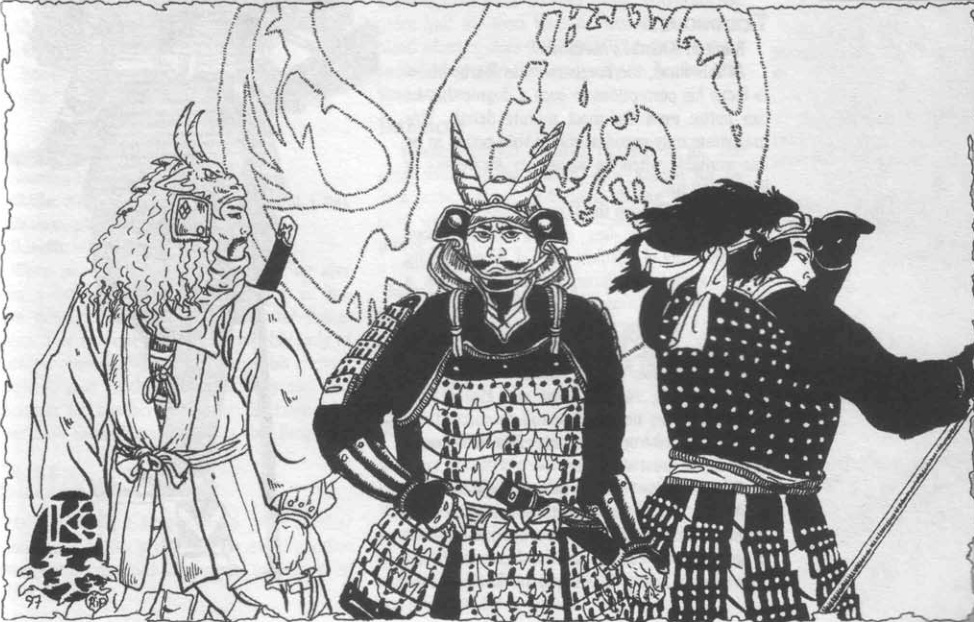
Craft: Boy Band Pose.
Advantages! Elemental Attunement is only for Mirumoto bushi, and lets them make an Awareness roll to detect magic in an area. Noble Birth is a monk-only advantage that lets the monk keep their samurai status, since by default monks are lower on the totem pole. Disadvantages! Ascetic means that the character cares little about worldly possessions, so for instance a bushi only has their swords, one kimono, one pair of sandals and one obi (no armor?) Also they don't care about Glory. Enlightened Madness is also only for monks, and makes it so that when they activate one of their tattoos, they have to make a Willpower roll (TN depending on how many points the disadvantage is worth) or lose all control of their actions until the next day. Yikes. Vanity is a 1-point disadvantage that makes you be, well, vain.
The Kitsuki family (+1 Awareness) teaches the Kitsuki Magistrate school. +1 Perception, 2.5 Honor, starting skills are Courtier, History, Nazodo, Law, Heraldry, Poison or Herbalism, and any Lore.
- Rank 1: the magistrate may spend as many Void Points as they want in Perception or Awareness rolls.
- Rank 2: the magistrate gets as many Free Raises in Perception or Awareness rolls as their school rank.
- Rank 3: the magistrate always succeeds at basic Heraldry, Nazodo, Law or History rolls. They have to actually roll the dice and risk failure if they want to make Raises.
- Rank 4: if the magistrate faces a samurai using a School Technique they have already seen before, the opponent must spend an extra Void Point to use it.
- Rank 5: the magistrate cannot be lied to. People with less Awareness simply cannot bring themselves to do it, while those of equal or higher Awareness can try but the magistrate will always know if they are not telling the truth.
I like the Kitsuki magistrates. They should be able to break any intrigue plot in half, but Rokugan's social need to save face and maintain appearances means they can't just dump evidence in a court and save the day. They have to be sneakier about things, especially considering they are not particularly good fighters. Their Rank 4 is cool, but it is Rank 4.
The Ise Zumi Tattooed Monks must belong to the Togashi family. +1 Void, 1.5 Honor. Their skills are Nazodo, Shintao, Meditation, Hand-to-Hand, Craft, and any two other skills. At Rank 1, the ise zumi gains a tattoo, and they can buy another two at chargen for 8 CP each. A monk may only have as many tattoos as their Void rank. Tattoos have effects and costs, which sometimes are only paid when the tattoo is triggered and sometimes are permanent penalties. With GM's permission, a monk may make a TN 15 Willpower + Meditation roll to 'turn off' a tattoo. There are sidebars full of pithy pseudo-Zen quotes for ise zumi PCs to mouth off, like "Fear is afraid of laughter" and "Suspect all men are liars and that it will rain tomorrow." Women can also become ise zumi: the more ascetic factions of the order don't like this, but it was an order from Togashi Yokuni himself so they can't really go against it. The monks that actually go out into the world see no problem with this.

The tattoos!
- Arrowroot: the monk may heal School Rank's worth of Wound Levels on themselves or others. Cost: the monk takes half as many Wounds as the ones they are healing if using the power on someone else. This damage cannot be healed magically.
- Bamboo: the monk boosts Stamina a number of ranks equal to their School Rank for that many rounds. Cost: when active, the monk's Agility cannot exceed their School Rank.
- Bat: as Bamboo, but the monk boosts Reflexes. This explicitly does not raise their TN to be hit. Cost: as Bamboo, but Strength is the penalized Trait.
- Bellflower: the monk may substitute their Void Rank for any other trait for (School Rank) rounds. Cost: when active, any spell targeting the monk gets their Void in Free Raises.
- Butterfly: the monk adds their School Rank to Awareness for the rest of the day. Cost: when active, the monk automatically fails any Earth, Stamina or Willpower roll.
- Centipede: the monk can run to anywhere in Rokugan in 12 hours, no more and no less. Contested Reflexes vs Reflexes + School Rank for anyone trying to stop the monk. Cost: after arriving, the monk must rest for (6-School Rank) days.
- Chameleon: the monk can alter their appearance to imitate anyone they have met, Willpower + School Rank against a TN depending on how familiar they are with the person. The voice does not change. Cost: when transformed, the monk cannot use more Void Points than their School Rank.
- Cherry Blossom: the monk gains a number of points equal to their Honor that can be used as Void Points. They last until sundown, the tattoo cannot be used between sunset and sunrise. Cost: when active, all Honor losses from dishonorable acts are doubled.
- Cloud: the monk can commune with a number of spirits per day equal to their Rank. The spirits can be ancestral, elemental, or animal. The monk gets their Rank's worth of questions for each spirit. Cost: all Awareness rolls have their TN raised in 5.
- Crab: the monk absorbs a number of Wounds per hit equal to their Earth x 2. Cost: the monk suffers a -1 penalty to Reflexes when the power of the tattoo is invoked for the duration of the effect. This does not affect the TN to be hit.
- Crane: the monk gains the Luck advantage (reroll one failed roll per session). Each School Rank gives them an additional Rank in Luck. Also, the monk never ages, and once per story they can tank a hit that would kill them and end up with a single Wound left. Cost: all XP costs are doubled.
- Crow: the monk can invoke this tattoo to become immune to the Shadowlands Taint for a number of days equal to their School Rank. Cost: Tainted creatures can smell the monk from a mile away, gain an additional die in Perception rolls to spot the monk equal to their School Rank and will generally single out the monk for attack.
- Chrysanthemum: the monk heals their School Rank in Wounds per hour under the sun. Cost: the monk does not heal at all when the sun is down.
- Dragon: the monk breathes fire! Attack roll is Fire + School Rank, DR is School Rank + Fire. Can hit their School Rank's worth of foes, and armor does not protect against it. Cost: it can only be used a number of times per day equal to the School Rank, and after using it the monk must rest 10-Rank minutes. They are considered to be at the Down Wound Level.
- Dragonfly: the monk can activate this tattoo to add their School Rank to Reflexes for purposes of calculating their TN to be hit. The monk can do this as many times per day as their School Rank, and the effect lasts that many rounds. Cost: the monk must spend a Void Point to sit down or focus on something for more than ten minutes.
- Falcon: the monk is immune to Fear effects and may add their School Rank to Honor when making Honor Tests. Cost: all Honor losses from disservice to the monk's lord are doubled.
- Lion: the monk adds their School Rank as dice to all Bugei skill rolls. Cost: the monk cannot resist battle - it doesn't mean that the monk goes around picking fights, but when shit goes up the monk happily joins the fray.
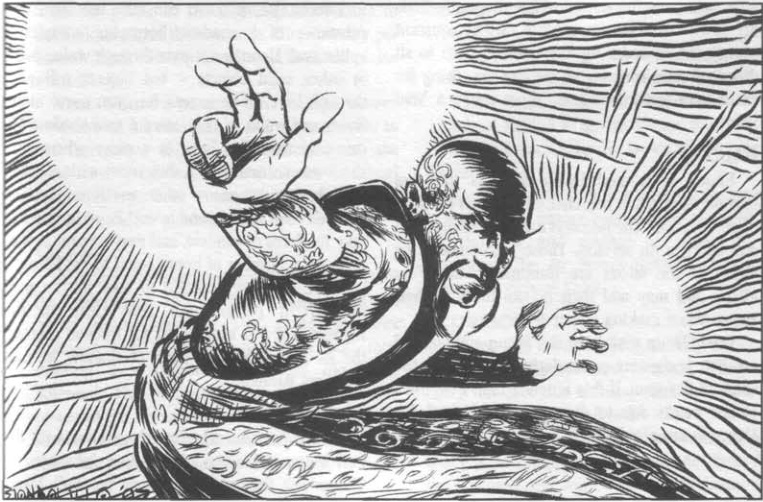
A cool monk to break the wall of text.
- Monkey: all Stealth, Sleight of Hand or similar Skills get additional dice equal to School Rank, and the monk may add their Rank to their Agility for leaping or climbing actions. Cost: the monk may not keep a number of dice greater than their School Rank when trying to be charming or personable.
- Crescent Moon: the monk may become a shadow, moving through floors and walls. This transformation needs to happen in a place with natural shadow. Takes 1 Void Point, lasts for a number of hours equal to their School Rank. Cost: For every hour of transformation, the monk takes 6 Wounds.
- Full Moon: the monk may cancel a number of Raises equal to their School Rank, that same number of times per day. Cost: during daylight, the monk cannot make Raises.
- Mountain: the monk adds their School Rank to their Earth (and Stamina and Willpower) for School Rank x 2 Rounds. Cost: when active, the monk's Air drops to 1.
- Nightingale: once per day per School Rank, the monk may heal all of their Wounds. Cost: it takes one Void Point and one XP to activate the tattoo.
- Ocean: the monk does not need to sleep, eat or drink, and may refresh their Void Points a number of times per day equal to their School Rank. Cost: every time they try to refresh their Void Points, Willpower test against 5 x number of times the tattoo has been activated, if they fail they may not move or talk for the rest of the day.
- Phoenix: the monk gets their School Rank's worth of Raises per day to use on spells targeting them, either as Free Raises or increases in the casting TN. Cost: the monk may only defend in combat situations, never initiate attacks.
- Pine: the monk may ignore wound penalties up to their School Rank. At Rank 5, they ignore Down and Out. Cost: the monk's Strength cannot exceed their School Rank.
- Scorpion: other characters facing the monk must use their lowest Trait for all rolls. Cost: no one trusts the monk. Scorpions!

- Spider: the monk's touch becomes poisonous, dealing (School Rank)k1 damage on touch in addition to any hand to hand strike damage. Cost: the power is always active, the monk must spend a Void Point to turn it off for an hour.
- Sun: the tattoo can only be used during the day, it gives School Rank's worth of Free Raises for multiple rolls. Cost: the monk may not Raise during the night.
- Tiger: the monk keeps extra dice in unarmed combat equal to their School Rank. Effect lasts (School Rank) rounds and can be activated (School Rank) times per day. Cost: the monk goes all feral when the tattoo is activated, cannot talk or hold anything in their now claw-like hands.
- Tortoise: the monk may substitute their School Rank for any skill. Cost: every time the monk uses this power, Willpower roll against a TN of 5 x number of times the tattoo is used per day. Failure means the monk is haunted by a "spiritual advisor" It takes three Void Points to send the haunting away.
- Unicorn: the monk can reroll rolls per day equal to their School Rank. Cost: every time this power is used, the GM rolls a die in secret. On a 10, one future roll will automatically fail, after the monk rolls.
- Wasp: the monk gains (School Rank) extra actions per round, can be used (School Rank) times per day. Cost: the monk may not use Void Points when the tattoo is active.
- White Mask: the monk's mind cannot be read and their emotions cannot be discerned. They don't have them, in fact. Cost: Awareness is fixed to 1.
So yeah, lots of shit going on here. Monks are wack. That's what you get when the ink for your tattoos is partly Togashi's own blood.
Then there's the infamous Heritage Tables, where you can spend a single CP for the chance to ending up a True Ronin with even worse gear than what chargen True Ronin get. I hope you didn't actually want to play a Dragon Clan character when you rolled on the Dragon heritage tables! Some stuff is still kinda cool to get: one of your ancestors might have fought at White Stag, which gets you a major Ally in a Clan of your choice and "Lore: Gunpowder" Or you could go to the Fortune Table, and for 4 CP straight up be the son of a daimyo, or a cousin of the Imperial Line with attendant gains in full Glory ranks. Or a failed ise zumi (can buy tattoos for 8 points, must spend a Void Point to use it), or go full Ginawa by rolling a Path of Blood against ninja, or another Clan of your choice (Free Raise when facing your foe) Dragons don't get a bad Fortune table like other clans, for some reason.
Ancestors are special advantages (or disadvantages as the case may be) You buy them at character generation only. This means you have a special kharmic tie to the ancestor. The original Mirumoto, the man, the legend, the jerk, costs a whopping 15 points and is solely for Mirumoto bushi characters, but grants access to the immediately superior Mirumoto school technique. So a starter character is already slinging 2 attacks per round
 Mirumoto Kaijuko was the first woman to become daimyo of the Mirumoto family, and she dueled and killed her uncle for the right to the position. Characters will never marry (even if they try) but gain an additional die to roll and keep in Courtier or Seduction rolls.
Mirumoto Tokeru has a bizarre story where he was first called Omosa ("heavy") because apparently there is a tradition that during childbirth the father puts on a fake belly and cries as if giving birth to distract any spirits that may get close to the mother and he almost killed his mother when being born. Anyway, he purposefully lost a duel to his brother and superior that challenged him because the brother's wife totally had the hots for him, and so characters that get him as ancestor always succeed at Honor rolls when duty to their lord is in question.
Agasha Nodotai was a shugenja/warrior that was killed protecting the Emperor's Lion general during White Stag - had he been a foot to the left the general would have eaten a rifle shot to the face. Characters get to move one position in the Battle table.
Agasha Kitsuki founded the Kitsuki family and school, and he died in a Scorpion plot trying to recover important documents that turned to be false, and poisoned. Characters can spend a Void point to completely negate effects of poison.
Agasha herself gives characters a Free Raise when casting a spell, 8 points though.
Mirumoto Kaijuko was the first woman to become daimyo of the Mirumoto family, and she dueled and killed her uncle for the right to the position. Characters will never marry (even if they try) but gain an additional die to roll and keep in Courtier or Seduction rolls.
Mirumoto Tokeru has a bizarre story where he was first called Omosa ("heavy") because apparently there is a tradition that during childbirth the father puts on a fake belly and cries as if giving birth to distract any spirits that may get close to the mother and he almost killed his mother when being born. Anyway, he purposefully lost a duel to his brother and superior that challenged him because the brother's wife totally had the hots for him, and so characters that get him as ancestor always succeed at Honor rolls when duty to their lord is in question.
Agasha Nodotai was a shugenja/warrior that was killed protecting the Emperor's Lion general during White Stag - had he been a foot to the left the general would have eaten a rifle shot to the face. Characters get to move one position in the Battle table.
Agasha Kitsuki founded the Kitsuki family and school, and he died in a Scorpion plot trying to recover important documents that turned to be false, and poisoned. Characters can spend a Void point to completely negate effects of poison.
Agasha herself gives characters a Free Raise when casting a spell, 8 points though.
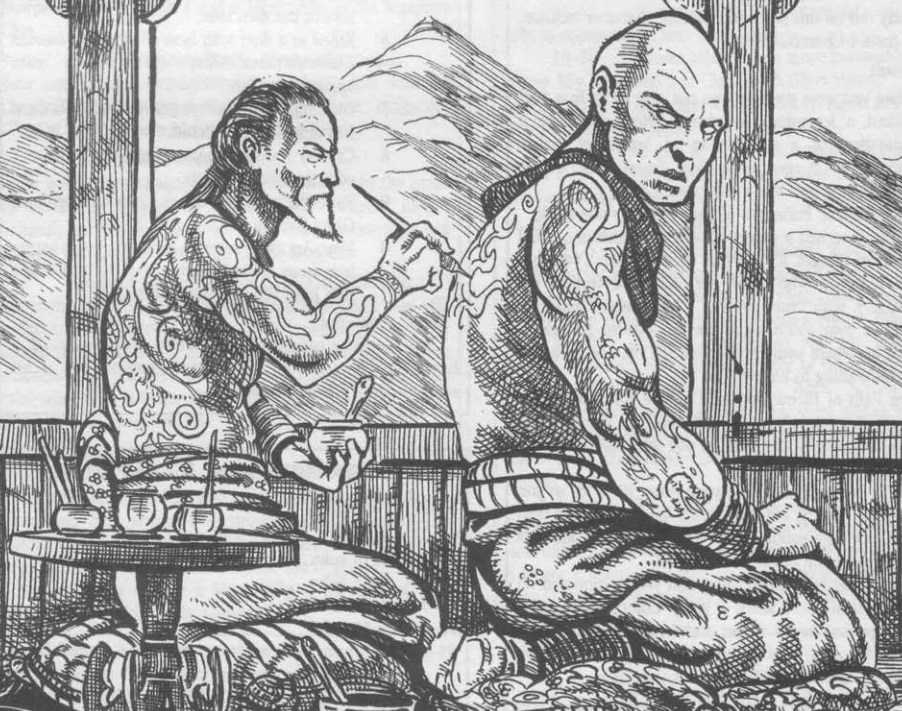
"Man, that better not be a dickbutt tattoo. I have enough of those."
Next: NPCs, from the ordinary to the Wick.
Legend of the Five Rings First Edition
Original SA post Legend of the Five Rings First EditionWay of the Dragon: Of course he would
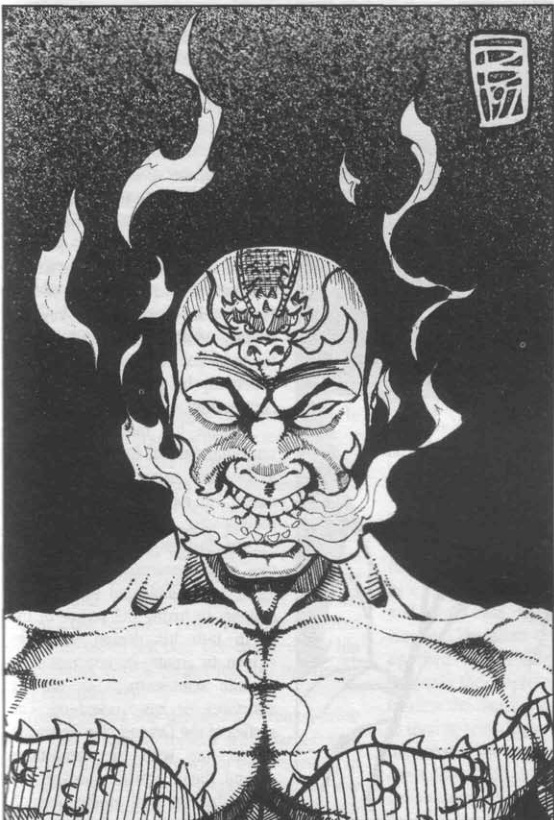
Togashi Mitsu! He tells little kids to wash their teeth before bed.
Time for Important NPCs! Of course. They sometimes have Insight too low to actually achieve their school ranks, but oh well! The first one is Togashi Mitsu, who I like because he was the first character I ever learned about when I first came into contact with L5R. He is the most famous of the ise zumi, a guy full of wanderlust that pretty much took off as soon as he got his first tattoos. He's spent his life in adventure, doing everything from catching Scorpions trying to blackmail honest daimyo to helping them blackmail dishonorable ones, chasing off ogres from small villages, and jumping off mountains (he was the guy that spooked Isawa Kaede at the beginning of the book) He likes people who are of noble nature rather than just birth, is friendly to peasants, and his flame breath is legendary. Still, he is not just some lolrandom kender, he considers the outcome of everything he does and he is a truly wise monk. His main interest these days is finding out what goes on beyond Rokugan, and has questioned Unicorn scouts about it, but his vows and duties keep him from leaving Rokugan. He is a Rank 3 Togashi monk with the Centipede, Crow, Monkey, Dragon and Tiger tattoos, strong but definitely within PC levels of power. A Cool Dude.
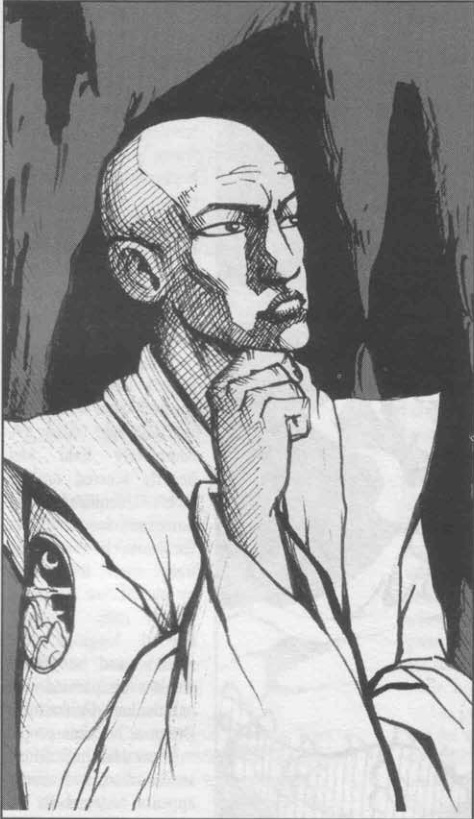
Yama'ngettingoutofthisshit
Togashi Yama is also on the PC side of things, though less interesting. His deal is that he is an Agasha shugenja that transferred to the Togashi looking to become a tattooed monk, but is having serious misgivings about the whole thing. He feels the weight of expectations bearing on him, since he is basically a genius with his mastery of Earth that has made great improvements to the Togashi castle, but growing up listening to the tales of Togashi Mitsu's exploits makes him question his own abilities. He continues delaying his induction ceremony, hoping his destiny becomes clear. He doesn't have a Great Destiny, though
 Rank 3 Agasha, but somehow he only has the three basic spells plus Transform, the secret Agasha basic spell.
Rank 3 Agasha, but somehow he only has the three basic spells plus Transform, the secret Agasha basic spell.
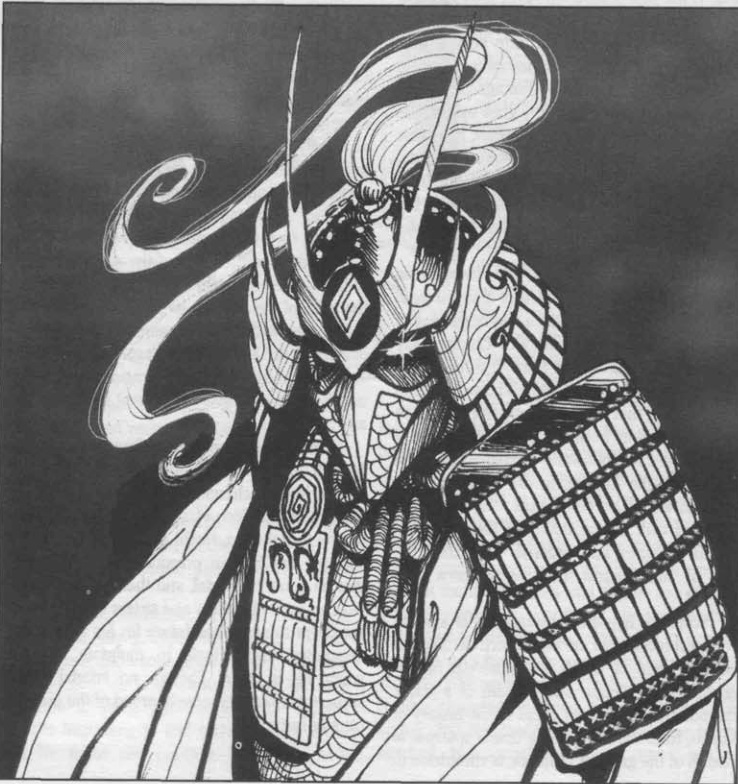
The Togashi, not bringing the gunshow for once
Togashi Yokuni is on the far end of the power scale, though. Being that he is the Togashi, as well as a fucking dragon. Because he is, shut up. He changes name every fifty years, giving the outside world the impression that the clan is ruled by a succession of daimyo. He carries the same blades forged for him by Agasha all those centuries ago. Hantei ordered him to "watch" the Empire, and that is what Togashi does: he meticulously chronicles everything, in a gigantic record that covers everything from the birth of a sparrow to the death of an Emperor, and somehow he has never been seen actually working on it. He only intervenes directly when the fate of the Empire is in the balance. He is the first dragon to take physical form, and though he has lost his mortality he has gained a much greater sense of understanding of the world than the other dragons, tied to their elemental natures. The only luxury that he has allowed himself is having a son, Togashi Hoshi. Togashi's stats are Win: YES, so like, don't even think of fighting him. He appears as a muscular man clad in Dragon armor, his face always hidden by the helmet, and no one ever remembers his voice - only what he says, which disturbs people. Which is what he likes, anyway.
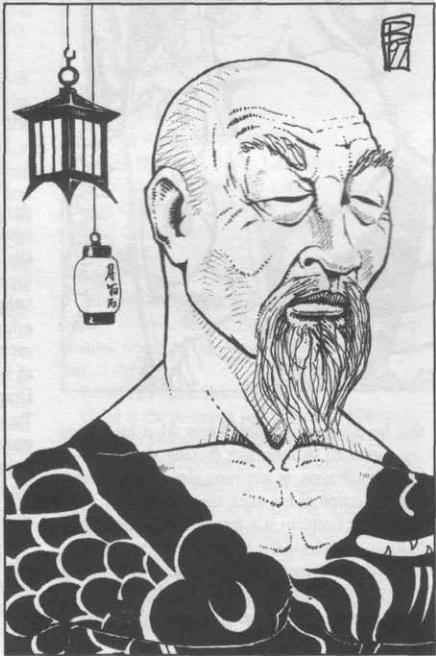
The best dickbutts in the whole Empire, crafted personally for your skin.
Togashi Gaijutsu is the most skilled tattoo master of the Clan. He was born blind and under a bad sign, but Togashi intervened by showing up at his crib, cutting his palm and feeding him some of his blood. Gaijutsu grew to have an uncanny ability to draw and paint, and his magic tattoos are so powerful that only the bravest and strongest can withstand them. He always looks as if he were actually looking at something, and he just says that his works bring out something that was already there, even though he has never really seen them or his clients. He is not really known outside of the people he works on. Not much of a fighter, but he is a Rank 5 Togashi and has any six tattoos at any time, and only needs an action and a Void Point to change any tattoo from his list.
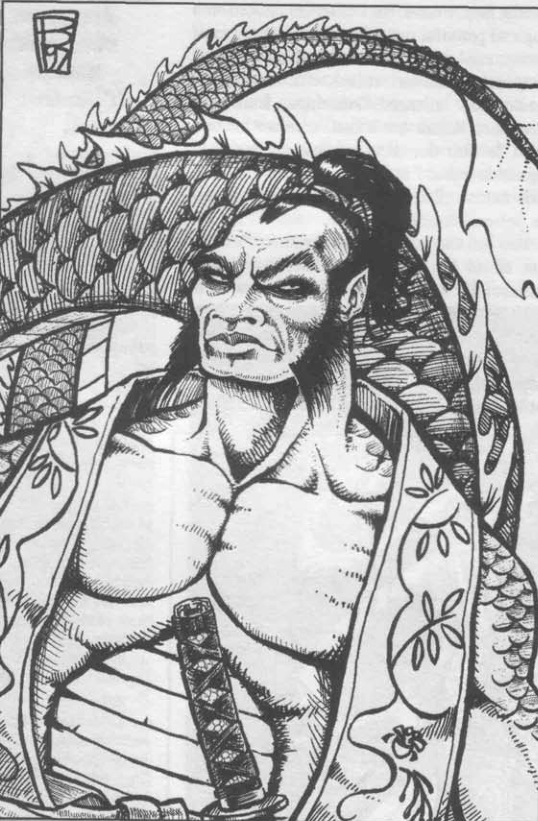
Hoshi does what Yokuni don't. Which is mostly "actually leaving the mountains without majorly fucking with destiny"
Togashi Hoshi is Togashi's son with a Scorpion shugenja/spy. He is half man, half dragon. Yokuni uses him as a link to the outside world, observing important events and delivering messages to specific people at specific times. Sometimes he stays at the castle for centuries, sometimes just for years. He never ventures beyond the mountains without disguising his real form. He is fascinated by humanity, mercurial and with such a short lifespan. Only a handful of people know about him, counting Yokuni, a few monks and the highest Bayushi. Even the Scorpions would pale if they knew just how many secrets he has figured out, however. There are stories of people being saved by a "nature spirit", but they're probably peasant superstition. Like ninja, really. Hoshi is a Mirumoto 5 bushi with all Rings at 7 and knows pretty much all skills that aren't on his sheet at at least 1. He also hits with 7k4 barehanded, instead of the basic 0k1, cuz dragon. The only power that he hasn't inherited from his father is spells, because he can't use any magic at all, but really he's just going to trounce a party if they get in his way.
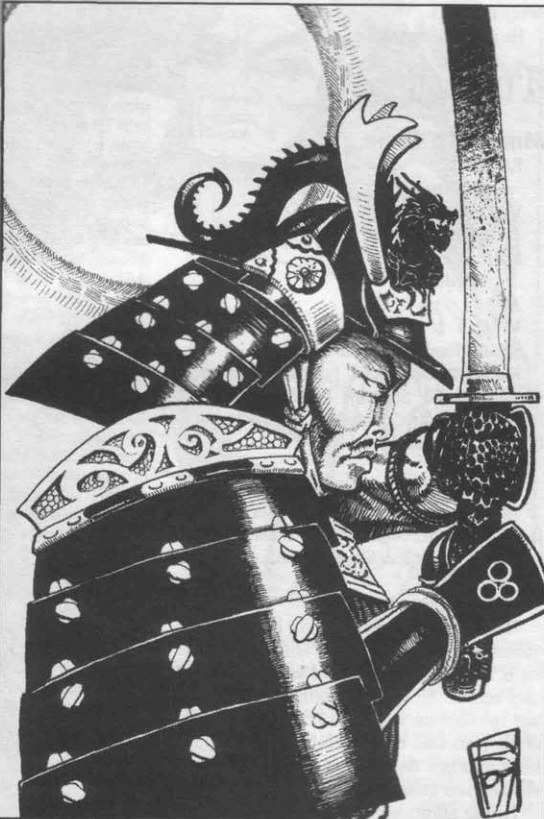
The FUCK did you say about his wispy 'stache!?
Mirumoto Daini is Hitomi's younger brother. He is handsome and knows it, and prefers the court to the battlefield. Growing up in the shadow of Hitomi and Satsu, he had to find some place to shine of his own, and that was court. He is the main Mirumoto representative in the Imperial court, and is fascinated with Akodo Toturi, the Lion Champion; he is also falling for Toturi's student, Ikoma Tsanuri. He has acquitted himself in a couple of duels, but he has never seen real combat. He is a Rank 3 Mirumoto bushi and there isn't much else going for him, he's a vain samurai looking to prove himself.
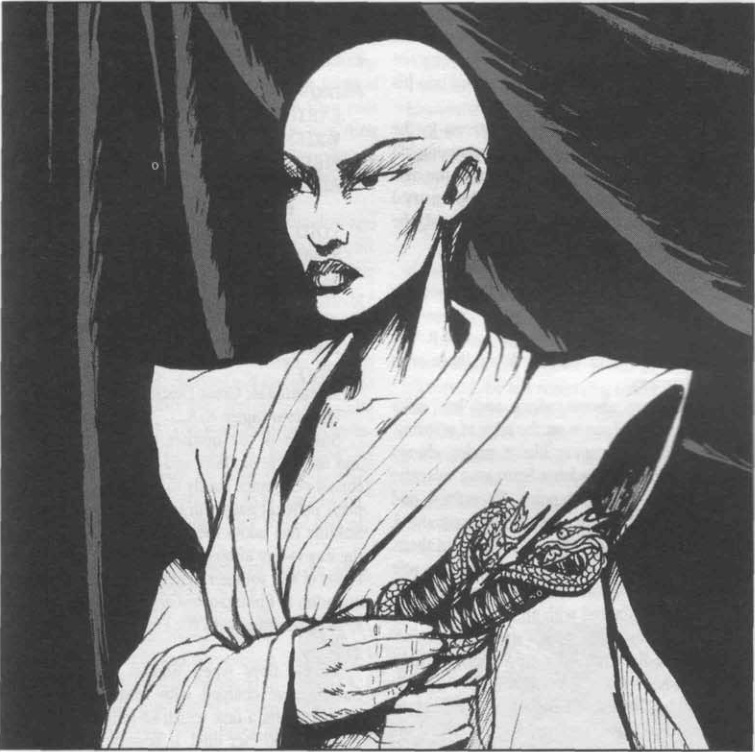
Like she hasn't planned how to cut you up six ways to Sunday.
Mirumoto Hitomi is, spoilers, one of the major figures of the original metaplot. She is technically the Mirumoto daimyo, but most outsiders would think Daini has that role. Her appearances are sporadic, enough to make the courtiers call her "Togashi Hitomi" behind her back. Her sole objective is to avenge his brother's death at the hands of Hida Yakamo. Ever since her mother died of ill health and her father seppuku'd, she has sworn that the last thing Yakamo will see is her blade through his belly. Yokuni has taken a special interest in her, granting her a special tattoo. Outside of this, she is super melodramatic and pained and anguished because of her loss. As Wick puts it:
quote:
If Hitomi seems two-dimensional, it's because she is single-minded. Anything and anyone that isn't a part of her destiny is in the way of it. She has no problem with cutting down those who stand in her way.
So, she's a very vengeful lady! Of the Dragon Clan. You could say that she is a vengeful Dragon Lady.

wick why u do dis
She is a Mirumoto Rank 3 bushi, with high combat skills but not completely out of bounds. Her special tattoo gives Hitomi her School Rank's worth of extra Void Points: she can only spend one of them at a time but this is in addition to her natural Void, so she can basically spend two Void per turn. Nifty!
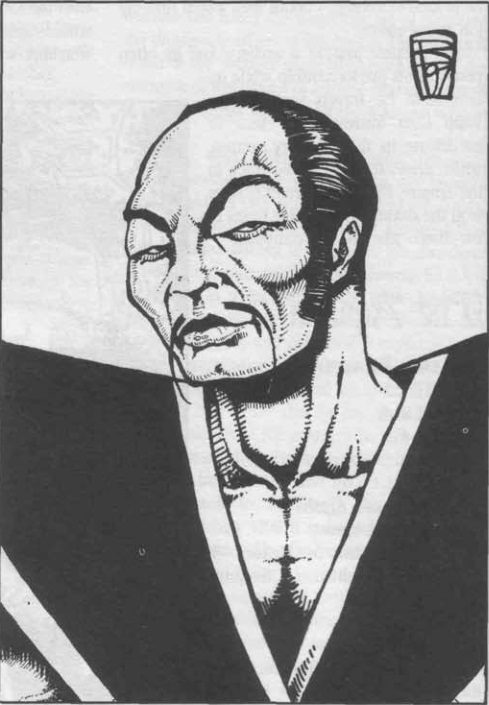
Kinda smug but hey, he's the ranking Mirumoto that actually has his shit together.
Mirumoto Sukune is uncle to both Daini and Hitomi, and the one actually running the family and the clan. He used to be the main military commander of the family when his brother, the former Mirumoto daimyo lived, and now balances that with actual civilian administration. He is the best known and most approachable Dragon for those that have regular dealings with them, because he moves a lot to work on trade deals, soothe unhappy magistrates, and doing all sorts of practical work. He actually likes it, and doesn't begrudge Hitomi or Daini for fucking off to do their own thing, young people are young and all that jazz. He is a Rank 4 "Togashi" (should say Mirumoto) bushi with a very high archery score - it is his personal passion, and he regularly attends the archery championship held by the Wasp Clan.
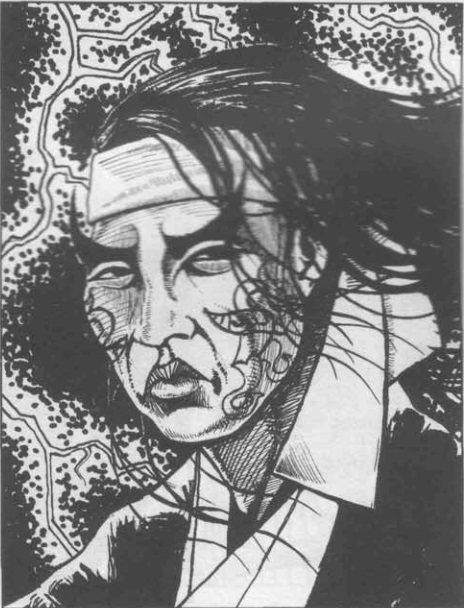
"They're waiting for you, Ginawa-san. In the TEST CHAMBER."
Agasha Tamori is the current Agasha daimyo. He keeps the library and journal of the first Agasha, and maintains the great family libraries as well as Togashi's Chronicle of Rokugan. He is fascinated by the elements and how they combine into earthly forms, and is generally a
 dude that actually grows more spiritual the more he learns about the world. He does not like conversation and sometimes pretend to be offended by a talkative host's probing questions just to get them to shut up.
dude that actually grows more spiritual the more he learns about the world. He does not like conversation and sometimes pretend to be offended by a talkative host's probing questions just to get them to shut up.
 He trusts character rather than position, but understands Rokugan's rules.
He trusts character rather than position, but understands Rokugan's rules.
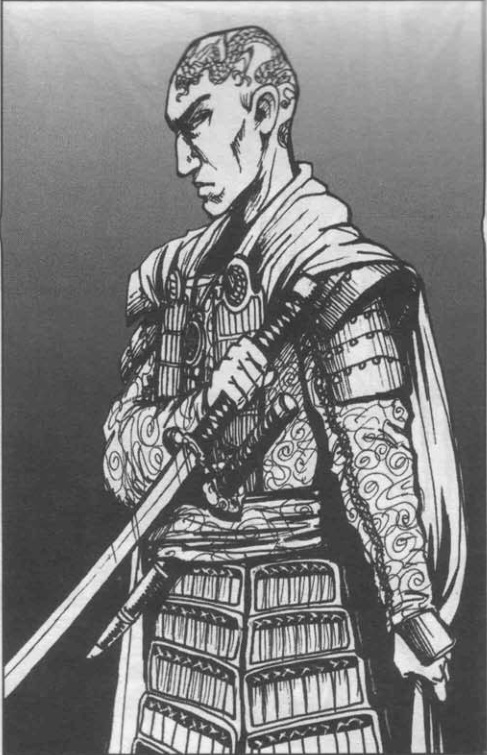
JUSTICE is a huge sword and a guy with middling skill with it.
Kitsuki Yasu is the Kitsuki daimyo. He is obsessed with catching the Scorpion, as evidence pointed to their involvement in the death of the previous Kitsuki daimyo. Nothing came of that, and his unfortunate public outburst against Bayushi Kachiko hasn't helped matters. He is a brilliant magistrate, but brash. He is obsessed with justice and pays little attention to etiquette. He has been challenged to duels for his judgments, and so far has killed all of his challengers. Last time that happened it involved a Lion of no small repute, which didn't please Akodo Toturi much. He is a tall, willowy guy that likes to loom over criminals and carry a huge no-dachi. Rank 5 Kitsuki, with good investigative skills but only 2 in Kenjutsu and no Iaijutsu (he must've dueled some really shitty people to survive seven duels) and a medallion that gives him (School Rank) points in any Lore skill as long as he wears it.
Sample Characters! Oh, of course.
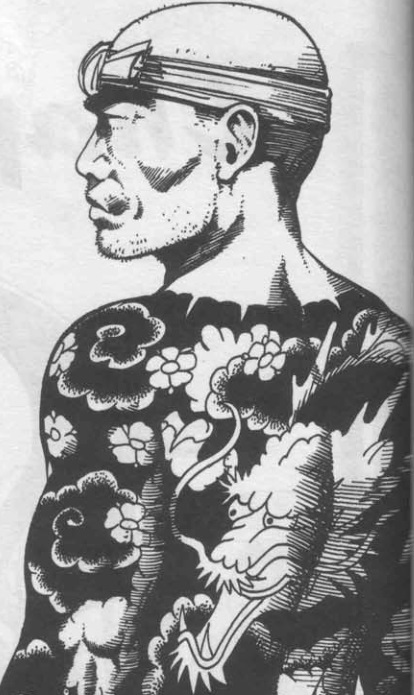
Pictured: Tattooed Man. Not pictured: Tattooed Man's Tattooed Butt.
The Tattooed Man went up to the mountains and is now going into the WORLD OF DIVERSION. Jovial, not dour, always answering questions with questions and with no interest in physical rewards or gifts. No Ascetic disadvantage, though.
 And for some reason he has Unlucky at -6, so the GM can force him to reroll successful rolls twice in a session. Hope that joy sticks!
And for some reason he has Unlucky at -6, so the GM can force him to reroll successful rolls twice in a session. Hope that joy sticks!
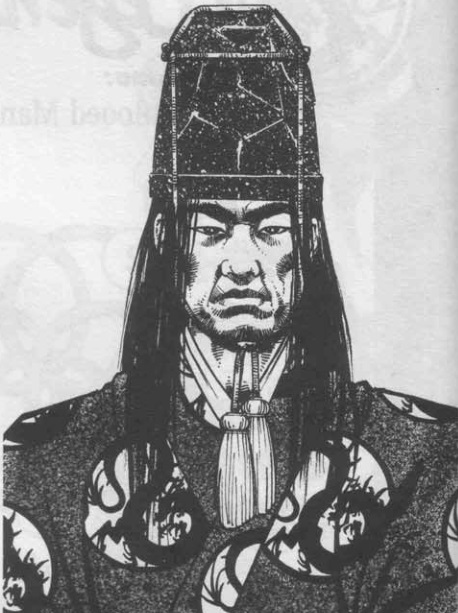
Advantage: Sweet Hat.
The Kitsuki Magistrate is sickly and was treated by shugenja growing up, but he managed to join the Kitsuki school and graduate. Now they have a Mirumoto duelist as a yojimbo, and life is good except that actually moving around is super shitty and has them coughing up blood at night and shit. But at least their observation skills are good! Instead of Bad Health they have Small as their physical disadvantage, for some reason.
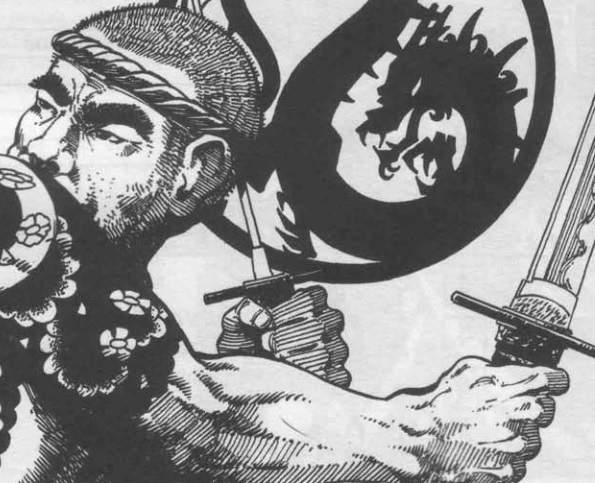
Check out my sweet daisho tech--- A-A W-WOMAN


The Mirumoto Duelist is a hardass warrior and amazing duelist and yojimbo. But he can't even look at women without getting the heaves. No, seriously. He has express forbiddance to speak in court, and now works as a yojimbo for a diplomat that can't fight. Generally a high combat skills, low social skills type of character, so in a Wick game he would be fucked more than usual.
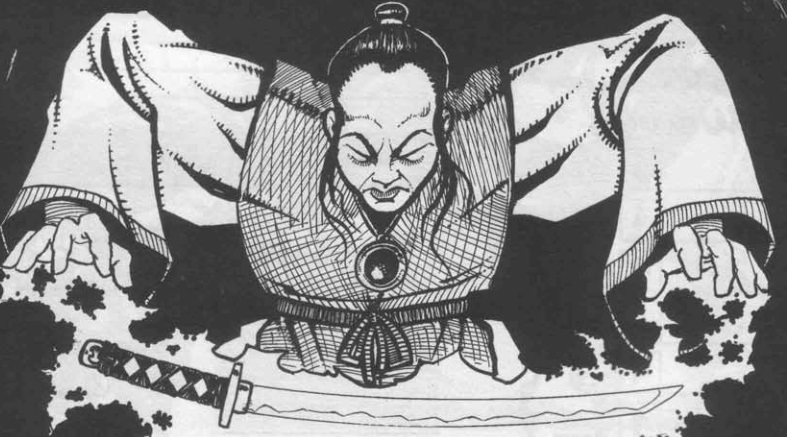
"This time, I am NOT turning your blade into a dragon dildo."
The Agasha Shugenja left school with a letter of recommendation from Agasha Tamori himself, on the way to become a respected magistrate! But ended up working for a minor daimyo. But things are looking up! Except that everything has a way of turning out terrible. But things will look up! Just ignore the Unluck -6 Disadvantage.
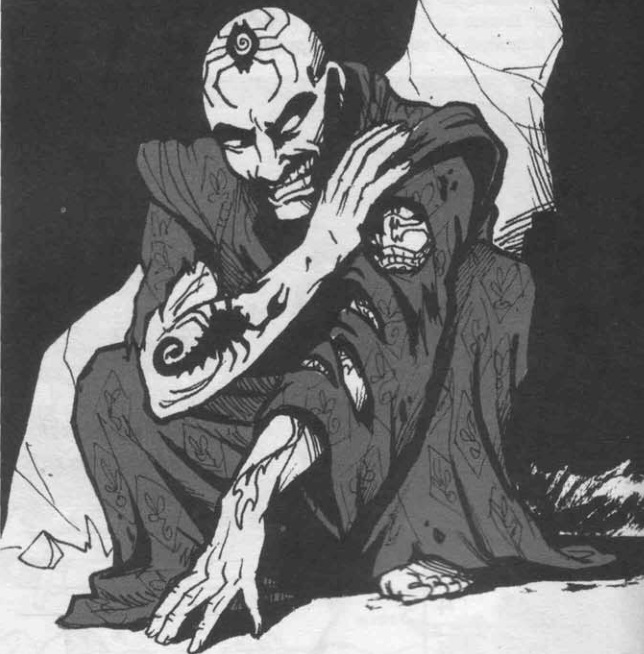
The secret is that everyone is controlled by pasty nerds from another dimension, and only he realizes it.
The Mad Tattooed Man took his tattoos, but something went wrong. VERY wrong. He's nuts, and on the run, and has a secret, a BIG secret - but one he can't really say. But people don't know the secret, so he laughs! This is totally a character that will play well in a party. The strongest form of Enlightened Madness, and Spider, Scorpion and Dragon tattoos. This one does have Ascetic.
quote:
You're mad. You've got Togashi's blood burning inside of you, and there's nothing you can do about it.
Until they find you.
And when they do, they'll kill you.
(grin)
They've got to find you, first.
It's Bad Form to rip off from Watership Down, Mr. Wick.

Next: dragon smug.
Way of the Dragon: More Dragon Punches
Original SA post Legend of the Five Rings First EditionWay of the Dragon: More Dragon Punches
Let's start with all the appendices! The first one talks about the Dragonlands and its inhabitants, which are to no one's surprise fucking dragons. These aren't princess-stealing giant lizards with hoards of gold, but spirit creatures that heroes seek for their wisdom instead of slaying. The dragons exist in two worlds at once, both this plane and the Dragonlands themselves - sometimes more in one than the other. In the spirit world, there is a King of All Dragons that all dragons pay homage to, Togashi included. Some humans have been taken to the Dragon Court or found their way, but time flows differently there: there's a story of a samurai that went there, returned to his own past, and ended up being the distant ancestor from which he would inherit his sword. There are also stories of samurai returning with powerful nemuranai with a single, specific purpose, and samurai maidens that come back with young children; one of the most popular stories of the latter kind is called the Tale of Hoshi.
 The dragons have a physical form, but they change it as often as they need, and is always a majestic form. They can be beautiful and pleasant or terrible and ferocious, depending on their purpose and present company. They have no stats.
The dragons have a physical form, but they change it as often as they need, and is always a majestic form. They can be beautiful and pleasant or terrible and ferocious, depending on their purpose and present company. They have no stats.
quote:
You might as well try giving Traits and Skills to Lady Sun and Father Moon.
That's reasonable, John, but---
quote:
Dragons can use any spell listed in the rulebook (and any published thereafter)
Yeah OK but I
quote:
Dragons cannot be killed - let alone wounded - by mortals. Any mortal so foolish as to attack a dragon will quickly find himself torn to tiny pieces, put back together again, torn to tiny pieces again and back together. In case you're wondering, this effect requires no die roll and takes one action to perform.
quote:
The chance of a dragon "joining up" with a group of characters is about equal to the chance of you winning the state lottery three times in a row.
I GET IT, GEEZ. Dragons are ineffable, that's cool, but Wick has to spend a full page
 ing about it.
ing about it.
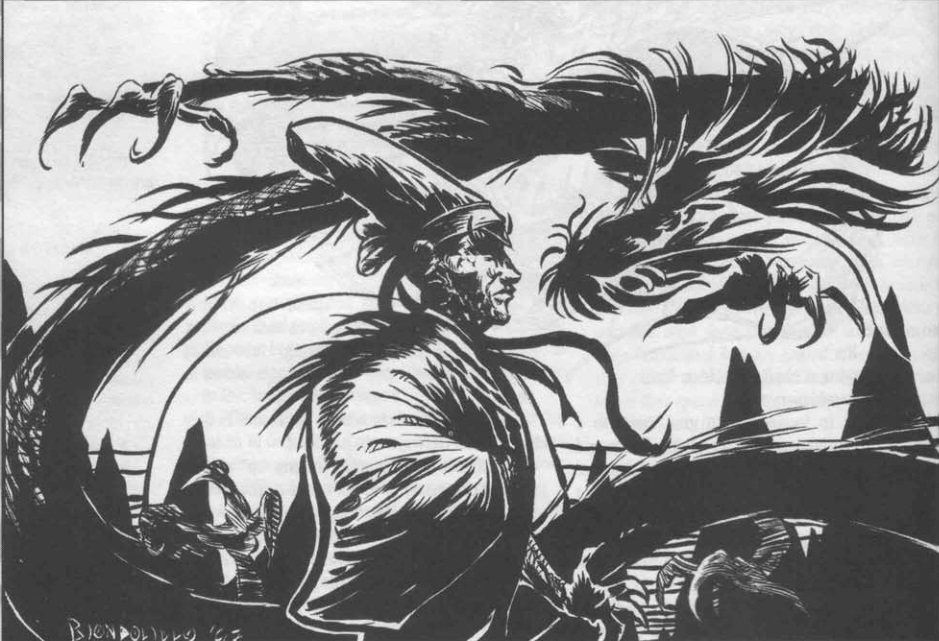
Farewell, my friend, I was a thousand times smugger than thou.
There have been seven dragons positively (?) identified. The first five are the elemental dragons, one per element. The Fire and Earth Dragons have the most defined shape, giant flying serpents of their element, while Water is more mutable, Air is invisible and Void only appears in dreams. There's been reports of a Thunder Dragon, which is actually a manifestation of Osano-Wo, the Fortune of Fire and Thunder. Lastly, there is Togashi himself. Only he could say if perhaps all the Kami were dragons, or could at least take their form. He's never been seen with other dragons, but sometimes leads human heroes into the Dragonlands. Phoenix shugenja say that dragons know their exact place in the Celestial Order, and the knowledge makes them powerful but bound to it. Maybe humans, who cannot truly see their place, have more freedom. Maybe!
Kaze-do began when one ise zumi monk, Togashi Kaze, got sick of how peasants were abused by bandits, samurai and worse, particularly after one Emperor banned peasants from wearing weapons. Kaze developed jiujutsu, and made it popular by talking shit to samurai faces and then wiping the floor with them, which made him quite popular with the peasantry. He taught his style to anyone who came to him except the samurai, as long as the Emperor persisted with his weapon-banning edict. Finally, the Emperor called him to his court, and demanded a demonstration of his technique, which Kaze refused. Furious, the Emperor ordered his Emerald Champion to cut him down on the spot, but instead the Champion committed seppuku rather than slay an unarmed man. The next Emerald Champion was not so scrupulous, and Kaze died without moving rather than showing off his moves. Since then, jiujutsu has been acquired by the samurai, but kaze-do (the original form) remains with the monks and the peasants.
Kaze-do is more focused on redirection and non-violence compared to regular jiujutsu. Both are the same Hand-to-Hand skill of the corebook, a character just jots down if they are trained in jiujutsu or kaze-do. Jiujutsu deals Strength+0k1 damage, while special effects like eye gouges and such should take Raises. Kaze-do uses throws, sweeps and nerve punches instead. A throw or sweep is an Agility + Hand to Hand with a TN of the opponent's Agility x 5. If successful, the opponent must make an Agility + Hand to Hand or Athletics roll against a TN of 15 + 5 per Raise on the original roll. If the opponent succeeds, they take no damage, otherwise they take the thrower's Strength + 0k1 damage (Raises included), and the TN to hit a thrown character that takes damage on the next round is 5. Never punches are... doesn't say! Grappling is similar to throwing and sweeping, but if the grappler's Agility + Hand to Hand roll succeeds they deal Strength + 0k1 damage per round until the opponent succeeds in a contested roll of Strength or Agility + Hand to Hand. Both character can use whatever Trait they want.
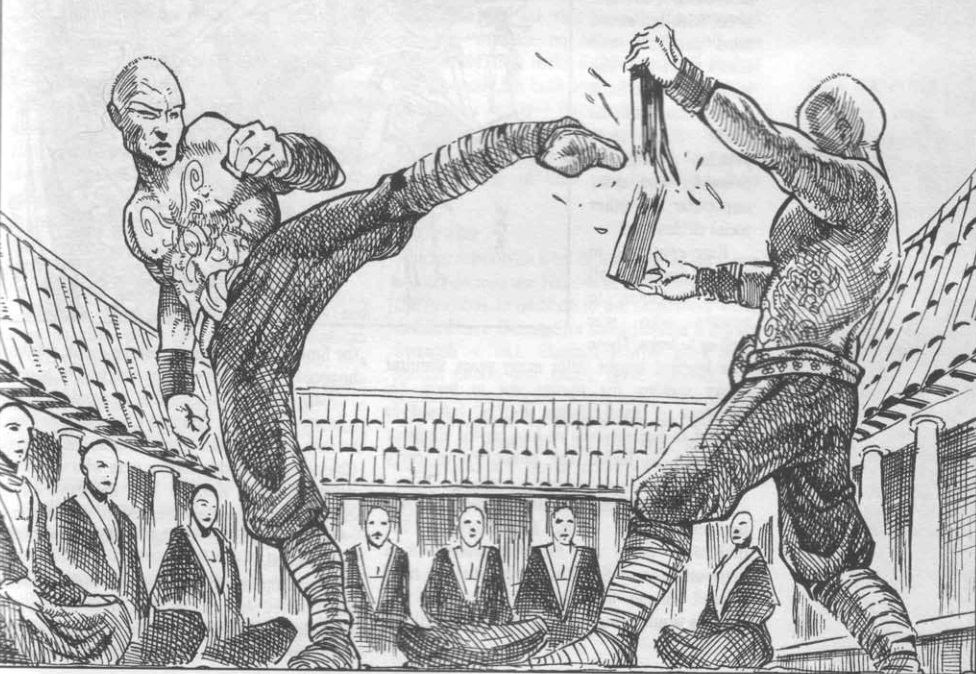
Break-Your-Own-Ankle kata, that's hardcore.
Agasha tricks! First, they get one (just one?) secret spell. Transform does exactly that, transforming one element to another. The TN to transform one thing into another depends on how many elements the first object is made of, and how many elements the intended result is made of. So transforming a rock to water (Earth to Water) has a TN of 10, the total number of elements involved times 5. A candle to water (Earth + Fire to Water) has a TN of 15, and so on. A katana is made of all five elements, because katana.
 Kagaku items are those that can be created with the Kagaku skill. They include
Moeagaru ("flash paper"), which can blind a character if held close to the eyes for one Action;
Poluvora (or polvora) is gunpowder, highly illegal in the Empire and unstable because the Agasha have yet to figure out that they should use saltpeter with their mixes. Each "dose" deals 1k1 damage.
Hinemuri ("sleeping fire") is a thin, transparent liquid that if disturbed ignites. 1k1 damage per round if prolonged contact is maintained.
Ekitai kemuri ("liquid smoke") is a liquid that emits a thick black smoke when lit: Stamina roll at TN 10 to pass through the smoke cloud.
Kagaku items are those that can be created with the Kagaku skill. They include
Moeagaru ("flash paper"), which can blind a character if held close to the eyes for one Action;
Poluvora (or polvora) is gunpowder, highly illegal in the Empire and unstable because the Agasha have yet to figure out that they should use saltpeter with their mixes. Each "dose" deals 1k1 damage.
Hinemuri ("sleeping fire") is a thin, transparent liquid that if disturbed ignites. 1k1 damage per round if prolonged contact is maintained.
Ekitai kemuri ("liquid smoke") is a liquid that emits a thick black smoke when lit: Stamina roll at TN 10 to pass through the smoke cloud.
Nemuranai! The Mirumoto daisho is what Hitomi is packing. They can only be drawn by someone of the Mirumoto family. The wielder knows the School and Rank of anyone they face. The katana gives one extra die to roll and keep per Mirumoto School Rank, while the wakizashi adds 5 to the TN to be hit per School Rank. Mirumoto Armor adds a number of -0 Wound Levels equal to the Mirumoto wearer's School Rank. Kitsuki's Coin is the only real magical accomplishment of the original Kitsuki, a koku coin that makes anyone that lies while holding it to glow red. Only others can see this glow. Agasha's Glass is a small glass that magnifies anything that the shugenja looks at, then analyzes the elements it is composed of.
 Twilight Lanterns are paper lanterns with a small fire spirit that responds to simple verbal commands and can focus the light if so wished. The spirit must be kept happy or else it will abandon the lamp forever.
Yon Tane-o Maku ("four seeds a day") are small seeds that completely feed a character for a day if they eat four of them.
Twilight Lanterns are paper lanterns with a small fire spirit that responds to simple verbal commands and can focus the light if so wished. The spirit must be kept happy or else it will abandon the lamp forever.
Yon Tane-o Maku ("four seeds a day") are small seeds that completely feed a character for a day if they eat four of them.
Mizugusuri ("mee-zoo-goo-soo-ree", quote unquote) are magical elixirs. A samurai can only have a maximum number of elixirs active in their organism equal to their Earth, or suffer GM-judged consequences. Most last 5 rounds if they have a duration. They are all created using Intelligence + Mizugusuri rolls, and Raises can be made to improve their effects. Bayushi's Bane is an antidote for any poison. Brother of Air makes the drinker immune to the effects of any Air spells for 5 rounds (there are Brothers of Earth, Fire and Water too) Crane's Tongue raises Awareness in 1. Dragon's Breath is a single shot breath of fire that deals 3k3 damage to the target and 1k1 to the user. Earth's Anvil makes the drinker immune to all Wound penalties until the Down level. Health heals a full Wound level, but not permanent wounds like missing limbs. Lion's Heart adds the character's Honor to all attack or damage rolls. Liquid Fire is not meant to be drunk; rather, it's a firebomb. Agility + Athletics or similar to throw, targets must get out of the way with a Reflexes roll or take 2k2 damage that increases by 1 die every round until they wash off the liquid fire. Smoke is also a thrown potion that creates a cloud of choking, stinking smoke. Stamina at TN 10 to move through it. Vitality increases Stamina or Willpower like Crane's Tongue, brewer's choice.
Miscellany! Also known as "we ran out of titles but still have to fill up space"
 There's some adventure hooks, like a super wise hermit that shows up near a waterfall once every ten years and an Asako scholar that wants to be there when he shows up, a mine suffering regular cave ins that can be natural, supernatural or committed by greedy Crab; a white woman that haunts Togashi castle, crying for her baby; a mad ise zumi that hunts and kills other ise zumi to rip off their skins and wear their tattoos
There's some adventure hooks, like a super wise hermit that shows up near a waterfall once every ten years and an Asako scholar that wants to be there when he shows up, a mine suffering regular cave ins that can be natural, supernatural or committed by greedy Crab; a white woman that haunts Togashi castle, crying for her baby; a mad ise zumi that hunts and kills other ise zumi to rip off their skins and wear their tattoos
 There's some description of the Dragon lands (as in, the physical lands of the Dragon clan) here: the Mirumoto live in the lowlands along with most of the peasantry, the Kitsuki live further into the mountains watching over mining towns and such, the Agasha are where things start to become fully isolated and the Togashi live in the highest mountains, where the mountains are freaky. Dragon peasants tend to be actually pretty pragmatic and friendly compared to their samurai overlords, though some goatherds can quote the Tao of Shinsei better than any scholar. Also, north of the Togashi castle there is a small cave where the
Sisters of the Moon live, three immortal sisters that tend to a shrine to Lord Moon himself. Only those who deliberately seek it and figure out the strange path can find it, and Yokuni does nothing about them. Or maybe, he can't!
There's some description of the Dragon lands (as in, the physical lands of the Dragon clan) here: the Mirumoto live in the lowlands along with most of the peasantry, the Kitsuki live further into the mountains watching over mining towns and such, the Agasha are where things start to become fully isolated and the Togashi live in the highest mountains, where the mountains are freaky. Dragon peasants tend to be actually pretty pragmatic and friendly compared to their samurai overlords, though some goatherds can quote the Tao of Shinsei better than any scholar. Also, north of the Togashi castle there is a small cave where the
Sisters of the Moon live, three immortal sisters that tend to a shrine to Lord Moon himself. Only those who deliberately seek it and figure out the strange path can find it, and Yokuni does nothing about them. Or maybe, he can't!
The book ends with a couple of CCG decks. Sadly, unlike ARB, I cannot offer any insightful commentary there - I didn't play the CCG! I can count 9 and 12 Rare cards, and one of them is called "Conspiracy Theory" because it uses Crane holdings to produce enough gold for the deck.
 There's also a small FAQ, including this gem:
There's also a small FAQ, including this gem:
quote:
Can I be a samurai/shugenja like Yokuni?
No. No. No.
He's one thousand years old.
He's a direct child of the Sun and Moon.
He's not even human!
Maybe after you've lived a thousand years, your GM will give you the okay, but 'till then, you'll have to suffer.
John, shugenja are already samurai.
And that's it!
Next: should I go with City of Lies, or Book of the Shadowlands?
Book of the Shadowlands: Knee Deep in the Dead
Original SA post Legend of the Five Rings First EditionBook of the Shadowlands: Knee Deep in the Dead
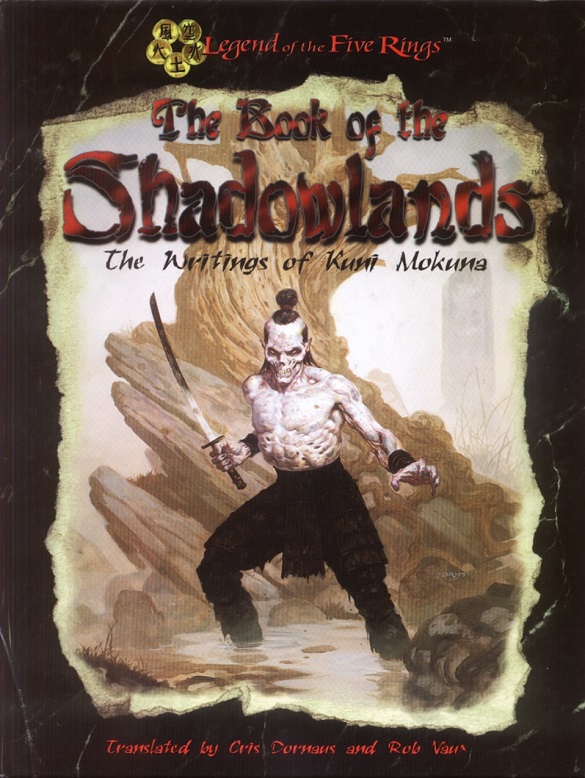
This guy is probably not your friend.
Now we get to dive into the bad place of Rokugan, the Shadowlands! This book ("translated" by Cris Dornaus and Rob Vaux) purports to be the collected writings of one Kuni Mokuna. Branded a heretic menace and a seeker of forbidden lore, he is ill-famed in Rokugan proper, but the Kuni family and the Crab Clan understand just how much he sacrificed to obtain vital knowledge to fight off the Shadowlands and its menaces. The preface is written by Kuni Yori, the Kuni daimyo, who defends Mokuna from the condemnation issued by those who don't have to deal with the Shadowlands everyday and also inserts commentary from time to time. The book is written mostly IC, with sidebars explaining actual game mechanics and the like. On with it!
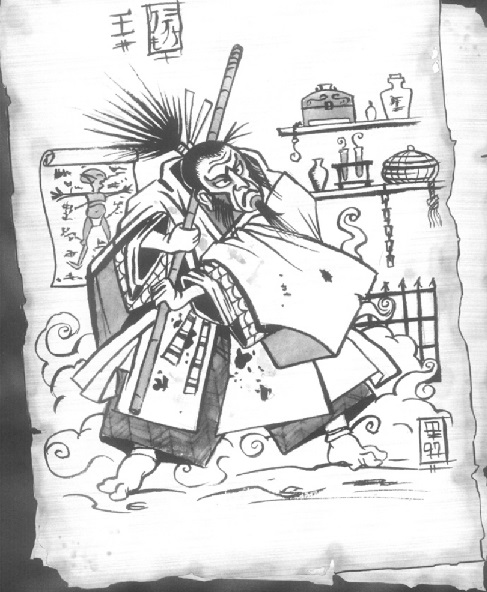
Kuni Mokuna, the funkiest scienceman.
Mokuna approached the Shadowlands with a scientific eye. He did not bother with pretty words for the horrors that lurk there - he couldn't afford to. In fact, even though children in Rokugan are taught never to say Fu Leng's name, that's exactly how he names him in his writings, which is yet another reason why shugenja are forbidden by Imperial decree from reading his journals. (Not that 'Fu Leng' is the Dark God's real name, it's just an epithet. Maybe the Twelve Black Scrolls that the Scorpions hold have the real name.) Myth pervades Rokugani conceptions of the Shadowlands, but by and large most people - peasant and samurai - don't understand what the Crab has to face. They fashion fantastic, but sedate visions of ogres and oni, while ignorant of (or actively denying) the reality. Mokuna thought that perhaps this was for the best, even if people like him had to study Fu Leng and his minions without hiding behind poetry and fantasy.
So, the Shadowlands themselves! As myth has it, Fu Leng fell from the heavens and the force of his impact created a pathway to Jigoku, the Demon World. There, he became twisted, and the evil of his presence corrupted the surrounding countryside. Mokuna's research indicated that the Nezumi have similar myths and they claim to be natives to the lands now corrupted by the Taint, and even Shadowlands creatures he interrogated maintain that once the land was green and fertile, before falling to corruption. The Shadowlands are a place of unease, where fires burn a sickly green but no wood or fuel actually catches fire. The forests are dead and desiccated; swamps are fetid, noxious and treacherous; deserts are dry and infested by foul flying creatures and monsters lurking underground; the coast is rugged and blackened, the waves bring nothing but sooth, and giant things lurk underwater. As for Fu Leng's lair itself, no one can tell. Only some intrepid Nezumi have made it close enough, and they are not telling about what they have seen. The Kuni Wastes were once the homelands of the Kuni family, until two hundred years ago the forces of darkness invaded, conquered and Tainted the land. The Kuni refused to yield, however, and with the Crab's help they took back their homelands and enacted a grand ritual that wiped out the Taint from their home - as well as all other life. Now the Wastes are barren and desolate, and perhaps nothing else will ever grow back there. The Kuni are lucky; the Hiruma, that still can't take back their family castle and lands without huge armies of monsters coming down to dislodge them without fail, less so.
The Shadowlands aren't a nice place is what I'm saying.

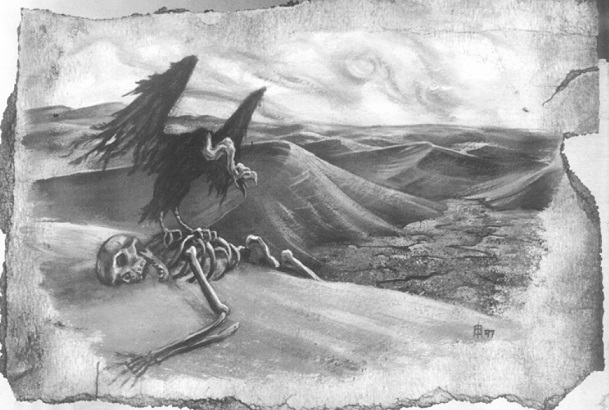
BWAAAK

Magic is very necessary when facing the dangers of the Shadowlands, and any adventuring group should keep at least one shugenja with them. However, they are not immune to the Shadowlands' corrupting influence. In game terms, any spell cast in the Shadowlands has its TN raised in 10 (except for maho), a shugenja gains one Shadowlands point per 5 points of failure, and they must make a Willpower roll with a TN of 5 x Shadowlands Taint. If this roll succeeds, the spell goes off. If it fails by more than 10, the spell fails (but it still counts as cast for resting purposes) If it fails by less than 10, instead of summoning a kami the shugenja summons a kansen, a foul corrupted spirit that will do its best to make the shugenja's life misery: giving bad advice, mistargeting spells, using goblin flesh on healing spells, etc. The Kuni maintain a special force of witch hunters, the tsukai-sagasu, who seek and destroy maho-tsukai and other corrupted people.
Speaking of the Taint! It's awful. Mokuna believed that the Taint blocked the natural flow of elements in the body, replacing it with Fu Leng's corruption. Physically it is more notorious, as the Tainted person becomes sickly, suffering cankers and blisters, and then progressing to horrible body mutations. Mentally, the subject becomes more easily irritable and prone to violence, moving on to violent bloodshed, eating of filth and other mental maladies in the latter stages. The Crab have learned to recognize the early signs of the Taint, and instantly remove anyone presenting it from the Shadowlands in order to stop the Taint's progress. Any human that dies in the Shadowlands becomes a zombie or skeleton, and because only decapitation disposes of them permanently Crab have as a custom the beheading of their own comrades when they die in Fu Leng's realm. Infection is also a great danger, as open wounds quickly become infested by the ambient Taint. Mokuna and other Kuni shugenja have developed jade salve to cleanse wounds and bandages, as well as a Blessing of Cleansing spell that sanitizes wounds and keeps food and water from spoiling in the Shadowlands. (Blessing of Cleansing requires a Honor roll on the target's part, and most Crab are low-Honor types
 )
Jade is essential, as it naturally repels the Taint. Carrying finger-sized pieces of the stuff allows people to survive without suffering the ambient Taint of the land, and its touch is extremely painful to oni and other unnatural creatures (though goblins and ogres aren't particularly affected by it, however - Mokuna speculated this is due to their soulless nature) Only natural jade will do: artificial jade like what the Agasha can do with their Transform spells is of no use. Healing the Taint is very hard: aside from the Purification ritual the Kuni developed along with the Phoenix, there is a recipe called
Tea of Jade Petals that Mokuna developed from the leaves of rare jade lotus grown with blessed water and infused with fine jade powder: a dose negates the tea's potency of Shadowlands points for 8 hours, at which point they return unless more tea is drunk. The tea also allows natural wounds recovery in the Shadowlands, since by default humans do not naturally regenerate wounds there.
)
Jade is essential, as it naturally repels the Taint. Carrying finger-sized pieces of the stuff allows people to survive without suffering the ambient Taint of the land, and its touch is extremely painful to oni and other unnatural creatures (though goblins and ogres aren't particularly affected by it, however - Mokuna speculated this is due to their soulless nature) Only natural jade will do: artificial jade like what the Agasha can do with their Transform spells is of no use. Healing the Taint is very hard: aside from the Purification ritual the Kuni developed along with the Phoenix, there is a recipe called
Tea of Jade Petals that Mokuna developed from the leaves of rare jade lotus grown with blessed water and infused with fine jade powder: a dose negates the tea's potency of Shadowlands points for 8 hours, at which point they return unless more tea is drunk. The tea also allows natural wounds recovery in the Shadowlands, since by default humans do not naturally regenerate wounds there.
These are all the wards and precautions against the Shadowlands Taint that exist.

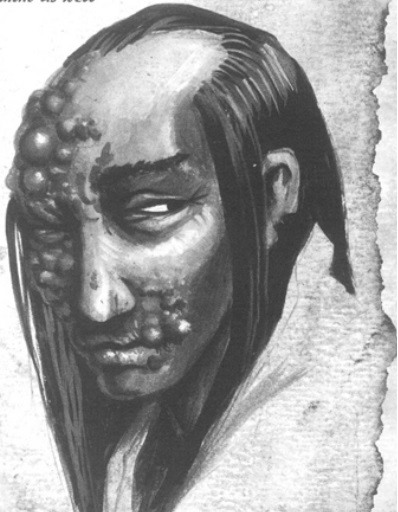
Swell dude, eh? geddit
Next: gobbos!
Book of the Shadowlands: The Shores of Big Stink
Original SA post Legend of the Five Rings First EditionBook of the Shadowlands: The Shores of Big Stink
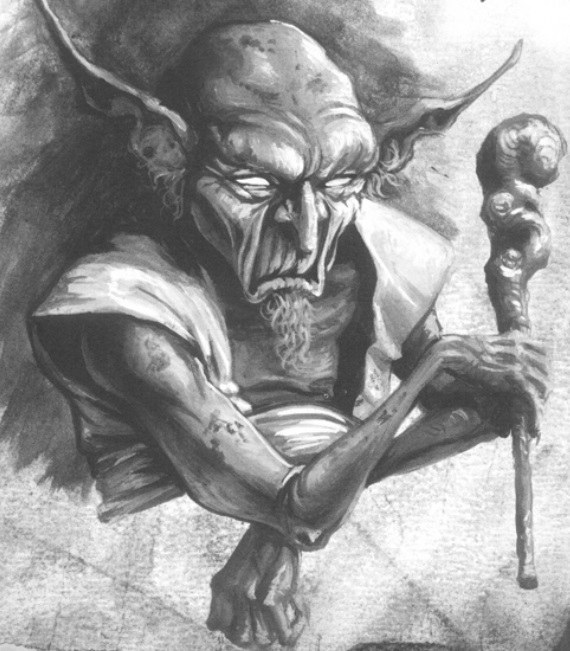
Basher will make the Shadowlands great again. Or probably not, since he's been dead for decades now.
Goblins! They're small, they're ugly, they're dumb and there's a bajillion of them. They are the Shadowlands denizens that Mokuna studied the most, because of the inexhaustible supply of "easily acquired research subjects." Most attempt to communicate with goblins are in vain: they mindlessly imitate human behavior in a bizarre mockery of society. They seem to have a language of their own but it's too guttural to understand. There are some rare goblins that are able to talk and hold a conversation, and a lot of what Mokuna learned about goblins comes from a particularly rare specimen called Basher, who Mokuna met when the goblin literally banged on his hut's door to have a civilized talk. Basher was a goblin genius, essentially, a wizened creature at the ripe old age of twenty-five. Basher went to see Mokuna (the "Tall Pain-Magic Man, Scary Watcher, Quiet Traveler") simply because other goblins were too fucking dumb to hold a decent conversation - Basher acquired his name because bashing dumb goblin heads for all sorts of slights is what he liked to do. He hated his own kind, but saw in them some potential and talked about the great things they could do if they ever set aside their destructive ways. Most other goblins are not nearly as farsighted as him, though - many just imitate what humans do when not attacking them, to the point of samurai hearing screeching goblins cry "return to your festering father, foul Shadowlands spawn!" when they charge.
Goblins are about three to five and half feet tall. They can be fast, but their bodies are twisted and weak - the only piece of resistance is the head, that can take quite some punishment without harming the goblin's pitiful excuse for a brain. Warmonger goblins are more muscular, aggressive, commanding and intelligent. Their sensitive ears flap and twist, revealing their mood. Goblin teeth are popular mementos for the Nezumi and some less scrupulous Yasuki merchants; Mokuna warns against collecting pieces of Shadowlands monsters without appropriate cleansing. Goblins breed like rabbits, with little regard for monogamy or family. Offspring is fed just to get the little goblings to shut up, but they become functionally independent in a matter of a few days. Goblins like to boast about their lineages in another form of human imitation, even including great Crab heroes in their family trees.
 Mokuna calculated that most goblins live around six years, notable individuals like Basher excepting.
Mokuna calculated that most goblins live around six years, notable individuals like Basher excepting.
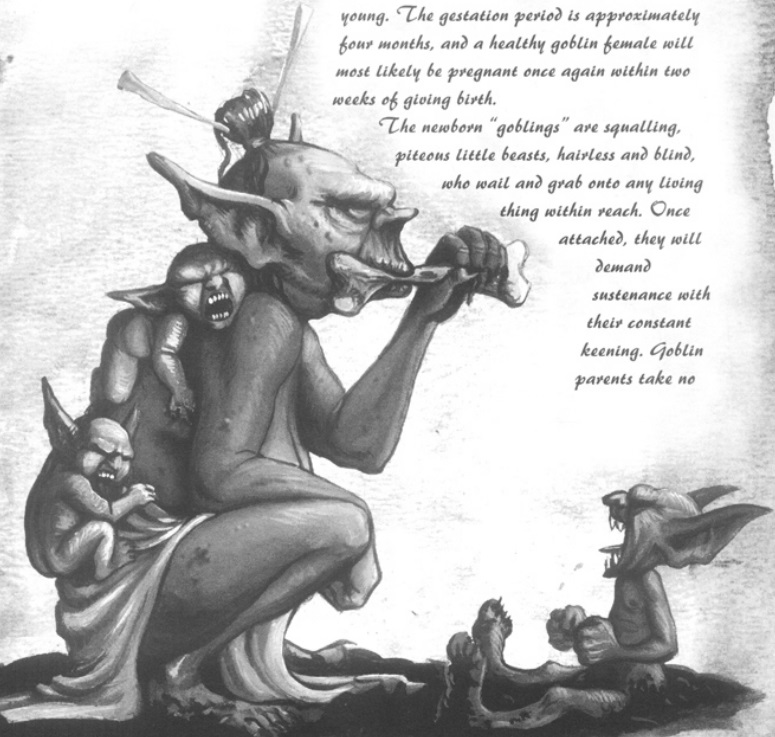
A goblin mom and something something make your own millennial joke.
Goblins are vicious, cowardly and murderous. They are still social creatures, and will obey orders from a warmonger or other figure of authority with glee. Some of the most ambitious warmongers are known as Kings, and though Mokuna never met one in the flesh samurai that faced them claim that they never managed to wound or kill the King, which Mokuna thought to be some sort of dark power from Fu Leng. In fact, goblin "kings" are actually oni created by Fu Leng as a last-ditch measure to give his goblin hordes a minimum of organization as a fighting force: in game terms, they have the same stats as a goblin warmonger with the Invulnerability trait. Goblin shamans understand nothing of magical theory or the kami, only learning spells through rote memorization and imitation: they can use maho or core rulebook spells with a "school" rank of 1 and a maximum Mastery of 3, but their TNs are bumped from 5 to 10 because they're fucking goblins.
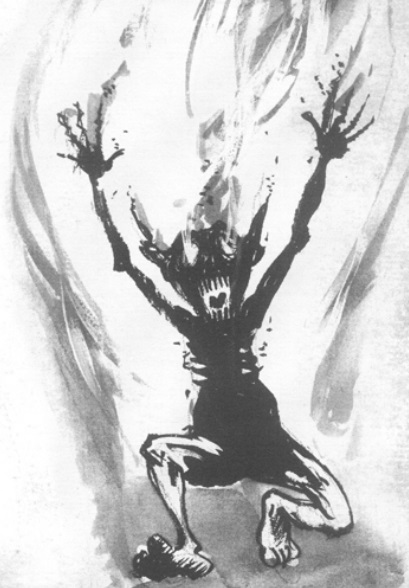
One of these is funny. A hundred of these can fuck your army up.
Goblin "villages" are just random collections of shacks and huts fashioned to somewhat resemble human cities. The largest of these is Big Stink, which Basher actually took Mokuna on a guided tour of, located in the ruins of an ancient Crab fortress a few days away from the Kaiu Wall. The "city" is chaotic and bizarre, but somehow it still keeps itself together. The goblins weren't thrilled about having a Kuni walking around, but Basher sorted them out. It's said that there is a king in charge of Big Stink, but neither Basher nor Mokuna ever saw him. Because of the unique opportunity to investigate goblin culture and tactics, Mokuna arrived at an unspoken pact with the goblins: they don't bother any shugenja that show up or try to acquire "research subjects," and the Kuni don't leak their location to the Hida. In fact, Mokuna and later shugenja weaved spirit wards around Big Stink so that no human scouts can spot the goblin city: Kuni Yori believes this to be wise, and has no intention of turning Big Stink into a target. The goblins repay the Kuni kindness by brutally slaughtering any goblin that even thinks of giving the Crab shugenja lip.
 Goblin tactics, incidentally, are dumb enough to be dangerous: they have no sense of self-preservation, and entire goblin mobs come down on a single target before moving to the next. Inexperienced samurai and generals assume that causing great casualties on a mob will make them scatter, but they will gleefully fight to the bitter end, even going as far as tarring their own in
"magic mud" and lighting them on fire to bring havoc to the enemy lines. Goblins can be very dangerous for human armies, but fortunately goblin armies of sufficiently large scale are very rare.
Goblin tactics, incidentally, are dumb enough to be dangerous: they have no sense of self-preservation, and entire goblin mobs come down on a single target before moving to the next. Inexperienced samurai and generals assume that causing great casualties on a mob will make them scatter, but they will gleefully fight to the bitter end, even going as far as tarring their own in
"magic mud" and lighting them on fire to bring havoc to the enemy lines. Goblins can be very dangerous for human armies, but fortunately goblin armies of sufficiently large scale are very rare.
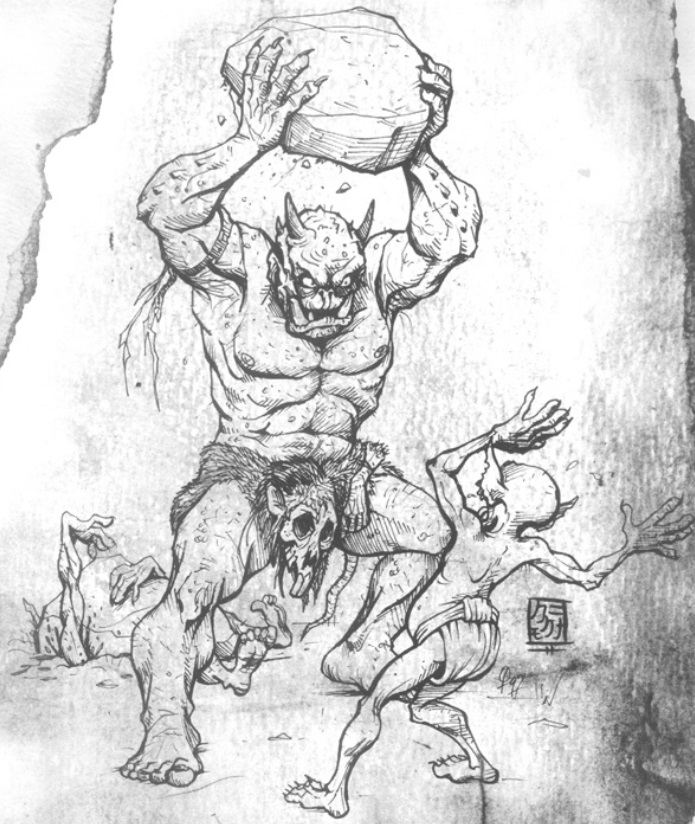
Breakfast of champions.
Ogres are much stronger and sturdier than goblins, of course. There are no reports of female ogres, and their population is considered to be rather small - speculation is that Fu Leng wasn't ready for the explosive growth of goblins and deliberately limited the reproduction of his next attempt at creating life. Ogres are territorial and solitary, with extremely rare reports of ogres working together. They are somewhat shy in isolation and refuse to eat food that they haven't killed themselves: Mokuna had one captured and gave him a live goblin for a meal, but even though the ogre killed the goblin it refused to eat in the presence of the Crab researchers until it starved to death a couple of weeks later. Mokuna mentions just how confused and scared the captive ogre was, and reasoned that this was what all of Fu Leng's wretched creatures felt like, all the time. But even in the best of cases, they must still be exterminated, all that can be done for them is granting them a quick death. They make their lairs in caves and leave the skulls of their prey in neatly arranged piles outside, perhaps as art or as a warning to possible rivals. They aren't terribly bright either, but sometimes an ogre will realize the convenience of wielding weapons or scraps of armor. Trolls are akin to ogres, but Mokuna was not sure if they were an offshoot of the breed or another species entirely. Trolls have two sexes and live in family units of up to five individuals, are probably amphibious, and make their homes in the swampy areas of the Shadowlands. They prefer to attack from ambush using their claws and big clubs (or small trees), screeching horribly all the time. Game-wise they're a little less tough than ogres, but a little harder to hit.
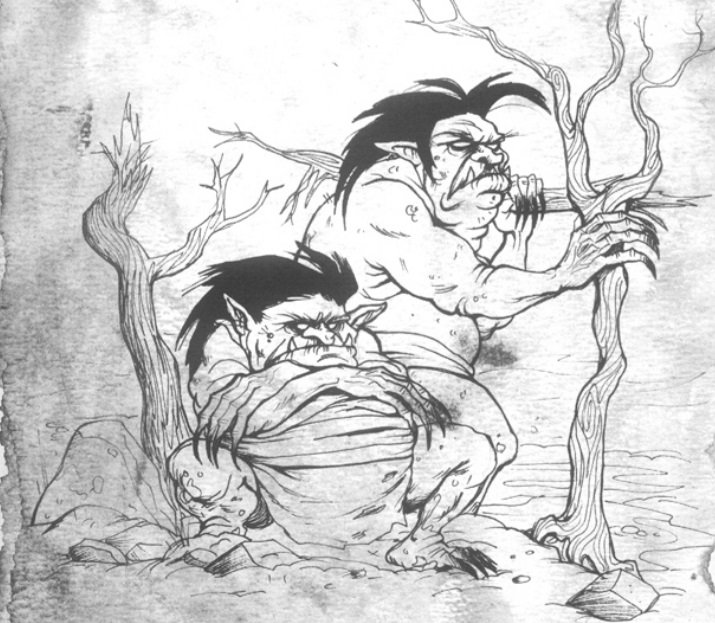
They probably don't play the banjo, and for that we give thanks.
Next: puzzle bosses of your nightmares, and special commentary by the Wick! (Which I kind of agree with!)
Book of the Shadowlands: Oninferno
Original SA post Legend of the Five Rings First EditionBook of the Shadowlands: Oninferno
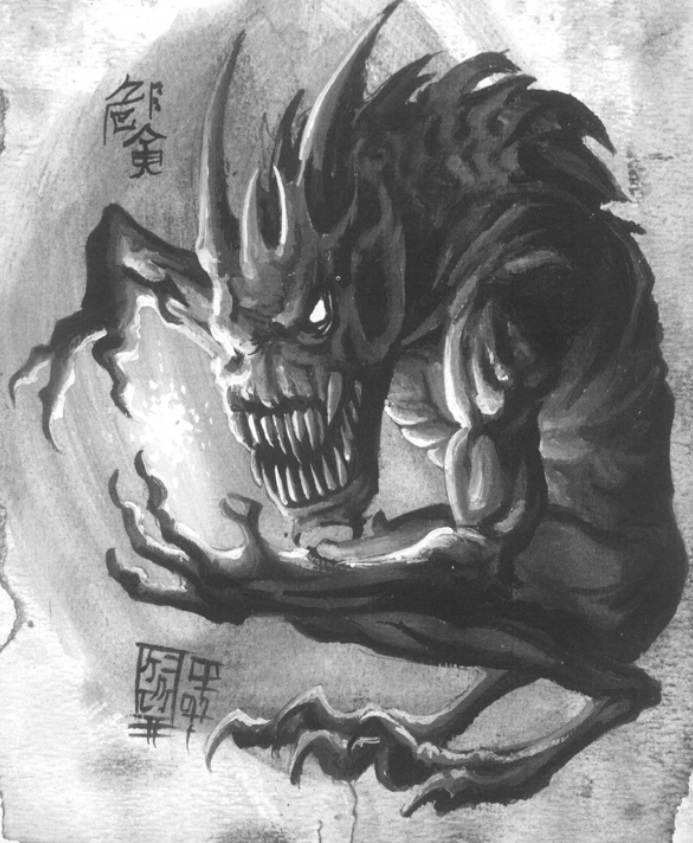
Those characters up there? 危険. DANGER.
Oni! The terrible servants of Fu Leng! They're going to fuck your shit up six ways to Amaterasu-day. Most of them have the Invulnerability power, so normal weapons will do diddly squat to them. Fu Leng spawns oni like no one's business, and is fond of creating one-offs just to fuck with the humans that have to fight them. Oni no Chi, for instance, is a fifteen-feet tall freak with enough teeth to make Jaws proud and dealing 10k7 on a 9k9 attack roll, but is also a 5th rank caster with the power to cast any Fire spell in one action in the Shadowlands (it gets to cast it regularly outside). And it has no problem Inflaming enemy shugenja's scrolls. And it takes 200 Wounds before croaking.
 Oni no Genso is a relatively more manageable opponent, with stats similar to a highly skilled bushi. Its main deal is that it actually knows how to fight with weapons, and continuously taunts and insults warriors with their own weaknesses and secret fears: in game terms, no Void Points can be spent within 20 feet of Genso and all characters' School Ranks drop by 2 (to a minimum of 0
Oni no Genso is a relatively more manageable opponent, with stats similar to a highly skilled bushi. Its main deal is that it actually knows how to fight with weapons, and continuously taunts and insults warriors with their own weaknesses and secret fears: in game terms, no Void Points can be spent within 20 feet of Genso and all characters' School Ranks drop by 2 (to a minimum of 0
 )
Oni no Ianwa is a lazy bastard with the highest Fear rating, 6, which seeks out weak-willed, desperate people and threatens to consume them until they sacrifice something to it. It starts small, asking for food or a weapon or whatever, and then progressing higher and higher (a daimyo's head or whathaveyou) Once the initial sacrifice is made, it plagues and haunts the victim until banished or confronted. In game terms, it's a Willpower vs Fear roll to avoid being taken in by the fear, and if failed the character must spend one Void per day to ignore the oni's demands. If this isn't done, the character has to fulfill the demand and then has to do another Fear vs Willpower roll that can only be done if the victim is at full Void and puts a -1 penalty on Willpower. If this one fails, the victim loses 1 rank of Void and Willpower. Honor 3+ characters can use Honor instead of Willpower, but risk their Honor. Fortunately (?) Ianwa has no way to actually threaten a character, so it'll fuck off harmlessly once a roll succeeds.
)
Oni no Ianwa is a lazy bastard with the highest Fear rating, 6, which seeks out weak-willed, desperate people and threatens to consume them until they sacrifice something to it. It starts small, asking for food or a weapon or whatever, and then progressing higher and higher (a daimyo's head or whathaveyou) Once the initial sacrifice is made, it plagues and haunts the victim until banished or confronted. In game terms, it's a Willpower vs Fear roll to avoid being taken in by the fear, and if failed the character must spend one Void per day to ignore the oni's demands. If this isn't done, the character has to fulfill the demand and then has to do another Fear vs Willpower roll that can only be done if the victim is at full Void and puts a -1 penalty on Willpower. If this one fails, the victim loses 1 rank of Void and Willpower. Honor 3+ characters can use Honor instead of Willpower, but risk their Honor. Fortunately (?) Ianwa has no way to actually threaten a character, so it'll fuck off harmlessly once a roll succeeds.
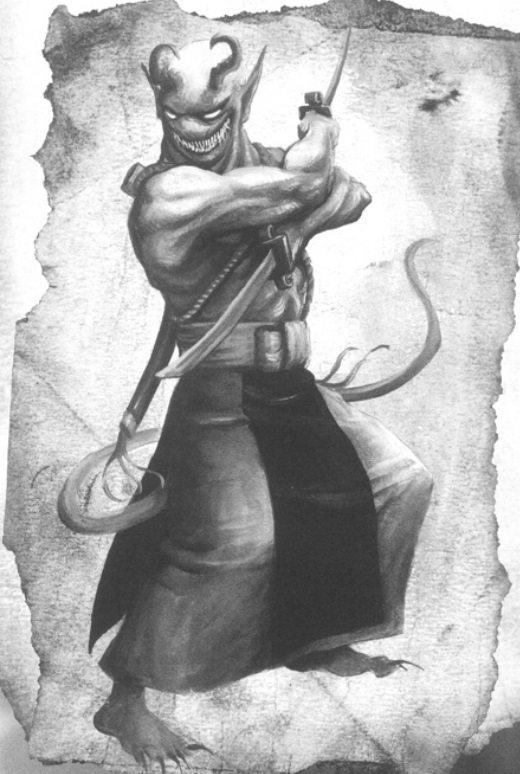
Genso knows you keep the full collection of Mahou Shoujo Isawa Kaede-chan: Fortissimo!!! in your home.
There are also oni subspecies around. Members of a subspecies are all identical, and form the core of the Shadowlands' shock forces. They're generally easy to predict because of this repetition. It's not understood how they procreate, maybe Fu Leng makes one whenever one is destroyed or something. Oni no Ashi is a desert tentacle monster that can shoot the spikes growing on its tentacles. The spikes are poisoned (Earth against 5x damage taken from a thorn attack, which is 1k1, if failed one of the physical Traits takes -1 for one hour). It doesn't have Invulnerability, though, so once a samurai gets up close they can slice and dice the Ashi. Oni no Byoki also doesn't have Invulnerability, but no one wants to get close to it. It is a virulent creature coated with pustules that explode on contact, showering enemies in infectious pus. Anyone hit by or within five feet of a struck Byoki has to roll Earth against TN 20 or become infected with a plague that will turn them into a plague zombie within three days unless they undergo a cleansing ritual; plague zombies have the same stats as a regular zombie but also have the plague, Earth vs TN 10 to resist it though. Oni no Doro is a kind of living mud monster, that lies in wait until someone steps on it and then shoots up to engulf them in foul mud, trying to suffocate them (on a hit, the victim has to break free with a Jiujutsu or Sumai roll in 3 rounds or they start choking, having to roll Earth against TN 5 or lose a whole Wound Level per round, the TN is doubled every round). It also has Invulnerability, and trying to cut a Doro up with bladed weapons usually only harms the victim. Fire gets part their Invulnerability, though. Oni no Gekido are berserking monster that can whip themselves up into a frenzied rage, which boosts all of their Rings to superhuman levels and makes them invulnerable to all normal weapons and spells. The rage only lasts a couple of rounds, however, and once it ends they tire out and become fragile, taking heavy penalties to all of their stats. Oni no Kiri is a fuckoff spider freak with bladed claws made with samurai blending in mind: it attacks three times per turn at 8k6 and deals 10k6 damage. It's so heavily armored that non-nemuranai weapons have a chance of breaking on a hit (Kiri has to succeed on a TN 35 roll with its Water of 5) It doesn't have Invulnerability, though, so even if the weapon breaks it will first deal regular damage. Oni no Manesuru are shadow creatures that perfectly imitate a samurai's actions and techniques. They have the same stats as the samurai they face (they work in groups and try to match their numbers to those of a party), and disappear once their opponent has been slain. They can perfectly parry or counterspell instead of attacking, and will always attack the round after doing this. They do not have Void Points, and rolls made with Void Points are not reflected in a Manesuru's rolls. Oni no Sanru are flying six-armed demons that can fly out of melee weapon range only to return with an 8k4 swooping attack. Oni no Sodatsu are hideous mounds of flesh that can conjure magic shields that protect them perfectly from attacks on one half of its body, but this leaves the other half free to attack (single Raise to move around the shield and hit) It absorbs any magic used against it, and if a spell is cast against a Sodatsu it can use the power to increase its Armor in 1 for three rounds, regain 10 Wounds, or keep an extra die for attack and damage. Oni no Ugulu are thirteen feet tall super-ogres that can tank any arrow except armor piercing ones and are immune to a single spell, determined by rolling 1d10 on a list that includes classics like Jade Strike or Katana of Fire. Oni no Wakeru are deceptively easy to hit, but once "killed" they split in two. Each copy also splits, becoming smaller but also harder to hit. The only way to destroy a Wakeru is by splitting it five times (and thus having to fight 16 mini-Wakeru from just one), at which point they can no longer regenerate. Oni no Yattoko are six-limbed desert insectoids with heavy carapaces that are immune to the Akodo precision strike and take two Raises to ignore their armor; they can also devour opponents with their belly maw and have them lose one Wound Level per round they spend inside. The limbs can be cut off individually, though, and once limbless it's trivial to kill a Yattoko.
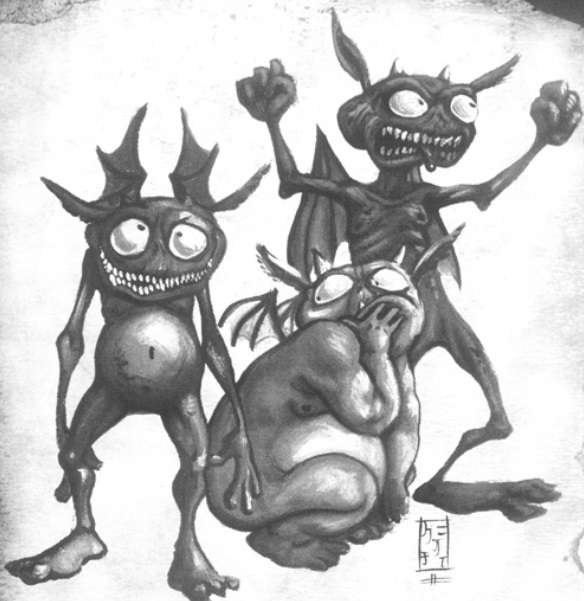
Kender that actively fuck with you and that you cannot touch. The unspeakable horror.
Then there's the Oni of Jigoku. These ironically are the most likely to be found by Rokugani, as they are the ones summoned by a maho-tsukai from the Demon Realm. These follow the oni rules mentioned in the GM Pack, with the note that once freed from their servitude by absorbing their name-giver's chi the oni goes back to the Shadowlands to become an oni lord, more powerful than even the oni directly created by Fu Leng. Mokuna speculated that oni agreed to be summoned and bound for the chance at freedom and great power. The four oni from the corebook (Akuma, Tsuburu, Kyoso and Shikibu) are the spawn of the oni lords, as one of the powers lords get is to create lesser copies of themselves. No one has seen the oni lords themselves and lived to tell of it, and it's possible that some of the other Shadowlands oni are actually the spawn of unknown oni lords. Fighting oni is, as abundantly established, hard as hell, Jade weapons are effective, and since oni wounded by jade cannot regenerate that damage some oni hunters harry their prey for days in hit and run attacks before finishing it off. But while jade-tipped arrows are not uncommon Mokuna only knew of four jade katana, all in the hands of Crab daimyo. Tetsubo and other polearms can be studded with jade, however, and Crab warriors have learned to coat their cutting weapons with oil and jade powder to grant their weapons cheaper oni-killing ability, but this doesn't last for long (full damage the first hit , then halving it until the jade effect is lost at the fifth hit) Crystal weapons are also effective, and Mokuna used many crystal jars and boxes sourced from the Unicorn to house oni organs and other foul tissues.
Now the book takes a temporary break from the IC style to give us rules on creating oni! We have three different stat blocks, from a "relatively weak" oni that most parties can kill to a "fairly strong" troublesome oni to a "extremely strong" TPK-causing oni. They all have Invulnerability, and the latter two have special abilities equivalent to one or two shugenja spells. There's a number of tables to roll for the exact number of limbs, eyes, what kind of body type and skin they have, and so on - the idea is to use the stat blocks and just reskin the oni to taste. And then we get advice by Ree Soesbee and John Wick themselves! Oni are nasty and murderous and that's the whole point of them. Parties do stand a chance against them, but they have to go in prepared. Using "wandering monster" tables is discouraged because of the brutal nature of the Shadowlands, and characters going into Fu Leng's domains carelessly deserve to get whacked.
quote:
If they don't take the Shadowlands seriously, get real nasty.
I'd like to show you what my Oni look like in my campaign, but our Standards and Practices Editor won't let me print it.

Ree mentions another thing to take note of: oni hunting is not glorious. If your samurai boasts of the Shadowlands monsters they've slain, they're going to get kicked out of any wholesome court in Rokugan because no one wants to even think of the Shadowlands, and the character might have the Taint with them. The Crab aren't doing this shit for honor or glory, but out of necessity and duty. But above all, the GM has to tell the players things: they can't expect the characters to be able to deal with oni if the GM isn't feeding the proper clues. If they get lost, they need more clues or "the invisible GM rubber hammer" to get them back on track. They shouldn't be afraid of the Shadowlands because they don't know shit, but because of the shit they do know. Also, remember that Shadowlands denizens can and do show up out of the Shadowlands, so you don't have to send a party to the buttend of the world just to have them fight some goblins and stuff. Like honestly, even if it's clearly Wick's writing at work this isn't awful advice for a place explicitly described as highly dangerous and inimical to humans.
Anyway, more monsters! Because not everything is an oni (or goblin, or ogre, or troll...) in Uncle Fu Leng's land. Many of these are found in Rokugan proper as well. Bog hags thrive in swamps and waterways, and envy the beauty of young women. They ambush and drown them when they are found alone, and then they skin their victims to pass off as them. Ew! Weak stats, but any hit has a 20% chance of causing a wasting disease that only goes away with a shugenja healing spell. Hanemuri are small flying monsters that can easily be killed with a good blow, if you can catch them. They're mostly a nuisance, but any wound taken in the Shadowlands can be deadly. Mountain goblins are similar to regular goblins, but Mokuna classified them as a different species. They live in the craggy areas to the north, and their most notable ability is their capacity to regenerate (they heal 2 Wounds per round and can reattach a severed limb simply by grabbing it and pressing it against the stump for a while) Mujina are some sort of spirit-like devils and tricksters, but aren't likely to be Fu Leng's creatures. They have stats but they simply cannot by hurt by attacks or spells, can become invisible at will, and most of what they like to do is trick and embarrass humans. They are annoying as hell but not deadly (though they can throw things for 1k1, the more valuable the better) and an Elemental Ward or similar will keep them at bay. They just move on when they get bored of their victims. Kuni Yori notes that one of his shugenja claims to have captured a mujina's shadow and thus pressed the creature into service, but he remains skeptical. Nikumizu are grub-like things that burrow into the flesh and deal 4 Wounds per turn and can only be removed surgically (the procedure deals 2k2 damage per nikumizu) Dead bodies in the Shadowlands may be crawling with the little bastards. Sanshu Denki are lumbering monsters that live in swamps and pools and like to jump up and devour prey whole (100% chance, minus 10% per point in Defense and rank of Reflexes) Its skin is covered by a blazing energy effect that deals 3k1 when touched or hit with metal weapons. Swamp goblins are also not true goblins, about as smart as an ogre or troll, and while vicious and dangerous they are consumed by curiosity. They like shiny things. Tsumunagi are flat, eel-like creatures that cling to flesh and deploy claws, hooks and teeth along their lower half, making them hell to remove. Low attack roll, but they deal 6k3 damage as they suck off blood and fluids. Fundoshi are EVIL VINES that trap and constrict unwary travelers: Mokuna believed that their sole purpose was procuring corpses for Fu Leng's zombie forces. It can strike with a number of vines, from 1 to 10, which are the dice they roll and keep for attack. On a hit, the target loses 1 point of Agility per vine, and if they reach 0 they are immobilized and will lose consciousness in (Willpower) rounds.
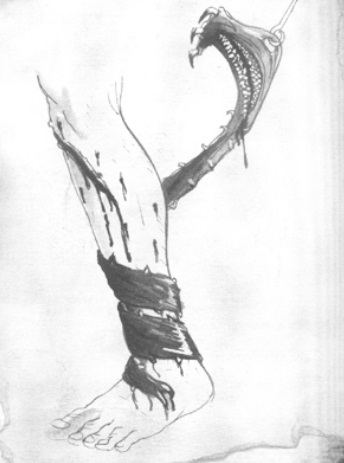
"So let me tell you about the time I got one of these suckers in my leg and---" "WE'RE TRYING TO EAT HERE, CRAB-SAN"
Next: the not-that-loathsome ratmen.
Book of the Shadowlands: Thy Ratling Consumed
Original SA postCrasical posted:
I know enough bad anime japanese to be amused by this.
The Lone Badger posted:
Why do you think they're called fun-doshi?
Mors Rattus posted:
Fundoshi are traditional Japanese underwear.
It's actually fudoshi, my apologies.

Legend of the Five Rings First Edition
Book of the Shadowlands: Thy Ratling Consumed
Let's talk about the Nezumi, or "ratlings" as the commoners know them. (But wait, if "ratling" is the commoner's word for them and "Nezumi" is the Rokugani for ratling, then...
 ) Kuni Yori notes that surprisingly, it's this section that made the Emperor of the time ban Mokuna's works, and keep in mind that in the oni section Mokuna notes how oni summoning has to be done REAL CAREFULLY rather than, you know, THIS IS FUCKING HERESY. Mokuna had a pretty tolerant view of the ratlings' beliefs, which makes his writings anathema to the vast majority of Rokugan.
) Kuni Yori notes that surprisingly, it's this section that made the Emperor of the time ban Mokuna's works, and keep in mind that in the oni section Mokuna notes how oni summoning has to be done REAL CAREFULLY rather than, you know, THIS IS FUCKING HERESY. Mokuna had a pretty tolerant view of the ratlings' beliefs, which makes his writings anathema to the vast majority of Rokugan.

The common misconception that Nezumi are Fu Leng's creatures is mistaken. They do live in the Shadowlands mostly, but are completely immune to the Taint. Nezumi look like human-sized bipedal rodents, their skin covered with fur of various shades. They are able to use weapons and tools, and can fight with their sharp claws in a pinch. A healthy Nezumi can outrun anything but the fastest galloping horse. They have similar organs to humans, with a much stronger, efficient stomach, and they can hear sounds beyond the human listening range. The mothers bear litters of six to eight children, that are considered the responsibility of the whole pack: they can move around and do things after their first year, and a five-year old Nezumi is considered an adult. All roles are gender neutral, and women can and do lead packs. They speak in high-pitched squeaks that Crab scouts learn to communicate with them better, and tribes teach their young a coarse form of Rokugani that is heavy on repetition of words.
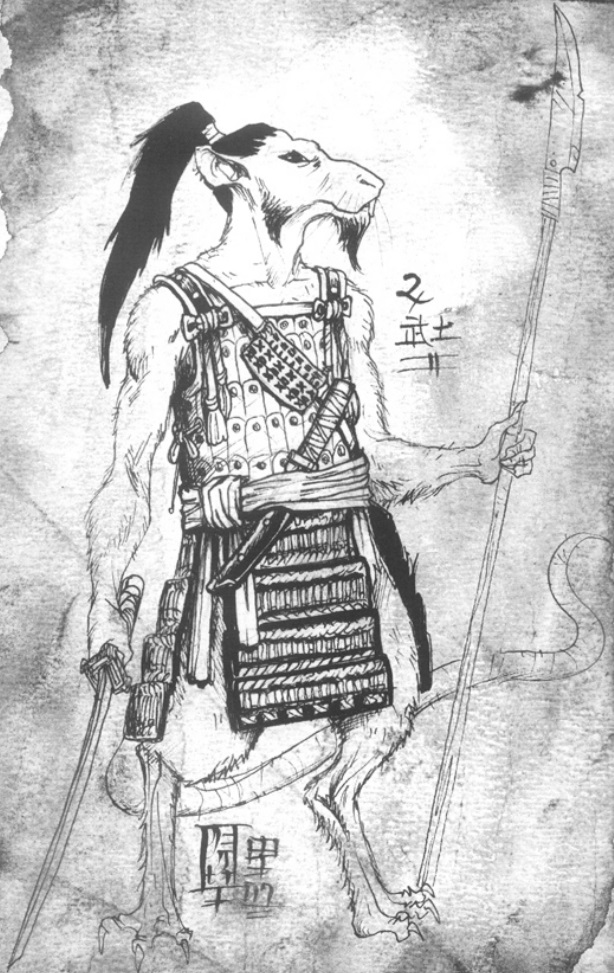
Just because he isn't wielding HIS GRANDFATHER'S SWORD doesn't mean he can't fuck you up.
Nezumi history is hard to map out, as their oral records mix fact and fiction freely and details change from pack to pack. The one thing all Nezumi tribes agree on is an apocalyptic event that happened a long time ago, and they divide their history in before and after the Terrible Day When Air Became Fire And Heaven Fell From Its Perch To Crush Our Glorious Home Beneath Its Blackened Corpse (shortened to The Terrible Day normally). The time before the Terrible Day was a golden age when the Nezumi lived in a kingdom ruled by a wise and benevolent emperor, food was plentiful, and great cities protected the race. After the Terrible Day, the Nezumi scattered into tribes, learning to survive in their new, harsh world. The parallels to human myth are obvious, but it must be noted that the Nezumi still consider the Shadowlands their territory and that no other races belong there. Mokuna surmised that this meant that the Nezumi are a pre-human race along with the Kenku and the Kappa, and perhaps they are immune to the Taint of a fallen Kami because they themselves are not creatures of the Kami. He intended to experiment by bringing a Kenku or Kappa to the Shadowlands and see if they were immune to the Taint as well, and noted the possibility that even if humanity manages to defeat Fu Leng, a territorial confrontation with the Nezumi might soon follow.
Nezumi society is centered around survival. They are nomadic, and tribes or packs of seventy to one hundred adults live off the land and scrounge or steal what they need. They are led by a chieftain, shaman or council of bosses. They generally shy away from human contact. They are nocturnal, making camp in hidden or well disguised areas at day and scrounging or traveling at night. Scouting is always done prior to a raid or scrounging effort: they never go into a situation without knowing what to expect. Food is the utmost priority in scrounging, followed by weapons and tools. If discovered, they will flee using various routes back to their base, and wise samurai know to let a Nezumi go. They become ferocious and savage upon being cornered. Once supplies are secured, the camp is dismantled and they move on. They circle the same range of territory over and over, depending on available resources and human attitudes to the Nezumi. Storytelling, singing and dancing are their primary forms of entertainment, while writing takes the form of simple warnings or directions.
They do not have a "priestly" class, but most tribes have a shaman or magician. They don't revere their ancestors, but instead consider the self as all-important, and by focusing their self with chants, body movements and bloodletting they can achieve magical effects. This is disturbing for shugenja, but despite the usage of blood it's not maho. They don't have a distinct warrior class, all Nezumi can and are expected to fight, though some are better at it than others. Peasants see them as evil spirits at times, and leave offerings of food and other supplies on the fields which the Nezumi happily take, perpetuating the belief. They loot everything they can find, and things humans consider waste find some use (or will find some use, eventually) in Nezumi hands, though they hold no particular attachment to any objects. This leads them to scavenging human tombs and shrines, and don't understand why humans get so mad about this - if they didn't want someone else to take the shiny sword-sword, why let it outside? All the same, humans can negotiate and even sign basic treaties with them, another sign in Mokuna's mind that they are not Shadowlands creatures.
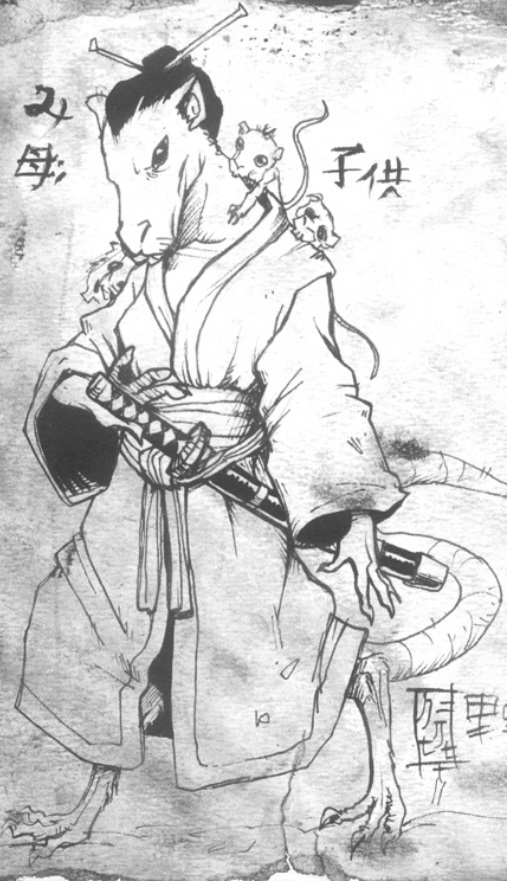
Look at 'em tiny ratlings

Mokuna could not tell if Nezumi philosophy predated the Terrible Day or was a consequence of it. The sense of individuality is foremost in their view of the world: every being has a right to survive, and no one can be faulted to do what they must to live. They are born on this earth with only a few years to live, and have no concept of reincarnation or afterlife. Thus, life is not to be discarded lightly. Once individual survival is secured, then family survival is next: the pack must secure enough food for all, protect the young, and put its interests above those of outsiders. Conflict between packs is uncommon, but it happens and it is accepted, though they prefer to compromise and shed as little blood as possible. Survival of the species is the third step of Nezumi philosophy: their home is decimated, their people scattered, and yet they survive and thrive where other races would have perished. Species survival involves sharing supplies with other tribes, assisting in conflicts where numbers can tip the scale, and refraining from shedding Nezumi blood. Thus, self-interest ultimately serves the race itself, and wild-eyed tales of cruel "ratling warlords" are to be discounted. Their collective self-interest would not allow it. But though Nezumi are skittish and rarely engage in hand to hand combat, they should not be discounted as cowardly. They use guerrilla tactics in battle, striking and scattering while the enemy hesitates to select a target. They shadow their threat, and continue hit-and-run attacks if deemed necessary. Mokuna observed one pack eliminate a gang of bandits by picking them off one by one, until the few survivors were too cowed and afraid to retaliate. Mokuna believed the secret of their immunity to the Taint was the key to defeating Fu Leng, and thought every samurai would do well to study their ability to scavenge and survive, even in the most inhospitable climates. The book ends with a letter of Mokuna's last surviving apprentice, one Daidoji Nazoko, to Kuni Yori. Rokugan may forget about his deeds and focus on his darker side, but he was a scholar and a brave man that gave everything (even his soul) to the defense of the Crab and Rokugan.

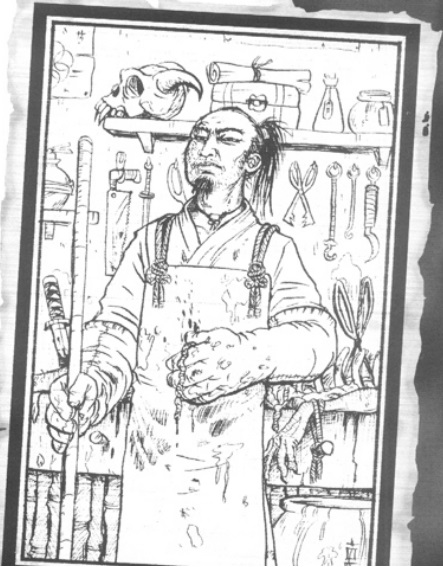
"Master, I know we just completed an autopsy of a swamp goblin, but can you stay still for a quick sketch?" Fuggen Crane.
We get a sample pack, the Tattered Ear, for use. They make their base in the Shinomen forest, near Crab, Scorpion, and minor clan Sparrow lands; they can be ported to almost any other place in Rokugan with a little effort. The Crab tolerate their presence, the Sparrow lay traps to get rid of the 'pests', and the Scorpion's attitude depends on individual villages and the state of politics in the Scorpion provinces. They once wasted an entire Scorpion fighting force that thought of killing the pack, though.
 They are ruled by a pragmatic chieftain, comprise seventy five adults (about 1/4 of these are "bushi") and take four to four and a half years to make their migratory tour. One of the chieftain's bodyguards is a young hotshot that dreams of being accepted into a human bushi school to learn their techniques - the rest of the pack sigh and hope he grows out of it.
They are ruled by a pragmatic chieftain, comprise seventy five adults (about 1/4 of these are "bushi") and take four to four and a half years to make their migratory tour. One of the chieftain's bodyguards is a young hotshot that dreams of being accepted into a human bushi school to learn their techniques - the rest of the pack sigh and hope he grows out of it.

Ratling chargen rules! These are explicitly for NPCs. Normally a GM should just use the corebook ratling stats and move on, but if they want to make a specific ratling NPC, here they are. Ratlings start at 2 on all Rings, but only have 20 CP. They cannot take most High or otherwise civilized skills, and Dance, Music, Painting and Poetry reflect ratling society and thus take a penalty of -2 to impress humans with them. Ratlings automatically start with Shadowlands Lore, Hunting, Defense and Stealth, and "bushi" get two skill points to use on any Bugei skill. They have no Advantages or Disadvantages and cannot join a bushi or shugenja school. Shamans start with three spells based on memorized ritual rather than spells or scrolls. Learning new spells needs the ratling to find another shaman willing to teach. They only have four Wound Levels (-0, -1, -2, Dead) but each level has Earth x 4 Wounds. They have no Honor or Glory, and are absolutely immune to the Shadowlands Taint (thus, they cannot perform actions that gain them Taint points like using maho) They have a list of possessions to start with. Roll two dice, and spend those points on the list. A katana takes 8 points, while a shiny object needs only 1, that sort of thing.
Next: The open steppe, fleet horse, falcons at your wrist, and the wind in your hair.
Way of the Unicorn: Shinjo Horse Adventures
Original SA post Legend of the Five Rings First EditionWay of the Unicorn: Shinjo Horse Adventures
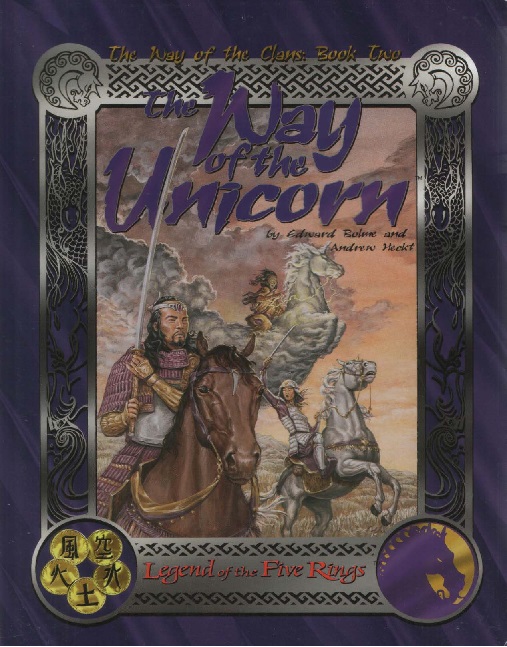
HORSIES
Time for the second splatbook! This one has Edward Bolme and Andrew Heckt as the main writers, along with a host of other AEG people like Rob Vaux, Cris Dornaus, Ree Soesbee and Marcelo Figueroa. Wick is there, but only credited in Editing. And off we go!
But not before making a pit stop on RPG FICTION!

This one starts with a horse mare dying in childbirth, but the new foal is also stillborn. A bad omen, murmurs the stable master. As he and the clan's lorekeeper leave the bodies, a little girl sneaks into the stable, crying. The foal can't be dead! That is her horsie! His mom was her mom's horsie! The stableboy notices her futilely trying to bring the foal back to life, but lets the girl grieve for her loss, what harm can it do? Her mom died in a battle with the Lion, poor thing. But a miracle happens - in her arms, the foal breathes! As the men rush back into the stable, he struggles to rise, cheered on by the girl - come on, he can do it, there's nothing to be afraid of, none of them have to be alone anymore! And he does! The lorekeeper, Iuchi Daiyu, notices a birthmark on the foal's coat - shaped like a lightning bolt. An omen of war... but not death. Not this time.
The girl grew and became Otaku Kamoko, taking on the name of her mother. The celebration is done Unicorn-style, with tests of skill and courage, remembrance of the clan's glorious deeds, and renewal of family vows. Daiyu is happy for the new adult, but also concerned - a prophecy said that the first Otaku would show up to announce her chosen heir hasn't come to pass. Surely old stories, and Kamoko doesn't care: she's happy. Like the clan daimyo, Shinjo Yokatsu, she's more at home on the saddle, and also takes the opportunity to name her now tall and proud horse, Hachiman. She does not care for things like flirting or courtship: she is a battle maiden. She slips the boring poetry readings and takes off with Hachiman on a lone ride; she likes it better that way. Good that she does, anyway: she spots a lightning bolt crash and start a fire on the nearby forest! Which also puts the Otaku stables in danger! She rides hard to raise the alarm, and as the evacuation unfolds then the stablemaster realizes that one of the barns is in the way of the fire, full of pregnant mares. Kamoko doesn't think of it twice and rushes through the blazing forest to rescue them. She reaches the barn, her hair and kimono singed by the fire, and ties the mares together to lead them to a safe place with Hachiman. On and on they rush, with her carrying Hachiman's own child in her arms - but a large tree falls right over them. All is lost, and she only thinks of protecting the foal and her horse.
Death never arrives, because someone cuts the tree in half. A woman, on a huge large steed, salutes with a gleaming blade. When Kamoko arrives back with the mares to the rejoicing of the clan, she tells Daiyu of who she saw: the Lady Otaku herself. The prophecy has come to pass, and with Kamoko with them the Unicorn will win the war that is to come.
quote:
For over eight hundred years, the Unicorn have journeyed outside of Rokugan, discovering new technologies, magic and philosophies. Their beliefs are strange, yet somehow familiar, perhaps echoing a long time ago, when Rokugan was still young and naive.
Are you ready to learn their secrets?
Well then, give me your hand and I'll pull you up. Don't worry about that hunk of dead cow flesh; it's only a saddle.
Hold on now. You're in for a ride you'll never forget
Oh, yeah - leather is questionable to the rest of Rokugan. This setting.
The book is structured in a similar manner to Way of the Dragon, which means we now get more RPG FICTION in the form of in-setting letters. Two of them are from a Scorpion samurai in the early years of the Unicorn resettling into Rokugan. The first regretfully informs the family of another Scorpion of his untimely death. See, the Scorpion was sent as an emissary with proof of an Ide samurai's "less than wholly honorable behavior" ages ago as leverage against his descendant. Something went terribly wrong: all of the emissary's belongings were returned to the Scorpion, untouched. The Ide samurai reported the matter to his own lord, and the emissary was executed.
 The second letter, to the Scorpion daimyo of the era, reveals that the emissary was hung, drawn and quartered by the Unicorn. Which presented both a leverage and a hindrance to the Scorpion: they don't realize the Scorpion's power or the implications of this event in the Rokugani courts - or maybe they do, and they
don't care. Which would make them extremely dangerous, but at the same time, they might prove to be an ally unlike any of the other Scorpion allies: a willing one. Another letter from Akodo Toturi narrates his first encounter with an Unicorn warhorse. He stayed with them for a summer, learning their ways, and though thoroughly revolted at the idea of sitting on "dead cow skin" he was marveled at the horse's control and power, and then promptly fell off it. The Unicorn maiden that was minding it seemed a little disappointed that he survived the experience.
The second letter, to the Scorpion daimyo of the era, reveals that the emissary was hung, drawn and quartered by the Unicorn. Which presented both a leverage and a hindrance to the Scorpion: they don't realize the Scorpion's power or the implications of this event in the Rokugani courts - or maybe they do, and they
don't care. Which would make them extremely dangerous, but at the same time, they might prove to be an ally unlike any of the other Scorpion allies: a willing one. Another letter from Akodo Toturi narrates his first encounter with an Unicorn warhorse. He stayed with them for a summer, learning their ways, and though thoroughly revolted at the idea of sitting on "dead cow skin" he was marveled at the horse's control and power, and then promptly fell off it. The Unicorn maiden that was minding it seemed a little disappointed that he survived the experience.

History! Because of course. Shinjo, whose speed defeated Hida in the Tournament of the Kami but also was her undoing when facing Bayushi, was singular among the Kami. She loved Fu Leng most of all her siblings, and knew of his desires to create life and great plans. Alone of them all, when Fu Leng turned to darkness she sought to understand why, and against Hantei's wishes she went to the Shadowlands alone. The demons did not touch her, afraid of her divinity and sword, but threatened and taunted her. Shinjo did not harm them - she was only there to see her brother. She went to see him because she had to know why he fought them, because he was her brother, and because of love. Fu Leng was corrupted to hell, and still she loved him. She failed to rescue Fu Leng, but returned in time to hear of Shinsei's call for mortal heroes. One of her servants, a woman named Otaku, silently accepted the quest. Little is known of Otaku; her daughter, Otaku Shiko, is better known in myth.
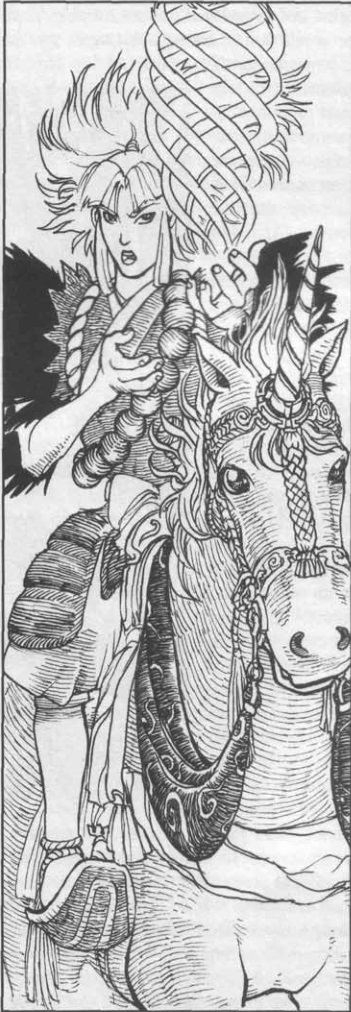
Shinjo:
 as fuck.
as fuck.
When Fu Leng fell to the Seven Thunders, Hantei gave orders to all of his siblings. But Shinjo was not there to receive them: she was gearing up to march. She felt the Kami had failed their people, forcing them to bear the brunt of the war, and what other evils existed outside the Empire? Shinjo gathered her Clan, the Ki-Rin, and released them of their vows to her. She planned to go on alone, and yet three families followed her: the Otaku, led by Otaku Shiko; the Iuchi, and the Ide. From Hantei, she received two magical mirrors to stay in contact, Doji gave her a precious sandalwood fan, and all of her brothers and sister gave her wise advice. And so, she left towards the Burning Sands north of Rokugan. The journey was harsh and the travelers exhausted their provisions quickly, but eventually they made it to the steppes beyond, where they met a tribe known as the Ujik-Hai, who tried to trick them with a parlay and subsequent ambush. The Rokugani proved to be too tough for the raiders and Shinjo herself killed their chieftain, which made the rest scatter. Some returned to Shinjo later, begging for her protection. More and more Ujik-Hai joined her forces in later days, and from them the Rokugani learned how to survive and live as nomads. Shinjo made sure her people never lost their Rokugani ways fully, though, regularly holding ceremonies and making sure they adapted the Ujik-Hai to their culture instead of the other way around. The clan traveled west, reaching cities of evil sorcerers. The first Iuchi, by now an old man, recovered an object called a "book" from the sorcerers, filled with words, names and secrets. From these the Iuchi family would derive their unique brand of magic, one not born from the Celestial Order. Eventually, the clan reached an oasis, and Shinjo saw a ghost of some sort. She ordered her people to stay away, and went alone to seek it. She went missing along with the oasis.
 Eventually a pregnant Shinjo returned to a very pissed off Otaku Shiko, who threatened to kill her because she broke her promise. Indeed, she had, she had abandoned her own - but she made a new
Promise, that whenever Shinjo left, she would always return to them. Months later, Shinjo took her true form, that of the legendary Ki-Rin, to bear her children: they were mutable creatures, that could shift between human and animal with ease. This finally made Shiko not want to murder her Lady.
Eventually a pregnant Shinjo returned to a very pissed off Otaku Shiko, who threatened to kill her because she broke her promise. Indeed, she had, she had abandoned her own - but she made a new
Promise, that whenever Shinjo left, she would always return to them. Months later, Shinjo took her true form, that of the legendary Ki-Rin, to bear her children: they were mutable creatures, that could shift between human and animal with ease. This finally made Shiko not want to murder her Lady.
 Eventually their ability to shift was lost, however, and they had to decide between staying as human or as animal.Four of them became mighty steeds, while the latter chose to remain a "manchild." Their later journeys took them to fight roc riders, flying carpets and many other dangers, one of which claimed the life of one of Shinjo's children. The clan decided to break apart in four groups, cutting one of Hantei's mirrors in four to remain in contact. One of these groups took tall, powerful horses from distant cousins of the sorcerers they had found in their early years.
Eventually their ability to shift was lost, however, and they had to decide between staying as human or as animal.Four of them became mighty steeds, while the latter chose to remain a "manchild." Their later journeys took them to fight roc riders, flying carpets and many other dangers, one of which claimed the life of one of Shinjo's children. The clan decided to break apart in four groups, cutting one of Hantei's mirrors in four to remain in contact. One of these groups took tall, powerful horses from distant cousins of the sorcerers they had found in their early years.
Eventually, Shinjo summoned her people back in an emergency. The three other groups found a blighted land: some sort of outcropping of the Shadowlands, so far away from Rokugan. Little is known of Shinjo's battle with the Living Darkness, only that she tried to attack the fortress of the Darkness but failed, and surrounded by its minions she commanded her people to charge through and never look back. Shinjo herself and three of her children were lost to the Darkness. Pledging their allegiance to Shinjo's last child and renaming themselves the Unicorn Clan, they marched on and on for a long time until they reached the western coast of the continent. Here, they decided to make their way back to Rokugan, summoned by a garbled message from Shinjo. They went in through the Shadowlands, but these were ruled by the Darkness instead of Fu Leng: there was no Taint and jade did not turn black, but the creatures of the Darkness were powerful and the land itself drove men mad. A full generation passed until they finally reached the realm of Fu Leng; Rokugan was close.
The exhausted Unicorn ended up in the business end of a Crab attack, who were informed by their scouts of a massive purple-clad army marching against them. Throwing caution to the wind, the Unicorn charged with their steeds, breaking through the Crab forces and marching on beyond to their ancestral lands. They moved through the Scorpion lands, who quickly informed the Lion and Phoenix of the "Shadowlands" invasion while keeping their own forces in reserve. A Phoenix shugenja eventually caught up with the Unicorn under a flag of truce, talked to them and brought their representatives to Otosan Uchi, where they presented Doji's fan to prove that they were the long-lost people of Shinjo finally returned. The Lion refused to believe this, and fought the newcomers along with the Scorpion. The Phoenix stood for the Unicorn, while the Crab fucked off because since the Unicorn weren't Shadowlands freaks it wasn't their business anymore.
 Finally, a gift of two mighty Otaku steeds stayed the Emperor's hand, the Scorpion and the Lion were ordered to stand down, and the Unicorn were officially recognized. That was two hundred years ago. The Unicorn have adapted themselves to Rokugan and seen many battles: their cavalry and tactics have proven valuable to all clans. Many of the Rokugani elite still refuse to recognize them as a Clan due to their barbarian ways (eating red meat like eta, wearing the skin of dead animals, holding different holidays!) but never to their face. This doesn't bother the Unicorn much: they've been looking out for themselves for ages and that isn't changing anytime soon. They uphold their Imperial duties with honor, justifying their place in Rokugan, and respect the treaties they make closely - but insulting their ways and customs is a sure way to get on the wrong side of a cavalry charge.
Finally, a gift of two mighty Otaku steeds stayed the Emperor's hand, the Scorpion and the Lion were ordered to stand down, and the Unicorn were officially recognized. That was two hundred years ago. The Unicorn have adapted themselves to Rokugan and seen many battles: their cavalry and tactics have proven valuable to all clans. Many of the Rokugani elite still refuse to recognize them as a Clan due to their barbarian ways (eating red meat like eta, wearing the skin of dead animals, holding different holidays!) but never to their face. This doesn't bother the Unicorn much: they've been looking out for themselves for ages and that isn't changing anytime soon. They uphold their Imperial duties with honor, justifying their place in Rokugan, and respect the treaties they make closely - but insulting their ways and customs is a sure way to get on the wrong side of a cavalry charge.
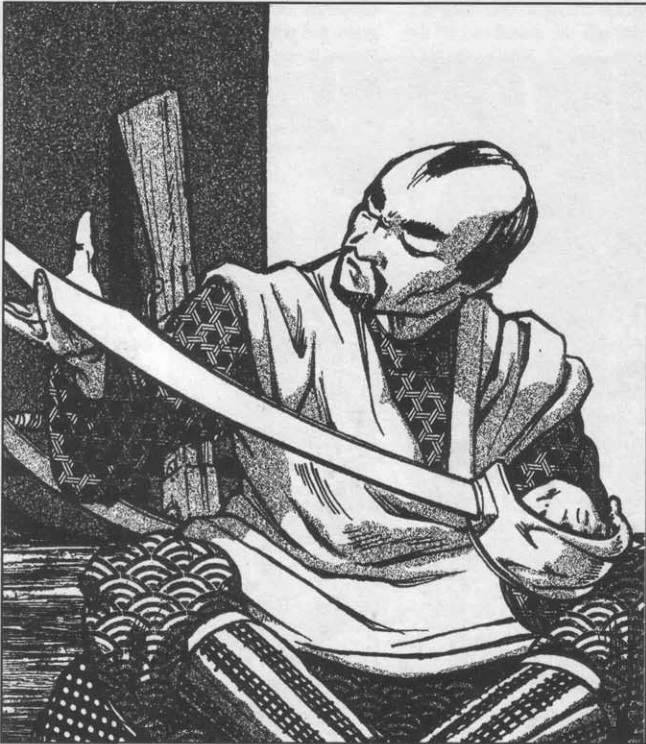
It's not a katana, but it'll do nicely.
Next: ALL THE HORSIES
Way of the Unicorn: The Rough Rider Life Style
Original SA post Legend of the Five Rings First EditionWay of the Unicorn: The Rough Rider Life Style
Modern Unicorn society descends from what Shinjo's people learned in their travels. Their clan structure is militarily influenced, and they routinely divide themselves into wandering troops that comprise people from all the clan families. While samurai are still at the top of the chain, ranked by Glory instead of family affiliation, they lead their heimin followers more directly than other clans. The commoner structure is also different: merchants at the top for their importance in acquiring supplies, hunters, artisans and farmers. People who work with horses are honored. Hinin are considered the responsibility of a samurai: if a samurai won't provide food and a means of travel for one, they are outcast. Same with criminals. Women are traditionally kept away from hand to hand combat, but samurai women are expected to learn archery and to come to battlefields with their children to dispatch wounded enemies and retrieve arrows. Unicorn children learn to ride from an early age, and at their gempukku they ritually declare their desire to join the Unicorn Clan, since fealty comes not from blood but from devotion. Unicorn do not retire to a monastery, but serve and work well into their old age. When a samurai feels they can no longer serve properly, they embark on a lone ride called a kurichitai, inherited from the Ujik-Hai. Only their horse returns from this last journey. The Unicorn do have permanent holdings such as castles and cities, and their schools are all housed in the various family castles.
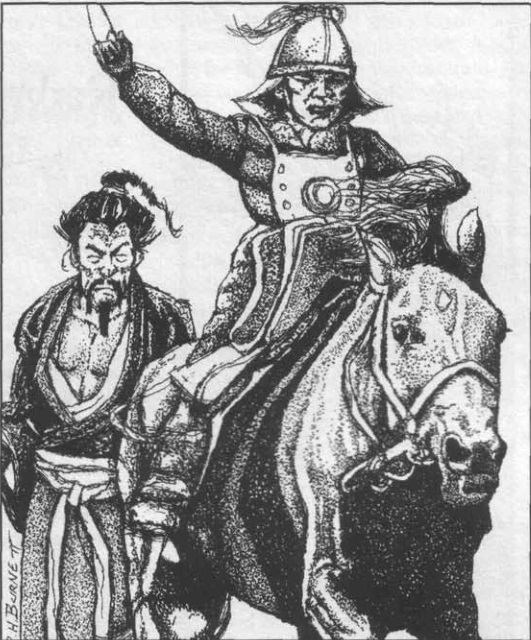
Sweet Horsebro and Hella Samurai.
Because of their incorporation of the Ujik-Hai, the Unicorn have a formalized way to accept non-Unicorn into the Clan. It involves the prospect proving themselves to the clan, joining up with the troop for minor duties, and eventually taking part in a ritual that involves the blood of the prospect and the troop leader. (It's said that Shinjo bled for forty hours straight to bring in all the Ujik-Hai that flocked to her banner.
 )Which other Rokugani don't like one bit, but it's not like
their fealty ceremonies don't involve blood, as seen at the end of the corebook's introductory adventure. Shinjo's Promise and her compassion for the suffering of the common people have filtered down to her descendants. The Rokugani social contract between samurai and commoner is lopsided: the samurai has no real obligation to protect the commoner that serves them. For the Unicorn, this is not so - the samurai protects the commoner, the rich gives to the poor, the strong stands for the weak. Their justice tends to be pretty merciless all the same, because of the difficulties in carrying criminals with a troop. Death or exile are the most common penalties: samurai may be allowed to commit seppuku but may also just be dishonorably executed. At the same time, once the penalty is paid the matter is settled and if they survive the criminal's past is never brought up again. Shinjo established as law that no Unicorn ever draws the blood of another Unicorn: all duels between Unicorn are fought with boken or shinai wooden swords, and they do not draw their katana unless they intend to kill with it.
)Which other Rokugani don't like one bit, but it's not like
their fealty ceremonies don't involve blood, as seen at the end of the corebook's introductory adventure. Shinjo's Promise and her compassion for the suffering of the common people have filtered down to her descendants. The Rokugani social contract between samurai and commoner is lopsided: the samurai has no real obligation to protect the commoner that serves them. For the Unicorn, this is not so - the samurai protects the commoner, the rich gives to the poor, the strong stands for the weak. Their justice tends to be pretty merciless all the same, because of the difficulties in carrying criminals with a troop. Death or exile are the most common penalties: samurai may be allowed to commit seppuku but may also just be dishonorably executed. At the same time, once the penalty is paid the matter is settled and if they survive the criminal's past is never brought up again. Shinjo established as law that no Unicorn ever draws the blood of another Unicorn: all duels between Unicorn are fought with boken or shinai wooden swords, and they do not draw their katana unless they intend to kill with it.
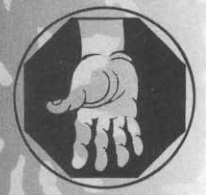
The Ide mon, an open
And now, the families! The first of the Ide was an unassuming, but accomodating samurai. He was the perfect liaison between the gaijin and Shinjo and her people. Over the centuries, this natural ability became tradition. The Ide are the clan's spokespersons, and always strive for peace and understanding. They work as the Clan's administrators and quartermasters, doing all the busywork required to keep things going. Many of them have found their way into the Imperial Court, where they have reorganized and simplified the code of law for the benefit of all, particularly the common folk. They also make sure that Unicorn bushi are promoted to magisterial positions and proclaim their deeds in court, thus giving the Clan a reputation of "lawmen." Their expertise with diplomacy makes them more readily accepted by other Clans than other Unicorn.
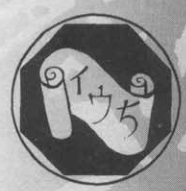
The Iuchi mon, a scroll with the family name written on it. For some reason they switch from katakana to hiragana at the end

The founder of the Iuchi was a regular shugenja, who in his travels with Shinjo met all sorts of sorcerers and wizards using magic completely foreign to him (many were just charlatans and con artists, though
 ) How was magic without the assistance of the Seven Fortunes possible? As he learned, their influence does not stretch too far away from Rokugan. Studying with these workers of magic and trading arcane knowledge of them, Iuchi finally clicked on a truth of the Tao of Shinsei: all is one. Where Rokugani tried to become one with the elements, the foreigners assumed this was so from the start. A brazen, but powerful method of thinking, and Iuchi and his followers adapted it to their own spells by turning them into petitions to the Elements themselves instead of using the Fortunes and kami as middlemen. He also discovered a new form of magic,
name magic that allowed his descendants to create powerful talismans by invoking the power of the words of creation. The Iuchi know that there is no one true way of magic, and thus improvement and the use of tradition as a foundation rather than a rigid rule are the norm among them.
) How was magic without the assistance of the Seven Fortunes possible? As he learned, their influence does not stretch too far away from Rokugan. Studying with these workers of magic and trading arcane knowledge of them, Iuchi finally clicked on a truth of the Tao of Shinsei: all is one. Where Rokugani tried to become one with the elements, the foreigners assumed this was so from the start. A brazen, but powerful method of thinking, and Iuchi and his followers adapted it to their own spells by turning them into petitions to the Elements themselves instead of using the Fortunes and kami as middlemen. He also discovered a new form of magic,
name magic that allowed his descendants to create powerful talismans by invoking the power of the words of creation. The Iuchi know that there is no one true way of magic, and thus improvement and the use of tradition as a foundation rather than a rigid rule are the norm among them.
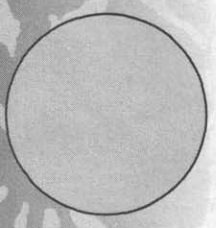
The Otaku mon is a simple field of purple. That's purple, shut up.
Otaku never said she would join Shinjo. In fact, she never said anything that was recorded. The Shinjo and Iuchi believe that this comes from Otaku's unwavering devotion towards Shinjo, while the Ide and Moto believe that if Shinjo strayed from her path Otaku would not allow her word to tie her to her cause. The Otaku themselves don't even discuss the issue and consider it pointless sophistry. The Otaku family believes in actions over words, and are known today to be people of few words. They do not believe in idle chatter, and yet some of the most beautiful poetry of the Unicorn Clan (and all of Rokugan) was penned by Otaku poets. They are fiercely loyal to family, daimyo, friends and Clan, decisive and stubborn. They have special all-women cavalry forces known as the battle maidens, who have a nearly spiritual bond with their steeds. This bond only comes to those who are of the blood of Shinjo. They are expected to have the purity of the original Otaku, who only married and had children so that her line could continue to serve Shinjo. Otaku swore never to teach a male of her line how to ride, and since that day Otaku men are cut off from inheritance and bound to be footmen. In exchange, they take care of the precious Otaku steeds, and the family does not consider a stable to be anything other than a corral without an Otaku man in charge. The battle maidens consider the propagation of their house to be important, and they recognize the need to retire, marry and have kids (not necessarily in that order!) This is not considered shameful among them unless it happens "too early."
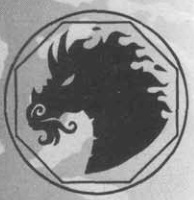
The Shinjo mon is the legendary ki-rin, which they consider to be the true representation of their Kami.
The Shinjo family is the largest of them all, mostly because it is the one that receives all adoptees into the clan. They pursue military careers almost exclusively and display more restlessness than the other Unicorn families: even the current daimyo, Shinjo Yokatsu, abandons his castle for weeks to go riding and hunting. This makes their defenses unpredictable, as the Unicorn cannot be counted to be anywhere in particular - an invading army can be attacked on their flank by an Unicorn army that just happened to wander their way. The Shinjo love freedom and independence and do not like to be contained, seeking out new places and experiences. They don't put much energy into unnecessary formalities and pomp, and seem to have a "glow" of peace and well-being around them.
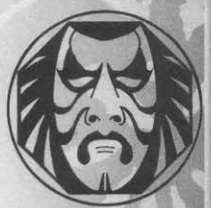
The Moto mon, a death kabuki mask. 3spooky.
The Moto family descend from a gaijin that distinguished himself in Shinjo's service seven hundred years ago. They became the "right hand" of the Clan, shock cavalry used to break the enemy lines in difficult battles. They proved themselves time and again as powerful and brave soldiers, and it seemed like the family's star would rise forever until tragedy fell upon them. The Unicorn went to assist the Crab with containing the Shadowlands, and the family daimyo, Moto Tsume, led his forces with confidence and bravado; his men openly laughed and bet on how many goblin and oni heads they would take. What happened in the Shadowlands is unknown, but all the Moto that went there fell but for a few prematurely aged trembling survivors that would not speak of the terrible battle. Since then, undead Moto have been seen in the Shadowlands riding hellish steeds, led by the inhuman laughter of their doomed daimyo. The Moto name is associated with horror and shame, and the living Moto wear white armor in recognizion of their failure. They are grim, cold people, and prefer to live in self-imposed exile out of Rokugan, where their White Guard is notorious among the gaijin. A Moto warrior is relentless and determined, fighting even when mortally wounded, and their scouts always volunteer for the most dangerous tasks.
Next: Disadvantage: Your Name is Alvin.
Way of the Unicorn: Moto Racer
Original SA post Legend of the Five Rings First EditionWay of the Unicorn: Moto Racer
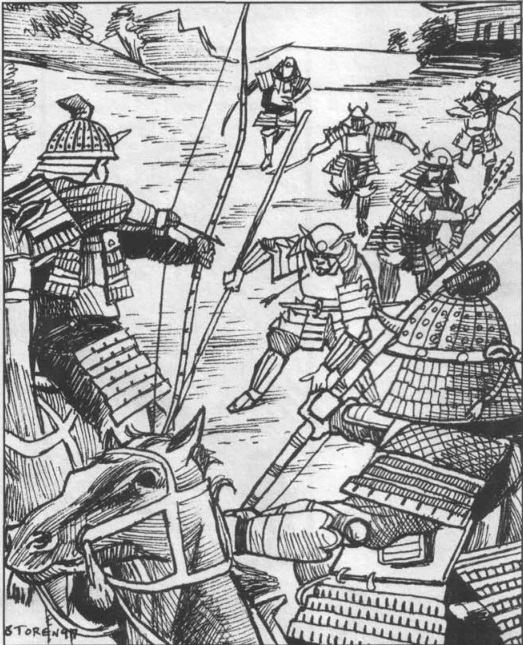
Eat tiny arrow, dick!
Time for the new character options! As before, we start with new skills. Animal Husbandry (Horses) is essentially Horsemanship without the "riding a mount in combat" aspect. It is the footman's version of Horsemanship. Horse Archery requires a dai-kyu horse bow, is not generally available to non-Unicorn and allows shooting from a horse (TN increases in 10 with one of the other archery skills, and using Horse Archery on foot also increases the TN in 10) Lance is a skill only available to Unicorn bushi that trains them into lancing from horseback. When charging from a mount, a lancing character deals his weapon's DR plus the number of rounds charged for damage, and must make a Strength + Lance check at a TN of 5 x rounds charged or lose the lance. Honestly, sounds kinda lame. Yomanri is the gaijin style of archery that involves actually aiming at things, and of course only Unicorn learn it. Attacks made with Yomanri make the archer's TN to be hit 5, use Agility rather than Reflexes, and for each round a Unicorn spends aiming at a target they get a free Raise on their to hit roll. They may do this for a number of rounds equal to their Yomanri score, or half that for moving targets. New Advantages are Gaijin Gear (2 points, select a single gaijin item, can only be taken once) and Irreproachable (add +5 to the TN of seduction and bribery attempts per point spent on the advantage, cannot take Greed or Lechery) New Disadvantages are Adopted Blood (needs +5 Glory Points to go up in Rank per point gained from this disadvantage, the penalty drops by five for every Glory rank raised), Gaijin Name (you can use the letters L or V and other non-Rokugani phonetic combinations, -1 die to social interactions with non-Unicorn), Greed (1-3 points, opponents get +5 to their bribery rolls for each point and you can't resist bribery attempts with Honor), Lechery (same as Greed but for
 ),
Moto Curse (mandatory for all Moto, their reputation is such that they gain no Glory, rewards or accolades from non-Unicorn and have -3 to all social rolls with them, at least people are a little scared of you),
Never Sat on a Horse (1 point, Unicorn only, you can't ride for shit but you can buy this off with 1 XP) and
Overconfident (Perception + Battle roll at
30 or else you stay and fight against superior forces, cannot take Great Destiny)
),
Moto Curse (mandatory for all Moto, their reputation is such that they gain no Glory, rewards or accolades from non-Unicorn and have -3 to all social rolls with them, at least people are a little scared of you),
Never Sat on a Horse (1 point, Unicorn only, you can't ride for shit but you can buy this off with 1 XP) and
Overconfident (Perception + Battle roll at
30 or else you stay and fight against superior forces, cannot take Great Destiny)
Advanced Horsemanship rules! Well, if they're going to show up in a book it's gonna be here. Horsemanship rolls aren't required for everyday stuff like taking an easy ride or traveling across the land, but for controlling the horse properly in difficult conditions. Even something like going at full gallop doesn't take a Horsemanship roll unless you're racing falling boulders or something. When on horseback, combat skills are capped by Horsemanship to a minimum of 0. Mounted characters roll an extra damage die in melee against infantry, and get to roll twice and pick when using the hit location rules. Infantry adds 5 to their TN to hit a mounted foe, roll one less die of damage, and if using hit location they roll twice but the target picks the result. There's no penalty for attacking the mount, however.
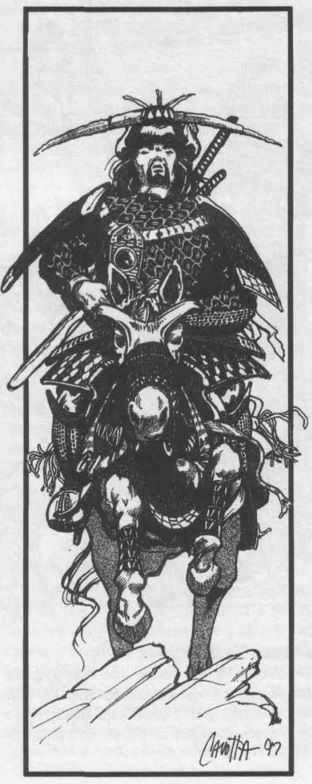
Not really sold on the horned helmet, no.
The Ide family (+1 Awareness) teaches the Ide Emissary school. It discourages violence, and as such the Moto daimyo forbids his people to attend it (not that they want to anyway) +1 Awareness, 2.5 Honor. Their skills are Horsemanship, Etiquette, Law, Kenjutsu, Sincerity, Commerce, Courtier.
- Rank 1: the emissary adds their Honor to any social roll. Any random initial reaction roll (do these exist?) is similarly adjusted. The emissary also gets a reflexive Awareness + Etiquette roll at TN 20 to avoid a faux pas instinctively. They don't get more information than this: the emissary knows not to ask about the daimyo's son, but not that the son died of the flu a week earlier.
- Rank 2: the emissary may make an Intelligence roll to remember anything said or done in their presence. TN depends on the importance and significance of the event. They also can make Perception + Investigation rolls to figure out things about someone's personality. The better the roll, the more they find out.
- Rank 3: if a situation turns violent or otherwise disagreeable, the emissary gets an Awareness roll against a TN of the other side's Void + Sincerity times 5. Success gives the emissary a free round before anyone else may act. The emissary can stab the jerk in the face as this free action.
- Rank 4: Sincerity and magic enhancements no longer work against the emissary. They may make Investigation vs Sincerity rolls when being told a lie to figure out true facts.
- Rank 5: so long as the emissary does not raise a hand in violence, would-be attackers must roll Willpower vs the emissary's Awareness + Void. Failure means the attacker forfeits that action and all other actions taken against the emissary that turn.
The Ide Emissaries are cool, and probably one of the best "field" courtier schools. The other courtier schools tend to be more esoteric but the Ide can hold their own in a fight. They'll still get owned by a dedicated bushi but can probably get them to sit down and have a nice cup of tea and horse milk first.
The Moto family (+1 Void, must have Moto Curse) goes to the Moto Bushi school. +1 Willpower, 1.5 Honor. Their skills are Yomanri, Defense, Horsemanship, Hunting, Kenjutsu, Meditation, Shadowlands Lore. At least they have the very generous outfit list of other Unicorn bushi, including two items of Fine quality.
- Rank 1: the bushi adds their School Rank to their TN to be hit and to any damage roll they make.
- Rank 2: the bushi can detect the presence of Shadowlands creatures with an Awareness check. The TN depends on the number of the creatures, their size, distance, whether there's obstacles in the way and so on. It can also detect the Shadowlands Taint on a person with enough time spent in their presence.
- Rank 3: the bushi gets 2 attacks per turn, but only if they use Full Attack.
- Rank 4: the bushi may use 2 Void Points per round, and can declare their use after the dice are rolled.
- Rank 5: if the bushi dies, they may will their spirit to ravage their body and prevent it from being reanimated. They also replace their Down and Out Wound Levels with -4, Dead with -5, and then -6, -7 and so on. They may keep fighting under -4 for up to their Void in rounds, but must be healed to -4 or better at the end of this period or they die.
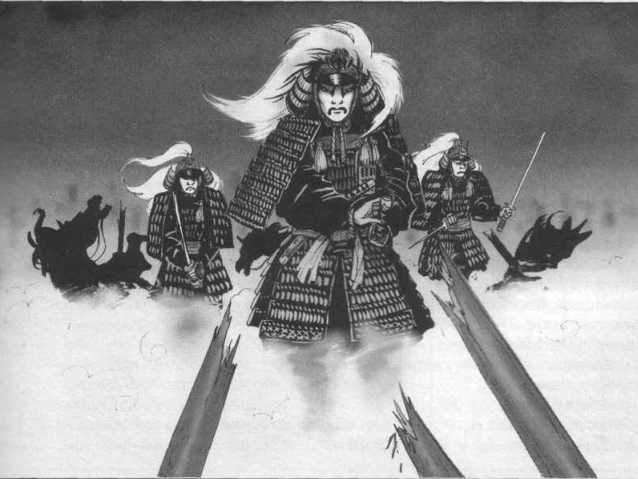
Grim and/or dark.
The Otaku Battle Maiden school is only for Otaku women. Non-Unicorn may not enter, and even Unicorn women from other families must take the Different School advantage (normally used to go to the schools of different Clans) at 3 points instead of the usual 5. This is because the school requires a direct blood link to Otaku. Men may never join this school, most Otaku bushi men end at the Shinjo school. +1 Reflexes, 3.5 Honor. Their skills are Horsemanship 2, Defense, Kenjutsu, Battle, Lance and any High or Bugei skill. They also get an Otaku steed along with their generous outfit.
quote:
"Go for the horse; she can't fight without it."
- last words of many a bushi
- Rank 1: the maiden may roll a keep an extra die for any of her school skills when mounted.
- Rank 2: after initiative rolls, the maiden may switch her initiative roll with her TN to be hit for the rest of the round.
- Rank 3: the maiden subtracts her School Rank from the damage she takes from hits, this also includes Battle Table wounds.
- Rank 4: the maiden gets two attacks per round on horseback, and if she kills an opponent while mounted she may attack another foe at the end of the round. She can do this once per each of her two attacks.
- Rank 5: the maiden rerolls any dice that come up less than her appropriate Trait once per round, mounted or unmounted.
Get horse, get yari, go
 on a fucker.
on a fucker.
The Unicorn also have heritage tables! 1 point to roll for this, and again you can get a "ha ha, get fucked you can't play a Unicorn" result. You can get some interesting results like having the blood of another ancestor in your veins (thus getting you a secret spell as a shugenja, or the rank 1 tech of a school that isn't the Maidens as a bushi
 ) or having barbarian blood in your veins (+1 to any Trait that is at 2, Gaijin Lore 1, and a gaijin appearance that functions as Social Disadvantage and Bad Reputation for non-Rokugani but hey, you can have all-American blond hair if you want) You can also pay 4 CP for a chance to roll on the Fortune tables, but have to first roll to see if you get to roll on the good fortune table or bad fortune table. So you can get extra honor, an exquisite item, a healing potion... or lack your horse, break your family katana or have serious gambling debts. Ayyy.
) or having barbarian blood in your veins (+1 to any Trait that is at 2, Gaijin Lore 1, and a gaijin appearance that functions as Social Disadvantage and Bad Reputation for non-Rokugani but hey, you can have all-American blond hair if you want) You can also pay 4 CP for a chance to roll on the Fortune tables, but have to first roll to see if you get to roll on the good fortune table or bad fortune table. So you can get extra honor, an exquisite item, a healing potion... or lack your horse, break your family katana or have serious gambling debts. Ayyy.
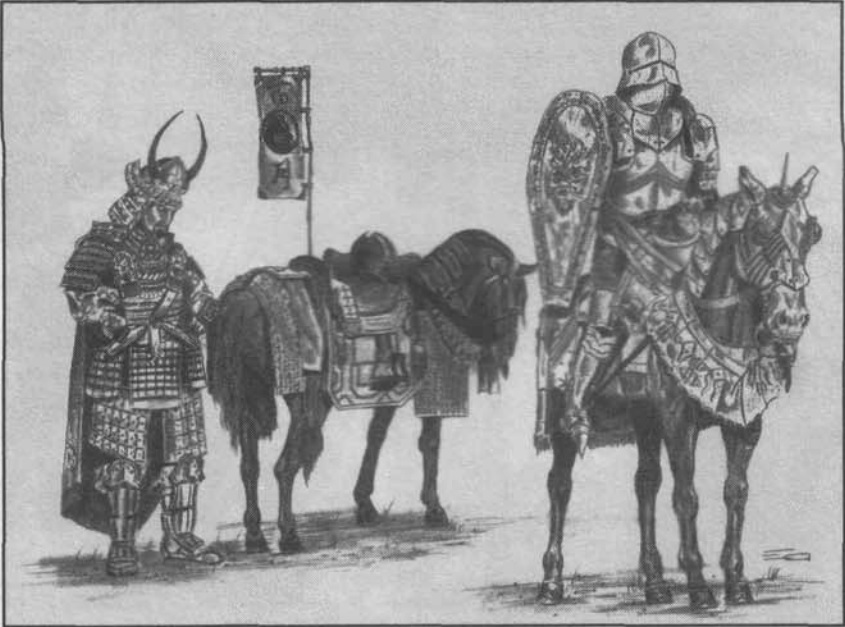
Yo wait is that some fucking PLATE
Next: NOT ENOUGH RIDERS
Way of the Unicorn: Horsing Around
Original SA post Legend of the Five Rings First EditionWay of the Unicorn: Horsing Around
Important NPCs time! They also have wonky Insight scores with the "Perceptive readers may have noticed..." sidebar on the second print run of the book. Because getting devs to use their own chargen rules is bullshit, I guess. (I can sort of sympathize with the sentiment, but NPCs should have different stat blocks from PCs in that case.)
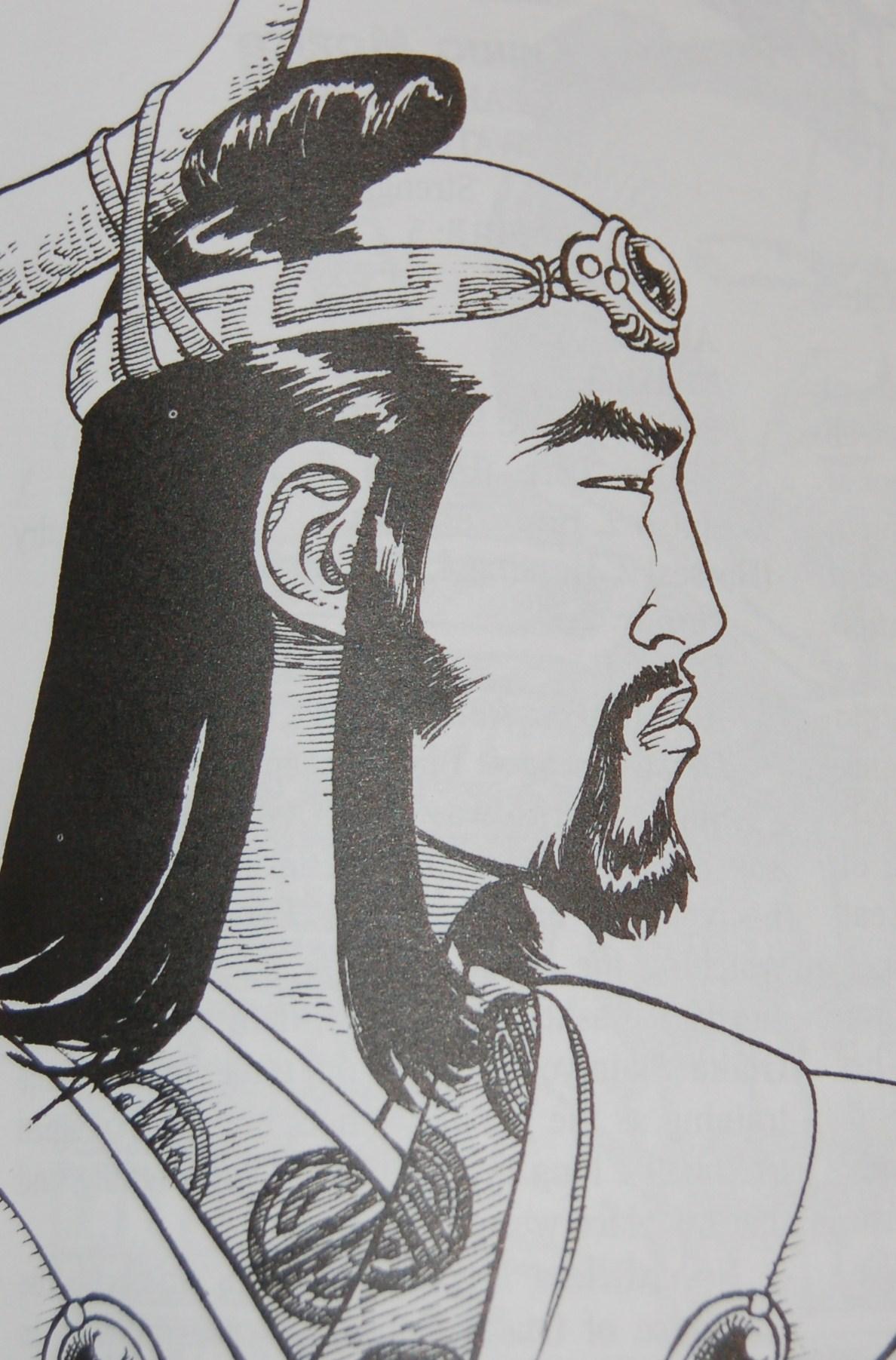
Looking good for an old timer.
Shinjo Yokatsu, the Master of the Four Winds, is the Clan Champion of the Unicorn. He's an old and quiet man, seemingly more content on his horse than sitting down. His grandfather was the previous clan daimyo, and Yokatsu grew up listening to stories of the clan roaming through deserts and steppes. His grandfather made sure that he met and learned from people from all walks of life, from eta to great nobles. When he came of age, instead of assuming his position as clan daimyo he went on a journey beyond Rokugan, wandering for two years, meeting strangers and sleeping under the stars. He reached the Sands, and suddenly turned back: when his grandfather asked him why he hadn't finished his journey, he answered that homeland is not a place, but a people. He is the only living member of the clan to have seen the Burning Sands. When he smiles, it is an open and honest smile, and he much prefers riding leathers to the robes of his station. He hates making etiquette mistakes and curses under his breath when he does.
 Shinjo Bushi 5, lots of skills (that still don't quite make the appropriate Insight rank) and he Can't Lie.
Shinjo Bushi 5, lots of skills (that still don't quite make the appropriate Insight rank) and he Can't Lie.
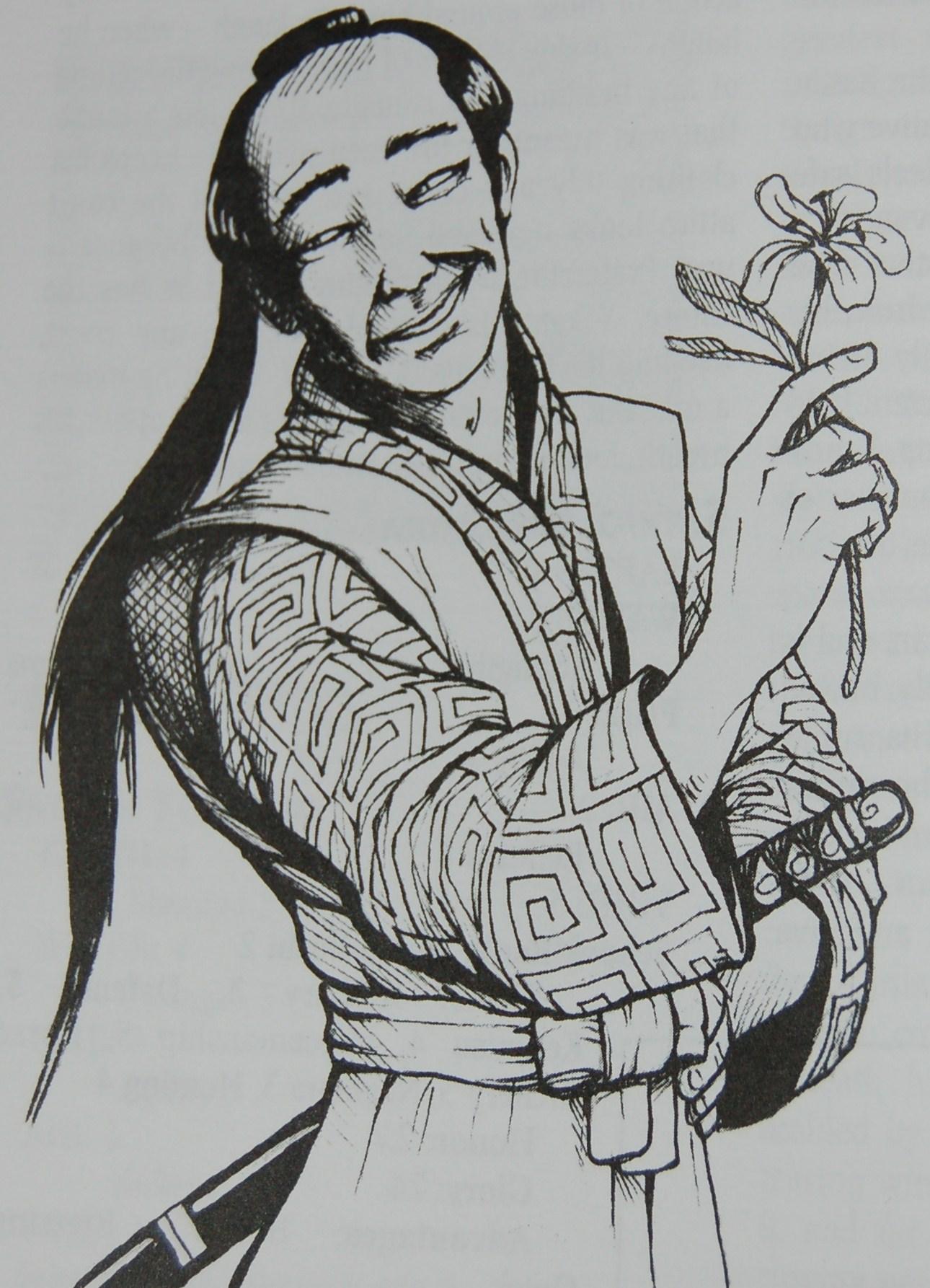
Ladiezzzz.
Shinjo Yasamura is Yokatsu's son. He's just out of his gempukku and is a hopeless romantic and showoff. Not quite a lady-killer, but he loves to think he is. He's competent as a warrior but he'd rather hear about great feats than perform them (he has Soft-Hearted as a Disadvantage, he doesn't like to kill) All the same, he is naturally likable and easygoing. He is an exemplar of the new generation of Unicorn, those who have always known Rokugan as home, and he has no interest in the Burning Sands or anything beyond that. There's probably no pretty ladies to mack on outside, anyway. He's not intended to rule the Shinjo house after his dad steps down, but he still has responsibilities as the son of the clan daimyo, and he's secretly afraid he won't live up to Yokatsu's expectations. Shinjo Bushi 2, pretty good fighter but again, Soft-Hearted.
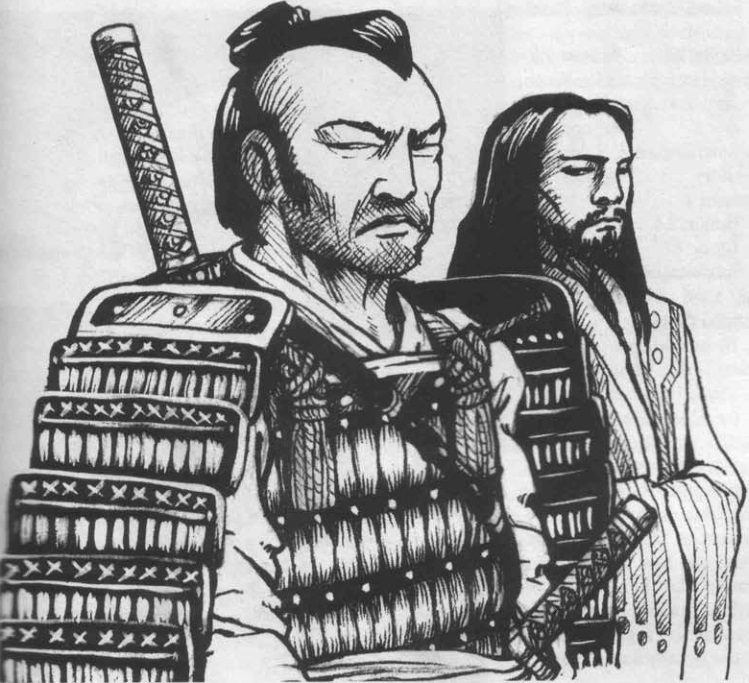
Don't talk to me or my brother ever again.
Morito used to be Otaku Morito, son of an Imperial magistrate. He was fascinated with the Otaku steeds since an early age, and dreamed of undergoing the battle maiden training, but his place as an Otaku man was on the ground. He learned how to take care of the steeds and ride non-combat horses, but he still wanted his own Otaku warhorse. Eventually, he did the unthinkable - with his brother's help, he tried to ride a battle maiden stallion, with such bad luck that the horse broke one of its legs and threw him off. The horse would live, but it would never accept a rider again. Morito was made clan ronin and cast out of the clan and now, along with his loyal brother, wander Rokugan as sellswords. Shinjo Bushi 1, with enough insight to go up another Rank but again, clan ronin. His brother has taken up the ways of the shugenja, but he gets no stats.
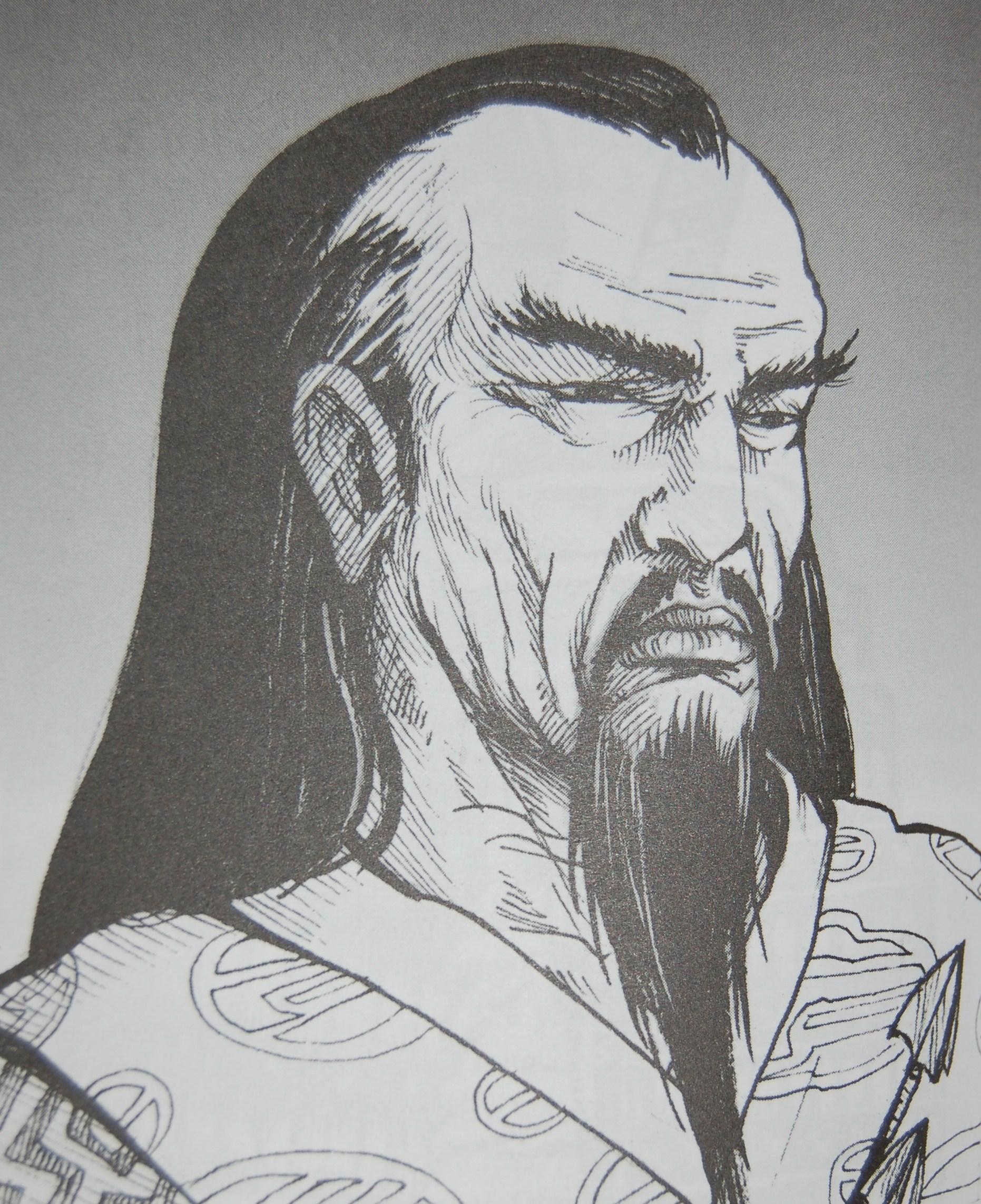
Gonna fuck some Crab shit up one of these days.
Shinjo Hanari is the sensei of the Shinjo Yomanri school. He's strict and of harsh words, but also known as the best archer in the clan. In battle, he leads the Clan's archery contingents, with accurate and deadly attacks. He has a grizzled war dog named Koji that follows him wherever he goes. The only darkness in his soul was a minor skirmish with the Crab over a small Crab village in Unicorn lands, which the Crab considered their own. The skirmish went poorly for the Unicorn and they had to surrender, but the Crab commander cruelly slaughtered their steeds before sending them on their way. Hanari has sworn revenge against the Crab, Hida Tsuru, because of this. He attends the Wasp archery tournament every year and has a friendly rivalry with Mirumoto Sukune, and they often spend time discussing archery techniques along with the Wasp daimyo, Tsuruchi. Hanari is convinced he is only beaten because the Wasp tournament is on foot instead of horseback. Shinjo Bushi 4, but some 20-odd points away from the proper Insight rank.
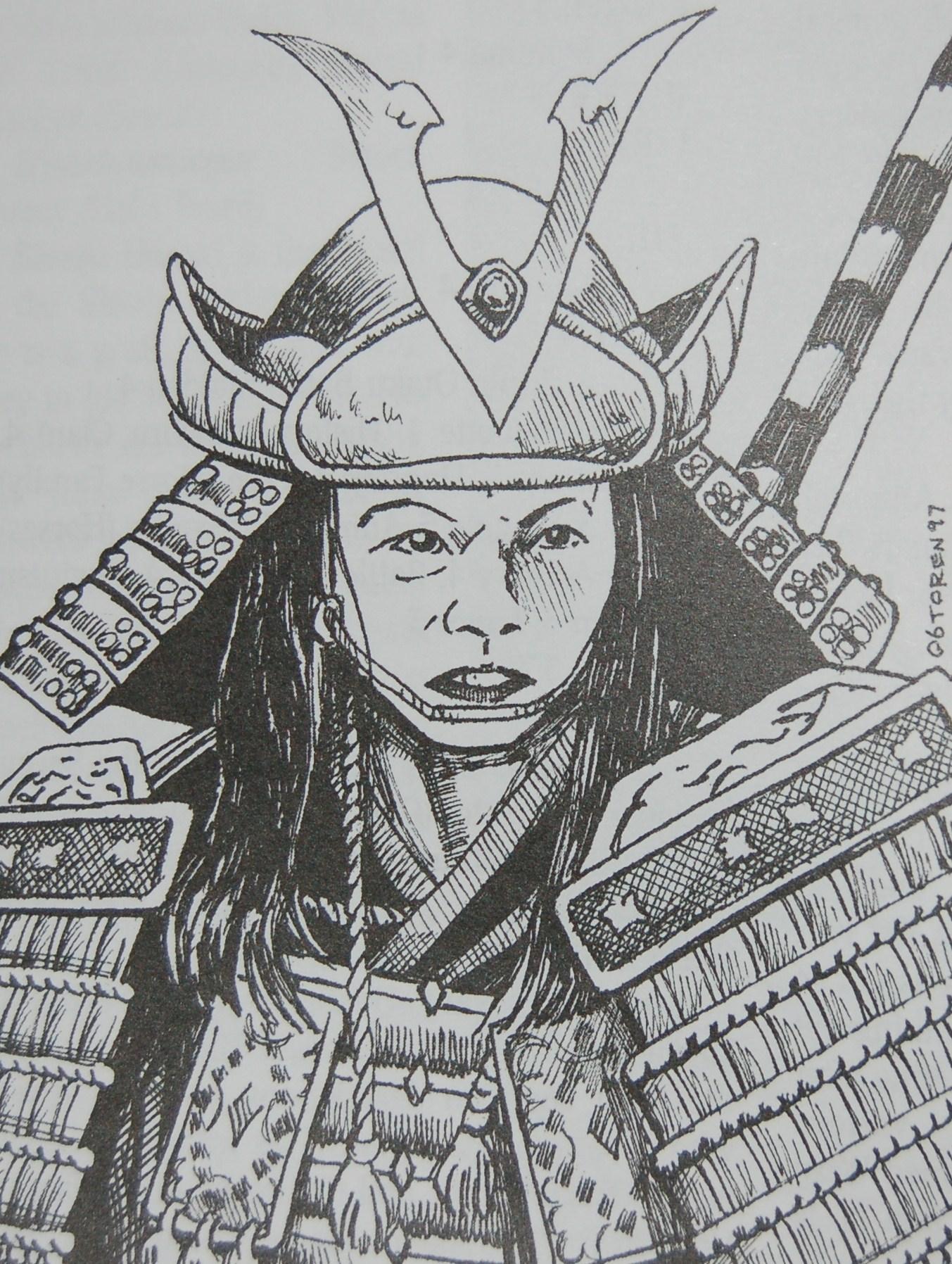
Gonna fuck some Lion shit up one of these days.
Otaku Kamoko is the Otaku daimyo. Born to the previous daimyo of the same name, she joined the battle maidens much earlier than others of her generation on account of her mother, who also was her sensei. When Kamoko was 12, her mother was brought out of retirement for an important courier mission, and she died in what was first said to be a brigand ambush, but later rumors were that a Lion party killed her for the package she was carrying. Kamoko began to hate the Lion, and vowed to avenge her mother. A few months after her gempukku, border clashes with the Lion had become common, and in one of these Kamoko's brashness took the better of her and she charged against a Lion "scouting party" - an almost full invasion force. Her mount glowed with a shimmering aura, and the other maidens followed Kamoko because she was obviously blessed by the Lady Otaku. The charge broke the Lion forces and she honorably allowed the Lion commander, Matsu Agetoki, to seppuku - but instead he tried to bargain for his life using the identity of the killers of Kamoko's mother as leverage. The delay was enough to allow Lion reinforcements to return and Kamoko never learned who did it, but she now knows someone does. Otaku Battle Maiden 4, on the level with Insight, Otaku as her Ancestor and Great Destiny (one of the Seven Thunders)!
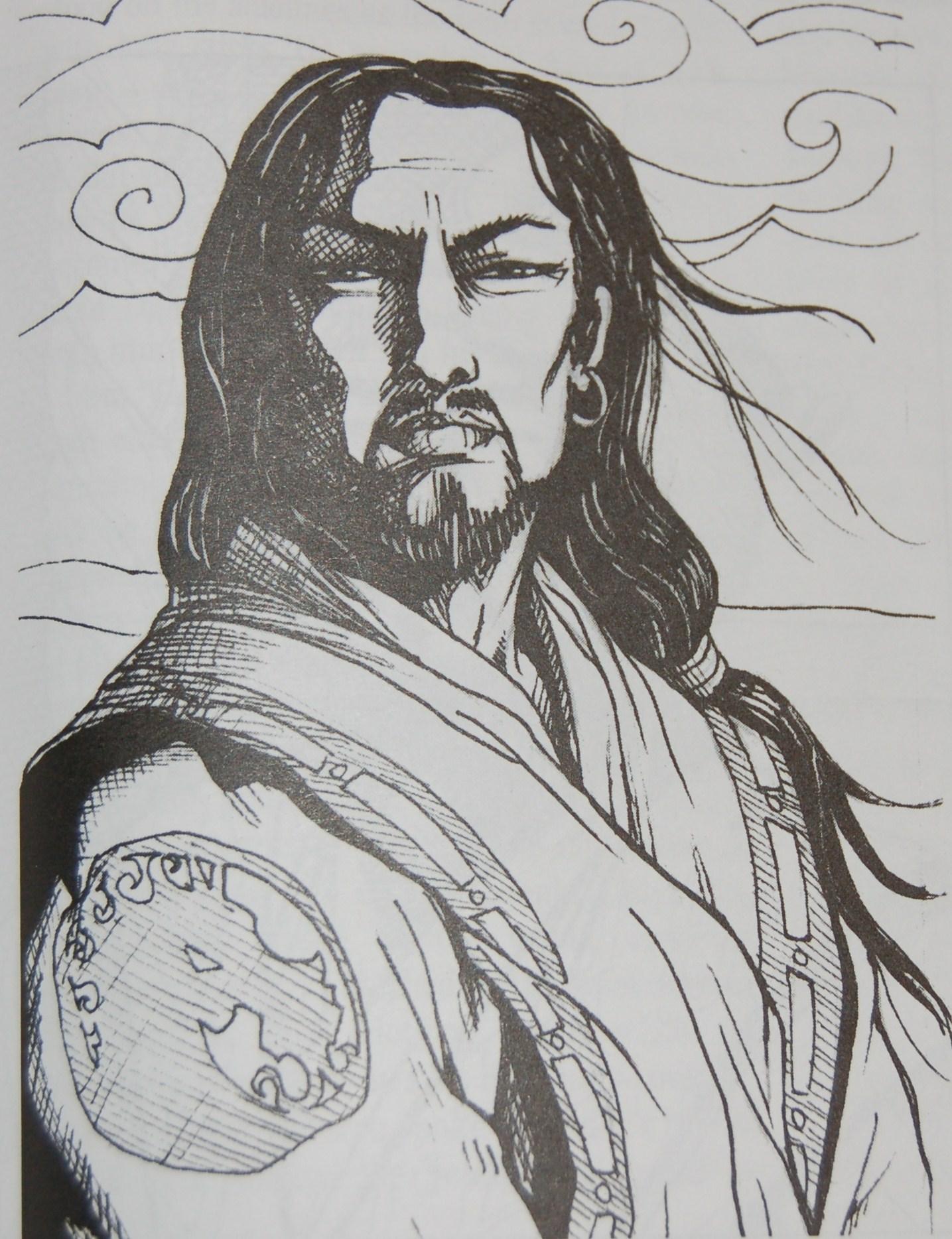
Gonna fuck some--- nah, it's cool, he's just gonna take care of horses.
Otaku Kojiro is Kamoko's father and Master of the Otaku Stables. He loves horses, but cannot ride them. When he was young, he tried breaking in a wild pony and almost killed himself falling down from it. When he recovered and tried getting back in the saddle, he became violently ill. He developed a combination motion sickness/phobia of riding that was awful for a Unicorn to have. He has to ride because of his status, but his condition makes him prefer a wagon to carry him around. Born a Shinjo, he was paired off with the daimyo of the Otaku family, and while the marriage was arranged he loved his wife dearly. Her death was a harsh blow, but he retreated into himself and the boring minutia of running the Otaku stables rather than seeking revenge like Kamoko. His only happiness is the pride that he feels for his daughter, and the memory of his wife.

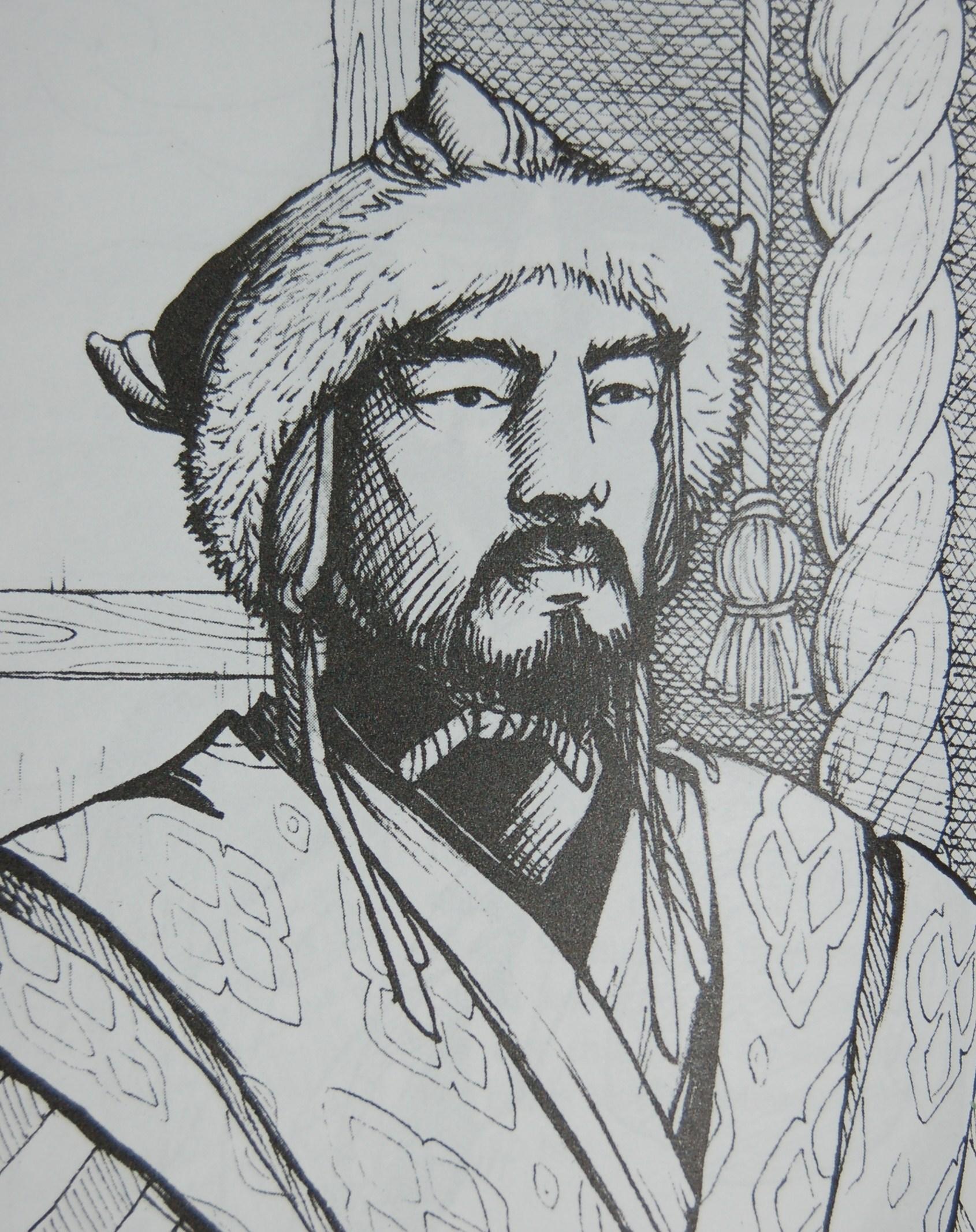
Sweet hat, christ
Ide Tadaji was born under a bad sign and with a lame foot, never learning to ride. He was apprenticed as a shugenja to Iuchi Daiyu but the boy had no mind for magic. Instead, he learned much of the Unicorn's history and the people of Rokugan. When his deformity could no longer be hidden, Daiyu spoke on his behalf and got him sent to a Dragon monastery - when he returned, he had a stentorian voice, confidence and schooling in the peculiarities of the Rokugani court. He was quickly accepted into the Ide school, and after helping Yokatsu attend to the Emperor when he stayed at the Shinjo castle he was again sent away from the Clan - this time, to the Imperial Court itself. Navigating the plots of the Crane and the Scorpion is every bit as challenging as a battlefield, but he has an unlikely ally: Shosuro Taberu, a Scorpion courtier. They share a common love of the board game Go and similar personalities. Taberu is described in Way of the Scorpion, and it says that while he's had several opportunities to backstab Tadaji, he hasn't because he genuinely likes the Unicorn. Ide Emissary 4, reasonable skills, no Sincerity though.
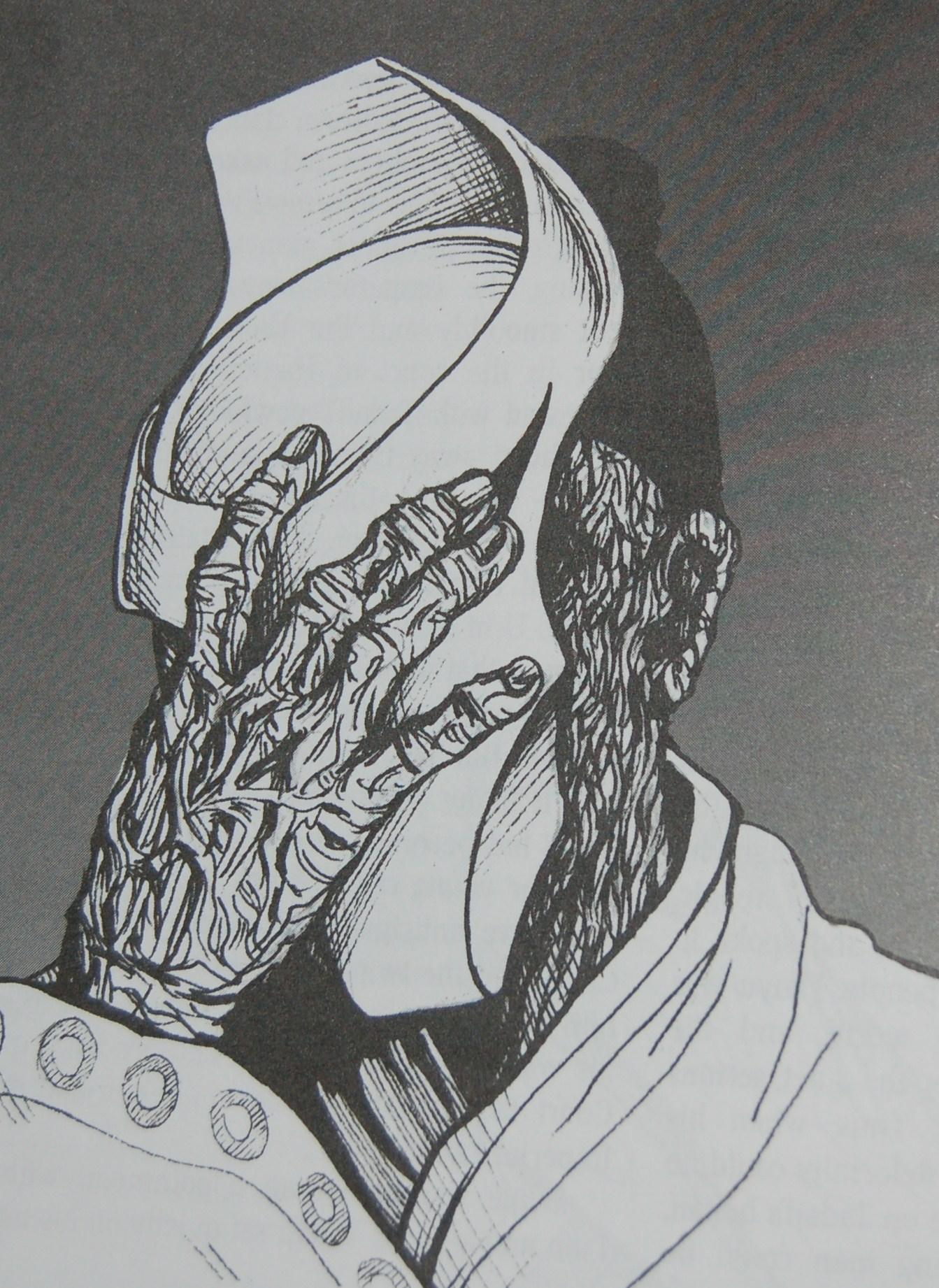
Even Unicorn beauty treatments have a limit.
Iuchi Karasu is a Unicorn shugenja that tried to follow what he believed to be the way of the Clan since the days of Shinjo - travel farther and farther into the unknown. After his gempukku, he went on a grand tour of Rokugan, sending letters home from the Dragon Mountains, the Crane shores, the northern lands of the Phoenix and so on. When he reached Crab lands, the inhabitants talked to him of the horrors of the Shadowlands, which only intrigued him further. He went into the dark lands, and only returned months later when a Crab scouting party found him floating on a log, half-mad from hunger and badly wounded. He had been tortured, strips of skin torn off from his skin, and his eyes had become strange red orbs. Kuni Yori, the Kuni daimyo tended to his wounds and both men became friends later, but they never made public what exactly had gone down there. Karasu, now wearing a mask to conceal his mutilated face, went back to Unicorn lands and eventually married a Kuni lady; rumor has it that she is there under Yori's orders to take care of a mysterious illness that Karasu gained in the Shadowlands. Iuchi Shugenja 3, within PC levels but with a DARK SECRET.
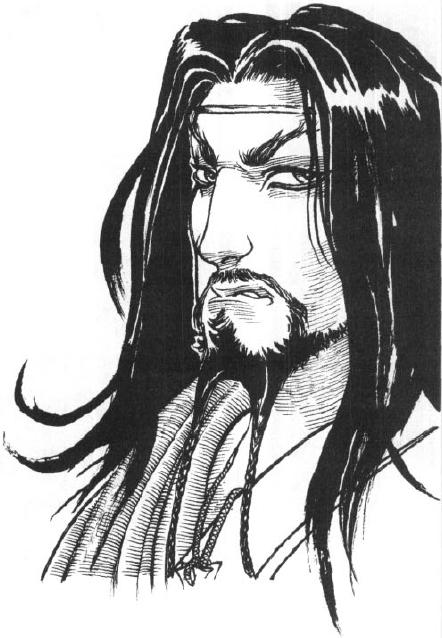
He looks kinda pissed, though his description is chill.
Iuchi Daiyu is the oldest living Unicorn shugenja and the Clan's lorekeeper. Despite his years, he looks young and without lines on his face. A traveling Isawa once invited him to study with the Phoenix Elemental Masters, but he politely refused - there's no knowledge that can be given to him that he can't attain himself, he believes. His magic is a mix of Rokugani craft with Burning Sands magics half-remembered in lore. He teaches his students to observe their environment, and how by changing one small facet the whole world can be changed. He also has a secret gift he does not reveal to others: he can - almost - understand animal speech. He spends much time in the woodlands, watching, and has refined this talent for years so that he can learn from the animals themselves, rather than observing them. Twenty points short of his Iuchi Shugenja rank of 4, lots of spells but no real fighting skills. He's still going to have Osano-Wo fry anyone that means him harm, though.
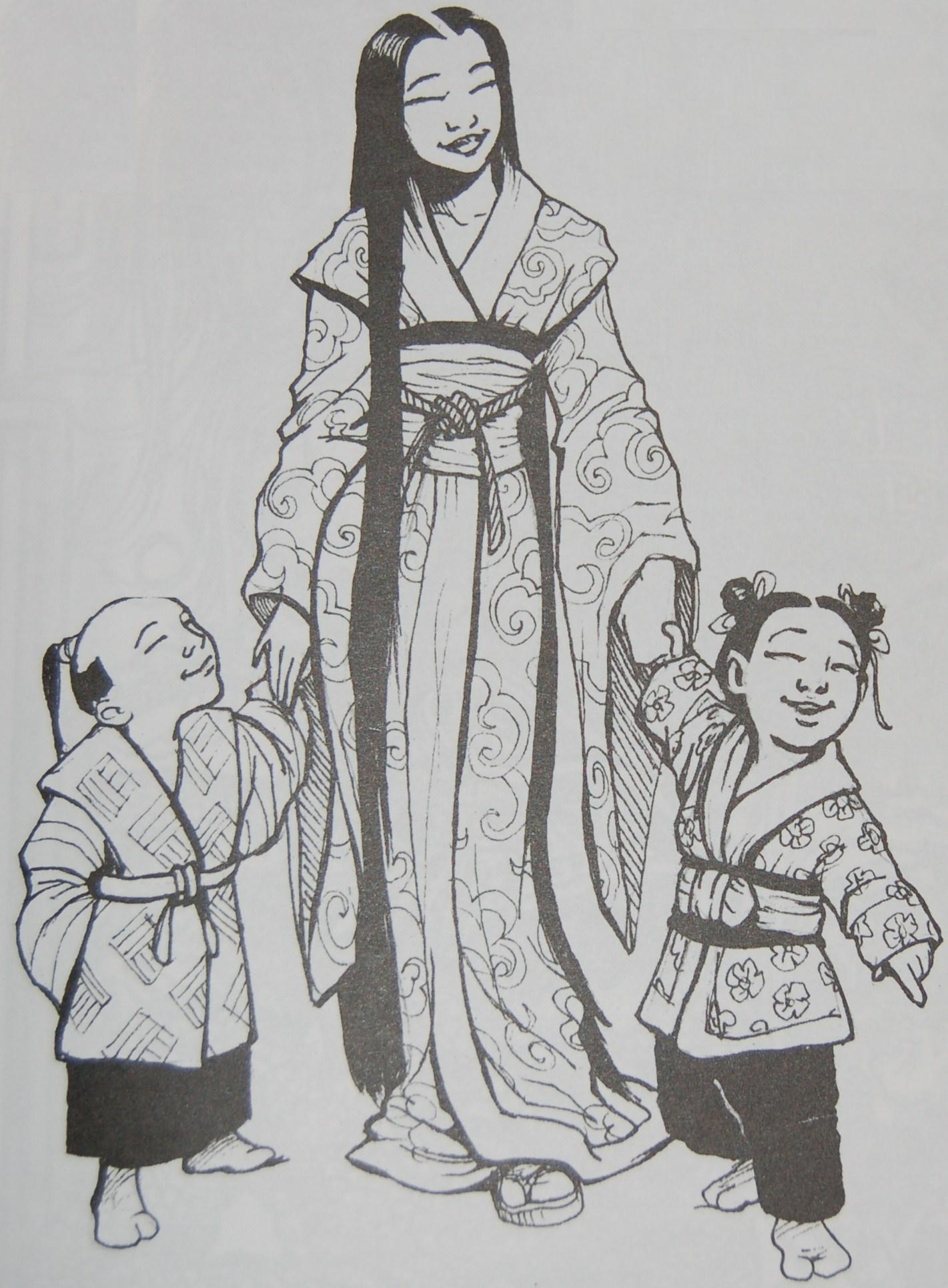
She's good with children, TAKE A HINT
Horiuchi Shoan used to be simply Iuchi Shoan. She was the governess of Yokatsu's two youngest children, Shono and Shonoko. When they were seven and five years old respectively, Shoan accompanied them on a trek to Lion lands, but their caravan was ambushed by bandits. Shoan fled with the children, but the bandits caught up with her: fortunately, she used the Castle of Water spell to surround her and the children while the Unicorn samurai regrouped and dispatched the bandits. In recognition of her courage, Yokatsu added "Hori" (moat) to her family name. She is a peaceful woman reputed to be shy and bookish, but with children she becomes outgoing, a wonderful storyteller and singer. She has never married despite her parents efforts, and rumor has it that a Crane samurai stole her heart but did not correspond her feelings. She is the only Horiuchi in Rokugan, and perhaps the last. Iuchi Shugenja 1 even though she's well on her way to Rank 3, totally PC waifu material.
Ancestors! Shinjo Martera was Shinjo's eldest child. He exemplified bushido for the Unicorn, and no one ever found fault with him during his whole life. For 10 points, the character always succeeds at Honor rolls, but if they ever deliberately behave in a dishonorable manner they lose the connection to Martera. Shinjo is well, Shinjo. 3 points, the character gets a free raise to try to read the emotions of others, or for understanding enigmas. Moto Chai was one of the greatest horsemen to ever lived, forced to seppuku by his commander because he rejected promotions so that he could stay on the field doing missions. Upon hearing of this, the daimyo of the era forced the commander to commit seppuku and struck his name from the records for his stupidity. 7 points, character gets to keep all the dice they roll for Horsemanship and get a free Void Point to spend on every Athletics roll they undertake. Yikes! Moto Soro was the first Moto, a rough and unmannered Ujik-Hai that rose to prominence with determination and fearless embrace of bushido. For 5 points, a character gets to ignore all their Wound penalties a number of rounds equal to their Void per day. The rounds need not be sequential. Otaku is Otaku, and for 5 points a character gets the Voice advantage and their words are understandable to all mammalian non-human creatures. It doesn't mean they'll necessarily do as they say, though. Otaku Shiko was Otaku's daughter and considered to be the founder of the battle maiden tradition. For 4 points, the character may spend a Void Point to ignore Wound penalties for (School Rank) rounds. Ide was an extraordinarily peaceful and amiable man. For 4 points, as long as they wear neither weapon nor armor anyone attacking the character must make a Willpower vs Honor contested roll. If the Unicorn rolls higher, the offender cannot attack the character this round. Iuchi was Iuchi, and once a day a character may use their Void Ring instead of any other Ring when casting spells for 3 points. Nifty. Iuchi Atesoro was the first descendant of Iuchi to take up the way of the bushi, and learned to fight without armor because his family did not have dedicated armorers at the time. For 6 points, the character is considered to perform Full Defense when attacked with arrows or other ranged attacks, even if the character is performing a Full Attack. Moto Sanjo is worth 0 points because he is more disadvantage than advantage. He was one of the Moto that were lost to the Shadowlands, and all that returned of him to the Unicorn was his broken katana. The character hears Sanjo's manic laugh when Shadowlands creatures are close, which can serve as an early warning but also makes them drop their highest die on all rolls when fighting Shadowlands creatures. They can avoid the penalty for one day succeeding at a TN 10 Honor roll.
And now, sample characters.
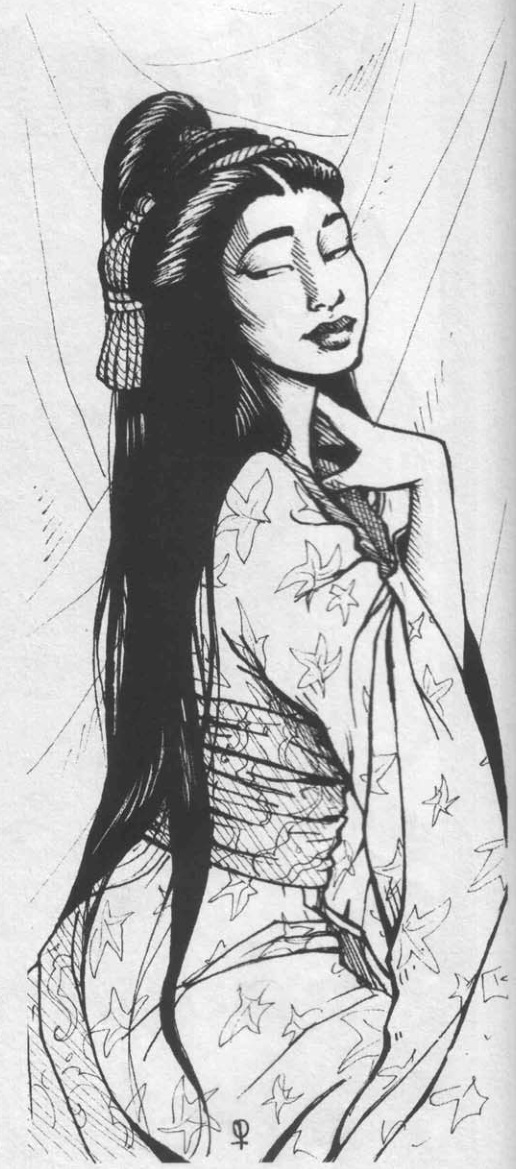
Boyzzzzz.
The Ide Diplomat is friendly, pretty, a natural negotiator. And shocked when she learns that the rest of Rokugan does consider the Unicorn to be a bunch of barbarians! They thought she did not understand, but she did - she learned by observing none other than Bayushi Kachiko herself. She would just tease, but this character would go a little further. She reads the letters of her paramours while they sleep, shuffled out of their chambers crying tears of shame and pocketing secret seals, and paying attention in the "throes of passion" to what secrets escaped their lips. Also she has a child from one of these liaisons, which she foisted off on a trusted servant then "adopted" as her own. She loves the child, but they must never know their parentage! Somehow they have Honor 3 despite their continuous use of Seduction.
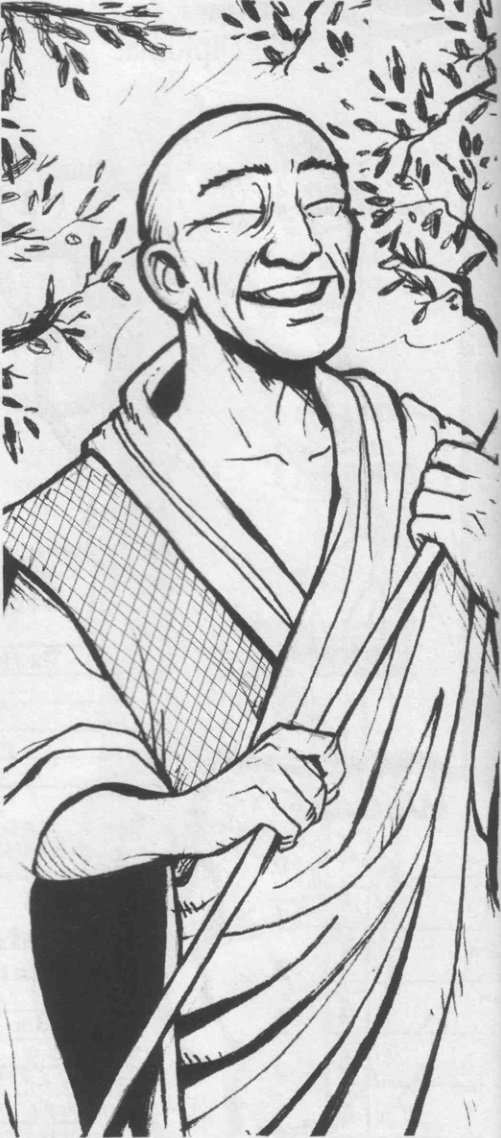
Chillax, mang.
For the Iuchi Holy Man, things just work out. Most of the "dour spellweavers" of Rokugan deny that they are holy men but he doesn't. He experiences the world in search of enlightenment, and though he has not found it yet he's had fun doing so. Things just go his way, and he'd rather grab all those morose morons binding themselves to another incarnation of dreary monastic life and have them live life a little. Only the truly enlightened can pronounce his name. His sharp tongue and wit gets him in a lot of trouble, but it's not like he can't fight back with words, or with his bo stick. It's to be expected when dealing with people that don't understand TRUE ENLIGHTENMENT. He has Luck at 4, and Magic Resistance, but is also Brash! Also 0 Glory!
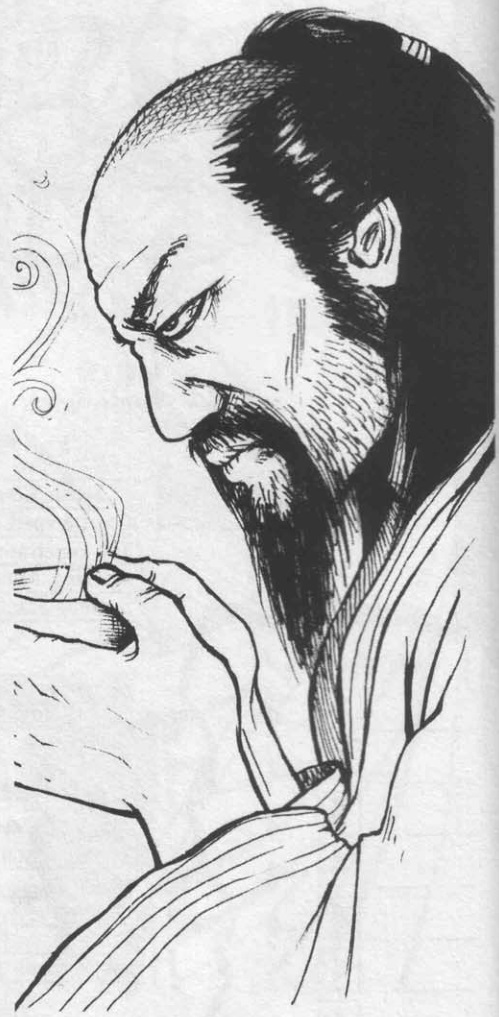
Shit: seen.
The Moto Hunter has seen some shit. It was bad enough being born a Moto, having to go against Fu Leng himself just to clear the family name. But he used to have a drive, steel in his heart... until he faced his own great-great-great-whatever-grandfather, now a lost Moto. He faced him, but he'd much rather had fled - he was cut off from his forces and had no choice. He took down the undead samurai, but is not sure of who really won the fight. Now, other people think of him as an ascetic, brave man, but he just wants his opium hits so that he doesn't have to think too hard. When that doesn't work, he goes into the Shadowlands to kill things until his mind is at rest again. A PTSDing case with Chemical Dependence and Weakness, so he has Awareness at 1. He is going to fuck someone's shit up with his Fine katana, though.
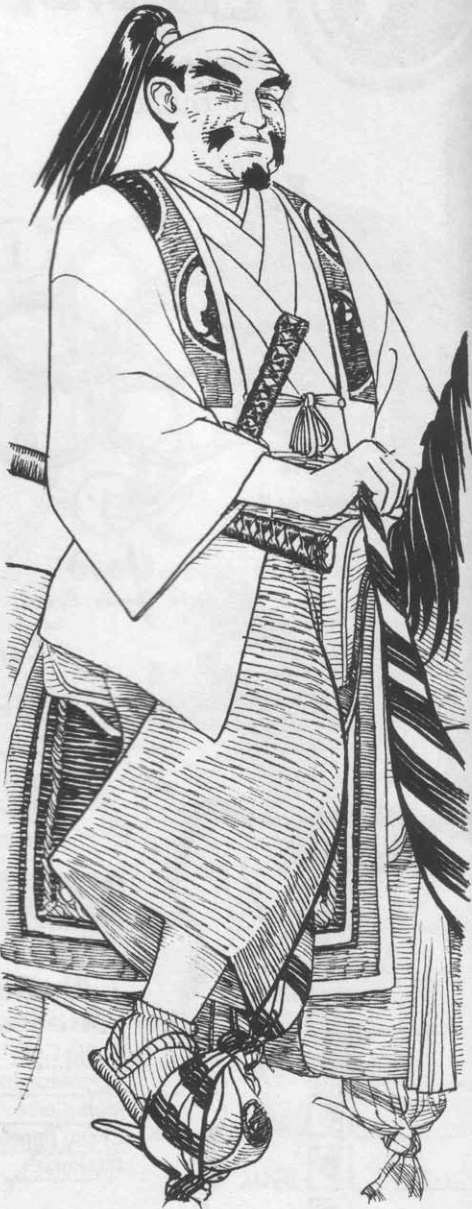
He's earned that

The Shinjo Caravan Master was a small child bullied by his older brother and friends all of his childhood. He tried to learn kenjutsu, and tried to fight off his brother with a tanto; he took their father's wakizashi and cut off all but one of his fingers on his left hand. The poor kid was punished for getting his blood on the wakizashi, and his brother received it as a gift. His father favored his brother on all things, but his mother saw potential in him and sent him to train with the Ide. His maimed hand became an advantage: it made it clear that he could not draw a blade against someone who he was negotiating with. He studied under a respected caravan master, ignored the samurai prejudice against commerce, and saw more of the world than self-aggrandizing bushi. He still fears blades and combat, but is in a much better mood these days. Even warrior jerks require the supplies he can furnish. Not much of a fighter, but has a couple of Allies and still has a Fine wakizashi if shit goes down. Phobia (Combat) though

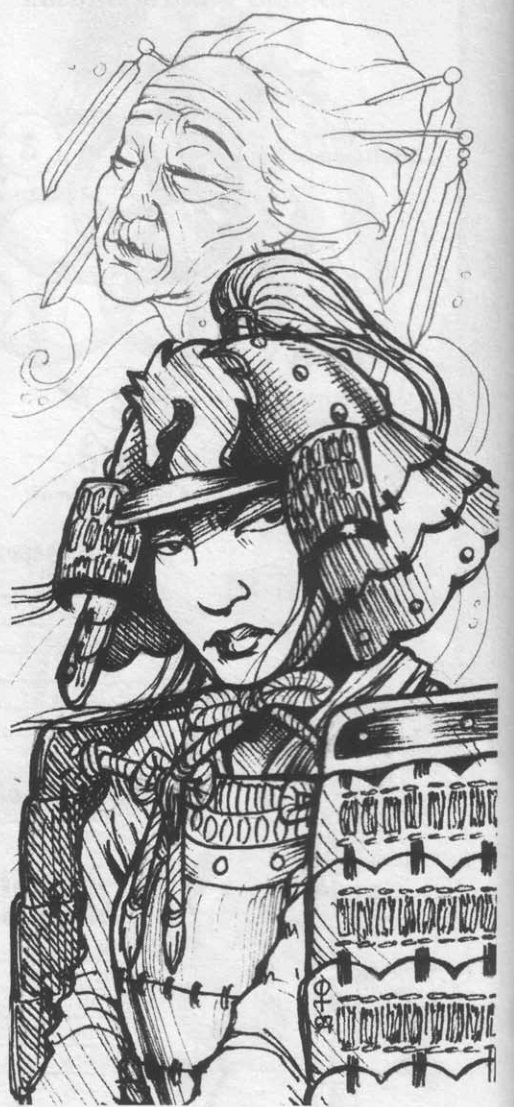
"And remember, if the enemy jumps you on the toilet, punch them in the face." "I know, Nana." "If they're guys, punt them right in the---" "I KNOW, NANA"
The Otaku Battle Maiden has a great destiny! At least that's what the spirit of her grandmother keeps telling her. She can only hope her mettle is up to the task. Her grandmother's strength takes on some of the pain she suffers in combat and maintains her balance, but has the venerable tendency to distract her descendant in combat, chiding her for her failures even when she was praising her moments earlier (and that praise distracted the maiden enough to slip up!) People think the maiden has a very short attention span, since she has to attend to her grandmother's spirit so often. And sometimes she demands that the maiden stand up and fight against all odds - it's been almost her death once already. But what else can she do? She has a great destiny, and she must respect her ancestor! (She has Overconfident, Haunted, and no Great Destiny.
 )
)
Next: there are no more horse jokes
Way of the Unicorn: The SCA Will Hear Of This
Original SA post Legend of the Five Rings First EditionWay of the Unicorn: The SCA Will Hear Of This
Appendix time! First, we talk about cavalry. Probably the greatest discovery the Ki-Rin made outside of Rokugan was the gaijin saddle and stirrup. Before that, Rokugani riding was done bareback, which was very difficult to master (minimum 3 Horsemanship) and not conducive to warfare. The saddle/stirrup combination not only brought the rider greater balance and comfort, it also allowed them to stand up while riding, which gave them greater flexibility when using polearms and also the ability to shoot while mounted. The dai-kyu did not exist in Rokugan prior to the Unicorn's return, and in fact neither did cavalry forces. When first facing the Unicorn, some generals sought to learn, mimic and improve this new weapon, while others rejected the barbarian ways and paid dearly for clinging too hard to tradition. The Unicorn uses two basic strategies when fighting, offensive and defensive, depending on terrain and circumstances. They always carry their entire army on the hoof, even the infantry. Mounted Infantry can redeploy quickly depending on circumstances, dismount when actually fighting, and can quickly retreat if things don't go their way. Light Cavalry is armed in a similar manner to the mounted infantry, but are used for scouting and harassing the enemy flank and rear. Medium Cavalry/Horse Archers are lethal and fast, using techniques like arcing and volley fire to strike at the enemy from afar with great effectiveness, and sometimes engaging in close combat. Heavy Cavalry is armed to the teeth, the main Unicorn arm in the field and the ones that counter enemy cavalry when present. Finally, the Battle Maidens ( shiotome - wait, is that Death Maidens? That's metal.) are the elite of the army. The offensive strategy relies on missile fire and light cavalry harassment to whittle down their numbers, then breaking the enemy line with the shiotome while the other arms chew up the now divided enemy forces. The defensive strategy starts with a running battle with the horse archers firing and retreating through the infantry, shiotome and heavy cavalry, while the light horse pins the enemy from behind. If the enemy persists in advancing, the cavalry units surge forward and envelop the enemy while the infantry maintains the line. There is a letter from a Scorpion samurai to a Lion cousin mentioning how he obtained this information from a drunk Unicorn general and how it would be so terrible if the enemies of the Empire obtained this information to crush the Unicorn; the Lion cousin replies with a detailed analysis of Unicorn weaknesses (their complex archer movements and assumptions that the enemy lacks cavalry and pikemen of their own), but surely the secret-wise Scorpion cousin will know how to keep this vital information safe!

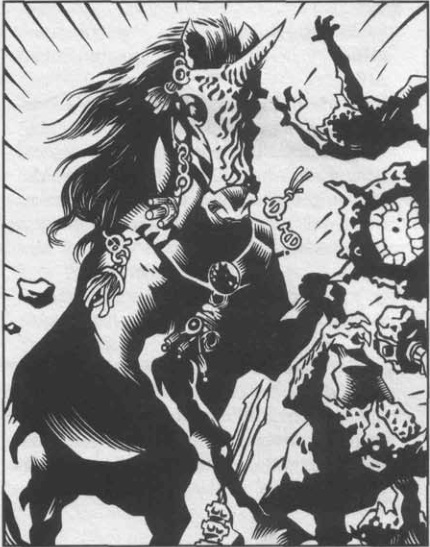
Poor goblins

Horses! They have existed in Rokugan since before the Empire, but while the Unicorn was outside the horse was seen as nothing more than a beast of burden, used to transport supplies and work the fields. Sometimes they were ridden by important personages like daimyo and Emperors (though normally the Emperor is carried in a palanquin instead of a carriage) and a general might use one to have a vantage point on the battlefield, but cavalry simply did not exist before the Unicorn. There are now three basic breeds of horse in Rokugan. The Rokugan Pony is the smallest and most common, not an effective cavalry horse because of its short stride but very tough and hardy, so it is ideal as a work animal. It can live 30 years on average. The Gaijin Riding Horse is the tallest of the breeds, and is very suited to bearing a rider, easy to break in and friendly. This is what the Clans' cavalry troops use. It lives around 25 years. The Otaku Warhorse is noticeably leaner and more muscular than the others, lacking one set of ribs, and with great lung capacity. They are bred solely for use by the Emperor, the Unicorn clan and family daimyo and the shiotome. They live 25-30 years and give their riders a free rerolled die for any Horsemanship roll.
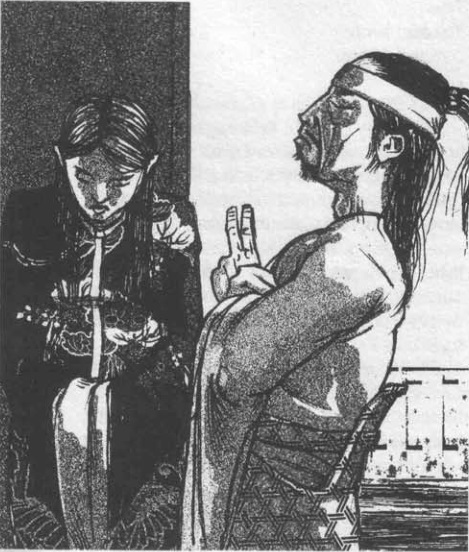
Talk to the fingers.
Gaijin Gear! The Unicorn have brought all sorts of treasures from their long time outside, and Unicorn samurai experiment with the "treacherous barbarian techniques" required for their use. Ashi-kyu are foot-bows that require lying on the ground and pulling on the string with both arms, bracing the bow with the feet. They are awkward to use, but hit hard and have twice as much range as a standard bow. It takes a round to set up an ashi-kyu, they roll (Strength-1) dice of extra damage on a hit, and have a range of (Strength+2) x 100 yards. Longswords are very different from Rokugani katana, weighing up to forty pounds (say what!?) and relying more on impact than edge to cause damage. They need a minimum Strength and Stamina of 3 to use and subtract 5 from all initiative rolls, but ignore armor and deal 1k4 damage. Nagayari are pikes, and the Unicorn learned their effectiveness against cavalry the hard way. They don't gain the normal initiative bonus of polearms, but instead automatically gain initiative against charging cavalry and if properly braced they use the enemy mount's Strength instead of the character's own to deal damage. They deal 3k2 as basic damage, and 2k2 for "dragon's teeth" that are just sharpened wooden poles used as static defenses. Oil lamps are made of metal and glass instead of the paper and wood of the Rokugani version. 15 feet of range, or 30 for directional lamps made with lenses and mirrors of gaijin make. Shields are considered to be too cumbersome for the Rokugani fighting systems, but they're still worth it against missile attack: they increase the TN vs missiles depending on the shield's size and reduce a percentage of the area weapon dice (now, where are the area attack rules?
 )
Slings are a carefully guarded secret because non-Unicorn don't know that stones can be a deadly weapon and they think Unicorn slings are dumb barbarian fashion accessories, which means the Unicorn can get weapons in "safe" locations. The Sling skill could be considered Low for non-Unicorn, perhaps even a ninja trick!
Spyglasses are handy for generals and scouts, with ranges going from 50 to 250 yards depending on quality.
Uma-yari are cavalry lances. The rider always wins initiative while wielding one during a charge (nagayari and umayari cancel each other's initiative bonus) and they may impale two or more enemies on a charge due to length, Raises and GM's will depending. They deal 3k4 on horseback and 1k2 on foot with major initiative and hit roll penalties.
)
Slings are a carefully guarded secret because non-Unicorn don't know that stones can be a deadly weapon and they think Unicorn slings are dumb barbarian fashion accessories, which means the Unicorn can get weapons in "safe" locations. The Sling skill could be considered Low for non-Unicorn, perhaps even a ninja trick!
Spyglasses are handy for generals and scouts, with ranges going from 50 to 250 yards depending on quality.
Uma-yari are cavalry lances. The rider always wins initiative while wielding one during a charge (nagayari and umayari cancel each other's initiative bonus) and they may impale two or more enemies on a charge due to length, Raises and GM's will depending. They deal 3k4 on horseback and 1k2 on foot with major initiative and hit roll penalties.
Gear quality! Remember how people can get Fine stuff depending on their clan and school? Well, the problem is that the corebook doesn't say what any of this means, except that Fine katana roll an extra die for damage. Now we have actual gear quality rules! Gear can go from Poor to Average, Fine, Excellent, Superior and Legendary. Each rank gives the weapon or item a budget of points to spend on qualities. Poor stuff has 1 point which they must spend on a negative trait, Average has none, Fine has 1, Excellent 2-3, Superior 4-6 and Legendary 7+. An extra die of damage or skill use costs 1 point, keeping an extra die costs 2 points, 1 point gives +2 to the TN to be Hit (for armor only, some kimonos might have this with GM approval), 2 points remove the heavy armor penalty and so on. Mounts can have Advantages or Disadvantages at half the cost for a human character.
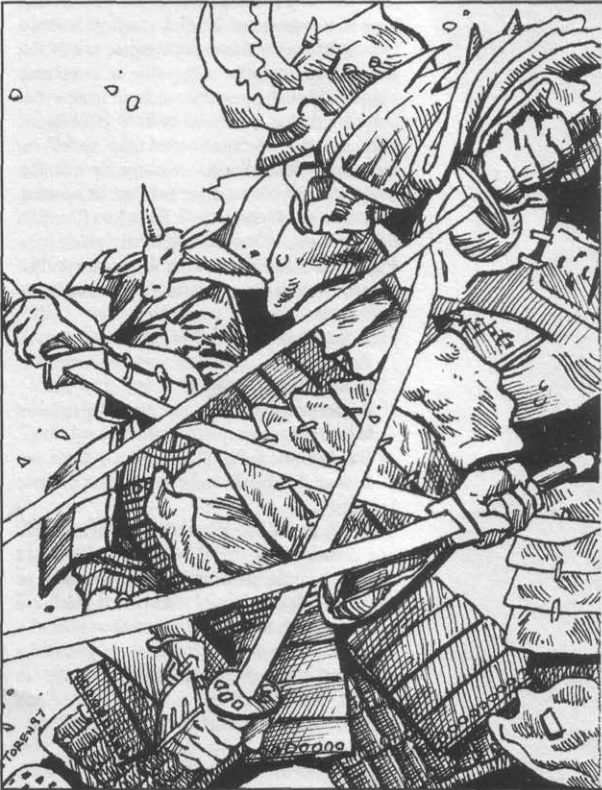
"Did I leave the stove on? I think I did..."
Spells! Many of these spells are Secret Spells, meaning that the Unicorn will never teach them to non-Unicorn. There's some story with the Scorpion stealing one of these, the shugenja victim revealing the spell publicly to other clans to counter the Scorpion theft, then receiving a letter from them that is like "moron, you're baring all your secrets yourself" and ending up with the shugenja committing seppuku, which might just be what the Scorpion wanted anyway! Since then, the Unicorn have been a lot more wary of people taking their magical secrets. Even their non-Secret spells are held close and rarely taught to outsiders.
Earth
- Not this Day: (Secret) the target rolls and keeps extra dice for all rolls equal to their Void for the duration of the spell and adds Void to initiative. At the end of the spell, the target dies. The spell scroll must be written in the target's willingly given blood in a special ritual before casting.
Water
- Dance of the Unicorn: (Secret) summons a purifying mist that washes the air clean of smoke, dust and poisons.
- The Horse's Nose: (Secret) the shugenja gains a horse's sense of smell and can track people and predators with Perception rolls.
- The Penetrating Drop: the shugenja uses their Water to penetrate an object, breaking or otherwise ruining it. Raises are needed depending on the material's durability.
- Ride Through The Night: target horse may run at a gallop for (Water) hours or until dawn comes up, whichever comes second.
- Speed of the Waterfall: (Secret) target's speed is doubled as long as they run downhill. Lance attacks roll (Water) extra dice for attack and damage.
- When Two Become One: the target's spirit melds with that of their mount, allowing both to use each other's highest Traits and Skills.
- Wonderful Origami Furoshiki: (Secret) using a specially made furoshiki sack the shugenja can fold one cubic yard of objects into a bundle a mere cubic foot in size. Weight is similarly reduced. It takes 5 actions to unfold the furoshiki sack properly, otherwise things spill out without control.
- The World is not Heavy: target takes no encumbrance penalties, not even for heavy armor.
- Yuki's Blessing: (Secret) water is frozen in a flat bridge of ice. Duration depends on the weight of the people and animals crossing the bridge, the tranquility of the waters and the season.
Fire
- The Burning Sands: (Secret, Ritual) Wall of Flame, 20' high and 5' long. It deals 3k2 damage trying to cross it. Raises can increase this damage or the wall's size.
Air
- The Four Winds' Favor: (Secret) wind spirits bring sounds from afar to the caster. Range depends on the local wind conditions and Perception checks may be required for soft or indistinct sounds.
- Gate to Nowhere: (Secret) a flat gate to nothing appears that swallows air and fast, small projectiles but rejects large objects like humans. The gate is opaque, but sometimes unusual images can be seen in the blackness. Spooky. Also has a Mastery of 9!
- Roaming the Wild Plains: horse and rider can move at a trot without food or water for (Air + Horsemanship) hours. If the horse increases or reduces its speed, the spell ends.
- Teleportation: objects and people can be moved from one location from another. The spell can affect up to a burly Crab warrior in size (larger with Raises), and range is up to the shugenja's line of sight. Objects in two locations can be switched with each other.
Nemuranai time! Hayai, the ancestral katana of the Unicorn first wielded by Shinjo, rests in the Shinjo castle. Yokatsu doesn't feel worthy of the blade, but will give it to an Unicorn hero that performs a great deed like becoming the Emerald Champion. The bearer adds their School Rank to initiative, rerolls attack dice that come up less than (Kenjutsu + School Rank) and reduces enemy's armor TN bonus by the School Rank. Daitan is Shinjo's wakizashi, once owned by Iuchi. It is plain and unassuming - in fact, it's hard to even see when drawn. Requires being an Unicorn with Kenjutsu 2 to wield, and negates enemy School techniques up to the wielder's School Rank (so a Rank 3 character can negate Rank 1, 2 and 3 techniques) Yokatsu will not give Daitan to someone already carrying Hayai except in great emergencies. Yuki is the ancestral armor of the Clan, and also rests in the Shinjo castle. It adds +15 to the TN to be hit, forces incoming damage to drop the highest die, and the wearer may ignore (School Rank) in Wound penalties. Also, mounted clansmen that are close get +1 to initiative and roll an extra die of damage. The Most Honorable Iris Haori and Hakama of the Ide Family is a beautiful outfit dyed in what the gaijin call "royal purple" that increases the TN to be hit in 5 and forces any would-be attacker to roll Honor vs the wearer's Ide School Rank. On a failure they can't attack; on a success, they can but lose a full Honor rank. The Arrows of the Four Winds are ancient arrows freely given by the Clan daimyo to worthy followers. An Awareness+Theology roll at TN 15 before firing returns the arrow safely to the daimyo. The North arrow rolls (School Rank) extra damage dice and keeps (Yomanri) extra dice. The South arrow rolls (School Rank) extra dice on the attack roll and keeps (Honor) extra dice. The West arrow flies in the direction the archer wishes to go, whether that's the necromancer's lair or the ogre's booty or a way out of the Shadowlands. It can be used once per school rank and then it automatically returns to the daimyo. The East arrow was lost with a Moto force in the Shadowlands, and is not statted. The Brass Gong of Otaku Masero is a hand gong that makes a listener's Meditation roll automatically succeed in only ten minutes. The bearer recovers all Void Points and goes up one rank in Meditation, up to their School Rank.
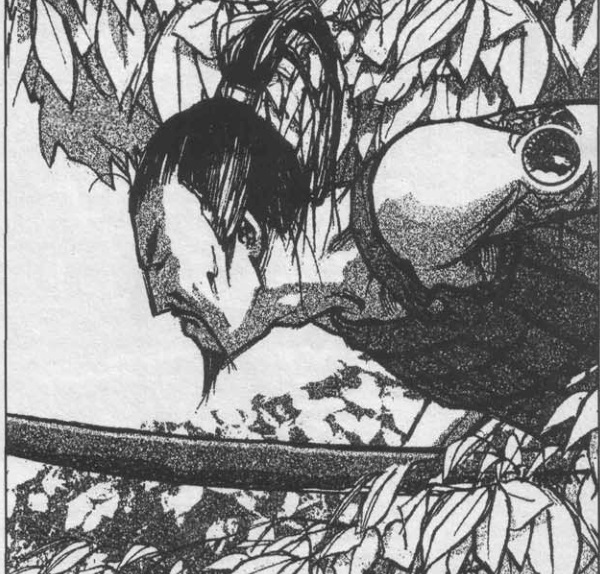
Sweet Unicorn tat.
We get some adventure hooks regarding the Konkuru, a great festival/tournament held in Spring with many horsemanship competitions where the finest of the Unicorn show off their skills. People have a great time, marriages and alliances are celebrated, and it's also a time for intrigue and conflict. We also learn that the Unicorn play a form of polo called kizuchi. Recently members of other clans have started attending the Konkuru as a deliberate ploy to foster good relations with the other clans. There's also some plot seeds with a peasant girl admitted to the Battle Maiden school and a mysterious assailant harming the Otaku steeds, as well as the Unicorn diamond mines being attacked by bandits with magic support. The lands of the Unicorn cover the easiest approach to Rokugan from the north-west, and are
Finally, we get meishodo, the Iuchi name magic! This style of magic involves scribing talismans with the mighty words of creation. In Way of the Dragon, it says the Agasha have been experimenting with their own brand of name magic based on Agasha's code, but without success.The practice was first denounced by the Phoenix as heresy, but the Crane had something similar going on with their fetish magic so the Emperor of the time ruled for the Unicorn. However, it has a dark secret: meishodo practitioners are "cut off" from the normal flow of magic energies. The Iuchi keep this a secret from all others, even within the Clan, as the metaphysical implications are great leverage for the Unicorn's enemies. In game terms, meishodo spells work just like regular shugenja magic except that a talisman replaces the spell scroll. Only Iuchi shugenja may use it, unless a non-Unicorn takes Different School (wait, what about the dark secret?) Meishodo spells are the same as regular spells and all take a single action to cast, but they cannot take Raises of any sort. Mastering a spell allows casting it without the talisman, but holding it does not give a Free Raise. When meishodo shugenja try casting spells with normal scrolls, all TNs are increased in 5, and they cannot use Sense, Commune or Summon. But really, single-action casting owns.
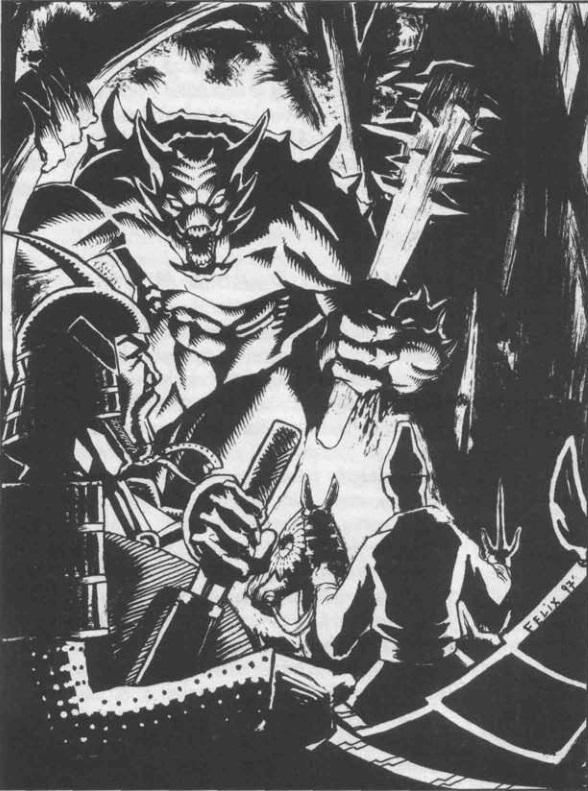
If everything fails, whack them with your sai.
Next: Hida! Strong! On! His castle!
Way of the Crab: In The Grim Darkness Of The Thousand Years Of Peace, There Is Only War
Original SA post Legend of the Five Rings First EditionWay of the Crab: In The Grim Darkness Of The Thousand Years Of Peace, There Is Only War
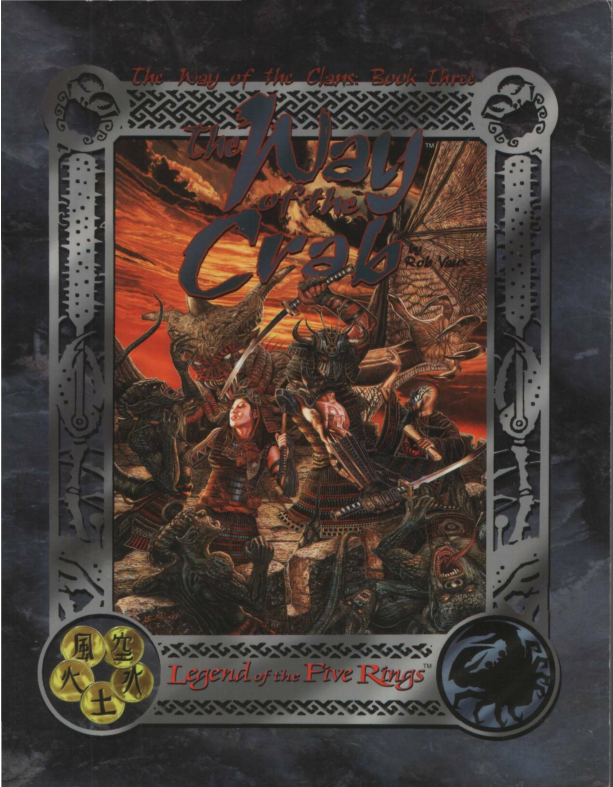
Holy shit that arm
Time for the third Clan book! Main writer in this is Rob Vaux, with additional material by John Wick, Ree Soesbee, Cris Dornaus, Christian Vikander and Zen Faulkes. Also Arnold Schwarzenegger (particularly the last twenty minutes of Predator) is included in the credits, as well as Frank Miller from which they cribbed the "Twenty million drown in blood if I am weak" quote by Hida Yakamo. And off we go!
It starts with a girl, Hida Yoritoko. But everyone knows her as Hida O-Ushi. A little girl, she wants to go into the Shadowlands along with her brother, Hida Yakamo. But he won't let her - she is too young and doesn't realize what that entails. She is having none of that, though, and gathers gear from one of the armories after blackmailing the quartermaster with his gambling debts. She's the daimyo's daughter, after all, and she won't be denied. Armed and equipped with jade, she goes into the Shadowlands! And night falls, and she realizes she has no light with her, and suddenly this adventure is a lot less fun. She finds him along with two other comrades, one of which has gone down under a goblin mob, and charges into the fray! After the goblins are wiped out, her smile is broken by Yakamo's terrible scowl. One of his men is dead; the other is sent back to the Wall to report on the goblin group's annihilation and told not to say a thing about Yakamo's sister. He orders her to sit down and watch the corpse. It's not the first time O-Ushi has seen someone die, but this time is different. What was she thinking? What did she hope to prove? She almost got killed six hours into the Shadowlands and there are worse things than goblins out there. After many hours, the corpse starts moving - it becomes a zombie. O-Ushi starts flipping out, but Yakamo curtly orders her to kill it. Training takes over her fear and she attacks, but the zombie doesn't care about having a warhammer break its neck or anything like that and starts choking the life out of her. With the last of her strength, she stabs it deep in the neck with her knives, and with a heavy headbutt she manages to decapitate the horror. As she falls trembling on her knees, her brother puts a hand on her shoulder. Does she understand now, Yakamo asks. Every human being that dies in the Shadowlands rises like this. Does she understand what has to be done? Could she kill her own brother if he rose as an undead horror? Something dies in the girl's eyes, and she whispers that she could.
Yakamo finally smiles. Now she understands what it means to be a Crab.
 Now that's some RPG FICTION.
Now that's some RPG FICTION.
quote:
For ten centuries, the Crab have stood guard against the greatest enemy the Emerald Empire has ever known. Are you ready to learn their secrets?
Then grab your katana and don't forget a piece of jade; you'll need them where we're going.
Courage is not just a word.
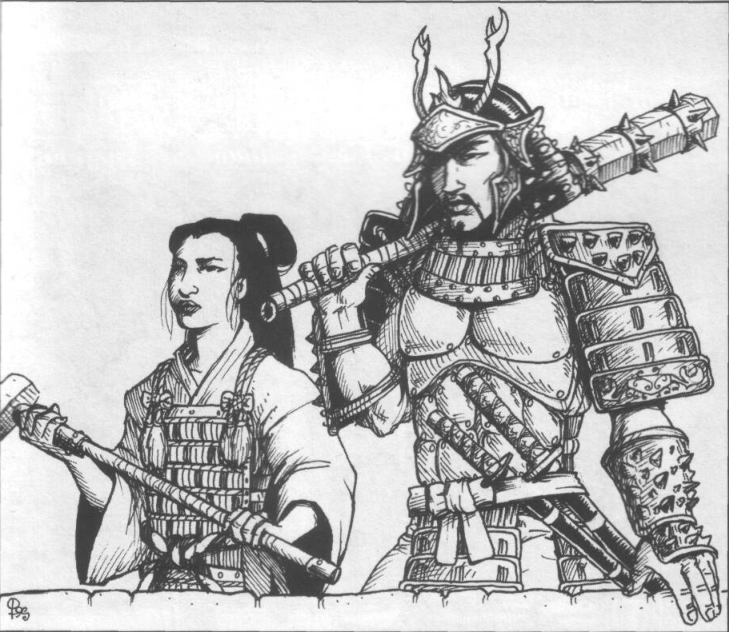
Everyone fights, no one quits.
We get our customary in-setting letters, but first we get this.
quote:
Something bearing my father's face and weeping my mother's tears comes clawing up from the depths, screaming for me to join them. I feel its talons against my armor, snapping leather and metal as if they were origami. I reach for my tetsubo as I hear its hideous laugh, and I know that one blow is all it will allow before it tears the entrails from my bones.
And you sit in your palace and lecture me on courage.
The wall stretches a thousand leagues long, filled with samurai preparing for siege. A sea of goblins stands before me, howling unnameable curses into the air. As they begin to cross the river, I hear that the Crane have launched another foray against our borders to the north. Yet I can do nothing but stay where I am and ensure that no goblin escapes to terrorize the same Cranes who steal our land.
And you lie in your garden and tell me about duty.
The dismal stink of the Shadowlands surrounds us. A towering Oni grabs a pair of bushi and shakes them like children's dolls, snapping their bones into powder. I hear their pleas for help and ignore them, knowing that I am condemning them to a fate worse than death. My daimyo is depending on me to escape this horror, or hundreds more will die as my companions have.
And you stand in your silk robes and explain to me what honor is.
Yeah.
Letter one is from the Lion ambassador to the Scorpion, recalling how in the occasion of the birthday of the Scorpion daimyo's mother there was a great birthday party. Representatives from all clans were sent there and sure enough, politicking ensued. Until a Crab, in full armor and not particularly nice, the Crab delivered his Clan's gift to the daimyo's mother - a precious egg inlaid with jade and ruby that opened to reveal a scene of dancers and acrobats. After that, the Crab left, followed by the daimyo's nephew. Witnesses say that he asked that the Crab stayed, the visitor demurred, and then the nephew made the mistake of insisting that the Crab stayed and allowed himself to be bathed by Scorpion servants, as was the custom. The Crab flipped out and tore the Scorpion's mask from his face, demanding a duel. To the Scorpion's astonishment, the Crab replied that he would not let his guard down when his host wouldn't, and took off leaving the host dejected and humiliated. Scorpion diplomatic barrages were met by Crab stonewalling - the Hida daimyo thought his envoy had acted properly. The second letter comes from Daidoji Nazoko and narrates how after her gempukku she and her sensei went on the trail of an ogre bandit. Seeking justice, they went as far as the Kuni Wastes, where the sensei pointed out the hut of Kuni Mokuna, "the most terrible shugenja since Iuchiban," and how they had to keep from drawing his attention. Eventually, they found the bandit - problem is, he had company. Another two ogres, one of which turned the sensei's head into pulp. Nazoko was willing to sell her life dearly when suddenly the ogres were blasted by intense magical power, making short work of them. It was Kuni Mokuna. She asked how he could do that, completely surprised; he replied that by knowing them as he knew himself. She would not leave his side for the next twenty years.
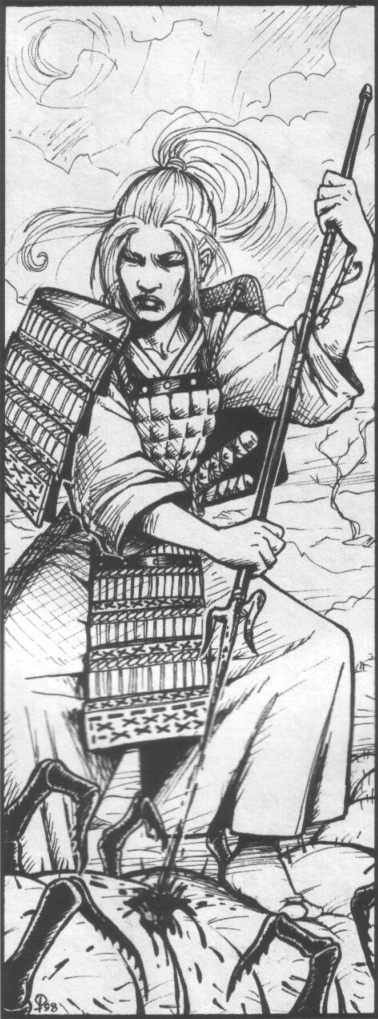
Being Crane doesn't mean you can't be
 with the best of them.
with the best of them.
Crab history is defined by the Shadowlands. No other Clan has such a threat to deal with or such a clear purpose. All the way back to the Tournament of the Kami, Hida was the strongest and largest and easily overcame the physical challenges, but was stumped in the contests of wits and insight, and at the final tournament he was the first to fall before Shinjo. He stalked away from his brothers and sisters and berated himself for hours, cursing his weakness. A little old man asked the Kami why he was so angry, and he replied that it was because he was weak, and his strength did not save him from his weakness. Knowing your weakness is a form of strength, said the old man; Hida replied that it was his weakness that made him fall first. Not so: it was his inability to accept his weakness. But now that he knew, it was strength. Lies are told by those who would hide their own weakness. All of which were the things that Hida needed to hear: in later years he sought to overcome his failings, and learned from the Dragon and the Lion closely. By the time Fu Leng rose against the Empire, Hida was the most feared warrior in all of the Empire. He was first in the line against the Shadowlands, seeing them as a test to see if the Kami were fit to rule. Legend has it that Hida even managed to fight Fu Leng personally in the war, scoring a deep wound on the dark lord. When Shinsei appeared again searching for mortal heroes, Hida offered his son Hida Atarasi without thinking of it twice: if Shinsei would not have him or his weapons, he would have his future. In the final assault after the Thunders did their thing, Hida slaughtered more oni than any other, and Hantei asked him to guard the Empire against the evil. He left with his followers and demanded to know who would shoulder the burden of keeping the Empire safe with him. Three volunteers appeared: Hiruma, Kaiu and Kuni. They had done nothing by their own admission that would make them worthy, but they knew they were. Hida ordered them to enter the dark lands and kill an oni called Hatsu Suru, which they did with Hiruma's battle prowess, the blade that Kaiu forged and the spell that Kuni weaved. They returned with the oni's corpse to Hida and truthfully neither claimed the kill for themselves, and Hida knew them to be worthy.
Hida lost his son to the Shadowlands and vowed never to have another child, but some three years after that vow Togashi saw how distraught Hida was and went to the Dragon Lands to tell of his brother's sorrow. The Thunder Dragon took a human form and went to Hida: Crane plays make this a romantic and poetic event, but the "wooing" was less romantic and more "the Thunder Dragon lady banged the brains out of Hida, left him for a year, and came back with a baby."
 Hida's second child was
Osano-Wo, son of a kami and a dragon. His first great feat was a war against the Kingdom of the Trolls, where what was left of their race had to flee to the swamps of the Shadowlands so that Osano-Wo could not find them. Unfortunately, his war against the Shadowlands was costing the Clan dearly, and he realized he had to marry into a wealthy family to find more resources. He settled for ordering himself a Matsu bride: the two envoys he sent came back with most of their bones broken.
Hida's second child was
Osano-Wo, son of a kami and a dragon. His first great feat was a war against the Kingdom of the Trolls, where what was left of their race had to flee to the swamps of the Shadowlands so that Osano-Wo could not find them. Unfortunately, his war against the Shadowlands was costing the Clan dearly, and he realized he had to marry into a wealthy family to find more resources. He settled for ordering himself a Matsu bride: the two envoys he sent came back with most of their bones broken.
 He went to the Matsu castle himself, and that got him his bride - but instead of the brash and feisty Matsu wife, he got himself a stern Matsu stickler for rules that kicked out anyone in his court with the slightest hint of the Taint and complained about everything from the inhospitable Crab palace to his own battle strategies. When she was finally pregnant, Osano-Wo threw a big party - one where he had a little too much sake, as he woke up in a peasant girl's hut. Nine months later, both his wife and the peasant girl bore him children, and Osano-Wo took both in. The boys were raised together, and the noble-born son bested his half-brother in all contests but not for much, fueling speculation on the next heir. When they underwent their gempukku, Osano-Wo presented his peasant son with the Clan's sword. When the enraged Matsu woman demanded to know why, he simply said that her son was a great samurai - a great
Lion - but he only knew how to win; not how to lose and keep trying. She left with her son the next morning, all the way to the Islands of Silk and Spice in the Sea of Amaterasu. His descendants would come to be known as the Mantis Clan.
He went to the Matsu castle himself, and that got him his bride - but instead of the brash and feisty Matsu wife, he got himself a stern Matsu stickler for rules that kicked out anyone in his court with the slightest hint of the Taint and complained about everything from the inhospitable Crab palace to his own battle strategies. When she was finally pregnant, Osano-Wo threw a big party - one where he had a little too much sake, as he woke up in a peasant girl's hut. Nine months later, both his wife and the peasant girl bore him children, and Osano-Wo took both in. The boys were raised together, and the noble-born son bested his half-brother in all contests but not for much, fueling speculation on the next heir. When they underwent their gempukku, Osano-Wo presented his peasant son with the Clan's sword. When the enraged Matsu woman demanded to know why, he simply said that her son was a great samurai - a great
Lion - but he only knew how to win; not how to lose and keep trying. She left with her son the next morning, all the way to the Islands of Silk and Spice in the Sea of Amaterasu. His descendants would come to be known as the Mantis Clan.
The first internal war in Rokugan was between the Crab and the Crane. Both Clans had started squabbling over the Kenkai Hanto peninsula, which they both claimed for their own purposes. Eventually things escalated to use of force, and the Crab forces easily handed the Crane their asses on a plate, but the Crane used their influence at Court and with the merchant guilds to cut the Crab's supply lines, forcing their retreat. To maintain the moral high ground, the Crane ordered the Yasuki family, then Crane, to cease their illegal activities in which they had been involved. They protested, claiming that they needed to have an eye on such a "dangerous" sector of the economy, but the Crane daimyo was having none of it. And so, the Yasuki went to the Crab, who were only too happy to have their supply lines restored. Eventually the Emperor stepped in and commanded both Clans to stop fucking around, and the Yasuki formally joined the Crab. The Crane, unwilling to forgive the traitors, started a shadow war against the wayward family, shutting them out of markets and propping up competitors. The Yasuki countered with ronin muscle and mysterious accidents on Crane holdings. From this covert war, the enigmatic cult known as the Kolat would be born... and that's all we get about them this book.
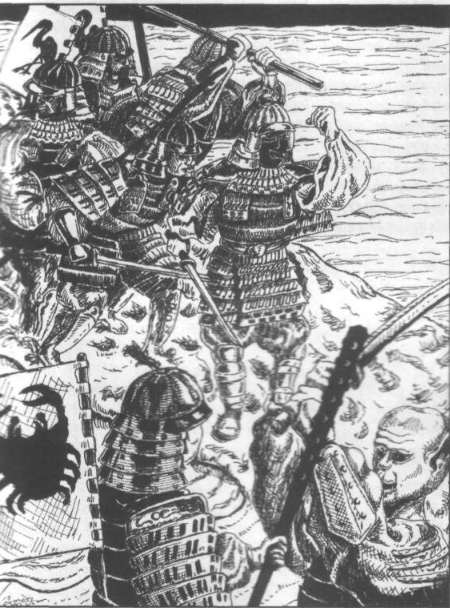
Jesus, this art
The Lion and Crab would seem to be natural antagonists as the two most militant Clans, but while relations can be testy they have mutual enemies in the Crane and Scorpion and respect each other's strength. The closest they came to all-out war was when Matsu Itagi, Lion daimyo and great hero, got it into his head that he was the one to finally shut down Fu Leng's Festering Pit. The Emperor gave his consent (knowing he could not stop such a proud samurai from going off to his doom) and many people volunteered to join him (knowing he would refuse). He reached the Crab lands, where the daimyo Hida Tadaka said what no one else dared to: Itagi was a fool and going off to die. Finally he let him go to the Shadowlands, but offered no further help. Weeks passed, Itagi's supplies had to had run out by then, and eventually Itagi's sister came at the head of a great Lion army demanding to see her brother. Tadaka set off on a mission to find him before the Lion went off on his Clan, and after a long journey he found a badly wounded Itagi, slowly realizing the impossibility of his quest. Tadaka stood along with the Lion and they fought the monsters that came to finish off the wounded Champion, and both heroes returned to civilization only to die shortly after - but they were not defeated. Buried with full honors in Otosan Uchi, their example has prevented hostilities between their Clans for six centuries.
When Iuchiban rose and was put down by the might of the Clans, it was Kaiu Gineza who built and designed his tomb and sealed himself in it to prevent the mad sorcerer from escaping. But unfortunately, Iuchiban slipped away a century and a half later, only to be captured once more by the combined strength of the Clans. The Kuni in particular were the most worried about his rise, because the Crab could not be hoped to both fend off the Shadowlands and seek threats to the Empire from within. Iuchiban also was rumored to have based his magics on Kuni teachings, so it was somewhat personal for them. They decided to separate some of their own from their shugenja training and seek out evil in the Empire, selected for their hardiness, combat skills and knowledge of the Shadowlands. The Kuni Witch Hunters soon developed skills of their own and are now an autonomous brotherhood only loosely affiliated with the main family, fighting ceaselessly against night horrors and Bloodspeakers.
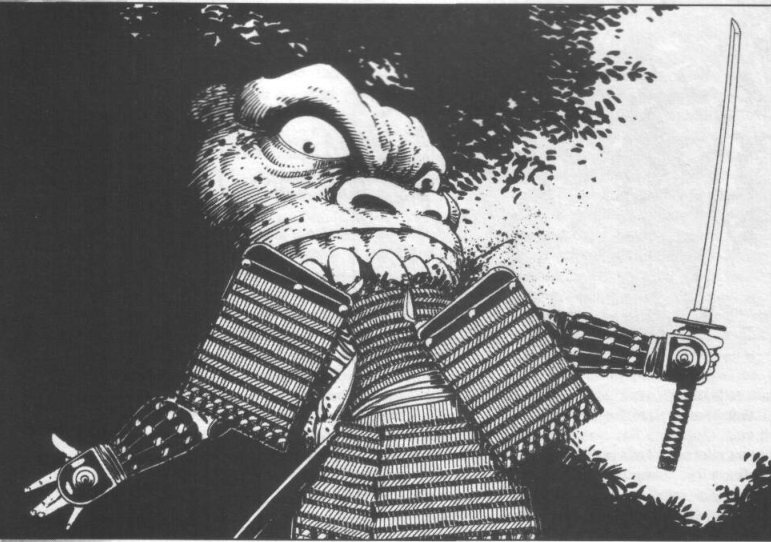
N O P E
In the year 716, almost all was lost. An oni known as The Maw gathered the largest Shadowlands army ever known and rampaged against the Crab lands, corrupting and destroying everything in its path. Secret blood magics destroyed the Hiruma castle, the central point of the Crab defenses, and the Shadowlands army easily brought low what remained standing. Next was the Kuni castle, which had been vacated along with its precious repositories of magical knowledge, but it too fell to the horde. All that was left was the Hida fortress, and the Maw was about to cross the Saigo river and cut it off from assistance. A young shugenja named Kuni Osaku asked how long it would take to erect suitable defenses: sixty days or so. She would buy these days by enacting a mighty spell that turned the waters of the Saigo into an impassable torrent, but the energies were such that she aged a year each day. The entire Clan, all the samurai and heimin, even all the hinin that could be found worked feverishly to build the new defenses while Osaku aged visibly with each day and the Maw waited patiently for her to fall. Seventy three days later, she died with honor, and the Maw's forces faced a mighty wall that they could not pass - and from hidden tunnels, the Crab army pinned the monsters between them and the Kaiu Wall. The purified skull of the Maw now adorns the Hida castle's gates, and Kuni Osaku is one of the Empire's most revered heroes. The Kuni lands were retaken at a great cost: the land is now a spiritual wasteland as well as physical. Their school was never rebuilt, and instead shugenja huts dot the landscape and the Kuni rarely meet in great numbers. The Crab later demanded of their neighbors lands to make up for what they had lost, which some granted or were cowed into giving, and others fought for.
After the tumultuous return of the Unicorn, the Crab welcomed them with other arms. Even though their first encounter had been hostile, the Unicorn had not shied away from taking on the Crab, yet they did not extend the conflict uselessly. They had journeyed through the Shadowlands for a long time and risked everything to return home, and like the Crab they were outsiders to the Empire that could use assistance and could repay it in kind. Their alliance is firm, and the Hiruma have reestablished their school as a branch of the Moto, while Yasuki and Ide diplomats use each other as go-betweens where they are not welcome in person, and the Crab military accepts Unicorn cavalry more readily than any other Clan.
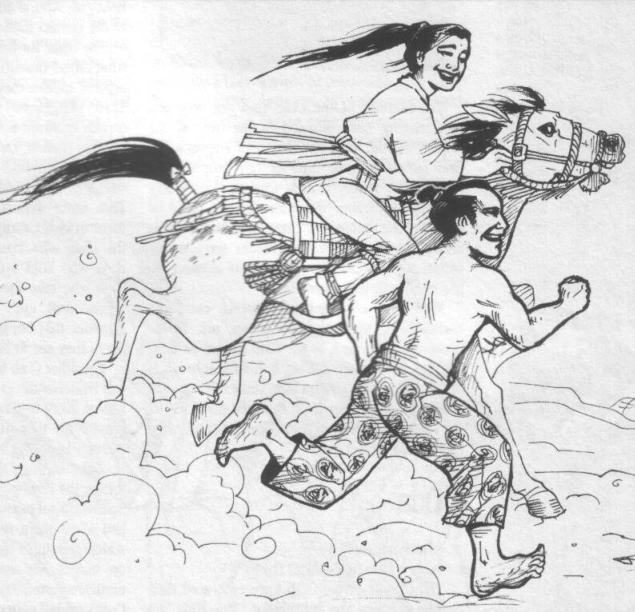
"Oh no, darling, we're getting married, don't run away on me now~" "Doesn't mean I can't try!"
Next: various flavors of asskicking
Way of the Crab: Fortunate Sons
Original SA post Legend of the Five Rings First EditionWay of the Crab: Fortunate Sons
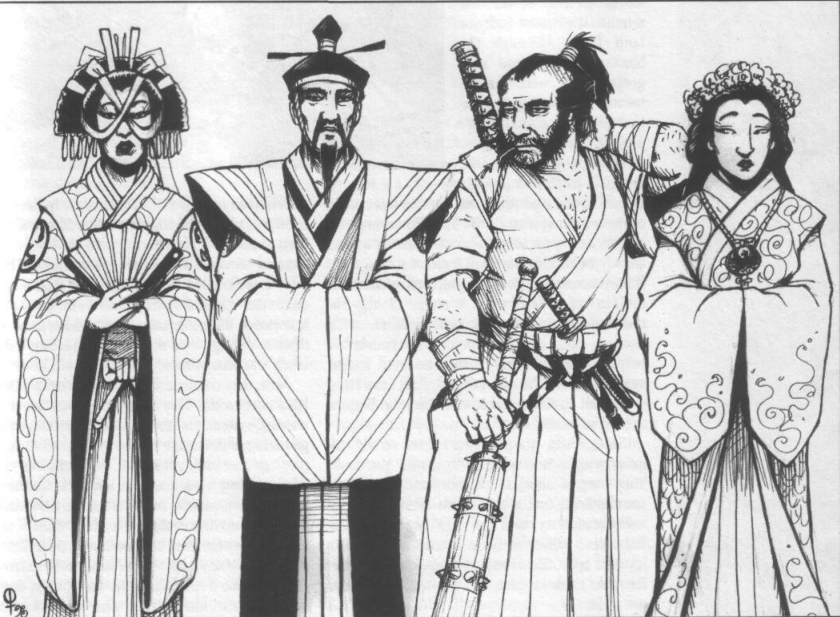
"Well you didn't say it was going to be a FANCY party."
Presently, the Crab continue doing what they've always done: fend off the Shadowlands and keep the rest of the Empire safe. But lately, there's been some mumblings about the Crab taking a more active role in Rokugani politics. It is an open secret that Hida Kisada, the clan daimyo, holds the Emperor in contempt and loathes the lack of interest of the "old man" in the Shadowlands issue. Kisada feels that with Crab leadership, the Empire could finally stand as one and crush the Shadowlands once and for all. Rumors of the Crab planning a coup have flown all over and the Emperor himself has voiced his "distress" in private. The rest of the Empire hopes that with the recent surge in Shadowlands activity and increased number of skirmishes, the Crab's saber rattling will cease.
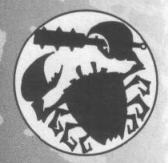
The Hida mon, the
 est crab.
est crab.
The Crab's families all have very old histories, all but one founded during the reign of the first Hantei. With this kind of history there come old traditions that aren't easily broken. While sometimes you can find Kuni bushi or Kaiu shugenja, by and large they stick to their stereotypes most of any other Clan. The Hida are the largest and strongest family, and they dominate the Clan's politics. There's no practical distinction between "Hida" and "Crab Clan," really. They represent their Clan at its best and at its worst: brave warriors and decisive generals, but also impulsive bullies and hotheads. The rest of Rokugan would rather have the Yasuki or Kaiu in charge of the Crab but the Hida don't care, and sometimes even flaunt their coarser aspects. At the end of the day, it's them who lay their life against the darkness. The other Crab families have never questioned the Hida's rule, and in turn the Hida grant them enough autonomy to pursue their interests and defer to them in their fields of specialization, but when the Hida make a call the decision is final. Hida children train from the earliest of ages both as warriors and as leaders, and they relish combat like no other - observers often speak of the "cackling madmen" that they witness along the Kaiu wall.
The Hiruma come from the first samurai that swore fealty to Lord Hida. It was Kaiu that forged the blade that killed the demon and Kuni's spell that bound it, but Hiruma was the one to actually slay it. He became Hida's second in command, but instead of resting on his laurels he volunteered as a forward scout, and his family has followed that legacy. They are the military spies of the Clan, blending with their surroundings while armies pass in front of them and relaying intelligence to far-off Crab army units. Unfortunately, they have paid dearest of all families for their service: the Maw's forces took their lands and their castle, and their shame follows them to this day. They are fatalist, many of them berserkers that throw themselves into battle with heedless abandon. To die under the death trance is the greatest honor a Hiruma may receive. They have no school, except for a branch established for them by the
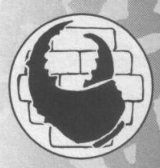
The Kaiu mon, a crab claw surrounded by bricks. Can crab claws even grab a brick?
The Kaiu are very unlike their brethren. Soft-spoken, quiet and reserved, acting with foresight where the rest of the Crab charge into action. The Kaiu are the builders, planners and smiths of the Clan: the great war machines that defend the Wall were made by Kaiu engineers, as well as the great road through the Twilight Mountains and the defense network in general. They keep the Clan's defensive structure together, which leaves them little time to seek their own glory, but that suits them just fine. Their engineers train to build castles and other defensive emplacements, as well as traps and obstacles that line the Saigo river and the Wall itself. In fact, the Wall was built over and around the Kaiu palace, and there is no telling now where one ends and the other begins. They see things in the long term, considering the consequences of their actions ages down the line, and have a fascination for building toys and puzzles; other Clans regret that the 'genteel' Kaiu are so focused in military matters. If a Kaiu gives you something made by their own hands, it is a sign of genuine friendship.
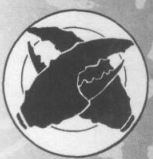
The Kuni mon, two crossed crab claws on a cream-colored field. It's supposed to mean that they seek the MYSTERIES OF THE UNIVERSE but to me it's more like they're NOPE forever.
The Kuni family are some of the most enigmatic and feared sorcerers in Rokugan. Their founder was ordered to discover a way to combat the dark magic of the Shadowlands and ventured several times into the darkness to obtain the knowledge needed to defend the Clan against the Taint. Little by little Kuni lost his sanity to this forbidden knowledge, and he died locked up in his own quarters beaten by the toll of his research, but his sacrifice is not forgotten. The Kuni are skilled in the physical form: biology and anatomy are their specialties. Their magic tends towards binding and warding. They have no centralized school due to the destruction of their original castle: instead, the knowledge and library of the whole family is scattered with all of its members, and the Kuni shugenja train by apprenticing themselves to usually a relative. They must possess a strong stomach and a burning desire to understand the Shadowlands, or else they will fail. The bleakness of their lands seems to stick to the Kuni, and others are often ill at ease around them, sensing some sort of coldness of vacuum in their presence. It probably doesn't help that they are known to touch dead flesh in their autopsies of Shadowlands monsters, but it's bad manners to bring that up in front of the Kuni. They gather once a year at the Hida fortress to discuss matters of magic and present their findings to the daimyo, and at this time the Witch Hunters take in promising apprentices. These tsukai-sagasu (literally "user-seek" but supposed to mean "hunters of evil") learn some of the family's mystic secrets, but also the martial arts, and stories of their exploits in popular culture are as wild as those of the Dragon Tattooed Men. Incidents of Non-Kuni becoming a witch hunter can be counted on one hand. The hunters learn their skills through experience and example, and when the time is right they leave their master to seek their own way.
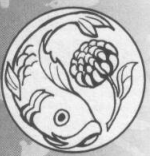
The Yasuki mon, a golden carp. It's supposed to mean good fortune!
The Yasuki are among the greatest merchants in Rokugan, and as such seem to have little in common with the Hida. They have adapted well to their current Clan in spite of the Crane harassment, and still focus themselves on mercantile interests. Unlike most nobles, the Yasuki revere the merchant class. Money and commerce are the Empire's lifeblood in their view, and increase the fortunes of everyone participating in it. But they are different from their Crane counterparts in that they still have the Crab's reputation for rough honesty. They can fleece you as far as you're willing to pay for a thing, but they are honest about fleecing you, which the nobles find crude but heimin like to know where they stand. And Yasuki rarely sell shoddy or inferior products: the customer gets what they pay for. They are also involved in "paralegal" enterprises, which they will admit cheerfully while suggesting critics to try before condemning. They simply claim they are providing a desired service, supply and demand and so on. Their continued battle with the Crane forms the basis for Rokugan's organized crime. Smuggling is also a favored profession due to these enterprises and by more over the table but still dangerous jobs like getting shipments of weapons to the Lion past the Crane and Scorpion. They also serve as diplomats and ambassadors for the Clan, which other Clans much prefer (Crane excepting). Yasuki diplomats are also the family heads on a region to which all operatives must report before opening a new business. Their family tradition allows them more flexibility in their education, and after their gempukku they're taken in by family masters that teach them the tricks of the trade while guiding them to what the new Yasuki is best at.
Character options! New skills are Engineering (build, design and repair large structures, Kaiu characters should all have at least one or two points of this), Goblin Culture (unsurprisingly a Low skill), Intimidation (cuz Crab), Maho-Tsukai Lore (Bugei skill for Witch Hunters and Low for everyone else), Origami (turns out the Kaiu love origami, who would've thought), Ratling Speech (a Low skill, and characters lose a Honor point if they use it outside the presence of Nezumi
 ),
Siege (taking down what Engineering builds) and
Traps (how to set them up, build them and disarm them; Bugei for Kaiu, Low for everyone else). Crab characters that get Shadowlands Lore 3 also get 1 point in Ratling Speech, Goblin Culture or Maho-Tsukai Lore for free.
New Advantages are
Blood of Osano-Wo (5 points, 3 for Crab and Mantis, you can't be harmed by natural weather phenomena and always succeed at Stamina checks involving temperature changes),
Crab Hands (6 points, Crab and Mantis only, you have basically 1 point in all weapon skills)
Hands of Stone (5 points, Crab only, you keep 2 dice instead of 1 when barehanded),
Kaiu Sword (you have a Kaiu blade, 3k3 but must never leave your side, if someone else touches it you lose 1 Honor point and losing it means losing 2 Honor Ranks) and
Ratling Ally (2 points, Crab only, you should detail the ratling buddy and their history with your character). The only Disadvantage is
Shadowlands Taint (for each Disadvantage point you get two Shadowlands Taint points)
),
Siege (taking down what Engineering builds) and
Traps (how to set them up, build them and disarm them; Bugei for Kaiu, Low for everyone else). Crab characters that get Shadowlands Lore 3 also get 1 point in Ratling Speech, Goblin Culture or Maho-Tsukai Lore for free.
New Advantages are
Blood of Osano-Wo (5 points, 3 for Crab and Mantis, you can't be harmed by natural weather phenomena and always succeed at Stamina checks involving temperature changes),
Crab Hands (6 points, Crab and Mantis only, you have basically 1 point in all weapon skills)
Hands of Stone (5 points, Crab only, you keep 2 dice instead of 1 when barehanded),
Kaiu Sword (you have a Kaiu blade, 3k3 but must never leave your side, if someone else touches it you lose 1 Honor point and losing it means losing 2 Honor Ranks) and
Ratling Ally (2 points, Crab only, you should detail the ratling buddy and their history with your character). The only Disadvantage is
Shadowlands Taint (for each Disadvantage point you get two Shadowlands Taint points)
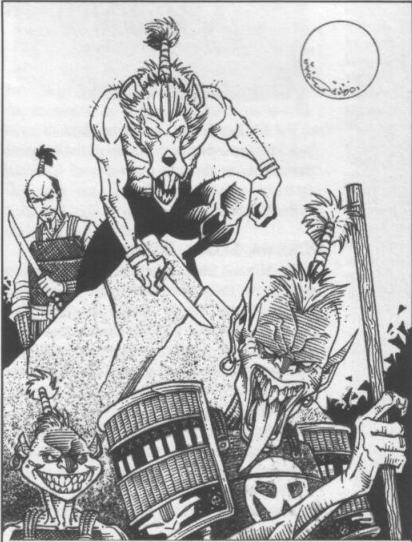
Gobbo's gonna get shank-shanked.
The Hiruma family (+1 Stamina) learns at the Shinjo-run Hiruma Scout school. +1 Perception, 2.0 Honor. Skills are Stealth 2, Archery, Athletics, Hand to Hand, Kenjutsu and Shadowlands Lore. They start with their swords, a piece of jade and little else.
- Rank 1: the bushi gets +5 to their TN to be hit against Shadowlands creatures.
- Rank 2: the bushi can run (Stamina x 2) hours non-stop, after which they must rest for the same amount of time.
- Rank 3: the bushi can never become lost in the Shadowlands, and can sense the Taint in nearby creatures (range is 10 feet x School Rank)
- Rank 4: the bushi can attack two times per turn against Shadowlands creatures, and can also take a visual 'snapshot' in their head that they can later recall with perfect accuracy. They can only hold one snapshot at a time.
- Rank 5: the bushi can become "invisible" by spending one Void Point and remaining perfectly still. They must be making a conscious attempt at hiding and cannot conduct any actions while the effect is maintained.
Well, I hope you like fucking around in the Shadowlands if you take this one.
The Kaiu family (+1 Perception) teaches the Kaiu Engineering school. They are considered bushi as combat engineers. +1 Intelligence, 2.0 Honor. Their skills are Siege, Engineering, Traps, History, Armorer, Battle and Weaponsmith. Instead of techniques, they may choose one of their school skills each Insight Rank and roll and keep an extra die for all skill rolls. They may select another skill for the bonus each Rank or specialize, as they wish. Not much to talk about, going into Battle can be interesting in a game with mass combat rolls but otherwise it's very bland support.
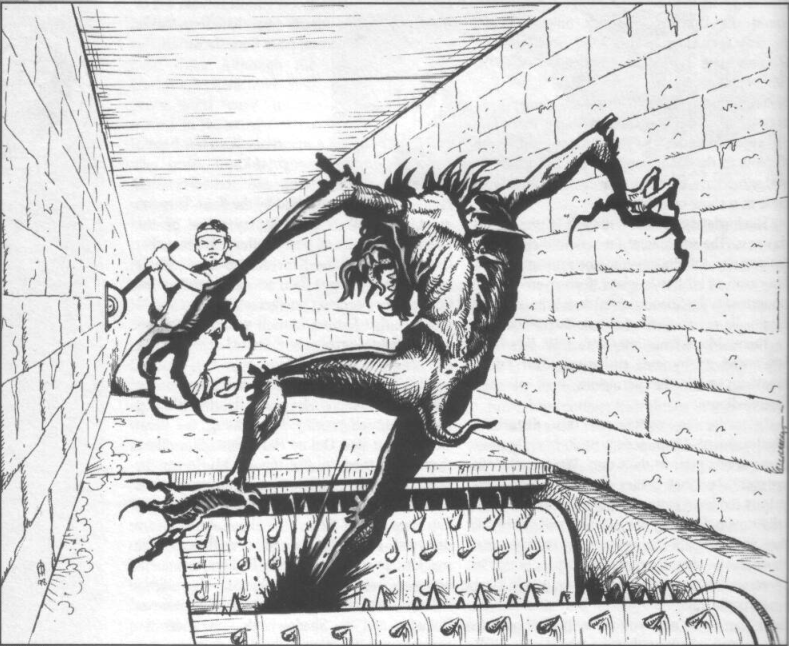
Playing with the guys that basically design the setting's Tomb of Horrors should be cooler, IMO.
The Kuni Witch Hunters are trained on the road by experienced hunter sensei. They undergo a rudimentary magical education (can take the Spellcraft skill) but they are considered bushi, not shugenja. +1 Awareness, 1.5 Honor. Their skills are Shadowlands Lore or Maho-Tsukai Lore, Defense, Hunting, Herbalism, 2 Bugei skills, Athletics or Stealth. They start with their swords, clothes, and a jade pendant as their badge of office. Also, since they are so rare and solitary only one Witch Hunter per party should be allowed.
- Rank 1: the hunter may attack two times per turn against Shadowlands creatures.
- Rank 2: the hunter can roll Awareness + Shadowlands Lore to feel Tainted creatures up to 50 yards away.
- Rank 3: the hunter can keep additional dice in combat equal to the enemy's Shadowlands Rank. For "natural" Shadowlands creatures, goblins and zombies give 1 die, ogres and pennagolan and ghosts give 2, and oni give 3-5 depending on the GM.
- Rank 4: the hunter is immune to maho, and can make another character resistant for one round with a TN 25 Willpower + Maho-Tsukai Lore roll. In fact, Tainted casters increase their casting rolls for spells that target the hunter in 5 x their School Rank (so that's another +20 right there, yikes)
- Rank 5: if a hunter's damage roll kills a Shadowlands creature it does not count as one of their attacks this round.
Like the Hiruma Scouts, they're anti-Shadowlands specialized, but they have more of a punch against Tainted freaks. Interesting in a game dealing with sorcerers and monsters.
The Yasuki teach the Yasuki Merchant school. +1 Perception, 0.5 Honor. Their skills are Etiquette, Heraldry, Sincerity, Defense, Commerce, Craft and Gambling. Commerce is not considered dishonorable for the Yasuki family, and in addition no matter their school all Yasuki start with +2 koku. Merchants are not considered bushi. They have no techniques, but as the merchant grows in Insight they gain greater ability to source what they need. Each rank has a list of things that the merchant can get with a School Rank + Commerce roll at a TN set by the GM, this gets the item in a week. The TN can be Raised to increase the quality or amount of items, or to reduce the acquisition time, and items from a rank lower than the merchant's own can be obtained in two days less per Rank (so a Rank 1 item can be obtained by a Rank 3 merchant in 3 days) Rank 1 items are stuff like carts, bolts of cloth, peasant weapons. Rank 2 items are boats, ponies, average jewelry. Rank 3 items are safe travel to a distant town, a finger of jade, and illicit goods. Rank 4 items are armor, fine weapons, a non-Unicorn warhorse. Rank 5 items are second-hand Unicorn horses, official travel papers, a girl with green eyes (really, game?)
Berserkers are not a school per se. The "dead-eyes" use the code of bushido as a bulwark against the horror of the Shadowlands. They thrive in the Crab clan, where their killing prowess is always needed. Most berserkers are Hiruma; Hida berserkers are less common and do it out of a love of battle rather than a need to cleanse their dishonor. Berserkers spend hours before battle psyching themselves up in meditation, and in battle they achieve a Zen-like state where they strike with heedless abandon, move like panthers and show no fear (or pretty much any other emotion) whether the enemy is goblins or the mightiest oni. All are the same to their deadened eyes. The Berserker "school" (+1 Stamina, 1.0 Honor) requires a Crab character with the Death Trance advantage. They have no techniques and in fact they must drop all of the techniques of their previous school. When a berserker enters combat, they ignore wound penalties for (Earth x 2) rounds, and roll and keep an extra die of damage per Berserker rank no matter what weapon they are using. After the Earth x 2 rounds, however, they fall down in a semiconscious haze (Incapacitated, I think they mean Down) and must be protected by others if they wish to stay alive. Berserkers are notoriously short-lived. Even a starter character with an Earth of 3 is going to be berserk for 6 rounds, though, and that's a long time in L5R combat.
The heritage tables follow with the usual possibility of shitty results. I like that there's a greater possibility of a Crab ancestor ending in an affair with an Unicorn ancestor and that Yasuki have to reroll if they get a result like "Great Battle" or "Glorious Death," though.

Next: MMO tanks.
Way of the Crab: The Family of Stronk
Original SA post Legend of the Five Rings First EditionWay of the Crab: The Family of Stronk
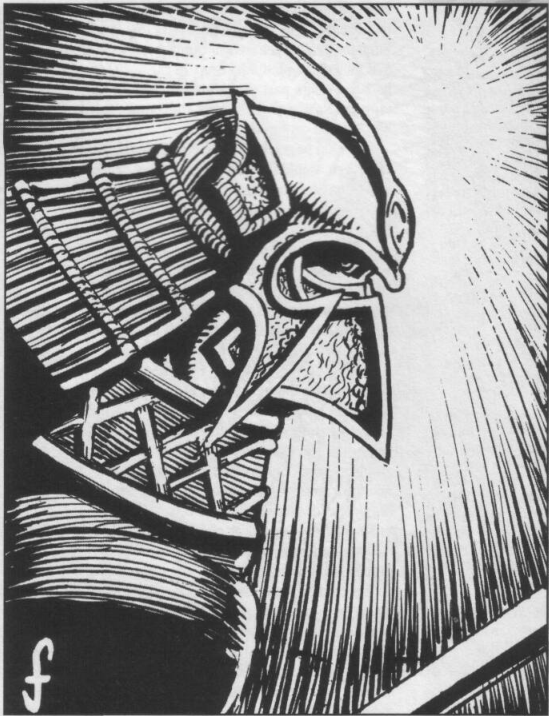
The stronkest boss.
The section on important NPCs follows. Hida Kisada, the Great Bear, is the Clan daimyo. When he was five years old, he went on a trip with his father to the Imperial City. On the way there, he saw three Lion children that beat up a peasant kid, who could not fight back because they were samurai. He caught them doing it to another kid and stood up against them, only to get beat up himself. After excusing himself with his father (still roughed up) he went back to the Lion kids and called them all the names he could think of, then ran away. The bullies pursued only to fall into a pit trap of his own devising, and Kisada left them there with broken bones and no one to save them. On the way back, the pit still had their rotting corpses. Kisada is known as one of the mightiest samurai and generals in Rokugan. Akodo Toturi might be his strategic match, but none compare to the Bear's sheer combat prowess. There are many poems and odes about the monsters he has defeated; ironically, only the Shadowlands denizens are worthy of his respect, and he is dismissive and condescending with all non-Crabs. At six feet and six inches tall he is easily the tallest man in Rokugan, and he wears his heavy armor at all times. He is proud of his two eldest children, Yakamo and O-Ushi, but the physical frailty of his youngest son concerns him. It is widely held that no one, man or Oni, has injured him and lived to tell about it. Hida Bushi 5, with a Earth of 9 that puts him into oni levels of toughness. Basically, the guy is a human-shaped tank. He also makes his Insight total handily, which makes the second print run's sidebar of "You MIGHT need to give Hida Kisada Horsemanship at 4..." hilarious.
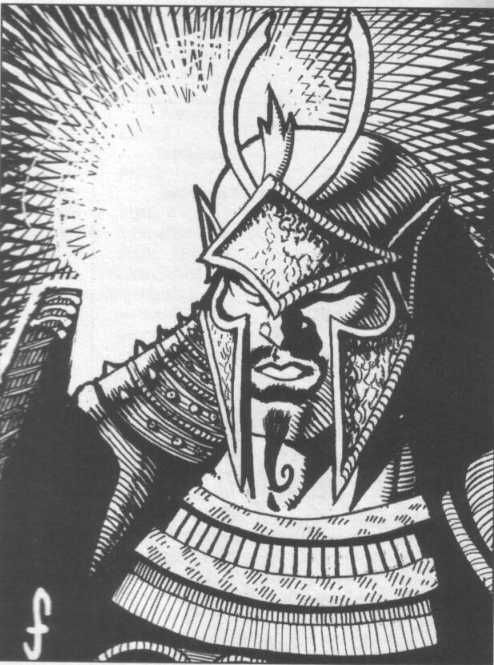
"You think I'm funny HOW?"
Hida Yakamo has been groomed from an early age to be Kisada's successor. He resembles him so much already: tall, strong, brash, frank, a fearsome warrior. He brought a thirty-feet long oni carcass back as his gempukku test, and the troops of the Great Wall regard him as a de facto general. He has also distinguished himself in several duels, including one fought against Mirumoto Satsu in which he won using a tetsubo: a flagrant disregard of duelist protocol and also a demonstration of his amazing skills, using such an unwieldy weapon in a duel without getting cut up to shreds. He has never given the duel another thought. His outbursts of temper are legendary and he is half-embarrassed at them in private and half-proud of his righteous anger. But he is learning, slowly, to time his outbursts to cause the maximum effect on his audience and keep them off-balance. He values honesty above all things and won't hesitate to let people know that he does not enjoy their company, feelings be damned, but the few friends he has outside the Crab understand the value of his friendship. He is also wise enough to understand his place in the world, and defers to age and rank when the situation requires it. Hida Bushi 4 with an Earth of 7, so still tough as all hell. He also has Mirumoto Hitomi as a nemesis, hoho.
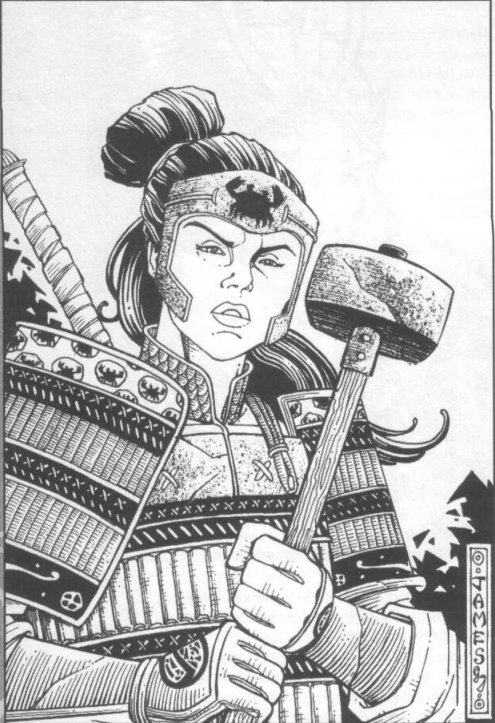

Hida O-Ushi is Kisada's sole daughter. He didn't know what to do with her at first, but he also knew he couldn't stand the thought of marrying her off and having her bow and scrape in the Emperor's courts, so he had her trained just like his boys were and no one went against the Great Bear's wishes. For her, war is a game, and she finds disemboweled corpses as funny as an Imperial acrobat and treats them both with the same lack of reverence. She takes her duties (that now include watching the Crab's northern border) with glee. She waits for her opponents to strike first, taunting them or offering a ripe target, then whaling on them with irresistible force. But while Kisada and Yakamo are known for their individual accomplishments, O-Ushi is recognized as a leader of soldiers. She stands at the vanguard of her troops and invariably moves en masse in the battlefield. She has the same temper as his brother but instead of allowing her anger to get the better of her she has refined it into a sharp, biting wit. Off the battlefield, she is just as prickly and forthright. She has pointedly refused to take the samurai-ko's vow of celibacy and openly boasts of the pleasures of the "beast with two backs"
 , relishing the shock that such statements cause. Last man that called her a "harlot" is no longer able to eat solid foods. She is also protective of her little brother, Sukune, who she feels has been dealt a harsh lot in life. O-Ushi would be considered pretty if she ever left the barracks and armor. As it is, she's never without her trusty warhammer. Hida Bushi 3, with a Bad Reputation of (Bully), but honestly O-Ushi kicks ass.
, relishing the shock that such statements cause. Last man that called her a "harlot" is no longer able to eat solid foods. She is also protective of her little brother, Sukune, who she feels has been dealt a harsh lot in life. O-Ushi would be considered pretty if she ever left the barracks and armor. As it is, she's never without her trusty warhammer. Hida Bushi 3, with a Bad Reputation of (Bully), but honestly O-Ushi kicks ass.
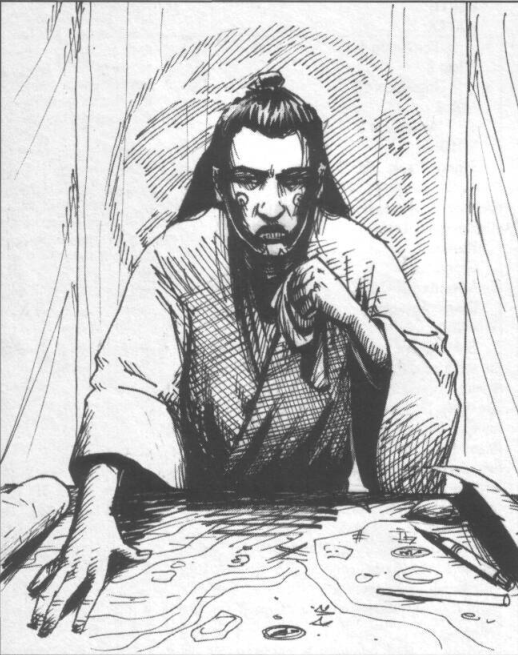
"Your plans are great, Sukune, now stop coughing blood over the map."
Hida Sukune is the runt of the daimyo's family. He was born two months early, sickly and of poor health, and his mother died months later. He still blames himself for her death. He had to rely on his mind rather than body to sustain him, but he was enthralled with the intricacies of battle and strategy. He studied the writings of Rokugan's greatest generals and applied them to his training, which served him to graduate as a proper bushi with his other classmates. He serves as a strategist and advisor in his father's fortress, and though he has seen his share of combat his poor health keeps him on the back lines. Officially, he is the Crab army's battle standard bearer. The Crab's warlords expect great things of him, and have every confidence in his abilities - if he can stay alive. He always takes Kisada's side in an argument; he'll do whatever it takes to make his father proud of him. In battle, he wears an ornate, crustacean-looking set of armor that he finds disorients his opponents and gives him time to seize them up. Hida Bushi 2, but he is missing a lot of points to make that Insight. Also has Weakness but all of his Rings are at 2, for some reason.
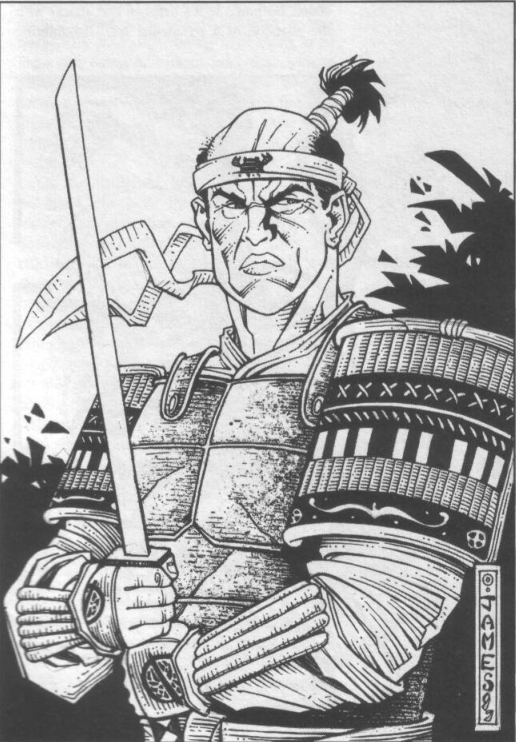
Warning: not actually a secret softie.
Hida Amoro is all the negative stereotypes of the Clan rolled into one. A nephew to Kisada, he is a berserker, but unlike any other. He was an angry, uncontrollable child that delighted on tormenting others his age, inflicting savage beatings on anyone that defied him, even killing one of his sensei at the age of twelve. He never received any acknowledgement from the Hida school and doesn't give one whit about it. In the battlefield, he jumps with maddening glee, using his inhuman strength and brutality in lack of formal training. Unlike dead-eye berserkers that reach that state through self-discipline and meditation, his rage is purely natural. Kisada has him permanently posted at the Kaiu Wall, and he has personally destroyed several Oni of power and repute. Other Crab commanders keep quiet, because of his effectiveness and the belief that his luck has to run out sooner or later. Social skills are obviously not his forte, and he is banned on pretty much all Rokugani courts: no one goes to talk to him unless absolutely necessary. Berserker 3 with Honor 0, and many Rings at 1 so lol Insight. Still hits like a fucking truck, though.
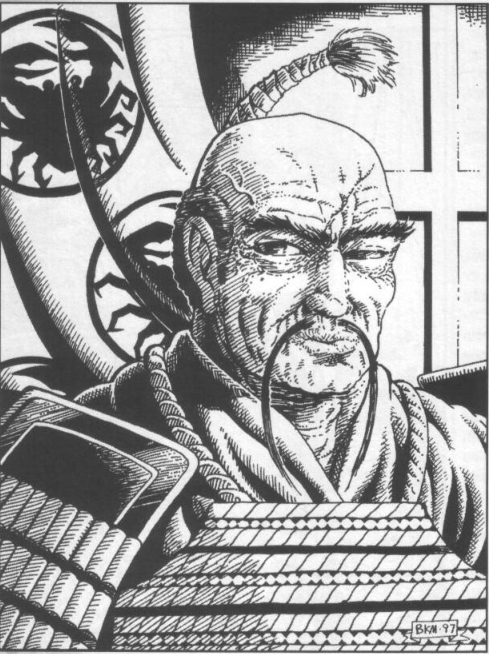
He doesn't have enough face to contain his GRIZZLED.
Hida Tsuru is Kisada's younger brother and cavalry master of the Clan. His units are used as a mobile reserve force, mounted in ponies that aren't a match for Unicorn warhorses. He knew from an early age that he would never be a match for Kisada's physical abilities and so sought his own niche where he would not be constantly compared with the Great Bear, which he found with the cavalry. His forces are chosen for stamina, endurance and willpower, as well as the hardy ponies they ride, and since Tsuru pushes himself right along with his men their loyalty to him borders on the fanatical. The few times the Kaiu Wall has been breached, the Shadowlands monsters that pour through always find his troops, and never get past them. He is infamous for his ruthlessness with the other Clans; it was Tsuru who cruelly killed the Unicorn horses in that one skirmish that Shinjo Hanari has sworn to avenge. In Tsuru's mind, he acted in a proper manner: against a foe such as Fu Leng, he has no illusions about what needs to be done, and why should he change his tactics along with the enemy? He does not tolerate failure, but at the same time he rides himself endlessly for any mistake he has made. Hida Bushi 4, nothing out of the ordinary there.
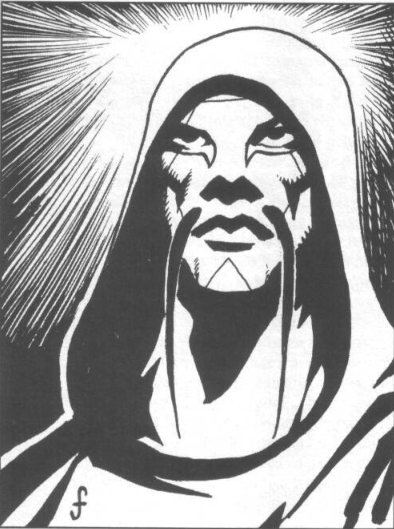
Look at this fucking hipster.
Kuni Yori is the most feared man in Rokugan. Shugenja of other Clans claim his soul has been stolen by the Shadowlands, but no one knows as much of them as he does. He is the final authority on all things dark and dangerous. He used to be an unremarkable second son of the previous Kuni daimyo and thought of spending his life in quiet research, until a mysterious accident took the life of his father and eldest brother. The exact details of the accident are unclear, but whatever it was Hida Kisada decided to leave well enough alone and installed Yori as the new family head. He balances his family duties with his personal research, and is known to have punished or demoted family members that haven't made progress in their studies, and his habit of showing up unannounced in other Kuni dwellings unsettles his brethren. Still, in his short tenure the family has made great discoveries. His own research is dark and grisly, and while he claims it is done in the name of the Crab there are dark rumors about his seeming obsession with the Shadowlands. Still, he enjoys Kisada's full confidence, and the Great Bear cuts short any accusation by saying that Yori has done and sacrificed more to fend off the darkness than any would-be critic. His very presence is disturbing, and he has gone through no less than five apprentices, none of which will discuss their training. Kuni Shugenja 5, short of Insight, and with Knives 5 and Torture 4 as skills

 No Shadowlands Taint or anything though, folks!
No Shadowlands Taint or anything though, folks!
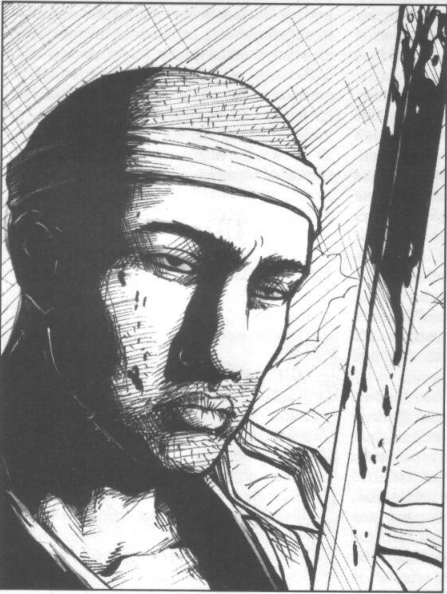
That's some tough Hiruma shit you just got yourself into.
Hiruma Kage is the current leader of the Hiruma. All Hiruma daimyo vow to retake their lands, and all have failed, and Kage is not the exception. Right after gempukku he led an expedition to liberate the ruins of his family castle, where he and his forces found a group of oni engaged in blasphemous rites to Fu Leng. The oni were slaughtered, but the Hiruma had to retreat under the attack of heavier Shadowlands forces; Kage himself had to be dragged out of the castle by his lieutenants. Despite this irredeemable blemish in his eyes, he has managed to focus on more practical family matters. He took over daimyo duties five years ago, with his retired father in an advisory position. Hiruma Yoshi has managed to temper his son's obsession with an awareness of his responsibilities to the Clan. Kage now lives along the Kaiu Wall, organizing Hiruma efforts and directing the family's scouts and berserker units where they can do the most good. Secretly, however, he cannot forget what he saw at the Hiruma palace, and he seeks release in a honorable, glorious death - but he has not forgotten his duty, and his deathwish combined with this duty have turned him into a formidable killing machine. He is the opposite of Amoro: both berserkers, but Kage's rage comes from harsh discipline and the disgrace of his family, cold and calculating. He is an unimposing man, but with great stamina and strength, and usually goes into battle lightly or with no armor: he explains that most of his foes can tear heavy armor like paper anyway. Berserker 4, with Driven and 1 point of Haunted.
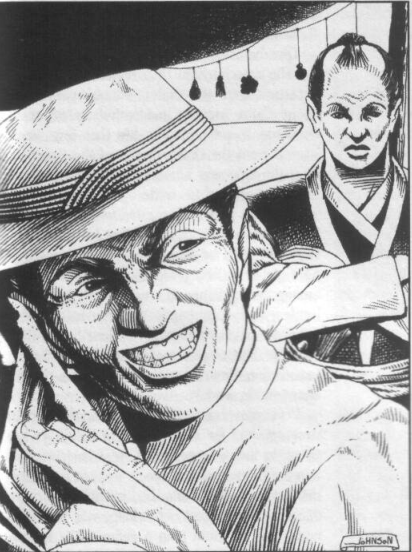
Taka is making lots of koku! Wanna help?

Yasuki Taka is a tiny, wizened old man, and leader of one of Rokugan's most powerful merchant families. The palace is taken care of by proxies and magistrates: Taka is on the road, working as a common peddler on the roads. Most people in Rokugan know him by now and all are happy to see him on the road. He always seems to have exactly what you need, engages and haggles in a friendly manner, and no one seems to care that he always comes up on top of a deal. As a young man he eschewed the family's diplomacy and high-stakes maneuvering for simple trade and salesmanship, honing his craft and observing everything that he saw. When the time came to assume his position he refused to relinquish his ways, and while he goes back to the family palace for important events he's normally doing what he's done for the last 30 years. He moves across villages and towns and always stops at the Yasuki-owned business, talking with his followers and providing guidance. This "micromanagement" has led the family to an unheralded era of fortune and prosperity. Some people note just how much distance he covers so quickly, and whisper that he has much greater powers than his humble exterior suggests. As for Taka, he just enjoys the art of the deal: he likes giving people what they want, or think they want, and sees nothing wrong with wanting to make money out of it. He never sells people more than they can afford, though, and can be particularly kind to the poor and unfortunate. The rich deserve no mercy and the Crane are his favorite target: he is banned on their provinces and yet he is always engaged in heavy trading there. Yasuki 5, but his Insight barely covers the second Rank. Also he has "Blackmail (you don't want to know that many)"

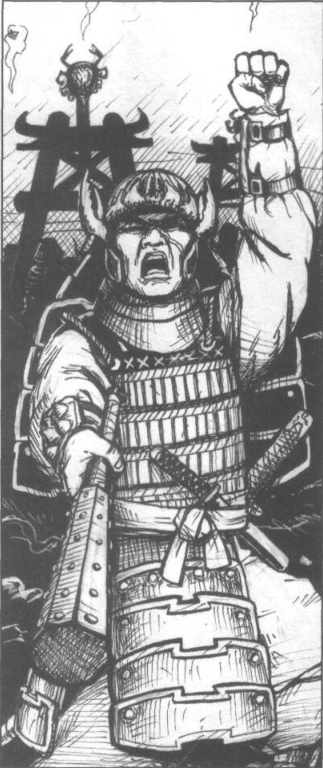
FIRE FOR EFFECT
Kaiu Utsu is a cheerful man with a quiet joy in life, not what you expect from the Crab's Siege Master. As a boy he was fascinated with origami, even staging mock battles with his paper models and oh dear god he's a wargamer. He was born with an eye for structure, and applied his natural abilities to the Kaiu school and the art of war. His bushi skills were adequate at school but his strategic prowess second to none. He has a post studying the Crab army and its defenses, continuously analyzing the Crab outposts and advising the Hida on how to hold on to them. He also analyzes Rokugan's other great fortresses, studying how they can be brought low. He realizes the implications of this research, but justifies it to himself saying that it's better that the Crab know before the enemies of the Empire. In battle, he can be found among the artillery units, relishing the havoc the catapults and firebreathers cause on the Shadowlands monsters. He is tall, with warm eyes, a wide grin and a scar that he got when a battlement fell on top of him, giving him a "Crab-like" face. He still loves origami and always keeps some paper in his armor to fold around during idle moments.

Ancestors! Hida is there, of course. Hida was convinced that his son would be the only Thunder to return, but instead that was Shosuro, the Scorpion. He never really got over that, even after Osano-Wo was born. One day, he took his weapons and went into the Shadowlands to get his boy; he was never seen again. For 10 points the character gets a Void Point for every Crab that stands with them, and all of those Crab get an extra Void Point, but the character also takes a Wound every time one of the clansmen is injured. Kuni is Kuni, and for 4 points a character makes a second roll when determining if they gain Shadowlands Points and use the highest one. Neat. Yasuki Fumoki was a notorious pirate that preyed on Crane ships and disappeared in a huge thunderstorm; survivors of his crew claim they were jumped by a sea monster and the last they saw of Fumoki was him ramming his sword down the monster's gullet. For 3 points, characters can predict the weather with near perfect accuracy for the next 24 hours, and they get a free raise to non-combat Agility rolls. Kaiu is Kaiu, and characters get their Void in Free Raises when using a Craft skill for 5 points. Hida Tadaka was the Crab hero that saved his Clan from Lion invasion by fighting along with the doomed Lion Champion. 4 points, characters may lend Wounds to other Crab characters by touching them, reducing their own Wounds to give them to others. They may also do so to non-Crab but this costs a Void Points. Hiruma, the man, the myth, has tales that border between inhuman bravery and foolhardy bravado. For 5 points characters may reroll any roll by spending a Void Point, up to their Void in times per day. This owns. Kaiu Gineza was the builder of the Tomb of Iuchiban. 1 Point, characters may sacrifice Wounds (up to their Earth) to deal that many extra damage points to the enemy on a successful hit. These extra damage points get past Invulnerability. Kuni Osaku might have just saved the whole Empire with her valiant sacrifice. 6 points, characters get their School Rank in Free Raises when casting a spell by spending a Void Point. Hida Banuken was the daimyo at the time the Kaiu Wall was constructed. 2 points, when the character fights side by side with another, they may strike simultaneously with their ally and vice versa regardless of their initiative rolls. The ally must be chosen before initiative is rolled.
Finally, sample characters!
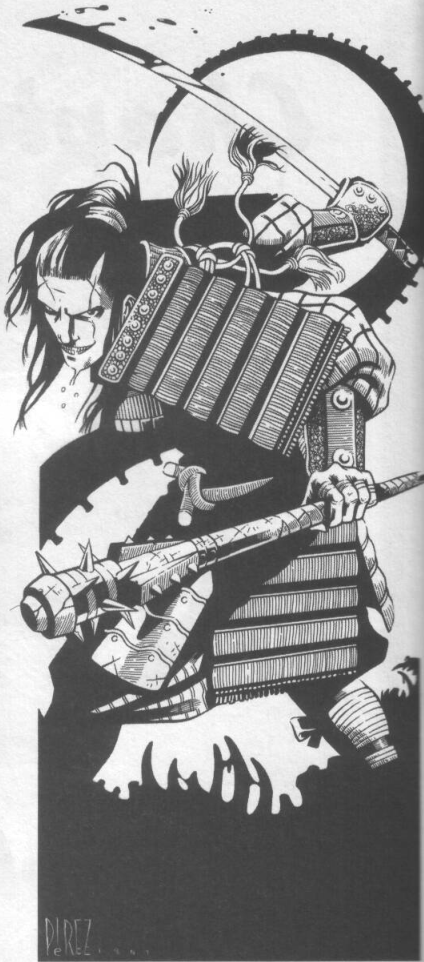
Leave it to the Crab to be the most anime.
The Hida Berserker loves bushido. His classmates at school saw it as just a tool that they could pick up and leave when they wanted, but for him it was more than that. It was strength, light, wild love! As he grew older his formal training was cast aside for something greater, and he becomes

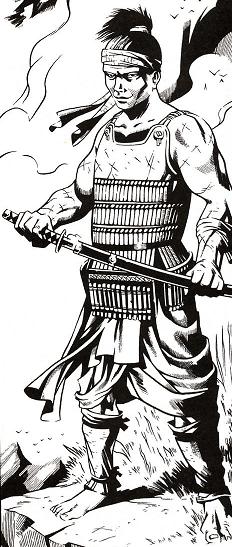
He's so smug because he's already got ten of his buddies surrounding you.
The Hiruma Scout laughs at the legends of the ninja. He tries to be as swift and silent as the legends every day after all. He grew up along the Kaiu wall, watching friends and comrades go out and face the Shadowlands. Not the tallest or strongest, but fast, he was sent to study with the Unicorn and learned to run like their horses. He also learned of his family's terrible loss and their struggle to maintain honor in its wake. When he returned, he now had something to win back. He has served as a scout since gempukku and far prefers the lone duty of observer to relaying messages as a runner. He slips through the darkness, marks enemy forces, leave them in the dust when they notice and is there when his more armored comrades come by for some payback. It's like a game of his childhood to him, only the stakes are greater. Ordinary character sheet, much better Insight that boy anime up there though. He also has a Ratling Ally, squeak-squeak.
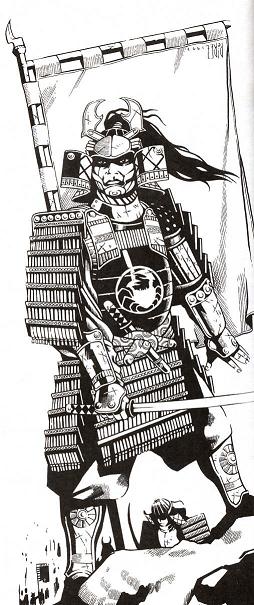
Looks badass, is very un-badass.
The Kaiu Battle Master loves seeing a plan coming together. He is an assistant to a great Hida general, and has a great ability to understand the flow and ebb of the battlefield. The Clan understands the value of these skills and has put him in the best position to make use of them, but he has a dark secret: he has never seen actual combat. His reputation is built on abstract philosophy and long range observation rather than direct action. In fact, he doesn't want to - he can barely stomach farm animals being slaughtered, and pales at the thought of disemboweling a man. His katana rests inside its saya, untouched by blood, and he has never been called to combat. He prays that it remains that way! A Kaiu engineer with 5 Perception and neat skills, but no combat ability and both Dark Secret and Soft-Hearted to make sure battle sucks royal ass for him.

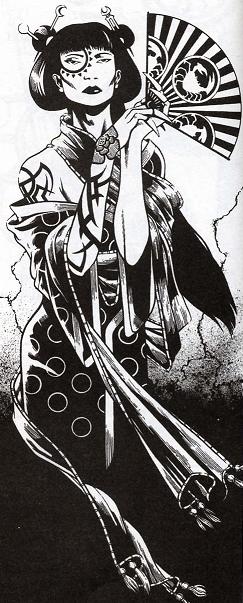
If everything else fails, whack them with the fan.
The Kuni Investigator wanted to be the very best Witch Hunter, like no one ever was! And she went to the annual Kuni conclave every year to wait for a hunter sensei that would call her. No one ever came, and she had to graduate as a shugenja. She cried herself to sleep that night, but did not give up. She learned all that she could and decided to become a witch hunter in deed if not work, traveling through the Empire seeking out stories of ghosts, maho and hauntings. Sometimes they were false; a few terrifying times not. Her spells and heart made up for her lack of witch hunter training, and those who she saved were too grateful to worry about credentials. Now she doesn't care that she is not a 'real' hunter: the battles she has fought so far are all that she imagined.All Rings at 2, which is eh for a shugenja that needs full Rings to cast rather than pumping individual stats. She fights using a tessen war fan, though, which might not be the mechanically best choice but is hella cool.
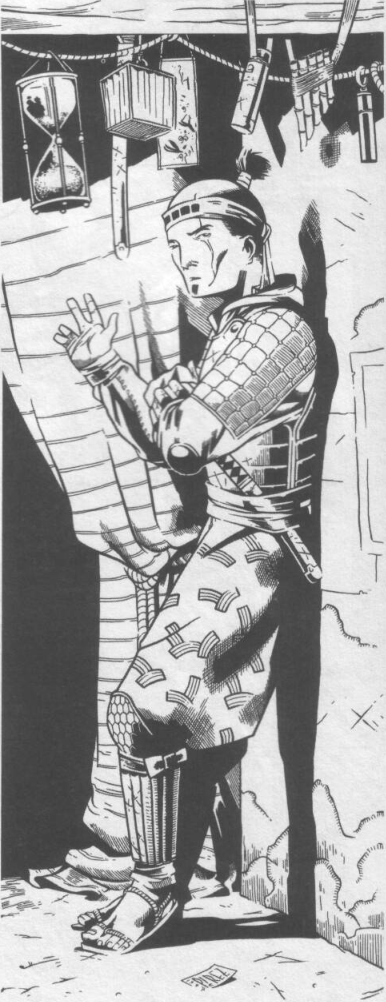
'sup.
The Yasuki Smuggler grew up in port cities following his parents. He watched in amazement how they brokered deals, and helped with quick getaways when the heat was on them. When he grew up, he inherited the family's boat, and he worked legit jobs. The pay was good, the people were honest and happy, and he grew mightily bored. So he started taking on more interesting cargo: weapons, chemicals, contraband, whatever. As long as the price was right, it didn't matter what he was carrying. That's when the heat came back, with governors and bushi and Imperial magistrates after him. By now he must be wanted by half the magistrates in Rokugan, but he is too clever to get caught, and there's always a Yasuki house around where he can lay low for a while. He loves it. Decent starting stats, but he only has the Defense ability keeping him alive.
Next: Peace is won at the end of the tetsubo.
Way of the Crab: Ten Foot Poles Not Statted, This Blows
Original SA post Legend of the Five Rings First EditionWay of the Crab: Ten Foot Poles Not Statted, This Blows
Incidentally, there's sidebars a bunch of AUTHENTIC CRAB CURSES in

Crab battle philosophy is all about exhausting the enemy with delayment, harassment, and leading them into the Crab forces. Hiruma guerrillas hit and run leaving evidence pointing at the direction where they want the enemy to go, disturb them at night, lay traps on the way and at a time and place of their choosing the main army attacks in a swift and brutal manner. When they go against the Shadowlands they take even these 'kid' gloves off: the traps become nastier and deadlier, divisive tactics become essential, and they bring physical and magical arsenals to bring down oni. Kaiu weapons, Hida tactics and the Wall let the Crab beat Shadowlands forces three times their size. Their army is one of the largest standing forces on Rokugan with 300,000 bushi, almost all posted at the Wall. Rokugani navies in general are limited to fast troop transport actions and in this the Crab are not the exception: few see the point on mounting missile weapons on ships or engaging in ship to ship combat. All Crab samurai have an army rank to smooth the transition when regiments combine or support each other.
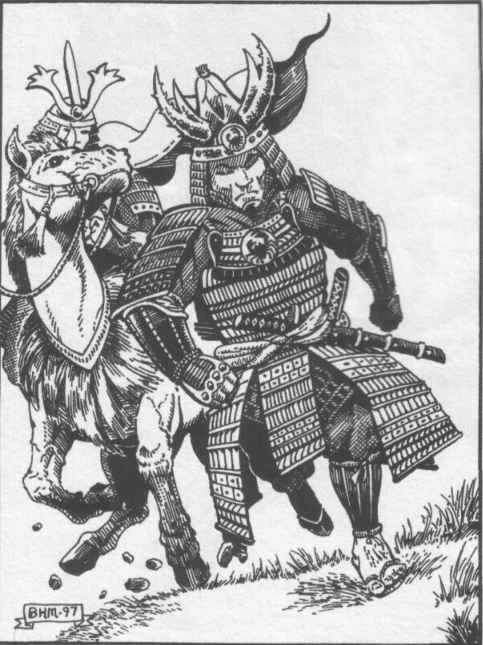
Okay, let's take a swing at the motherfuckers.
The Crab lands comprise some of the rockiest and least hospitable territory in the Empire. There is only one viable strip of farmland, that the Crab value dearly: almost all of its produce goes to feed the Wall and the Clan is usually still short, so they have to import food from elsewhere. However, the Yasuki shores have some of the best fishing areas in Rokugan, the mountains have good land for tea plantations (the Kaiu are fond of chewing tea leaves) as well as a wealth of iron mines. Most Kaiu-produced weapons go to the Crab army but there is enough of a surplus for exporting; Crab weapons are highly prized in the rest of Rokugan. The Yasuki business savvy keeps the Crab supplied and without worry on that front. Crab peasants are a dour, no-nonsense lot, with some understanding of the Shadowlands threat and very humble and subservient to magistrates and samurai. The higher classes demand proper respect but also keep the peasantry free from banditry and crime.
The Hida lands are located in the valley between the Twilight Mountains and the Wall Over the Ocean range. The Hida palace itself is spartan and functional: no superfluous gardens and no paintings in the staterooms. It serves as the Clan headquarters, from which the daimyo coordinates the Crab's efforts. Generals and noblemen crowd around thing, offering suggestion and advice: the Hida welcome such additions, but once they make up their mind the decision is final. The Hida bushi school is also located here. The doors are kept open, but there is always a ready bushi force to close them on an emergency, and above them sits the purified, thick skull of the Maw. The message is clear: the Crab have faced greater enemies than you, and they do not fear you. The Kuni Wastes were once lush and green, before the Maw invaded and corrupted the land. Most of the family and peasants escaped the catastrophe, but they had little to return to. The land has yet to recover from the damage of the Shadowlands capture, Crab counterattack and Kuni ritual. Some Shadowlands creatures still live here, but they are a skittish lot that move at night and has learned the hard way not to fuck with the Kuni. The shugenja themselves live in tiny huts that dot the barren landscape, and they do their best to restore what few ruins survived the onslaught. Spellcasting rolls for non-Kuni in the Wastes are made at +10 unless the spell is cast at a Kuni dwelling, incidentally. The Yasuki lands are a stark contrast to the rest of the Crab lands, with refined dwellings and elegant landmarks. Villages and towns are well connected by roads, and they do a brisk trade with other Clans using the River of Gold. Fishing is a staple, and most local dishes have some form of fish in them. They're also a hotbed of illicit activity, with illegal business openly advertising - and duly paying their taxes to the local magistrate. Actual crime is still dealt with harshly by Hida patrols. They also keep a palace on the western end of the Crab territory, a scenic location where Yasuki diplomats and envoys from other Clans come to do business. The Tidal Landbridge that comes and go with the waves connects Crab and Crane lands at the entrance to Earthquake Bay: both Clans claim ownership of it but the most practical of each side know it's a moot point. They both keep garrisons at each end and watch over for pirates or (Yasuki) smugglers. The Kaiu Road is a great work of engineering that allows the Crab to move forces quickly through the Twilight Mountains, but it's better known as Peddler's Row due to the army of peddlers, shopkeepers and others that set up shop net to the road. They all pay their dues to the Yasuki, of course. Wise samurai quickly learn to ignore the peddlers when on the march lest they end up without one coin on their purse. There's a small table of things to offer to PCs, from useless "cure-all" tea and guaranteed anti-Shadowlands jade charms (50% odds that they work) to scrolls with risque pictures, military mess kits, healing salves (that actually work, healing 1 die of Wounds) and shrines to Shinsei for a quick prayer after a small donation. The GM is encouraged to fleece the PCs for all that they are worth

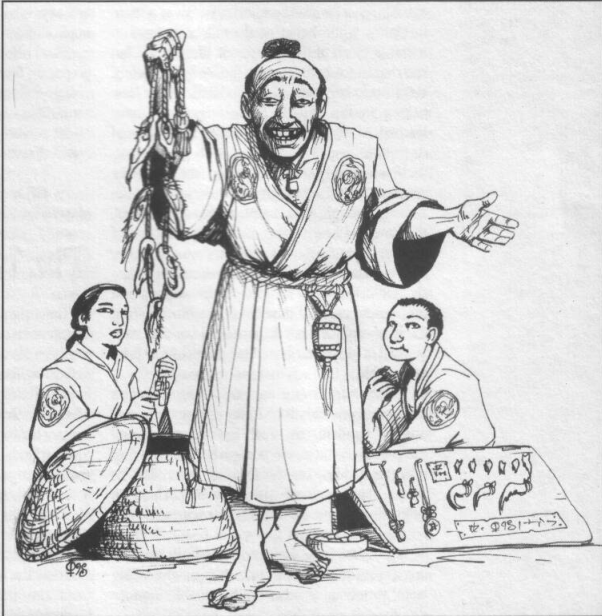
AUTHENTIC GOBLIN EARS, GET ONE FOR THE KIDS
The Kaiu Wall is the second great wall the Crab have built: the first one was overwhelmed when the oni conquered the Hiruma lands. Built in sixty days during the Battle of the Cresting Wave, it is also known as the Kaiu Miracle. One hundred and fifty thousand samurai are posted to the Wall in a permanent state of war. The walls are over one hundred feet tall and the top is thirty feet wide, allowing two companies of horsemen to pass each other. The insides of the wall are riddled with planning rooms, and storehouses, and the north side of the wall also houses barracks, smithies, even geisha houses. Strongpoints at every fifty yards house siege engines and their crews, and a regiment of bushi are posted between each strongpoint. Hiruma runners keep them in contact with each other and with the central command. The river itself has been modified by the Kaiu engineers, making it deeper and more dangerous to cross, dotting the river bottom with traps. The catacombs beneath the Wall are equally impressive: there are many hundred secret openings in the Wall to give the Crab scouts an easy way into the Shadowlands, and they are riddled with traps, false paths, bottlenecks and obstacles to deter oni infiltrators. A sidebar suggests running honest oldschool dungeon crawls in the wall: samurai from other Clans that wish to prove themselves but are wary of the Shadowlands can be sent in to reclaim part of the forgotten passages for the Crab. Still, the Kaiu don't want outsiders to look at their defenses too closely, and adventurers will be kept under watch unless accompanied by a Crab.
Crab philosophy is as practical as can be expected. No Crab fears death, but death has to mean something. Where a Lion or Unicorn would stand and get torn limb by limb, a Crab first thinks on whether their death will have any meaning, and if there truly is no more value in their continued survival. If death keeps the Crab's companions safe or delays the opposition to give the Wall enough warning, they will embrace it without a thought. The Crab believe that the strong have a divine right to rule over the weak. Nobility is for those who can take and defend it. It's not just "might makes right" (administrators, diplomats and even peasants have strength in their own areas) but true leadership comes from both mental and physical prowess. A ruler must have a certain degree of ruthlessness and willpower to do what needs to be done, even if that involves the sacrifice of the few for the good of the many. However, the ruler-ruled relationship goes two ways: it is the strong's responsibility to watch over and protect the weak. If a village a samurai rules is attacked by samurai, shame falls on the samurai instead of the peasants. This sense of responsibility is why the Crab believe the weak or incompetent have no right to rule - they're putting the lives of others at risk. They are not particularly introspective: they study the Tao of Shinsei but in a practical, "how does this affect me NOW" manner. They go and seek enlightenment rather than wait for it, and don't see the point in squandering life trying to grasp the ungraspable. Crab rarely retire, serving well into old age. When they do retire, they become sensei and advisors, and if they take up monkish life they'd rather become wandering monks and teachers than seclude themselves in a monastery.
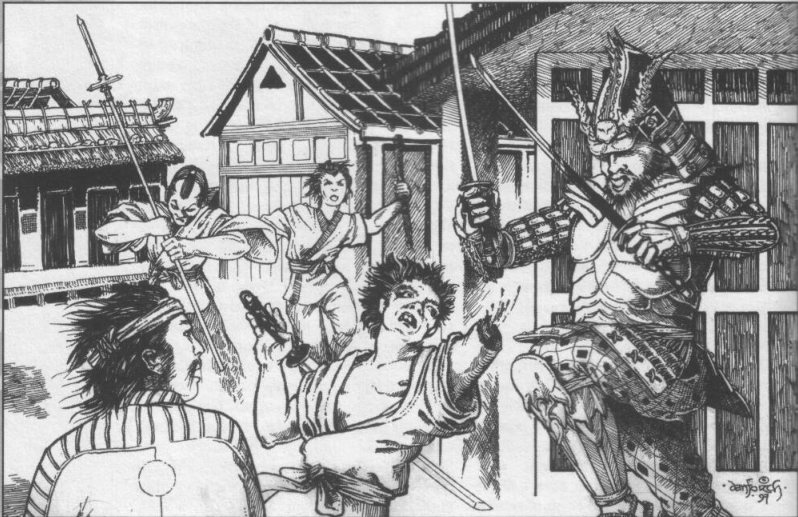
Doggone goes my arm.
The Crab know better about the Nezumi that other Rokugani. They'd love to know what makes the ratlings resistant to the Taint: secretly, unscrupulous Kuni shugenja have captured Nezumi for experimentation, well away from the Clan's eyes.
 Hiruma scouts make use of Nezumi tribes as eyes and ears, offering food, low-grade weapons or even cheap jewelry in compensation. The ratlings are happy to help, but they will not willingly endanger themselves for the silly quests. of humans. Rarely a ratling pack will betray humans to the Shadowlands: Crab retribution is swift and merciless. Sometimes tribes want human help in their rare conflicts between each other: the Hiruma try their best to stay above the squabbling, but sometimes packs turn their backs on humans due to overzealous scouts.
Hiruma scouts make use of Nezumi tribes as eyes and ears, offering food, low-grade weapons or even cheap jewelry in compensation. The ratlings are happy to help, but they will not willingly endanger themselves for the silly quests. of humans. Rarely a ratling pack will betray humans to the Shadowlands: Crab retribution is swift and merciless. Sometimes tribes want human help in their rare conflicts between each other: the Hiruma try their best to stay above the squabbling, but sometimes packs turn their backs on humans due to overzealous scouts.
Relations with the other Clans! The Crane are all that the Crab hates. Weak, elusive, relying on commerce and politics to offset their "spineless cowardice." They have no military might and yet they own more land than any other Clan. As far as the Crab is concerned, the Crane are a waste of space. Beyond irreconcilable philosophical differences, they also share common borders and thus squabble incessantly over land and resources. The sole exception to the Crab's animosity is the Crane's Daidoji family. They have a long military tradition and carry themselves as bushi are expected to, and are willing to meet steel by steel. At the Battle of the Cresting Wave, a Daidoji force crossed the tidal landbridge connecting the Crane to the Crab to assist, knowing full well that their retreat would be cut when the tide came back. They stood with the Crab, and the Crab has not forgotten. Therefore, the Crane have left all dealings with the Crab to the Daidoji, and all Crane lands on their borders belong to the family. The Crane themselves are happy leaving the Crab alone, and are also aware of their position between them and the Shadowlands. The sole exception are the Yasuki, an affront to Crane honor and their biggest rivals for economic dominance.
The Crab doesn't get the Dragon, just like most of Rokugan. What really pisses the Crab off about the Togashi is their steadfast isolation - what is so important to spend centuries locked up in the mountains? As far as the Crab is concerned, the Togashi are cowards. The Mirumoto receive more respect for their military skills, the Kitsuki are honored for their dealings with the rest of the Empire, and most importantly the Agasha enjoy a thriving working relationship with the Kuni. The Dragon's feelings in return are unknown. Who can tell what Dragons think? The Lion have the grudging respect of the Crab, emphasis in grudging. The power and tactical skill of the Lion armies must be acknowledged, and they are the right arm of the Emperor, but their boasts of honor and defense of the Emperor ring hollow in Crab ears. They just don't think their achievements are important enough to boast of them that way, least of all because the Lion doesn't face an enemy like the Crab's ancient foes. Their rigid adherence to abstract honor leads to what the Crab see as arrogant posturing, unbecoming of the greatest military force in Rokugan. Lion feelings are similar: they respect the Crab's military and fighting skills, but their boorishness and quick dismissal of Lion deeds does not sit well with them. Ultimately, both Clans have better things to do that actually come to blows, though.
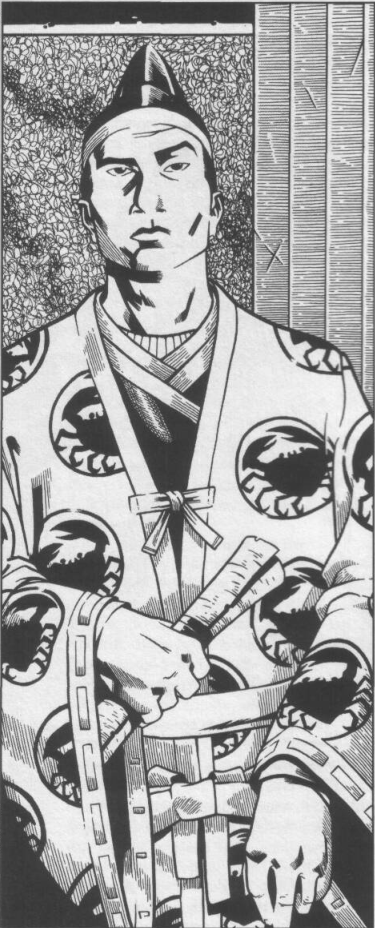
Who said Crab can't be well dressed?
The Phoenix are ironically the Clan for whom the Crab has the most respect. They have no reason to quarrel over land, being on opposite sides of the Empire. Their cries for peace are dismissed as childish whining, but at the same time the Crab appreciates their openness. The Phoenix speak their minds and have the courage to stand for their arguments, even if they are naive to the Crab. The Phoenix shugenja are never dismissed, though: their strength is unquestionable and the Crab families turn to the Isawa in matters of magic. The Scorpion are only a little less hated than the Crane, being all that the Crab despises: deceptive, tricky, using words instead of courage and arguments for honor. The Scorpion has earned a wary respect, however. The Crab know too well what damage their schemes may cause. Most Crab refuse to have anything to do with the Scorpion, fearing to fall in one of their plots, which the Scorpion take full advantage of by luring them into duels and other unwanted fates. The Scorpion are still wary of fucking with the Crab too much: they're as likely to gut a Scorpion as look at them, and they take care to not let themselves be open to Crab challenges. Scorpions that do are dismissed as weaklings by their kinsmen - if they are so smart, how come a Crab got to call them out?
The Unicorn are seen as kindred spirits, with some condescension on the Crab's part. They are seen as outsiders and as warriors, just like the Crab. Their lands border the northern Shadowlands and Unicorn riders face more of Fu Leng's minions than any other Clan save the Crab themselves. For these and many other reasons, the Unicorns are considered brothers to the Clan. At the same time, the Crab feel it's their duty to protect the "newcomers" and guide them in their dealings with others, and some Unicorn resent the implication that they can't take care of themselves or that they need the Crab to explain to them the finer points of Rokugani culture and courts. Nevertheless, allies are allies. The Minor Clans are seen with a large degree of favor owing to their relative strength against their much larger neighbors. The Hare, Sparrow and Fox Clans are a buffer between the Crab and Scorpion, and their relative weakness keeps depredations on Crab lands to a minimum. Sometimes Crab have demanded border territories as "payment," but the Crab have enough problems without worrying about hostile border states. The Minor Clans know better than antagonizing the Crab, and they keep their larger cousins as an ace in the hole in their dealings with other Clans. Nothing backs a little Clan's position as much as a big, grouchy Clan behind them.
Crab magic! It's easy to learn and the Kuni don't make much of a secret of it. If a Crane wants to come and learn anti-Shadowlands magic, more power to them. The decentralized nature of Kuni teachings makes it much more likely to find a willing teacher as well. The spells have simple, utilitarian names - no Path to Inner Peace or anything like that for the Crab.
Earth
- Armor: damage rolled against the target cannot reroll 10s. Lasts for (target's Earth + shugenja's School Rank) rounds, but requires Full concentration on the caster's part.
- Binding: this spell immobilizes creatures with the Shadowlands Taint. It requires knowing the target's true name and inscribing it on manacles that must be placed on the creature. Plus, it must be cast successfully three times at a TN of 20 + Shadowlands Rank x 5. It's not even Ritual! There are two versions of this spell: Major, for oni and maho-tsukai, and Minor for everything else. Aside from the different permissible targets, they're the same.
- Wall of Earth: it's a wall of earth, nuff said. Has (Earth x 10) Wounds.
Fire
- Last Rites: completely cleanses the target's Taint, and then kills them. The target must willingly agree for the spell to be cast, otherwise it automatically fails.
Air
- Fear: spooky air spirits scare the crap out of any targets within hearing distance. Contested Willpower roll vs the casting roll, those who fail flee in terror with their TN to be hit set to 5 for the shugenja's school rank in rounds. Success pins them in place, they can only use Full Defense for one round. Works fine against Shadowlands monsters, imagine that.
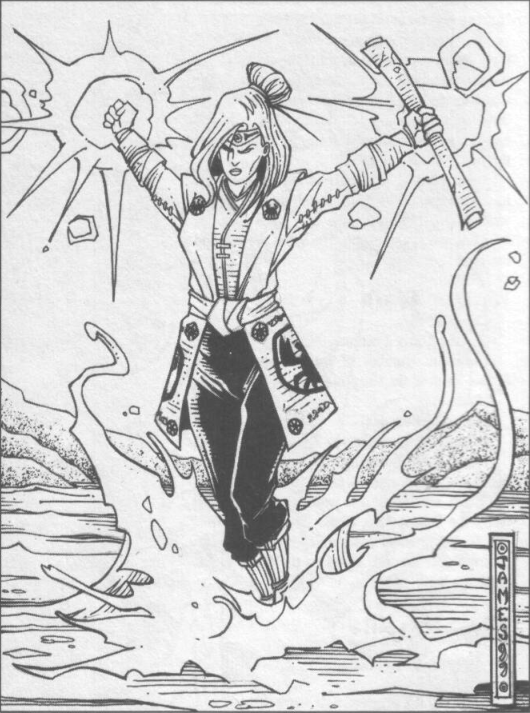
Getting some serious Brave New World vibes from this lady. Maybe she's a Bargainer or something.
Crab nemuranai are highly active. The Crab can't afford to keep these mighty items as wallhangers when facing the Shadowlands. The sole exception is the ancestral sword of the Hiruma, which no Hiruma will take until they retake their homeland. Chikara is the ancestral sword of the Crab, forged by the first Kaiu and wielded by the first Hiruma. It's traditionally carried by the firstborn heir to the daimyo, and as such it is now in the possession of Hida Yakamo. It detects Shadowlands creatures up to 100 feet, renders the user immune to the Shadowlands Taint, and gives the user their School Rank times 5 (!) in free raises when attacking a Shadowlands denizen. Yama is the wakizashi of Hida Tadaka, the Crab hero. It is a plain and unadorned sword, nothing gives the impression that it has magic powers. It is currently carried by Hida Tsuru. Anyone carrying Yama cannot be taken down, ever. They succeed at any roll to remain standing, and all Stamina rolls in combat have their TN reduced in 10. If the wielder is mounted, they can never be unhorsed. Ketsuen, the Armor of the Shadow Warrior, is the armor of the first Hida. It's said to have taken its pitch black color when sprayed by the blood of Fu Leng himself. It's made for large people and requires the user to be over six feet tall. Hida Kisada wears it almost at all times, and on the rare occasions where he has to doff it it will always be close. It adds +10 to the TN to be Hit and allow the user to ignore Wound Level penalties equal to (Hida school rank + 1). Also, any spells targeting the wielder have their TN increased in 5 x user's Earth. Even if they do go off, the armor cannot be harmed by magic. Yasuki Hohiro's Bag of Necessity is an oversized pouch that provides the user with as much money as they need. Note that this is as much as they need instead of as much as they want: a traveler may get enough money to pay for a night at the inn, but not enough money to buy the inn. It is thus more useful for someone on the road than for a clan daimyo or bushi with their needs covered by the local barracks. Yasuki Taka owns it and never lets anyone in on the secret. Kaiu's Forge is located deep in the Kaiu fortress and guarded at all times. It houses the first Kaiu's forge, that he used to create Chikara. Every year five blades are made by the Kaiu master smith and their apprentice: these Kaiu Blades are high quality weapons that never break or need to be sharpened. In fact, they can't be sharpened: only Kaiu's Forge itself can break a Kaiu Blade.
As in the other books, we get a bunch of CCG decks. One "bad guy" deck with Shadowland gribblies, one anti-Shadowlands deck (with cards to give mortal enemies Shadowlands traits
 ) and one big turtling deck for multiplayer that just sounds like a chore to run. 11 Rares, too.
) and one big turtling deck for multiplayer that just sounds like a chore to run. 11 Rares, too.
Next:

Way of the Crane: The Beautiful People
Original SA post Legend of the Five Rings First EditionWay of the Crane: The Beautiful People
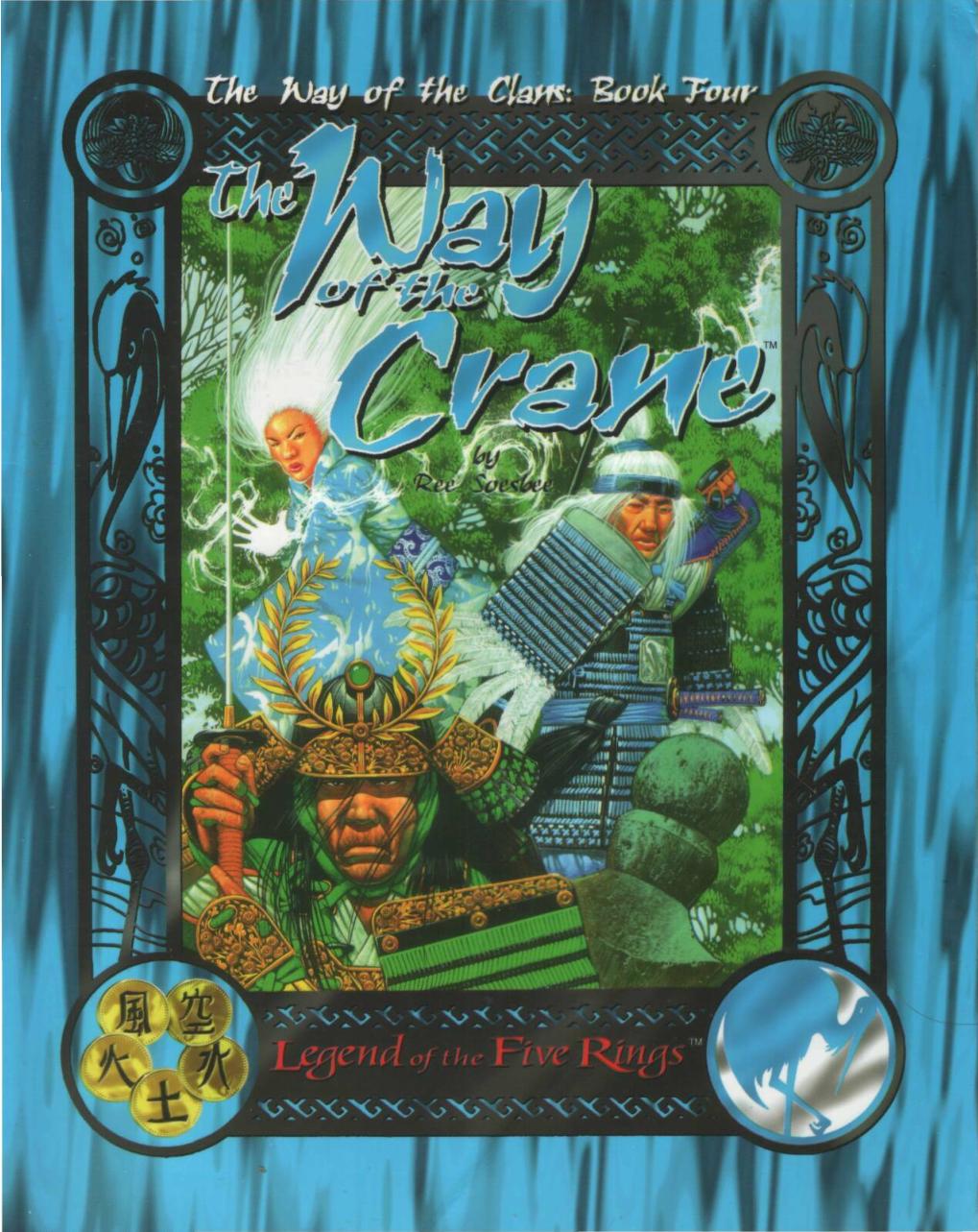
"Dammit Emerald Champion don't bomb our action shot."
And on we go! Next in line should be the dreaded Way of the Scorpion, but our very own Alien Rope Burn already has that one covered (ilu bby) Instead we're going to the next one on the list, the pretty people of Rokugan: the Crane Clan! This one has Ree Soesbee at the helm, along with John Wick, Rob Vaux, Matt Richardson, Steve Rutledge, Bryan Settle and Andy Morris. Special thanks to John "Uikku" Wick and Marcelo "Otaku Masero" Figueroa!

Our RPG FICTION starts with a palanquin being born back to Crane lands. They have traveled through Crab and Scorpion lands for many months accompanied by a small honor guard. A wizened beggar is on the road to Doji Palace, and the palanquin stops next to him. A pretty young Crane lady descends from it (she limps, her foot is twisted since birth) and sits with the beggar, talking for about an hour. She leaves him with some coins and then moves on, disturbing one of her samurai guards - that man is a hinin! She simply replies that Lady Doji did the same in the old days, how could her descendant do anything less? And starts telling her guard a story about how, in the old days when Otosan Uchi was first being built, Doji (whose first thought when she fell and observed her new world was 'let's civilize it!') was the only one of the seven that stayed with Hantei. On the road outside the palace, she saw a beggar under the snow and frost, and sent her guards to bring him inside before he froze. The beggar refused, and also gently refused any aid or food she sent with her maids. Eventually Doji herself went to see him, ready to give him her own mantle, but he did not need it. Wasn't he afraid to die, she asked. Rather, he was not afraid to live, he replied, and made her pay attention to the snow falling around them - all of the snowflakes different, never the same, and Doji had never noticed it. He asks what she was doing in the morning - sewing a kimono, she says. Does she remember every last strand? Of course not. But she does remember every last mistake - and, the beggar says, if she had paid attention to every last strand maybe she would not have made any mistake. The passing of years can't be changed, but the passing of hours can. Obviously, the man was more than a beggar, and he asked of Doji - when she dies, will she be remembered? Or just one strand among many? The young Crane lady, Shizue, finishes her story and steps down from her litter. She asks her samurai the same - if he dies tomorrow, will his regrets outnumber his memories? She continues the rest of the road on her own feet, step by step.
Look, this is the
 book.
book.
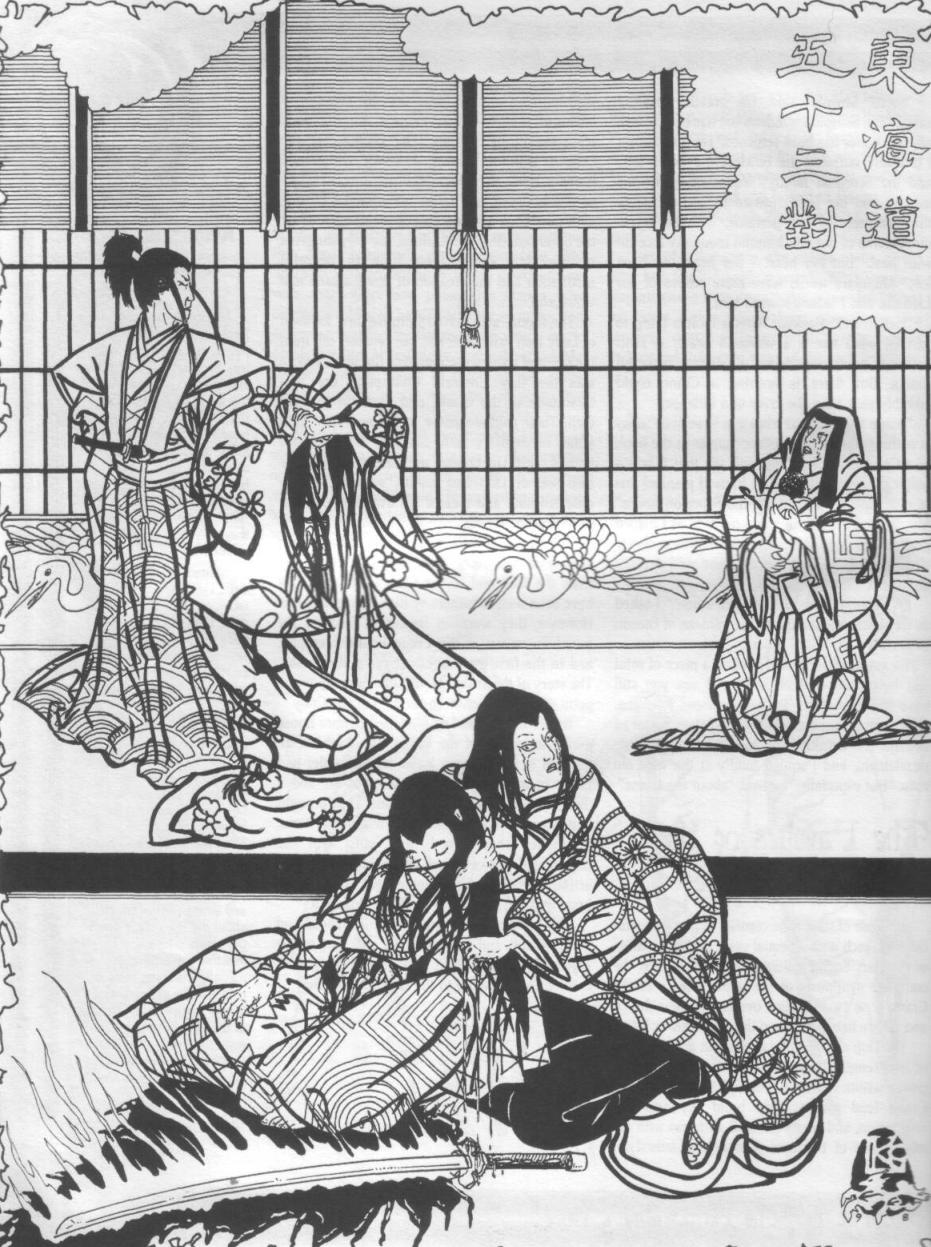
The least known of the Fifty-three Stations of the Tōkaidō, now with more death-by-oni.
quote:
Since the beginning of the Empire, the Crane have shaped the civilization, arts and language of Rokugan. This book highlights their constant search for perfection and their quest to live life to the fullest, wasting nothing, and living with no regrets. The Crane way of life demands excellence. Perfection in all things is the heart of the Crane, and purity is the fire that guides them. Live life to its peak, because you have only one chance, one time to make the world hear your voice.
One life can make all the difference
As always, we get our customary in-setting letters. But, we also get a poem by Kakita Toshimoko, and
quote:
Deep the waters of the black pool, colored like the richest inks
They say a Holy Dragon rests by the lake at night
Beside the pool they have built a shrine, to slay the suckling-pig
A dragon by itself remains a dragon
Only men can make a god.
- Doji Shizue
Shizue is kind of a deal, see.
The first one is a narration from a Togashi, remembering how when he was young among the ise zumi he saw a samurai-ko making the climb towards the Togashi castle. It was a time when no women were allowed in the castle, in fact, and none had taken the ise zumi vows. She arrived at the castle's closed gates, and the monks would not open them to her. For three days and nights, she stood watching the gates. At last, the master tattoo artist Tsuneyo went to her despite the warnings of his fellow monks. The woman was a Crane from the far shores of the sea, and she made the journey because of a vision of a magnificent tattoo, but no artist in Rokugan had the skill to create or even conceive of it. The vision led her here, to the only people who could grant her this tattoo. Tsuneyo offered her water and gruel, but at the next day he said that the monks could not help her, that she had to seek another artist. She refused again, and said that if he would not create the tattoo she would stay and die. Tsuneyo had seen her vision through her words, but the price for the tattoo was death. A small price for perfection, she said. He brought his tools and, outside the castle, she bared her skin and let him work. It was a painful tattoo, much more painful than usual, but she would not budge or move for fear of ruining the master's work. He worked a full day, and as dawn came the narrator went to see them both. The woman was obviously dying from the pain, but the tattoo was wonderful. The Master put his hand over her shoulder, and soon she started to stand up again - just as the Master died. He had borne the price for her, the Crane explained. The narrator, overwhelmed by emotions, could not say anything, while the Crane bared the full tattoo of a ki-rin to the morning sun.
The second one is a report by a Lion. His army was marching towards the western Crane territories, marching on despite Crane attempts at stopping them in the courts. The invading force crossed the border ready to do battle with the Daidoji, but they found none. The cowards had fled, of course! With the spires of the Daidoji palace in the distance, they made camp, and the narrator was given a letter informing the Lion daimyo of the imminent victory. He raced towards his homeland, watching smoke rising from the east - the burning of the castle, he assumed. Soon he heard a gallop behind him - a Crane! Instead of riding him down, the Crane stopped at a prudent distance. The Lion taunted him with the destruction of his forces and castle, but instead the Crane asked if he was the messenger of the Lion general. He tossed a bag at his feet for the Lion daimyo, with the compliments of the Daidoji - it was the head of the Lion general. The camp was completely destroyed, the Lion forces killed in a massive ambush with underground tunnels, archers that hid for days on the trees of the nearby woods, the acrid smell of "gaijin pepper" and other tricks. The Crane had destroyed a force ten times their own, and the Lion narrator only returned to complete his report, then commit seppuku.
The third one comes from the letters of one Iuchi Xien, karo to Ide Tadaji. Crane acquaintances had put him in touch with Seppun Muyoku, a blind old Imperial courtier that was also the more or less official translator for gaijin in the Imperial Court. The old man taught the young Unicorn the ways of etiquette, which was just as well for an Iuchi without Ide diplomat training. Then, a woman in scarlet robes approached the court along with a man with a strange blue eye. The Imperial Guard tensed, which surprised the Unicorn as neither looked particularly dangerous. The woman, Muyoku said, was Shosuro Kachiko - reputedly the most beautiful woman in the Empire - and her father the Shosuro daimyo. Xien narrated the proceedings to the blind man: the Scorpions approach the dais, the Emperor greets them, and then a Crab man strides forward and launches into a rant against the Shosuro. Hiruma Maruku was to be married to Shosuro Kachiko, but the marriage was called off because she is to marry Bayushi Shoju, the Scorpion leader. All of this is entirely incomprehensible to the Unicorn - in the other lands, a man just bought a woman from her father or made a direct arrangement with her instead of all this arranged marriage stuff. The Hiruma used his tirade to put anyone that tried to defend Kachiko's honor on the spot, which again was bizarre for the Unicorn - why was no one beating the snot out of him right now for his insolence? But the Crab was a highly skilled duelist: he would probably kill any contender, dishonor Kachiko and force her into seppuku.
 The aged Scorpion daimyo seemed like he was going to accept the duel, but then a new challenger arrives - a Crane man, the son of the Emerald Champion himself, Doji Hoturi. He challenges the Crab, they go outside, and only Hoturi returns with a bloodied blade. Kachiko gives him her fan in appreciation; the Unicorn doesn't understand what makes the gift of a fan so valuable. But Muyoku notes that the Scorpion maiden's heart has been lost, and that his Unicorn ward has much to learn about ladies, Rokugan, beauty, and the Crane.
The aged Scorpion daimyo seemed like he was going to accept the duel, but then a new challenger arrives - a Crane man, the son of the Emerald Champion himself, Doji Hoturi. He challenges the Crab, they go outside, and only Hoturi returns with a bloodied blade. Kachiko gives him her fan in appreciation; the Unicorn doesn't understand what makes the gift of a fan so valuable. But Muyoku notes that the Scorpion maiden's heart has been lost, and that his Unicorn ward has much to learn about ladies, Rokugan, beauty, and the Crane.
So, the Crane! The Clan has four families, each of which has an equal voice on the Clan's management. The Clan is ruled by a council of the heads of all families plus a fifth, the Crane Champion. As is often the case, the Champion is also the Doji daimyo, in which case their family is represented by another high-ranking member. This means that all families share in the Clan's wealth and lands, but in times of war and emergency the Champion makes all the calls and even in peace their voice carries the most weight. The Crane have an apparently weak military, but they are skilled in war - they have had to deal with Lion and Crab aggressors, after all. They live in ornate palaces and are renowned for their political acumen, and are said to have allies in all houses of Rokugan. It's said that a Phoenix samurai said in defense of the Crane to a Crab that they fought against the Shadowlands so that Rokugan could live, but the Crane give Rokugan something to live for. Receiving gifts from the Crane is highly prestigious, and even Clans that dislike the Crane like the craft of the Kakita artisans or Asahina shugenja. The Crane always seem to know just what others need, and this knowledge helps them secure alliances.
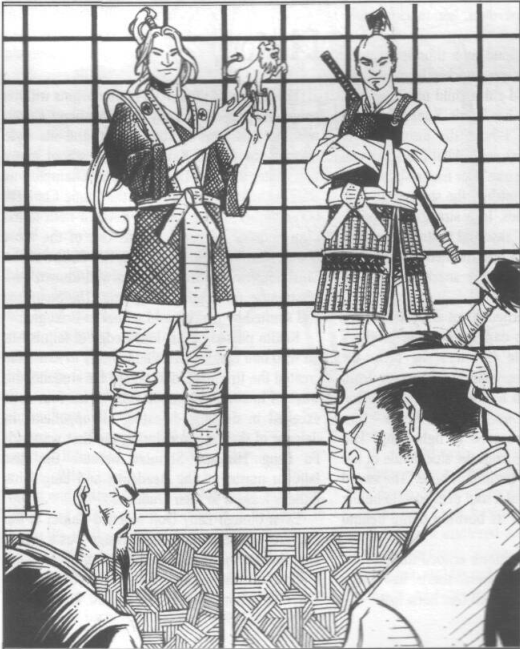
"Our Crane buddy has delivered unto us a jewel-like object of wonder! Now we owe them our entire family treasury."
First, history! Hantei asked Lady Doji to help him with his ruling efforts. Both created the stratified society of hinin, heimin and samurai. When Otosan Uchi was built (the palace, and the people that came to live around it) the Emperor held a great celebration and a contest to choose his personal champion. It was widely held that Matsu, follower of Akodo, would win - instead, victory was for a simple man with a swift sword that always bowed respectfully after each duel. He did not do so for Matsu at the final match, however. She was obviously angry, and the man simply replied that she was not worthy of respect, because she had not treated her rivals with the respect she demanded. He offered to commit seppuku, but instead the Emperor confirmed his naming as the new Champion. From that day on there would be enmity between Matsu and the little man, whose name was Kakita. The Emperor and him became fast friends and it was arranged that he would marry Doji, who really didn't want to marry him. As such, she send him on a quest to bring the dead back to life, figure out how many days it took to go around the world, and find something whose beauty cannot be challenged. Kakita left his sister as Doji's lady-in-waiting, and while she set to work on changing the Kami's heart he went off on his quest. He found a village where an old woman named Yasuki lived, who said she would help him if he arranged that her son joined the samurai class. Preposterous, about as preposterous as a mortal marrying a Kami. He agreed and returned to a Doji that by now actually wanted to see him back. From a piece of driftwood, he carved a biwa (a lute, basically) and played it to the court's amazement - the dead driftwood had come back to life. A journey's length depends on the companion, and a man that travels with Doji's mother, the Sun, takes one day to go around the world. And finally, he gave her a mirror that reflected her image - beauty that could not be challenged. Doji was head over heels for Kakita and they married! Yasuki's house, incidentally, became a shrine that was demolished when her family betrayed their vows to the Crane.

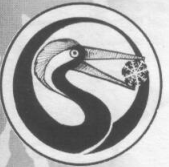
The Doji mon, a crane holding a snowflake. See, they are unique snowflakes.

The Doji are the better known of the Crane families. Their courtiers are always seen at the Imperial Court and the mother of an Emperor has always been a Doji. They have built the system of ceremonies and protocol that keeps the realm together. They are perfectionists and have to be - the Court is a deadly place to make a mistake in. They don't fear death because they live life to the fullest, with no regrets. Doji's second son, Nio, took her name and founded the house. He was a master of economics and commerce, and he organized the first Crane trade routes and set them on the way to wealth. It's said that he wrote a treatise on economics, but it has never been published: perhaps it was never written in the first place or the Crane don't wish to share his wisdom. His writings on court life and manipulation of the political system are better known and studied in Doji schools to this day. Doji's first children were twins, one boy and one girl, and she had five children in total. The eldest child, Yasurugi, was a great duelist and perhaps even better than Kakita, but his passion was crafting. He refused to wield a sword that he hadn't forged himself. One day after Fu Leng attacked, when in a ceremony to gift a blade to his newborn son, Yasurugi was approached by Shinsei, with Matsu and Mirumoto of the Dragon in tow. He was searching for heroes and Yasurugi had the soul of Thunder necessary. Before he could answer, an oni that had sneaked into the celebration stabbed Yasurugi dead, and while Kakita killed the beast Shinsei sadly declared that all was lost. But Yasurugi's twin sister, Konishiko, declared she would take up his spot - as twins, they shared one soul. Matsu roared angrily: what could a weak girl like her do? Even the greenest Lion soldier could kill her. Konishiko knocked Matsu's blade from her grasp and declared that she only needed to strike once. Shinsei laughed.
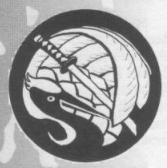
The Kakita mon, a crane with a sword. I like this one, it has moxie.
The Kakita family history starts with the man himself, of course. He was the first true iaijutsu master, remembered as one of the most honorable men that ever lived. His dislike of the Mirumoto two-sword school was well known and his treatise on honorable dueling, The Sword, is still studied by bushi across Rokugan. The third son of Kakita and Doji, Shimizu, became the founder of the Kakita family as well as the second Emerald Champion of Rokugan. Ever since the Crane iaijutsu school was founded, every Emperor has sent his sons to the Kakita for training. The family is also known for their artisans, and the founder of their art tradition was Kakita's sister, Kiyamori. She helped Lady Doji create the written language used today. Artisans of the Crane have earned admiration and respect across the Empire, and fine artists are welcome in high courts and lowly villages. They are often chosen as advisors. Since reading and writing are not common skills in Rokugan, lords use artists to educate the populace and instruct them in their duties. Because of this, Crane heimin are extremely well educated. Daimyo of other clans also ask of wandering Crane artists to tour their lands for the same reason, and at times artisan tutors remain at Clan palaces teaching the noble young. The most well-known artisans are, of course, the Iaijutsu Masters themselves - it is as much of an art as, say, ikebana. We also get some excerpts of The Sword, just like Niten in the Way of the Dragon book.
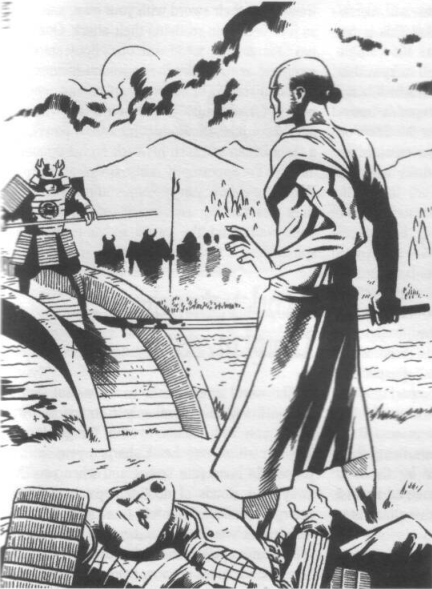
Guys in the back must be like "Man, being a mook in a chanbara flick sucks."
And speaking of Niten!
quote:
[...]the body is the greatest weapon one has. To disregard it in favor of a second sword is foolish. It dishonors you as certainly as if two men struck the same opponent, and it does not allow the use of the full body - only the arms. [...]If the opponent wields two swords, they appear strong, but they have forgotten the meaning of true strength. They hide their cowardice behind steel, and are no more than a rice paper cottage behind a stone wall. [...] Among other schools, there are some which are partial to using two swords. In my school, this is a sign of cowardice. Attempts to achieve victory by a few extra inches of steel is a sign of weakness of spirit. Although those who study such a school have rationalizations for such a path, such rationalizations have no ground when they are seen from the true path of bushido. I have no dislike for the technique of two swords; only for the spirit which leads to the preference for two swords.
So Mirumoto can suck it, basically.

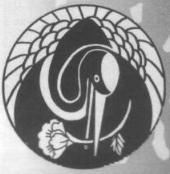
The Asahina mon, a crane holding a peach blossom. I guess they give peaches a chance.
The story of the Asahina family starts with a Phoenix, Isawa Asahina. A great Master of Air, he was also revered as an adept of Fire. He was a natural warrior, and taught to use his destructive powers against the Lion and the Scorpion. He spent little time in study and much in war. When a truce was struck between Lion and Phoenix, Asahina was furious, certain that the Phoenix would have crushed the Lion without Crane interference. He started a campaign of terror on Crane territories, disregarding his Phoenix brothers that tried to calm him down and setting whole villages on fire by himself. The Daidoji had few men to spare to deal with the mad shugenja and they were quickly obliterated. At last, one samurai-ko stood before him, but instead of attacking she put herself between the shugenja and his targets, over and over, regardless of the damage she took. Eventually even Asahina had to ask why, and the badly injured samurai replied she would not allow him to tarnish the memory of his kin. He came down from his madness, took the wounded maiden back to the Doji palace and surrendered. It took many months for Doji Kiriko to heal, and Asahina was there at her side. Love grew between them, and a marriage was arranged. He brought many of his brothers and sisters to the Crane, as well as knowledge of their libraries, and thus the Crane shugenja school was born. The Asahina are pacifistic and shun fighting: this is not to say that they won't assist their Clan in war and they are known for creating implements of war, but the items they create are never malicious or uncontrolled. The Asahina love to create things, and they have the secret knowledge to construct "fetishes," minor one-shot magic items. They are often geared for mundane needs such as harvests, building or protection. The Asahina believe that the Tao of Shinsei applies to all living things, forming a seamless web, and by changing one part of the world for the better they believe they are doing so for the whole world. Their talismans are usually impersonal but sometimes created for specific users, and created using a combination of elements (Wood, Fire, Earth, Metal and Water), auspicious astrological events and dates. Whether the small spirits they infuse their talismans with are aware is a matter for philosophers, but it is certain that the greater the kami of the item, the more human it becomes. They try to bring out an item's shen, its benevolent nature, rather than its kuei, the dark side. Asahina Yajinden, traitor and lieutenant to mad Iuchiban, created the infamous Bloodswords using corrupted Asahina knowledge. They also believe that a person's spirit can be controlled just like an item's spirit, but this knowledge ( meisho) is dangerous, and only passed on in oral fashion without written records.
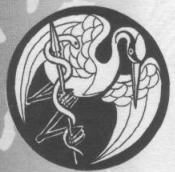
The Daidoji mon, a crane over a snake wrapped around a spear. Don't ask me, I don't know.
The Daidoji family starts with the youngest of Doji's children, Hayaku. Doji was inconsolable after losing her daughter to the Shadowlands, plagued by visions that Konishiko lived on still. Hayaku swore he would journey into the dark realm to retrieve his sister. Three years later, he returned a changed man - muscular, creased with age, and with his hair completely white because of the horrors he had faced. He also had the sword that belonged to Yasurugi and that Konishiko carried as the Crane Thunder - in a way, the twins had returned home. This sword, now the ancestral sword of the Crane, chooses its wielder by singing the same note of joy as when Doji held it once again, and Hayaku was named Daidoji, Defender of the Doji, for his deeds. Today many Crane dye their hair white as tribute to his memory. The Daidoji are some of the bravest fighters in Rokugan, leaving their Doji cousins to do the talking in courts while they focus on intelligence gathering and discovering the weaknesses of the Crane's enemies. They are the strong arm of the Crane, with tactics that allow their smaller numbers to counter greater forces. They are not above certain tactics to make victory certain, and aside from handling the Clan's mercantile matters they are also involved in contraband and smuggling with the tacit approval of the Clan. The stereotypical Daidoji is the honorable thief, risking himself and his honor to bring supplies to wartorn areas. Several of the Yasuki that refused to join the family in their exile to the Crab joined the Daidoji, and since then they have openly despised the Yasuki proper, though now there is a shaky truce because of the Daidoji's friendship with the Hida. Their family library has many rare texts on strategy and tactics, and they know more about the gaijin that stormed Rokugani shores than any other. The daimyo, Daidoji Uji, has even studied gaijin kata and has one of their strange two-handed swords mounted on a wall, and also instructs his students to study the foreign weapons of the Unicorn. Personally, he is fascinated with "gaijin pepper", gunpowder, but publicly he restrains himself to manufacturing fireworks for Crane festivals.
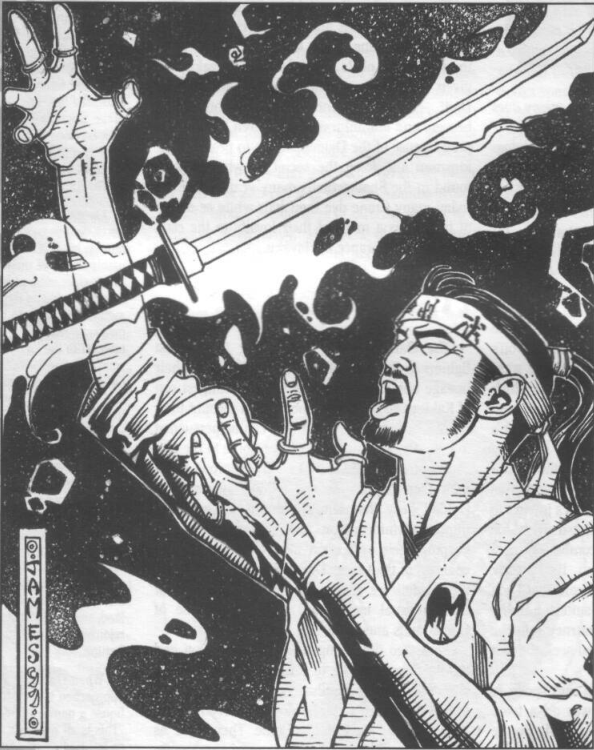
This is probably not the best way to handle your sword.
At the Battle of the Landbridge, oni spies figured out a weakness in Crab defenses on the eastern end of the Wall, and Oni no Kinjiro (their leader) put into action a plan to divert Crab defenders away from it so that he could attack it in force. The few Crab there did not try to retreat: they were Crab. Their commander, Hida Bokaro, sent up a magic flare for assistance, but Kinjiro used magical darkness to block it from the sight of would-be reinforcements. As it turned out, he didn't block it away from Crane lands, and the Crab were reinforced by the Daidoji daimyo, Masashigi, and his hunting party of twenty men. For the first time in history, Crab and Crane stood together against a common foe, and Masashigi protected Bokaru personally when the Crab commander was violently thrown to the ground by an oni. The remaining oni finally broke through the defenses and made for the landbridge to flee to the peninsula and let the ocean block pursuit, but Masashigi and his three remaining men charged the demons, keeping them busy until the sea came and swallowed them all. The Crab never forgot the sacrifice, and still call the Daidoji "the Iron Cranes." The Battle of Kyuden Kitsune is relatively recent, 30 years in the past. Two minor Clans, the Fox and the Hare, were engaged in a series of minor skirmishes across their borders until a Crane force brokered a ceasefire. Later in the night, however, a group of assassins seemingly hired by the Hare slaughtered many Fox dignitaries, and the Fox daimyo vowed to avenge his wife and the other dead. The Crane sided with the Fox and the battle was quickly over, but the Fox daimyo claimed it was Crane intervention that caused the death of his wife, and challenged the Crane commander (Kakita Toshimoko) to a duel where he perished. The Hare maintained that they never sent any assassins; whatever the case, the Emperor demanded that both Minor Clans accepted a Crane "advisor" to their courts as punishment. The Victory With No Strike is Doji Kiriko's successful containment of Isawa Asahina.
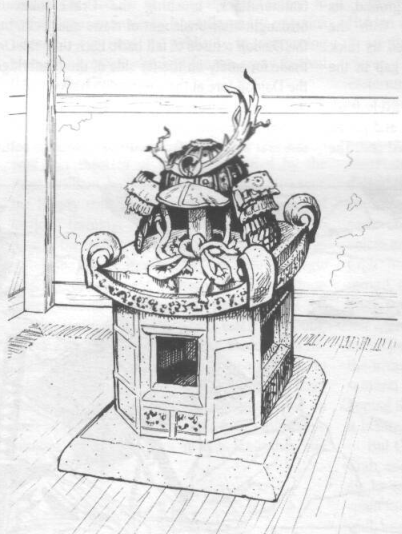
The Crab's shrine to Masashigi. NEVAR 4GET
The Battle of the Raging Seas is the naval counterpart to the Battle of White Stag, when Asahina shugenja brought clouds and fog over the Bay of the Golden Sun near Otosan Uchi, allowing the small but swift Crane merchant ships to harry and eventually sink the great gaijin galleons. Gaijin traders and merchants were forbidden from entering the Empire for a time, and are still viewed with suspicion today. At the Battle of the Sleeping River, the Crane captured Asahina Yajinden during Iuchiban's first uprising, and the Asahina would not kill him because of their beliefs - instead, they performed rituals so that Yajinden ended with the mind of a child, and he was set to work on the Asahina gardens as a warning to those who would betray the Crane. They also played an important role in Iuchiban's second appearance, and historians credit them with preventing a rout of the allied forces when the undead broke through their lines. Finally, in the Night of Falling Stars, the Crane lost Shiro no Yojin to the Akodo legions after the Daidoji held out for three weeks. Rather than bearing the shame of capture, the men, women and children of the castle threw themselves to the ocean, and the battle gained its name from their falling torches. The Crane tried to recapture the fortress several times without success. It is said that the river under the castle is haunted with the ghosts of the dead, and every year on the seventh day of the month of the Snake the ghosts rise and slaughter any Lion found outside the castle.

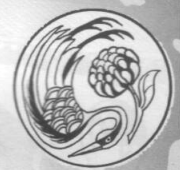
The original Yasuki mon, with a crane instead of the carp. It still remains in some ancient objects and artifacts; these are considered to be of ill luck by the modern Yasuki.
The Yasuki family history begins with their service to the Crane. It's a little different from how it shows up in Way of the Crab for some reason. They were not originally of the samurai class, and never truly lost the stigma of being the "common born" family of the Crane. They created the policy of trade gifts, and when the first war with Fu Leng started they kept the people of the Empire fed and supplied. Their methods and economic foresight were not seen with good eyes by other Clans, who openly called them dirty and dishonorable, but the Crane still held them as family. Their illicit operations became more bold and overt in time, and when a young and inexperienced Emperor took over he claimed the Yasuki dealings were not only dishonorable, but dangerous, and ordered the Crane daimyo of the era to halt the Yasuki operations. The family was incensed and argued that their activity kept the Crane armies throughout the southern peninsula supplied. But the Crane Champion would not waver, and banned the Yasuki from his lands. That's when they went to the Crab, and the rest is history. And the war between the Yasuki and the Daidoji would in turn give birth to a new secret power... THE KOLAT! (Again, nothing else about them.)
Next: paper cuts.
Way of the Crane: What the Christ?
Original SA post Legend of the Five Rings First EditionWay of the Crane:

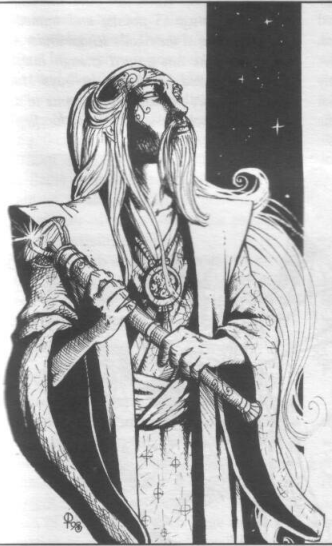
The stars are right... to fuck your shit up. Gentle-like.
New character options! Our new skills are Appraisal (figuring out the true value of items, spot forgeries) Artisan Skills (these are Acrobatics, Dancing, Ikebana, Jester, Music, Noh/Kabuki, Origami, Painting, Poetry and Storytelling, all High), Astrology (TN 15 to get a vague sense of the future), Manipulation (I guess we needed another one?) Oratory/Rhetoric (for speechifying and convincing large amounts of people), Political Maneuvering (Crane only, used to trap people with logic so that disagreeing with the Crane is dishonorable - no seriously, roll against target's Awareness x 5 and on a success they have to go with your idea or lose 1 Honor point), and Tsangusuri (Asahina shugenja only, the creation of magic fetishes and talismans, usually needs a previous Astrology roll and special materials). New Advantages are Cadence (Crane only, special code to talk through song, speech or painting without being eavesdropped), Favor Tables (you get a courtier favor, cost is favor's rank x 5) Inner Gift (for 6 points you get a vaguely defined psychic ability like precognition, psychometry or empathy, up to the GM how it works) Kakita Blade (4 for Crane and 8 for non-Crane, you get a nifty sword that rolls and keeps an extra die in combat and rerolls one damage die in iaijutsu duels) Multiple Schools that---
Hm.
Multiple Schools allows multiclassing for bushi, basically. You must be beyond level 1 in your starting school, but instead of leveling up you get the level 1 technique of a new school and continue progress there. Nice, I can see character concepts that---
quote:
CHANGING SCHOOLS
Let's talk for a moment about the practical side of "changing schools."
Let's play a Crane samurai that wants to go to the Scorpion bushi school. First he has to convince his sensei: "Master, while I have not learned all you have to teach me, I have decided that there is nothing else here for me. I want to go across the mountains to the Bayushi and learn from them."
Then he has to go to his daimyo: "My lord, while I am sworn in fealty to your service, I have decided to leave your house and learn the ways of the Scorpion. While doing this, I will not be in your command, because I will have sworn my life to another daimyo and sensei."
Lastly, he has to go to the Scorpion: "While I have not fulfilled my debt to my lord and did not have the perseverance to complete my training in his school, I would like you to teach me your family's secrets."
Yeah, right.
Go read Doji Kuwannan's story. He's got a lot of reasons for having the Multiple Schools advantage. If you want it, you'd better have reasons just as good... if not better.
Remember, seppuku hurts.
Your
 is all over this, Wick. Piss off with an NPC-only advantage. Especially since Different Schools, the advantage that lets you start with a different clan's school, is on the corebook and only has a "look, your family will probably owe their family a big favor" note.
is all over this, Wick. Piss off with an NPC-only advantage. Especially since Different Schools, the advantage that lets you start with a different clan's school, is on the corebook and only has a "look, your family will probably owe their family a big favor" note.
Patron is for artisans only: basically the patron will protect the PC and expect works of art in return. It's like the Sensei advantage from the corebook with the major difference that the patron cannot know anything about the art (they're admirers, not teachers) and they push the artist's public career. Precise Memory is that, TN 20 Intelligence roll to memorize a lot of information. Wealthy gives 2 koku per point spent on this advantage. New Disadvantages are Colorblind (common in Crane, 1 point), Epilepsy (4 points, what you get for all that Crane/Imperial interbreeding
 , TN 15 Willpower in a tense situation or have a seizure, some people think you're communing with the kami
, TN 15 Willpower in a tense situation or have a seizure, some people think you're communing with the kami
 )
Fascination (you're fascinated by some subject), and
Vanity (as in Way of the Dragon)
)
Fascination (you're fascinated by some subject), and
Vanity (as in Way of the Dragon)
The Doji have the Doji Courtier school. +1 Awareness, 3.5 Honor. Their skills are Courtier, Sincerity, Etiquette, Heraldry, Manipulation, Oratory and any one High skill.
- Rank 1: the courtier can call on (Air + School Rank) favors per adventure. The favors they can get depend on their school rank.
- Rank 2: the courtier spends five minutes talking to a target, they roll contested Awareness rolls, and if successful the courtier influences the target's emotions.
- Rank 3: the courtier may challenge someone's Honor before they roll to do something, up to (School Rank) times per day. To do that, they make a contested Honor roll with the opponent's Honor x 5 as TN, and non-Crane characters drop all dice that roll lower than the Crane's Honor.
- Rank 4: the courtier automatically succeeds at Etiquette, Manipulation, Heraldry, Oratory or Sincerity rolls with no raises. They must roll if they want raises and can't do this for contested rolls.
- Rank 5: the courtier automatically manipulates someone with less Willpower than them, characters with more Willpower must roll Willpower + Etiquette against the courtier's Willpower x 5 or also fall to it. Manipulated characters consider the courtier a true friend and ally unless the courtier grossly acts against them. For each day the target does not interact with the courtier, they get a Willpower TN 30 roll to shake off the effect, +5 to their roll per extra day.
Yikes. It's not as broken as the Bayushi courtier but these guys are pretty scary if they get to talk to you. The game admits that they won't do much in combat and that most of their power comes from the campaign itself, needing more roleplaying from both the player and the GM to get them to work properly.
The favor tables aren't rolled on, the courtier (or character with the advantage) just gets these favors to provide. They come from the large give-and-take networking efforts of the whole Clan, and they expect these favors to improve the Clan's position - characters that just provide favors to friends will end up in dire straits. If a favor doesn't show up on the tables, the character may request it from the daimyo or another high-ranking courtier, and the GM evaluates what kind of rank it has. Rank One favors are stuff like 2 koku, a Fine item, a pony, safe escorted travel to a city or palace, meditative study (+5 to insight!), a Clan tutor to teach you an appropriate Lore (like Lore: Shadowlands for the Crab and so on) or information on some well-known topic or science. Rank Two favors include 5 koku, a night with a fine geisha, one Exceptional item, a fine horse, a champion for a duel, a minor Asahina fetish, stuff like invitations to a court or requests for a notable service that can net you a little Glory, a spell casting, a Heroic Opportunity in battle, or learning a relevant skill from a Clan. Rank Three favors include 10 koku, rehonoring dishonored people, an audience with a minor daimyo, a free Patron, a guide into the Shadowlands, an Artist's piece (+3 Honor!), favors like having a Kitsuki magistrate investigate something or Scorpion agents embarrassing someone, a potion or poison, a custom minor fetish, or a quest from a Clan Champion (+3 Glory if successful) Rank Four favors are 20 koku, 1 Exceptional item (again?), marrying a daimyo's daughter, scoring an obligation from someone, bearing a major Asahina nemuranai, a minor Ally in any Clan, a personal retainer from your Clan, a custom Fine fetish or a post as Clan magistrate (+5 Glory) Rank Five favors are 30 koku, prominent magic item, custom minor magic item (huh?) a position as magistrate to the Emerald Champion (+1 Glory Rank), a service from a prominent Clan member, an opportunity to prove yourself to Dragon ise zumi and gain a tattoo of your choice, a spell from the Phoenix, or a major service from the Crab, Lion, Scorpion or Unicorn.

The Daidoji family (+1 Strength) teaches the Daidoji Bodyguard school. +1 Agility, 2.5 Honor. Their skills are Kenjutsu, Defense 2, Iaijutsu, Battle, Archery and any one High or Bugei skill.
- Rank 1: the bushi uses Honor instead of Earth to figure out their Wound Levels, fractions are rounded down.
- Rank 2: if the bushi uses Full Defense in a round, they automatically get the highest initiative next round. This overrides any other initiative ability.
- Rank 3: the bushi's own TN to be hit is increased by their enemy's armor bonus.
- Rank 4: the bushi may attack twice per turn.
- Rank 5: if the bushi faces an opponent whose school technique they have previously seen, they may spend Void Points equal to their opponent's School Rank so that they may not use any of their school techniques for a round.
Yeegh. The rest of the school is kinda neat, but holy shit is that Rank 1 busted. Particularly since the Daidoji are the designated "do questionable shit for the Clan's sake" family. Bumping Honor at chargen is much cheaper than bumping up Earth, granted, but you can only do it up one rank and then it's "woops, you did a bad thing, hope you like even less hit points!" Their Rank 5 is also kinda eh since the Kitsuki get something similar at Rank 4 and they're not even dedicated fighters.
The Kakita have the Kakita Artisan Academy. +1 Intelligence, 3.5 Honor. Their skills are Courtier, Etiquette, any artistic skill (depends on the ability they learn for their first rank), Calligraphy, Lore: Myth and Legend and any one High skill.
Artisans have 1-5 School Ranks like everyone else, but each art that the Academy teaches also has individual Ranks or maya. Each Rank, the artisan picks one art to advance in. They may spread their knowledge or specialize as they wish, but they can't get an advanced maya without learning the base abilities first. Kakita Iaijutsu Masters (the corebook Kakita bushi) are also educated at the Academy, but they cannot gain maya. When a maya calls for the Artist's School Rank, it is the sum of all their art Ranks rather than the Rank the art is at. Some maya can be "held" for later use. An Artist can only hold as many maya as their School Rank.
Acrobatics is a popular form of art in Rokugan. Many of the practitioners of the more "noble" arts consider Acrobatics to be "low", but they can't deny the crowds acrobats attract and nearly all noble houses have at one point hosted the Imperial Acrobatic Troupe. For an acrobat to be called temporarily or permanently to the Troupe is a tremendous honor. Acrobatics maya need no preparatory rounds and can't be held.
- Rank 1: the acrobat can escape gags, ropes and other bindings with Agility + Acrobatics, TN depending on the complexity of the restraints. They can also slide and crawl through spaces too small for typical humans, but this involves bone dislocation and other painful stuff and deals 1 Wound rank every time this ability is used.
- Rank 2: the acrobat gains their School Rank x 3 as a bonus to their TN to be hit by missile attacks. This bonus only applies if the acrobat is aware of said attacks.
- Rank 3: if the acrobat selects Full Defense and chooses a target, they simply cannot be hit by any attack or spell used by the target. A skill roll is required, doesn't say the TN though.
Dancing is a major aspect of Rokugani culture. It is not only for the court, but heimin also have their own dancing styles. There's festival dances, sensual geisha dances, and even warlike dances performed with weapons. Dancers are sometimes mistaken for Kabuki performers (there are even plays with instructions for dancers rather than actors) and as such dancers have a knowledge of plays and theatrics. No preparatory time, maya can't be held either.
- Rank 1: the dancer gets 1 Rank of Mizu-do for free, and their School Rank in Free Raises for Mizu-do.
- Rank 2: with a successful Agility + Dancing vs. Willpower roll, the dancer mesmerizes their audience. They are not helpless and will respond if attacked, but they'll generally ignore anything else going on that isn't the dancer.
- Rank 3: the dancer may make an additional Mizu-do defensive maneuver per round.
Ikebana is the art of flower arrangement, a respected and powerful form of expression. Flowers are considered lucky, and their arrangement brings good omens from a household's kami. Only the rank 3 maya can be held.
- Rank 1: by spending ten minutes working on an arrangement and with a TN 15 Intelligence + Ikebana roll, the artist can grant an individual (themselves or another) one additional die to roll and keep for any task, that must be immediately performed after the maya.
- Rank 2: with ten minutes and a TN 20 Intelligence + Ikebana roll, the artist can grant a single Free Raise for any one stated task that must be performed within the hour. It is not cumulative with itself and the artist cannot grant more than one Free Raise to an individual per hour, but it is cumulative with Free Raises from other sources like shugenja school benefits and so on.
- Rank 3: with five minutes of work and a TN 25 Intelligence + Ikebana roll, the artist can warp luck and probability: they can force the reroll of a single action performed by any individual in the artist's sight. This ability can be held for up to a full day after the initial arrangement.
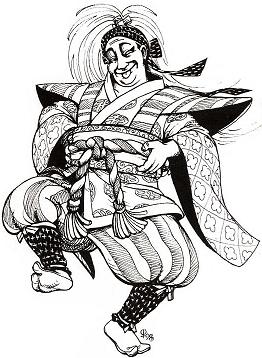
AND THEN THERE'S THIS FUCKING ASSHOLE.
Jesters strut in courts and mock the failings of others. Their satires about important Court figures are sanctioned solely because it is their job. They are some of the few individuals who can speak publicly about someone's loss of face without being openly challenged for it. However, they work under a patron who is responsible if the jester gets too out of line. There is an angry sidebar (Wick again, I think) saying that this isn't about quoting Monty Python and derailing the atmosphere of the game - think more the Fool of King Lear or Ran. Jester maya have no preparation and can't be held.
- Rank 1: by talking to a character, the jester can leave them feeling distracted or carefree. The target either adds or subtracts one die from all social skill rolls for the jester's School Rank in hours. A character can only be affected by this once per hour.
- Rank 2: the jester can start a fight, without seeming to be at fault. They can do things like taunting an archer into leaving cover or making a shugenja charge into close combat. They must perform for two actions and then the target must succeed at a TN 15 Intelligence roll or charge the next individual, whether friend or foe. The jester can raise this TN with an Intelligence + Jester roll at TN 20, plus raises for each +5 increase to the target's save.
- Rank 3: anytime the jester is making a public performance, they may try to draw someone into their act: contested Intelligence roll, and if the jester wins the target loses the jester's School Rank in Honor points. The jester can't affect a target more than twice every six months.
Music is probably the oldest form of entertainment in the Empire, from simple hinin songs to the Emperor's court orchestra. The most popular style of melody is known as gagaku, "elegant music" originated from ancient temples and ceremonial rites. It is solemn, slow and majestic. Music maya must be performed for one round before their effect takes place, with the exception of Rank 2.
- Rank 1: the musician creates an area 10 feet around them where spellcasting is more difficult (+10 to TN for any incoming or outgoing spells) Raises by the musician increase the penalty.
- Rank 2: with half an hour of playing, the musician may summon 1d10 animals from the area to perform simple tasks. They understand the musician through their music, and are all small animals like squirrels, dogs and hawks. The creatures obey for a full day.
- Rank 3: the musician may charm listeners with a contested Willpower roll. If the musician wins, the listener ceases all activity and focuses solely on the music. If attacked or otherwise roughly shaken, they are freed from the song's effect and cannot be affected for the next 24 hours.
Noh/Kabuki theater is popular in all parts of Rokugan. Noh drama consists of slow, rhythmic chanting and restrained movements that follow rigid patterns. There are no sets, actors remain expresionless or wear masks and use simple props. They're more about intensification of character than plot. There is rural burlesque Noh, though, which isn't popular in the courts but the commoners like it. Kabuki is focused on lively action, on the other hand, with elaborate costumes, makeup, sets and special effects. Noh/Kabuki maya take ten minutes to perform, cannot be held, and the actor can double their duration with a raise.
- Rank 1: the actor can impersonate people. TN depends on how familiar they are with the target, from 10 for someone they've known all their lives and 25 for someone they've just met. Certain physical attributes cannot be mimicked (like a particularly high-pitched voice) and the actor needs a makeup kit and an appropriate outfit.
- Rank 2: the actor may cause a fear effect that affects all creatures in a 30 feet radius around them if they don't make a TN 20 Willpower roll. Those affected flee for (School Rank x 2) rounds. The artist does not have to roll for this effect, but if they want to increase the TN, radius or exclude certain targets they must make the roll and risk failure with no effect. The actor can try to use this ability (School Rank) times per day.
- Rank 3: the actor can physically change form to that of an animal. The form cannot exceed the mass of a heavy warhorse and no items change with the artist.
Origami is the art of creating beautiful objects and figures by folding paper. For centuries, origami has been used in ceremony and ritual, and the skill is highly regarded in Rokugan. Origami maya require the use of the finest rice paper, and each use of a maya destroys the paper used in the composition.
- Rank 1: the artist can create small paper animals. These creatures follow their creator's commands. They're still made of paper, but can do things like spinning webs (for a spider) or bark a faint warning (for a dog) They can verbally communicate with their creator and can be used as scouts. The artist may also create fantastic animals. They are under their creator's mental control for as long as they are under their sight, and last a number of minutes equal to their School Rank.
- Rank 2: the artist is now able to make their creations real for a limited time. Regardless of the paper's size, the object becomes the proper size and material. They always feel somewhat paper-like and cannot be mistaken for the real thing, however. They are average quality, not larger than a rowboat, and last for (School Rank) hours.
- Rank 3: the artist can now create real, flesh and blood animals. They can be up to the size of a heavy warhorse but have no special abilities, even if they are fantastic in nature (so a ki-rin would look like a ki-rin but not be able to fly or use spell-like abilities) They can communicate with their creator, but are not intelligent and cannot read or understand complex orders. They last (School Rank) hours.
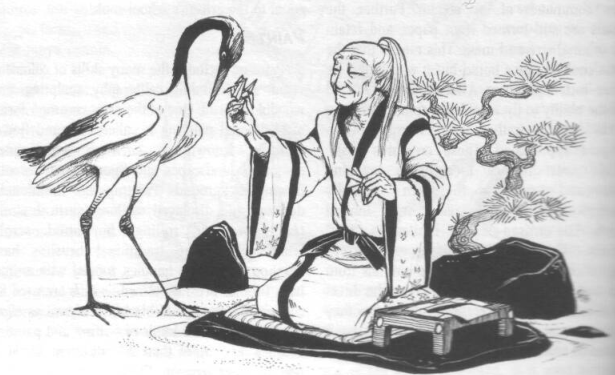
Wonder if you can eat the constructs. Get paper, get some kickass fried chicken.
Painting includes many skills of color and visual art. This includes calligraphy, sculpting (?) and woodblock printing. There are over 300 kinds of writing and painting brushes, and 200 kinds of hair for their creation. Calligraphy is the art the Crane value the most, because every stroke can only be done once without any hope of beginning again. One strike one brush stroke, one life. Painting maya require at least fifteen minutes of preparation and can be held, keeping the glyph in a safe place like a spell scroll tube.
- Rank 1: the artist can create semipermanent calligraphic glyphs with various effects. We get two examples: confusion glyphs that force a TN 15 Intelligence save on anyone that look at it or become confused for (6 - their Intelligence) turns, and protection glyphs that must be inscribed on the forehead of the individual to be protected and add 5 to their TN to be hit, as well as an extra day of resistance to Shadowlands Taint for each School Rank. The players and GM are encouraged to come up with more glyphs.
- Rank 2: the artist can make a painting of someone they're familiar with by using special implements (brushes with their hair and so on) With a successful TN 25 Intelligence + Painting roll, the painting is connected to the person and the artist can talk to them over a great distance by meditating on the painting. It takes 1d10 days to finish the painting, and raises can allow things like seeing through the person's eyes or contacting them over extreme distances, even into the Shadowlands.
- Rank 3: the artist can create a mural of a place (Intelligence + School Rank roll at TN 30, can take several weeks) and attempt to actually step through the painting to the place it depicts. Every time this ability is used there is a 25% chance of ruining the painting. Only the painter can attempt this journey.
Poetry is admired as the highest form of literature. Waka is the traditional form of poems and short songs, following a 5-7-5-7-7 syllabic pattern, and a popular form of challenge in Rokugan is creating spontaneous waka, sometimes alternating lines with an opponent. Modern poetry follows the renga style, like waka but created by two people: one does the first three lines and the second finishes the poem. Rezan, a ronin poet, was about to be ordered to commit seppuku by the Emperor due to his open criticism of Imperial policy, but he saved his own life by reciting at the Imperial Poetry Contest. He also created and popularized the haiku, the shortest form of waka. Poetry maya can be performed without preparation or with several hours of it, depending on the poetry being created.
- Rank 1: the poet can create a minor mirage based on their poetry, like an image of a forest with a poem about woods. The illusions have no auditory components and cannot create the image of a specific person, but they can be used to camouflage ambush parties or make a spell effect look more spectacular. Disbelieving the illusion requires a Willpower + Perception roll against a TN of 20 and creating the poem can take from ten minutes to an hour depending on the mirage.
- Rank 2: the poet can send short messages in haiku or waka form, which the listeners receives as whispers in their ear. They may in turn compose a poem in the same style and send it back to the poet. This maya requires no skill roll if the target is in the poet's sight. If not, the poet needs an item of the target and must roll Intelligence + Poetry against a TN set by the distance, from TN 15 for up to 1 mile to TN 25 for up to 10 miles. The poet can send and receive messages up to (School Rank) times per day.
- Rank 3: the poet can inspire people to great deeds. Anyone that sits and listens to their recitation (up to a maximum of [School Rank x 2] people) before going into combat receives +10 to all their attack rolls and +10 to their TN to be hit for (poet's School Rank x 2) rounds.
There are many types of Storytelling in Rokugan, from the serious to the comic. The professional storyteller, the rakugoka, uses voices, facial expressions and gestures, and little more (perhaps their fan as a prop) to narrate a story. Storytellers often tutor noble children, and of all the Artisans they're the ones that most often travel the land, entertain the populace and remind them of the traditional ways. One of the most famous storytellers, Kakita Ryoku, was the author of the novel Winter. It is the published papers of her journal, quite popular among Rokugani ladies, and is considered to be one of the greatest books on politics and courtly intrigue ever written. Storytelling maya cannot be held and require at least ten minutes to perform.
- Rank 1: the storyteller can make an Intelligence + Storytelling roll against TN 20 to identify a notable item, understanding its importance in history and whatever abilities it may have. Obscure items raise the TN. A failed roll can cause a misunderstanding.
- Rank 2: the storyteller can cause such belief in their stories that they partly become true. They choose a myth and narrate it in such a way that the target sees a connection between the myth and their own life. This makes GM-determined beneficial or detrimental effects happen for a period of time: for instance, if the storyteller narrates a horror story of an oni that eats feet and steals the heart of people to take to the Shadowlands, the target will start smelling strange odors, feeling noises at night, and eventually coming to believe that they are being attacked by the oni (a product of their own imagination) The storyteller rolls against the target's Void; they lose all Void Points on the attempt whether is successful or not and cannot attempt to use this ability until (6 - Void) days later.
- Rank 3: the storyteller can bring characters of myth to life, in semi-sentient physical form. Of course, the characters aren't the real thing, just constructs brought about by the storyteller's own chi. They have no intelligence of their own and only have the knowledge and abilities myth assigns them. A construct of Osano-Wo can fight and defend the storyteller, but not woo women or cast spells because that isn't part of Osano-Wo's myth. (Trying to get a Matsu mail order bride probably doesn't count.
 ) A storyteller can only have one such character active and it requires their full concentration, and if the character is destroyed the storyteller is automatically Down. Typical constructs require an Intelligence + Storytelling roll at TN 20, with more obscure characters raising the TN, and the last person that tried to summon the Kami was driven mad and torn to pieces so like do not. None of the character's Rings are going to be higher than the storyteller's School Rank.
) A storyteller can only have one such character active and it requires their full concentration, and if the character is destroyed the storyteller is automatically Down. Typical constructs require an Intelligence + Storytelling roll at TN 20, with more obscure characters raising the TN, and the last person that tried to summon the Kami was driven mad and torn to pieces so like do not. None of the character's Rings are going to be higher than the storyteller's School Rank.
So yeah, art.

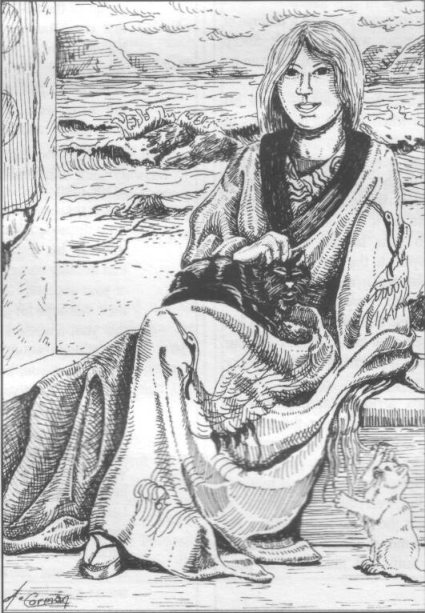
At least the kitties are cute

There's also the heritage tables later, including a special one for Asahina fetishes. But that's enough for one post!
Next: not everything is okay, in the house of the Crane.
Way of the Crane: Denny Cranes
Original SA post Legend of the Five Rings First EditionWay of the Crane: Denny Cranes
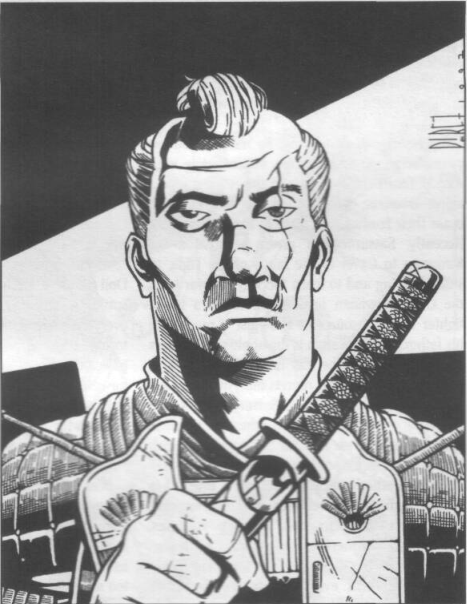
The "Grinning" part is sarcasm, see. Also this is the face of your boss in the common Emerald Magistrates game.
Important NPC time! We start with Doji Satsume, who is the Crane Clan Champion as well as the Emerald Champion himself. One of the best swordsmen in the Empire, trained with both the Daidoji and the Kakita, and the epitome of honor. He is hard and uncompromising, what with having to deal with the Lion and the Scorpion. He was a quiet child when growing up, and as a youth he served with the Daidoji in the frontline against the Lion, personally slaying the Ikoma daimyo at the age of sixteen. Ever since then, he's had the hatred of the Lion but he has never looked back. He is a personal friend of the Emperor, who he met while training together at the Kakita iaijutsu school. At the age of 21, he defeated his own father for the position of Emerald Champion, and he has served the Hantei ever since. He used to be able to handle both the Champion and Doji daimyo duties, but he's had to rely on his son Hoturi for the latter post due to the recent strife, and he fears for his clan's future given his son's frivolity. He has a bad scar that he got defending the Emperor from ninja; the Scorpion nicknamed him "Grinning Crane" behind his back and privately curse the ninja's incompetence. He is just over forty years old but won't retire until he is sure his Clan is in good hands. He fell in love with his now late wife and arranged the marriage himself, and though she did not return the love she did her duty, bearing her two kids (Hoturi and Kuwanan) as well as adopting his niece Shizue after Satsume's brother died. He still misses his wife. Outwardly he respects both his sons, but privately criticizes Hoturi for his womanizing and sometimes he regrets Kuwanan is not the eldest son. Kakita Bushi 5, pretty good stats, and a Honor of 5 which makes him the most honorable NPC statted yet. A Fire of 8, too, and Lost Love (Doji Teinko, his wife) because he's not all steel.
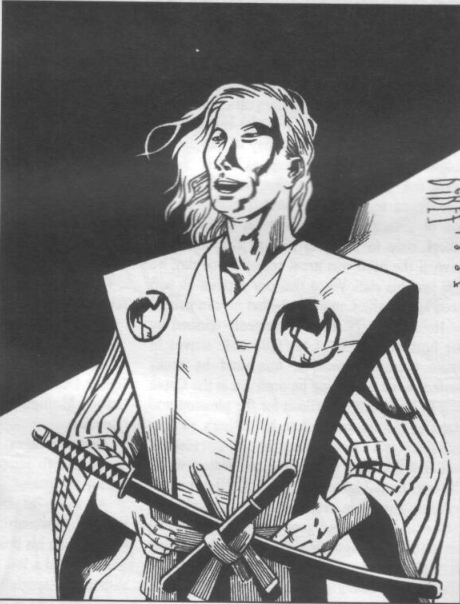
He has an annoying posh Brit accent in my head.
Doji Hoturi is the Doji daimyo and eldest son of Satsume. He has a ready laugh, a bright smile, and is eager to be everyone's friend. He is quick to laugh and smile with his companions and only seems to be reserved with those who don't know him or those who he is trying to impress. This helps him appear as cool and controlled as his father in social functions. His father rarely had time to spare for him as he was growing up, so he spent more time with his mother and his sensei, Kakita Toshimoko. When she died, he informed his father that he wanted to become an artisan like her; Satsume laughed and punched him in the face before curtly informing him he was being enrolled on the Kakita iaijutsu school next day. In time, Hoturi became Toshimoko's best student, and during his schooling he met Akodo Toturi, his childhood friend. Both were outcasts, separated from their fathers, and found they had much in common. Their friendship has grown and he's spent a lot of time with the Lion, which Toshimoko approves of in hopes that this leads to lasting peace between their families. Hoturi is known to be a ladies' man and there are rumors of romances with everyone from Isawa Kaeda to Horiuchi Shoan. He can be very manipulative when he wants. Since his marriage, however, he's dialed down on his womanizing - he's never been disloyal to his wife. He enjoys geisha company still, just not their company. He hasn't spoken with the only woman that could make him disloyal in years. There are rumors that his marriage was arranged by Satsume to chain down his son, and his self-esteem is continuously crushed by Dad's criticisms. He really wants Satsume to be proud of him, but he just doesn't have his somber attitude. Kakita Bushi 4, with a Honor of (4.1) 5 and a note to see the description of his wife. Mysterious! Also has a Kharmic Tie to Bayushi Kachiko, because come on.
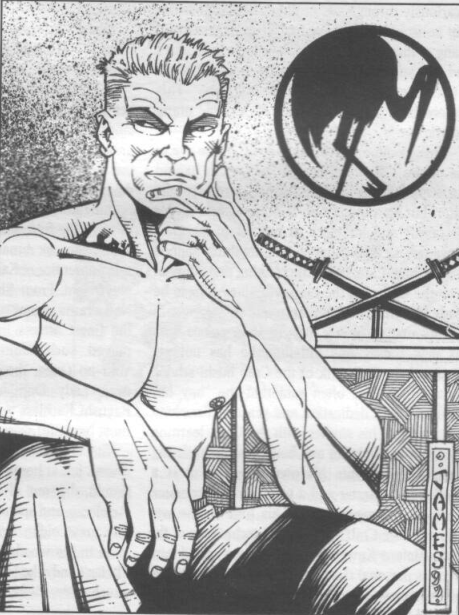
Kuwanan bro don't make the pepe face
Doji Kuwanan is Satsume's second son. He's the image of their father as much as Hoturi is the image of their mother. Shorter than him, stocky, with forceful gestures and a low voice. His humor is more earthy, he is less readable and a lot less easygoing. He is not as strikingly handsome as Hoturi, but he is rugged and muscular. When he was twelve, Satsume sent him to study with Akodo Toturi. He learned strategy, tactics and preparedness from the Lion, but also found a love of war. He loved the thrill of victory, the feeling of challenging another's blade, to see how wars were won first-hand. When he returned, he begged Satsume to enter other bushi schools in Rokugan: his father agreed, and he has trained with the Daidoji and then with Hida Yakamo and Hida O-Ushi's own sensei in Crab lands. He also learned to hate, deeply. He trained with a young Lion named Matsu Hiroru who made his life hell, going as far as "accidentally" breaking his arm in mock combat. Kuwanan knew the blow was intentional but could do nothing more than accept the profuse apologies. When they achieved their gempukku, Kuwanan was betrothed to a Phoenix girl, Shiba Nosuriko. Shortly before their wedding day, the girl hanged herself in her quarters leaving no note or reason. Kuwanan blamed Hiroru for this and found that the Matsu had vanished never to heard again; he has vowed to make him pay for the death of his fiancee. Kuwanan now lives with the Crab, still following their ways: he's yet to master the first rank of the Hida school but his sensei says he's got promise, and Satsume let him know that he should live the life he wanted for himself and never to regret that he isn't the heir. Kuwanan never has. Akodo Bushi 1/Daidoji Bushi 2/Hida Bushi 1, so I guess he's got that first rank after all! Still 15-odd points of actually getting his Rank 4, though. Also has Lost Love ( Isawa Nosuriko) because editing is for lesser games.
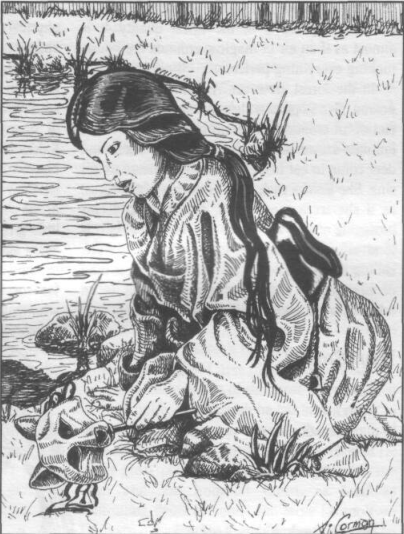
This art style is really rough.
Doji Ameiko was born to peasants that left her on the steps of a temple in Fox lands, and she was raised by the Fox's nobility. It was better to free a slave's child than condemning a born samurai, the Fox daimyo said. She was sent to the Kakita Academy to study the arts, and her poise and grace were such that she became the sole apprentice of a famous playwright, Kakita Shoju. From him he learned Noh drama, dance and poetry, and played many famous roles. She is arguably the most beautiful woman of her generation, even compared to Bayushi Kachiko. She's always felt at home in the forest and routinely spent hours in the woods away from the Fox palace or the Academy, claiming to her worried tutors that she was never alone. Many young men came from all over Rokugan seeking her hand, and her Clan allowed her to choose as she wished for the sake of her happiness, but she only had eyes for young Doji Hoturi. However, he paid little attention to the pale young maiden. She was even sent with a troupe to Phoenix lands to see if she caught the heart of their Clan Champion, Shiba Ujimitsu, but it didn't take. When her marriage to Hoturi was announced the noble circles were taken by surprise: Ameiko was little more than a commoner, for all of her noble training and manners, and many scorned her. The Scorpion daimyo didn't even attend the wedding, because his wife had suddenly fallen ill. Ameiko has taken her husband's name and now lives in the Doji palace, training for her responsibilities as the daimyo's wife. She is the perfect adoring young wife, and though the rumor of Satsume arranging the marriage is still strong it seems that Hoturi falls more for his wife every day. She still loves going into the woods, and her unassuming personality changes radically when in nature. Animals love her and come to hear her sing. Hoturi laughs and calls her his "pet fox," and Ameiko merely smiles. Kakita Artisan 4 needing like 70+ points to get to the appropriate Rank, and she has Higher Purpose as a Disadvantage for some reason. Her Higher Purpose is being the Foxwife to Doji Hoturi. She's a friggin' Kitsune! Nothing on what's going on with Hoturi's Honor, though, but she also has a Honor of 5.
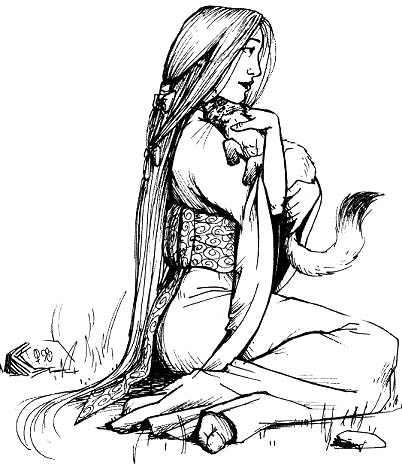
Spoilers: Shizue is to Soesbee what
Doji Shizue is the only child of Satsume's younger brother, who was killed in a skirmish with the Crab. Her mother died days after her birth. Satsume's wife, Teinko, raised her and she is considered a sister to the two Doji boys. She was born with a crippled foot ("twisted in the mouth of Fu Leng," Satsume says) but she's never let that get to her spirit. She is not a great beauty, but she is lovely, quick to smile and with a silvery laugh. She moves with grace in spite of her disability, and remembers some of what Teinko taught her about dancing. She has a gift for storytelling and there are those who say she is the reincarnation of Kakita Kiyamori, Kakita's own twin sister. Even gruff Satsume has praised her ability, but only in private when he thinks no one is listening
 Shizue is gentle and seems content with her peaceful life, and bears no remorse for the death of her parents: she trusts the Tao to show her the way.. But she is more than a pretty face: Satsume told Kakita Yoshi to train her as a spy as well as a courtier, skilled in political negotiation and finding out secrets. Her stories contain coded information passed between Yoshi, Satsume and Hoturi. She is small but with one of the greatest intellects in the Empire, able to memorize manuscripts at a glance and breaking codes. She has proven herself most useful to the Clan in this role and Yoshi says she'll make a great addition to the Crane's ambassadors when she's older. As far as other Clans are concerned, Shizue is nothing more that a goodwill ambassador with a sunny disposition. Kakita Artisan 3 (Storytelling 2/Poetry 1) with a Kharmic Tie to Matsu Hiroru that she doesn't know about yet and Knife 2
Shizue is gentle and seems content with her peaceful life, and bears no remorse for the death of her parents: she trusts the Tao to show her the way.. But she is more than a pretty face: Satsume told Kakita Yoshi to train her as a spy as well as a courtier, skilled in political negotiation and finding out secrets. Her stories contain coded information passed between Yoshi, Satsume and Hoturi. She is small but with one of the greatest intellects in the Empire, able to memorize manuscripts at a glance and breaking codes. She has proven herself most useful to the Clan in this role and Yoshi says she'll make a great addition to the Crane's ambassadors when she's older. As far as other Clans are concerned, Shizue is nothing more that a goodwill ambassador with a sunny disposition. Kakita Artisan 3 (Storytelling 2/Poetry 1) with a Kharmic Tie to Matsu Hiroru that she doesn't know about yet and Knife 2

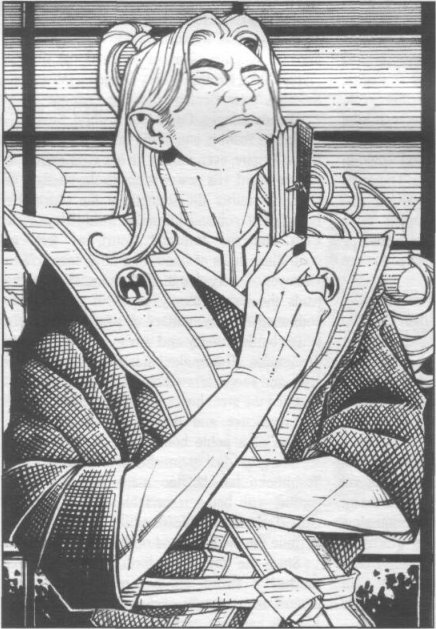
Creepy eyes.
Kakita Yoshi is the daimyo of the Kakita family. He is one of the most powerful men in the Empire, even though he's sworn never to drawn a sword. His power comes from the courts: he holds great influence within the Crane and controls debts of honor and favor from daimyo of all the Clans. He has no control over the Kakita military, however, leaving that to Kakita Toshimoko, who left him the daimyo position because it was too demanding and restrictive. Yoshi has no knowledge of kenjutsu and has never drawn steel against an opponent. In fact, he is forbidden to do so. A long time ago, the Kakita invited a ronin shugenja of great renown, the Master of the Elements, to their palace. The shugenja was late for days, then weeks and months, and the Kakita thought he would never arrive and closed the castle gates that they held open to him - with such bad timing that the shugenja arrived to have the gates closed right in front of him. Incensed, the shugenja cursed the castle: a child born in it who drew a blade would bring ruin over the Kakita house. The Kakita have gotten around the curse since then by throwing the gates open when a child is about to be born in the palace, but Yoshi was born during a Lion siege. Because of the curse, he has a decree placed on him that forbids him from ever drawing steel. He serves as the Emperor's aide and personal advisor, as well as Imperial Liaison to the houses of Rokugan. Even those who dislike the Crane risk themselves when speaking ill of Yoshi, because any man in their employ might be his friend. He's the guy that can get you anything, and has enough friends to make it worthwhile. Doji Courtier 5, lots of social skills and Major Allies from literally all Clans. Also an Air of 7, so good luck stabbing him.
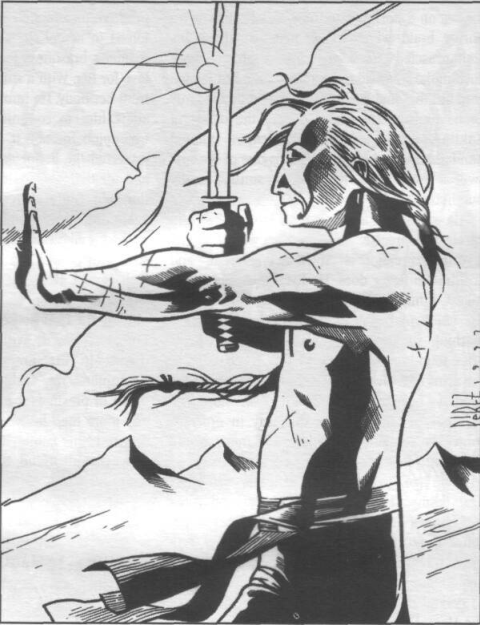
Later that night he went to the geisha house and left with his fundoshi on his head.
Kakita Toshimoko, the Gray Crane, is the Master of the Kakita Academy. He often laughs, is usually found with a drink, and is rarely serious. His humor is known across the Empire, as well as his skill with the sword - in fact, the only time he seems serious at all is when engaged in a duel. He has been sensei to the current Emperor and now to his son. Toshimoko used to be the typical hotblooded samurai, but the years have mellowed him out. His name comes from his father, Kakita Toshimo. Everyone remarked on how much he resembled him in looks and temper, so when his gempukku came up he added the feminine -ko to Toshimo and became "Toshimo-ko" or Little Toshimo (augh, faux-Japanese) He is notably taller than his peers, with dark blue eyes and gray hair worn in an unruly braid. His favorite expression is "You'll not regret it" and he never does: he fills his hours with wine, women and beautiful things. When he's not training students, he's in a geisha's arms or singing with a beggar along the road. When he was young, he was part of the Fox-Hare war, where he ended up killing the Fox daimyo in a duel under accusations that his wooing of the daimyo's daughter had not been serious and many deaths could have been averted. The daughter, Kitsune Ryoden, refused to talk to Toshimoko after he killed her father, and many years later she came in full battle regalia to a Crane festival demanding her right to avenge her father. Toshimoko once again fought duel he didn't want to fight for honor's sake, but his anger at her brashness was stronger than his love for just a second and he took her head off. He immediately asked to commit seppuku, but the Crane Champion forbade it: Toshimoko had acted with honor, after all. He has been like a grandfather to the three Doji children (he was Teinko's brother) and is especially close to Doji Hoturi. Kakita Bushi 5 with a Fire of 7, a Void of 8, and an Iaijutsu of 6, meaning that he will fuck your shit up.
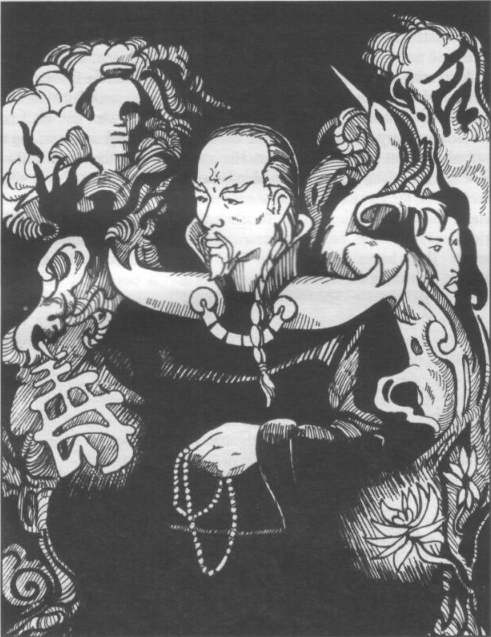
Is he like... sitting on a throne, or something? What the hell.
Asahina Tamako is the daimyo of the Asahina family. He holds his position because of a sign of the gods rather than birth. A seventh son of a seventh son, he was left outside in his crib as a baby by a negligent maid; when she returned, a crow was on the crib, looking down at him. The maid cried, but the crow simply set its beak down and touched the baby's face, then flew away. Ever since then, it's said that Shinsei guides Tamako's steps. He is a man of peace that has dedicated his life to spiritual and magical study. His ability to create magic items is unparalleled, and his occasional flashes of insight can be eerie. Even though he is middle-aged, his eyes are already narrowed and his skin is wrinkled and wan. He sometimes appears unconcerned and detached from reality, but it's just that his thoughts are taken up by the contemplation of powerful magic. He keeps his school open to outside influence despite his reclusiveness due to Doji pressure and "visions" that he believes come from Shinsei. His poor health keeps him in the Asahina temples, and though he's never traveled he has written extensively to the Isawa library searching for precious books. From this correspondence he has gained his only true friend, a shugenja called Isawa Tomo. Asahina Shugenja 5, under Insight by some twenty points, and also with a note that he probably has any possible magic fetish or talisman at any time due to his position.
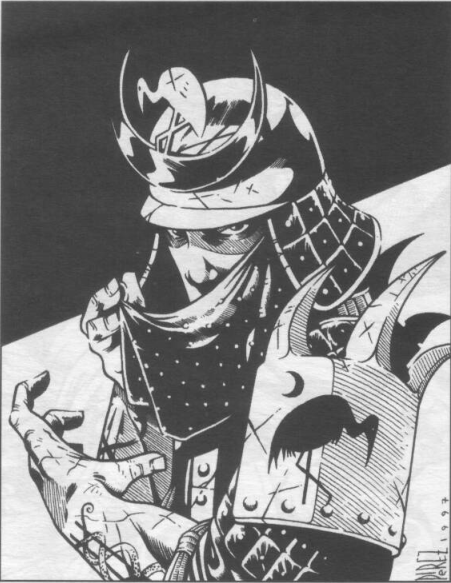
MORTAL KOMBAAAAAT
Daidoji Uji is the daimyo of the Daidoji family. He is the only child of the previous Daidoji daimyo, and one of the most exemplary students of the Daidoji school. Dark and brooding, he's never let his hair grow out or dyed it. He has a dark complexion, black hair and deep brown eyes. He rarely wears his armor, but he is deadly on the battlefield, and has proven his skill as a general time and again. He speaks rarely and with a soft voice, his eyes never twinkle, he never smiles, he has a Scorpion-like mask that he wears on the battlefield, look he just ain't cute okay. He has no interest in court life and no personal desire to be involved in politics: he just cares about battle and trade. He travels the Crane lands, assessing the military preparedness of their strongholds and preparing strategies against any possibility. Uji is trained in trade sabotage, smuggling, and infiltrating enemy economies to stifle their supplies. He relishes those things as some would relish the death of a hated enemy. He harbors a great respect for the Crab, and studied warcraft for a year under Hida Kisada himself. He hangs out with the Great Bear and his son Yakamo when he visits the Crab lands, and while it can't be said that he is in love with Hida O-Ushi he certainly holds great admiration and respect for her and always makes time to spar with Kisada's daughter. This friendship has not quelled his hatred of the Yasuki, however, and he is always trying to push Taka and his traitor family towards their downfall and the Daidoji's revenge. Until that day, he's got a lot of things to deal with. He spends a lot of time studying gaijin tactics. Some say that he is too concerned about them, but if he is obsessed it is not known to what extent. Daidoji Bodyguard 4, just a little short of Insight, with Fascination (Gaijin) and the skills Gaijin Culture 2, Lore: Gaijin Warfare 3 and "Sai-bore" Technique (Gaijin Weapon) 2. "Sai-bore"?
Ancestors! Lady Doji is there, of course. It's said that after the war, she visited all of her brothers regularly until they passed on, and when she was turned away from the Dragon lands with the naming of a new daimyo she returned home to let the waves claim her (dick move, Togashi) For 6 points, the character is considered to have 1 point in all High skills (they must still pay for the first rank to get the second one if they want it) Doji Hotei was a Crane Champion that lost his mind when his wife died, leaving the position to his younger brother and running off with only two samurai retainers in tow. He claimed that his wife had sent him on a great quest, and he challenged trees to duels and held court before doves at the beach. His deeds were forgotten and he became the object of ridicule, until many years later he resurfaced in the middle of a battle that the Crane was about to lose to the Lion, saving the Kakita palace. Doji Hotei died with his two aged retainers next to him, and a shrine was erected to his memory. For 4 points, the character is affected by a minor yet debilitating mental illness that will surface at some point of their lives, but in return they can spend a Void Point to ignore all wound penalties for one round. Doji Taehime was the Crane ambassador to the Scorpion court, and her skill at discovering falsehoods and uncovering plots was legendary. It's claimed that she held many of the most cherished secrets of the Scorpion daimyo and that the two were secretly lovers; when she died, many of those secrets ended up in an iron box buried somewhere beneath the walls of the Kakita palace, because she would not betray the one that was her host for so many years. For 5 points, characters can roll and keep (Void) dice in Persuasion, Etiquette or Manipulation rolls, but they may never reveal all that they know about a subject. Kakita Rensei was a famous Daidoji bushi known for his ruthlessness and bloodlust. It's said that in one battle, his sword cut through a man on horseback and continued to cleave the horse in two. It's said that after Shiro no Yojin fell, he went off to challenge the Lion Champion to a duel: he never appeared again, and the Champion disappeared three months later. For 2 points, damage dealt by the character cannot be reduced or ignored in any fashion - dodges and parries are good, but no abilities that negate damage. Holy shit. Kakita Wayozu was the first Mistress of the Kakita Academy, and though not a student of the sword she spent hours in the dojo learning both bushido and the gentler arts of the school. A war with the Crab changed her life forever: she sent her iaijutsu students to back up the Daidoji forces and watched the Hida warriors cut them down. Finally, the Kakita forces retreated and she gathered artists from the school for a final stand on a bridge: they weaved a realm of fantasy from their own imagination, and sacrificing their own bodies they made the Hida invaders vanish without a trace inside the fantasy world. All that was left was a book written in a language unknown in Rokugan. For 8 points, a character may once a day spend two points and use any Rank 1 maya, rolling their straight Fire and only keeping one die if they don't have the skill. Kakita, the man with the plan, costs a whopping 15 points. The character may reroll any roll a number of times per day equal to their Void, but in place of the initial skill they must use their Iaijutsu skill. They also gain +10 to their TN to be hit in combat (duels included) if defending the Emperor, the Hantei line or the Doji noble family. The drawback is that the Matsu haven't forgotten the slight, and the whole Lion Clan will hate the character and seek to make their life hell (but only the Matsu will act without provocation against them) Asahina Yajinden was an Asahina shugenja that was tempted into becoming Iuchiban's greatest lieutenant. Some people say he never died and escaped to haunt the world until Iuchiban returns. For 3 points, the character gets a Free Raise for the creation of any fetish or magic item, but their TN to be seduced is reduced in 10. Daidoji Yurei was born on the battlefield as the Crane fled Shiro no Yojin and rose to become the family daimyo and one of Rokugan's most feared generals. It was rumored that he was possessed by the ghosts of all the dead of that battlefield, and he held an uncompromising hatred of the Lion. For 2 points, characters may roll and keep their Fire in bonus dice when making the Perception + Battle roll to see who is winning in mass battle. Daidoji Masashigi was the CRAB NEVER 4GET guy. For 7 points, the character gets a Major Ally in the Crab and their TN to be hit increases by +3 with each Wound Level they lose.
Rensei is such a no-brainer, holy crap.
Sample PCs!
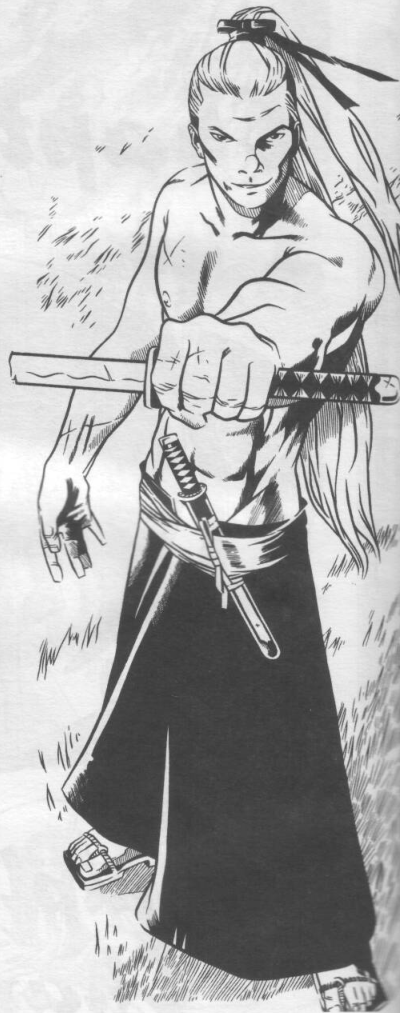
Your sword is fucked, guy, you don't get to be smug.
The Kakita Iaijutsu Duelist is the finest student ever to come from the Kakita dueling school. He's certain of it. It's time to take his skills to the other Clans and show them what they're up against! After all, in one of his proudest moments - one that he recounts often - he defeated a visiting Lion sensei, and ever since then people are saying he's the next Kakita Toshimoko. He went off to see the world and get into duels after graduating, and then he found her: a lovely Asako maiden. She was married to an old Dragon, someone who didn't deserve her! He sought any reason to duel the Dragon, they squared off... and his katana broke. He was forced to admit defeat to the laughing Dragon, who told him to come back "when his steel does not bend against the forge." He's so going to come back, yeah. The Dragon has his pride, his honor, and the woman destined to be his wife! She's worth any cost! Right? Kakita Bushi, all Rings at 2 including Void which is a little worrying for a duel-focused character but he's got the Agility and Reflexes to be dangerous. Also True Love, Insensitive and Vain.
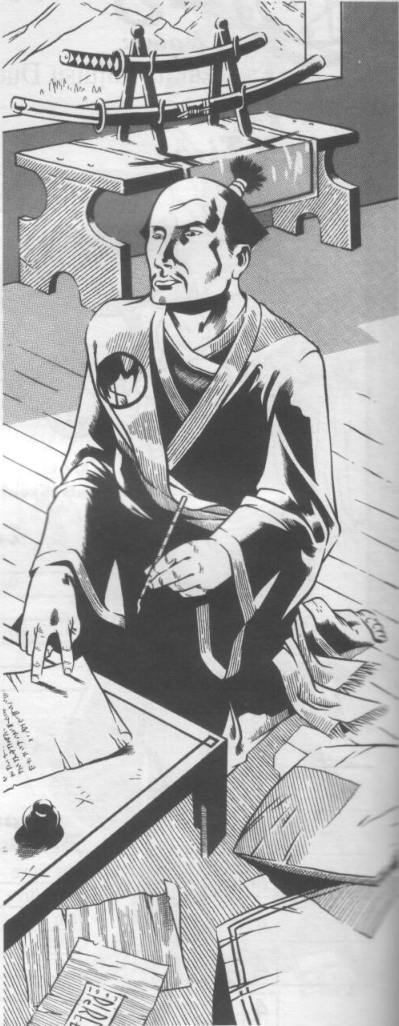
Let's face it, he is Scorpion fodder.
The Doji Courtier was raised in a quiet home, without childhood trauma or anything like that. His family loved him, and they managed to get him into the Doji courtier school, where he expected to score a quiet minor diplomat post and live out his life. Until he was assigned to a famous magistrate in Scorpion lands. The errands, daily interviews with nobles and delicate manipulations were quickly getting to his nerves, but the magistrate insisted on his staying - he was one of the few men he could trust. One night, the magistrate showed up, gave him a fan, and told him never to mention any of this again; next morning, the magistrate was dead, and the PC had to take his place until someone could relieve him. Now he's back in Crane lands, but he knows the Scorpion haven't forgotten, and he doesn't know what to do with the fan. Doji Courtier of course, Air at 3 and Awareness at 4, and Mizu-Do 2 just in case. Also an Inheritance (Fan) at just 1 point and a Scorpion Bushi as a minor Enemy!
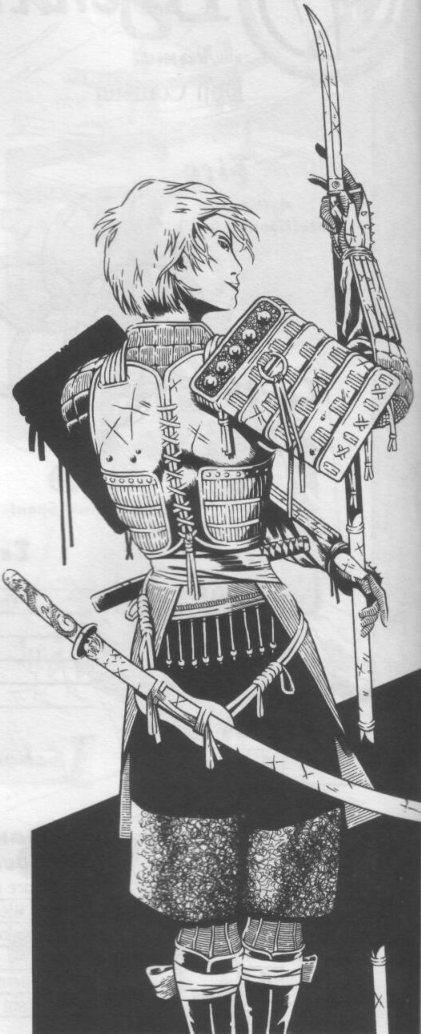
Kickass.
The father of the Daidoji Bushi was a Daidoji, and her mother was a fierce Crab. From his subtle espionage and her forthright strength, she was born. Neither of them cared if she was a proper lady, and when someone was rude enough to ask which of them she liked best at her gempukku, she said "both." She excelled at counter-espionage, and in her first major solo mission spying on the Akodo she managed to stop an assassination attempt on a visiting Crane dignitary. She delivered swift revenge on the culprit, but something went wrong. When she went back home, her parents were dead, the only clue an unmarked tanto - the same tanto she had used to finish off the Akodo assassin. On that day, she cut her long white hair, cursed the Lion and swore to avenge her parents' deaths.
 Daidoji Bushi with Honor at 3 due to that Rank 1, decent stats. She also has a no-dachi as her primary weapon for extra killy.
Daidoji Bushi with Honor at 3 due to that Rank 1, decent stats. She also has a no-dachi as her primary weapon for extra killy.
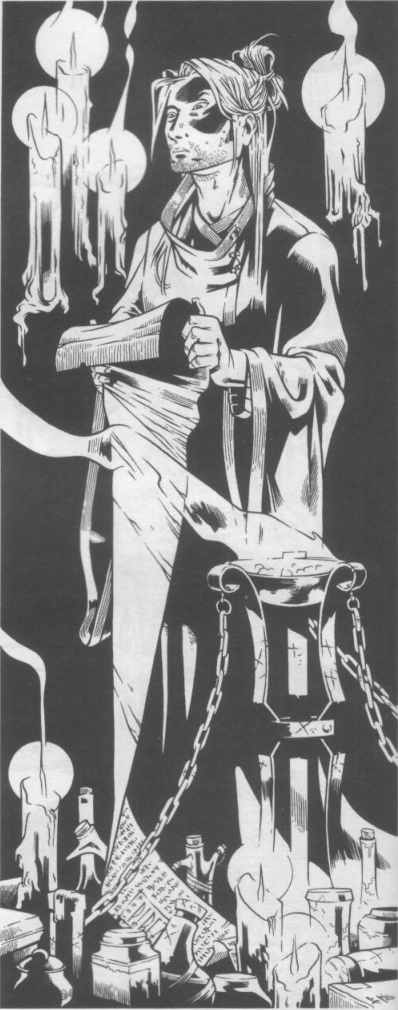
Look man, just stop hanging out in dark dungeons.
The Asahina Shugenja hears his voice at night. His dreams are haunted with blood and death. It's not proper for an Asahina shugenja to know such things, but he tells him of all the ways to kill a man, all the ways to inflict pain and anguish. It's not right, but he can't help but listen to him. That him is none other than Yajinden! His talent with nemuranai is remarkable, but he feels the kuei rise with every fetish and item he creates. The evil spirit longs for release, but he constantly denies it. Others of the school fear him, whispering behind his back. They're jealous. His unkempt appearance might have forced his teachers to keep him out of sight. Is he even a Crane, they wonder? He knows he is. He's a Crane. He is Asahina. And he must not kill, not because of morality, but because of the survival of his own soul. Asahina Shugenja, decent enough stats, he has Light Armor for some reason - and Yajinden as his Ancestor. Also Lore (Maho)

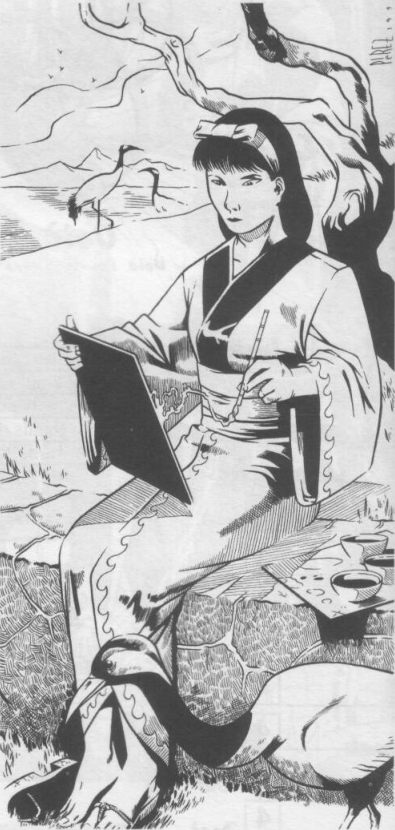
She's cute! Hope nothing happens to her

The Kakita Artisan just graduated last month. She is sure she can have talent if she tries hard enough. She's never been in love, never risked her life, never seen evil. She's just too young to be jaded. She's never been very confident in her abilities, though others say she is very skilled. It just doesn't come to her as easy as her peers, and art has always been a struggle to her. She always tries to keep someone on back-up when people rely on her, which leads to her current distress: one day, she was joined in the gardens by a noblewoman of the Unicorn who complimented her technique and talked to her at length. Next day, she was informed that the very high-ranking Unicorn requested to be her patron, and summoned her to Unicorn lands! She could hardly refuse such a 'honor' from a woman in her position. Now she prepares herself for her journey, and she has been taught the secret cadence of the Crane, "just in case." She knows there are deeper reasons, and she only hopes to be able to deal with what her patron and her house expect of her. She just hopes her new traveling companions won't mind having her along. A Rank 1 Painter Artisan, with only her Mizu-Do and Light Armor keeping her alive in combat. Also she Can't Lie!
Next: flip the Crab on its back.
Way of the Crane: Get Flipped
Original SA post Legend of the Five Rings First EditionWay of the Crane: Get Flipped
Finally, the appendices! We start with an overview of the lands of the Crane. They cover most of the coastline of Rokugan, from the Mountains of Regret up north to the southern peninsula that they share with the Crab by Imperial decree. The people of the Crane live a good life. The lands are rich, the taxes are light and the magistrates pride themselves on their honorable, just nature. Many peasants of other areas of Rokugan immigrate to Crane lands every year. However, their military presence is minimal, and sometimes forces arrive too late to solve bandit troubles. The peasants make do with swift runners to call for help as well as simple hand to hand fighting techniques, as commoners are not allowed weapons. The northern lands close to the borders with the Dragon and the Phoenix are peaceful and placid - they rarely see much war, or much of anything at all. The lands that are commonly held to be the northern border of the Crane and the Doji regions are held by the Emerald Champion: as the Champion is often a Crane, these lands are usually under Crane control. On these plains stands the castle of the Emerald Champion, as well as the Imperial capital of Otosan Uchi. In the Imperial Court, diplomats and courtiers arrange marriages, negotiate alliances, conduct business. Entire wars are fought without loss of life. The Court is not a physical place, but the entire entourage of ambassadors and diplomats that follows the Emperor around. They stay for six months in Otosan Uchi, then the rest of the year in one of the Clan palaces. Hosting the Emperor is a great honor and it is given to each Clan in turn, though it is known that the Emperor is much more inclined to visit Crane and Phoenix palaces than the Dragon or Crab. The Imperial Advisor, Kakita Yoshi, goes to great lengths to see that everything is prepared to receive the Emperor in these journeys, and the highly trustworthy envoys he sends in advance are expected to ferret out anything that could endanger the Imperial person.
Imperial authority comes from the fact that no one technically owns land in the Empire. Everything belongs to the Emperor, but he gives certain Clans the right to rule and farm in his stead. The Emperor also authorizes the teaching of the Tao to people and is the last authority in religious disputes. No Emperor has gone as far as rewriting the Tao, but altering its readings or premises based on the Tao is entirely within his jurisdiction. The Emperor also must approve every change in the feudal structure, from the ascension of a daimyo to naming a heimin samurai, but he leaves that busywork to his Advisor most of the time. The Emperor could technically forbid a samurai from becoming Clan Champion, and that Clan would not have to follow them. The Emperor also has the authority to give formal and religious sanction to all events in the Empire, though again he can delegate those tasks to those he finds appropriate. One of the most powerful Imperial prerogatives is granting Imperial Protection: those under it cannot be harmed or restrained from completing their assigned duties, or else the entire Empire will shun the offender, going as far as removing major Clan status, loss of samurai rank or execution.
Since the Crane take up so much of the coast, they have a near chokehold on seagoing trade. They have firmly established marketplaces and ports along the sea routes, and inland trade roads and markets to maintain economic superiority. Theft is not a major problem, as the roads are regularly patrolled by Daidoji forces and city samurai. Bandits also risk robbing Imperial tax caravans that regularly use Crane roads and having the wrath of the Empire fall on their heads. The Crane ports are bustling with activity, with larger cities containing the major Crane palaces. One such city has the reputed place where the Kami descended to the earth. The western plains have fertile farmlands and acres of rich rice fields cultivated by Crane heimin; the only aberration in these lands is Shiro no Yojin, now under Lion control. The crops grown here are one of Rokugan's primary food sources and they are traded all over, particularly with the land-poor Crab and Dragon. Only twice have the Crane enacted a full trade embargo against a Clan: last time, they enforced it against the Lion and even the Yasuki had to stop providing supplies for the Matsu forces. At the southern end of these provinces lies the vital Beiden Pass, fought over time and again by Lion, Crane and Scorpion due to its strategic location and control of the trade going through the mountains. Currently the Lion and Scorpion squabble over the corridor, while the Crane sits back to jump whoever wins the conflict. The southern border includes the Daidoji cities and the Kenkai Hanto peninsula. Bandit activity is virtually nonexistent due to the proliferation of Daidoji warriors and the cities are heavily guarded, prompting many Crab and Lion traders to do their business in the southern Crane lands. There are swampy reaches where people claim to have seen kenku, kappa and even the elusive Naga. The Crane themselves rarely venture into the swamplands.
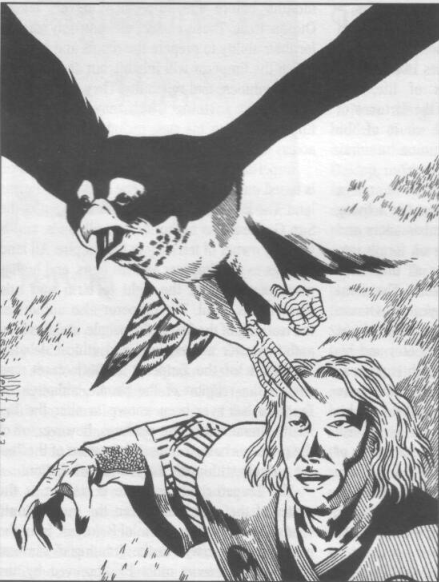
Hoturi looks like he scored the dankest gaijin weed.
Mizu-do, the "way of water," is a martial art born from Crane stage fighting techniques. Since the artists had no desire to actually harm anyone, mizu-do has evolved into a very defensive martial art, used by courtiers and artists. Its kata are performed in dance maneuvers and in productions of famous plays. It is focused on throws and joint locks, and practitioners are taught to fall and roll to receive minimum damage while still appearing to be injured. Most bushi schools have little respect for such a "soft" art, and the Crane have never attempted to popularize it. It does not teach weapon usage, and in fact it does not even use punches or kicks like jiujutsu or kaze-do. Mizu-do is, like kaze-do, a Hand to Hand variant. Only Crane characters can buy it at chargen; other characters can learn mizu-do in-game but they can't start with it. The first rank bought at chargen gives two techniques to use, with an extra technique every new rank. If mizu-do is bought after chargen, then the first rank only gives one technique. All mizu-do techniques require a reactionary roll: the practitioner declares Full Defense in one round, and may choose their technique after the opponent begins their attack, but if they use a technique they don't gain the benefits of Full Defense. If the practitioner chooses not to react to an attack, they can't change their mind later. If the technique is unsuccessful, the attacker gains a free raise on their attack. Mizu-do cannot be used against someone not attacking the character - it is purely defensive. It is a High skill.
- Bend like a Reed: evade a sword/staff attack. Reflexes + Mizu-do against a TN of the attacker's Kenjutsu/Bojutsu x 5. If successful, the attacker misses and cannot make more attacks this round.
- Catch the Shadow: if another person tries to grapple the practitioner, they may make a contested Reflexes roll to negate the attempt before the attacker makes their roll.
- Dragon Claw: a basic nerve hold. The practitioner rolls a grapple (Reflexes + Mizu-do vs Agility x 5) with raises, then deals Raises + Strength damage while keeping as many dice as the raises they made on the grapple. This damage is non-lethal: it disappears after ten minutes (!) and cannot bring a character below Out. It cannot be performed on a character wearing armor.
- The Farther You Fall: as the opponent charges, the practitioner rolls a reactionary grapple and performs a "sacrificial throw", dropping on the ground and grabbing the charging opponent to throw them away. If successful, the character rolls Agility + Hand to Hand (or Athletics) versus a TN of 20, plus raises made by the mizu-do practitioner. If they fail that, they take 0k1 damage, +1 die from the fall. They land (practitioner's Strength x 3) feet away and both characters spend the rest of the turn standing up, being at a TN of 5 to be hit.
- Flight Of Dragons: the practitioner rolls a reactionary grapple (now using Agility + Mizu-do vs Agility x 5); if successful, the attacker must roll Agility + Hand to Hand (or Athletics) versus a TN of 20, plus raises made by the mizu-do practitioner. If they fail that, they trip and fall at the defender's feet, taking (their own Strength)k1 damage + 1 die of damage from the fall.
- Hammer of Earth: the practitioner rolls an Agility reactionary grapple, then friggin' suplexes the target on their head. The attacker must roll Earth against TN 20 or fall unconscious (with common Earth scores of 2-3, that's only a 12%-37% chance of staying conscious) The mizu-do practitioner deals 1k1 damage and also receives 1k1 damage that doesn't add their Strength.
- Thumb Wrench: one of the most effective joint locks. First, the customary Agility reactionary grapple, then an additional Agility + Mizu-do vs a TN of the opponent's School Rank x 5 to disarm them if they have a weapon. If successful, the practitioner puts the attacker in a painful thumb lock. The attacker can roll Strength vs the practitioner's Agility to break the lock, but every attempt (successful or not) deals them their own Strength in damage, keeping all dice.
Ouch. Mizu-do handily beats the crap out of the Dragon's kaze-do. About the only real advantage kaze-do and regular jiujutsu have is the ability to initiate an attack, and even armored opponents are in danger of getting suplexed or locked into submission. The thing where some maneuvers have people rolling Reflexes and others Agility can get weird in terms of remembering what to roll, but also mean that the character can't just dump everything into Reflexes and have a high TN to be hit as well as being certain to execute their abilities.
New spells! The Asahina often share formulae with their Phoenix cousins, but these spells are in-house and rarely shown to outsiders.
Air
- Gust of Wind: the air deflects physical missile attacks or even reflects them back with a raise. The TN to hit someone protected with this spell with a ranged missile attack increases in +10, with another +10 per raise. If the deflection raise is used, shots are fired back on the attackers using the shugenja's Air rank.
- Binding: this spell slows time in an area. Anyone moving within ten feet of the spell's target point must roll Earth vs the caster's Air x 5. If the roll fails, the target is subjected to half movement, half attacks, and a penalty of 4 to their initiative.
- Awaken the Spirit: this spell temporarily rouses an item's spirit. A weapon gains an extra die to roll for attacking or damage (choose one), while other items give an extra die for a skill roll. Additional raises give additional dice. The basic TN goes from 5 to 20 at the GM's discretion though, and nemuranai cannot be affected as their spirits are already awake.
Nemuranai! These are some of the most well known Crane magic artifacts, most of which are kept in the Asahina temples. Shukujo is the Ancestral Sword of the Crane, the blade that Doji Konishiko worn into the Shadowlands and that Daidoji Hayaku brought back. It is unique among the nemuranai, as it contains two completely sentient souls - Konishiko and her twin brother. Only a true descendant of Doji (so a Kakita, Doji or Daidoji) may even attempt to draw the blade. Those who are not and try it lose their minds to the fury of the souls. Bushi that wear the blade can call on a number of Doji Courtier school ranks equal to their own School Rank, while Courtiers or Artisans get a number of Kakita Iaijutsu ranks equal to their own School Rank. Also, the wielder may always strike first in an iaijutsu duel, no matter who calls for a strike first. Doji Hoturi wields this sword. Sasageru is the ancestral armor of the Crane, left by Doji as one of her last gifts to her descendants. It is made of a strange metal and shines a pale blue rather than steel grey, with a crane enameled on the breastplate. It seems to be indestructible, and nothing can scratch or dent it. It adds 1 to the wearer's Honor Rank, which makes them able to reach Honor Rank 6 instead of the maximum of 5. They may also use their Honor instead of any Trait. The Five Asahina Nemuranai were given to the Clan upon Isawa Asahina's marriage to Doji Kiriko. They are rarely allowed outside the Asahina temple except for the obi, which is used by Kakita Yoshi. The Mempo of Pure Thought, presented to the Doji, adds and keeps dice equal to the wearer's Honor in contested rolls to determine if someone is lying to them. The wearer of the Courtier's Obi can reroll any dice in social skill rolls that roll less than the skill. The Standard of the Iron Crane, presented to the Daidoji, gives +2 to any roll in the mass battle chart for an army, or +4 if the army is outnumbered by more than two to one. The Merchant Coins were presented to the Yasuki when they still were part of the Clan: they are one koku coins with an image of each of the twelve creatures that represent the hours of a day (Hare, Dragon, Serpent, Horse, Goat, Monkey, Dog, Rooster, Boar, Rat, Ox and Tiger). Anyone that bears one of these coins gets a 2k2 bonus in contested or simple rolls pertaining to negotiation or trade during the relevant hour. Having more coins gives one extra die to add. Alternative, the character can waive the bonuses and reroll as if they had the Luck advantage. The Crane own a full set, and Yasuki Taka is reported to own at least two and he prefers to do his business just after lunch or after sunset. Heaven and Earth, presented to the Kakita, is an exquisite daisho set. Heaven is the katana, and it replaces its normal damage rating for the wielder's Honor, rolling and keeping that many dice. It also gives an 1k1 bonus in an iaijutsu duel. Earth is the wakizashi: it gives as many extra dice to add as the wearer's Glory, and the wielder may spend a Void Point to keep them instead of the wakizashi's regular k2 rating. Other items include the Serpent's Tooth (wielder adds School Rank to the initiative, can reroll missed attacks with a +5 to TN spending a Void Point), the Windblade (it negates all defenses except armor if the wielder's Honor is greater than their target, and it changes form depending on the wielder's Honor, from a tanto at Honor 2 to a huge no-dachi at Honor 5, its damage rating depends on the form it takes and it adds and keeps bonus dice equal to the relative difference between attacker and defender's Honor ratings), the Biwa of Kakita (+3k3 bonus to any music-related skill roll, the bearer adds one Honor point) and Doji's Fan (a Courtier that bears it gains one School Rank and gets +2 dice to any interaction with Unicorn)
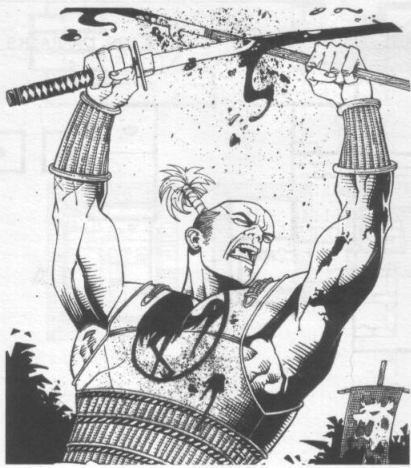
FUCK YOU LIOOOOOON
Fetishes are, as mentioned, one-shot magic items. Most are small and easy to carry. Creating a fetish requires usually fine materials, a hallowed place like a temple, three days of undisturbed meditation and a a Tsangusuri + Fire roll at TN 15: more complex items both increase the TN and the material requirements for it. Creating something like the Ancestral Sword of the Scorpion requires ridiculous stuff like forging 12 swords quenched in the poison of a hundred scorpions, getting three egg-sized rubies, asking Bayushi Kachiko and other notables to fast for a week in the Asahina temples, and making the roll against a TN of 40. An Asahina shugenja can begin creating fetishes at Rank 2 and objects of "permanent power" at Rank 4. None of these will be offensive or harm-causing, and if the Asahina masters know how to create offensive fetishes they aren't teaching anyone. Examples of fetishes are Incense of Concentration (user regains 2 Void Points with 15 minutes of meditation), Feather of the Crane (user's weight is reduced to 1/10 for an hour, they take triple damage from physical attacks during this period), Tortoise Shell (user is protected from all ranged attacks for ten rounds) or White Sheaf of Grain (heals 2d10 Wounds, can be to the user or another target) Finally, after the CCG section (including a deck made by Ree Soesbee herself) we have a couple of adventure hooks regarding an Asahina fetish ritual gone wrong, and one involving Daidoji Chiroku, the lady that got the ki-rin tattoo from the Dragon early in the book and that apparently became ageless after that.
Next: MATSUUUUUUUUUU
Way of the Lion: HEAR ME ROAR
Original SA post Legend of the Five Rings First EditionWay of the Lion: HEAR ME ROAR
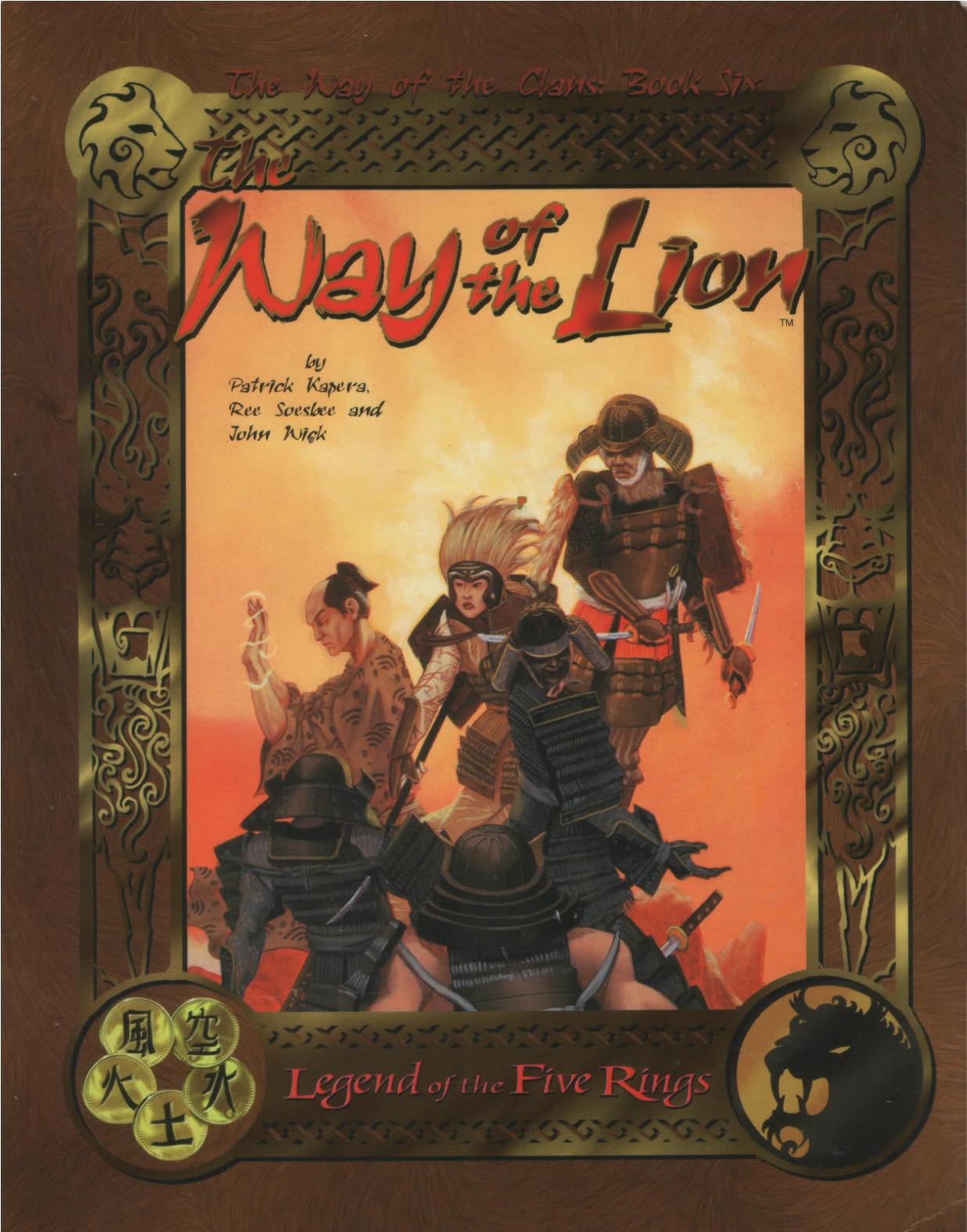
Let's see what the big mean Lion is all about! This one is helmed by Patrick Kapera, Ree Soesbee and John Wick, along with the AEG gang. Special thanks are given to Saving Private Ryan, which "arrived at the eleventh hour (with thirty seconds to go) and put us back on the path." I hope no one takes their kabuto off for a black comedy death

The RPG FICTION we get saddled up with is kinda weird as it shifts points of view. A battle is starting, bright banners up in the air. On one hand, we have the Kami Akodo and Lady Matsu: Akodo is telling her how GLORIOUS things are going to be while Matsu just smiles and wants to murder things. On the other, we have Akodo Arasou and Matsu Tsuko doing the same: they are about to take Toshi Ranbo wo Shien Shite Reigisaho (FUCK THAT NAME) back from the cowardly Crane. In the past, Akodo shouts orders, watch Matsu cleave oni, wonders "man, she would've been a sweet wife" and then has ogres jump his ogling ass. In the present, Arasou tries to link back with Tsuko in the carnage, but he's got Daidoji spearmen to contend with as his troops get rejected again by the Crane defenses. Tsuko rallies the troops and cleaves through the Crane, and Arasou follows her through the gap she's made. In the past, Akodo and his men beat back the ogres, but the battle is going poorly: Kakita's men are clenched around the Emperor, Matsu's honor guard is dead, and Akodo himself gets a horrid splash of oni's blood. He is only saved by Matsu's intervention, and then she marches off to command in his stead. At the Emperor's camp, a healer tells Akodo his left eye is gone. He calls for Matsu, who tells her she is there with no submission or reverence. He realizes he has to let her take command, and tells her she's right. She answers that they can never fight side by side; it was never meant to be. In the present, Tsuko and Arasou charge the city gates: it is GLORIOUS! Tsuko hesitates for a moment, Arasou cuts a bloody swathe through the Daidoji, and ends up isolated while a Crane ambush blunts the Lion attack. Crane reinforcements arrive, and while killing many, Arasou eventually falls. In the past, Akodo has one last talk with Shinsei before he marches, taking Matsu with him. He asks Akodo if he wants to talk to her, but the Kami says she knows his heart. Shinsei advises him to stand with his brothers before leaving. In the present, Tsuko kneels before the new Akodo daimyo, and thinks him a fool. He has no grace, no skill with the sword, none of Arasou's fierceness - and now her family is bound to this rabbit. He bids her rise and she can't hide the hatred she feels for him. He regrets her loss and says that the Lion must fight as one; like her ancestor, Matsu Tsuko replies that they will never fight side to side, it is not meant to be. He will never be Arasou. That is fine, the daimyo says: he is Toturi and she will obey. She narrows her eyes, her lips curl into a snarl, and with a curt bow she retires.
quote:
It is much easier to speak of Lion philosophy than to live it. For a Lion, there is no value in material wealth or political power; those are fleeting and temporary. What a samurai owns will be whittled down by the winds of time, but what he says and does... these things live on forever.
Shinsei said, "Choosing between two evils is still choosing evil." To a Lion, there are no truer words. The Lion's path is the most demanding, the most unforgiving, and sometimes, the most unrewarding of all the clans.
But if you are willing to walk it, I will show you the way.
And by the end, you will learn Akodo's first lesson:
A samurai's greatest strength is not what he is, but what he can be.
Our letters! A Shinjo daimyo recalls in his journal how the Ikoma daimyo lived with them for a spring along with his family as an arrangement imposed by the Emperor to bring peace between Unicorn and Lion. The daimyo feels the Lion ideals of honor and purpose are sometimes too high-minded to believe; at the same time, he realizes the Lion are not only swift to learn, but swift to apply that knowledge to combat. One day, the Ikoma daimyo's wife approached, and peacefully informed that their child was missing. Equally peacefully, the Ikoma told her to send samurai looking for her, while the Unicorn noted just how much the Ikoma lady was like the Otaku Battle Maidens. Night fell, nothing was heard of the girl. Next morning, the Unicorn offered his assistance, and also realized the Lion would rather let his girl be lost forever than ask for aid from a stranger. Unicorn scouts eventually found the three-year-old girl, stepping on a viper. One Unicorn soldier kills it swiftly, and notes how she must have been standing on the snake all night - had she moved her foot, it would have bitten her before she could escape. The soldier asks the Ikoma lady if all of her children are the same; she replies that she only has one child, but she is a Lion. The Ikoma daimyo asks the Shinjo daimyo about the name of the snake: it is called tsanuri, "patient death." A treatise on the Lion by Doji Hoturi narrates how Imperial orders have told the Crane and Lion to cease their war at once, and to send a son of each house to be fostered in the other. His brother, Kuwanan, will be chosen from the Crane. Akodo Toturi will see to his fosterage personally and Hoturi is relieved: they were both childhood friends, and he knows him to be a man of honor. Toturi invites Hoturi to the Lion Hall of Ancestors, a sacred place that only a few non-Lion have been invited to, and Toturi speaks of all the ancestors as they pass under their statues. When they stop in front of the statue of Lady Matsu, Hoturi feels something - a chill, a great weight of a thousand souls. When they leave the hall, the Crane asks his friend if he felt the same; Toturi replies that it's how he always feels. And one scrap of silk, written in the blood of a dead Phoenix, narrates his capture by a "Dark Man" (probably Iuchiban) and the tortures he was subjected to. They broke him, he would have done anything to escape them. But they also captured an Akodo woman with long, golden hair, who suffered stoically without yielding. Eventually she was impaled on a spike and left on her cell. The Phoenix insisted that she should talk, give them what they want - she refused to budge. She was dragged back outside, put in front of the Dark Man, who asked what she wished for: she spat on his face, and said she wished to be back on the spike. She died, of course, but the Phoenix found new courage - at least his soul, and hers, would find peace. And finally, a letter by one Akodo Rujo to his younger brother written while overlooking a battlefield narrates what just happened. It was a battle against the Scorpion and things did not go well: there was little cover from their arrows, and their shugenja rebuked the Lion charges with magic fire. The Lion keeps feeding men into the fray, and eventually Rujo's battalion is called. He felt fear, ugly fear telling him that he wouldn't be able to succeed where the others had failed - and then he realized, his men were looking at him. And he remembered who he was, and as he marched he started hearing a Song in his head, a Song of all the Lions that had died in war, of all who had bled and suffered and burned, who did it all for him. The Song was too much for a man to bear, but he was not a man: he was a soldier. His men were hearing the Song too, and they charged uphill against the Scorpion, fighting and bleeding and dying - but they arrived, and they cut the Scorpion archers down, and the Lion broke through. He fell, the Song gone, and a Matsu soldier with moist eyes tried to get him something to drink, but he had an Ikoma called. With his dying breaths, he narrated all of this, just so that his little brother knew what it was like - and how the Song, nothing compares to the Song of all of their ancestors.
When Akodo started gathering his Clan, he didn't want followers - he want people who stood with him. As such, the Lion choose to test their steel against the family daimyo on their gempukku: more than a ritual, it is a celebration of the courage in their hearts and part of what it means to be a Lion. They have been the right hand of the Emperor for a thousand years, recording the political and military interactions between the Clans, and their role as the largest standing army in Rokugan gives them a battle prowess unknown to any other Clan in the Empire. To the Lion, ancestors are more than just parables: they guide their everyday life, shape the destiny of their descendants, and walk alongside them. When Akodo went to search for worthy men, for every man that stood up to his challenge a hundred perished by his blade. Unworthy, weak, cowardly. People were said to have chastised Akodo in the Imperial court, proclaiming him a scourge upon the land. He returned every year to the palace without followers, simply saying that people should seek him instead of the opposite. Slowly, his forces grew, but he was not satisfied until he found and challenged the Lady Matsu, the greatest mortal warrior. The story is well known, and Matsu's portrayals in art and literature always have her standing alone, while Akodo stands with friends and companions. It was Matsu who became the Lion's Thunder: Ikoma tried to step forward, but Matsu knocked him out and dared anyone to deny her right. No one did.
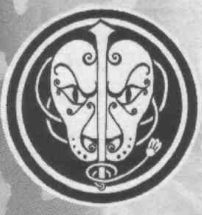
The Akodo mon, a lion's face/war fan. Goofy as shit.
The Akodo family are the leaders of the Lion, known for their unswerving loyalty to the Emperor. Their version of history tends to be dry, comprising detailed accounts of battles and declarations of their legendary heroes. They feel all actions are watched by past Akodo, stretching through the family daimyo all the way back to Akodo himself. No Akodo is incapable of reciting their lineage back to him, and all do so at their gempukku (this may take hours) This not only honors the brave men and women of the family line, but also serve to remind the Akodo that they are part of the family too, brothers and sisters all. The Akodo family structure is very clear cut, and every member knows their place. It focuses in the whole instead of the individual, and where Matsu history is full of heroes single-handedly overcoming the odds, the Akodo hero is someone who gives their life for the legion, or sacrifices their own honor for the sake of the Clan. To the daimyo, the office is a service to the Clan: to bring the Lion glory instead of raising their own. Many of the duties of the daimyo take them far from Lion lands, and often they leave the actual fighting to the Matsu. This is not to say that the Akodo don't fight (their force is the most disciplined fighting legion in Rokugan), but they are as comfortable off the field as on and are expected to handle duties of honor and etiquette just as skillfully as a katana. The Akodo train for leadership: they're raised to know that they are part of an army, and take their duties very seriously. As leaders, honor is the most important virtue: without it, a leader is nothing more than a butcher of men. A properly led unit cannot be defeated, and for the Akodo this is an unarguable truth of the universe.
The current daimyo of the Lion is also the Akodo daimyo. Only three times in history this has not been so. At White Stag, the Akodo provided a guard for the Emperor as he went from Otosan Uchi to the coast to attempt a parley with the gaijin. A large volley from a nearby ship hit the party, and the Emperor, the Lion Champion and all the Akodo troops were wiped out. There were no Akodo of age left to take over, and a Matsu was called forth by the new Emperor to serve as Champion. Under her command, the Lion crushed the last bastions of the gaijin in Rokugan. The second non-Akodo Champion is thought to be an apocryphal tale, as only the Scorpion claim he existed: an Ikoma regent that ruled during a period when no clear Akodo line of succession could be established. The Ikoma themselves have no record of this occurence. The third non-Akodo Champion was Matsu Itagi, he who went on a foolish quest into the Shadowlands in Way of the Crab. The current daimyo is Akodo Toturi, one of the most unconventional and inventive generals in Rokugan. Taken from the Lion schools at an early age and sent to a monastery, he took the mantle of Champion at the time of his brother's death and has served for the last five years. Though his men serve him loyally, there are questions about his ability to lead - particularly from the Matsu.
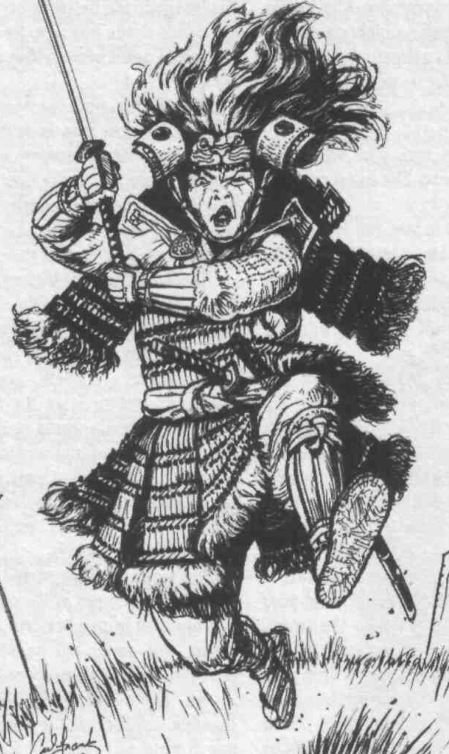
LEADERSHIP
We also get a brief on the Lion army as well as an extract on Leadership, Akodo's treatise on "civilized" warfare. It was written near the end of the great warrior's life, but he left half of it unfinished so that his successors could add their own insights. Thus, Leadership is less a single work and more a collection of thoughts of all the Lion daimyo on the three most important aspects of Lion life: bushido, battle and leadership. The manuscript hasn't remained in original form over the centuries, as some of the document contains Lion battle secrets and other portions have been considered heretical. The "canon" versions agree about certain basic premises of leadership and honor; other versions detail subterfuge and deception and are often reviled as Scorpion treachery. In truth, Leadership discuss various "dishonorable" means of warfare, like deception and thievery: Akodo's final words in his text are an admonishment to serve the Emperor and against protracted wars that waste lives, supplies and the Emperor's land.
quote:
THE TEN ORDERS
1.- Always carry a text with you. When you have nothing else to do, read. The mind must be exercised as well as the body.
2.- When your lord calls to you, run to him, fall at his feet and speak his name loudly and proudly. Proclaim your loyalty to him with a shout that is painful to the throat. Be convinced in your loyalty, for if you are not, then your lord will not be convinced either.
3.- Keep your sword close and ready and clean. Failing your sword is failing your lord.
4.- Keep servants if you must, but only if you must. If there are repairs to be done on the house, make them. If there are rooms to be cleaned, clean them. Idleness is an enemy, and it is always best for a samurai to understand a thing before he requires another to do it for him.
5.- Lady Sun and Lord Moon made us with a left hand and a right hand. In the left hand goes the text, and in the right hand goes the sword. Remember this.
6.- When you come before a superior, drop your hands at your sides and bow lower than they. Dropping your hands away from your sword shows your trust. Bowing your head does this as well. These two actions say, "My life is yours to take if you wish."
7.- Rise in the morning before your servants do and have half their duties done before they have even bathed. Men follow the example of those they admire.
8.- Assassins creep in the late hours, so go to bed early. Then, when they creep in at midnight, you will be fresh and rested and ready.
9.- Wash. A dirty man must itch and scratch. An itching and scratching man is slow.
10.- Be ready to die.
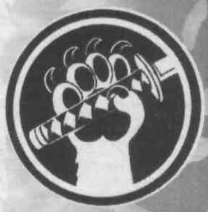
The Matsu mon, a lion's paw holding a sword. Not much else to say.
The Matsu are a tall, proud family, who rarely dye their hair in the fashion of others in the Clan. Their ancestor (the book says 'ancestress', is that a word?), the first Matsu, was the last companion to join Akodo, and the only one that the Kami sought to join him. Matsu is said to have been tall, iron in her eyes and a spirit of steel, with unparalleled prowess in the battlefield. The story is known: she used to train warriors in the old ages, scorned the Kami's quest for men of worth, and when he finally sought her out she took it as an insult and challenged him. The legendary duel has been represented time and again, and it always ends with Akodo defeating Matsu but without her being forced to marry him. She still joined the Clan and it is said that Akodo continued trying to woo her, but that she refused all of her advances. She chose Akodo's fourth follower, a man whose name has been forgotten since as her husband - in one play, she tells Akodo that if she marries him she will be Akodo's bride, but if she marries the other man he will be Matsu's husband. Since that day, all men that marry into the house must take their wife's surname, and all Matsu men that marry outside the house must relinquish their family name. The other families do not dispute the Matsu's leadership in battle: Akodo give the orders, but Matsu charge into the field and direct the troops. They are hot-tempered, emotional and intractable, but also courageous, loyal and fierce. They epitomize other Clans' view of the Lion, for good or ill. The Matsu are torn in their attitude towards Akodo's philosophy just as much as the Akodo are undecided about the Matsu: they mock their cousins for their "silly circle-walking," while the Akodo reply with derision about their lack of control in the battlefield. They find court dull, the arts 'foppish' and the Tao a riddle to be contemplated after death. Only their idealism and vision of the importance of honor, justice and ethics separates them from the Hida family's pragmatism. Matsu children are trained for war since age six, and their gempukku is not a joyful ceremony but a brutal ordeal where the prospective adult must recite the tenets of Leadership from memory, demonstrate a working knowledge of twenty weapons of war, and quarter a pomegranate with their katana. The would-be samurai is also beaten four hundred times with a bamboo rod, must fast for three days and eat a bowl of gruel while surrounded by sumptuous meals, and is marked with a white-hot poker in the shape of the Matsu crest. Any show of discomfort or failure at any point is grounds for dishonor and seppuku, which the Matsu consider a great boon: the child failed to become an adult, but in their mercy the family allows them to carry out an adult's act. The Matsu daimyo is chosen in a contest where they must beat all other contenders in combat, sometimes to the death even though they use wooden blades. The Akodo don't understand this ferocity, and shun the Matsu's brutality and violence. Not even the Crab ignore the threat posed by a Matsu army, and no sane man knowingly questions a Matsu's honor. One of the most renowned units in Rokugan is the Lion's Pride, an all-women Matsu special force similar to the Unicorn Battle Maidens whose tactics remain virtually unchanged since the first group of women that came to serve Matsu: find the enemy leaders, and destroy them. No men is allowed to serve with them, but the Matsu daimyo must live with the unit for half a year to gain their loyalty, even the rare male Matsu daimyo. Many Lions are also part of the Deathseekers, originally the legion of a fallen minor Matsu daimyo who betrayed his people to the Scorpion. His own men torn him to pieces and requested seppuku of the Matsu family daimyo, who (since she could not risk losing that many soldiers) instead commanded them to lay their lives in the battlefield. Now, the Deathseekers are formed of the doomed and dishonored, leading the Lion forces into battle with viciousness matched only by their disregard for their own safety.
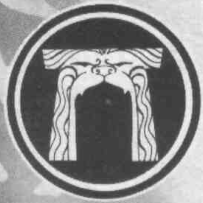
The Ikoma mon, supposed to be a gate to nothing

The Ikoma family's records say that in his search for men, Akodo came upon an inn where "the strongest man" lived. He entered the inn, where everyone knelt before the Kami, and challenged them to test their skills. Silence followed, broken by the cackle of an old man who thought he was funny. Akodo started getting pissed, especially because the old man clearly had no respect for him, and even dared to call him "boy." The old man remarked that Akodo was ready to charge him witout even knowing his name: he was Ikoma, the strongest man in the world. He started showing him his scars: here from an oni's claw, there from a geisha-turned-bog hag, one eye lost to someone who trained under Kakita. Akodo said that he was lucky; Ikoma replied that the Fortunes had been at his throat all his life, but he beat them too. Finally, he said that if Akodo wanted to fight him, he could - but he would not walk away from it, even if he won. He would miss one eye, a finger or two, maybe keep his toes. And it would be a real fight. No swords, no knives, just them and their hands and feet and teeth until one cried for mommy, and Ikoma didn't know his mom's name. Finally, Akodo accepted that he was the strongest man in the world, and didn't want to fight him - that day. The Ikoma are the clan's historians, the keepers of all the records of battle. They are also fierce warriors and bold tacticians. Their bushi follow the Akodo path, and it's not uncommon for Ikoma to attend the Akodo school for at least part of their training. They are also more peaceful than other families in the. Their interest in accurate records of history means they'd rather learn from each incident than treating it as a loss of failure. A skilled Ikoma general can provide a depth of understanding to the Clan's battle strategy that otherwise might have been lost. They also have the ability to remain impartial and maintain neutrality even in the face of violent emotions: this puts them as the Akodo's right hand even in inter-Clan politics, while the Ikoma are also sent to the Imperial Court to bring balance and peaceful neutrality to Lion negotiations. To them, the courts are just another type of battlefield. Only once have the Ikoma lost their temper publicly, when Bayushi Kachiko was declared advisor to the Emperor: the offending Ikoma ambassador was swiftly forced into seppuku and the Lion diplomats were removed from the Emperor's presence for no less than an entire season. They keep full copies of all four major treatises in Warfare (Leadership, The Sword, Niten and Lies) and are said to own the only complete, unedited copy of Leadership, which routinely is changed to suit each Emperor's views on warfare. In truth, Akodo's text was declared heretical by the seventh Hantei, who claimed Akodo would have never written a treatise advocating for deception in the battlefield. When each Champion retires, they are expected to offer their journals to the Ikoma, who collect them and add them to the book of Leadership.
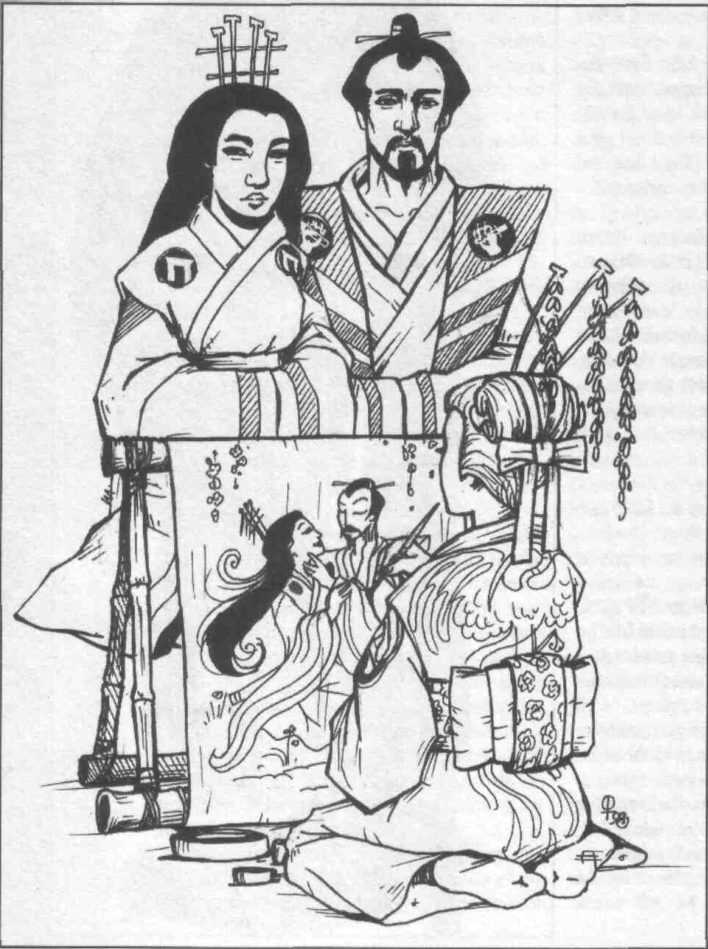
Not Photoshop, but it'll do.
Their tradition of omoidasu or bards serves a very important role: bards are historians, keepers of law and the Clan's heart. They are warriors, but they remember all actions - brave, cowardly or otherwise; they remind Akodo and Matsu of the consequences of their actions; they mourn publicly so that other Lions don't lose face showing their emotions. Becoming a bard is very rigurous work that requires the prospect to recite the lineage of at least three families at the age of twelve. The Ikoma also draw a distinction between true history and the folk tales that spring around them. The historians maintain history and bards tell stories: each has their purpose and the Ikoma don't allow them to become confused. Many Ikoma bards serve Lion daimyos but others are known to wander Rokugan or even serve at the side of other Clan daimyo in exchange for favors. Once a year, they return to their school to tell the stories they gather, and add them to the Ikoma histories.
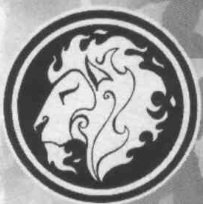
The Kitsu mon, an image of the original kitsu leader. Confusingly, he was also named Kitsu.
The Kitsu family is one of the most unusual and enigmatic shugenja families of Rokugan, and they have the only school that forbids entrance to non-Clan members. They keep the ancestral lore of the Clan, rather than the physical histories of the Ikoma. Their duty is not just to their daimyo and Emperor, but to the thousands of Lions that have lived and died. The Kitsu keep their memories and protect their spirits. The reason their school is so selective concerns the initial founding of the house, the true story of which is disputed between Kitsu and Ikoma. Before humans were created, strange races roamed the world. Many storians believe this was the time of the Naga, strange snake-like beings with torsos like those of men. Some Crab historians also believe a race of Nezumi formed a society at the time, in cooperation with the Naga. If myth is to be believed, there was also a third great race, one with the form of huge cats with golden manes and ferocious claws. These kitsu wrere mighty hunters and keepers of the spirit realm. When the humans were created and Fu Leng fell, the ancient races were eradicated. The Naga descended into a great sleep, the Nezumi were scattered across the earth, and the kitsu took refuge in the mountains that would one day be ruled by the dragon. At first humans did not recognize the kitsu as sentient and hunted them, which the kitsu took as a declaration of war. At last, Hantei ordered Akodo to contain the "dangerous beasts," and he started genociding their whole species. At the end, when only a handful of kitsu remained, they gathered in a hidden valley to give their lives for their leader. Akodo fought their leader, but he escaped and roared loud enough to shake the walls of the valley, startling Akodo and making him fall to his knees. Instead of taking the opportunity to tear his head off, however, the kitsu stared at him with hate-filled eyes, waiting for him to rise. Akodo did, made his men stop, and after a long moment he bowed. The kitsu bowed in turn. It was relatively simple to make peace after that. For years thereafter, the Kitsu say, Akodo traveled to the valley and atoned for the innocent creatures he had massacred. Neither party broke the treaty, but the kitsu did not thrive. No new kitsu were born, and at the end the species was down to five individuals. The myth grows strangest here: it's said that Akodo went to the kitsu valley, then returned with five men with magnificent bronze-gold hair, which Akodo claimed were the last of the Kitsu transformed by the Sun Goddess into human form. The men swore their loyalty to Akodo and eventually married his daughters, and from these five the Kitsu family descends. Whether the tale is true or not, the family seems to have a tremendous gift for spirit magic, possessed only by pure-bred members of the Kitsu. The family has maintained rituals for nearly a thousand years, acting them out exactly as their ancestors did. They know this to be true, for their ancestors tell them so. They actualy travel to the land of the dead in search of their ancestor's wisdom, and sometimes can even bring the spirits of the dead back, allowing them to speak with their voice, see through their eyes or actually incarnate in the Kitsu's flesh. Kitsu children regularly see spirits and talk to "invisible" friends, and a child of the family showing little of the traces of the blood is a concern to all in the small family. Children without the talent are quickly married off to other families or encouraged to make their way in life through the other Lion schools. No outsiders ever attend Kitsu gempukku ceremonies, where they must recite their ancestors all the way back to their family's founding, and it is said that the ancestors judge the initiate in this ceremony. If the shugenja to be cannot convince the spirits that they are worthy, they are stripped of their abilities and forced to leave the family in disgrace; a few of these unfortunates turn to the darkness and become feared maho-tsukai.
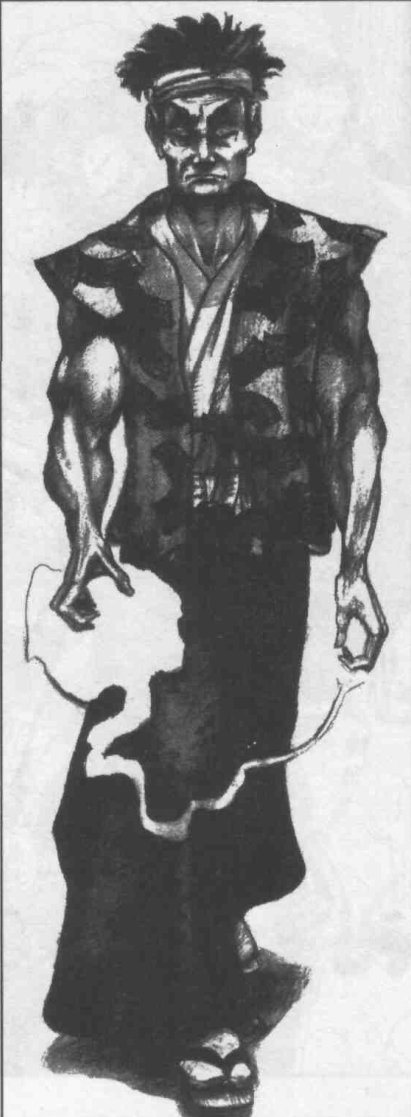
Nice camo, also those arms

Next: that was almost half the book, holy shit
Way of the Lion: FOR THE EMPRAH
Original SA post Legend of the Five Rings First EditionWay of the Lion: FOR THE EMPRAH
New character options! For new Skills, we have Bujutsu. Instead of having all weapons use individual skills except for Kenjutsu, now we have a number of skills that cover a group of similar weapons. Characters are considered to have the relevant weapon skill at the same level as the bujutsu, except for Ninjutsu that works in a slightly different way. Iaijutsu is explicitly not a bujutsu skill. We have Bojutsu (bo stick: bo, jo) Chisaijutsu (war fan: tessen), Jiujutsu (hand to hand: Kaze-do, Mizu-do, they probably don't mean mastery of both skills but
 ),
Kenjutsu (swords: katana, bo-dachi, wakizashi),
Kyujutsu (archery: dai-kyu, yumi)
Nofujutsu (peasant weapons: jitte, kama, nunchaku, sai, tonfa; this is considered a Low Skill),
Subojutsu (tetsubo: dai tsuchi, tetsubo, ono),
Tantojutsu (knife: aiguchi, tanto, kama),
Umayarijutsu (lance),
Yarijutsu (spears: nagamaki, naginata, yari, nage-yari, sasumata, sodegarami) and
Ninjutsu (ninja weapons: ninja-to, shuriken, blowgun, nageteppo, tetsubishi, han-kyu). Ninjutsu is different in that getting one rank in the skill only gives the character competence with one of the weapons it covers. With each rank, the skill with the chosen weapons increase and they gain access to a new weapon. There is also
Lore (Ancestors) to know all about them ancestors, as a High skill. For
new Advantages we have
Balance (ignore any modifiers to Honor rolls, get Void + 2 in Raises during Iaijutsu - holy poop, but Matsu can't take it)
Bloodlines (Kitsu only, they keep two extra dice in spells and abilities involving clan ancestors and they cost only half their original CP value),
Combat Reflexes (for 6 points you can change initiative with the character right above you),
Natural Leader (grants followers one rank in a skill that the character is using when leading by example, the leader must have the skill at 3 or better) and
Tactician (trained at the Akodo War College, can modify Battle rolls by 3 points up or down).
New Disadvantages are
Antisocial (uranurd, 2 points for keeping -1 die in all social rolls or 4 points for -2, keeping 0 dice is an automatic failure),
Coward (roll and keep -1 die when facing someone with a higher Glory rating for 3 points, 4 for Lion; -2 for a 6/8 version, and both can be canceled for one round by spending one Void Point),
Deathseeker (character starts with no Glory and can never gain it, gg),
Dishonored (character starts with 0 Glory, can't spend any XP until they gain Rank 1 Glory and then can only buy up to three skill ranks, 1 Ring Rank or 1 Trait Rank (total) per adventure, ouch)
Forsaken (the ancestors don't talk to or care about this character, not quite a Dark Secret but pretty bad),
Idealistic (Honor gains/losses are increased by 1 point for every 5, so a 5 point gain becomes 6 and a 10 point loss becomes 12), and
Proud (you're the best, around! Nothing’s gonna ever keep you down!)
),
Kenjutsu (swords: katana, bo-dachi, wakizashi),
Kyujutsu (archery: dai-kyu, yumi)
Nofujutsu (peasant weapons: jitte, kama, nunchaku, sai, tonfa; this is considered a Low Skill),
Subojutsu (tetsubo: dai tsuchi, tetsubo, ono),
Tantojutsu (knife: aiguchi, tanto, kama),
Umayarijutsu (lance),
Yarijutsu (spears: nagamaki, naginata, yari, nage-yari, sasumata, sodegarami) and
Ninjutsu (ninja weapons: ninja-to, shuriken, blowgun, nageteppo, tetsubishi, han-kyu). Ninjutsu is different in that getting one rank in the skill only gives the character competence with one of the weapons it covers. With each rank, the skill with the chosen weapons increase and they gain access to a new weapon. There is also
Lore (Ancestors) to know all about them ancestors, as a High skill. For
new Advantages we have
Balance (ignore any modifiers to Honor rolls, get Void + 2 in Raises during Iaijutsu - holy poop, but Matsu can't take it)
Bloodlines (Kitsu only, they keep two extra dice in spells and abilities involving clan ancestors and they cost only half their original CP value),
Combat Reflexes (for 6 points you can change initiative with the character right above you),
Natural Leader (grants followers one rank in a skill that the character is using when leading by example, the leader must have the skill at 3 or better) and
Tactician (trained at the Akodo War College, can modify Battle rolls by 3 points up or down).
New Disadvantages are
Antisocial (uranurd, 2 points for keeping -1 die in all social rolls or 4 points for -2, keeping 0 dice is an automatic failure),
Coward (roll and keep -1 die when facing someone with a higher Glory rating for 3 points, 4 for Lion; -2 for a 6/8 version, and both can be canceled for one round by spending one Void Point),
Deathseeker (character starts with no Glory and can never gain it, gg),
Dishonored (character starts with 0 Glory, can't spend any XP until they gain Rank 1 Glory and then can only buy up to three skill ranks, 1 Ring Rank or 1 Trait Rank (total) per adventure, ouch)
Forsaken (the ancestors don't talk to or care about this character, not quite a Dark Secret but pretty bad),
Idealistic (Honor gains/losses are increased by 1 point for every 5, so a 5 point gain becomes 6 and a 10 point loss becomes 12), and
Proud (you're the best, around! Nothing’s gonna ever keep you down!)
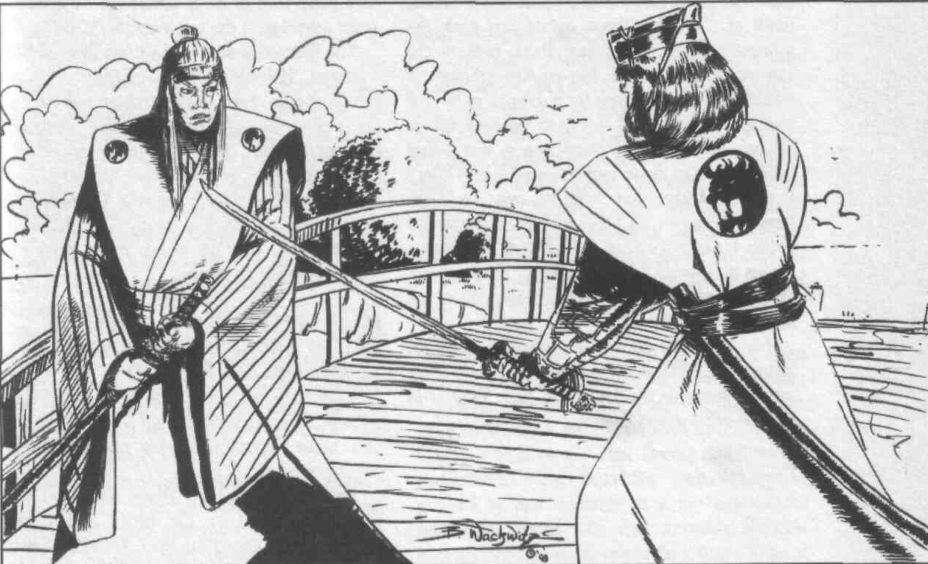
Those arms... I'm rooting for the Lion on account of the hat, though.
The Akodo have the Akodo War College. This school is just like the corebook Akodo bushi school, except that the benefit is +1 Perception and the skills are Archery, Kenjutsu, Battle 2, Bard, History 2.

The Ikoma family (+1 Intelligence) teaches the Ikoma Bard school. +1 Intelligence, 3.5 Honor. Their skills are Bard, Calligraphy, Heraldry, History, Law, and any two Lore skills. Bards don't have techniques. They spend a great deal of time seeking out samurai whose experiences they can turn into great tales of glory and honor. In game terms, the bard must seek out a patron samurai at every School Rank. At the game's start they are considered to have already found and made known one samurai's tale for their Rank 1, and the player is encouraged to detail this samurai's history. They must find a new patron before they can hit Rank 2. After the samurai's story is done, the bard must take their findings back to their daimyo and present them in court with an Intelligence + Bard check with a TN equal to the samurai's Glory x 5. If this succeeds, the samurai gains Glory points equal to the bard's School Rank, which can push them to their next Glory rank without their daimyo's permission (though it would be rare for a daimyo to deny a samurai honored by the Ikoma) The only restriction is that the bard cannot raise someone's Glory higher than twice their own. The bard also gains an equal number of Honor points and the samurai becomes a Major Ally. Finally, Ikoma don't lose Honor or Glory for expressing emotions in public.
Eh. I'm not really sure about these guys. They bring little to the table and their major mechanic thing is a end-of-adventure bonus for someone else.
Some members of the Kitsu family can commune with the lingering spirits that haunt Rokugan. These are known as the Sodan-senzo, those who speak to the ancestors. Many Kitsu have little or no traces of their ancestors' blood, and these are trained like regular Kitsu shugenja. Kitsu characters that wish to be more connected to their ancestors must purchase the Half-Blood Kitsu Ancestry (3 points, can Sense ancestors, if they are shugenja their starting spells are reduced to 2 Water and 1 Fire) or Full-Blood Kitsu Ancestry (6 points, the character can Sense, Commune and Summon ancestors, but can't cast spells) The Sodan-senzo school (+1 Intelligence, same Honor and outfit as shugenja) teaches how to get in touch with the ancestors - not just Lion ancestors, but those of all major families in Rokugan. The sodan-senzo can only commune or summon ancestors whose Character Points value (when bought as an Advantage) doesn't exceed twice their School Rank. For spirits that don't have a CP cost, this value is their Air Ring x 2. Sensing ancestors takes no roll, and the shugenja can see, hear, touch and even smell the spirit. Spirits can normally become invisible at will, but not from a Kitsu that uses Sense. Even if they are not present, the Kitsu may feel if a spirit has a particular connection to a place, person or thing. Communing with ancestors also takes no roll, though it bears noting that not all ancestors are amiable and many refuse to speak with the living, especially if they had a bad death. Summoning ancestors is an Intelligence + School Rank roll against a TN of the ancestor's CP value x 5. No Raises are allowed in this roll, and the character must also spend a Void Point as an additional cost. If successful, the Kitsu is filled with the essence of the ancestor for their Void Ring in hours, and gain all advantages and disadvantages of the ancestor as if they had been created using them as an advantage. The Kitsu can summon a number of simultaneous ancestors up to their Honor.
Eeeeh. Giving up spells for this seems like a bad deal, even if you can score Kakita Rensei as a Lion. The idea of sensing and communing with the old spirits is cool, just not "make a non-casting caster school for it" cool.
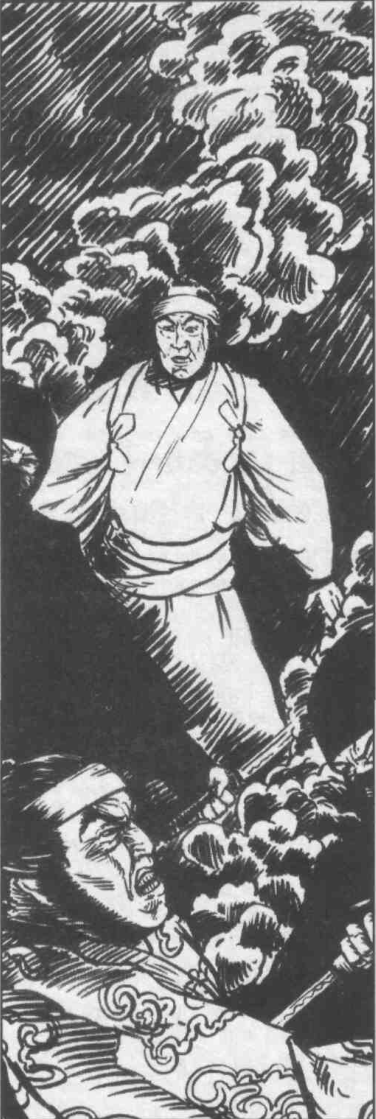
CAN'T GET A GRIP
The Matsu teach the Matsu Bushi school. +1 Reflexes, 3.5 Honor. Their skills are Archery, Battle, Hand to Hand, History, Kenjutsu and any two Bugei skills that aren't Defense.
- Rank 1: the bushi creates a Fear effect equal to their School Rank +1 when making a Full Attack. (opponents must roll Willpower against the Fear rating x 5, failing this means they can't use Void Points and drop all dice that roll lower than the Fear rating)
- Rank 2: the bushi gets two attacks per turn when making a Full Attack.
- Rank 3: the bushi roll initiative dice equal to their Honor.
- Rank 4: the bushi may attack twice per turn. If using the Rank 2 Full Attack, they get three attacks per turn.
- Rank 5: if the bushi makes a Full Attack, they ignore Wound penalties up to their Honor rank. This doesn't apply to Down, Out and Dead levels.
Yeah, now this is what I'm talking about. That Fear effect only gets better in time, they will go first with their Rank 3 and then fuck your shit up with multiple Full Attacks. Much better than the other
 Lion schools.
Lion schools.
The heritage tables follow, of course. Instead of having only one BAD EVENTS table, the bad events are spread across all the other tables. The Shamed Ancestor table is still there, though it bears noting that there aren't "haha, you're a shitty ronin now" events. Just the chance to start with the Forsaken or Deathseeker disadvantages for no points, or a lot of Black Sheep results. Also their Fortune Table rolls cost 3 CP instead of 4, and you have a chance to get a cat so like why aren't you buying yourself a cat right now.
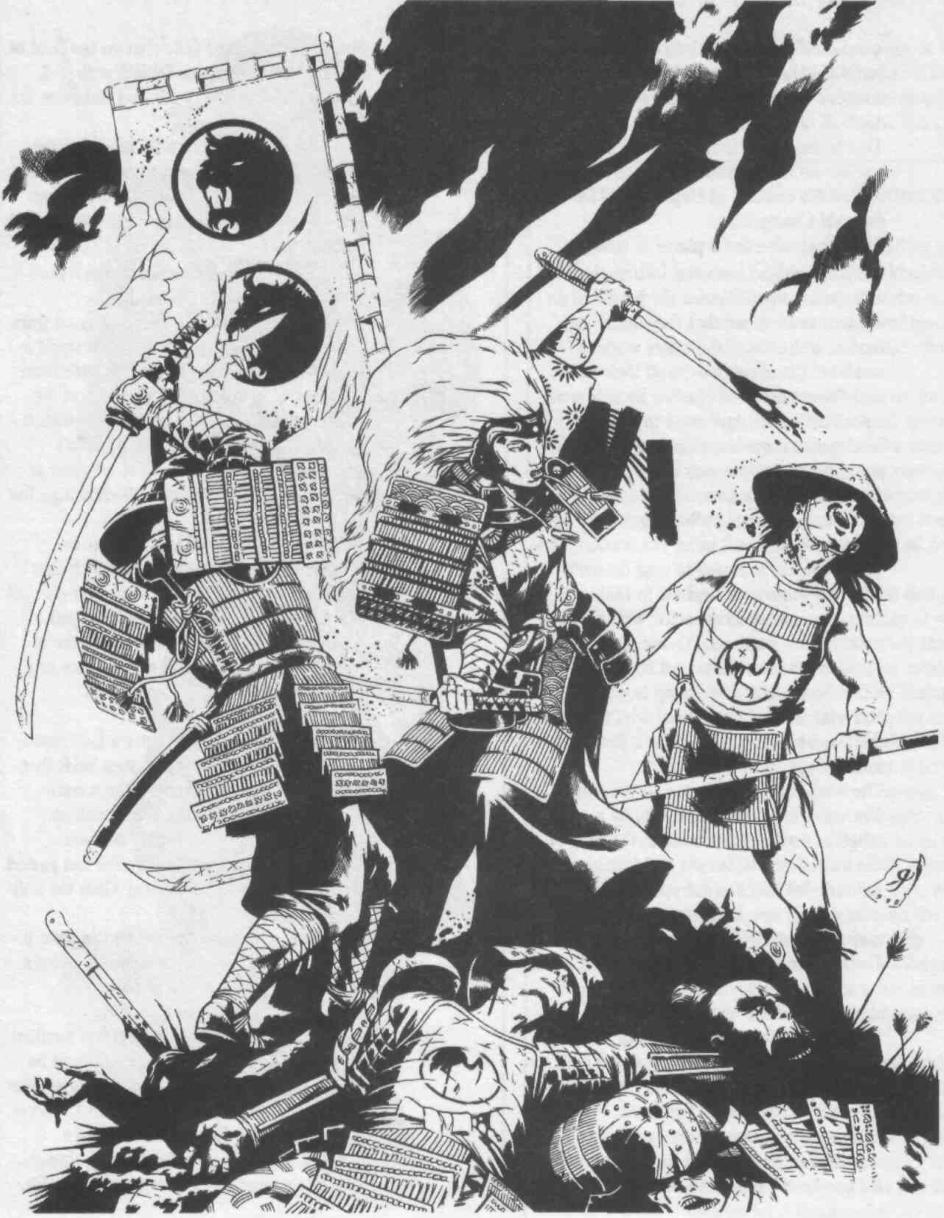
Matsu-san you're not a Dragon stop that right this mom--urk
Next: rev up that metaplot.
Way of the Lion: aaaaaaa
Original SA post Legend of the Five Rings First EditionWay of the Lion:

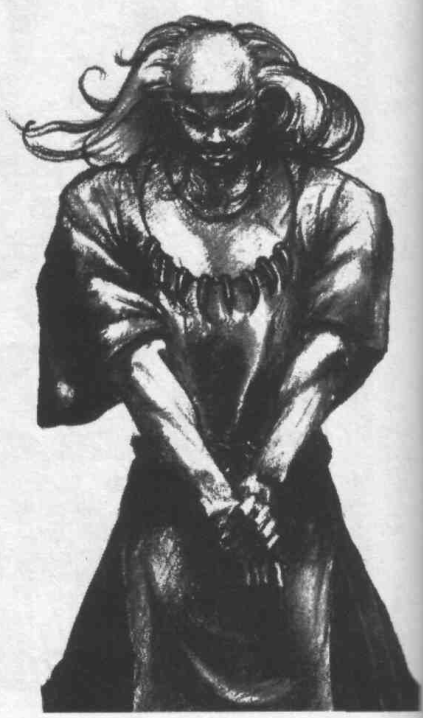
TEST YOUR MIGHT
Time for our important NPC section. We start with Akodo Kage. He was son of a lesser Akodo lord, raised in relative peace and then sent to the Akodo bushi school. At a young age, he proved adept in the physical arts, quickly mastering kenjutsu and studying numerous methods of hand to hand combat. As a youth, he served in the Emperor's personal guard as well as the Akodo armies, skipping many ranks due to his proficiency in arms. This gained him enemies, but he was a fit commander. The Emperor himself asked him to join the Imperial Guard, where he distinguished himself and also served as an Imperial magistrate in the capital. He is kind of a hermit, rarely speaking his mind and practicing what he calls 'reclusive meditation' which involves long journeys to the Phoenix mountains. He married the Emperor's cousin, and it was whispered that he would assume the throne if the Emperor did not have a heir. He did, and five years later his wife died of the plague: Kage was grief-stricken and never remarried. Turning to the study of the Tao, he met a young Akodo Toturi in a monastery, and grew interested in the boy, teaching him bushido and kenjutsu. He even asked his Champion to allow Toturi to return with Kage as his tutor, but he was refused. Only when Arasou died in battle did the Akodo finally listen to him. Since then, he has been revered as one of the most honorable sensei of the Akodo house. He tried to avert battle between the Lion and Crane before Arasou's attack on Toshi Ranbo, and though he was not successful the Crane remember his efforts. He was also instrumental in making peace with the Unicorn after a border skirmish led to a troop of battle maidens riding off a cliff rather than dying at the hands of bandits; Kage managed to avert open war and rescue the Lion troops that had invaded the Unicorn lands while searching for the same bandits. He has often visited the Unicorn lands since, and many of the Shinjo consider him a man of great wisdom. His current most promising student is Matsu Hiroru, younger brother of the Matsu daimyo. Kage is not dishonorable, but knows that sometimes the rules of bushido must be broken for the good of the Clan, yet deep inside knows that bushido keeps civilization alive. Without it, all would surely fall to ruin. Akodo Bushi 5, great stats and skills, solid duder. He's got Major Allies (unknown) and Sworn Enemies (unknown), and both Toturi and Hiroru as Dependants even though those two are more than able to take care of themselves.
There's only one other thing. His Honor is 4.2, and that's what all Honor-interacting mechanics use. But his real Honor is 0.5. And he's got a Dark Secret: he's
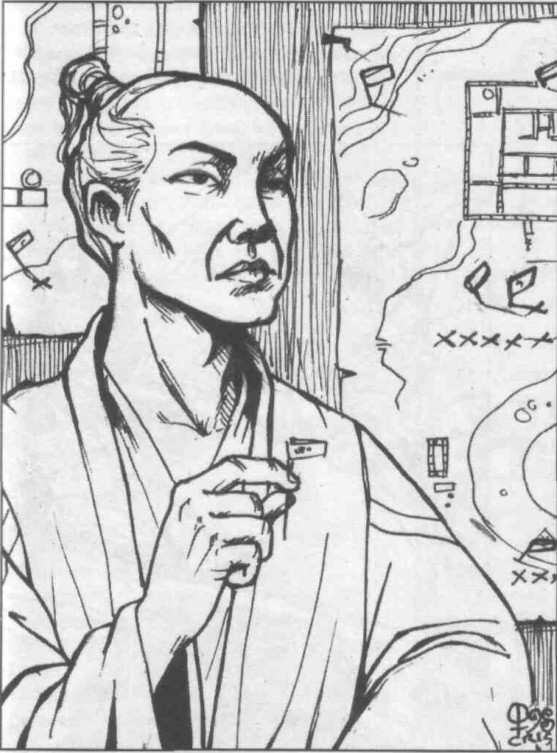
He also has Lore (Warhams) A Low skill.
Akodo Toturi was the first son of an Akodo and Matsu couple. Before his birth, Akodo and Matsu samurai were not allowed to marry due to the competition between both houses and to avoid the strife such a child would cause. However, his father (youngest son of the Champion) was allowed to marry the youngest daughter of the Matsu daimyo as long as any male children were raised as Akodo. His father did not do this for love or power, but to strengthen the loyalty between the feuding families: the Matsu had been gaining significant power through their battles with the Crane and threatened the Akodo power within the Clan. When he was born, the Akodo celebrated him as an heir to his father's house, but the Matsu expected a daughter and assumed he would be a weakling and failure. He was taken to the dojo at the age of 5, and his training was disastrous: he was meek and more interested in the Tao than warfare. Eventually even the Akodo agreed that the boy was useless, and they sent him to a monastery. For over ten years he was raised by the monks, dedicating himself to studying tactics and strategies and the writings of enlightened masters such as Uikku. The only Lion Clan member that paid any attention to the boy was Akodo Kage, who used much of his "meditation" time at the monastery working with Toturi so that he wasn't completely untutored in the martial arts. Back home, his parents had a second child, Arasou, who seemed to have all the aptitude for war and violence that Toturi lacked - he was soon proclaimed heir to the Akodo line on the back of his first major victory against the Unicorn. Both brothers met only rarely for festivals and formal occasions. Arasou was bethroted to Matsu Tsuko, daughter of the Matsu daimyo - an unprecendented move as it would mean that both houses would share a single leadership if Arasou became the Champion. Tsuko and Arasou were made each other and loved each other, but delayed their marriage as Arasou boasted he would give his bride Toshi Ranbo as a wedding gift. Arasou was killed in battle, however, and his uncle (the heirless Lion Champion) was mortally wounded. Toturi's father was too old to have another child, so he recalled him to lead the Akodo. Toturi was not ready, but he threw himself into his new duty and the Lion have thrived in the years since, though Tsuko never accepted him. He considers strategy more important than bloodshed, and his skill in tactics and ability to negotiate have given him the reputation of a good daimyo, if not a good warlord. He is engaged to marry Isawa Kaede, Mistress of the Void. Their wedding was arranged when both were infants, and both have not spoken for many years other than by letter. Akodo Bushi 4, has the Ear of the Emperor and a Great Destiny! Also an Obligation to Kage and True Love (Hatsuko)
 He also has Lore (many) at 3-5, because.
He also has Lore (many) at 3-5, because.
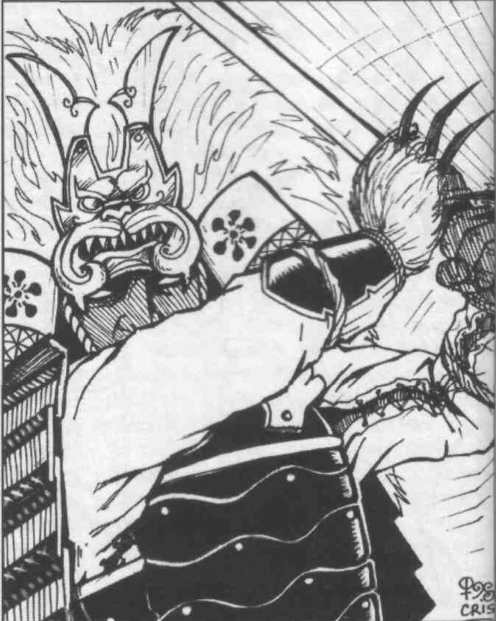
The DARK SAMURAI. Really.
Ikoma Ryozo, the DARK SAMURAI, was born twisted and deformed with shrunken limbs and withered hands. Many thought he would die, but his mother prayed to the Fortunes to save him: next morning, his limbs were straightened and he was whole. It was called a miracle, a gift from the Sun Goddess to his mother, who came to be revered as a paragon of virtue. His father, a former Matsu, spoke little of his birth and rarely approached his wife after that night, with rumors that he did not want to stain her purity or tempt fate with another child. The truth is, he did not want to know how she had performed the miracle: Ryozo's mom had dabbled in maho all her life, and her journals contained strange magics and other dark rituals. When his father discovered the truth, he burned the journals and forbade her to practice magic, and they never discussed the matter again. She retired to a convent after her husband died in a skirmish, and Ryozo grew without knowing the truth of his miracle. He is fine warrior and superb leader, and he achieves a sort of uncanny clarity in battle: he calls it his "deathwatch", when time slows down for him, his body glows faintly and his hands leave trails of shadow. Other Lion that see his aura recoil and remember the tales of Ryozo's birth - surely this is the power of the Sun herself? He has dark skin, and considers his Taint to be part of his destiny. He rejects all attempts to identify or remove it, as he believes it to be a gift from Amaterasu. He doesn't consider himself dishonored by his 'birthmark.' Matsu Bushi 4, way below Insight, and with Death Trance and Deathwatch as Advantages. Deathwatch itself gets no mechanical support, though. Oh, and Shadowlands Taint 0.3.
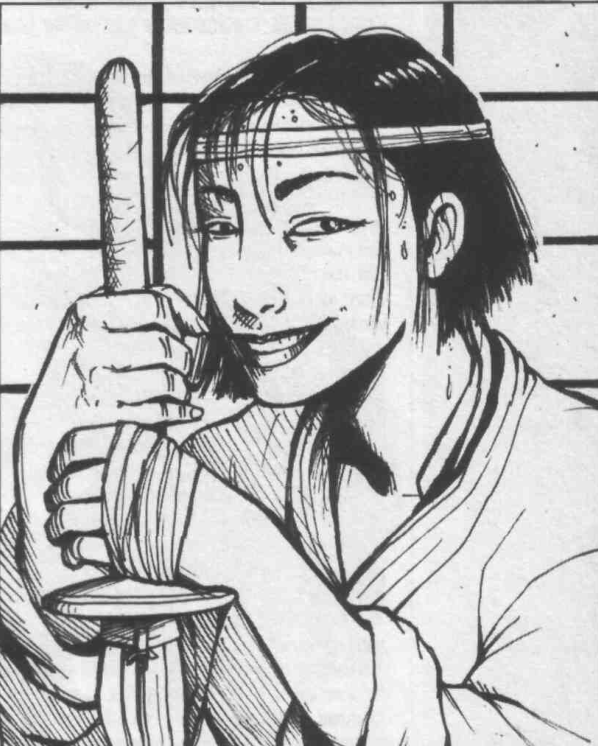
Fresh from a rousing session of beating the snot out of someone.
Ikoma Tsanuri had a very auspicious birth on New Year's Day, as when she breathed her first breath a crow flew into the room and rested on her crib. Afterwards, it was learned that a leper beggar at the city gate had been suddenly healed overnight. Her parents rejoiced at the omens, knowing their daughter was destined for greatness. The Kitsu daimyo himself suggested that she should be allowed to choose her own destiny. A fan, a mempo and a scroll were placed in front of the four year old child: she stood up, walked towards the throne, beyond it, and took a young Akodo Toturi's hand. Her parents were outraged, to the point of accusing the Kitsu daimyo of being a Scorpion imposter. Her father drew his sword and threw it at the shugenja's feet, and in the silence that followed the little girl picked up the sword with Toturi's help and gave it back. Her father fell to the ground and begged Toturi to raise her; he would commit suicide that night. For the next decade, she lived with Shinsei monks learning history, philosophy and religion, but her true calling was the martial arts, trained by Akodo Kage just like Toturi before her. She returned with Toturi to the Clan after Arasou died, and over the last few years she has served as his karo. She is worried about rumors of Matsu officers questioning Toturi's authority and her own, and she spars regularly with Matsu Tsuko to head off any difficulties. Akodo Bushi 1, but already the daimyo's karo? Nepotism!
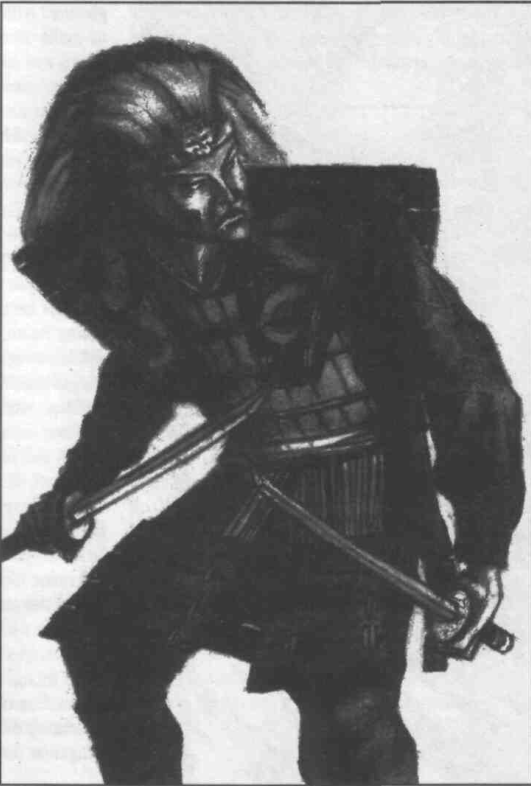
Speaking, stabbing, it's all the same innit.
Ikoma Ujiaki is the foremost Lion diplomat, though also trained with the sword. He fought as a banner-bearer in battles against the Phoenix and been in combat many times, transfered to the diplomatic corps when he received a near-fatal wound. Since then, he performs his duties with a savageness that matches his Lion battle fury. Every situation is a challenge to him and he takes defeat as a personal insult. He controls the Lion political strength, not afraid to using his contacts and allies to get the best of a situation. When the Crane ask the Emperor to have Lion armies withdrawn, he puts them in a strong position. When the Phoenix argue, he threatens. He is not a pleasant man; clever and arrogant, he uses brute force to gain what manipulation cannot. His hatred of the Crane is deep and he wastes no opportunity to oppose them. He used to be a diplomat to the Hantei court because of his lineage, but his temper and rashness cost him his position, something he blames solely on Kakita Yoshi. He's clever, but not brilliant, and can't stand not being told he is not one of the foremost minds of the Empire. Ikoma Bard 5, which really makes me wonder how he can deal with Doji and Bayushi courtiers. Or how he survived years of frontline battle. Also Honor 1.3. He does have an Intelligence of 6 - without the Shintao 3 to back it up. Needless to say, he's low on Insight.
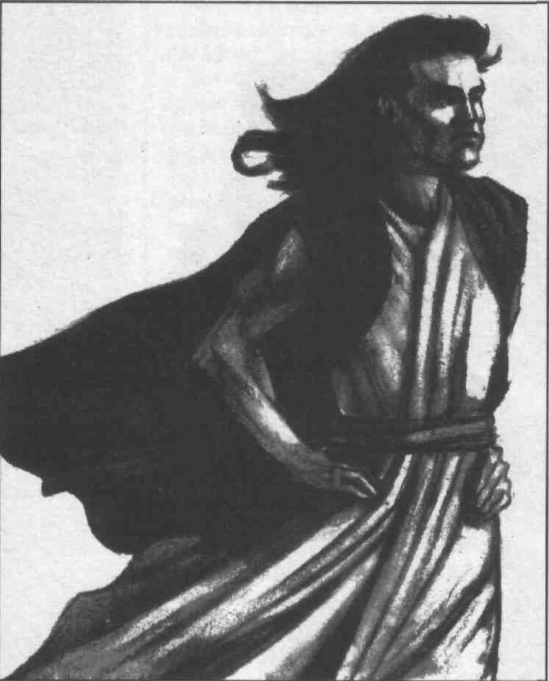
Say 'Kitsu Motso' three times fast.
Kitsu Motso was expected to join the Kitsu shugenja school since birth. He failed miserably. The ancestors did not talk to him, did not see or hear him, did not care about him. There were rumors about his mother's faithfulness to her lord, and he was devastated. All his life he had been assured by his father, the Kitsu daimyo, that becoming a shugenja was his destiny and yet the Kitsu denied him. Instead, he joined the Matsu bushi school and turned his hatred and anger inside - he has never forgiven his ancestors for not giving him his 'rightful place.' It's rare that a Kitsu is born with too little of their ancestor's blood already, and even rarer for that child to be the daimyo's child. Yet with the Matsu he showed an aptitude for combat that seemed to make up for his lack of magic talent. His sword was swift, but he also had keen intellect and tactical acumen. He has served the Matsu family since his gempukku and follows their creed. But he has never settled down, never married, and never admitted to himself that he is anything other than content with his position in life. Some say he is the ideal choice for a husband to Matsu Tsuko now that her betrothed is long dead, others whisper he will be the next Keeper of the Hall of Ancestors. He is fearsome in the battlefield with his personal prowess and skill for tactics; he is also vain, arrogant, angry and his inner thoughts veer towards retribution and destruction of others. He has never forgiven the Kitsu shugenja, and doesn't ask for his ancestors' advice before going into battle. Matsu Bushi 4 with stats better suited for a Rank 1 PC, a Heart of Vengeance for the Kitsu, and a Kaiu Sword (!)
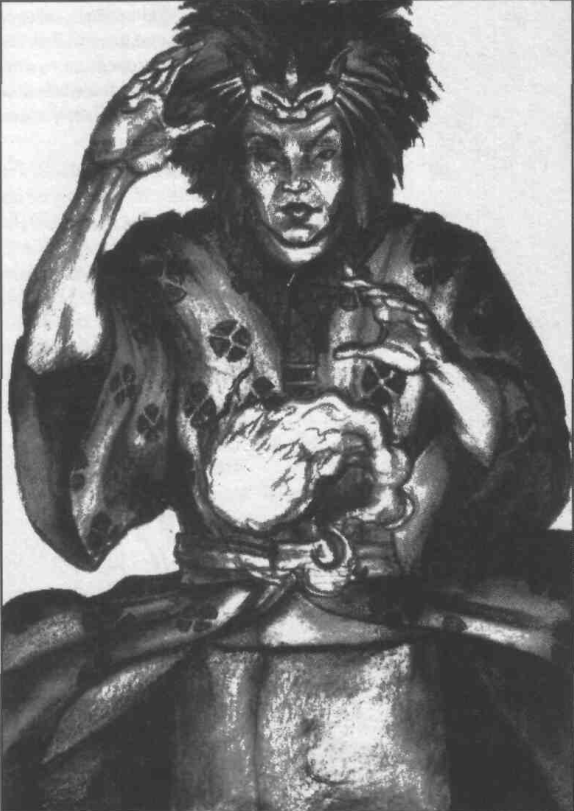
But Ancestors don't let you do that kinda thing!
Kitsu Toju is brother to Motso and one of the finest Kitsu shugenja. He has risen from the youngest son of a daimyo to head of the Sodan-senzo school and daimyo of the Kitsu family. He was a shy, quiet child, struggling to overcome a stutter that has accompanied him since birth. He was not the smartest or strongest of his brother, and little was expected of him - except that on the Day of Choosing, his abilities were proven. Where other children could only make fire dance or waver, he made the embers glow white hot, and in the fire's vision the spirit of one of the first kitsu extended a hand to the shocked child. He immediately joined the family school and learned the rituals and ceremonies needed to properly honor the ancestors. Outside the spirit world, he is shy, quiet and timid. His stutter prevents him from making long speeches, and he moves cautiously. He leads his family through example, and while not a charismatic leader, he is well-loved. In ritual, however, his eyes burn with passion, he loses the stutter and his voice soars through sonorous phrases. No other Kitsu has such mastery of the art as him, and the ancestors come to him as beloved brothers and sisters. Kitsu Sodan-Senzo 5, very low on Insight, with a Great Destiny and Innate Abilities--- but he doesn't use spells since he's got Full-Blood Kitsu Ancestry, does that mean he gets free Raises on ancestor summoning? What?
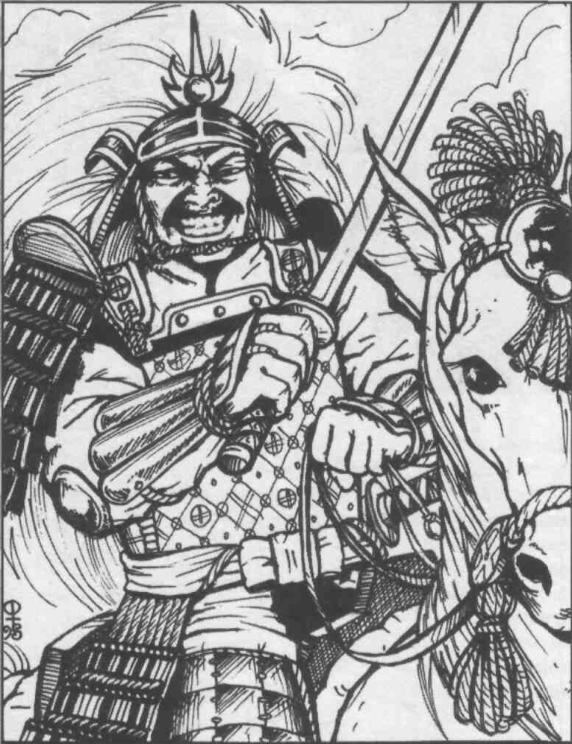
"Let's go fuck some shit up and get wasted."
Matsu Agetoki is the current leader of the Lion's cavalry, a fierce and wild samurai that lives life with a combination of anger and joy. He was enthralled with horses at an early age - he saw in them freedom and power that nothing else in Rokugan could bring. He has shown utter fearlessness while mounted, attempting feats that none save the Otaku Battle Maidens themselves would even consider. He killed his first man on horseback at the age of thirteen. No one has ever doubted his role in the Lion armies and since his gempukkue he has put everything towards leading his Clan's cavalry. He enters battle with a Crab's abandon, and while most of his commanders prefer to hold him back and use his unit's power to break the enemy, he sometiems can't wait that long and sends his troops onto the melee before they are truly needed. His men are well-trained, however, and he has learned to unleash them only when conditions are favorable. Tacticians may gnash their teeth at his impulsiveness, but he's never hindered military plans or cost unnecessary lives. He emphasizes speed on the battlefield (legend has it that he once plucked an arrow out of the air), and off the battlefield he is pretty much the same. He understands the rules of etiquette, but he is boisterous, laughing too loudly and punctuating his speech with wide arm movements. He looks down on the infantry like Unicorn do, but more out of pity - they suffer all the horrors of battle and never experience its true joy, he says. Matsu Bushi 4, maybe a point or so short of Insight but pretty okay otherwise. He's got Benten's Curse for being too much of a dudebro.

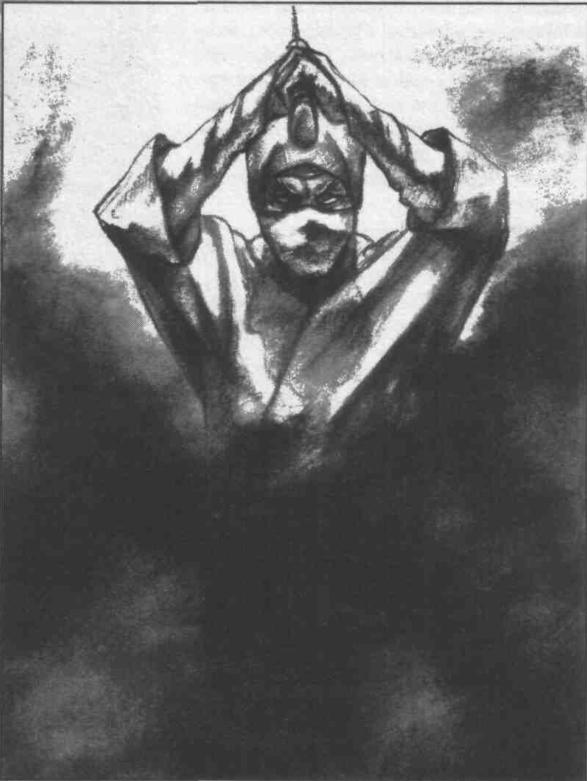
MASTERY OF TIME AND SPACE
Matsu Hiroru is the younger brother of Matsu Tsuko. He was a bold child that spoke his mind, and liked to use casual observation to shock and manipulate others. He learned while attending the seppuku of the wife of Shiba Ujimitsu (the Phoenix Champion) that words have a power of their own, and the right word - true or not - can control anyone's actions. When the Champion's wife fell dead, his little daughter came to her mother's body and cursed his name and the name of their ancestors; Ujimitsu cut her head off a moment later. One woman had died with honor, the other with shame; to Hiroru, both were bodies with no real difference from each other. ( He is a little edgy, this guy.) That image has followed him through his life, and he is plagued by the concept of death as the equalizer of souls. He is destined to become the Keeper of the Hall of Ancestors as the second Matsu child, and though he finds no comfort in them the souls of the dead speak to him as they would to a Kitsu. The statues know his bloodline, and his heart. He attended the Matsu school, where he grew bored and started playing pranks that went from childish amusmements to more dangerous diversions, creating him a reputation as a troublemaker. Akodo Kage (again, this guy!) noticed his prowess and asked the Matsu daimyo to oversee his training personally, to which she swiftly agreed. He trained Hiroru for six years in many styles of fighting, and both men gained confidence in each other. For many years, Hiroru delivered Kage's messages and performed infiltrations and other acts - all in the name of the Hantei, while outwardly being the ideal Lion samurai. When the Emperor commanded the Lion and Crane to stop warring and to exchange wards, Hiroru was furious - the Crane had been given a victory and also a spy with the honored Lion dojo, and he continued his studies while harassing the bold young Crane, Doji Kuwanan. He found it easy to manipulate Isawa Nosuriko, Kuwanan's betrothed, into his bed - and easier too to turn the liaison into blackmail. On the night before her wedding, he went to visit her, only to find her hanging from a ceiling beam. He had never considered himself a bad person before that night, but now he was facing someone that killed herself because of his own deeds. The rest of the Clan don't know what happened that night: Hiroru was full of jokes and laughter at dinner. When everyone retired, people heard a bad argument between Hiroru and Kage, stuff breaking, and they found only Kage bleeding from a shoulder wound. The rest of the Clan have given up Hiroru for dead: they found a body with his mon and sword in the Scorpion border. If Hiroru had still been alive, he would have returned - he had suffered no dishonor, and his sensei wanted to take him back with open arms. If he were alive, he would've returned. (He's totally still alive.) Matsu Bushi 4, with a shitload of skills including both Kaze-do and Mizu-do, Lore (Ninja), Lore (Kolat), and Ninjutsu. Also has an Obligation (Kolat) and somehow having Doji Kuwanan as a Major Enemy is an Advantage.
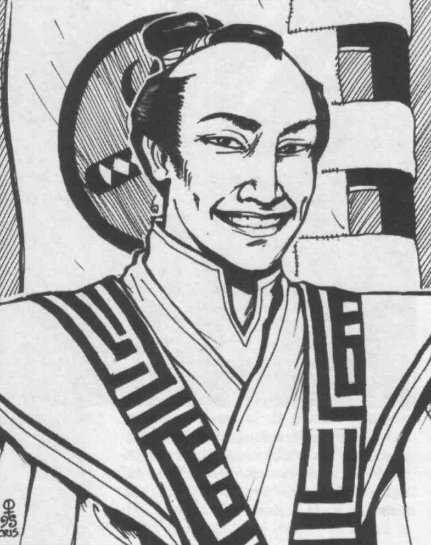
Ladiezzzz.
Matsu Hokitare is an unusual Lion. He has served as a scout to the Matsu forces, a diplomat and even as a performer in his family's court. His dexterity is remarkable, and he has traveled three times the length of Rokugan delivering messages and scouting for Matsu Tsuko. He is cheerful, thin and wiry, with large teeth and a winning smile. He knows how to ride a horse and on any visit to the Unicorn lands he can be found trying to wheedle steeds from the Battle Maidens, bringing sweets for the horses and gifts for the ladies. It's a long standing joke with the Otaku that some day someone will marry the cheerful Lion and give him a chance to get close to the steeds he so admires. When he was first assigned as a diplomat, it was thought that he would bring his good nature to the negotiations table. He turned out to be forthright, quick witted, and shockingly honest. If he saw an advantage, he pointed it out; if the opponent was getting the better part of a deal, he asked about it, openly and in public. Swiftly he was assigned to duty with the Scorpion, hoping he would repeat his success at ferreting out plots, and he was given a permanent post. Unfortunately, that would be shortlived: he uncovered brutal blackmail, and when the Scorpion realized they tried to bribe him without success, then resort to threats and even the murder of his younger sister. Despite this, Hokitare revealed all that he knew to the Emerald Champion's court. He was then taken into the personal guard of the Matsu daimyo and has been a part of Tsuko's retinue for the last three years. He is not the best fighter or tactician, but he is honest. He can be trusted. If his opinion is asked, he will give it, and if he is questioned he will answer with all that he knows. Matsu Bushi 3, just a little short of Insight, with a big honking target on his back for poisonous ninja that don't exist but really, I like this guy.
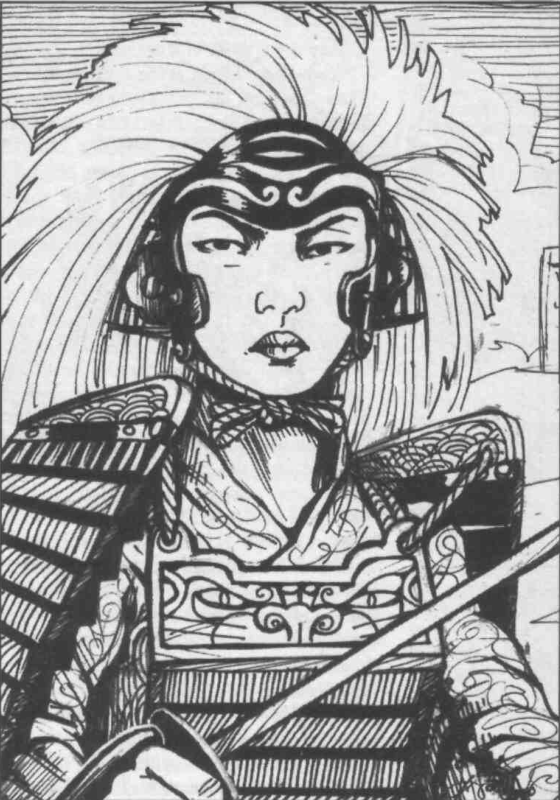
Negotiation is for CRANES.
Matsu Tsuko never doubted her role in history. Since she was three, she has had greatness thrust upon her. She saw her parents little, as they paused between battles only long enough to see that she excelled in combat. She had few friends, for her parents insisted that she never forgot that she was the heir to the Matsu house. Only one voice in her childhood spoke to her with love: her aging uncle, Matsu Yasau, the caretaker of the Great Hall of Ancestors. For hours he regaled the girl with tales of her ancestors, filling her head with magnificent battles and heroic deaths. Every night he made her say goodnight to the statue of Lady Matsu, which first Tsuko did with shyness and fear and later with honor and dignity, and she would often go to sleep at the feet of the statue on nights when thunder rocked the Matsu palace. After Hiroru was born, Tsuko's mother took her to the battlefield: at one point, a Phoenix suicide squad raided their camp and attacked the commander's tent. She crushed a Phoenix soldier's throat with her boken, but her father died. She asked why the Phoenix came knowing that they would die; her mother answered that it was their duty. She asked about her father; her mother glared and responded that even questioning his death was insulting its purpose, and they never spoke of it again. Years later she dominated the Topaz Championship, forced the Shinjo to publicly ask the return of their battle banner in court after taking it from them in battle, and has become Rokugan's greatest hero. After the whole thing with Arasou and Toturi though, she sees the new daimyo as an impostor and weakling, and wastes no opportunity to make her feelings known. How can the Clan achieve the glory it deserves under the guidance of a Crane in Lion's clothing? Matsu Bushi 5, not enough Insight, and with Traits over 6 without the necessary Shintao 3. She also has Great Destiny and is Driven to reveal Toturi as a coward. None of this will ever end badly!
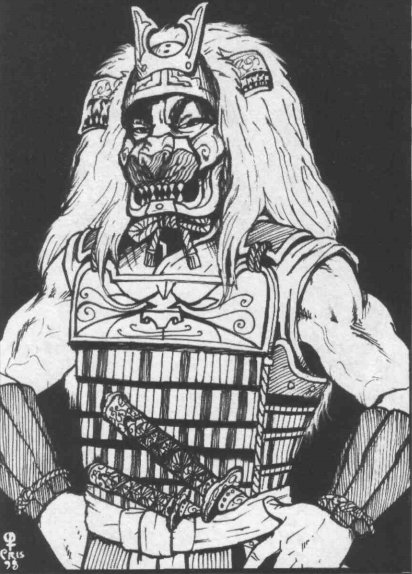
Say he's some art nerd. Come on, you know you wanna.
Matsu Seijuro was the counterpart to Doji Kuwanan: he was the Lion ward sent in fosterage to the Kakita Academy. Even as a very young boy, he understood the importance of his role, and the need to set an example for the Crane as representative of his Clan. As hard as he tried, though, he did not succeed: the other Kakita students had the benefit of history and instinct, while he had to both remember his Lion heritage and embrace a new set of values and techniques. He pushed himself to the limits of endurance, climbing the cliffs near the Kakita palace in his spare time and challenging classmates to meet or exceed his limits in runs and other exercise. His efforts ultimately paid off, and while he never reached the perfection he demanded of himself, he impressed many with his dedication. In public, most of the Crane that trained wit him praised his endless drive; in private, they said that he was a competitor that had not yet learned the time and place for competition. Some of his teachers also expressed disquiet at his intensity, but most dismissed it as typical Matsu behavior. He returned to the Lion lands, to find that his brethren dismissed his training as a joke: he was a casualty of politics and should not expect them to share in his 'sickness.' He was routinely mocked and always told that he could never be considered a true Lion. The first time he challenged a fellow samurai to a duel, he promised he would let him off easy - the duel ended with the other man's guts on the floor. A second duel followed the first quickly, then another. Any time he felt slighted, Seijuro demanded retribution. After killing six opponents, people learned to stop slighting him, and things started to change: commanders started asking his opinions on strategy, fellow samurai nodded to him with respect, and when matters of the Crane arose he was approached with the reverence of a sensei. Not that this has changed him much: he still pushes himself to excel beyond his peers, strives to live by the Matsu code and refuses to feel hampered by his Crane training. He dresses in traditional Lion garb, offset by his Crane daisho, and chuckles evilly while he fights. Kakita Bushi 3, on the level with Insight, with a Willpower of 6 but Shintao 2 - come on guys, you could've just given him the point, it's not like you're using chargen rules! He also has a Kakita Blade and high Iaijutsu, but only Void 2 which is eh for a dedicated duelist.
Ancestors! Akodo One-Eye, the paramount of samurai virtue, costs 10 points and allows rolling twice in the battle chart and taking the better result, having +1 to the Battle skill (to a maximum of 6) and reducing the Natural Leader advantage cost in 1 point. Akodo Shinju was Akodo's best spy, whose mother was a Shosuro that taught him all he knew. He pulled the "I prepared Explosive Runes this morning" trick on the general of a maho-tsukai army, which is cool. 2 points to always get a Heroic Opportunity on the Battle table. Ikoma, who died surrounded by pretty women and booze, costs 2 points and lets the player ask the GM a single yes/no question per game session about their current situation in the game, which the GM must answer honestly. Kitsu the cat-man costs 8 points and lets the character Sense ancestors like a Sodan-senzo, so it's pointless to take as one. Matsu Hitomi is the most famous samurai-ko of the early Empire. Her unit was placed under the command of a Dragon daimyo in a war between the Dragon and the Crab, but she was ordered to attack the castle of her lover, and as legend has it she dueled the Dragon daimyo naked, killed him, and escaped with her forces from the Dragon army. Chased by the Dragon and also by the Lion for her betrayal, she was finally trapped in a village now known as the City of Remembrance. She's a tragic figure and the reason why many samurai-ko take the name 'Hitomi.' For 6 points, the character can spend a Void Point to reroll an attack or damage roll, taking the result they prefer, but they cannot attack for any reason someone to whom they have a strong personal tie. Akodo Godaigo was the Akodo commander that chased Hitomi after fighting alongside her, and there is much speculation about his reasons to align himself with the Dragon instead of her. Historians have no record of his death and there are those that say he is condemned to walk the earth forever, denied honor and rest and remembered only for his crime against Hitomi. A Disadvantage ancestor, for 2 points the character's Rings and Glory can never be higher than their Honor.
Sample PCs!
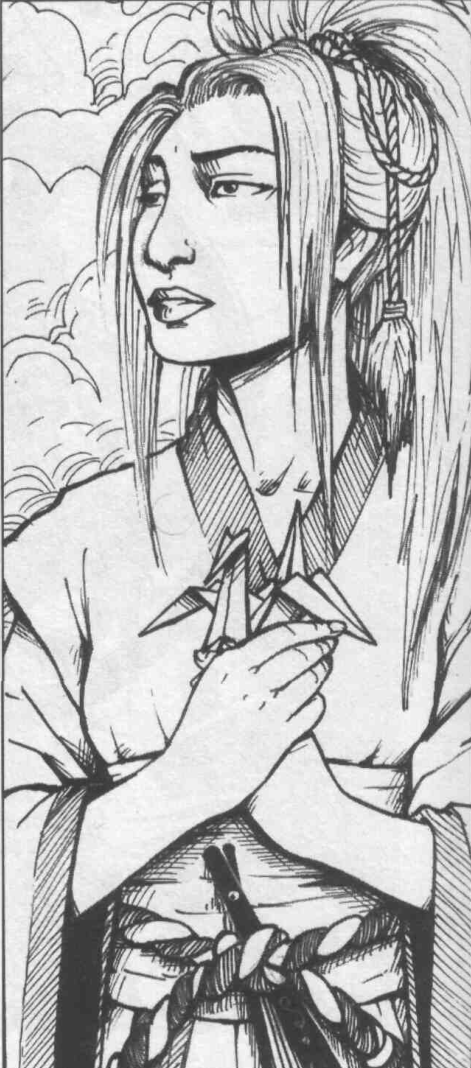
MC of the official L5R yuri drama visual novel.
The Akodo Strategist was born to prominent Matsu parentage. She was supposed to take her place along her mother in the Lion's Pride, but she had feeble health that only got worse. Her mother insisted she was blameless and buried herself in work, while her father was just as evasive. She only had one friend in those years, a silver-haired girl named Yusiko that taught her how to fold paper in the way of her homeland. The PC exhibited talent with puzzles and mindgames, and soon she was reading different books from her classmates and drilling with different teachers: she ended up being sent to the Akodo War College. She didn't want to part with her only friend, but that only drew her parents' wrath: she was "her enemy." There was so much pressure on her to provide operable opposition to the Crane above all other Clans, and she delighted in the idea of finally being useful to the Lion until one of her suggestions was responsible for a great Lion victory - and she saw the aftermath, the dead and the wounded. How can she continue to kill as if the swords were swung by her? But how can she disobey her parents? Akodo War College bushi, with Tactician and Clear Thinker (and Origami 1), but Bad Health and Softhearted. Didn't the Crab book already have a Kaiu tactician that couldn't bear the thought of death? Bleh.
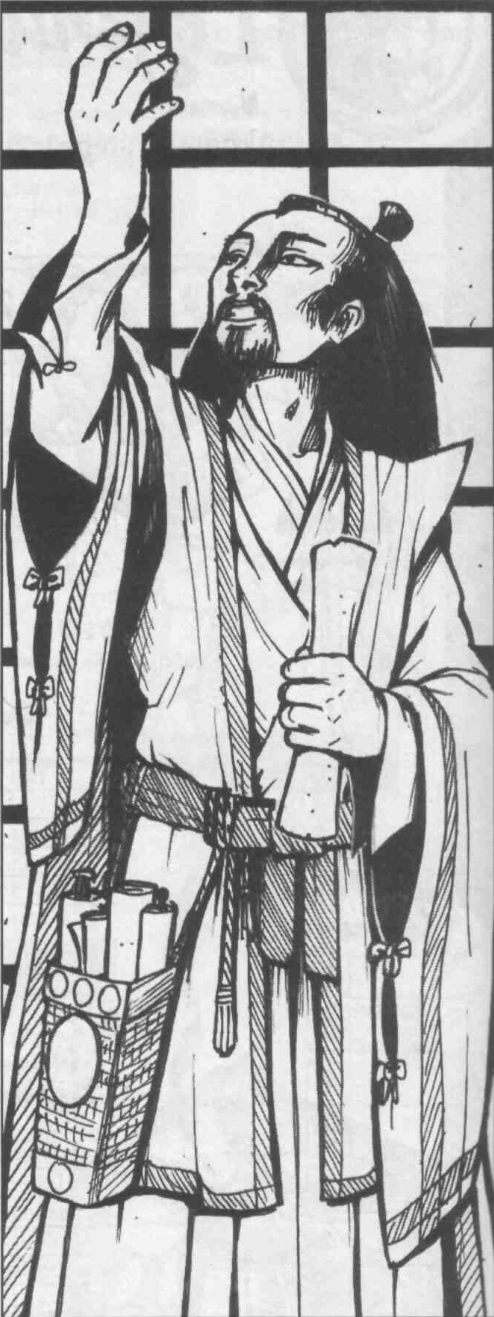
"Ah, yes, the story of when my regent attended the Sparrow soiree. It was a dark and stormy night..."
The Ikoma Peacekeeper has worked very hard to be where he is today. The position he sought was very hard to acquire and required much effort and promises to obtain, but eventually he became an appointed representative of the Empire: an Ikoma Peacekeeper! Sometimes late at night he wonders why he thought championing peace in the Empire was a good idea. None of the Clans desire to end their bickering, and peace will never be possible until all outside threats are quelled. But he can't afford the luxury of doubt, as his clanmates (especially the Matsu) will not allow it. For the last several months he has been assigned to an unaligned regent traveling the continent. His goals are the same, but his manner is far more erratic, and the PC worries his behavior will reflect badly on him. Last week, he was recalled into Lion lands to deal with the swelling friction between Akodo and Matsu, along with the regent. If he had trouble with the less irritable Clans, how will he fare with the Lion? Ikoma Bard with Glory 3 and Bo Stick 2 when all the bard stories in the world won't help. Also just Intelligence 3 which shouldn't be possible with his school and family.
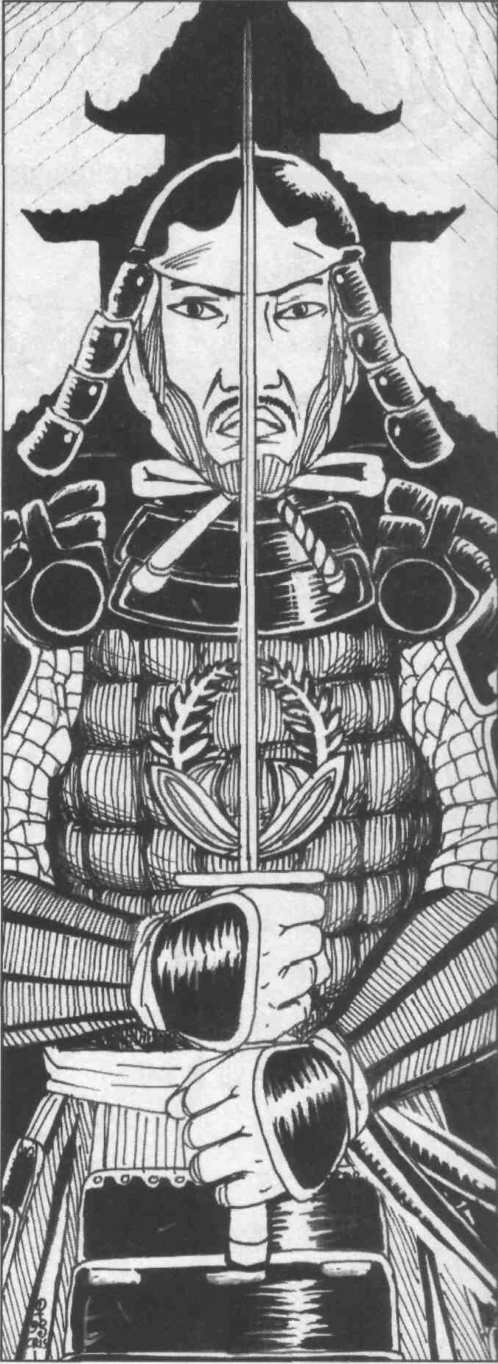
You should have that eye checked, dude.
The Imperial Guard grew with a dad that taught him about the odysseys of their ancestors. He grew into a fine young man, but at his gempukku he didn't have the enthusiasm and excitement when reciting his lineage that Dad remembered. He went off to guard the Emperor and his nobles, but his Dad worried - he gave him his sword so that he would always be at his side, but thought that his kid no longer had time for him, that he would not care about those that came before him, that his efforts had been fruitless. But he was jsut a foolish old man, as the PC came last night to sit at his bed and tell him all those stories that he heard as a boy, and the new stories that he was creating now. Dad is proud.
 Akodo Bushi 1, nasty in a fight but with Benten's Curse, Proud, Overconfident and Driven (to make father proud), he'll be in trouble with courtiers. At least he can just iaijutsu them to death.
Akodo Bushi 1, nasty in a fight but with Benten's Curse, Proud, Overconfident and Driven (to make father proud), he'll be in trouble with courtiers. At least he can just iaijutsu them to death.
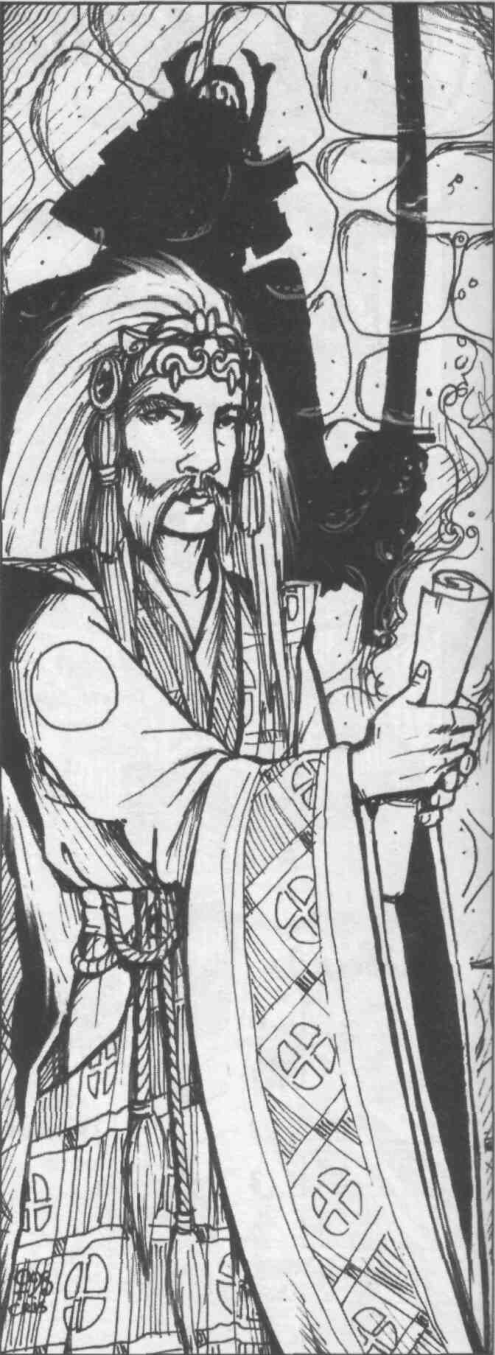
Nice 'stache.
The Kitsu Shugenja was born with a twin. He is of full Kitsu blood: his twin brother lacks it. The condition puzzled the family and the ancestors had little to say on the matter - in fact, they were quick to avoid the question. So he was sent off to study the art of killing, which disturbed the PC - he communed with the dead every day, but thinking that his brother would be repsonsible for ending so many also came with the dread of communing with someone he had actually killed by his own hand. They kept in contact through the years, but don't have the mystical bond twins are supposed to have. Six months ago, he attended his brother's funeral. He was considered a hero by the Matsu, but the PC couldn't shake off the idea that something was terrible wrong, and could not find his spirit to commune with. Kitsu, his patron ancestor, was uncharacteristically blunt when asked: his brother had returned to Rokugan. He has to find him now, and discover the final piece of the puzzle. Kitsu Sodan-senzo, with a bunch of Ancestors and a Higher Purpose, but also Haunted by Kitsu. Huh? Also 1 point in Kenjutsu because he's not some Asahina, Christ.
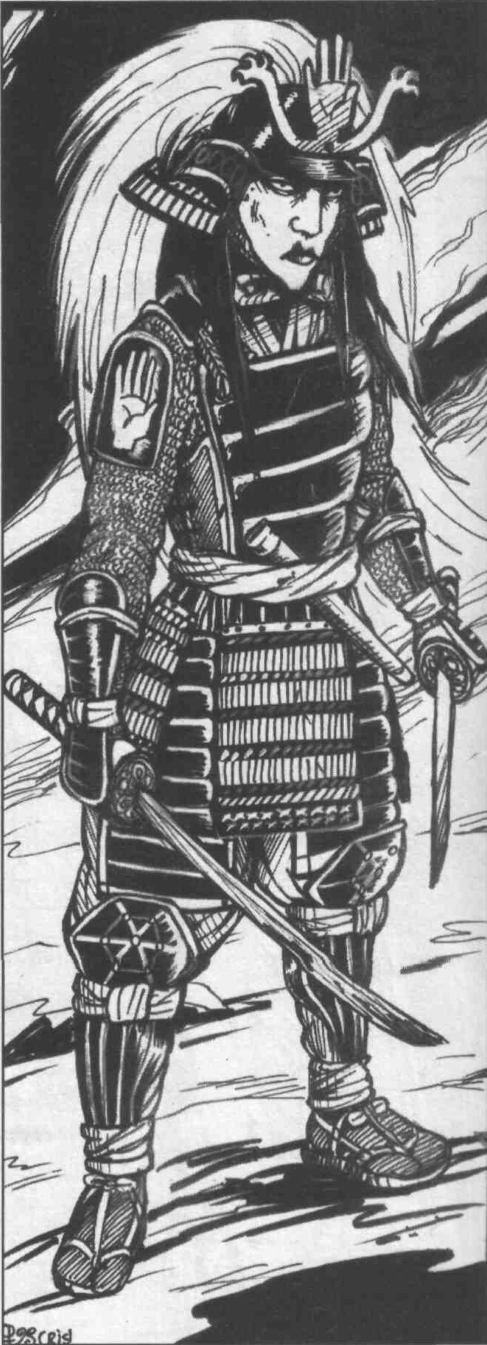
"Fuck everything forever."
The Matsu Deathseeker is like, fuck the Akodo. And especially fuck her father. Her mother died dutifully as a true Matsu, in combat. Her father moved on to another woman (a Crane!) and became a gardener on something. Her warrior skills are unparalleled, but she can't join her sisters, not while the stain that is her father remains on her soul. In life there can be no honor for her, but death, death is something else. She has requested the right to wear the badge of a Deathseeker, and she does seek death - but also dignity, and distinction for herself and her mother, as well as throwing wide the gates of her father's shame. Perhaps her sacrifice can accomplish this, but at least she will die knowing she has purged her family of her father's hated blood. Matsu Bushi, with Hands of Stone and Hand to Hand 3, also obviously a Deathseeker.
Next: it's Jigoku, but not Jigoku.
Way of the Lion: Emerald Champion Total War
Original SA post Legend of the Five Rings First EditionWay of the Lion: Emerald Champion Total War
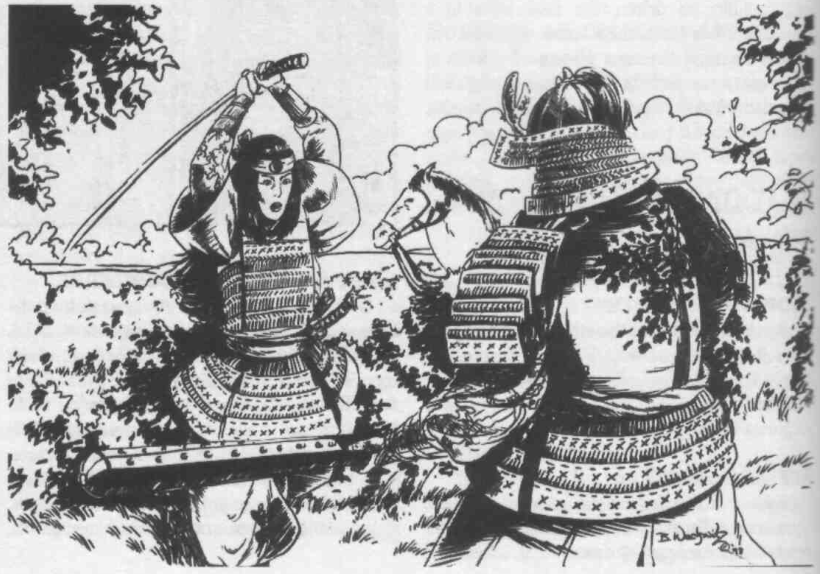
Horsie don't care about your dumb honor duel.
Appendices, at last! First we take a look at the Lion armies. In the beginning of the Empire, as was mentioned, battles were even more of a mess than now: just a bunch of mooks murdering each other without reason or rhyme. Lady Matsu saw that there was the need to change this and started aligning her troops into the first "army", marching abreast and in multiple ranks to intimidate their foes. But the battle still degenerated into a disorganized mess once her troops made contact, and Akodo improved upon Matsu's efforts by developing formal marching, which he did by getting a guy that was fixing his house to bring all his planks, putting them on the ground at regular intervals and teaching the troops to step on each plank to move forward. This is the Path of Akodo, and why every Akodo walks Akodo's Way. (No mention on whether Akodo paid the guy for his planks, though.)
Lions classify their troops by experience rank: regulars, veterans and elites. The regulars are fresh out of training troops that fight in the frontline to get them up to speed; the veterans have been in the army for at least three years and take the second rank to prop up the regulars, fill gaps and finish off retreating enemies; the elites are at the rear and form prestigious units like the Emperor's Personal Guard or the House Guards. The troops are further defined as infantry (always heavy infantry by other Clans' standards), archers, siege engineers (with Kaiu techniques, but mostly employed on the offensive role) and cavalry: the Lion were the first Clan to make use of cavalry after the Unicorn. They maintain 500,000 soldiers at the ready - for reference, the second largest army is the Crab with 300,000 troops - and they are divided in about ten armies of around 50,000 troops each. Akodo designed the officer ranks that are now used by all Clan armed forces these days, and also added innovations like the use of taiko drums to maintain marching order and give commands, and the usage of sashimono (flags mounted on a samurai's back) and war banners. Akodo Toturi has further improved on the armies, to the disgust of the more traditionalist elements in the Clan: a full company of each army is now a cavalry unit, and two squads of the cavalry company and in the reserves are horse archers. This has sparked protests from many of Toturi's commanders and many men about to be assigned to these units have requested a transfer. The first to accept his new commission was Matsu Agetoki, to the dismay of his peers.

Then we get some notes on running a military campaign. An ideal group for a military game has real life military experience, an understanding of military etiquette and a willingness to accept the chain of command and the fact that another player might end up as their commander. This ideal group rarely exists, of course. The real issue is the chain of command, as RPGs usually have a party of equals. What happens when one of them is giving orders, and others disagree? Issues of mutiny, insubordination and treason rise. The game recommends that players aren't put in direct command of other players. There's the suggestion to let the GM run the player's commander, with a note that playing an egomaniac abusive commander will soon lead to mutiny and that it's better to give very general orders that the players (themselves lesser commanders) can act on as they deem fit. If the command post has to be filled in by a PC, it's best to let the party vote on it - if the PC leader turns out to be an ass, they voted. It's also important to work out with the players the ramifications of orders. There's also notes on logistics (a whole Lion army on the march with its baggage train can be up to 26 miles long on the march!) and military justice, which is even more unforgiving than the already harsh Rokugani justice system.
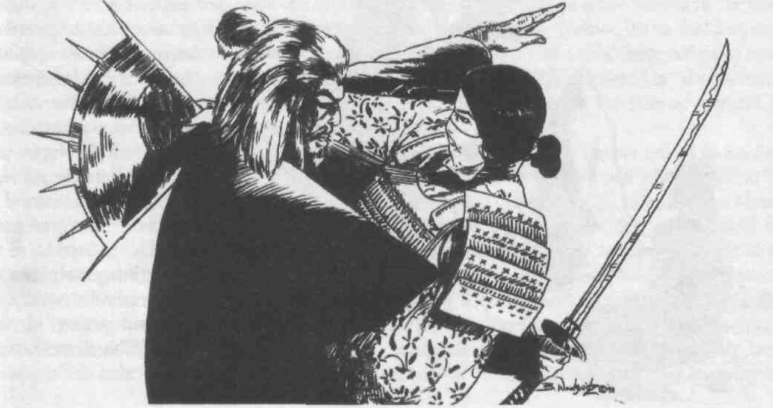
The most awkward of hugs.
And now, important battles! Of course. A sidebar tells us that many of these are defeats, because the Lion takes great care to analyze thoroughly every defeat they suffer while victories are like 'duh, of course we won' but really, if the Scorpion get to turn a major defeat into a secret victory the Lion should get some badass stuff, right? Anyway. The Victory With No Strike was a Lion feint in which they made the Crane believe they were about to invade them, let them try to 'trap' them with non-aggression treaties which they happily signed, then turned their troops around and went for fertile Phoenix lands. The Crane could not help because of the very treaties they had signed, until they found a loophole through which they put the Lion in a trade embargo and managed to pin the Lion army marching against the Phoenix with a Daidoji force that was 'bringing in supplies.' The Lion still won the lands that used to belong to the Unicorn before their return in the following truce, though, and held them for six hundred years. The Battle of the Hour of the Wolf happened at the shores of the Red Lake, then known as the Lake of Shining Glass, when ten thousand men died in an hour as an allied Bayushi/Daidoji force fought a Matsu army and were destroyed. The Ikoma believe that the Scorpion were about to invade the Beiden Pass once the Lion's reinforcements at the lake were destroyed, but the defeat put their plans on hold. The ghosts of the dead haunt the lake, and Kitsu shugenja are advised not to try to make contact with them. There's also a nearby lake where rotting corpses walk! The Red Snow Battle is a legendary failure, where commander Akodo Meikuko lost 15,000 men trying to make the climb against the Dragon fortresses. The Togashi allowed the attempt to see if it could it be done at all: bitter winter, ise zumi fuckery and finally the sight of the Togashi castle itself, just as the exhausted Lion arrived, were too much to handle. Meikuko's name became synonymous with mistake, and no Lion will name their daughter like that ever again. The Return of the Unicorn was recorded by an angry Ikoma daimyo of the era, begging the Emperor not to trust those "barbarians, meat-eaters and gaijin" that went through the Lion forces with steeds like oni and used blasphemous rituals that the Kitsu assured had nothing to do with the magic of the kami. At the Battle of Stolen Graves, a contingent of Imperial Guards led by Akodo Minobe fought Iuchiban's zombie army in the very streets of Otosan Uchi, and he impaled the Bloodspeaker in person with his spear - only to find out he could not be killed. The undying sorcerer was entombed in a great prison and Minobe was revered as the greatest warrior of his generation, but two centuries later Iuchiban escaped. The Clans massed their forces to fight Iuchiban's new undead force at the Battle of the Sleeping River, but Iuchiban concentrated his zombies and skeletons on a single point in the allied forces' line to break through and cause havoc. The Lion restored order to the faltering allied contingent and managed to turn what would have been a rout into a victory. The Night of Fallen Stars is seen by the Matsu as a show of great cowardice, when they offered honorable surrender or battle, and the Crane responded with filth thrown from Shiro no Yojin's walls, then collective suicide. For the Kitsu, however, it was caused by both Clan's unyielding pride, and they know that hundreds died needlessly because of it. At the Battle of Three Stone River, the Lion suffered such a crushing defeat to Phoenix elemental magic that the Emperor himself ordered them to incorporate shugenja into their forces. The Battle of Kyuden Tonbo we saw already in Way of the Dragon, though of course the Lion have a much worse view of the Dragonfly.
The lands of the Lion stretch for miles through the innermost provinces of the Empire. The plains are lush, the mountains ranges full of timber and copper mines, and their fortresses are among Rokugan's oldest. At the south they are bordered by the Spine of the World mountains, home to a strange race of goblins called the zokujin. These 'copper goblins' have been enslaved by the Lion to work the mines: according to the zokujin themselves an Ikoma tricked them into giving away their freedom, but the Lion claim they saved the zokujin from certain death by offering them food and shelter. Whatever tale is true, the only living zokujin in Rokugan work the Lion's mines. They are the only creatures in Rokugan that can eat minerals, and must be watched carefully in case they take a 'snack' of the ore they are supposed to be mining. They have their own language, but can be taught to speak Rokuganese. Their few remaining legends talk of a mighty artifact called the Bloodwhite Stone, which is the creator of the Sun and Moon and holds the secrets of all magic; needless to say, the zokujin are ignored and their stories dismissed as children's fables. The Lion peasants work the plains for the rice needed to fuel their economy and supply the armies. Most of the Lion's wealth comes from trading with the Crane, Scorpion and Phoenix, but they save their best crops for the Crab in exchange for weapons and armor. The roads are kept immaculate due to ancient Matsu decree, so that troops can be moved quickly to the border. The central position of the Lion means that save for the Crab, they border all Clans and therefore no Clan can war on any other Clan without the Lion finding out and moving their forces. It also means the Lion have few places to retreat and must allow allies to march through their own lands to get to a battlefield. To the north lie the Kitsu's ancestral family castle, as well as a major trade highway that connects Otosan Uchi to the northern Clans. The Ikoma castle in the western reaches used to be the frontier of Rokugani civilization before the Unicorn returned, and many of the remaining Ki-Rin that fled from the advancing 'gaijin' served the Ikoma for a generation. The later Fox Clan, descendants of the Ki-Rin, could not retake their lands from the Matsu that now owned them, so they marched south through the Beiden Pass. The Lion midlands comprise most of the Lion territory, and important contested ground between them, the Crane and the Scorpion. The Matsu castle is located just above Beiden Pass, and is one of the most heavily fortified locations in Rokugan as well as the location of the hallowed Hall of Ancestors. Another important location is Shinden Shorai, the "Temple of the Future" where Akodo's wife bore her children and where most noble Lion children are born. It's a small corner of peace in the most hotly contested territory of the Empire, and the Kitsu claim no one who means ill can enter the ravine where it's located. There's also strange birthing rituals, of which the only thing known is the crude drawings of cats made by children, siblings to those about to be born there: the Kitsu say they have something to do with protecting the place.
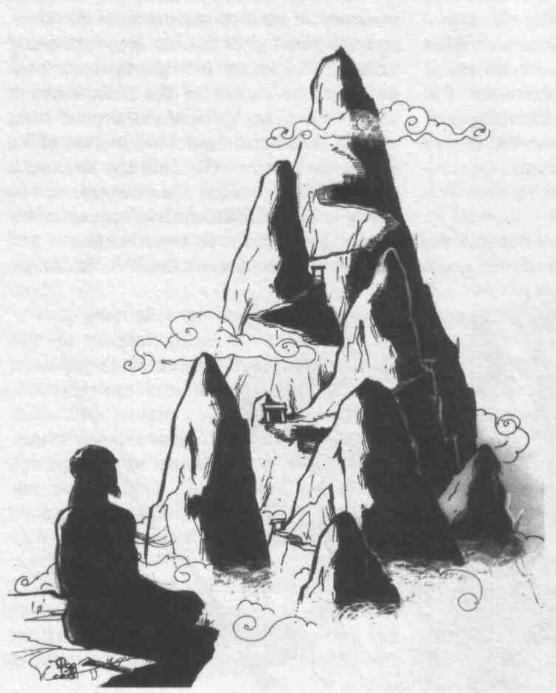
The Mountain of the Seven Thunders, where Shinsei and his dudes gathered, is also in Lion lands. Good luck making the climb, is hella long!
And now, ghosts! It's common in Rokugan to tell ghosts stories at night during summer as a pastime, and often they have roots in truth. Many travelers have been accosted by the yorei, specters, and others have been accosted in their own homes. Some of them have lost their way to Jigoku, and may not be able to find it again. They can be confused and unaware of their own death, or angry and violent. There are also "little ancestors," which are perceived to be family spirits watching over their descendants or kami with a particular bent for justice, reacting to 'crimes' like failing to clean the house properly or not obeying one's parents. A third kind of ghost does not leave to the next world because it feels it still has much to do: there are stories of mothers that died too young and stay near their children, or a Crab samurai that died defending the Wall and stayed at his post in ghost form to kill any oni that approaches. The last type of ghost, the gaki, is defined by hunger: it wants to eat one thing uncontrollably, from silk to corpses.
The Kitsu are the great authorities in what concerns Jigoku, the realm of the dead. Not the same as the demon world Jigoku, incidentally. While young they learn of a road that crosses all other roads in Rokugan, that if you know where to look and how to walk leads you through a thick forest of stones to a great lake full of mist, with a narrow bridge that disappears into the mists ahead. This is the bridge to Jigoku, and only the very strong and very honorable can travel both ways. The journey to Jigoku is one that everyone, from the lowest eta to the mightiest emperor will do once, but only the Kitsu learn to be familiar with it. Many of the hungry or lost ghosts of legend are those who get lost in the forest of stones, and one of the duties of the Kitsu is putting them back on the road. Jigoku itself has a very mundane appearance, just like the living world, but with screwed geography - an inland forest might just be a few yards from the ocean, while cities can have great chasms in the middle. It is populated by men, women and children, carrying out similar tasks to those they performed in life over and over. A woman carries the same basket of rice in the field and empties it endlessly on a larger basket, because that was her role in life.The deceased Hantei emperor holds court in the phantasmal Otosan Uchi with a great pageant, and ignores the other thirty-odd Emperors doing the exact same thing. Jigoku is bleached and almost colorless in the lowest stations of life, while the sections close to the Emperor are a riot of color and light. The souls aren't aware of each other and shed their identities before entering, so they have no face. Kitsu that wish to contact them must learn to journey through the bridge, and seeking out the spirit they wish to make contact with: first they search for the remains of their identities in the mist, and use them as a contact point for the soul in Jigoku. The soul then recovers its memories and answers what the Kitsu wishes to know. They craft ritual masks for this, because their individuality is offensive to the faceless spirits: this mask will be the one that they will wear when they die, so only the Kitsu can choose how they will look like in death. From the time of the very first Kitsu, one member of each generation uses all their skill to retain their self when they die: they willingly cut themselves from the cycle of reincarnation to serve as Rokugan's living history. Not all Kitsu achieve the level of skill necessary to enter Jigoku, and those who don't perform a variety of services like helping grieving people, becoming historical resources with the Ikoma, taking confused spirits into the afterlife and dealing with a wide variety of spiritual matters. Oh, and there's no rules at all to go into Jigoku: ask your GM about it!

Nemuranai! The Bell of the Heavens is a heavy brass bell hanging on a branch of the forest outside Shiro Matsu. It was forged at the behest of a Crane daimyo that wanted to embarrass the Lion. A man pure of heart could ring it, it was said, so at the birthday of Hantei XVII it was brought to the Lion. The Matsu daimyo failed, and then a Phoenix daimyo, and all the other Clans failed too; the Crane daimyo made it ring with just a small tap. The Ikoma daimyo asked for permission to make the attempt, swung the hammer and made it chime loudly: his only reply was that the bell had no sound, and the Matsu now keep the bell as a lesson to those who think themselves pure of heart. No rules, so there! The Mempo of Matsu Hitomi was left behind along with the rest of her armor when she was forced to betray her commander and flee, so that she would not dishonor her ancestors. Only the boldest samurai-ko are allowed to use it. It gives a Free Raise to Battle, Kenjutsu and Athletics when in a combat involving more than twenty warriors, but if the wearer commits a dishonorable act the spirit of Matsu Hitomi herself will slay the offender. Hantei's Tessen is a war fan with the golden symbol of the Lion on one side and the chrysanthemum of the Emperor in the other. It was given to the Matsu when a daughter of an Emperor decided to marry a Matsu man. It is made of bronze, but strong as steel and cannot be broken by a katana; it also adds twice the user's Strength in combat and keeps three dice instead of the tessen's regular damage rating. The Ancestral Armor of the Lion is said in the Ikoma histories to have been the armor of the first Akodo daimyo and given to Akodo One-Eye by Hida himself. The last user of the armor, however, made a terrible pact with a Shadowlands oni: the Lion were called to help the Crab during the Battle of the Cresting Wave, but Akodo Fuso promised the oni to open a way for the Shadowlands in exchange for unparalleled battle skill. The break was successful and only Dragon intervention prevented the oni from marching north, but the oni still granted the armor a new dark power. It now sits in a secret alcove of the Ancestral Hall waiting for someone to cleanse the oni's taint. The armor's bearer can spend XP and raise their skills to 6 - they get reduced to 5 if taken off, but come back to their real rating if put back on. The user must also use it as often as possible, and only being in the Emperor's court or some equally pressing situation can get the user to stop wearing it. They also get the ability to spend up to three Void Points in a round. Finally, the Ancestral Sword of the Lion, Shori, is in Imperial hands. The user can attack as many times a round as their Honor.
Next:





Way of Shadow: Kitsuki Holmes Is On The Case
Original SA post Legend of the Five Rings First EditionWay of Shadow: Kitsuki Holmes Is On The Case
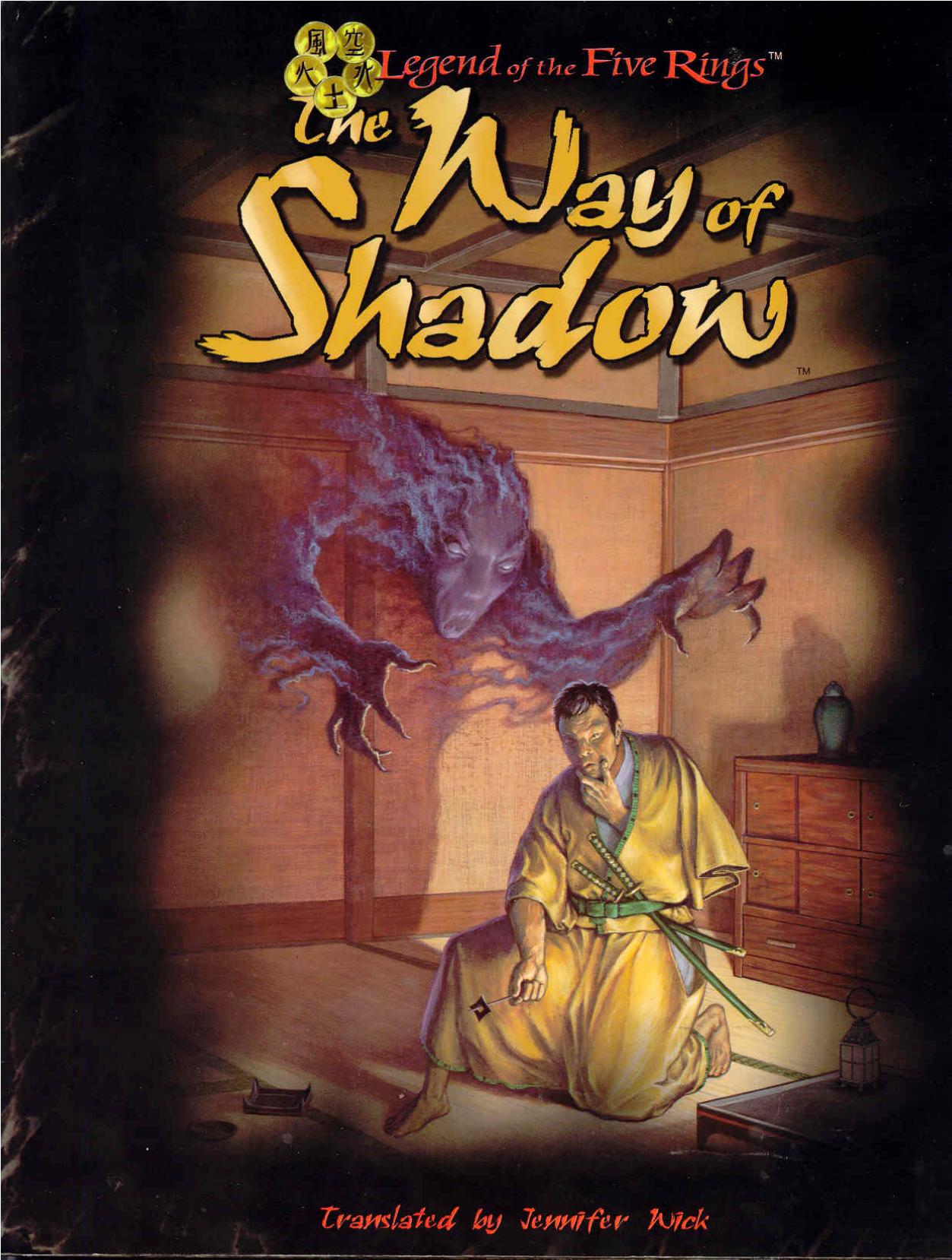
So! If you've followed the line so far you know that there are two contradictory interpretations of the ninja in L5R. In the corebook, we learn that the ninja are essentially an independent "Clan," friendly with the Scorpion due to shared blood ties but ultimately working for pretty much anyone, as well as recruiting from the lower castes. In Way of the Scorpion, we learn that the "ninja" are nothing more than a very long running deception by the Scorpion Clan, where the classic black-clad ninja are nothing more that samurai-caste rookies using deliberately shitty training and tools to distract the enemy while the real Scorpion assassins and infiltrators do their job. These views don't mesh, but the corebook also let us know that an upcoming sourcebook, Way of Shadow, would let us play a ninja campaign. I said back then that it was a gigantic lie, but on second thought it is technically true. Way of Shadow does let you play a ninja campaign, but in the sense that Chaosium's venerable Call of Cthulhu lets you play a Mythos campaign. Oh, the things we'll see! This book is helmed by Jennifer Wick, incidentally.

The book is set up as the IC journal of one Kitsuki Kaagi, and four major investigations he is involved with. The events of this book happened more than ten years before L5R 1E's official start. We're told that the Kitsuki learn a special meditation technique to recall all that they see, hear and think during an investigation: they write down the resulting journals and turn them in at the Kitsuki castle to add to the family's library. Each investigation is also an independent adventure (well, one is just a long-form cutscene but we'll get to that) where the PCs replace Kaagi and his assistant to try and solve the mystery. While Kaagi faced each investigation more or less successively, the idea is that the adventures are sprinkled in a campaign along with more "normal" chapters, so that the players start recognizing similar themes and patterns and get to feel they're cracking a great mystery. And what's the mystery about? The ninja, of course!
quote:
The true Ninja of Rokugan are more than black-clad men and women intent on murder and robbery. Though some, trained by the Scorpion, fulfill that role, the origin of the 'Ninja myth' goes back to an older and more sinister force. This is not the story of the false Ninja, Scorpions who hide their faces behind masks and powders, poison and smoke, but of their darker cousins. The enemy that hides within the shadow is not human, though it tries to be. It is not intent on theft, or gain, though its actions seem motivated by human desires. It is as ancient as the footsteps of Lady Sun and Lord Moon upon the earth, and those who serve it can never be free from its dark grasp. It is nightmare. It is the supernatural horror that stands, faceless, and curses the light.
These are the true Ninja.
This is the full depth of Shadow.
Enter, if you dare.
The prologue is written by Kitsuki Yasu, the Kitsuki daimyo. He writes down that one day during a storm, a traveller stopped at the Kitsuki castle and begged for shelter from the rain. After an hour she left, leaving a wooden box for the daimyo. It belonged to Kitsuki Kaagi (the woman was probably his eta servant) and Yasu used his master key to open it only to find his worn, damaged journal with this as the first page:

That reads more as "Kitsuki Kuugi" to me.
Yasu was always worried about Kaagi. He raised him as his son, though he was originally a Matsu. His father sent him to the Kitsuki to keep him safe: seven months after that, Kaagi's family was all murdered, except for an older brother that was at a Phoenix school. The Crane had managed to turn the Emperor's gaze, and when the dust and smoke cleared a whole lesser Matsu house had been eliminated. Yasu formally took Kaagi in and sent word to have his brother, Iyekao, brought to him - only to find out he too had disappeared. For months, Kaagi grieved and suffered of night terrors, dreaming of shadowy figures. The fears subsided in time and he grew to become a superb student and detective, but Yasu kept fearing for him as his investigation started to focus more on Rokugan's spooks: the ninja. As he writes his words, he awaits a decision from a council of Kitsuki, wondering if he (or anyone) will be allowed to read Kaagi's journal.
And it's on! The first investigation is Death at Ichime Castle. Kaagi goes to Ichime Castle, a Lion holding, after the death of the lord Akodo Maouri. The death was reported as usual by shugenja communication to all major strongholds, the Kitsuki included. He was survived by a son, Akodo Hakenka. What struck Kaagi as odd was that the body was not set to be interred until the next full moon, an unusual amount of time, for "spiritual reasons." Kaagi figured out immediately that was bull and that something unusual and alarming had taken place, and he went off to Ichime Castle along with his eta assistant, Meilekki. He is no stranger to the castle: he visited it several times with his father, and is acquainted with Hakenka. On his interview with the castle shugenja, Akodo Toshiin, he figures out that the man is a fool and easily roused to anger, but also that he is trying to hide something: all that Kaagi can pry out of him before he shuts up is that there's word of a family curse around, and that Hakenka has a younger brother, Sokoi, "not of full blood." Through Meilekki's gossiping with the maids, Kaagi already knows there was supposed to be a strange mark on Maouri's body, which Toshiin ordered the eta servants to remove as best they could. Later, Kaagi speaks with Ichime Amai, Maouri's concubine. She is obviously distraught: Kaagi notes that her loyalty to the lord was legendary, and that upon finding out that she was pregnant of him she offered to kill herself so as to not compromise him. Instead, Maouri allowed her and his bastard son, Sokoi, into the household. She is watching him now, and Kaagi realizes he didn't see him approach. Amai was the one that found the body, and she seems concerned over more than Maouri's death now. And she won't show her right hand to Kaagi.
Later, he meets with Meilekki, who already has got them permission to see Maouri's body. She has convinced the help that he is a great shugenja (they have absolutely no faith in Toshiin), and that Kaagi's mother was hinin and that Mei herself is her half-sister. Her wild stories have gotten Kaagi in more than one place that he shouldn't be in. She is sort of a mystery even to Kaagi, and delights in inventing new backgrounds for herself: even with his training all that he has been able to surmise is that she worked at a geisha house at some point. She came to him in the entourage of a Crane dignitary to the Kitsuki castle. Kaagi noticed her intelligence, and the Crane offered her to him, mistaking the source of his attraction. While Mei is off to investigate Amai's room, Kaagi meets with Matsu Nari, the lord's karo. Nari is a no-nonsense type known for his loyalty to Maouri and his experience in battle. He is concerned by the superstitious talk of curses and what it may mean for Hakenka's rule, as well as Maouri's behavior prior to his death. The strange mark had apparently appeared on his body before he died: it was definitely no tattoo, and Toshiin recalled seeing the same mark in the family records - and then went and made his findings public. Maouri was also retiring earlier than usual to bed and had been in forceful arguments with his son the previous two weeks, with the final argument being the night right before he died. Hakenka's rashness and disrespect for his father has put him in a precarious position, and there might be calls to make him step down... which would favor Sokoi.
After dinner, Kaagi goes off to search for Mei, who still hasn't returned. In the courtyard, suddenly there is a gust of wind: Kaagi is sure he is being followed, but can't turn around without giving away that he knows. He tries heading for clearer ground, but he starts getting inexorably lost for some reason. He can't hear the footsteps of his shadow anymore when he stops, but they start again when he moves. When he is finally certain he's got the tail in open ground, he turns - no one there. Then he turns again: Mei. He angrily tells her he could've killed her with her hide and seek game, but she doesn't seem to understand. And yet, there is uncertainty of some sort in her voice. For some reason, Kaagi doesn't feel like telling her of his mysterious follower. Whatever the case, Mei reports what she found: a very plain room, fit for a maid but not for a mistress. The only thing off that she noted is that Amai owns a lot of makeup, but the mirror she has is too small to apply it properly. Kaagi, as a dude, can't really give an opinion on that.
 Amai has a small potted garden, but it's dead. Mei saves the best for the end, and after some prodding from Kaagi (who is finally feeling like himself again) she tells him that the garden is properly tended, with all the tools recently used. After that, Amai came, and Mei had to leave. She met Sokoi, they spoke for hours, and suddenly Mei realizes - she hasn't had dinner yet! By now Kaagi is sure she is screwing with him.
Amai has a small potted garden, but it's dead. Mei saves the best for the end, and after some prodding from Kaagi (who is finally feeling like himself again) she tells him that the garden is properly tended, with all the tools recently used. After that, Amai came, and Mei had to leave. She met Sokoi, they spoke for hours, and suddenly Mei realizes - she hasn't had dinner yet! By now Kaagi is sure she is screwing with him.
Maouri's body is kept in a chamber, with guards at the door. It smells like death, as can be expected. The body is... wrong, somehow. Kaagi has seen many corpses already, but whatever makes a man look like a man is gone in Maouri. The skin is too wrinkled of a man of his age, with a leathery look to it. He is lying in salt, and Kaagi suddenly realizes, between mirth and disgust, that Toshiin used a spell meant to preserve rations over long journeys to keep Maouri's body from rotting. Mei gets to work: she undresses the body and starts examining the dead flesh. The mark is there, and it's definitely no tattoo, no signs of scarring or healing. Even Kaagi is disturbed by how easily Mei handles the corpse. The chest is rigid, too rigid, and Mei thinks his throat constricted before death. Poison, perhaps? There's not much else they can find, so they leave after reassuring the guards that no curse will fall upon them.
That night, Kaagi dreams of being chased, of being lost, of seeing two moons in the night sky (one bright, one dark), of finding Mei's body on the castle pond, then realizing it's not her body, but Sokoi's. He wakes up - he sees Sokoi, wet and struggling to breathe, one big rock tied to his ankle. And then he wakes up for real.
 He hurries to dress himself to meet (rescue?) Mei, who is just having her dinner/breakfast.
He hurries to dress himself to meet (rescue?) Mei, who is just having her dinner/breakfast.

Early in the morning, Mei leads Kaagi to a meeting. She had a visitor, a servant with a message from Akodo Temoru. He was a friend and general to Maouri's father, retired for years. And he wants to talk to Kaagi before gossipy servants are up. Temaru's quarters are in the back corridors of the castle: the guy is pretty reclusive. They knock at his door and Temoru opens, with the eyes of a sensei. His apartment is full of mementos from a lifetime of glory. He remembers Kaagi's father, and how he was a good man. He won't pretend to understand what the Kitsuki do, but Temoru knows they value truth: he hasn't always been a friend to truth, but he knows now some truth can prevent a great wrong, yet he still relies on Kaagi's Matsu heritage to make him discreet. Temoru was of lower station than Maouri's father, Bakusho, but they were great friends and went Bakusho went to the Akodo War College he took Temoru with him. They both caught the eye of a venerable general and along with other students became his sort of personal guard. One day, they got an important mission. The Doji and the Akodo were squabbling over some minor piece of land that neither wanted the other to have. The general learned that a Scorpion spy would travel in disguise to the negotiations so as to muddle them and leave the land open to raids by Scorpion-backed bandits. The student unit ambushed the caravan and killed the guards and the 'spy,' only to find that they killed the daughter of the Crane daimyo, sent to be married to one of the Akodo generals. The kids, unable or unwilling to understand, followed the general's order to dispatch all survivors (one maid included), take the valuables and pretend that bandits had robbed them. As it turned out, the incident made the Crane patrol the lands more heavily and the negotiations were a success. The students were told never to bring up the subject or even commit seppuku: the general claimed to have been deliberately misled by Scorpions to dishonor the Lion. Temoru tells Kaagi all of this, because the mark that they found on Maouri's body was the mark that was also in Bakusho's body, and in Temori's own skin: the mark of their secret student unit. No one else knew about it, but their wives. Kaagi talks to Mei later and notes that Amai claimed never to have seen it before, and Maouri's body was made with a much sloppier hand.
In Maouri's rooms, the window is open, and it shouldn't be. Mei figures that it had to had been opened recently, and Kaagi finds a small cylinder on the ground. It is some sort of device, but to what end he can't figure out. Mei just thinks it's a toy. The futon smells of something - obuno oil and beeswax, something else. Obuno oil has medicinal properties, but an improper mix can make you sick, or dead. Odd choice for poison though, it would take a long time and--- then it all clicks. Now it's time for Kaagi to be
 to Mei: the first time he heard about obuno oil was as fabric dye. It is pretty and used to be fashionable, until everyone wearing clothes dyed with the stuff started suffering bad reactions to it. The dye was much stronger than the medicinal mix, and after some tests with his portable chemistry kit, Kaagi notes the obuno oil that made Maouri's marking was too potent. But it had to had been applied for weeks to gain that deep black color. Amai had to have been the one, but her motives make no sense to Kaagi still.
to Mei: the first time he heard about obuno oil was as fabric dye. It is pretty and used to be fashionable, until everyone wearing clothes dyed with the stuff started suffering bad reactions to it. The dye was much stronger than the medicinal mix, and after some tests with his portable chemistry kit, Kaagi notes the obuno oil that made Maouri's marking was too potent. But it had to had been applied for weeks to gain that deep black color. Amai had to have been the one, but her motives make no sense to Kaagi still.
Kaagi finally meets with Hakenka, with Nari at his side. Hakenka is playing at being a Lion daimyo, all maps and scrolls, and makes a show of ignoring him. Kaagi is having none of it and warns him against using his newfound power as a toy, to which Hakenka obviously becomes incensed. Kaagi notes the circumstances of Maouri's death and how he might just be the only one that can stop the same from happening to Hakenka, which cools him down somewhat. It was murder, by poison. Of course, to Hakenka the evidence of a Kitsuki means nothing, but proper testimony can be obtained from Amai... who is also dead now. Kaagi summons Mei and they all go to see Amai, who died just like Maouri in her own quarters. As Hakenka's guards turn in revulsion, Mei starts examining the body: she finds a pot of white cake makeup, a lot of it. And then she finally examines the right hand Amai had kept hidden: the fingertips are ebony black under the makeup.
In Hakenka's court and in public, Kaagi lays out the facts as he understands them at the new lord's bequest. There's nothing supernatural involved, only Amai's doing. With that, all of it is cleared... and at night, Kaagi, Mei and Hakenka hide in the latter's room for the real assassin to show up. Amai couldn't have done it on her own: she needed backup, someone to actually goad her into killing the lord she loved. Just as Kaagi fears Hakenka's impatience will make him act before time, the assassin shows up: it's a fucking ninja! Black-clad from head to toe, he proves to be more than a match for both Hakenka and Kaagi, moving with a speed the magistrate has never seen. After some fighting he throws a smoke bomb that makes both samurai cough and hack, but just before he finishes Hakenka off Mei fends the killer with her throwing knives of Unicorn make. Finally Kaagi lands a blow and the ninja cries, with Matsu Nari's voice. Again he drops a smoke bomb, but this time it's to cover his retreat, unable to fight all three of them at once. How could he escape? He's Ninja, a tired Mei claims.
The case is now settled. Hakenka arranges to replace the incompetent Toshiin, which Nari himself had hired. The real Matsu Nari had died ages ago, and "Nari" was probably a Shosuro-trained agent. At least, Kaagi says, Hakenka agreed to spare Sokoi - but Mei informs that the boy was found drowned on the courtyard pond. Kaagi pales. The only thing unusual was that the pond's fish didn't disturb the body.
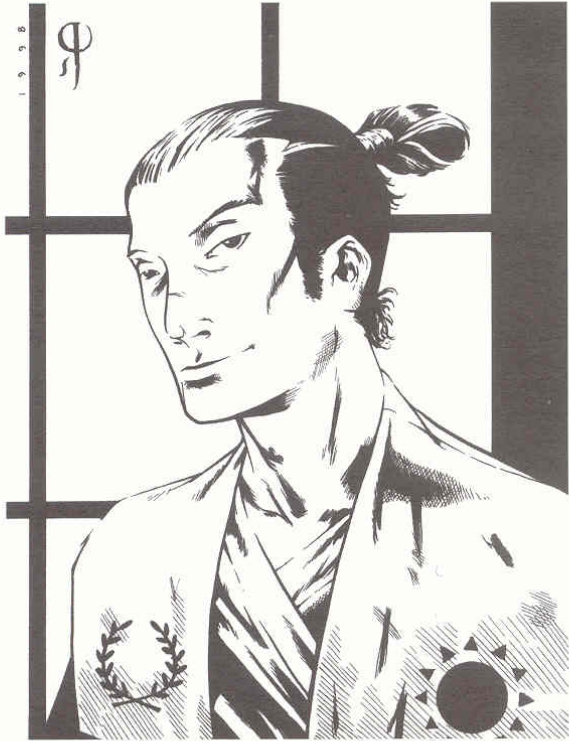
Our guy, Kitsuki Kaagi. Just here to break up the wall of text.
As for the adventure part! As mentioned earlier, Kaagi and Mei take no place in this - the PCs take their place. Basically, the Scorpion's agent in the house, Shosuro Geru (posing as Matsu Nari) had convinced Amai to slowly poison Maouri under the illusion that she was merely painting a mark on his body that would scare him into compliance with the Scorpion demands. The real plan was to kill Maouri, keep Amai from revealing Nari's involvement (since she did, in fact, kill the lord) and replace Hakenka with the easily manipulable Sokoi under the pretext that the bastard son could "break" the family curse. The PCs can come in like Kaagi did, from being related to Ichime Castle somehow (perhaps they knew Hakenka as children); from being curious about the strange requirement for the funeral to happen in the full moon, two weeks from the death; from being courtiers interested in having a hand in the succession of power; from the possible angle of a maho-tsukai being involved with the curse, thus making the matter fall under the jurisdiction of Imperial magistrates; and so on. As they arrive, the PCs are greeted by Akodo Toshiin, who tells them mostly what he told Kaagi. Nari planted the "family history" on the Ichime Castle records for Toshiin to find, which made the shugenja panic and send out a cry for help. He's not a very good Lion or shugenja, which is why Nari hired him in the first place. The PCs can try pushing him for more information, but he doesn't know much else - and trying to meet Hakenka and Nari right now would be barging in on their hosts. As the PCs are shown their quarters they can see Ichime Amai: Courtier + Perception against TN 10 roll to remember the circumstances of her affair with Maouri. PCs that pay attention to how she feeds the fish realize that she is not lefthanded and is deliberately keeping her right hand away: it doesn't look stained, but a Perception + Awareness roll at TN 30 (!) tells them it's got traces of makeup. PCs shouldn't get too out of line anyway, since Amai is still very highly regarded in Ichime Castle. Sokoi will also show up out of nowhere, but the GM shouldn't make a big deal of it - the idea is to keep the players on edge with information that could be important or useless. Just as the players get tired of examining everything in this scene - bam, the kid.
If the PCs want to gain access to the lord's body, they'll need to come up with an excuse like Mei did for Kaagi, but other reasonable methods (spells, distracting the guards, etc.) should get them the same information. Nari is a breath of fresh air as the no-nonsense type, which is just the impression he wants to give. He'll feed them the same information he gave Kaagi, and bring up the possibility of Sokoi as the new lord to "break the curse" with the skepticism he wants them to hear in his voice. He actually doesn't care what the party does: if they buy the curse history, Sokoi is on the throne, but if they don't the leads will point to Amai and he can always kill Hakenka later. The trippy part where Kaagi gets lost and "followed" is just trippy, but nothing happens if a character happens to have crystal with them. They won't hear footsteps or end up on the wrong side of the courtyard or anything. If they are affected, the GM is encouraged to play to the stuff that scares the PCs (Dark Secrets, phobias, etc.) but the important part is showing them the vision of Sokoi's drowned corpse. Amai's room is about the same as Mei described it, but someone with Disguise or Lore (Ninja) can tell that her makeup is not appropriate for that kind of activity. An Awareness or Herbalism roll at TN 25 (!) can tell that her garden died from exposure to some chemical or herbal compound. Her bedchamber is offlimits, though: samurai aren't supposed to hang out in a servant's quarters, and if they try to push the issue the rumor spreads about Amai being under suspicion and will get a lot of angry Lions on them. Even hinting that she had something to do with it at this point is -1 Honor point (!) They can try to bribe or convince a servant to check the room if they don't have their own Mei with them, but Awareness + Sincerity roll at TN 15 or the servant blabs. Also, remember Maouri's body? Any character that touches it will be treated as eta, with their Honor dropped at 0 for purposes of interaction. Cleansing requires rituals at a Torii shrine, and the nearest one is over ten miles away. Even making the attempt requires a Willpower roll against their own Honor x 5 as the TN, with success allowing them to touch the dead flesh at a cost of -2 Honor points for doing something so disgraceful. The loss is reduced to 1 point for Kuni shugenja and other people with "creepy" backgrounds.
quote:
In order to make the scene even creepier, you might want to have someone play the corpse. Send everybody out of the room, put your corpse on the floor, lower the lights, bring some candles, and tell your players to come back in. Ask them to do exactly what their characters are doing (but don't forget the No Touching rule in the Live Action section of the main rulebook). Encourage your corpse to twitch once when someone leans in to get a very good look at the stain. If things work out well, everybody will jump and ask if that really happened. Smile and reply, "Maybe. It's tough to tell in the shadows."
The dream sequence Kaagi had can also happen, again with the double wake up scare after seeing Sokoi's drowned body. If they think of asking, a servant will tell them that the boy almost drowned. There's no body on the pond, and the water spirits will not remember the incident. Later, Temoru (now Tamoru) will ask to see the PCs and tell them what Kaagi learned regarding the secret unit, their mission, and the unit tattoo, which is how the old Lion knows the curse is bogus. In Maouri's room, Kolat-trained Lion Matsu Hiroru ( that Matsu Hiroru) is also investigating the scene, but will duck out once the PCs enter leaving behind his blowgun (the strange cylinder) It takes a Perception roll at TN 30 (so basically no) to see Hiroru if they specifically stick their head out of the window and say they're looking up, and 10s cannot be rerolled on this due to Hiroru's magic kimono. The GM should roll all of this behind the screen and get the players used to "false rolling" as well as spreading useless information to keep the players on their toes. The PCs can also find in the room the same stuff that Kaagi did with the obuno oil (Awareness + Poison or Herbalism at TN 20, or Courtier at TN 30) Hakenka will later be busy with Nari poring over maps and plans when he sends for the PCs. He's a brash jerk that always hated his father (he thinks his mom died of a broken heart) and dismisses any talk of "evidence" but is very interested in talk of someone wanting to stop his rise to the throne, while Nari will carefully deviate any talk that he doesn't want Hakenka to hear. Sometime after, Amai dies - even if the PCs go straight to her after examining Maouri's room, she'll die. The motives are still unclear, but it's also no secret that Hakenka never liked Amai either. Nari will remind the PCs of all of this, and also "reveal" that she was a Scorpion-trained geisha but chose never to reveal this out of his lord's request to keep her secret. And the mystery is "solved" unless characters make the same deductions as Kaagi: Amai loved Maouri and never would've done anything to hurt him. She never seemed to have the desire to be more than she was or to put her son on the throne, and Sokoi is too young to engineer such a plan. Who benefits from his inheritance? Who gets direct control of the province if such a young boy is named heir? It all comes back to Nari. Of course, the PCs don't have to go this far to figure out someone else is involved and try to draw them out like Kaagi and Hakenka did. Nari is not worried: he'll just kill Hakenka, paint the mark (he's got a lot of the dye left yet) and claim the curse got to him. Shosuro "Matsu Nari" Geru is a Shosuro Actor 3 with an Air of 5 but a TN to be hit of 15, +5 due to his one Shadow point. He also has throwing knives poisoned with fugu extract that force a TN 25 Stamina save or die, and Nageteppo smoke grenades for a Stamina TN 30 save or suck roll. Also note: Mei wasn't really affected by the smoke. The PCs get a single XP for solving the Amai angle, 3 for actually stopping Shosuro Geru, and on a successful completion Akodo Temoru will present a character with a gift, which is worth +2 Glory point since it's from such a respected general. Also, Hakenka will be truly grateful and give them lifelong travel papers for his province, and their status with the Lion will generally be raised.
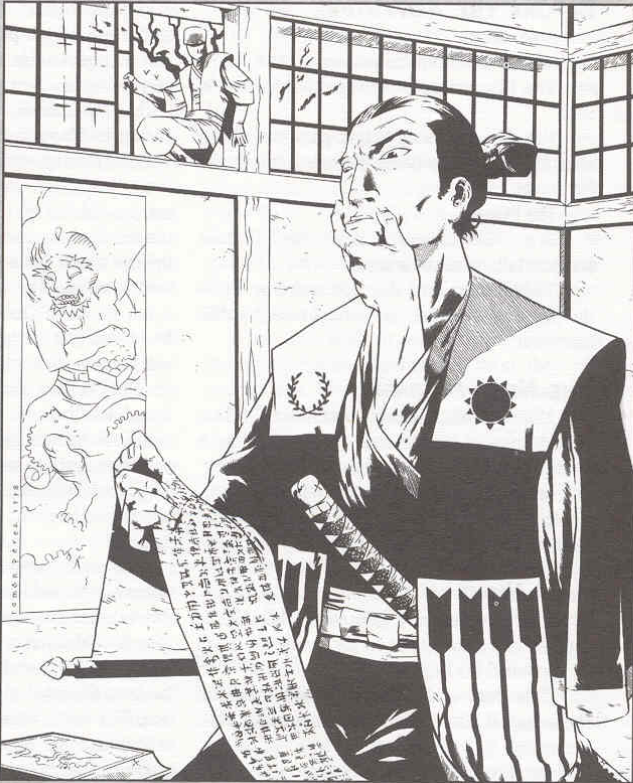
Magic robes or not, Kaagi, you're a turbodetective and he is a WHITE NINJA.
As an epilogue, Kaagi and Mei are on the trail of Matsu Nari. It hasn't been particularly hard to track him due to his wound, but Kaagi also notices a second set of trails after Nari. He also noticed that Mei wasn't affected by the smoke poison, which he chalks up to another of his servant's mysteries. Three days later, he finds an arrow sign pointing into the trees next to the road, which leads them to the body of "Matsu Nari" hanging from a tree, his throat cut. Kaagi feels like throwing up. Mei doesn't want to examine the body either, but Kaagi orders her to do so. She only finds two of his daggers, but Kaagi also remembers that Mei stopped the killer from doing Hakenka in with a blow to his shoulder, yet the clothes there are untorn: turns out, Mei used the blowgun they found. She simply tells Kaagi that she must've forgotten what it actually was when they found it. They start following the trail of Nari's killer for days, with no success. They sleep outdoors after passing several villages, and suddenly an old man wanders into their camp. Kaagi uses the respectful term "Oja-san" and calls out to him, to which the old man replies with concern: if he is a man and not a ghost, he should show his feet! Kaagi does have feet, which calms the man down. The old timer is going to see his granddaughter for his marriage, and it's a long journey so he's travelling by night. Kaagi asks him to join them for tea and dinner, and knows without looking Mei already has a knife ready just in case.
 She still smiles pleasantly at the old man,
Seru Haka. To repay their hospitality, Haka tells them a story: once, when Mother Sun and Father Moon named all things, there was one little thing that didn't want a name. And it hid itself from Sun and Moon, covering itself with another thing that was now called "shadow." It offered its help and companionship to the shadow, and since the shadow was weak and didn't want to be alone it agreed. They became friends and allies, and the unnamed thing came to be nicknamed "deep shadow" because it was so much like its partner, but that was just a nickname. Ever shone a lantern on a patch of darkness that doesn't go away as it should? Or seen a shadow on a friend's face, and how they didn't seem to be themselves? Or seen a shadow as a kid that moved when no one else did? That's it. That's always it. Haka thanks them politely and leaves, after leaving our main characters well and thoroughly spooped in the dark woods.
She still smiles pleasantly at the old man,
Seru Haka. To repay their hospitality, Haka tells them a story: once, when Mother Sun and Father Moon named all things, there was one little thing that didn't want a name. And it hid itself from Sun and Moon, covering itself with another thing that was now called "shadow." It offered its help and companionship to the shadow, and since the shadow was weak and didn't want to be alone it agreed. They became friends and allies, and the unnamed thing came to be nicknamed "deep shadow" because it was so much like its partner, but that was just a nickname. Ever shone a lantern on a patch of darkness that doesn't go away as it should? Or seen a shadow on a friend's face, and how they didn't seem to be themselves? Or seen a shadow as a kid that moved when no one else did? That's it. That's always it. Haka thanks them politely and leaves, after leaving our main characters well and thoroughly spooped in the dark woods.

Next: that was the best adventure of the book.
Way of Shadow: Crab Apples
Original SA post Legend of the Five Rings First EditionWay of Shadow: Crab Apples
Yes, as ARB mentioned, Kitsuki's log is divided in a series of entries, and the playable adventure portions of the book reference the entries, like "Entry 23: The PCs must roll Perception + Lore (Cheese) against a TN of 40 to find NINJA CHEESE hiding in plain sight..." but you only get a summary of the actual action in the journal at best. Flip back and forth, ho!
The Haunting of Hida Dasan is the second chapter of our merry tale. Kaagi and Mei are on the trail of Matsu Nari's killer. Kaagi is still annoyed at Mei and her secret knowledge of the blowgun: after lots of prodding she says that someone dropped a similar thing at the geisha house she worked at and that a visiting Scorpion lady told the girls how it was used, mostly for their own amusement. She also says that if she were lying, he wouldn't be able to tell anyway, so they decide to leave it at that. Mystery! Their quest has taken them deep into Scorpion lands and now they're about to make the cross through the Crab border. The Scorpion border guards are in an unusually cheerful mood, and they even invite Kaagi and Mei in for drinks: over sake, they happily tell them how Scorpion troops beat the snot out of the Crab in a minor border skirmish. The Crab are probably a lot less cheerful! Restocking on supplies and waving the Scorpion buds goodbye, our duo walk into the lands of the Crab.
The Scorps weren't kidding about the Crab being in a sour mood: the first patrol Kaagi and Mei run into angrily demand their identity, take them for Scorpion spies and then the leader draws his sword. Kaagi notes that there's a lot of fear and rage in the Crab's eyes, and moments later both cross swords. Further unpleasantness is averted by the appearance of a Crab commander that angrily rebukes his men. When they claim that the innocent travellers could be spies, he notes that the patrol allowed Mei to get behind their backs. They're lucky she didn't just shank all of them when their leader went aggro on Kaagi. The gruff general, Hida Misogi, apologizes profusely, but even Kaagi is disturbed by his gaze as if he were a child and did something wrong. Kaagi also spots the trail he's been following for days, but Misogi is suddenly very interested in Kaagi. As a Kitsuki, does he know about their "strange science"? Because there is a matter, a long and unpleasant story. He once again asks Kaagi to forgive his men: they've been testy after the skirmish with the Scorpion, and there's also talk of a ghost - a figure dressed in white that disappears when approached.
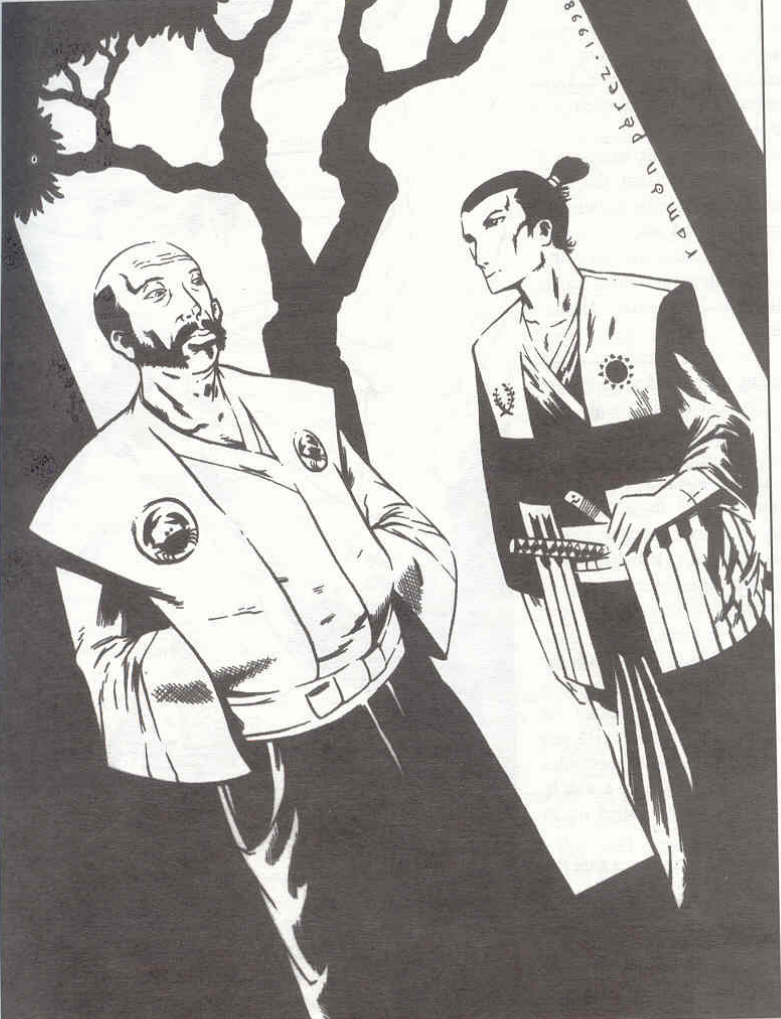
Misogi has a pretty cool 'stache.
At Misogi's home, he starts telling them the story. He explains that the Crab and the Scorpion had been involved in a land dispute: some territory that originally belonged to the Scorpions but had been granted to the Crab ages ago, only to have the old claim denied recently. The Scorpions had the home advantage in the following skirmish, but the Crab had better fighters and the guidance of a general that had returned from the Shadowlands along with his unit. Few knew of his return, and he would have been the trump card. Unfortunately, the reinforcements failed to arrive, and the Scorpion bested the understrength Crab forces. When the Crab sent scouts to find the missing unit, they found a massacre: of twenty-five men, only four lived, and only one of those was unscathed simply because he was lucky enough to be off for water when it happened. Apparently, one of the men, Hida Dasan, simply flipped out on the unit for no reason: he killed sixteen men, companions that had fought together for years, before he was brought down. Five more men died of their injuries before help arrived. Dasan and all of the men had been checked thoroughly at the Wall on the way back, and none bore the Shadowlands Taint. It is possible that the stress broke his mind, but Dasan was no rookie and had over three tours of duty beyond the Wall. Misogi asks for Kaagi's help because he's heard that the Scorpions have drugs that can drive a man mad or berserk, and he's also heard that the Kitsuki have similar knowledge "but more honor than to use them." Kaagi respectfully replies that the possibility exists, though he's never heard of such a drug, and herb traces can vanish quickly after consumption. Misogi is glad for his assistance, but he also says that they won't have access to Dasan's body for two days: Kuni shugenja are in a ritual to draw forth part of Dasan's mind from beyond to see what the hell happened.
Mei isn't too happy: the weather is dismal, and they're being housed at Hida Dasan's own home. His wife, Hida Kohi, is unwell and does not greet Kaagi personally. Mei is taken to the servants' quarters, while Kaagi gets to enjoy a hot bath and a guest room. He looks at the shadows as he's falling asleep: they seemingly move more fluidly, he's reminded of old shadow plays he watched as a kid-- and he's woken up suddenly by the cry of a boy. He draws his katana, but nothing stirs. Someone else had to have heard it, unless Kaagi was just imagining things. Satisfied that nothing is going on, Kaagi goes to sleep, feeling somewhat nostalgic by the candle light. Then, a gust of wind turns the candle off. Kaagi dreams (and knows he's dreaming) that he sees his brother: he climbs through the window and tells him he's sorry, that he tried to set things right so that Kaagi wouldn't have to. Kaagi feels guilty: he never tried, but his brother says that maybe it's for the best. Then, he's gone, and the dream shifts: now Kaagi is sitting on a fallen tree across a man that he knows is Hida Dasan, with the corpses of his company around them. Dasan is sorry that he has come. Kaagi asks if he can prove that Dasan was poisoned, but the Crab says that it's not in his body, not anything that he can recognize. He says that he's sorry, Kaagi asks if he'll go home, and Dasan says that no one goes home after a point, and that both Kaagi and him have gone too far. He really seems to regret what has happened: the madness goes away after death, he claims. He fears it will return and that he can't move on. Kaagi tries to reassure him saying that they'll burn his body soon and maybe that will help: Dasan nods, then begs Kaagi to leave. It's all coming back: his madness, his life. Our magistrate leaves him alone, hearing him start to rage incoherently behind him. And then he wakes up.

Next day, Mei introduces Kaagi to a young samurai, Hida Kurusu. He was training under Dasan, Mei explains. He is staying at Kohi's house to guard her now that her husband (his teacher) is gone. Other four men were in the house, but they've left: Kurusu is essentially ruining his career by continuing to associate with the fallen Dasan, but Kaagi sees that he won't be deterred. Kaagi and the young bushi go on a walk, and he explains that his father (posted at the Wall since his own wife died) sent him to study under Dasan, because the Wall wasn't a place for such a young man. He does not think that Dasan would have been ever capable of doing what he did. He does say that while he seemed fine after returning from the Shadowlands, he became more apprehensive after time passed. He confided to Kurusu that he felt discomfort, almost fear, parts of the day and night, as well as being plagued by bad dreams. His temper grew worse with time, lashing out at the people of his household, which Kohi endured stoically. And a few days ago, he told his young ward that "a great madness" was in him. Dream-Dasan's words come back to Kaagi: his madness, his life. Or did he say his "wife"? The real Dasan told Kurusu that while having an argument with Kohi, suddenly he looked up and saw that she had no face, just empty blackness - and that it, somehow, had smiled at him as if nothing had happened. He thought he had ran from the room in terror, but actually he had woken up. And he couldn't bear to see her again for fear of seeing her faceless. Kurusu begged him to stay, but Dasan didn't want to stay in the house anymore. The young man, with pain in his eyes, tells Kaagi his suspicion that Kohi is a maho-tsukai, and the magistrate realizes why Kurusu hadn't spoken up himself - if she isn't, he has betrayed both her and his lord.
Kaagi and Mei go to visit the general of Dasan's unit. He is still alive, but hopped up on painkiller herbs. The general Nakai is a wreck: he can talk, but he has a deep gash in his face and most of his body is bandaged. He says that Dasan had a "demon" in his eyes: he moved like a serpent, unlike anything he had ever seen. His best men never even managed to draw his blades - Nakai taught them to see menace in everything, but not to fear their brother, not here. And the worst was that he was screaming, in his own, sane voice. He howled that they were demons, that he knew, that he saw their faces - and when he died, he said that he had saved them, that it could not find them now. And then Nakai drifts off into sleep again.
Kaagi thinks Nakai is delirious, but Mei really gives thought to the idea of possession. He tries to joke about it, but Mei is not joining in. Back in Dasan's home, Kohi is still not coming out, and generally things are as cheery as a funeral. They eat, and then Kaagi is off for a hot bath in the tub. He ponders on Kurusu's story, on Dasan's words in his dream - why can't he remember if he said "life" or "wife"? He should be able to recall his dreams perfectly with little effort. He hears/imagines in the battered general's voice, "She had no face," and just while he's meditating on where the rest of his broken arm could be, the magistrate feels something moving over his leg. He all but leaps out of the tub, but can't see anything on the water in the bathroom with just candle light. And his katana is all the way in his room. The door bursts open and Kaagi grabs the taper candle, and he sees a figure with no features on his face. It speaks with Kurusu's voice, but Kaagi feels vertigo, the room spinning around him. Kurusu speaks again in concern - right, his face is there, it's just hard to make out. Kaagi says that there's something in the tub. The Crab does not even attempt to question Kaagi and examines the tub - nothing. Then they both realize the hot wax from the candle is falling on Kaagi's bare skin. Putting it on cold water, Kaagi insists on something being in the tub while he was having his bath: Kurusu does not doubt it for a moment. They go to Kaagi's room, where Kurusu says that after he left him earlier in the day, he saw something - a nightingale that Dasan had gifted Kohi, dead with its head twisted. How could this be anything but sorcery? Kaagi says that there are mundane explanations for the bird's death, but Kurusu retorts about the thing that was with Kaagi in his tub. The magistrate insists that they should wait, but Kurusu says tomorrow night, after he's seen the body, he'll know what is truth and not - and will act on it.
Later, Mei wakes him up: she couldn't sleep, and thought Kaagi couldn't sleep either. Well, he was asleep.
 She is acting strangely, asks if he is asleep now, touches his leg - it feels like the thing in the tub. Kaagi is up and with his wakizashi in his hands, and he feels her laughing without making a sound. The silhouette in front of him is too wrong to be Mei. It says that it came out of hospitality, to see if he is comfortable. The voice makes him of serpents, and then he starts thinking of spiders on a severed arm, the wings of a nightingale, and then Hida Dasan with a gaping hole on the side of his head, looming in front of him. The woman-thing says she's glad he's met his husband - both could be friends. Kaagi realizes suddenly that they are on the field where Dasan killed his comrades, and that both are getting ready to fight. The Crab looks too mauled to stand, but the determination in his remaining eye is grim. The fight begins, and Kaagi is barely able to keep up with the maddened Dasan: he cuts over and over, and the Crab just doesn't stop. Finally he manages to cut his hand, and then works up to his neck. The stench of the place rises, and Kaagi feels like he's falling forever---
She is acting strangely, asks if he is asleep now, touches his leg - it feels like the thing in the tub. Kaagi is up and with his wakizashi in his hands, and he feels her laughing without making a sound. The silhouette in front of him is too wrong to be Mei. It says that it came out of hospitality, to see if he is comfortable. The voice makes him of serpents, and then he starts thinking of spiders on a severed arm, the wings of a nightingale, and then Hida Dasan with a gaping hole on the side of his head, looming in front of him. The woman-thing says she's glad he's met his husband - both could be friends. Kaagi realizes suddenly that they are on the field where Dasan killed his comrades, and that both are getting ready to fight. The Crab looks too mauled to stand, but the determination in his remaining eye is grim. The fight begins, and Kaagi is barely able to keep up with the maddened Dasan: he cuts over and over, and the Crab just doesn't stop. Finally he manages to cut his hand, and then works up to his neck. The stench of the place rises, and Kaagi feels like he's falling forever---
---to wake up to a worried sick Mei and a slightly less worried Kurusu, who is holding him up. Apparently Kaagi didn't show up for breakfast, and they found him collapsed on his room with his wakizashi by him. Mei tries to make light of the situation but she can't hide her concern. Kurusu is also worried - what should he do? Kaagi gets his shit together and tells him to do nothing until he gets to speak with the shugenja. Actually, Kurusu should just leave the house, and do anything other than staying there. Kaagi will go to find him. On the way to Misogi's place, Kaagi explains last night's events: Mei is convinced Kohi is a tsukai and should burn, but Kaagi feels there's not enough evidence. She is frustrated by Kaagi's seeming inability to act on what his own eyes and ears tell him. With Misogi, they go to meet the shugenja, Kuni Yanaka. He's properly creepy as any good Kuni is, and he leads him to the room where Dasan's body is - impaled on a jade spike. Kaagi is juuuust a little shocked.
 After snapping out of it, he notices that the shugenja performed an autopsy on the body. There are other two men in the room:
Kuni Kabai and
Kuni Inoba: Kaagi knows this last one as one of the feared Witch Hunters. Yabai, all gentle smiles, says that there's no trace of the Taint in Dasan. Misogi tells Kaagi to investigate, and Mei starts doing what she does. When she's done, Kaagi thinks that Mei might just be Kuni after all. Finally Kaagi has to admit there's no evidence of poisoning of any sort, but also that the leads are pointing to Hida Kohi: he narrates the strange happenings of the past days.
After snapping out of it, he notices that the shugenja performed an autopsy on the body. There are other two men in the room:
Kuni Kabai and
Kuni Inoba: Kaagi knows this last one as one of the feared Witch Hunters. Yabai, all gentle smiles, says that there's no trace of the Taint in Dasan. Misogi tells Kaagi to investigate, and Mei starts doing what she does. When she's done, Kaagi thinks that Mei might just be Kuni after all. Finally Kaagi has to admit there's no evidence of poisoning of any sort, but also that the leads are pointing to Hida Kohi: he narrates the strange happenings of the past days.
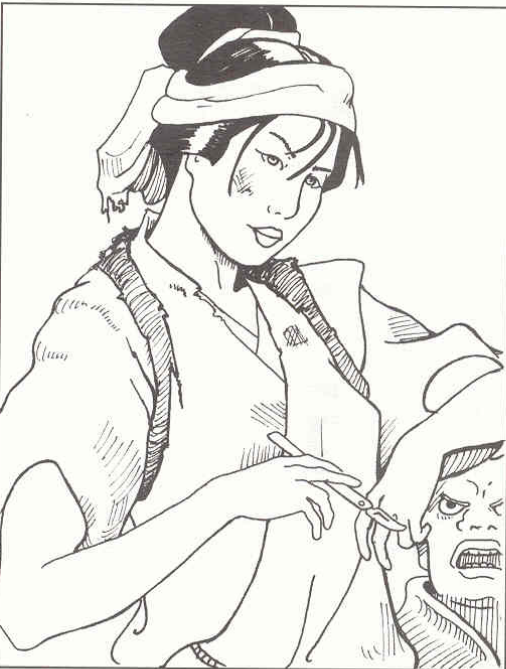
Mei is bae. Or maybe not!

All six of them go to Kohi's house under the rain, and Misogi commands her to appear. Kohi finally shows up: Kaagi identifies her as the person that was in his room, and she is really pissed at the rude interruption of her grieving. Inoba subjects her to a battery of Witch Hunter tests: making her hold jade, reflecting her on a rock mirror, making her eat a jade coin, binding her limbs because maho-tsukai totally can't stand having this done to them... none pan out. Kaagi already knew this was wrong, but could not stop the Crab from making their tests. At the end, everyone is kinda embarrassed but also relieved. Surprisingly Misogi isn't even angry at Kaagi later: as he sees it, Kaagi just laid down what he had seen and experienced, but the Crab made the call to test Kohi. So much the better, then: it's just a case of a man that broke under pressure. Misogi is still disturbed by Kaagi's dreams, considering them an ill omen. Kaagi decides to stay at Misogi's place to not bother Kohi anymore, but he still has to go fetch his journal in spite of Mei's protests. It's raining heavily and he is completely soaked by the time he reaches Dasan's house. The door is ajar, and the front room is empty.
quote:
I call out a greeting, softly. I don't want to startle the maids, and I'm loath to disturb Hida Kohi. No one answers. Lighting a lantern from the front room, I proceed into the house. The kitchen is empty as I pass it on the way to my chamber. I gather a couple of my belongings, then shoulder my pack. Reentering the hall, there''s still no noise. Perhaps everyone has retired, but I don't know why they would have done so with the door still open.
"It's to let the smell of the rain in," says a voice close to me. "I love the smell of rain at night."
Kaagi spins ready to draw his sword, and it's Lady Kohi in the hall. She was just coming from the bath, she claims, but Kaagi is not as easily tricked. What is she? The fourth wall-breaking thing asks if she is his hostess, or the dark that he guards against with his lantern. It won't help. It's only the illusion of light, and they have been watching Kitsuki Kaagi for a long time. Maybe they could be friends? She offers him a gift that is in her chambers, and with his blade between them Kaagi lets her pass. She asks if Kaagi is lonely, and he asks back, how long has she been watching him? Well, he was her guest, it was her job to watch him, to give him what he desires. Her gift is never having to be lonely again, or afraid of the dark. In her chambers, there are three bodies: two of them are the maids, the third is Lady Kohi, and the thing with Kohi's shape now has no face but in the nothingness there the madness of Hida Dasan grins back. It's all superficial, it says with the voice of Hida Kurusu. With all the strength he has left, Kaagi throws himself out of the room, and outside, while it calls out to him.
Our magistrate wakes up in Yanaka's house with Mei now looking as if she had been crying her eyes out. They found him on the street, covered with mud: the rain almost drowned him. Mei is definitely sniffling, for all that she snarks back at Kaagi. Apparently he had been muttering things about Kohi not being herself and having no face, which was enough to convince Kurusu and Misogi to set the whole house on fire. Misogi wasn't convinced until he saw Kohi dancing in the fire, though. Kaagi asks Mei if she saw Kurusu after that, and she says no. He tells her what happened, and also confesses that he has no idea what any of it means. They bid Yanaka goodbye as fast as they can, and passing the burnt remains of Dasan's home they find Inoba poking in the wreckage. Inoba and Kabai were too late for the burning, but the witch hunter is concerned that his tests didn't catch her corruption. Kaagi says that he doesn't think Kohi had anything to do with it, and that he fears something worse was involved and that Kurusu was somehow involved. This makes enough sense to Inoba: he tested a normal human, but an oni in her shape spoke to Kaagi: perhaps it caused Dasan's troubles and might have been Kurusu all along. Kaagi grows increasingly frustrated, convinced they're dealing with something other than oni, but Inoba insists it was a Shadowlands creature. The magistrate realizes that the witch hunter will refuse to believe in a new threat aside from the ones he already knows.
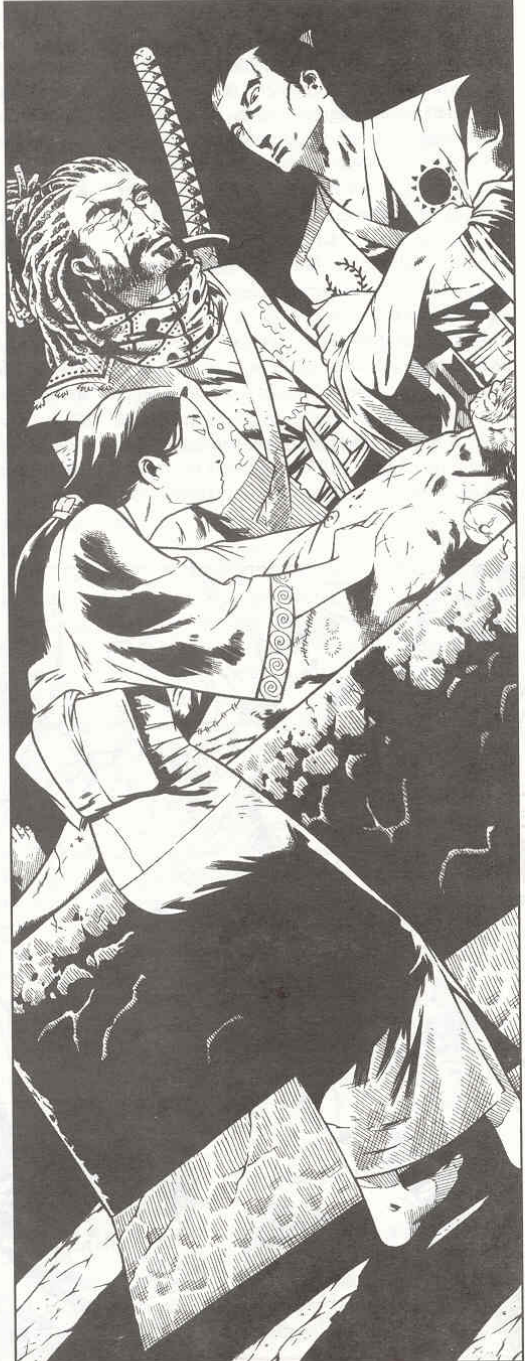
Inoba mang are those fucking dreadlocks
The adventure part! The book says the setup can be as simple or as complex as the GM chooses: this chapter can be a story on itself, filler between other episodes of a campaign or simultaneously run with another adventure. This latter suggestion involves running the "real" adventure by day and the events of Kaagi's investigation by the evening - players won't expect to be attacked in the "inn." It's easy to bring them in by making up a reason to cross from Scorpion to Crab lands, then having a storm hit so that the PCs have a reason to stay at the village. The most important thing is that they stay at Dasan's house. The Living Darkness has an interest in the PCs now, either from their actions in Ichime Castle or (like Kaagi) from their background. The early part of the adventure plays out much as it did for Kaagi: happy Scorpions and grumpy Crabs. The Scorpion guards are just regular dudes - just because they're Scorpion doesn't mean they can't be regular people. They will tone down their gloating if Crab PCs are around but will still tease a bit. In Crab lands, the PCs will find the Crab patrol is really spoiling for a fight (Perception + Stealth roll against TN 15 to spot the patrol) and any Scorpion PCs will be "challenged" first. Awareness + Sincerity at TN 30 to solve things diplomatically, but Misogi will bail the PCs out anyhow. If the GM is running things straight from Ichime, Misogi will make the comment about the white ghost. He explains the situation to the PCs and asks them for help depending on their specialties (like asking a Kitsu to speak with Dasan's spirit) with the same issue about the body not being available until a couple of days later, and he'll be very sorry about asking them to stay but this is important.
quote:
The PCs could say 'no', at this point, but if they do, remind them just how poorly that refusal will reflect on them and the lord(s) they serve.
ALRIGHT WE'RE NOT GOING TO STEP OFF THE RAILS, GEEZ
The PCs will be encouraged to stay at Dasan's place, though it doesn't really matter if a PC commandeers a peasant house or anything: the Darkness doesn't give a shit about geography. Also, if the PCs leave the village the dreams of the slain Dasan keep calling them back. In fact, they will gain the Nightmares disadvantage for staying at Dasan's place: the Darkness will infiltrate the dreams of a single PC chosen every night to spook them, and sleeping will not restore Void points. They can only get them back through meditation. The Darkness also gets +10 to its TN when PCs are out of Void. Oh, and if the PCs leave the place without solving the adventure, the Nightmares are permanent.
 The PCs will be spread across three guest rooms (female samurai that share quarters with their male companions take a -1 Honor point hit) and then the "fun" will begin. One PC at the time will hear threatening noises and screeches that no one else will hear: the maids will say they were fast asleep, while Hida Kurusu will be wide awake - he hasn't been able to sleep well since the battle, but he'll also say he didn't hear a thing. Hida Kohi won't be available, but sometimes PCs will be able to hear what's probably her voice humming a sad melody. They will never see her directly though. The song can be identified with a Perception + Bard, Music or Poetry roll at TN 15: it's a ballad about a woman that sees her husband go off to war, then he returns as a ghost to take the now old woman to the afterlife. But in alternate endings, it is the woman that has been a ghost all along!
The PCs will be spread across three guest rooms (female samurai that share quarters with their male companions take a -1 Honor point hit) and then the "fun" will begin. One PC at the time will hear threatening noises and screeches that no one else will hear: the maids will say they were fast asleep, while Hida Kurusu will be wide awake - he hasn't been able to sleep well since the battle, but he'll also say he didn't hear a thing. Hida Kohi won't be available, but sometimes PCs will be able to hear what's probably her voice humming a sad melody. They will never see her directly though. The song can be identified with a Perception + Bard, Music or Poetry roll at TN 15: it's a ballad about a woman that sees her husband go off to war, then he returns as a ghost to take the now old woman to the afterlife. But in alternate endings, it is the woman that has been a ghost all along!

After two or three in the morning, the PCs will "meet" Hida Dasan. Willpower against TN 20 when speaking to him: those who pass this roll can elect to wake up from the dream by spending Void Point. Those who stay are in a deep slumber from which they cannot be awakened, and for the rest of the adventure these characters cannot use Void Points to assist their rolls.
 Dasan will tell the PCs the same things he told Kaagi, then they can leave the dream as the madness takes over again. The village,
Utokii, is a typical Crab border settlement and a pretty morose place with the massacre and the loss to the Scorpion. Kurusu will seek the PCs out if they don't go to him and confide in them his disturbing observations with regards to SORCERY. Misogi will be busy (the servants hint that he's spending time with his mistress if pressed), Yanaka will also be too busy to see them, while the wounded general Nakai is there if PCs want to go bother him. The local barracks have twelve bushi, none of which was in Dasan's group. They'll still be somewhat suspicious of the PCs, but will talk more freely with a Crab PC. The word is that Dasan was insane, but didn't become so until after his return from the Shadowlands. Some rumors say that it wasn't Dasan that cane back, but an oni in his guise.
Dasan will tell the PCs the same things he told Kaagi, then they can leave the dream as the madness takes over again. The village,
Utokii, is a typical Crab border settlement and a pretty morose place with the massacre and the loss to the Scorpion. Kurusu will seek the PCs out if they don't go to him and confide in them his disturbing observations with regards to SORCERY. Misogi will be busy (the servants hint that he's spending time with his mistress if pressed), Yanaka will also be too busy to see them, while the wounded general Nakai is there if PCs want to go bother him. The local barracks have twelve bushi, none of which was in Dasan's group. They'll still be somewhat suspicious of the PCs, but will talk more freely with a Crab PC. The word is that Dasan was insane, but didn't become so until after his return from the Shadowlands. Some rumors say that it wasn't Dasan that cane back, but an oni in his guise.
Those rumors are half right: something did come back in Crab skin. But it wasn't Dasan, it was Kurusu.
The site of the slaughter is much less wretched than in the dream: already the corpses and remains have been taken and properly burnt. A Perception + Investigation roll of 40 or higher---
40 or higher
Let me check my 1E corebook for the probabilities table... ah, yes! With 3 in Perception and 3 in Investigation, the chances are 7%. A Perception of 5 and and an Investigation of 4 (basically literal Sherlock Holmes) only gives 57% odds. Jennifer, what the fuck. Anyway, if the PCs make this roll they can find General Nakai's missing arm. Gross, and useless! If they make a roll of 25 or better, they can find a set of carvings on the trunk of a fallen tree. Presumably Dasan made them, and they say "My face is my own" over and over. As for Kohi, there's nothing really wrong with her other than her grieving for her husband, but her absence and circumstances make her a prime target for suspicion, which Darkness!Kurusu will make sure to inflame. The second evening is much the same as the first, and Kohi won't show up again. Kurusu will inform of his "fears" to the PCs if he didn't meet them earlier. There's no Taint to detect and Dasan's spirit cannot be summoned, if the PCs think of that. When they go to sleep: bam, nightmares again! Kohi creeps people out! The Darkness will make sure to tailor the visions to the PCs, so the GM should feel free to hit them with visions of all those NPCs they have in their sheets and backgrounds and so on. When everyone has reached the point where they realize "Kohi" is wrong and "Dasan" shows up, they get to fight him! PCs could fight him one on one if they are few or the players are "very patient", but the book really recommends that everyone gangs up on Dream Dasan to finish the session in a reasonable amount of time. This Dasan won't be affected by wound penalties, and enchanted weapons don't do anything special: the only way to stop him is to do what Kaagi did and behead him with a +10 TN called shot. If any of the players happens to have some sort of spirit banishing spell and successfully casts it, Dasan's grateful spirit is sent away from the Darkness' grasp for good. Once either of these two conditions are met, the PCs fall in a deep slumber and will wake up a couple of hours after dawn. PCs that die fighting Dream Dasan cannot use Void Points for the rest of the adventure and pick up Phobia: Undead, for -1 R&K die to all rolls involving Dasan. Yikes. Also they get an extra -1 to all physical actions for the rest of the day due to their nightly exertions.
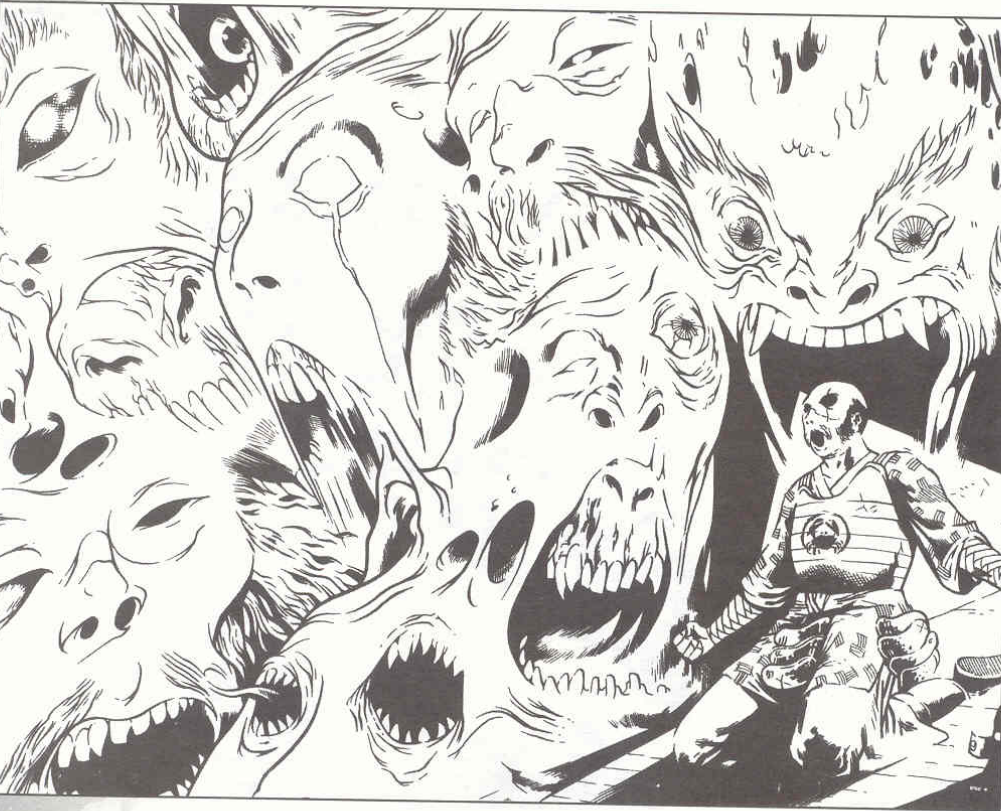
Get spooked.
The events of this day play out differently depending on PCs' reactions, but basically the Crab shugenja will come to the conclusion that Dasan's body does not present the Taint, and Kuni Inoba will subject Hida Kohi to his witch tests. Some of these might just work and some might just be dumb superstition depending on the GM's whim, but of course since Kohi is not Tainted or a maho-tsukai none will do a thing. The players may or may not buy the idea that it was a mundane madness that forced Dasan to kill his people, but they're welcome to do their own investigations and tests. The real thing comes at night: the Darkness is ready to move on. A hurried message from Kurusu will lure the PCs to Dasan's home if they're not staying there. They find things as Kaagi did: the door ajar, no one home... and then, the lights go out, and Kohi shows up! The PCs realize that all they can see is Kohi and themselves - other PCs vanish from their sight. Kohi talks intimately to them, saying how they have expected them, and are willing to welcome them. Any PCs that stay outside find nothing out of the ordinary. The PCs may call to each other but their voices are distorted, as in a dense fog; they might try reaching for each other's hand only to find that the "hand" twists and coils in their grasp, and other shenanigans. Any characters that choose to strike at Kohi and roll more 1s that any other number end up hitting and ally. Eventually, the shadow fog vanishes and they see Kohi's room. Shadow Kohi is faceless and has a Fear rating of 3, and PCs must roll their Willpower against a TN of 15 or run away. They might take 1 Wound Level of injuries on their rush to get away from the faceless thing. Kohi won't attempt to stop them, and characters that make their roll can leave calmly, but if they choose to attack her the first strike will go through Kohi, hit a lantern and set the house ablaze. The commotion will be noticed by the Crab, and Inoba will be convinced of maho work whatever the PCs tell to him, and recommends Misogi that Dasan's house is put down. By morning, all evidence will be gone. If the bodies of the women are pulled before the fire, the maids present no untoward signs, but Kohi will show signs of heavy struggle. She was a Crab and a warrior's wife, after all. And no one will ever see Kurusu again: Inoba and Misogi will assume he was also a maho-tsukai, but he is actually part of the Living Darkness. The PCs get Misogi's thanks for their part in the issue, and if they have no further business all the supplies they need to get back on the road.
Wait, where's my XP?
Jennifer!
Next: and you thought THAT was bad.
Way of Shadow: The Doji Witch Project
Original SA post Legend of the Five Rings First EditionWay of Shadow: The Doji Witch Project
The next part is called The Disappearance of Lady Ninube. Ninube, Ninube... where have we heard that name before? Ah, yes - one of the ninja families in the original corebook writeup, the one where children were raised with multiple identities. Probably related??? Anyway, our man Kaagi is resting in Kyuden Tonbo, seat of the Dragonfly Clan, while he and Mei restock on supplies for the journey back to the Kitsuki castle. He is still rattled by the events in Crab lands, unable to explain fully what happened but feeling he is on the verge of finding something significant. He is also experimenting a sensation of lingering dread and bad dreams that he can't fully recall. Spooky! Mei is back.
quote:
"The pony has new tackle," she says. "The old stuff was worn and wouldn't have lasted much longer. Our food stores are full, I picked up new shoes and such to replace the rest of the things I lost in the fire. And I brought you a new kimono with lilac blossoms and frolicking ponies on the front and an indisposed geisha on the back. Are you listening to me at all?"
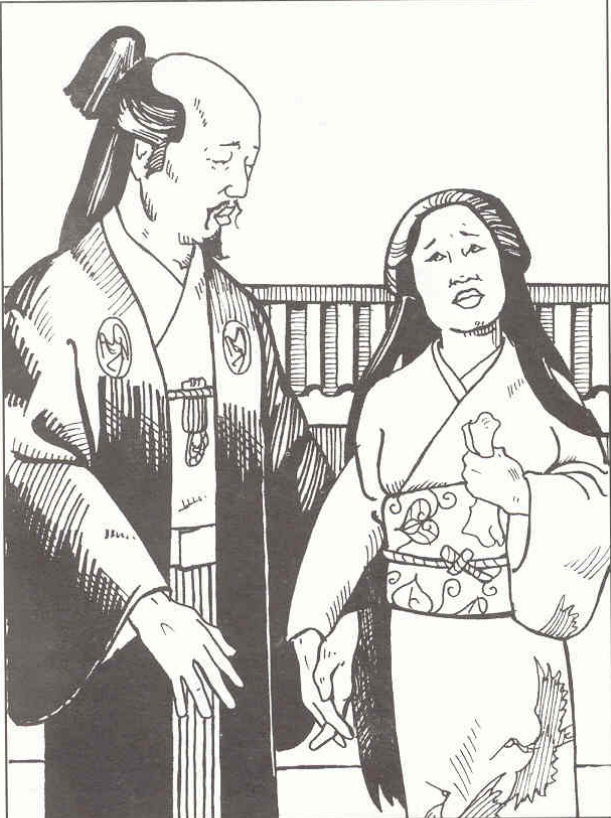
"Our daughter has run off with those Ninja Boys, hun!" *laugh track*
Oh, Mei. Kaagi trusts in her judgment, but he still checks the kimono to see if she really bought that monstrosity. It's fortunately a plain one. Mei says it's good weather for travel, but when the magistrate says there's no rush and that he'd like to go out for dinner she also says that it's probably going to rain soon and that they should stay inside. Kaagi figures that she must be disturbed by something if she's lying to him so poorly: as it turns out, there is some Crane guy, a karo for some lord out in the streets calling out for 'the Great Kaagi of legend and story' to enlist his aid. Of course, Kaagi has to go out to see what's going on, whatever Mei mumbles behind his back. It's not difficult to spot the Crane, since he's making a big show of trying to find him. He is Daidoji Sanju, karo to Doji Mikara of Ukara Castle. He asks for Kaagi's help and our hero readily agrees, while Mei just shakes her head. As it turns out, the lord's daughter is missing: she left two weeks ago to the home of the Phoenix lord she was supposed to marry, but never arrived and neither she nor anyone in her entourage has been seen since. The Crane have asked for help from Otosan Uchi, but Sanju knew about Kaagi and he was closer. On the road, Sanju explains that Ninube, the young lady, was to marry Isawa Ujina, and the union had brought great joy to her family. Two weeks ago, Ninube set out to see Ujina's family before the marriage next spring; one week ago, Ujina arrived at Mikara's castle, concerned that Ninube had failed to arrive. Once they realized what had happened, everyone sprang into action. Fortunately, a party of Imperial magistrates had coincidentally stopped at Mikara's place on the way to Otosan Uchi and offered their help in finding the girl. Unfortunately, they haven't shown up either. Kaagi notes how Sanju's account seems practiced, but he attributes it for a normal concern for formality and phrasing. The Crane also says that there's rumors with the servants: it was the work of ninja!

In less than a day, they're in Ukara Castle. It looks ornate in the Crane manner, and Mikara is found in a sort of crisis room, surrounded with maps that no one seems to be paying real attention to. Mikara is relieved to see Kaagi, as his reputation precedes him. He is an old man, and Kaagi can't help but feel sympathy for his loss: he clearly is trying really hard to keep panic out of his voice. Kaagi relates the facts as he knows them and asks if the Phoenix guards at the border saw Ninube's party, which they hadn't. She did cross the river on the way there according to waypoint guards, as did the Imperial magistrates. Isawa Ujina is in the castle, trying to catch something through his meditations without success. He also wants to go find her post-haste, but Mikara persuaded him to wait until Kaagi arrived - he also confesses that as much as he loves his daughter, he can't afford to lose a prominent Isawa family's eldest son too. The Scorpion magistrate will perhaps want to join the search party too. What Scorpion magistrate? Oh, apparently the Imperial magistrate party had a Scorpion member, who got sick and had to stay at the castle while his companions went out.
Kaagi doesn't have a good night. He can't help but think of the Crane lady from Akodo Temoru's story: massacred by Lions manipulated by Scorpions. He doesn't sleep well, and neither does Mei. He decides to talk to the Scorpion first, and Mei advises him to at least eat breakfast before doing so. He really wishes he had taken her words more seriously later when talking to the Scorpion magistrate, Bayushi Baka. (Baka? Really?) The Scorpion sincerely wishes he could be of more help, but he sincerely thinks he doesn't have any more knowledge that Kaagi has. Our guy asks if he will join him in searching for Ninube, but Baka sincerely regrets that he has orders from Bayushi Shoju himself to return to Scorpion lands as soon as possible. They look at each other: Baka is lying, Kaagi knows it, Baka knows that he knows it. And suddenly, the Scorpion's mask of sincerity is dropped. He hates Kaagi and all the Kitsuki - "we are spiders and you are ants," he says, but still he explains why he didn't go with his companions: they were doomed. He would not have helped in anyway. Kaagi realizes that Baka knows something of the mysterious presence that he has been facing so far. The Scorpion says that he knows he's caught the eye of something Kaagi wishes he hadn't, and that it is waiting for him. He warns him to not let himself or any of his companions to travel alone, to trust on what he feels - especially fear - but not to put too much trust on what he sees or hears, and above all things to trust himself. By the time he can't trust himself, he won't care anyway. Kaagi, his voice hollow, asks if he would have warned his friends; Baka counters, would Kaagi have heeded those warnings without knowing what he knows now? He stands up to pack his things after wishing him luck. Kaagi turns and says that there will be one less ant if he doesn't return; without turning back, Baka says that he is right.
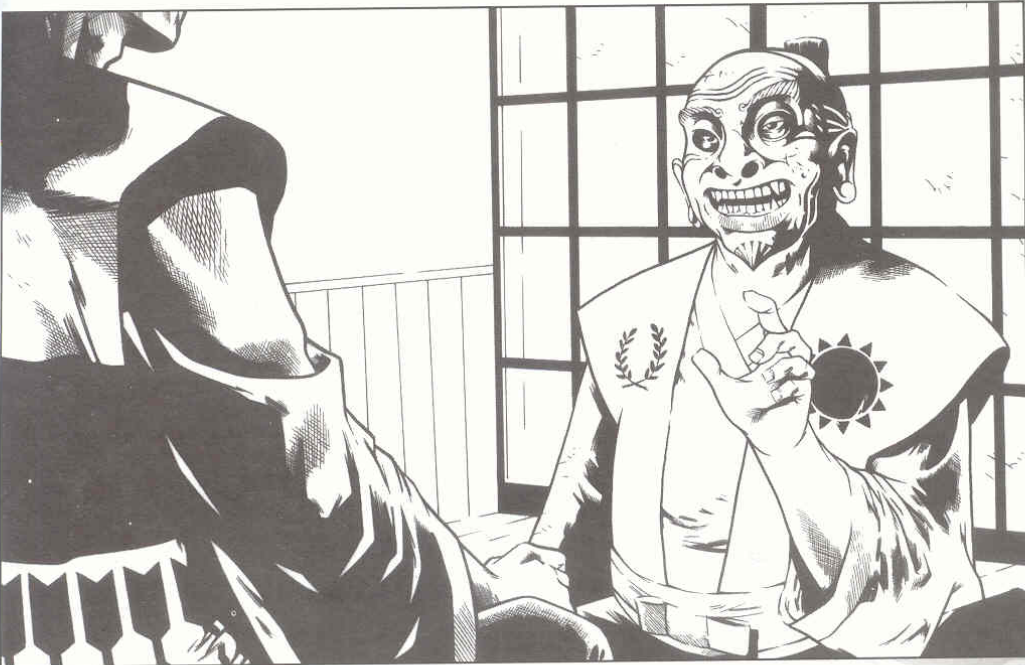
Definitely a Baka with that stupid fucking mask.
Isawa Ujina is in the courtyard. He is a young man, refreshingly genuine after Baka. He is still obviously worried for Ninube. Suddenly Kaagi starts examining him closely, and Ujina is taken slightly aback. As it turns out, the Phoenix has not slept at all, but his meditation makes up for it. He has been trying to discern Ninube's whereabouts with meditation, which interests Kaagi as apparently some Phoenix could be just as perceptive as those trained in the Kitsuki method in those trances. Ujina says that he's found no traces of Ninube, which is wrong - even if she were dead, he would have sensed her corpse by now. Ujina is curious in spite of himself. Mikara furnishes them with plenty of supplies and off they go! They talk on more light matters on the way there - the Isawa school and the Kitsuki school are interested in each other's philosophies - but yet Kaagi can't get a sense of foreboding away, which Ujina picks up on even without looking straight at him. In the last village they will find before the Nemui Kaminari Yama mountains between Crane and Phoenix territory, the headman tells them of disturbing rumors: strange riders at the edge of the hills, bandits perhaps, or something even darker: ninja! Ujina has heard nothing of the sort on his side of the mountains, but he considers the talk of ninja unlikely. Kaagi says that if there are bandits they'll most likely keep Ninube well: he doesn't actually believe his own words, and knows that Ujina could see that if he wanted, but also that the Phoenix really wants to believe him right now. They continue on as the day falls, reaching rockier ground by twilight: Ujina urges them to push on a little further. Mei remains silent as she often does when Kaagi has company, but she is paying attention to their surroundings. As night falls, Kaagi feels like they're getting trapped: a foolish notion, and yet he can't get Hida Dasan's wife out of his head - and then he trips and falls. Busted ankle! Ujina apologizes and says they should have stopped while there was still light, and Kaagi just nods because saying anything else would be petty.

They find a clearing to camp, and Ujina works some magic to light up a fire. The provisions are exceptional as can be expected of a Crane family. The road will only get more treacherous from then on, and it's clear that Ujina wants to send Kaagi back with his hurt foot. Of course, Kaagi will only go if Ujina goes, and the Phoenix won't quit, and only Kaagi can follow the tracks. Kaagi resolves to go on, and catches Mei looking at him with intense sadness. By the time he is dozing off to sleep, suddenly a woman's scream rings into the night: Ujina is up and ready to run but Kaagi stops him, remembering Baka's warning not to leave people alone. With Mei supporting him, Kaagi marches on, barely keeping up Ujina's pace. Another cry, and the Phoenix is convinced it's Ninube. The ground is treacherous, branches scratch at them, and Mei thinks all of this is really goddamn stupid. It soon becomes more about keeping Ujina in sight that actually trying to find out what the screams are about, until the Phoenix stops: he heard Ninube crying and sobbing, and now he's lost her. Kaagi and Mei soon pick up on the unnatural silence of the forest they're in, and then they hear a woman's scream again. A breeze passes from where the sound came, and then the normal night sounds resume. Something stirs in the dark: a black owl, carrying a pendant that Ujina identifies as Ninube's. The Phoenix is completely puzzled - the owl wasn't there, it says. He saw it but he had no sense of the owl's presence. Ninube never took off that pendant. Is this maho? After two hours they return to camp, only to find the smell of blood - lots of blood. Their camp is a disaster: something has torn their bedrolls, made a mess of the provisions, and the poor ponies are slaughtered brutally, their entrails on the ground or hanging from the local trees. Mei goes on a run with her knives around the ruined camp, making damn sure she is in sight of Kaagi, while Ujina tries to keep his lunch inside. Who could have done this? Kaagi has his suspicions. Mei thinks she can salvage some of the food and says they should all go back now, but poor Ujina's desperation kicks in again and he says that whoever took Ninube had to have distracted them to get them off their trail. Kaagi corrects him: they distracted them to do this to whoever stayed in the camp. All the more reason to go on, Ujina says, and it's clear he won't be deterred. It's stupid, Mei mutters when Kaagi walks up to her: Ninube is dead, and maybe it's better like this. She knows it, Kaagi knows it, Ujina knows it - but the Phoenix can't go home without her. And so, the three continue the search.
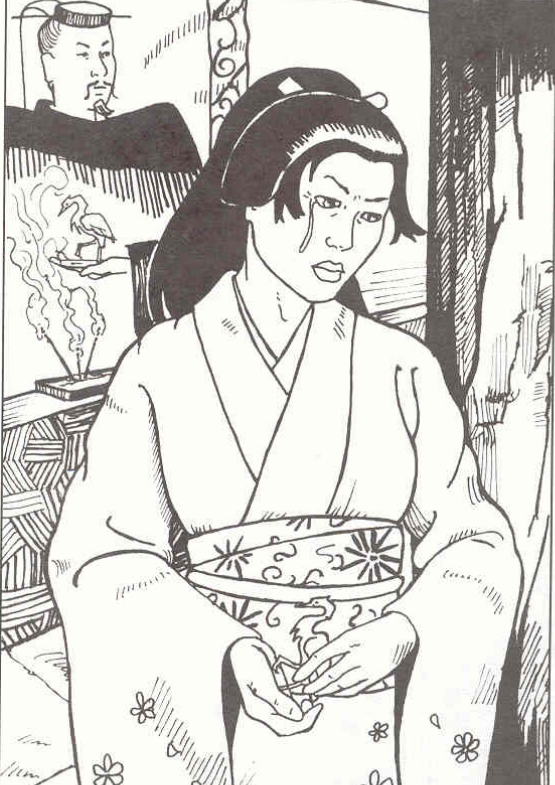
Your My Little Ki-Rin figurine won't save you from THE DARKNESS.
Neither of them is really rested in the morning. Mei makes a poultice for Kaagi's foot, and they move on after breakfast. At last they catch the tracks of Ninube's party, as well as those of the magistrates. When they reach the mountains, the trail becomes much harder to follow as there's little more than soil over stone on the ground. Over a chasm, Ujina spreads his perception - he can't find Ninube, but there is something else nearby that leaves him unsettled. Probably me, Mei says. She had been joking to Kaagi if Ujina would jump off the cliff before.
 Further ahead, Kaagi spots a broken branch on a tree: probably the magistrates. Cautiously they move into the treeline, and the leaves hide most of the sunlight and the temperature drops hard. Kaagi and then Mei catch the smell, once more: bodies, too torn and rotten to identify, but enough is left of their mon for that. The most whole of the bodies, a Crane and a Crab, lie on the ground: the Crane has deep gashes in his torso. An Asahina woman is impaled on a tree branch. A Lion tried and failed to keep his intestines inside his belly. A fifth magistrate is headless. Ujina's meditation lets him feel the terror: whatever it was, it came on the magistrates without any warning. And yet he can't feel any haunting or anything like that: the local elements sensed what happened but can't make any sense of it. It was something out of nature. And Mei finds... the trail of Ninube's party. Ujina sees it, too.
Further ahead, Kaagi spots a broken branch on a tree: probably the magistrates. Cautiously they move into the treeline, and the leaves hide most of the sunlight and the temperature drops hard. Kaagi and then Mei catch the smell, once more: bodies, too torn and rotten to identify, but enough is left of their mon for that. The most whole of the bodies, a Crane and a Crab, lie on the ground: the Crane has deep gashes in his torso. An Asahina woman is impaled on a tree branch. A Lion tried and failed to keep his intestines inside his belly. A fifth magistrate is headless. Ujina's meditation lets him feel the terror: whatever it was, it came on the magistrates without any warning. And yet he can't feel any haunting or anything like that: the local elements sensed what happened but can't make any sense of it. It was something out of nature. And Mei finds... the trail of Ninube's party. Ujina sees it, too.
quote:
"It's her, isn't it?" His tone is quiet, filled with tension. "She came into these woods with whatever did that." He makes a sharp gesture back towards the bodies.
The trail isn't hard to follow. Half a mile into the woods, they pick up on the smell of death again. The remains of Ninube's party lie there, bodies piled on top of each other. Mei examines the corpses while Kaagi holds Ujina back: no noble women among them, just one Daidoji maid. All of them killed by having their throats slit, and nothing more aside from some minor cuts on a couple of the bushi guards. None of it makes any sense: did they all wait patiently to get killed one after the other? It's too clean, no signs of a struggle. The horse prints keep going, and there seem to be three sets of footprints, none of which belong to a woman. Maybe bandits did take Ninube after all: the possibility that whatever attacked her party is unrelated to the MURDERFORCE that slaughtered the magistrated and ruined our heroes' camp is minimal, but Ujina wants to believe it and Kaagi has no reason to disappoint him, especially since he can't make heads or tails of the situation. Half an hour later, they find a cave - and a dozen ponies, very much alive. Ujina draws on his powers: the horses are fine, they can drink water and graze, and haven't seen anyone for a long time since their new riders left. They miss their old riders.
 The riders went in and haven't come out. Ujina's humor has returned somewhat, but he is going to go in the cave even with Kaagi advising to pull back and get Mikara's men as backup. Besides, Ujina says, they put anyone they bring in at risk from a force none understand. And on they go into the dark cave!
The riders went in and haven't come out. Ujina's humor has returned somewhat, but he is going to go in the cave even with Kaagi advising to pull back and get Mikara's men as backup. Besides, Ujina says, they put anyone they bring in at risk from a force none understand. And on they go into the dark cave!
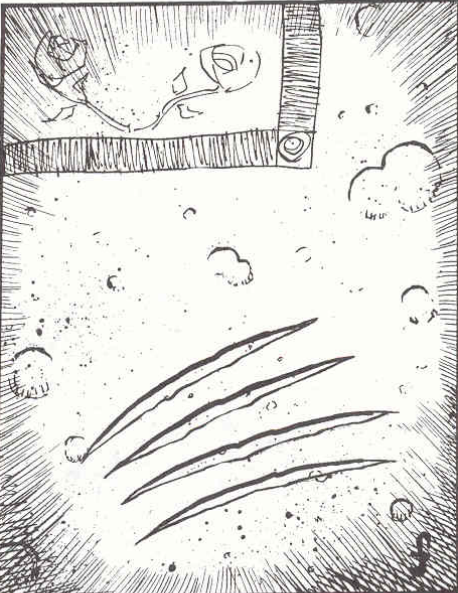
The spookiest claw marks!
It seems ordinary enough, and a good hiding spot. Suddenly as they go down a slope, Mei curses and Kaagi falls down - just in time to miss a spiked slab of wood. There was a booby trap, and Mei had to tackle Kaagi to keep him from being kabob'd. So much for surprise, but Kaagi notes that the enemy doesn't know that they survived the trap yet, so they keep going. Further ahead, they hear footsteps and our heroes get ready for battle. Three figures turn a corner: Ujina cleaves through one immediately, Mei stabs a second in the shoulder and wounded Kaagi gets to fight the third. He has seen ninja before, but none like this: they dress in black, but their clothes are ragged, the flesh unwashed and their armor and weapons are mismatched. As Kaagi delivers a shallow belly cut, his opponent's face contracts - he looks just wrong somehow. Mei finishes off her guy, but Kaagi ends up on the ground as the third one makes a run for it. They examine one of the bodies, and indeed the faces are distorted and deformed. They were very sloppy fighters - maybe bandits after all, since their weapons are dull and worn. Further down into the cave complex, they hear a woman's cry: Ninube! Ujina is ready to bolt again, when Kaagi catches him - same Ninube he heard in the forest? That seems to settle the Phoenix down. They follow the sobbing until they're close, and after a moment all three rush in: Ninube is alive! She smiles through her tears while Ujina holds her hands. The bandits will return soon, she says. Sometimes they feed her, sometimes they just stay and look at her. They killed everyone else, and there's something wrong and monstrous with them! At least she appears uninjured. As they make their escape, Kaagi hears a buzzing sound coming closer. Suddenly, he reflexively grabs Mei and pulls her out of the way: a swarm of dark insects separates them from Ujina and Ninube. Mei cries out in pain and something stings Kaagi, and they can hear Ninube screaming and Ujina roaring. It seems like time stops for a moment as Kaagi can see Ujina with his arm extended past Ninube, then the calm shatters and the blackness floods past Ninube and Ujina is lost in the dark. Ninube steps away from the buzzing and Mei gets her away. Black smoke fills the cave and kills the light, and by the time they can get a new one running they find Ujina unmoving. He is badly hurt - strips of flesh taken from his face down to the bone, and his arm... Mei doesn't know how he is still alive, because his arm is basically just bone now. The smoke was Mei's, in fact: she took it from the dead ninja they found way back when, and used it thinking that the insects might not like smoke. Kaagi sees it's pointless to argue that she shouldn't have hidden that from him. Ujina wakes up slowly: it's okay, Mei says, he just got a couple of bad bug bites! Kaagi notes she's a much better liar than him. Mei figures that it's the magic that keeps Ujina together as he stands up to go get Ninube, and Kaagi realizes he knows what happened to his arm, and that he's willing himself not to acknowledge it.
Just as they finally reach the entrance, someone tells them that they've come a long way for nothing. Kaagi gets ready to fight him, but he just moves past him. Does he have any idea how old he is, he asks. He also has a distorted face, changing even as he faces the wounded Ujina who is keeping Ninube behind him. In fact, he is taking Ujina's own face.
 Ujina is shocked with horror as the bandit-mutant-
thing laughs, gloating how hopeless everything is. He can be Ujina better than Ujina himself. The Phoenix drops his blade and falls to the ground, and just as the false Ujina offers his hand to Ninube, bam! Mei knife in the throat. Instead of blood, it's smoke that comes out of the wound. Without warning, his body stiffens, then rises above the ground, then rattles and falls in a heap. Mei gets Ninube moving, but Ujina is in shock - she won't want her now, he says. Mei snaps him out of it: if he thought that, then he should have left her in there. Outside, they go to the horses. Mei coos something to one and it obediently kneels so that she can get Ujina on top. Another recoils when Ninube approaches it: she grabs it by the mane suddenly, and Kaagi thinks she locked gazes with it. Then the horse allows her to climb on. Kaagi gets close to a third horse, and there's no weirdass reaction for him. Mei also takes the other horses: they'll die if they leave them, she explains. They manage to get back to the village and Mikara sends a full complement of guard to pick them up. He and his wife are overjoyed to have their girl back, but on the following days Kaagi feels very uncertain about Ninube. So do the castle servants, who look about as nervous in her presence as the horses at the cave, but she gives no signs of being anything than a doting young woman. Kaagi does some sleuthing and finds out that Ninube goes out at night: he follows her in secret and to his horror, he sees that the very shadows seem to coil around her. He goes to talk to Ujina, who is slowly recovering, and lays down all that he's seen. Something is wrong, deeply wrong with Ninube. Ujina is both angry and afraid, but refuses to acknowledge it. Ninube is fine, she is stronger now, and if Kaagi thinks otherwise - he is wrong. There's nothing more for him to do, and he and Mei leave the castle with a very bad feeling.
Ujina is shocked with horror as the bandit-mutant-
thing laughs, gloating how hopeless everything is. He can be Ujina better than Ujina himself. The Phoenix drops his blade and falls to the ground, and just as the false Ujina offers his hand to Ninube, bam! Mei knife in the throat. Instead of blood, it's smoke that comes out of the wound. Without warning, his body stiffens, then rises above the ground, then rattles and falls in a heap. Mei gets Ninube moving, but Ujina is in shock - she won't want her now, he says. Mei snaps him out of it: if he thought that, then he should have left her in there. Outside, they go to the horses. Mei coos something to one and it obediently kneels so that she can get Ujina on top. Another recoils when Ninube approaches it: she grabs it by the mane suddenly, and Kaagi thinks she locked gazes with it. Then the horse allows her to climb on. Kaagi gets close to a third horse, and there's no weirdass reaction for him. Mei also takes the other horses: they'll die if they leave them, she explains. They manage to get back to the village and Mikara sends a full complement of guard to pick them up. He and his wife are overjoyed to have their girl back, but on the following days Kaagi feels very uncertain about Ninube. So do the castle servants, who look about as nervous in her presence as the horses at the cave, but she gives no signs of being anything than a doting young woman. Kaagi does some sleuthing and finds out that Ninube goes out at night: he follows her in secret and to his horror, he sees that the very shadows seem to coil around her. He goes to talk to Ujina, who is slowly recovering, and lays down all that he's seen. Something is wrong, deeply wrong with Ninube. Ujina is both angry and afraid, but refuses to acknowledge it. Ninube is fine, she is stronger now, and if Kaagi thinks otherwise - he is wrong. There's nothing more for him to do, and he and Mei leave the castle with a very bad feeling.
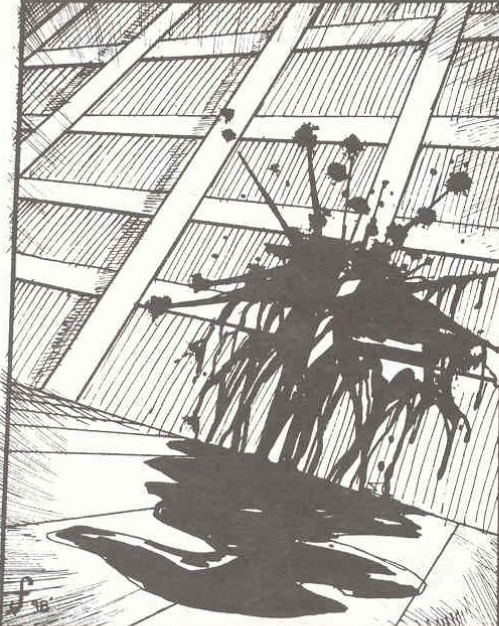
The spookiest blood... splotch... mark... thing. Okay that is kinda spooky.
As for the adventure! The setup is simple enough: Doji Ninube is kidnapped by ninja, are the PCs and Isawa Ujina bad enough dudes to get her back? But of course it's not so simple. By now the PCs should feel a healthy dose of skepticism regarding talk of ninja. How they get into the adventure is up to the GM: if they have a reputation, then Sanju can go find them in a similar way to how he did with Kaagi. Awareness roll at TN10 to see that Sanju and his men are deeply disturbed by the events. In the throne room, Awareness TN 15 roll to figure out that none of Mikara's advisors has the slightest clue about how to mount a search and rescue operation, and Perception against TN 15 roll to notice that Mikara is drinking his tea with his left hand because the right one is twitching. He tells the PCs about his daughter. Ninube is set to marry Ujina, the future Master of Void of the Phoenix, and if there are no Scorpions in the party he will confess that he believes Scorpions are sabotage the marriage. Contested Awareness roll at TN 30 to notice that the Crane daimyo isn't too sure about his own story, only that we don't get a stat block for Mikara so no way to tell how much we roll for him. Doh! Anyone with the Courtier skill realizes that Mikara asking the PCs for their help also intimates that he doesn't think his own men are good enough for the job. Ujina is in the garden, and of course he wants to go with the PCs. They can try to stop him, but those who presume to tell him about how his emotions may interfere are going to piss off one of Rokugan's most prominent shugenja by implying his emotions will get in the way of his political marriage, so like nope. As for Baka, the PCs can't question his word since it would be questioning the Scorpion daimyo and the Emperor himself. He'll only see the PCs if they directly ask to see him and avoid all direct questions. He knows a little about the Darkness: he thinks it's another "false" element, a subtle corruption of the Shadowlands. He knows it strikes when a samurai is alone and also believes his own Clan has some sort of bargain with it. He makes an Awareness + Sincerity check to determine the PCs' integrity and loyalty, which can be simple at TN 15 or contested - but seriously, what's the point of making him roll like this? Anyway if this goes off and/or there are Scorpions with that special Loyalty List option from Way of the Scorpion, he says what he knows and also makes sure the PCs understand the consequences of betraying his trust. He'll only confide his worries about the Clan with other Scorpions though. If the PCs are disrespectful or rude, he'll stonewall them, misdirect them as best he can, then find Ujina in front of the PCs and imply that he already knows what took her and to forget it, which of course Ujina won't do.
On the road, the events can play out similar to the story or with encounters of the GM's devising, but the idea is to shake the players' confidence. The first adventure gave them a ninja and a taste of the Darkness, while the second had a "ghost" and a "witch." Now everyone is telling them they're dealing with ninja, but the players are probably picking up on the clues that they're dealing with the new threat they had been facing through the previous adventures. The GM should use the same tone in these encounters as they used when describing Sokoi from the first adventure or Kohi in the second so that the players feel they're dealing with that something else.
quote:
Of course, they're only half right, but that's exactly what we want them to think.

Sample encounters! These should be tailored to the PCs for extra spook. On one village, the PCs hear rumors about ninja. They're prowling around and moving through shadow and doing all the stereotypical ninja things, but the villagers say the "ninja" were misshapen beasts of some sort. The "ninja" went north and the villagers can even pinpoint the road they took. On the way there, the PCs find trails. They are somehow unnatural, though. Crab characters or anyone with Shadowlands lore tells them that the hoof prints they find are twisted and wrong, but a Shadowlands Lore check at TN 30 tells them it's not the Taint that has twisted them (apparently, it deforms horses in a very particular way) The GM is not supposed to offer this second roll, though. The PCs can stay at the village overnight, but they get hit by Darkness nightmares. One PC (the one with the lowest Void, the lowest Honor or somehow the least trustworthy) dreams of falling in a forest, calling out to their friends, who turn back and turn out to have no faces - and yet they smile at the PC. This PC will be important later. The PCs will continue having nightmares even if they sleep during the day. During the journey, the PC that had the spooky faceless nightmare will fall and twist their ankle like Kaagi, and the GM must railroad them into it. Make whatever rolls necessary, but this must happen to a PC, and even if the PCs ace all the rolls one of them gets their ankle twisted after dreaming it happened. Later at night, the Darkness tries to lure them out individually to take a look at them: it used Ninube with Ujina but the GM should know what makes the PCs tick. Lost Loves, resentful parents, pretty much any NPC they've ever cared about.
quote:
Taunt them with everything at your disposal. Force them to make Honor rolls. Hit them where their armor doesn't protect them. The Darkness does not know the meaning of mercy, and neither should you.
Jennifer.
Sooner or later one PC should get running into the shadows and away from the fire and the light. It's a Perception + Hunting skill at TN 20 to not get lost, and the whole point is getting them lost. When a PC gets lost, the GM should take the player and physically remove them from the room. They can also ask them to act strangely when they call them back for extra paranoia. When the other players start getting impatient, the GM should call the player(s) back. Of course, they won't remember anything. If someone stays behind to guard, they will be found covered in blood and guts, or just curled up in shock and muttering nonsense. When the PCs find the magistrates, it's the GM's call if they want to make them NPCs they knew before, but the important bit is that the mon they find match exactly the party makeup. If the party are two Cranes, a Crab and a Dragon, they find two dead Cranes, one dead Crab and one dead Dragon. And the GM should emphasize the gore and violence and how whoever did this did it to a team of prepared magistrates and REALLY PCS, YOU'RE EXTRA FUCKED. (A sidebar implies that the Darkness possessed one of the magistrates to do this.) As for Ninube's party, anyone with forensics training (Kitsuki magistrates or Kuni or Asako shugenja) realizes how odd all of this is: all the bodies with throat cuts in the same place, no signs of struggle, a couple of the bodies were even smiling, and the bodies have only begun to rot even though it's been a couple of days. TN 15 Shadowlands Lore roll to tell that bodies in the Shadowlands rot faster, not slower. And TN 15 Perception + Hunting roll to pick up on the trail. It's time to get personal with the Goju!
The cave is a dungeon crawl. It's dark and dank and it's hard to see, prime territory for the Goju bandits. The cavern is only wide enough for two people to march together side by side. TN 25 Perception + Investigation to spot the trap that almost did Kaagi in ( 25?) or else they trigger it for 6k3 damage to the first three ranks of characters, so six of them total. PCs can only dodge it by spending a Void Point (!) which gives them the chance to make a Reflexes + Defense roll against TN 25 (!!) to dodge, otherwise they also eat the 6k3 Wounds. Also TN 15 Reflexes roll to not slip in the following slope.
 In the next area, TN 25 Reflexes rolls (!!!) or they slip on a slope and fall to a slime pit that will suck them in. PCs will die in (Stamina) rounds. Other PCs might try to catch them, but they have to do a contested Reflexes roll against the falling PC's Strength (Large characters do roll and keep 2 extra dice). Oh, and they must keep their highest dice for this. If a shugenja thinks of using Earth or Water Communes to talk to the local spirits, they will find that they are corrupted. They are belligerent and unhelpful and the PC must spend a Void Point every round, and also they will hear a bunch of voices screaming at them, some telling them to accept the Darkness and some telling them to let go of it. That PC is now exposed to the Darkness and if they ever spend their last Void Point while in complete darkness, it will get to them. Rules for this are in the final chapter, but basically
they're turbo boned.
In the next area, TN 25 Reflexes rolls (!!!) or they slip on a slope and fall to a slime pit that will suck them in. PCs will die in (Stamina) rounds. Other PCs might try to catch them, but they have to do a contested Reflexes roll against the falling PC's Strength (Large characters do roll and keep 2 extra dice). Oh, and they must keep their highest dice for this. If a shugenja thinks of using Earth or Water Communes to talk to the local spirits, they will find that they are corrupted. They are belligerent and unhelpful and the PC must spend a Void Point every round, and also they will hear a bunch of voices screaming at them, some telling them to accept the Darkness and some telling them to let go of it. That PC is now exposed to the Darkness and if they ever spend their last Void Point while in complete darkness, it will get to them. Rules for this are in the final chapter, but basically
they're turbo boned.
The next area splits the path but they lead to the same point in the end. There are tripwires here (Perception TN 20 to find) that spring bells to let the Goju know that the PCs are in. In the next area, TN 15 Perception roll to hear the weeping. Isawa Ujina will recognize it as Ninube's and will try to rush forward to it. PCs can try to stop him but Ujina will be willing to use his powers if they get too in the way, and the Goju will use this opportunity to jump the party. The whole point is getting to Ujina for them, the PCs are secondary. The Goju have low-average stats other than their Agility of 4, but also Shadow points that do tricksy ninja things. They also have only 24 Wounds so they're half as tough as the starting average PC. There is one cavern with disfigured figures, people that have been taken by the Darkness but whose transformations aren't complete. PCs that approach them roll TN 10 Willpower or flee the cavern. If they attack the figures, they don't fight back and bleed something inky and black before disappearing into the shadows. Finally the PCs will find Ninube, and on the way back they get hit with the swarm of Darkness-possessed insects that Kaagi described. Each round they spend in the cloud deals 1 die of Wounds to the PCs, without rerolling tens. This lasts for three turns until Ujina uses his power to draw the bugs to his own arm, and then he'll scream for the PCs to burn it. He can only keep the bugs for two turns before losing his hold on them. If they do, the PCs now have to carry the unconscious Ujina out before meeting Goju Sanado, the bandit leader. He is a Shosuro Assassin 4 ( Assassin?) with Reflexes 4, Fire 4 and Strength 4 aside from his Shadow points, so he's a tough cookie. He also creates a Fear effect of 3 with his face-shifting trick, and any PC that fails to overcome it cannot hit him. He has 32 Wounds but no Wound Levels, so he won't take penalties until he's Dead.
What do the PCs get out of this mess? A Major Favor from Mikara, and 6 XP. Also, Ninube is now Goju Ninube, a full servant of the Darkness.
 She is a Crane courtier at Rank 2 with 5 Shadow Points, so yeah. If the PCs try to start something with her, she'll manipulate Ujina into defending her, and only if he dies will she use the full range of Darkness powers.
She is a Crane courtier at Rank 2 with 5 Shadow Points, so yeah. If the PCs try to start something with her, she'll manipulate Ujina into defending her, and only if he dies will she use the full range of Darkness powers.
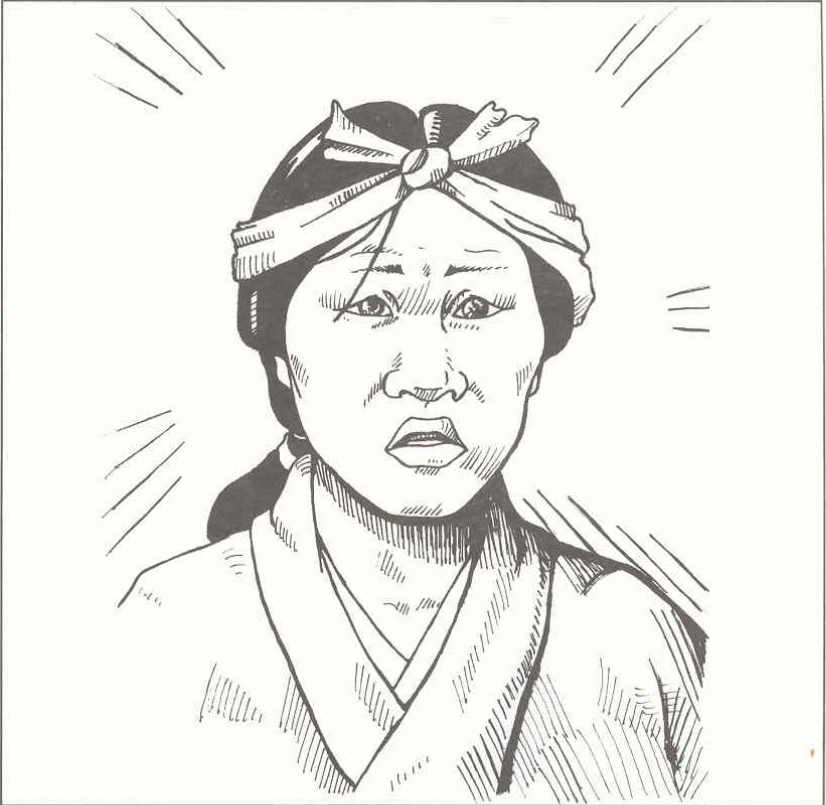
My face when I saw the length of this post.
Next: does it count as a railroad if you're in horseback?
Way of Shadow: I Want To Get Off Mr. Shadow's Wild Ride
Original SA post Legend of the Five Rings First EditionWay of Shadow: I Want To Get Off Mr. Shadow's Wild Ride
The epilogue to the last story! On the way out from Mikara's castle, Kaagi tries to put his thoughts in order. It's clear to him now that the same power that took the face of Hida Dasan's wife also took over or replaced Ninube before they arrived. He could not convince Ujina otherwise, however, and trying to tell Doji Mikara that his daughter was now some shadow monster would have turned his hospitality into hostility, and probably a pointless duel with Ujina. At least Mei believes him, after coming this far. He is not sure if he is disturbed more by having encountered the new threat twice in the last couple of months, or by the idea of having been guided towards it. One morning, while at camp on the way back to Kitsuki HQ, Kaagi is minding his foot while Mei is off having a bath. Suddenly, someone walks into view - a figure in white garments, though Kaagi's gaze seems to somehow slip off them. Only the pain in his foot tells him it's not a dream. The stranger points out at the blowgun in Kaagi's belt - it's his, he says. Was he the one that killed Matsu Nari, Kaagi asks in disbelief, while the man just sits. He introduces himself as Hiroru, a "shadow hunter" just like Kaagi. He says that he was at Ichime Castle for the same reasons than Kaagi, but the magistrate was quicker to find the real culprit. Kaagi recalls Maouri's room, and realizes that Hiroru was outside the window - he just never thought of looking up. Hiroru dropped his blowgun on the rush to leave when Kaagi and Mei walked in. Yes, he did in fact finish off Nari, and then he deliberately led Kaagi towards the Hida to see if he could catch something the others couldn't. Kaagi shudders thinking that something saw him, instead. They must have known him already, Hiroru says: perhaps Kaagi caught their interest at Ichime or even earlier without his knowledge. In fact, Hiroru was the old man with the spooky story about the DEEP SHADOW, and Kaagi wonders if any part of his journeys has been left to chance. As best as Hiroru can tell, the shadows are something else, something not named by Sun or Moon. He has been trained to hunt them, and he thinks the Scorpion and their flesh and blood ninja also know about them. What do the shadows want? Hiroru believes that when they take someone's name, they become just as formless as them - if they take enough names, they can unmake all that Sun and Moon have created. Some, like Hiroru, Kaagi or Mei, have a natural resistance to it, and for whatever reason they can't be taken as easily as others. In Ichime, their agent was Sokoi, the young bastard boy. Hiroru's mission was to observe him at first. Kaagi is a little miffed by how at ease Hiroru is - he is just out of range of his sword, but the weird effect on his clothes is gone and it looks like he doesn't consider the wounded magistrate a threat.

Kaagi wonders what the shadows could want with such a young boy, and he says that no one really pays much attention to what children say or do, but also that he doesn't really understand the shadows other than they value knowledge and seek to put themselves in positions of power. These shadows that still have some identity of their own he calls "Goju," and they spread themselves like rot, avoiding the mistakes that Fu Leng did. It's easier to take a weak man's name than a strong one's, so they demoralize and break down their prey's will. Suddenly, he stands up: he says that Mei is close and it's better that she doesn't know about him. He warns Kaagi to send her off and away, as the shadows will use her to get to Kaagi, or kill her to make him flinch. He picks up his blowgun (Kaagi notices it but somehow can't really do a thing to stop him) and tells Kaagi to travel west, find a group of Unicorn there. With that, he takes his leave. At night, Kaagi dreams of Sokoi standing over a sleeping Mei - Kaagi asks what he is, but it replies in Kohi's voice that Kaagi already knows more than he would like. What good has that knowledge done for him? In the dream Kaagi remembers that Mei said she had been talking to Sokoi, but didn't remember what about. He wakes up, and during breakfast he finally says that they should go opposite ways. Mei, after a long silence, wonders when Kaagi got so dumb, but he says that someone has to get back to the Kitsuki and tell them what happened and that it wouldn't do if both of them disappear. An angry Mei tries to argue that the Kitsuki don't trust testimony but evidence alone, and the presence has left no evidence for them. He still says she has to go back because at least her words will be recorded. Mei counters that she could follow Kaagi without his knowledge, but he retorts that she'll do as he says if she gives him her word. That's what gets her: she weakly argues that she doesn't know the way to the Kitsuki castle, but Kaagi gives her proper indications. They break camp, he gives her last pointers, Mei says/prays that he be safe, and then reaches up to touch his chin, and look him in the eyes. Then, she takes off: Kaagi watches her for two heartbeats, and turns before his will breaks and he runs after her towards home.

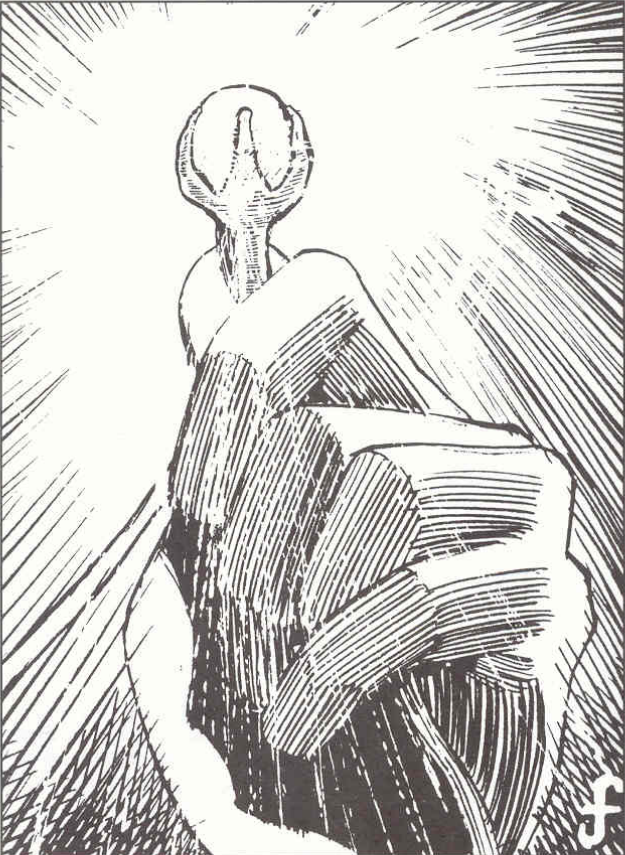
THE MEDALLION!?
The next episode is The Chase! Alone, Kaagi half-limps west as Hiroru told him, hoping that the Kitsuki will record Mei's words even if they don't believe them. With enough reports, maybe they can put together a picture of the shadows. Just as the sun starts setting, Kaagi finds the Unicorn caravan, about twenty men or so. For some reason they are breaking camp, even though it'll be night soon. As he approaches to talk to whoever leads them, he gets clocked out from behind. The assailant demands his identity, he replies that he is an Emerald Magistrate and musters what dignity he can while tasting dirt on the ground.
 Someone calls for someone, and he can see a young bushi and a slightly younger girl. She presses a crystal pendant to him and shines some light behind it, which blinds Kaagi briefly. Somehow, this identifies him as "a man," and the Unicorn get him up and the bushi apologizes for his rudeness. He identifies himself as
Shinjo Renari. Kaagi asks to see the person in charge, and Renari says that they are in a hurry: he doesn't want to question Kaagi's authority but is also nervous about the sun setting. Eventualy he relents and takes Kaagi to see the "
Oba-sama" in charge, an old lady. Kaagi introduces himself and tells her about her encounter with Hiroru, and gives him a crystal that he had left for him. This makes the lady's eyes grow wide: is he there to accompany them, then? They are in a great hurry, but an Emerald Magistrate would smoothen things with the way posts. Her accent is much thicker than Renari's - perhaps her grandmother was old enough to remember the deserts. Kaagi wants to know what's going on, but she says they won't have time to explain. Maybe tomorrow, when they camp. She gets Renari to give Kaagi a horse: a gentle one. It belonged to someone called Tempu, and Kaagi thinks better of asking why Tempu doesn't need it anymore. And off they go into the night!
Someone calls for someone, and he can see a young bushi and a slightly younger girl. She presses a crystal pendant to him and shines some light behind it, which blinds Kaagi briefly. Somehow, this identifies him as "a man," and the Unicorn get him up and the bushi apologizes for his rudeness. He identifies himself as
Shinjo Renari. Kaagi asks to see the person in charge, and Renari says that they are in a hurry: he doesn't want to question Kaagi's authority but is also nervous about the sun setting. Eventualy he relents and takes Kaagi to see the "
Oba-sama" in charge, an old lady. Kaagi introduces himself and tells her about her encounter with Hiroru, and gives him a crystal that he had left for him. This makes the lady's eyes grow wide: is he there to accompany them, then? They are in a great hurry, but an Emerald Magistrate would smoothen things with the way posts. Her accent is much thicker than Renari's - perhaps her grandmother was old enough to remember the deserts. Kaagi wants to know what's going on, but she says they won't have time to explain. Maybe tomorrow, when they camp. She gets Renari to give Kaagi a horse: a gentle one. It belonged to someone called Tempu, and Kaagi thinks better of asking why Tempu doesn't need it anymore. And off they go into the night!
They take very short breaks, and indeed they are basically riding too fast for Kaagi to talk to anyone at length. The horse almost rides itself and all that he can do is hold on for dear life. The reason for their haste becomes clear when hours into the ride Kaagi sees a cloud of dust behind them: they're being chased. Some of the chasers, dressed in black, break up from their group and ride faster to catch the Unicorn, and soon they start fighting. Kaagi sees a samurai's mount crashing down with him, and the dark figures surround him quickly but the caravan does not even think of stopping. Worse, Kaagi saw one of the pursuers' faces in the moonlight - it's distorted, same as the cave bandits. Finally, after an eternity of riding morning arrives and they stop for camping. Kaagi is worn to shit from all the riding, and the crystal pendant girl (who looks a lot like Renari) asks if she's okay. She has no sense of propriety and Kaagi is suddenly reminded of Mei, especially when she laughs after the horse, Keo, nuzzles Kaagi and makes him fall on his back. He asks about the people chasing them and she says that it's why they ride at night: they are faster at night but never show up during the day, and somehow even if the Unicorn ride all day long the chasers are right behind them when night falls. The girl, Notaiko, says she doesn't know anything else and that he has to check with Oba-sama for answers to his questions.
After sleeping, Kaagi goes to see the old lady while the Unicorn whisper and the ladies giggle. Kaagi is a little embarrassed, knowing how much of a mess he looks like by now. A scent he somehow recognizes comes from Oba-sama's tent, and as Kaagi enters he remembers it's like the perfume Mei wore when she had to be presentable for court. They start talking and Kaagi tells her everything from the Crab village on, throwing caution to the wind. He is desperate to voice such suspicions to someone in a position of power. The lady nods when he brings up Hiroru: she doesn't know him but has heard of him, and she knows of the Darkness. See, they're being chased now because the Unicorn have captured one of their own. He asks why the Unicorn left that one man behind, and without taking any offense she replies that it was a ploy of the Darkness to make them slow down and catch them all. Their mission to bring their captive so that Unicorn shugenja can examine them is foremost. She tells Kaagi of how the Unicorn found the Darkness on their way home towards Rokugan. One day, they found a man that looked like them, that identified himself as one Togashi Ginave, and after celebrating that they finally found one of their own once more that night three people were dead, including the stranger. Questions arose of course, but ultimately they decided to burn the corpses and move on. Another day, a man gave a girl he wanted to marry a crystal pendant, and the light from the sun shone right through her. In Unicorn legends, crystals are tears from Mother Sun herself. The darkness that had taken over the girl abandoned her form and disappeared: the Unicorn pressed the pendant to everyone in their camp, and found others that also were darkness decoys. One did not disappear, a young fifteen-year old girl, and the elders demanded her death. When the Unicorn returned, the Rokugani did not understand any of this, and the first post-return generation grew believing the tales of the Lying Darkness were just foreign demons of some sort. But some Unicorn have found it once more, like this one party, and that's why it's so important to bring their prisoner back. If they can convince their daimyo of the threat, maybe he can convince the others. Kaagi is both relieved that he is not alone in his knowledge and alarmed by being now certain of the threat. The prisoner is bound with crystal charms, as it's the only thing the Unicorn know that can hold the Darkness. And that's why they need Kaagi to make the journey faster.
quote:
"I'll do all I can to help," I say to her, rising slowly. "Thank you Oba-sama, for sharing your story. But tell me one more thing. Notaiko and the bushi, Renari, are they brother and sister?"
"Near enough," she says with a smile. "Notaiko is my granddaughter. Renari is my nephew. Everyone else calls me Eniki." I feel my face growing hot again, and she laughs. "But you may call me Oba-sama."
I feel foolish as I walk to where Keo waits patiently. But I do not feel bad about it.

The ride starts soon after Kaagi is done with Eniki. It's ambitious but not as reckless as that of the previous night. Kaagi meditates on what he knows now about the Lying Darkness, and thinks on the things he could have missed in previous investigations by dismissing them as superstition. Above all, he thinks on when or how he found the Darkness before knowing of it. They reach the checkpoint between Dragon and Unicorn lands soon, and Kaagi wastes no time in pulling rank with the Imperial guards. Renari winks at him: apparently he thinks better of Kaagi now that he's been actually useful. Much later, while they ride through a mountain pass, the bandits jump them - the only warning Kaagi gets is hearing a sound and watching the samurai riding a bit ahead of him being brought down by shadow figures jumping from the rocks. It's awkward to fight in such close quarters with his katana, but the samurai at his side dispatches his foe and hands Kaagi a short knife. The bandits aren't good fighters, but there's a lot of them. Kaagi realizes that they are deliberately throwing themselves in the Unicorn's path so that their own corpses will stop the horses from racing through the pass. He calls this out to Renari, who gives a cry and makes the caravan rush through. Then, Kaagi feels a slash on his leg: he slashes back without looking, but just as he turns he sees something that chills his blood - the bandit wears the face of his own brother, not as the grown man he should be now but as the young boy he once was. Kaagi drops his knife and tries to catch his "brother" but Keo suddenly jolts forwards and away from the bandit. The pursuers howl and Kaagi is convinced they'll bring down the rocks on them, but he hears Eniki's voice chanting and then all horses start running with unnatural speed and away from the ambush. Morning comes and safety with it, but as the riders regroup Kaagi sees Eniki tumble down from her horse. Later he learns that she is dying: she used all of her energies to power that spell. Notaiko emerges from the tent, with Eniki's staff and her position, and the old woman's tent is set ablaze. Now the Unicorn will head to Shiro Iuchi, and Kaagi considers going along with them. That night, Kaagi dreams of his room in the Kitsuki castle, and of his brother climbing in through the window. Somehow, realizing it's Iyekao frightens him even more. He apologizes for leaving Kaagi alone, but someone had to do something for what the Crane did to them and the Phoenix wouldn't do a thing. He didn't want Kaagi to get involved, but ironically it's he who needs his little brother's help now, to save him from something worse - to find the way back. He is by the temple near Firefly River. Kaagi wakes up to find Renari clutching his throat and trashing about. He yells for help and tries to keep Renari from choking himself, but he suddenly goes deathly still. Notaiko, crying but with her voice steady, asks what happened. They examine his body and find bruises on his throat - but not as those from being choked from outside, but as if the hand had been pressing from the inside. Kaagi and Notaiko cut up his clothes to examine his body, and find long lines running vertically across his chest, bloody but the skin uncut.Notaiko resolves to break camp immediately and use her spells to reach the Iuchi castle, but she realizes Kaagi won't go with them. He has to see someone important, he says, but she replies that it's called the Lying Darkness for a reason. Even Kaagi knows how wrong this is, but he has to go. She offers him what provisions he needs and wishes him luck.
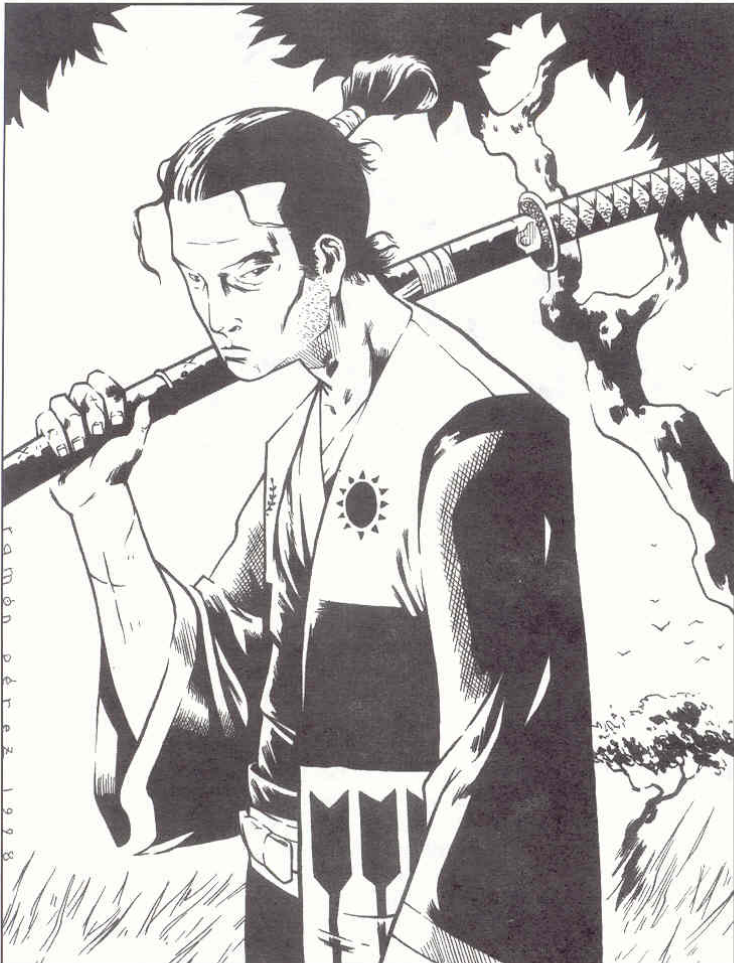
Kaagi has seen better days, lemme tell you what.
The adventure! Okay, this isn't really an adventure, but more like an extended scene in another adventure. This is a spook scene designed to remind the PCs that the Darkness hasn't forgotten about them. The idea is that they hit this chase as they are doing something else entirely, so that they are the least prepared to face the Darkness. The book advises to read the story thoroughly and keep a stack of notes to reference for colorful words and phrases to use, rather than using the book and reading scenes wholesale.
quote:
Be sure that your characters have the feeling that it is a relentless pursuer, and that it cannot be evaded, hidden from, or met head-on. Combating the Darkness is more than drawing a heavy katana and chopping a bandit. The Darkness gets inside your mind... and worse. It gets inside your soul. If a character stops to fight, be sure the bandit they choose to kill has the face of their wife. Or their sister.
Or their daimyo.
As a standalone thing, the PCs can be requested by a daimyo to seek out a group of Unicorn that are obviously armed for war wandering their provinces, and since they only ride at night the sensible guess is that they are bandits or criminals. Furthermore, Eniki and Renari are unfamiliar with travel papers, and the PCs can arrive at a guard post to find they have been refused passage and innocent blood might be shed soon. The Unicorns will take no chances with the PCs anymore than they did with Kaagi. If they approach the caravan they'll be ambushed just like he was: a "skilled woodsman" with a Perception + Hunting against TN 15 roll can tell the PCs that the party is being stalked. The Unicorn aren't interested in killing them, just isolating and capturing them to see if they are human or Shadow. Once they can tell they're human, they'll be wary but otherwise friendly. If characters do have the taint of the Shadow in them, though (like Shosuro shadow brands or by catching it in a previous adventure) they'll have a lot of explaining to do, and the Unicorn might very well take them into custody. They are twenty, with Eniki in general charge but Renari commanding the bushi complement. No Awareness rolls needed to tell that the Unicorn are very spooked, constantly looking over their shoulders and never being in groups smaller than three or wandering far from the camp. Eniki does not have any intention of defying the Emperor or making new enemies, so she'll have Renari or Notaiko talk to the PCs and try to get them to leave them alone, but if pressed further they won't lie about their real intentions. They'll welcome any PC that wants to join them, or even insist in case the PCs are thinking of getting off this wild ride.
In the first night, the important part is when one of the Unicorn falls and is swallowed by the Darkness. The GM has to think on what PC would be the most shocked by the event, and tailor it to them: if they are greedy, the Unicorn drops a bag full of koku when he goes down. If they love their Benten's Blessing, they see the Unicorn's otherwise handsome face melt while the blackness swallows them. Or they can go full tilt on describing the gory mess that results when the Unicorn hits the ground, and make the PC look into his eyes before asking if they'll stop to help. If the PC doesn't, then the GM has to hammer home the point that for the rest of their life the PC will have the horrified face of the Unicorn haunting them because fuck you player, that's why. The GM has to get in the player's physical face while describing this. (Okay, that's definitely more John than Jennifer.) If they do stop to help, double fuck you: the GM has to take the player out of the room. The GM can do this repeatedly for all PCs, and the Darkness can be very inventive when it comes to spreading insanity and fear. And if the GM feels the PCs aren't afraid enough, then they should kill their horses and let them see who will come back for them. (No one!)
The first day is resting time, and the important part here is Eniki's revelation. The PCs should learn of the Unicorn stories of the Lying Darkness as well as the effects of crystal on its minions. The GM can choose to compress the adventure so that the chase only lasts one night, in which case Notaiko will talk to the PCs after cremating her grandma. The PCs should catch on on how fast Darkness infection is. Eniki will also reveal their prisoner and the reason why the Darkness is after them. The PCs may choose to leave the Unicorn to their fate, but the GM should remind them of the faces of the Unicorns lost the previous night, and have an Unicorn show them the face of the infected bandit. It's their fate if they quit now!
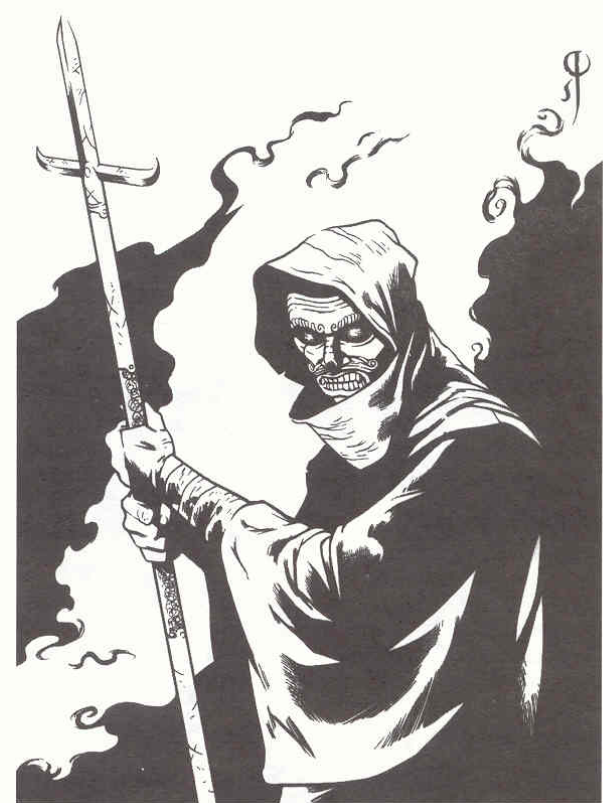
Spooky 'stache.
quote:
It's a choice. Not much of a choice, but still a choice. Let them make it of their own free will.

The second night, the party reaches the Imperial way point. If they have proper permits, it's all good. If they don't, Courtier or Bribery rolls to get through, but if they make no progress Renari will tell his men to charge through, swords and arrows first. The second ambush happens at the narrow, winding mountain pass, where only two horses can pass at the time and the ground is rocky and hard for horses to run in - prime ambush territory. The Shadow bandits (still low-stat mooks) want to create as much confusion and corpses as possible to stop the Unicorn from passing, which Kaagi figured out and the PC with the highest Perception + Battle score will do as well if the players don't pick up on it. Characters roll one less die if they use weapons longer than katana in the narrow pass, and characters without Horsemanship that don't get off their horses to fight roll two dice less. Now, the players that were sent away during the previous ambush are brought back, and the GM should tell them to encourage the PCs to join them, or to run away, or to turn the Unicorn prisoner in exchange for them. Of course, those PCs are all corrupted by the Darkness already. The last important part is Eniki casting her spell: any PC with a hasting spell can help in the casting. As an optional rule, a spellcasting PC willing to die to cast a spell does so without a roll and with twice their Void in Free Raises. If the PCs help Eniki, she survives (although she and her assistant take half their total Wounds score in damage). Renari will still die a horrible death next day, however, and PCs will find about the same things Kaagi did if they examine the body. The PCs get one XP for surviving the trip, another for getting through the check point without fighting, and yet another for helping Eniki cast the spell as well as a major favor if they keep the old shugenja alive. They also get a separate major favor from the Unicorn that the PCs' children would be able to inherit, as the Unicorn are willing to let those favors lie for much longer than other clans.
Next: the final spook.
Way of Shadow: You Can (Not) Win
Original SA post Legend of the Five Rings First EditionWay of Shadow: You Can (Not) Win
Let's wrap this RPG FICTION up! Our man Kaagi is pretty tired already after hours of walking, but he presses on. The instructions the Unicorn gave him let him found the path to the temple he is looking for. It's overgrown and unkempt: apparently the temple fell out of use some twenty years back. A storm is brewing and he hastens as best he can, given his foot. Just as the first drops of rain start falling, he finds the forgotten temple. It's old, worn and empty. While he gathers wood for starting a fire, he thinks on how he's come to be here, and how Mei would laugh in his face if she knew that he came here guided by a dream, but if Iyekao is still alive and a prisoner of the shadows, then he must know, out of familial loyalty and his own curiosity. A shadow moves, then, and Kaagi has half his sword drawn before he even registers the figure. It is a man, about as tall as him, and as he walks into the fire light he can see that he is Iyekao, his own brother. In disbelief, Kaagi asks why and how he is here. Iyekao sits by the fire and starts telling him his story.
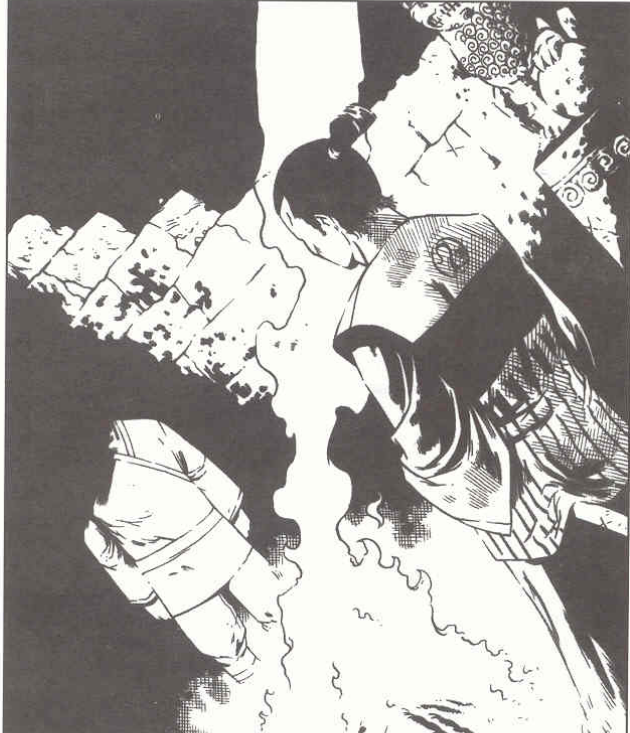
It's a trap, mang.
Iyekao was fourteen when the brothers' family was murdered, and his gempukku was only a year in the future. He went to the head of his school to ask for his right of vengeance, but he refused, as well as refusing him permission to seek redress in the Emperor's court. Looking back, Iyekao thinks he was just trying to prevent his senseless death, but he was young and could not let things stand. One night, he grabbed his stuff and left. He sought a way to make his enemies pay for his crime, but he had no training, skills or contacts to make that happen. Without regular means, he turned to legends of assassins that struck in the night leaving no trace. He forgot about honor and bushido, and went after any rumor of the ninja. It's ironic - Kaagi has sort of been doing the same, he says, and the magistrate feels a chill down his spine. Eventually, he found an old fisherman that told him that every man finds what he deserves, but rarely what he wants - later, he came upon a compound, a school of sorts, where he was told that if he wanted to learn the Masters would teach him everything to know about the darkness. The ninja of the stories were the barest shadow of reality, and by the time his training finished he would know everything and no man could harm him again. The compound's buildings were made of dark wood that he has never seen anywhere else. It was hard to track time and he doesn't know how long he spent there. His lessons were taught at dusk, and Iyekao and his fellow students - new friends - lived by night. There was the implicit idea that the Masters would not like them going out into the sun. The lessons were strange - repeating lines in a strange dialect of Rokugani until the whole class could do so in unison without missing one syllable.
With time, Iyekao found it hard to remember his past - the face of his former Phoenix friends, the voice of his father and so on. Kaagi was the only one he could remember clearly and he dreamed of visiting him at night to tell him about his exploits. Kaagi is just a little disturbed thinking of his own dreams. One night, perhaps years after he started training, Iyekao noticed that his friends' faces were wrong - the distinctive traits of his faces were disappearing, as if their faces were pebbles rounded by water. They still acted friendly, but he was terrified, and then he noticed that nowhere in the compound were mirrors or reflective surfaces. He thought of finding a way out, but he could not remember how he got into the compound. Then, the students started disappearing in twos and threes, going out of their room while the Masters instructed the rest to stay inside. Iyekao followed his last two friends when it was their turn, following them in pitch darkness with his new skills, and ended up at a bonfire. It gave shadows, long and dancing, without any figures to cast them. His friends walked forward, into the fire, and then another two shadows joined the dance. Iyekao screamed and ran, jumped into a river and never looked back. Kaagi tries to gather his wits and offers Iyekao a way back to the Kitsuki castle, to find help, but his brother replies that he doesn't really understand what he is dealing with. He looks up...
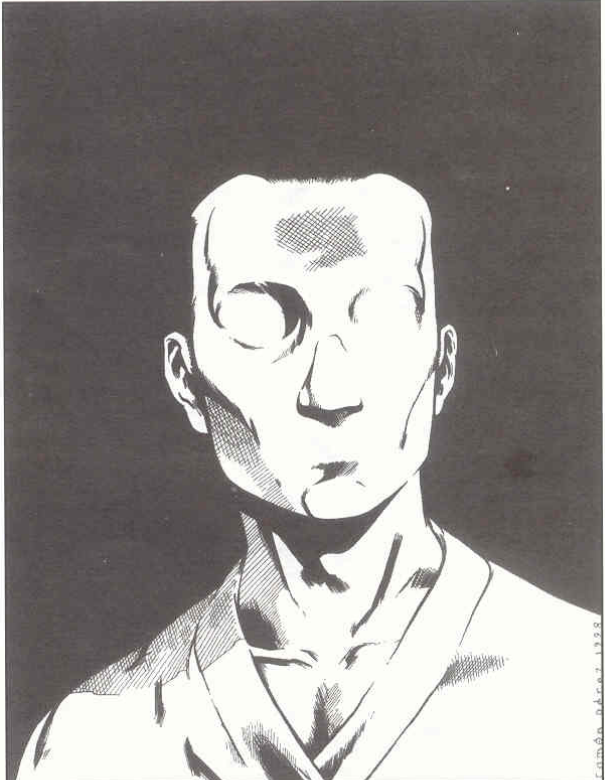
AAAAAAAAAAAA
Kaagi is not pleased.
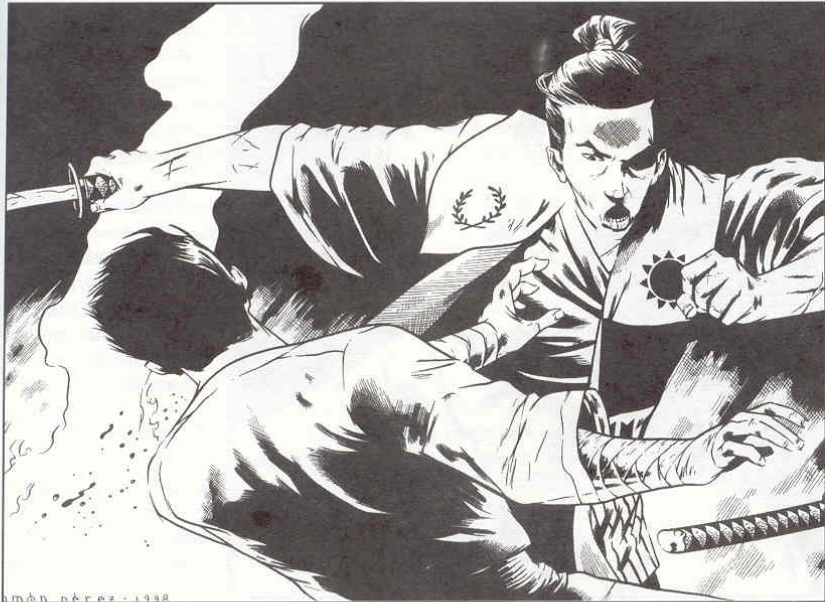
Woosh!
Iyekao's body collapses in smoke and Kaagi doesn't stop to watch. He runs outside into the rain, and with each flash of lightning under the storm he sees shadows, faces: Sokoi and Kohi and Kurusu are all smiling, a fourteen-year old Iyekao pleads for him to stay, and still he runs. He falls on a ravine, sees a very sad Mei offering him her hand, but then the river's icy waters take him and he loses consciousness. He wakes up in a peasant home: the woman there informs him that he was found in the bank of the White Shore Lake and been with fever for days. He recovers and resolves to move on immediately, with new provisions and clothes given by the villagers. Most of his possessions were too badly soaked, except for his journal in its protective box. He reaches a small village between Dragon and Unicorn lands and thinks on his last encounter with the Shadow, and what concerns him most is seeing Mei at the end of his fugue. Did they get to her? Did they take her all the way back in Ichime Castle? Did she ever arrive at the Kitsuki castle? The strange dreams plague him still, and now he dreams of being in Iyekao's compound and studying with the Masters. He goes out for a stroll under the sunlight to calm himself down, narrowly misses a woman carrying a basket. He realizes he's lost in the village, looks around to get his bearings... and sees Iyekao smiling from around a corner. Kaagi races back to the inn, gets his stuff and bolts.
As he travels, the dreams get worse: now his dream self sees the bonfire, and walks closer every night. Just as he is only a day from the castle, he realizes this is it. The Shadow won't let him go any further. The dreams are his initiation, his transformation. The Iyekao from his childhood nightmares was the monster he was becoming. Kaagi doesn't know if he drew their attention to him, but now they won't let go. He realized this when he walked past a peasant woman on the way: they both mumbled polite greetings, but then she looked at him with wide eyes, touched her face as if to make sure everything was in its place. Kaagi started doing the same, and then ran to get his shaving mirror. His face wasn't his own. It could've been anyone's face. The Shadow let him catch up with it, and now he is done for. He is becoming part of them, losing his identity, and when they're done he will have no name and no face. They did it faster with Sokoi, as a young boy, but if they take their time they can take Kaagi completely. He knows this, because the shadows told him.
His last gambit is paying a boy to take his journal back to the Kitsuki: the Shadow is trying to stop him, but the journal meditation technique keeps it at bay. With care, he can still hide things from them. Wishing good luck to his fellow Kitsuki, Kaagi ends his journal.
So, what's going on. The Darkness has many nicknames as people have encountered it: Kaagi refers to it constantly as the Shadow, but the Unicorn know it as the Lying Darkness. It's also the Living Darkness, the Deep Shadow and so on. These are all nicknames, of course, because no mortal can name the Darkness. Basically, Hiroru's tale is right: the Darkness is as old as the world, the last remnant of the primordial soup that made up the universe. The Darkness is a single entity: it is aware, and it is hungry. By accident or design, in the millennia since the creation of the world it stumbled into a sentient entity and devoured it, and it discovered it could be that entity without losing its "nothingness." And by being, it could affect. The Darkness devours and absorbs, keeping all that it destroys. In a way, its prey also has changed the Darkness: the primitive hunter-gatherer humans led to a primitive hunter-gatherer Darkness, from the first agrarian humans it learned contentment, and when these humans started warring and conquering it learned ambition and hunger for power. It's not out to devour every daimyo and karo in Rokugan, but those people in positions where they can exert incredible influence without drawing attention. Maybe it seeks the key to Rokugani magic for real ultimate power, maybe it's raising nameless legions to wipe out humanity, maybe it really wants to take all names to unmake creation. Few people know of the Darkness in Rokugan, and even fewer have any real understanding of its actions.
"Not surprisingly," it's the Scorpion who know the most about the Darkness. Specifically, it's the Shosuro family that knows there's deeper shadows. First year Shosuro ninja cadets are called to a special review ceremony where they are inspected by a mysterious stranger that touches their shoulders in turn. For some the touch is light, for some it causes frostbite. Some cadets go mad on the spot and fall to the ground frothing and convulsing, and their families receive polite letters that they did not survive training. Always, one or two students fail to return to class the next day; their fellows are told they will receive special training and their families are told they won't come home. The Darkness remembers the bargain it did with Shosuro, and some Scorpion tell a variant of the tale of the Thunder's return, one where she returned changed - and when she was seen no more, Soshi appeared with his shadow brands. There were no witnesses to her cremation, after all. The truth is that Shosuro had realized in the long days of their battle with Fu Leng that there was another dark entity, observing but not letting itself be known. Badly wounded and knowing she would not make it back to the Empire otherwise, she called out to the Living Darkness, who wanted to take over the Thunders but was still too small to overtake them. It eagerly came to her call. Shosuro made a bargain to survive with the Darkness, but it would be only on her terms. The Darkness agreed and both gave themselves to each other, and the reborn Shosuro returned. She realized the danger, but she preferred the Darkness to Fu Leng's carnage. She hoped Rokugan would be able to stop the Darkness in time, but overestimated her ability to contain it. The Obsidian Hand that she brought back along with the Black Scrolls also had a piece of the Shadow with it. She played out her own death and funeral, and took the persona of Soshi with his new shadow magic. She gave this magic to his allies, and one of every fifteen people touched by Scorpion shadow brands are taken by the Darkness never to return; such was the pact. Soshi/Shosuro thought she could keep the Darkness under control, but the change of identity made her doubt that it was her own idea, and slowly she lost her thoughts and self to the Darkness while Bayushi watched helplessly. He asked things of the Shosuro-Darkness meld, sometimes occult knowledge, sometimes just her favorite season to see if she remembered. The Soshi deception continued, but Bayushi was never the same.
The Goju are a lost family, of which the only remainder is a text known as the Celestial Agonies, the compilation of the first Goju's knowledge of the Darkness. None of the great Clan libraries possesses this text. Little is known of Goju other than he was a mortal that fled the Kami when they fell to the earth and started gathering the Clans. Perhaps his weakness drew the Darkness to him or it recognized in his fear something akin to its own. The Goju are not a "family" in blood terms, but they include the actual descendants of Goju as well as all of those taken over by the Darkness. They are all the Shosuro wish they could be. Goju had no Bayushi to remain loyal to, so the Goju are fully given to the Darkness. Their magic is true shinobi, shadow magic, and they are loyal to a fault to their dark master in a twisted parody of bushido. They expect nothing more than being fully absorbed by the Darkness and thus attain a sort of immortality. All Goju have a Void of 0 to represent their separation from Sun and Moon and the theft of their identity. It's important to note that not every ninja in Rokugan is a pawn of the Living Darkness, though. Goju start their new life having names like other Rokugani, but eventually they keep only their personal name, and later being referred to only by their role (Spy, Kidnapper, Thief, etc.) Goju Sanado, the boss from the third adventure, is about to lose his name and become just "Ninja Leader" for instance.
The Darkness's best weapon is its nature, unbound to any shape. It can take whatever form it chooses and can't be harmed by regular weapons, though it might pretend to be hurt if it suits it. It's not affected by normal light, either. Only crystal can affect it, as the Unicorn discovered in their journeys. The Darkness cannot go through crystal as it can through other solid objects, and while it has never been recorded it's possible that a large enough burst of light through a crystal could conceivably outright dispel a shadow manifestation. Crystal light projected on physical minions deals them 1 die of Wounds per round. The Darkness can only directly affect those who invite it to themselves, but over the centuries it has developed a myriad ways to get under people's skin. And if they happen to be resistant, the Goju and other physical pawns are there. The best defense against Darkness intrusion is passive (a high Void score). Those who have obsessive qualities or let desire or ambition cloud their judgment - or worse, accept gifts from the Darkness, give it a way in. Fear is another powerful tool. The Darkness can absorb creatures, drawing in a victim one piece at a time. Sometimes the process is voluntary as it happens with the Shosuro cadets, though they may not understand the enormity of what is happening. Slowly, they lose their identity to it. After this is over the Darkness can use any knowledge or ability the original being had except for magic, because the Darkness cannot wield raw elemental force. It can also use the absorbed form whenever it chooses. Those with high Void scores can avoid this attack, but end up fuddled as if waking from a deep sleep, like when Mei had no idea what she was doing in the first adventure. The Darkness can also mimic any form it chooses. This does not affect the copied individual in any way, but usually the Darkness will do away with the original if it intends to use the shape for a long time. This is faster than absorption, but the Darkness gets none of the benefits, and the doppleganger will always be wrong in some form that those familiar with the original can recognize. It did this to Sokoi: no one pays attention to children, and the only one who could tell the difference (Amai) had failing eyesight and tended to ignore disturbances. The Darkness can also corrupt minions, granting them power in exchange for service. Of course, the powers it grants are essentially incompatible with physical forms, which is why the Goju bandits are grossly mutated. Eventually keeping the deformed body together is too much of a hassle for the Darkness, at which point it withdraws its support and leaves the poor sod to die horribly. The Darkness has also learned that humans are more vulnerable in dreams and an usual tactic is visiting sleepers and offering them gifts or spooking them so that their fear gives the Darkness a way in. Any Void rolls made against the Shadow while asleep are at TN +10, and if dreamers suffer from fear effects while attacked by dream Darkness beings they can't use Void Points the next day. Dream Hida Dasan is an example, playing on the Rokugani fear of the dead to wreak havoc on the PC's psyches. Shinjo Renari was also affected by the Darkness' dream powers: if a dream manifestation of the Darkness attacks and "kills" a dreamer, they must roll Void against TN 5 (without informing the player of the TN) and on a failure they literally die.
 Fortunately, the Darkness rarely does this, as it wants to absorb rather than kill and considers it a waste. If the Darkness uses the form of someone close to the PC, the Void resistance rolls are at TN +5 too: examples are Ujina with Ninube and Kaagi with Iyekao.
Fortunately, the Darkness rarely does this, as it wants to absorb rather than kill and considers it a waste. If the Darkness uses the form of someone close to the PC, the Void resistance rolls are at TN +5 too: examples are Ujina with Ninube and Kaagi with Iyekao.
Minions of the Shadow can use the very stuff of the shadow to attack: these are shadow bolts that can be used by a minion with six Shadow points, that can deal years of corruption to someone in one go. The shadow bolt roll is 5k5 against the target's TN to be hit, and on a success the target must make a Void roll against the Shadow's to hit roll. On a failure, the target takes 3k3 Wounds and will be injected by the Living Darkness, thus never being able to get rid of its influence ever again. The bolts are not physical and have nothing to do with the Shadowlands Taint. The Darkness can also do things like the creepy owl or the swarm of bugs in the third adventure, or create temporary areas of pitch darkness by "unnaming" the things characters see. Also, who knows what happens when a Shadow-possessed being and a human have a child... what's that, Ninube had a baby? WELP. There is precious little other than getting crystal (the pure tears of Lady Sun that fell to the earth when Lord Moon devoured the Kami), keeping a high Void and staying clear of temptation to ward off the Darkness. Light from a crystal deals 3k2 wounds (didn't you say one die of Wounds just before?
 ) to a Shadow minion, and physical minions can also be fought physically. But ultimately the PCs cannot win against the Darkness: it is much more powerful than them, and the PCs can't stop it anymore than they can stop typhoons. The PCs cannot defeat the Darkness, so the GM shouldn't put them in a position where they have to.
) to a Shadow minion, and physical minions can also be fought physically. But ultimately the PCs cannot win against the Darkness: it is much more powerful than them, and the PCs can't stop it anymore than they can stop typhoons. The PCs cannot defeat the Darkness, so the GM shouldn't put them in a position where they have to.
So, Shadow points! The Void roll to avoid possession is TN 20, +5 if the Darkness is using the face of a loved one or they have been hit by a shadow bolt. On a failure, the PC gains one Shadow point. When the character's Shadow points grow over the character's highest Ring, the Darkness has fully taken over and the PC becomes an NPC. Willingly receiving a boon from the Darkness raises the TN for all further rolls in +5.
- 1 Shadow point: the PC gets +2 rolled and kept for any rolls involving stealth.
- 2 Shadow points: the PC can travel (100 x total Shadow points) feet instantly by stepping through shadows, and can do this a number of times equal to their Shadow points. This does not let the PC pass through objects.
- 3 Shadow points: the PC takes half damage from normal weapons but twice as much from crystal weapons. With 1 round of concentration, they can pass through solid objects with a Stamina roll. The TN depends on the object's material, from 5 for paper to 30 to metal or flesh. They can do this (Shadow points) times per day.
- 4 Shadow points: this is basically the last stage where the player still retains control. The PC can appear as anyone they meet, like the Darkness' mimicry power. Observers can only determine the real nature of the deception with a Perception roll vs a TN of the PC's Intelligence x 5.
Getting PCs corrupted by the Darkness brings up several issues for the GM. The general gist is that PCs should have a choice in their doom so that they can look back and go "oh right, what I did back when affected the end of the game" Just like the Darkness would, the GM should develop plans of attack tailored to the PCs and their weaknesses. The story of the Monkey's Paw is brought up. The GM should offer the players whatever they want (getting rid of Dark Secrets, new advantages, whatever) and tie everything with Shadow strings attached. There are definite mechanical benefits for letting the Darkness in, but they're all short lived. Any PCs that are contaminated are marked by the Darkness, and this mark becomes more and more visible with the accumulation of Shadow points. The design is often that of bloody chains that are somehow flat against the skin in spite of appearing three dimensional. Also, the Darkness can try to influence or outright command actions of the PCs. It rolls one die per Shadow point against a TN of the character's Willpower x 2 if the action is in line with their character, x5 if it's out of character or x10 if it's wildly out of character like striking down another PC on the spot. They also start losing their distinctive features, and other characters can roll their Air against a TN of 40 - (Shadow points x 5) to notice anything amiss.
Adventure hooks! The PCs may stumble into knowledge of the Darkness and make it their mission to encounter proof of its existence and reveal it to the rest of Rokugan. One or more PCs can be infected by the Darkness and they are on the lookout for any way to stop or reverse the process. This is impossible, but it can be slowed down, and Isawa Ujina is the closest anyone has managed to do so. Another option is not revealing the Darkness at all, but just making it appear as seemingly unrelated effects in other adventures. One sidebar suggests that the PCs never even know about the Darkness influencing an adventure, which I find kinda really pointless except as a pat on the back for smug GMs. Another seed is an incoming war between the Hida and Iuchi families where the extremely delicate negotiations are handled by a Phoenix magistrate that both sides trust: as it turns out, the magistrate is a Goju, but for whatever reason the Goju really want to keep both sides from going to war. Is it worth revealing his identity when any interference will set off war between Crab and Unicorn? And the PCs may find a girl that asks them for help in finding her maddened brother, but warns them that when they find him they must leave her alone to deal with him and not interfere. The woman is, of course, Meilekki and the "brother" is Kaagi. And there's a rumor that the Togashi can remove shadow brands and perhaps the Shadow itself. (The rumor is actually wrong; the Togashi can remove corrupted tattoos, not shadow brands. Get fucked, PCs.)
As for the journal, years after it was recovered the complete work remains unread. Kitsuki Yasu eventually received permission for one of his yojimbo, his own son Jusai, to read it. He read far enough to realize that anyone reading the journal would be corrupted just like Kaagi, and also figured out the protective effects of crystal. The journal and Jusai were locked in a room made of pure crystal in the deepest corner of the Mirumoto castle, and Jusai kept reading until it was clear that his voice was not his own. Eventually, the yojimbo lost substance and became invisible, and from then all that was left of him were sobs pleading to get out, hideous laughter or long screams. Since that time, two old Kitsuki magistrates with few years left of service have gone into the room to keep reading: their fates were the same but the Kitsuki gained more insight into the Darkness. They have since determined the existence of the Goju as the Darkness' sorcerous minions and they call any shapeshifting ninja "Ninube", which is strictly wrong since Ninube became a Goju but it's how they roll. The walls of the room continue to crack and darken, and no one has gone inside in months since the last wails were heard from it.
Aside from stats on Matsu Hiroru, younger than his Way of the Lion incarnation, and his wonderful kimono (+15 to the TN to be hit, spend a Void Point to match the surroundings, Perception rolls to locate him are at TN 30 and cannot reroll 10s and he is invisible to Shadow minions with 3+ points and gets a +10 bonus to all mental attacks) we get stats on Kitsuki Kaagi himself for use in other adventures. He is a Kitsuki Magistrate at 4, pretty reasonable. He's got a Great Destiny and a Kharmic Tie (to Mei, probably) and Driven as a disadvantage. He is also Soft-Hearted, which is weird because while he was never the best fighter he had no trouble chopping up assholes in his adventures. As for Mei, she has three different pasts and stat blocks to choose from. Otaku Meilekki was an Unicorn Battle Maiden, who by the age of sixteen had already mastered the second technique of her school. Late in the summer of that year, a fire broke out near her village, and she and the other Maidens rode out to cut the grass and contain it. In spite of her sisters' warnings, she rode as close to the fire as she could, thinking this would be courageous and glorious. They managed to stop the fire, but suddenly her beloved horse collapsed under her and died from smoke inhalation. With her heart broken, she packed up her stuff and left, taking odd jobs here and there to survive and forgetting her bushi heritage. In Kaagi, she found some of the idealism she thought lost. She had heard of the Lying Darkness tales when she was a child, but never gave them much credence until now. She tries to steer Kaagi away from his quest, but fails. When he sends her away, she turns around once out of sight and follows him, but stops when she reaches the Unicorn caravan out of fear that they would recognize her. She loses his trail after this, and when returning to the Kitsuki castle she finds the peasant boy with Kaagi's journal. She bribes him, delivers the journal herself, and sets off to find Kaagi. Otaku Battle Maiden 3, somehow she only has 1 in Knife. On another incarnation, Mei was Shosuro Sashen, a Scorpion infiltrator. Kaagi had attracted the attention of Scorpion powers early on, but rather than killing him they sent one of their top agents to stay close to him. She manipulated her Crane "master" into giving her away to Kaagi, and served the magistrate dutifully while every now and then changing evidence to suit Scorpion plans. Sashen also had an agenda of her own: she was high enough in the Shosuro hierarchy to know about the deal with the Darkness and worried that Shosuro's bargain came with too high a price. She hoped Kaagi could shed some light on the Darkness with his methods. When she leaves Kaagi, she turns around and infiltrates the Unicorn caravan to stay at his side. She then goes off following him when he goes to the temple: in fact, it was the real Mei that Kaagi saw on his mad escape, and she tried to catch him before he fell into the river. She follows him some more, realizes that the Darkness has a hold on him, and takes the form of the peasant boy to take his journal and deliver it to the Kitsuki in hopes they can become a threat to the Darkness. Shosuro Actor 4, 5 in Knife and with a Geisha and a Servant persona. Lots of skill points! And yet in another incarnation, Meilekki was really the daughter of a tea merchant who ended up working at a geisha house when his father was executed. She was curious and inquisitive and learned a lot from the Scorpion ladies, and wanted to travel and see new things. This is how she joined the Crane's entourage and how she ended up in Kaagi's service. Unfortunately, her own curiosity was her downfall: in Ichime Castle, the Darkness got a hold on her by promising her she would find new things. She gained her first Shadow point there, and on the other adventures the Darkness corrupted her little by little. In the third adventure, she bargains to save Kaagi's life, and ends further corrupted. Hiroru sensed the Darkness in her and made Kaagi send her away for his safety, When Kaagi leaves her, the Darkness has no more use for her identity and fully absorbs her. It then uses her face to deliver the journal to the Kitsuki in hopes of spreading its contamination. No school for this version, just a lot of skills, Benten's Blessing and Luck, and three Shadow points. All three Mei stat blocks have 0 Honor, and the samurai ones have 0.6 and 0.5 Glory respectively.

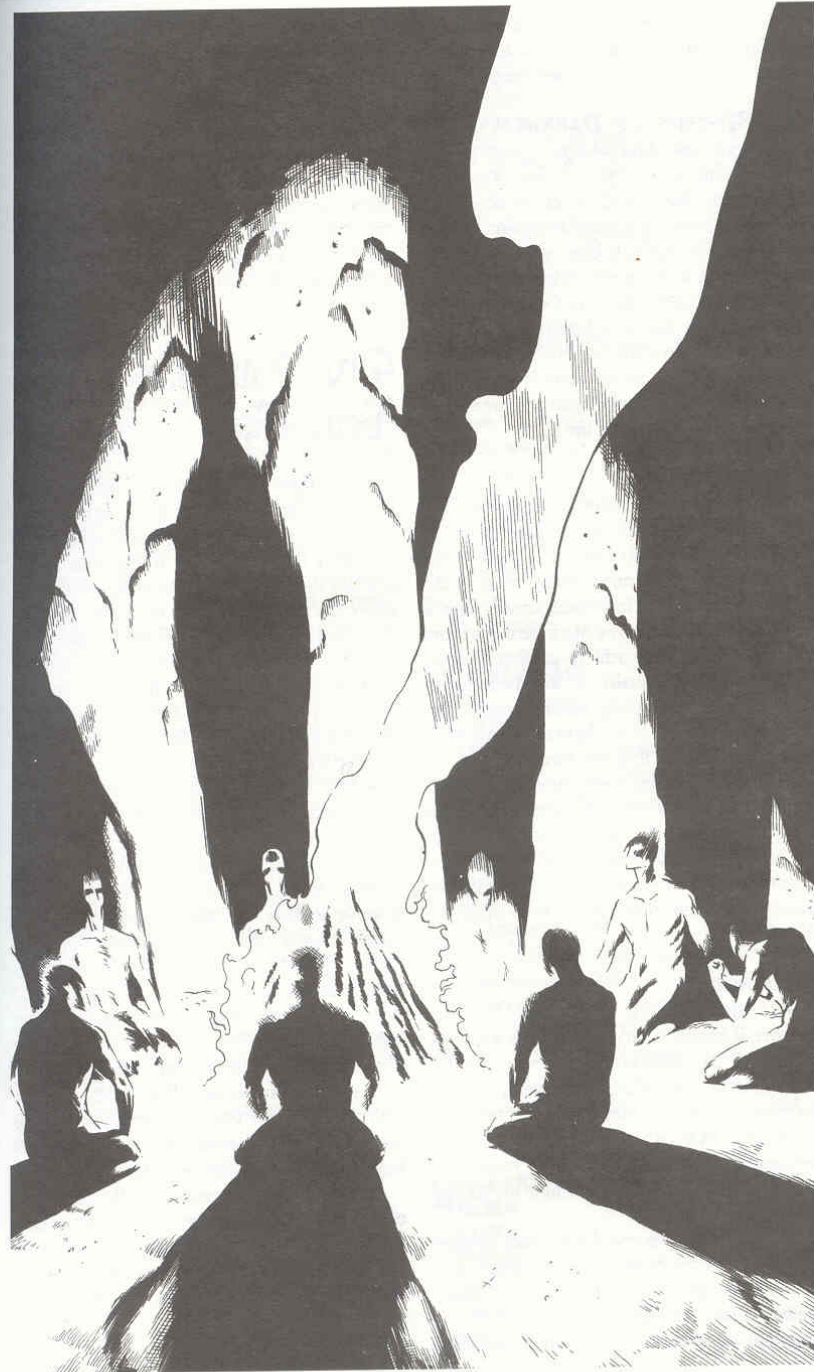
I bet the Darkness doesn't even buy marshmellows. Dick.
Next: RISE FROM THE ASHES
Way of the Phoenix: Let's talk about Phoenix
Original SA post Legend of the Five Rings First EditionWay of the Phoenix: Let's talk about Phoenix
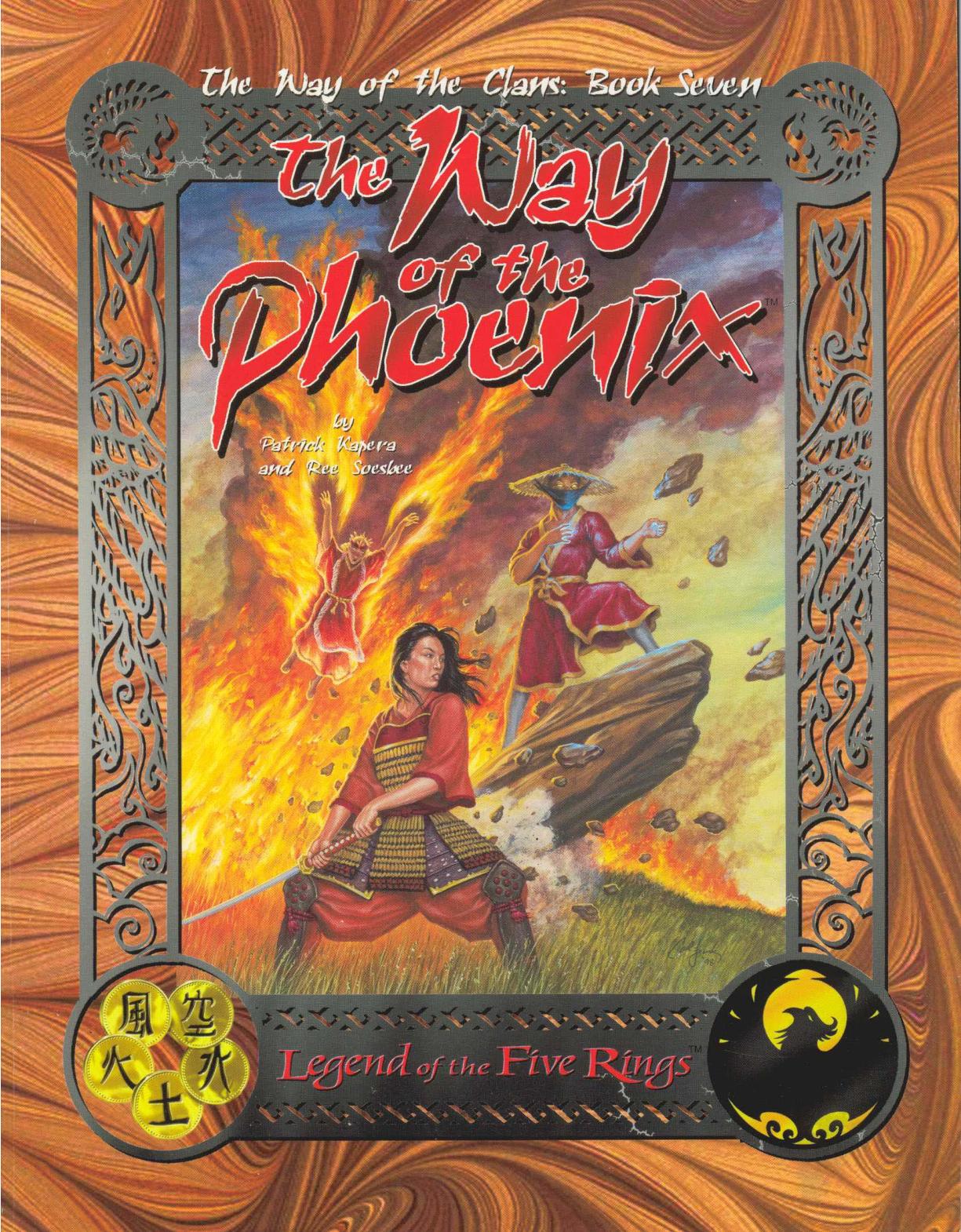
Clan Mixtape.
Welcome to the last of the Great Clan books! But we still have a way to go, don't worry. Now we get to see what the pacifistic spellslingers of the Clans are all about! This book is written by Patrick Kapera and Ree Soesbee, supported by the AEG crew, including John, Jennifer, Marcelo Figueroa, Rob Vaux and... Ryan Dancey? Huh!
quote:
Ryan gave us the kick-start we needed, and provided constant inspiration, even from afar.

RPG FICTION! Shiba the Kami sat and wrote what Shinsei told Hantei. Again, Shinsei asked the Emperor for seven warriors to take to Fu Leng's realm, and while Shiba pondered on how not all the paper in the Empire could contain the little monk's wisdom, he noticed he was staring at him, probing him for something. Hantei granted his appeal and said he would call for his brothers and sisters, but Shinsei said that could not be: only mortals, for Fortunes favor the mortal man. Hantei considered this and eventually agreed. Then, when Shinsei retired, he took one page of Shiba's record and asked him what it was. A record of his talk, he responded, but Shinsei said "No" and Shiba was ashamed of his ignorance. For Shiba it was just the present, but for others it would be history, and as Shinsei talked Shiba realized he was telling him something else: Shiba could not appreciate history, because he would live forever, and that was why he could not fight Fu Leng. Much later, Shiba journeyed into the Shadowlands, searching for Shinsei and the last Thunder - still haunted by Shinsei's words, and Lady Asako's face. Eventually he came upon a fight: a multi-limbed Oni, literally the first of his kind, in a deadly fight with Shosuro the Scorpion. Shiba joined the fight, but the Oni ended up catching him and crushing his body in its fetid grip, until Shiba managed to rip his eyes off with his bare hands
 and dealing him a mortal wound. In his dying moments, he saw a small form approaching, heard the wings of a crow, and Shinsei speaking into his remaining ear. Shiba was dying, and Shinsei said that he would not live - but he would move on. Shinsei whispered in the Kami's ear and revealed to him a path between earth and sky, one that mortals would not be able to venture for ages. He saw man's beginning and end, all the points in between, all the challenges and how to overcome them. Weeks later, the exhausted Shosuro returned to the Empire, asking for Shiba even as she fell to her knees. Bayushi rushed to hold her, saying he was not here, but Shosuro said that Bayushi was wrong; Shiba was everywhere. She saw the young man that carried her into the Imperial City, who bowed and disappeared in the crowd. During the celebration and ceremony for the fallen, Lady Asako had so much to think of - all the losses, the issue of the wedding of her son to Isawa's daughter, and then she heard an eerily familiar voice saying she looked lovely in the moonlight. She turned around and saw a young man he didn't know, one of Shiba's children, but his eyes were those of his friend. He had something to ask of her, and he was Tsuzaki, son of Shiba - but also Shiba. And as Shiba spoke, a new path started opening in Asako's mind, a new gift that she had to protect until the rest of humanity was ready. Humans were the key to greatness, and Shiba would show Asako how to guide them: he would give her the future.
and dealing him a mortal wound. In his dying moments, he saw a small form approaching, heard the wings of a crow, and Shinsei speaking into his remaining ear. Shiba was dying, and Shinsei said that he would not live - but he would move on. Shinsei whispered in the Kami's ear and revealed to him a path between earth and sky, one that mortals would not be able to venture for ages. He saw man's beginning and end, all the points in between, all the challenges and how to overcome them. Weeks later, the exhausted Shosuro returned to the Empire, asking for Shiba even as she fell to her knees. Bayushi rushed to hold her, saying he was not here, but Shosuro said that Bayushi was wrong; Shiba was everywhere. She saw the young man that carried her into the Imperial City, who bowed and disappeared in the crowd. During the celebration and ceremony for the fallen, Lady Asako had so much to think of - all the losses, the issue of the wedding of her son to Isawa's daughter, and then she heard an eerily familiar voice saying she looked lovely in the moonlight. She turned around and saw a young man he didn't know, one of Shiba's children, but his eyes were those of his friend. He had something to ask of her, and he was Tsuzaki, son of Shiba - but also Shiba. And as Shiba spoke, a new path started opening in Asako's mind, a new gift that she had to protect until the rest of humanity was ready. Humans were the key to greatness, and Shiba would show Asako how to guide them: he would give her the future.
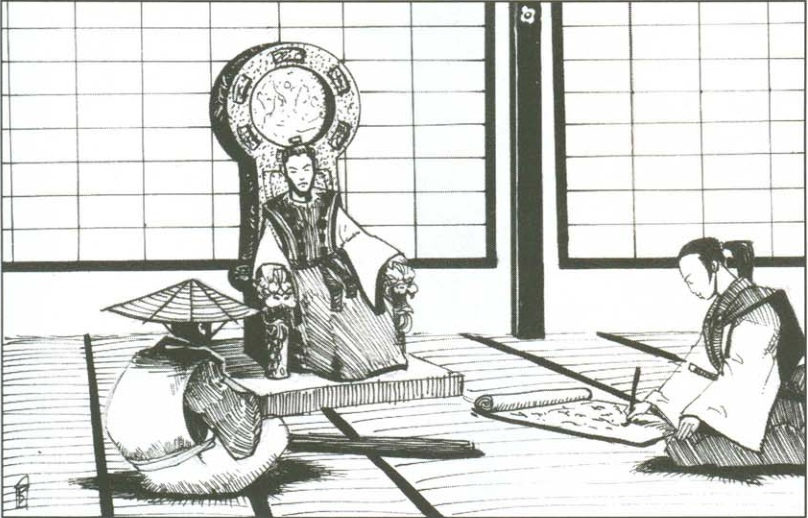
The Tao of Elfgames.
quote:
For a thousand years, the Phoenix have stood on the border of this world and the Celestial Heavens, refusing to accept only one Way. The Isawa Masters have had the strength to defy all those who would tell them where their path lies, and forged their own truths from the bitter realities of war and darkness. The Phoenix Clan holds the secret of magic, and the true power of mortal man.
Are you prepared to risk your mortality to understand their darkness? Are you ready to learn the secrets of a thousand years, and face the next age with the knowledge that you will be condemned for all that you have done?
Don't fear death - these are the lands of the immortal Phoenix, bringer of the Sun. The only things you have to fear are the truths which hide inside your soul.
Immortality is just within your grasp.
Our first in-setting letter comes from the journal of one Ide Amu, first ambassador of the Unicorn to the Phoenix. He was on a mission from the Emperor to stay with the Clans and learn of them: with the Crane he had found brotherhood, but the Scorpion and the Lion only had scorn and desire to steal the Unicorn's treasures. Who could tell what to receive from the Phoenix? He remembered the stories of their strange practices and rituals, and how in the Emperor's court they had spoken against the Unicorn, saying that their claim to Shinjo's blood was 'blasphemous' and that they were a threat to the Empire, even sending their shugenja to fight against them while keeping their 'pitful' armies far from battle. The ambassador and his companions, one Iuchi Tagiso and one Otaku battle maiden, Katsako, travelled through a long, narrow canyon while feeling they were being watched. The sides were carved with huge figures of men and women, and the Unicorn mission saw them through three days of travel. Just was Amu was about to drink from Tagiso's sake bottle, the Otaku cried out and they all saw a small man in Phoenix colors blocking the narrow path. He could not hear the conversation between the man and the battle maiden, but it was not to her pleasing. Even as Amu approached to try to prevent bloodshed, he heard the man speak - trying to flatter the Otaku. "He must have been mad." The battle maiden drew her sword, and then a crack sounded and the blade was severed. She faltered, and the man said to Amu that his name was not important, but that they knew they were coming and had prepared for their visit. Tagiso whispered in his ear that it could be a trap, but the sound was much too louder than normal, enough for the Phoenix to hear. He agreed, he was a trap, but not one of his making. Why don't they all rest, he said, and drink some sake? At this, Tagiso flinched. The Phoenix willed the sake bottle to his hand, and offered to feed it to the Unicorn's horse, so that its belly burned and died from the Scorpion's poison. Tagiso denied the claims that he had accepted a deal with the Scorpion, but Amu caught something in his voice, and the statues seemed to whisper. Amu decided to make him drink the sake: for some reason, he trusted the Phoenix more than his own friend. Tagiso drank, and died. The shugenja took the broken blade, and reforged Katsako's blade: what was broken by anger could be healed by trust. He bade her return to her people and tell them that Amu was safe with them. Overwhelmed, she protested softly that she had to escort him to the Elemental Masters, but the shugenja said he had: another four figures stood on the clouds over the mountain pass, and the Master of Earth said it was time for Amu to come with them, if he dared.
This story is kinda weird. In the previous books we saw that the Phoenix stood with the Unicorn against the Scorpion and Lion on the war of their return. Now, this book has more of those snarky '90s faction stereotype quotes. All the Clan books do, but I haven't been bringing them up because they're slightly reworded, slightly longer quotes from the core book. But the Phoenix quote towards the Unicorn in the corebook is something like "they're young and have much to learn, but their strength and our wisdom can make for a powerful alliance." Here?
quote:
"They have a single advantage, and they have been shouting about it for centuries. Since they came to our Empire, the faith and trust of the old ways has been shaken, and their blasphemous babbling has been tolerated for too long. If they choose to leave behind the trappings of their 'other land', then we shall be glad to teach them the ways of civilization. Until then, let them keep their horses and strange clothing. They will learn too soon that their luck cannot last forever.
At some point between the core and the clan book, it was decided that ISAWA WILL MAKE ROKUGAN GREAT AGAIN, I guess.
The second letter is from a Crab, Hiruma Toju, where he explains to an Imperial Magistrate (again) why he stood for Isawa Uona in a duel against a Lion, Matsu Kaiki. No one seems to understand why a Crab, one of the "foul mouthed barbarians" that despise the rest of the Empire would be willing to fight for a Phoenix, cultured and pacifistic and the antithesis of everything the Crab supposedly stand for. He explains that Uona once traveled to the Crab lands to collect her brother, Tadaka, and bring him home. She traveled with just her wagon driver. She was obviously an outsider and a Phoenix on the Wall, and the Crab's surprise soon turned to cruel jeers and insults. What could a pacifist do against Fu Leng? Other samurai would have challenged them to a duel or worse, but Uona took the abuse silently, even as the barbed words really hurt her, making her cry in silence. Then, a lookout cried a warning, and the Crab saw a scouting party rushing to safety, pursued by a pack of angry Oni. They caught them, and though the scouts fought bravely the other Crab could do nothing more than watch as they were slaughtered. No one noticed Uona until she flung herself from the Wall, flying on the air and landing in front of the fight. She called up the spirits of the air, focusing them on the oni without touching the scouts just a few feet aside. The oni turned to face this new threat, but could not move due to the air keeping them still, and then Uona lifted them off the ground and sent them flying away, miles from the Wall. She bowed before the scouts and tended to their wounded, while the Crab stammered their apologies and thanks. For Hiruma Toju (who wasn't there but heard of her exploits from his brethren) it was a proof of the Phoenix's power: more importantly, she exercised her powers without harming her own philosophy. A Clan with so much power and so much control over that power deserves respect, and the Phoenix understand more about honor than any of the so called "civilized" clans, so he will stand against a Lion or anyone else that dares to challenge a Phoenix's honor. And if the clucking hen's nest of Rokugani courts wish to spread more lies about it, he will refute them with every breath he takes.
The third letter is from Agasha Tamori, remembering his talk with Isawa Kaede when she went to visit the Dragon lands. We actually saw the opposite side of this all the way in Way of the Dragon, where it was Kaede that was all mystified by the Dragon's secrets and strange sayings and words. The same stuff happens here, but from Tamori's point of view Kaede is just as mysterious and secretive, and what Kaede thought were Dragon stonewalling and implications were mostly attempts at drawing her out to speak her mind. Tamori recalled that he once went to the Phoenix lands himself to do the same as her, watch and learn. He met her father, the Master of the Void, who knew what he was looking for and did not prevent it, instead sending his own daughter to Dragon lands. Kaede asked if he had learned anything in his stay, Tamori said yes, and she leaned a little to ask what it was. He saw in the eyes of a maiden half his age the secret of the Void, so close. Her soul, her father's soul, the blackness of the stars, something... and then it was closed, and he smiled because he had been foolish. It was not yet time to learn the truth. He simply says he learned patience.
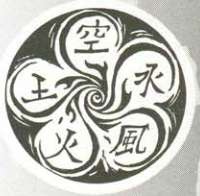
The Isawa mon. The Five Elements, weeooo. God, the kanji are fugly, enough that I first confused the Water one with Ice. And what's with the 'Earth' one? Anyway hundreds of shugenja across all of the clans wear the Isawa mon along with their own because their magic is boss.
The families of the Phoenix! First is the Isawa, the most prominent of the Phoenix. When the Kami gathered the people together and divided them into clans, one man, Isawa, watched them but did not bend the knee. What made them worthy of their servitude, he asked his brothers and sisters, and with that they left what one day would be Otosan Uchi and build a large city to the north with their primitive magic. There are many records making references to inventions, scientific and religious discussion and the worship of a pantheon that was known as "the Fortunes." Isawa and his followers ignored the Empire, researching and studying the world around them, and with their domain over magic Isawa considered mortals, Children of the Earth, superior to the Kami, Children of the Sky. In the cold northern mountains they thrived, which Isawa saw as another sign that they did not need the rule of the Kami. When Fu Leng's hordes invaded, Isawa's city ignored the threat at first, shielded by the fledgling Empire and their own isolation, but soon wandering groups of oni and goblins made their way to the northern lands. The Isawa casters attempted to defend their city with magic, but the evil horde had the numbers they lacked. One the day that Isawa's youngest sister died to an oni, Shinsei and Shiba arrived to call Isawa to fight for the Empire. In Isawa's city, they saw the casters using blood rituals in the funeral, at a time where maho was not clearly understood beyond it being magic not of the Kami. After the burial, Shiba asked how such foulness could be a tribute to his fallen sister, but Isawa said that it was their way. In fact, with this primitive maho Isawa had bound the souls of his fallen people to the walls of his city to defend them. He blamed the Kami for the evil of Fu Leng, while Shiba countered that he should be more worried about his people's spirits than their bodies. Shinsei stood between them and he talked long into the night, and by the time the sun rose a bargain was made. Isawa would go with Shinsei, if Shiba swore that he and his descendants would always protect the city. Isawa said that he was not Shiba's subject, and demanded that Shiba knelt before him, which the Kami did because to him the price was absurdly trivial. By bending the knee, he would gain the power and knowledge of the Isawa line, and a Thunder for the Empire. The tale of Shiba kneeling before Isawa is well known, and unruly Phoenix children are asked if they are so tall that they can't bend like Shiba did. Since that day, Isawa's city was known as Gisei Toshi, the City of Sacrifice. It still exists, in fact, though it is kept as a myth to other clans and its position is not recorded on any map. Shiba began living in the city with Isawa's followers, but there was always tension between them, a tension that remains between the Isawa and Shiba lines now. The Isawa are the "guardians at the gate" of magical lore and knowledge, protecting inexperienced shugenja from stumbling into dark powers and shielding Rokugan from maho. Thus, they often travel the country in search of lost knowledge and keeping in touch with other schools of knowledge, and it's common to see Isawa apprentices staying with other schools for short time. They are often criticized for their suppression of knowledge, and some say that entire rooms of the Isawa libraries are devoted to maho, blood magic and oni summoning. The Isawa deny such allegations of course. They have a strong alliance with the Kuni Witch Hunters, and have their own order of elite shugenja, the Inquisitors, to deal with dark magics. They did this in the wake of the Emperor announcing after Iuchiban was put down the establishment of a new position, the Jade Magistrate, as the chief authority on magic across the Empire. The Phoenix lobbied hard against the position, seeing it as a threat to their supremacy of spellcraft, and within five generations the post was all but forgotten. The Isawa are notorious traditionalists, and other clans turn to them to settle disputes on the traditional ways. They believe that Shinsei taught all that mankind needed to know, and anything else is superfluous at best, dangerous at worst. The Phoenix maintain that all shugenja schools in Rokugan owe their origins to the Isawa, and certainly most records show Phoenix connections to the rise of the Clans' respective magic schools. Originally spellcraft was only taught to a few children of each generation, but the war against Fu Leng changed the Isawa traditions. Isawa sent each of his five brothers and sisters to the Clans (except for the Scorpion) to educate the first shugenja of the Empire for the first war. Records from all the Clans show that without Isawa magic support the war would have been lost, even before the Seven Thunders departed.
So, about those shugenja. Their traditional role is that of keepers of religious teachings and thoughts, and they are expected to perform duties of scribe, priest, speaker to the fortunes and keeper of a clan's secrets. It's not uncommon for shugenja passing a village to receive offerings from the peasants, and if one settles they are certain to be treated with great respect. They are more than wandering priests, though: they have actual power over the kami. Only one in a thousand have this ability. Shugenja have privileges above ordinary samurai, as long as they don't abuse them. It is proper to speak to a shugenja with deference and respect, but it would be inappropriate for the shugenja to ever take note of his position.
 They are typically born into the noble class, and when they show signs of their ability other shugenja of the household talk to the spirits about the child. If the response is positive, the child will be taken to shugenja schools to train for many years. They are not typically taught skills of warfare, though some houses prefer that their shugenja know something about self-defense. If a shugenja chooses to wear a katana, they must be prepared to use it. If they don't carry the sword, they signal that they are a non-combatant and must be treated same as a courtier or other peaceful profession, including having the right to call a champion to stand for them in a duel. The Isawa see the craft of shugenja as the highest calling, and place it above noble rank or awarded honor. They use their abilities for peace, and only in defense will an Isawa shugenja use their powers to destroy.
They are typically born into the noble class, and when they show signs of their ability other shugenja of the household talk to the spirits about the child. If the response is positive, the child will be taken to shugenja schools to train for many years. They are not typically taught skills of warfare, though some houses prefer that their shugenja know something about self-defense. If a shugenja chooses to wear a katana, they must be prepared to use it. If they don't carry the sword, they signal that they are a non-combatant and must be treated same as a courtier or other peaceful profession, including having the right to call a champion to stand for them in a duel. The Isawa see the craft of shugenja as the highest calling, and place it above noble rank or awarded honor. They use their abilities for peace, and only in defense will an Isawa shugenja use their powers to destroy.
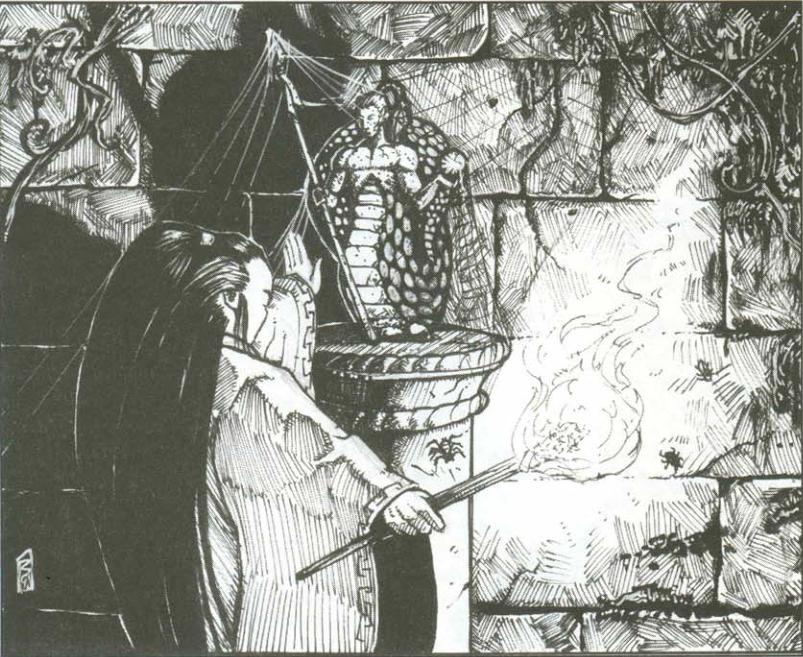
The dark secret of MONSTER GIRLS lies ahead.
Indeed, the Isawa have been defenders of peace for centuries, even more than the Crane. They have given their lives to prevent warfare, and often interceed on behalf of an oppressed minor clan or daimyo. They believe that all life is sacred, a gift from the Fortunes that should not be thrown away from temporal reasons. This attitude has gained them friends in distant clans, and foes when the targets of their pacifism are strongholds under siege by the Phoenix's allies. Not that the Isawa aren't incapable of fighting: unlike the Asahina, they practice military maneuvers in their training, determined to make sure to end war swiftly and with as little loss of life as possible if it comes. If the Clan goes to war, however, they must do so with the unanimous vote of the Council, leaving to the Shiba the routine work of dealing with bandits and troublemakers. The few battles where the Phoenix have fought as one are legendary for the effective use of crippling magical force. At times, their pacifism has brought difficult circumstances for them: they used blood magic to defend their home during the war with Fu Leng, and as legend has it, they tried to negotiate with Iuchiban the Blood Sorcerer and even offered their alliance if he would accept a reasonable compromise. Some whisper that if another great war comes, it would best to keep the Phoenix far from the battlefield for their willingness to compromise virtue in the name of peace.
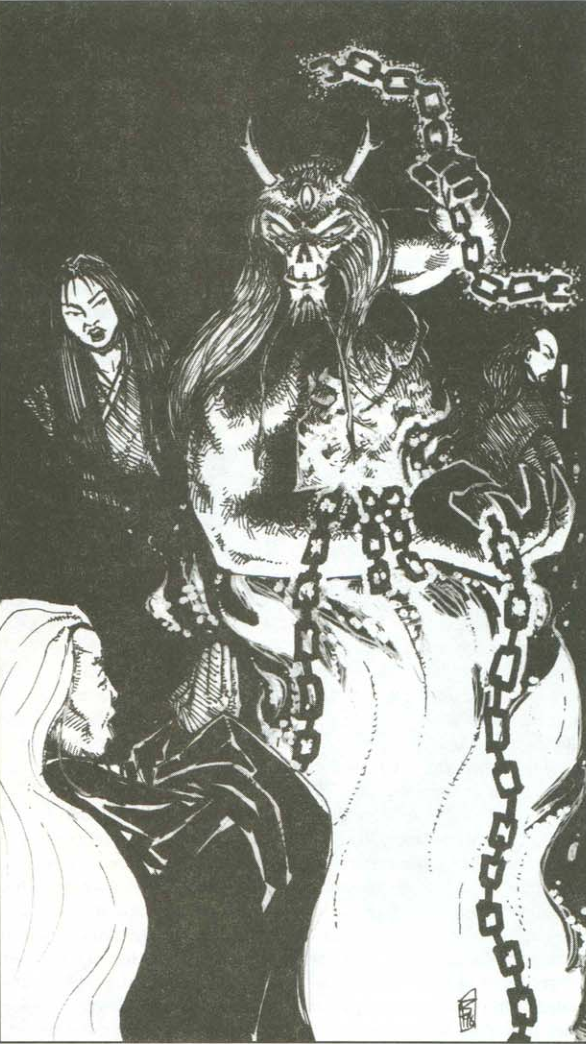
I would be smug too if I got to fuck around with dumb wizards.
The Clan is guided by five members of the Isawa, the Council of Five or the Elemental Masters. Descendants of the five remaining members of Isawa's family after his sister died and the man itself left with Shinsei, they are the ones that make decisions of policy for the Clan. They are traditionally chosen from the finest shugenja in the family, each with a distinct elemental specialty. Usually a Master is chosen by a retiring Master from their favored apprentices, or is decided by the other Masters in certain circumstances (like the unexpected death of a Master) It's typically well known who the next Master of an element will be before the reigning lord makes the decision public, but at times they use duels and tests of magical ability to determine the successor, and many times the best suited candidate is overlooked because of their temper, arrogance or other flaw, and a more stable (if less gifted) student is chosen instead.The Council is the real power of the Clan, and while the Shiba Champion speaks for the Phoenix, it's the Council that tells them what to say. They have the sheer magical aptitude and intellect to retain their position as the guardians and protectors of magic, and they maintain Inquisitor units to seek out maho and its users to destroy them. The Inquisitors only report to the Elemental Masters or the Emperor itself, and even the Hantei knows to defer to their advice. They keep magical treasures ranging from ancient Imperial relics to obscure maho rituals, and it is said that they even possess three of the Black Scrolls, sold to them by a traitorous Scorpion. Only one member of the Five ever knows where those scrolls are located. They also have a terrible ritual, the Forgetting, used against shugenja proven unworthy of their abilities. If the Masters judge them guilty, they enact the ritual for sixteen hours with the presence of all Five, and the shugenja is stripped from their powers - they lose all their magical knowledge and can never use a spell again. The only target of this ritual in living memory is Isawa Dairya, son of a Master of Fire who was manipulated by the Scorpion into believing he was to be his mother's successor. With the Scorpions' knowledge of weaponry, spellcraft and poison, he grew to become one of the most powerful students in the School of Fire, but the Scorpions underestimated Dairya's ambition. His gifts as a shugenja flowered and he believed he no longer needed Scorpion help to get in the COuncil. The Scorpions were angered when Dairya no longer heeded them, and plotted their revenge: three months later, Dairya murdered his mother, and he was put through the Forgetting. He has never denied that he did the deed, only maintained that Scorpion treachery caused it. For fifteen years he has traveled Rokugan as a bushi, seeking wisdom on swordplay from any that would teach thim and avenging himself on Scorpions and Phoenixes.
So, let's talk about the Fortunes! Specifically their worship, the Way of the Gods or kami-no-michi. The pantheon is complex and Rokugani believe in a lot of gods. The Sun (Amaterasu) and the Moon (Onnotangu) are considered the highest echelon of existence, but worship is concentrated on the Seven Fortunes and those who came later. They make a distinction between the greater Fortunes and the mikokami, the 'thousand Fortunes' that live in every plant, rock and river. The mikokami are not as powerful as the Seven, but the Rokugani still venerate them as it's easier to attract their attention and have them intercede in the Celestial Court on behalf of mortals. Every region, town and village has their own festivals celebrating important local traits. The coast villagers honor Suitengu, Fortune of the Sea, who is less popular with inland farmers. These festivals follow a similar pattern where villagers light giant torches to mark a path for the kami while shugenja take baths of freezing cold water or walk across hot coals, then the kami is invited with a prayer to visit, at which point they are believed to enter a shintai, a "god-body" that usually a statue that the villagers parade on a portable shrine. Supposedly, kami enjoy when mortals drink and have fun, so the villagers dance, sing and share in a communal feast. Then, the shugenja makes the petitions on behalf of the community, and the villagers send the kami on their way. Festivals are largely ceremonial: shugenja rarely summon the actual kami to appear, though they are known to appear nonetheless.
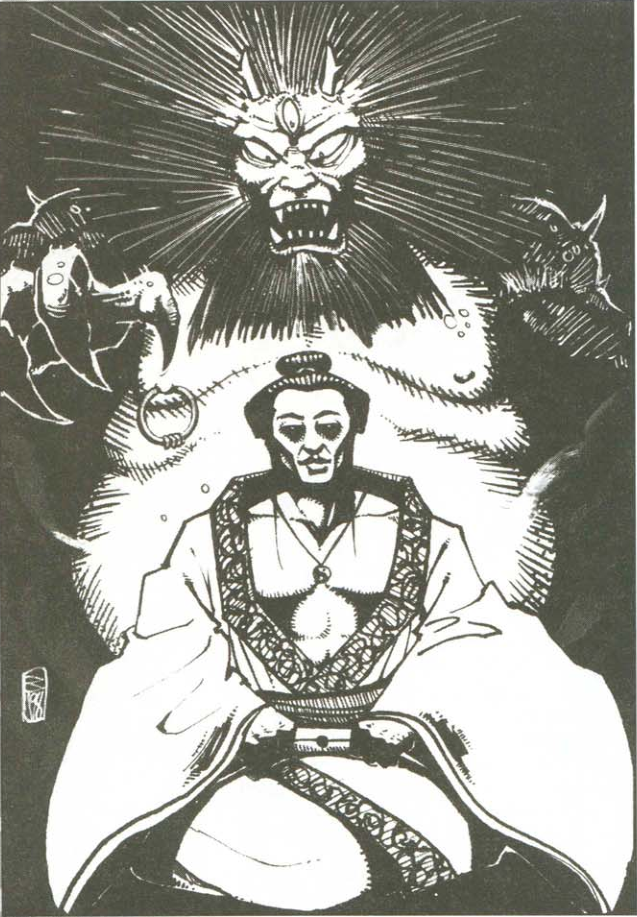
This dude is fuckin' high, yo.
Ancestor worship is perhaps the oldest religion in Rokugan. The people believe that the spirits of the dead live in Jigoku, the Underworld, where they work off negative karma accumulated in life. Ancestors watch over a family, providing aid in the form of advice or reproach in the form of hauntings. Offerings of food, prayer and incense are made to the ancestors in gratitude for the gift of life and to ensure future prosperity, as well as speeding the ancestor's reincarnation. Neglected ancestors or those who have no one to pray for them often return to feed on the living or terrorize the disrespectful family. Depending on their karma, Rokugani believe people are reborn into the realm of humans, gods, demigods, animals, ghosts or demons, the six realms of the Wheel of Existence. Those who are selfish or venal can be reborn into the world of animals to spend a lifetime as a horse or a slug, while those who lead pure lives can be reborn as a human again, but at a higher level (so, bushi instead of peasant) Rebirth is central to bushido, allowing samurai to place little value on their current incarnation and throwing themselves into battle heedlessly. A popular belief is that samurai are fated to pay for their actions, by being born again as samurai. A soul in Jigoku is punished for any impure actions, and Emma-o, the Fortune of the Underworld, prescribes all sorts of tortures that may last for thousands of years. Fukurokujin, one of the Seven who is also considered a Fortune of Mercy, travels to Jigoku to relieve the suffering of the souls, and people pray to them to help their ancestors. Ancestor worship is not organized, there is no central structure or church. Generally people worship their own ancestors on their home's family shrine. There are two distinct ways of ancestor worship, though: that of the bushi and that of the peasants. Bushi believe their honored ancestors live in Yomi, a sort of Valhalla where they watch over their progeny. Good fortune comes from helpful ancestors, and bad fortune comes from their angry spirits. Samurai families worship the founder of their Clan, their family and other legendary heroes. Although being haunted is widely considered a course, many samurai deem the attention of a shiryo an auspicious occurence. Peasants, on the other hand, think Yomi is not a place for hallowed heroes but the space between lives, and really don't want anything to do with the spirit world. Their worship is more of a preventive measure to avert bad fortune. So long as the ancestors are happy, they'll remain where they belong. Shugenja are employed by bushi as mediums to contact their ancestors (particularly the Kitsu), while with the peasants they find employment as exorcists.
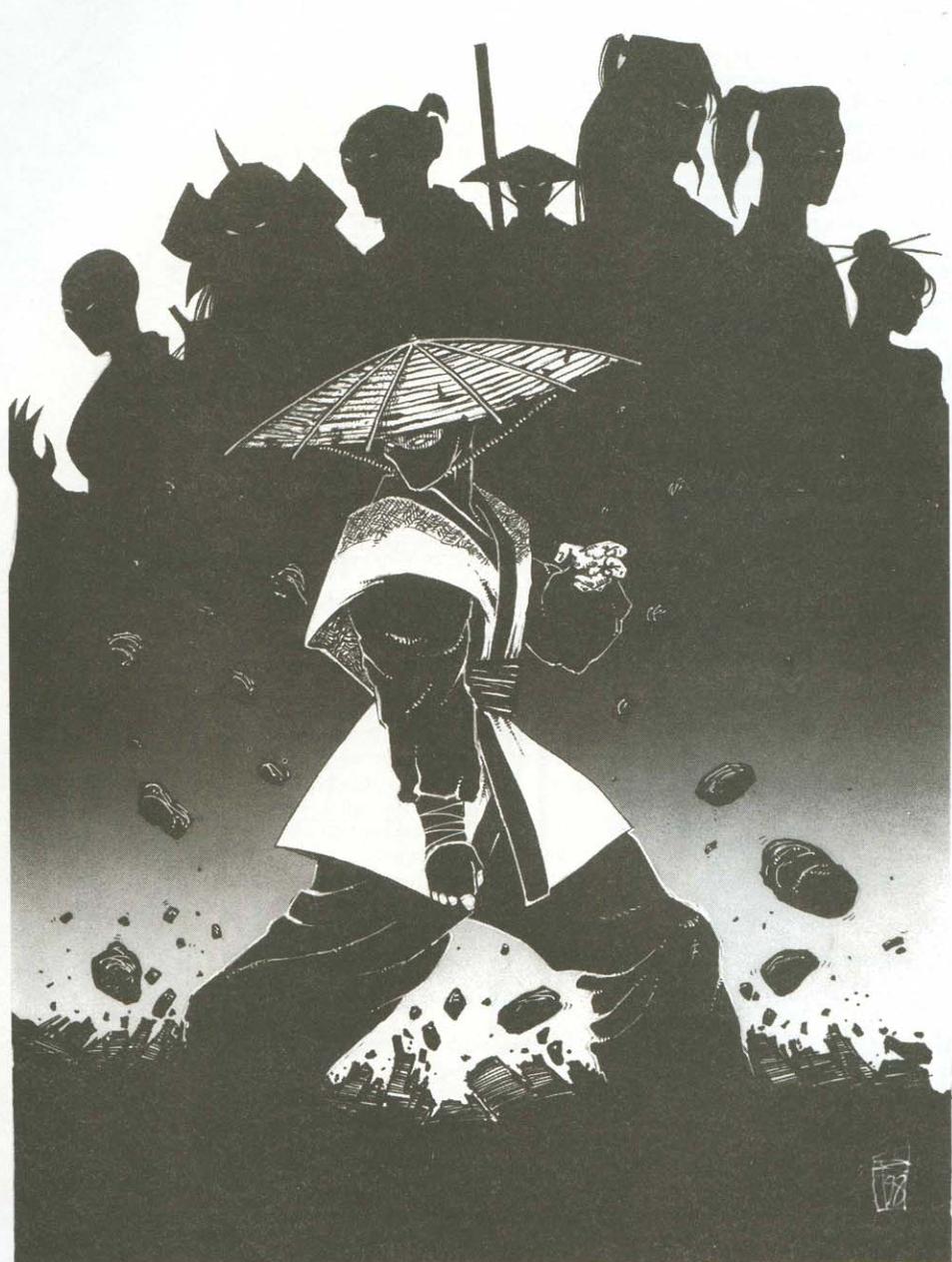
MORTAL KOMBAAAAT
Next: and now for something completely different!
Way of the Phoenix: It's got a way of helping you to breathe a little better
Original SA post Legend of the Five Rings First EditionWay of the Phoenix: It's got a way of helping you to breathe a little better
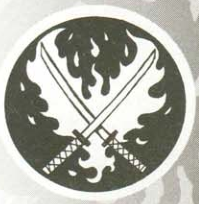
The Shiba mon, two crossed swords surrounded by the flames of the Phoenix. There is a variation used by yojimbo to the Isawa that puts the symbol of Void between the swords.
The Shiba family is a curious case in Rokugan. They bear the name of their Clan's patron Kami and their Clan Champion is chosen from their ranks, but they are still subservient to the Isawa and the Champion does not rule with absolute authority. They are a family of warriors in a peaceful Clan, where violence is abhorred, yet they remain vital to Phoenix interests. Shiba was a thoughtful and pragmatic Kami, very interested in the new world upon which he and his siblings had descended. He questioned the men and women he met about everything, observed all that he could see, and lasted quite a bit in the Tournament of the Kami by watching the others carefully. Unlike Togashi, who sought to cut himself from Rokugan, Shiba wanted to be a part of everything he saw: he could spend a whole day watching a farmer plant his field or listening to random conversations. He wanted to learn from humanity and be part of their struggles, which wasn't easy because mortals were uncomfortable around him and even his siblings found him too conciliatory to tolerate for long. As time went on, he found himself more and more isolated from the world he desired to connect with, but he found solace when Shinsei arrived. He understood Shiba's isolation, and in his words the Kami saw how the lives of men had meaning and the ways in which they were linked to the divine. When Fu Leng arose and the Thunders were gathered, Shiba talked Isawa into going once he learned that he could not march with Shinsei. Isawa named his price and the rest is history. Shiba stayed in Gisei Toshi when Isawa left, and he worked hard to integrate Isawa's followers into the Empire that they had just joined. His children were trained in the martial arts to serve as yojimbo, and to this day the Shiba family continues to uphold the duties of defenders of the Phoenix lands and bodyguards for Isawa shugenja going south. For all of his efforts, though, the new clan lacked something, a common identity. Troubled by the increase in tensions between the family lines, he went to sleep one night, and dreamed of standing on a high mountaintop while a huge flaming bird flew towards him. It was the entire universe, it said, but Shiba asked how this could be as it was obviously of the element of Fire. But since the bird was hatched from an egg and the fluids of life, it was of Water; it soard through the skies, so it was of Air; it died in ash and rose whole from the ground, so it was Earth; it was all of these things and none of them, so it was of Void. Shiba was not even separate from the bird: it was the reflection of his soul, just as he was its manifestation. The bird was the Phoenix, the Eye of Eternity. Upon waking, he summoned his people, and told them that they were now the Phoenix Clan. The Isawa knew in prophecy that one who would speak with them with the voice of the elements and be as a flaming bird would come, so they nodded as the new Clan rejoiced. Reports on how Shiba died are sketchy. Some believe he dies hundreds of years after he fell from the sky, others that he was killed in the final battle against Fu Leng. The standard tale is that Shiba went into the Shadowlands to rescue the Seven Thunders and Shinsei, and returned - but not as Shiba. His first son, Shiba Tsuzaki, vanished from their palace soon after his father was gone, claiming he was 'calling' to him. When he returned, he proclaimed that his father was dead, but that he would live forever in his descendants, and all those in attendance could sense a wave of invisible energy, and another presence behind Tsuzaki's face.
The Shiba family has an awkward position. They must serve and protect the Isawa while clashing with them in matters of clan policy. They conduct their duties with honor and dedication but it's clear that they sometimes chafe under their control. The first duty of the Shiba is protecting the Isawa, due to their Kami's vow. This vow defines their responsibilities and purpose in life. After gempukku, they serve a period in the Phoenix's Home Guard, patrolling the lands and defending them from any threat. Shiba fortresses are laid out in a semicircle on the outer edge of the territory, keeping the Isawa woodlands and holdings from being defiled by outsiders. After some three or four years, those who wish so can become yojimbo to an individual courtier or dignatary. Shiba tend to look upon their Isawa charges like a parent to a naive child. They must be kept safe, but they can't be trusted to survive on their own. Phoenix shugenja often complain of their yojimbo's 'suffocating' presence. Shiba guards are always scanning potential threats and dangerous situations, keeping their eyes on the crowd while the Isawa discuss philosophy or negotiate with other dignataries. If danger does arise, the guard immediately jumps between the Isawa and the threat, heedless of their safety or that of others nearby. Shiba bushi are notorious among House Guards of other Clans for constantly asking about security measures, and for many gunso a Phoenix's visit can be terribly trying. The Shiba take pride in this dubious reputation. Now, none of this means the Shiba never question the Isawa: friction between the two families has always existed and the Shiba often express frustration at their shugenja. They are more immersed into pragmatic reality than the Isawa, and often reach conclusions that the Isawa don't like, particularly regarding the use of violence. The Isawa can hide behind their walls and maintain the moral high ground, but the Shiba bushi cannot affort to do so. Shiba and Isawa argue a lot, but the former are still dedicated to protect the latter. Their duty is to their Kami's vow, not to the shugenja: the Isawa will be protected, whether they want to or not. They are quick to close ranks if outsiders try to put pressure or insert wedges between the families of the Phoenix, however. Many Scorpion and Crane have learned this lesson too late when their efforts to undermine Phoenix unity resulted in lethal duels with enraged Shiba.
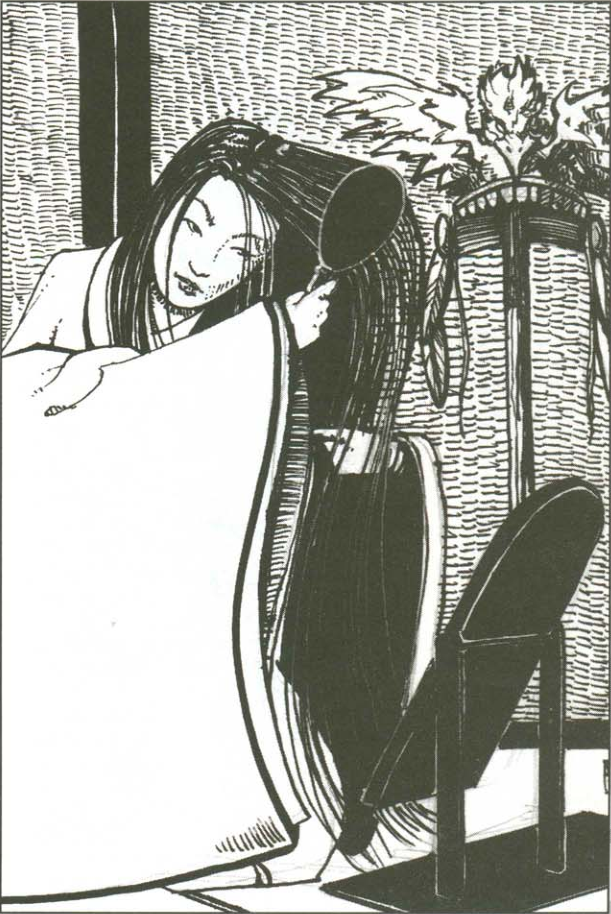
A case of Phoenix hair in the morning.
The Clan Champion is, as mentioned earlier, not the ultimate authority of the Clan as it is with others. The Champion has the respect due of their position and serves as a mouthpiece to the rest of Rokugan, but lacks the authority to dictate policy for the Clan. This has never been a problem: the Shiba have never used the Champion for political ends. They will argue with the upper echelons of the Isawa family, but at the end of the day they will nod their head and acquiesce to their wishes. Other Clans speculate why this is so, pointing at Shiba's vow, the Champion's consuming military responsibilities or simply saying that the Shiba are too weak to stand up to the Isawa. The truth is more complicated. Unlike other Clans, the next Champion's identity is not known until the previous one passes on. This is because the Champion's soul passes on to the successor. The Champion dies like the phoenix, only to rise again in the new generation. Each Champion gets a form of immortality - when they die, their soul joins that of all other Champions, and each passing transfers the memories, feelings and emotions of the previous Champions into the new one. Their natural personality remains dominant, but the force of numerous souls now support their actions. This burden can be quite traumatic, and some Champions are unable to bear the strain. The Isawa provide the assistance needed to make the transition as painless as possible and ensure that the new Champion can control the voices now raging within their mind. Sometimes, not even this assistance is enough, and Champions are seized by strange prophetic fits and speak in voices. The inherent instability of the Champion is a major reason why the Phoenix trust their leadership to the Elemental Masters instead. A potential Champion is identified when they try to touch the ancestral sword of the Clan: only the real Champion can touch it, and it will wrench itself out of the grasp of any other.
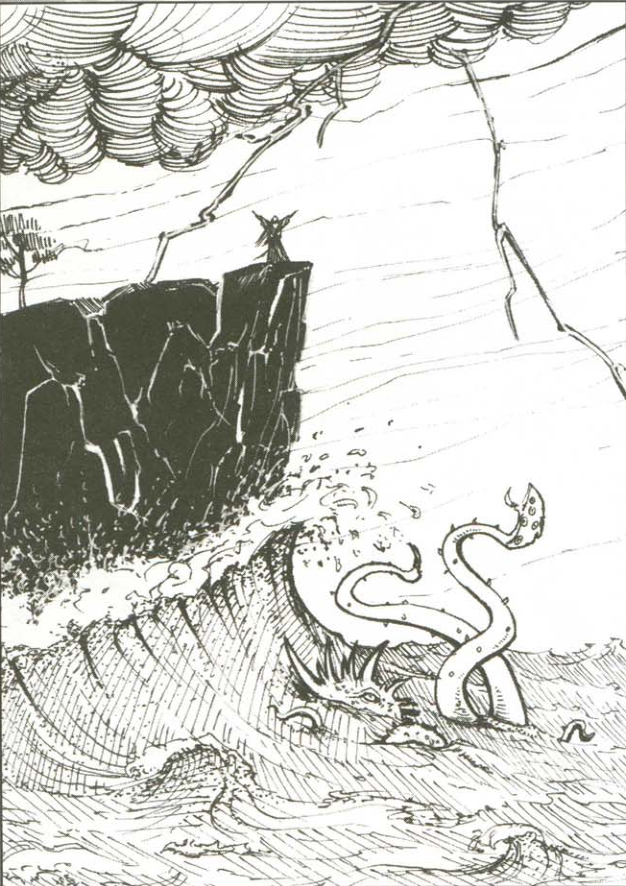
Out of nowhere, a fucking sea monster.
Major battles of the Clan include the Battle of Sleeping River, where the Phoenix joined all the Clans in stopping Iuchiban after he escaped his prison. It was the Phoenix who rallied the allied forces when the undead broke through their lines, with Isawa shugenja striking down Iuchiban's hordes and countering the dreaded maho of the Bloodspeakers, and Shiba guards buying time for their charges to do their work. What could have been a complete rout was transformed into a victory, and while the clans suffered horrible casualties they did not break. The Five Nights of Shame involve a young family, the Snake Clan. They lived in the Dragon Heart Plain and had comfortable if unremarkable lives. But an ancient spirit, a Shuten Doji, haunted the land around their castle, and came calling the first evening of every month for many years, screaming in fury and begging the family to heed its pleas for mercy. The small family struggled to ignore the summons, but one dark night the young son of the daimyo was unable to resist the call. Once he had gone to the spirit's side, the haunting stopped for a while. The daimyo died, which the Phoenix mourned as he had been a friend to the Clan. The son ascended to the throne but there was a darkness within him, and had learned foul secrets from the Shuten Doji. The Phoenix uncovered the plot, and fell upon the Snake lands. Shiba blades killed every last man, woman and child of the Snake in five days, while the rest of the Empire watched the slaughter with horror and outrage. The Emperor demanded that the Phoenix explained their actions, and the Elemental Masters only replied "Never Again." In the Battle of the Broken Daisho, an ancient feud between Kakita Gosano of the Crane and Matsu Tusun of the Lion burst. They fought many minor skimishes until their great armies were ready to attack, but on the day of the battle a bolt of lightning and a fierce downpour fell from the clear sky, and a small Phoenix army commanded by Shiba Toriiko, Champion of the Phoenix, placed itself between them. The Crane and Lion generals demanded an explanation, and Toriiko said that they would rip the Empire apart in their feud and that her men would not live in the world they would make. Tusun believed that the Phoenix was siding with the Lion, and ordered his troops to fall upon the Phoenix... who never drew their weapons even as the Matsu killed them. Even the stoutest of their bushi trembled at the Phoenix's discipline, men that quietly replaced the fallen on the battle line without hesitation, and some of their commanders committed seppuku rather than continue to slaughter the Phoenix. Kakita Gosano tried to get Toriiko to stand aside, but she simply said to Kakita that she would not see a world devoured by pride and prepared herself for a duel. Gosano assumed the stance and saw that she was willing to die, and her technique was superior. Only pride made him charge, and he ended up killing Toriiko, who also never drew her blade. He realized that she had not been talking to him and felt the presence of his own ancestor, Kakita, turn away in shame. Matsu Tusun received Gosano's broken blades at noon, and the Crane retired to a monastery in shame while the Lion also withdrew. The Battle at Fate Gorge was born from a challenge made by Lord General of the Lion, Matsu Uniri, that shugenja were unnecessary in the Armies of the Emperor. The Isawa argued that an army of soldiers was no match for an army of shugenja, and the Shiba said that an army of Isawa could beat an army of Matsu. Uniri accepted the challenge. Three months later, the lines were made and the Isawa teleported a hit squad of eight Shiba in a suicide mission to the Matsu's war room, ready to cut off the Matsu's leadership. They were not counting on a young Matsu Tsuko, only expecting Uniri and his wife. They killed Uniri, but Tsuko and her mother took care of the Shiba. The rest of it is history. At the Battle of the Sun Princess, the Phoenix army hid themselves from their Dragon foes in a magical fog, and when the fog parted they used it to rain magical havoc upon the Dragons, cutting down their shugenja and bushi.
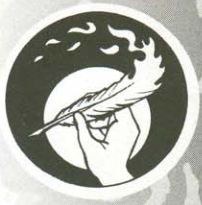
The Asako mon, a hand holding a quill. On fire! It's said that they used to have an older, more sinister mon. Spooky.
The Asako family are enigmatic like the ise zumi, and encouraging like the Ikoma. Their origins lie in the beginning of bushido, and on the great secret that the founder, Asako, received from her old friend Shiba, many years after his death. She was in her youth one of Shiba's many human companions, traveling and learning from each other. In that time, she was married to a great shugenja, Yogo. When Fu Leng came, Shiba was more and more busy and Asako dedicated herself to her healing craft, traveling with Shiba's armies and missing her beloved Yogo. Unfortunately, Yogo was cursed by Fu Leng to betray the ones he loved the most, and not even the greatest Isawa shugenja could break the curse. He considered seppuku, but at the last moment was swayed by Bayushi, and joined the Scorpion knowing that he would never love them and thus be safe. Upon hearing of her husband's deed, Asako was crushed and bitter. Shiba returned and offered a place to begin again, among friends. She gratefully agreed, but her son, Sagoten, was less forgiving and vowed to abandon the cruel abandonment he and his mother had suffered. When Isawa agreed on going to the Shadowlands, another condition was that Asako's son would marry Isawa's daughter. Sagoten agreed, realizing how much his true father's enmity of the Isawa could be inflamed but not what would be done to his mother in the process.
Months after the Thunders departed, Lady Doji came to the Isawa and asked them to divine the locations of the Thunders. The Isawa did so, more out of concern with their funder and anything else, and determined that only one still lived but were not able to determine their identity. Shiba volunteered to find the Thunder and marched into the wastelands, but only Shosuro returned with her twelve Black Scrolls and the obsidian hand. Meanwhile, a great magical work was being made for the marriage between the Asako and Isawa lines, one that would come to be known as Isawa's Last Wish. Mere weeks before the wedding, Shiba merged with the spirit of his son appeared before Asako, and told him the real story of his death. In his words, Asako lost herself, slipping into a new state of comprehension. Shiba told her that there were lost paths to divinity, denied to humans by birth and blood, but the race of mortals was gifted and destined to walk the path of godhood in time. Nature was crafty and retarded their progress, but there were ways to trick her, to slip past her on the way towards apotheosis. They talked through the night, and when dawn came Asako was alone. She took the secret that Shiba taught her and wrote it down in a script of her own devising, only sharing the cipher with the handful of people that she had revealed the truth to. Each generation, the cipher is redesigned to avoid accidental or intentional exposure to the words. Publicly, Asako continued her work as a healer. At Shiba's behest, her new family shifted its focus towards the recording of history, as the Kami said that it was an important part of understanding the human condition. They collected every lost fable they could find, every myth from the mouths of wayfarers, all that they could find for their treatises of the past, and they built an extensive library chronicling not only the war with Fu Leng but the hundreds of years before the Kami walked the land. At some point, the Isawa learned that the Asako had a secret denied to them: they demanded immediate disclosure of the secret, and when refused they demanded that Asako and her family leave the city at once. The wedding was canceled, and the shugenja charged with the creation of Isawa's Last Wish, the magical gift, were ordered to halt their work. By Shiba's request, a small contingent of Asako's historians remained to tend to the Imperial Library, but as a concession to the irate Isawa they would never be allowed to leave. They were finally allowed to go outside to retire and seek replacements, but to this day no Asako sets foot on the ground of Gisei Toshi, they're always carried by attendants. The Asako settled near the Ki-Rin Shrine, in the central Phoenix lands.
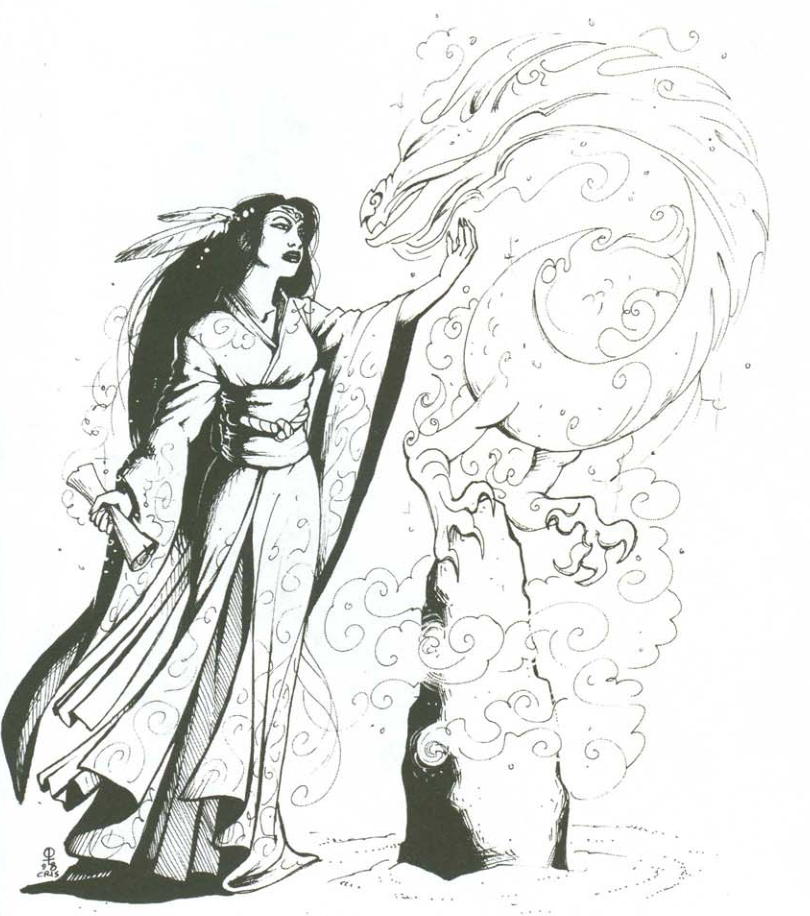
Aw, that magic dragon thing is cute

The Asako have not suffered any great tribulations in the thousand years since the war with Fu Leng. They have had the time to develop independently and freedom from political interference, and with the extraordinary information they have protected this has resulted in a decided solidarity within the family. They are still quite structured, however. One portion of the family dedicates itself to research the Secret and its implications for Rokugan, developing training methods to bring out the latent abilities all humans share. They include the Asako that are the most 'enlightened', having walked further down the Path. These Asako are extremely isolationist, adhering to the doctrines of older, retiring samurai, but also the most knowledged and experienced of the family. They decide who is ready or isn't ready for ascendance. The other side of the family is outgoing and friendly, dedicated to the development of all Rokugani. They are lower-level practitioners of the Secret's mystic abilities, following the Way of Shinsei and preparing the 'younger' Clans for a time where they can become like that Asako, closer to godhood. The Asako realize their beliefs would be considered heretical, even blasphemous by others in the Empire. For instance, they believe the Imperial prerogative to enthrone new Fortunes to be a "false path" and denying of the Path of Man, but they still realize the Emperor's word is law and continue to hide their knowledge rather than upsetting the careful balance of the Empire. They guard the secret of mortality itself and immortality beyond that, and will never reincarnate again, preparing themselves to transcendence into becoming true Fortunes themselves. Their abilities allow them to change the attributes of a person at will, making them hardier and stronger, or slower and weaker. None of those initiated in the highest ranks of study have died of natural causes in three hundred years, and when one of them dies to violence all are lessened for it. Theoretically the dead immortal reincarnates as an Asako again, but the family harbor very ill feelings towards such perpetrators, as they have taken the life of one just a step away from ascendance.
Next: the supremacy of the casters.
Way of the Phoenix: Though the storm and rain
Original SA post Legend of the Five Rings First EditionWay of the Phoenix: Though the storm and rain
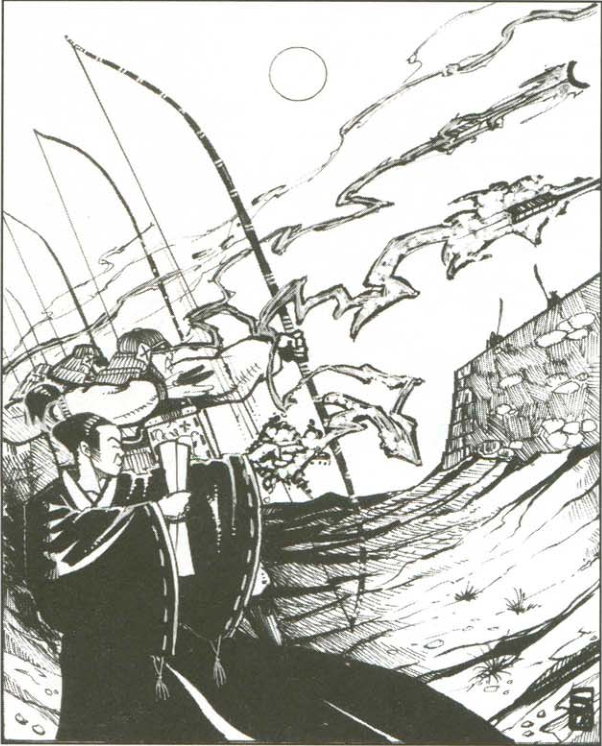
Okay who was the joker with the frogcutter arrow, we're at WAR for kami's sake
New character options time! As always, we start with new skills to add to the glut. We have now Advanced Medicine/Acupunture which allows a character to successfully treat a patient with a Perception + Advanced Medicine roll at TN 15, modified by the severity of the wound or disease. The treated patient heals at twice the normal rate thereafter, but only one roll can be made per disease or wound. Poisons are determined with a TN of 20+, and can only be treated if the character also has Poison or Lore: Poison. It's a Craft skill, and really what's the point of the High Medicine skill now? Cipher allows encrypting or decoding written information. Intelligence + Cipher roll to encode something, and that roll is the TN for the Intelligence + Cipher roll to decode it. High skill. Research allows a once-per-spell reduction of 5 on the TN for a spell research roll and reduces the research time in one week per rank to a minimum of one month. High skill. Spellcraft is for shugenja only. TN 20 with Intelligence + Spellcraft to sway a kami's opinion of the character, or the same roll at TN 25 to detect a spell cast in an area or on a person. High skill. New advantages include Bland (for 2 points the character is bland, finding it easier to avoid notice but with smaller chances of receiving recognition or rewards) Chosen by the Oracles (5 points, the Oracles have an interest in you, which can be good or awful since the Oracles are barely human) Daredevil (4 points, when the character does something risky the GM secretly rolls a dice and on an even result they add a secret +10 bonus to the player's roll), Elemental Knowledge (6 points, it attunes a character to an element to the detriment of another. The pairs are Earth-Air and Fire-Water. They get -5 to their TN to cast a spell of the chosen element and +5 to the opposite, while spells cast on the character suffer the reverse modifier) Elemental Convergence (6 points, Ishiken only, the character can cast one Void spell their Void Ring times per day without it counting towards the cast spell limit, can only be taken once) Forbidden Knowledge (Phoenix only, 1-10 points, the character has SECRET KNOWLEDGE that other Phoenix know they hold, it's kind of halfway between Inheritance and Dark Secret) and Ishiken-do (5 points, Isawa shugenja only, requisite to become a Void mage). New disadvantages are Contrary (3 points, can't remain neutral on an issue or stand idly, Willpower roll to do something decisive and damn the consequences), Curse of the Kami (10 points, all spells have +10 to the casting TN and take twice as long to cast, the character can never learn or develop Techniques
 ),
Enlightened Madness (1, 3, 6 points, Phoenix shugenja only, like the Way of the Dragon disadvantage except that instead of a tattoo it's the spells of a whole element that get affected, Void cannot be chosen unless the character is a Void shugenja, with each level the character chooses an additional element to trigger the madness),
Forgotten (4 points, Phoenix only, the character was Forgotten and can never use spells, magical items or abilities that require magical aptitude)
Jealousy (2 points, the character must choose another character or dependent NPC and always try to outdo them)
Momoku (8 points, the character cannot use Void Points to boost Traits) and
Yogo Curse (3 points, sometimes people in the Asako family get the curse of the Yogo)
),
Enlightened Madness (1, 3, 6 points, Phoenix shugenja only, like the Way of the Dragon disadvantage except that instead of a tattoo it's the spells of a whole element that get affected, Void cannot be chosen unless the character is a Void shugenja, with each level the character chooses an additional element to trigger the madness),
Forgotten (4 points, Phoenix only, the character was Forgotten and can never use spells, magical items or abilities that require magical aptitude)
Jealousy (2 points, the character must choose another character or dependent NPC and always try to outdo them)
Momoku (8 points, the character cannot use Void Points to boost Traits) and
Yogo Curse (3 points, sometimes people in the Asako family get the curse of the Yogo)
We now get rules for Shugenja Taryu-Jiai, or dueling for shugenja. Shugenja rarely use swords against bushi, and it's more common for a shugenja to have a stand-in duel for them in matters of honor, and if the stand-in dies they pay for their life with their own. But long ago, one Isawa Ujikki asked the first Kakita how those who were not dedicated to the blade could fight for their honor, and Kakita had no idea because he did not know the ways of the shugenja. They hammered out the protocols for shugenja dueling over several nights and published it in a scroll known as, well, Shugenja Taryu-Jiai. The initial protocol is similar to that of formal iaijutsu duels: the shugenja petitions their daimyo to ask the daimyo of the offending party to allow the duel. Spontaneous duels are frowned upon by the daimyo of the duelists. Either duelist can concede victory before the match without losing face. The mechanical procedure is as follows: the initiator of the duel declares one element, then the challenged does so. Each shugenja rolls Ring + School Rank, against a TN of the opponent's declared Ring x 5. The TN is reduced in 5 for each Free Raise the shugenja has on casting with the element they chose, like from school bonuses, and if the opponent's chosen Ring is opposite to the duelist they roll and keep another die. Whichever duelist exceeds the TN by a greater margin inflicts the total die roll in Wounds on the opponent, while the duelist with the smaller margin inflicts Wounds equal to the amount by which their TN was exceeded. If a duelist fails to meet or beat their TN, they take Wounds equal to the amount by which they were short, and if both duelists fail they both take damage and cannot cast spells of their declared elements for one day per five Wounds received. Whichever shugenja dealt more Wounds is usually considered the winner, and like in iaijutsu duels it's normal for the loser of the first round to concede.
The Isawa, in addition to their regular shugenja training, also have the Tensai schools. +1 to their chosen Ring, 3.0 Honor. Their skills are Calligraphy, Meditation, Shintao, Theology, History, plus two other High skills. They get a Free Raise for all Rituals. Regular Isawa shugenja train with a Master that may have three to five apprentices, but tensai are apprentices to the actual Elemental Masters. Now, the Elemental Masters only have three to five direct apprentices themselves, but each also has a "school" of apprentices where elder students teach the younger. "Tensai" means "prodigy", and these prodigies specialize on one element to the detriment of everything else. The schools have a big washout rate, and competition is rampant as each apprentice knows they can be chosen to replace a retiring Elemental Master. Of course, only one can do so, but the others aren't looked down on: tensai are respected across Rokugan for their rigurous training and many clans beg for tensai teachers in their academies. They start with Sense, Commune, Summon, two spells of their primary element and one of a secondary element. Tensai choose one element from Earth, Fire, Water and Air. They get their School Rank in Free Raises when casting spells of that element, but +5 per School Rank to their TNs to cast spells of any other element. That's some harsh specialization, but hey, huge fireballs.
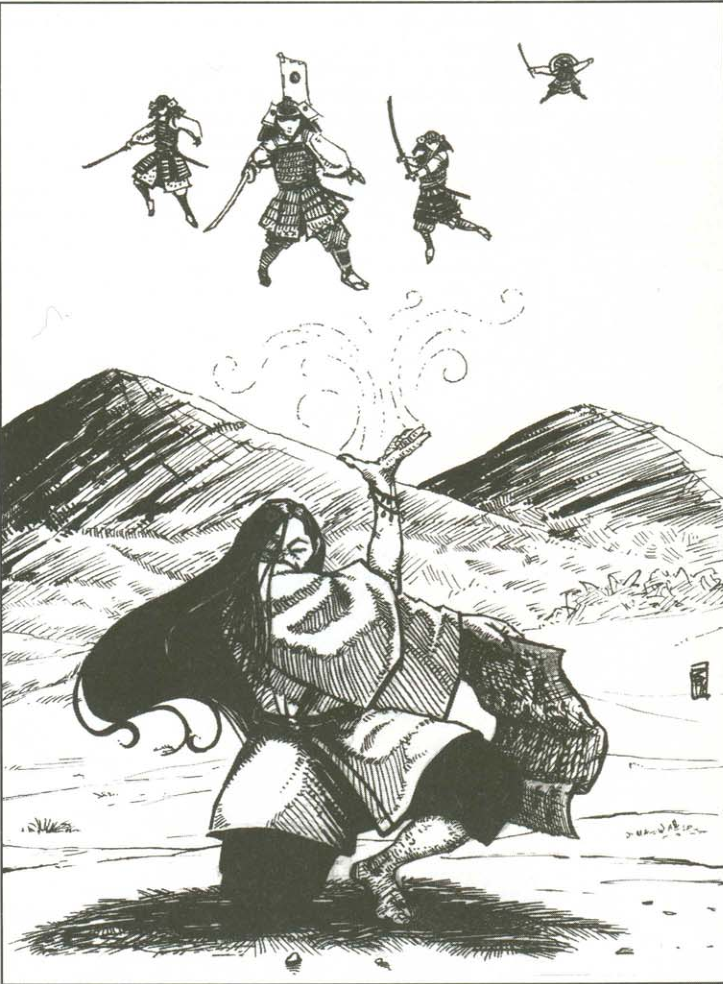
These samurai look remarkably
 for people being flung off to their dooms.
for people being flung off to their dooms.
The Isawa Ishiken school teaches Void magic. It is the most powerful and most difficult force to draw from, and Void mages risk not only their power getting away from them or causing physical, external damage, but also losing themselves into the source of their power, unable to recognize or distinguish the elements from each other. The Realm of Void was not meant for man, and those who explore it for too long might find memories of the physical world or the other elemental realms more confusing and alien, until only Void is familiar to them. For this, Void mages dedicate themselves to training with Void magic to the exclusion of almost everything else. Children born with an affinity for Void quickly make themselves known to the Ishiken, the Void Masters, and it's part of their job to listen for those births in the stream of Void and determine the appropriate course of action. Some have only a mild sensitivity that manifests itself as a vague danger sense or a specially strong tie to an individual (a Kharmic Tie, basically), or doesn't manifest at all. If the child has more than this, the Ishiken make a decision: depending on the child's strength and the disposition of their family and other factors, they may erect mystical 'blinders' to muffle the sensitivity or take the child in as a Void initiate, an Ishi. This decision is made within the first five to ten years of a child's life. Ability with Void becomes increasingly dangerous after this point, as untrained children cannot understand, let alone control, their additional sense. It's easier to train a child with the appropriate knowledge, and most of those with Void affinity won't survive to adulthood. Ishi training requires pairing the initiate with a Master, which serves as their initial anchor in the physical realm to keep their bearings in the Void. The Master also creates mystical blinders for the trainee, and lowers them when they feel the student has the ability to withstand it.
Void shugenja have +1 to Void and 2.5 Honor. Their skills are Lore (Void Magic), Meditation 2, Shintao, Tea Ceremony and any other two skills. Their starting spells are Sense Void, Drawing the Void, Sense, Commune, Summon, two spells of a second element and one of a third. They can use common shugenja aspells with no penalty, though their initial spells are obtained as a result of their training rather than dedicated study. They can acquire spells later on just like other shugenja. Only ishi and ishiken can use Void spells. Mechanically, they work exactly the same as other spells. They are organized by "Rings" that represent when a common Void shugenja learns them, though it's common for them to skip rings and learn more 'powerful' spells before others. Of course, it'll be rare to find a master that will teach an advanced Void spell to a newbie.
First Ring spells are about feeling out Void.
- Sense Void: the fundamental Void spell and the first any Ishi learns, they reach out through the Void. It's a form of astral projection, and after casting the character must make another roll for every half hour of travel in the Void, starting at TN 10 and adding +5 to each successive roll. The spell allows sensing out a being's thoughts or emotions, the components of a person or thing, supernatural phenomena and so on. Remember when Isawa Ujina felt what the horses were thinking in Way of Shadow? This is it.
- Drawing the Void: the shugenja "grabs" a Void Point from the Realm of Void for their use. TN 15, can only be cast once per day.
Second Ring spells grant deeper insight into the Void, and thus the world.
- Altering the Course: the Void mage can use up to their School Rank in Void Points in a single action. This does not give them extra Void Points, just allows them to go nova in one burst. TN 20 and 3 actions to cast, though.
- Moment of Clarity: the shugenja grants a target character one skill for their Void in rounds. The skill uses the default Trait+1 as its Rank.
Third Ring spells allows subtle changes of the Void flowing through others.
- Kharmic Intent: the shugenja and a target can share their Void Point pools for the caster's Void Ring in rounds. Both parties must agree, and once the link is made neither can break it or oppose the use of a Void Point without the consent of the other.
- Void Release: the target can use their highest Trait instead of any other Trait, for the caster's Void Ring in rounds. TN is target's highest Trait times 5.
Fourth Ring spells refine their control of the Void and can affect others to a far greater degree. At this point, the Ishi no longer needs their Master as an anchor point.
- Void Strike: caster steals one of the target's Void Points. TN is the target's Void Ring x 5, each additional Void Point to be stolen takes two Raises, and the caster can only steal as many Void Points as their Void Rank per day.
- Void Suppression: caster forces a target to use their lowest Trait instead of a specific Trait. TN is the Trait to be affected times 5.
The fifth ring is limited to the Ishiken masters themselves, and they are rumored to be able to steal someone's Void entirely, unraveling them, or showing them the vistas of the Realm of Void to render them dead or insane. No rules for these, though! Pretty interesting support, I think.
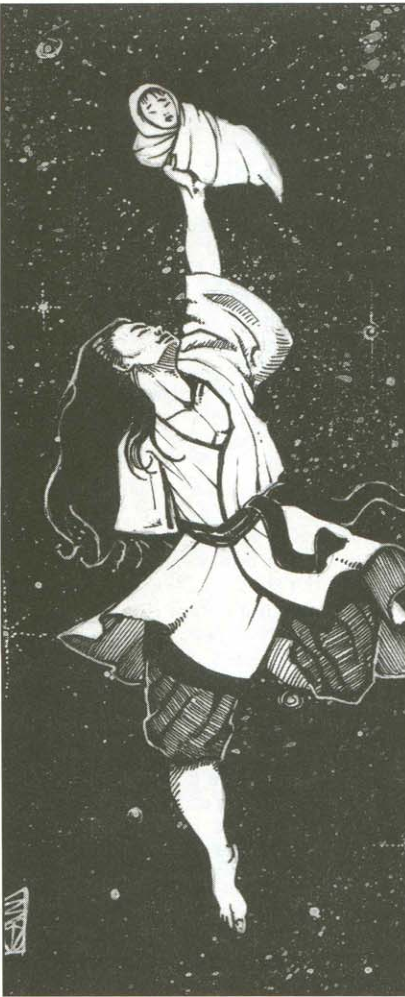
This isn't normal, but on Void, it is. Not even once.
The Asako have the Henshin Academy. "Henshin" means "change," but also "progress" or "rebirth", and is the name the Asako gave to the academy where they train students to harness the Gift that Shiba gave Asako. On the surface, the Academy only trains librarians and historians, and only provides the pupils with a core curriculum before allowing them to choose their path. This has led to the idea that the Asako have little to offer beyond fundamental concepts, and that's exactly what they want others to think. Samurai have already started to tap on the Gift across Rokugan, but they refer to their efforts as Techniques. The Henshin use Mysteries, direct manipulation of the elemental essence. The henshin are still human and can't just command the Elements, however - they must 'trick' nature into submitting to them using what they call Riddles. Henshin are non-shugenja and can't cast or research spells. They have +1 to Willpower and 2.5 Honor. Their skills are Calligraphy, Defense, History, Medicine, Meditation and Shintao. A variant of the henshin described in a sidebar, the Michibiku, gets +1 to Awareness: they go out into Rokugan, helping or giving advice where they can and keeping the secret. GMs are encouraged to direct Asako PCs to this branch, but why put it on a missable sidebar that is on the Ishiken pages?
Anyway, the henshin students choose their own course of research into the Mysteries. In game terms, it means that with every School Rank they choose one Element to learn the rank effect and Riddle from. The trick is that once chosen, these abilities behave as if the character has the School Rank at which they chose them: for instance, a character that picks Air at School Rank 1 can reach School Rank 4, but their Air effects will always behave as if they were School Rank 1. So, there's an element of system mastery in picking which Elements to learn and when. Rank effects and Riddles can be used up to their Ring Rank times per day, combined, so a henshin with an Air of 2 can use the rank effect twice, the Air Riddle twice, or both once per day. Rank effects allow the character the ability to add or substract their chosen School Rank in an element from their own Rings, or half that value from another character, rounded down. No saving throw or anything, it just takes an action in combat for the henshin.

Riddles! They require a roll of the relevant Ring against a TN set to the School Rank the element was learned at times 5. If the roll fails, the exact opposite of the intended effect occurs. If a negative dice pool or value happens, the attempted action or effect fails automatically.
- Riddle of Earth: the henshin may ignore (chosen School Rank) + Earth in Wounds, or heal the same amount of wounds taken by another.
- Riddle of Water: the henshin may add (chosen School Rank) + Water in dice rolled for physical Perception checks.
- Riddle of Fire: the henshin may add (chosen School Rank) + Fire in unarmed hand to hand combat.
- Riddle of Air: the henshin may add (chosen School Rank) + Air in dice rolled for social interaction checks.
The Final Mystery is that of Fate, and those who learn it are known within the Asako as the Fushihai, or Masters. No one chooses to become a Fushihai, and in fact none even within the Asako even know of this rank of training. The Fushihai choose who joins their ranks based on their progression through the Mysteries and understanding of the Riddles. Fushihai are fully aware of the Path of Man and their position in it at all times. Every thing they do and say, or don't do and don't say, affects their path. They act according to a strict code of conduct and actively avoid things that will hinder their progress. The game recommends GM to think carefully before allowing a PC to reach Fushihai rank and suggests that these characters are retired, as the Asako seclude new Fushihai for twenty to fifty years to train them and drill into them the need to keep the Secret. As for mechanics, Fushihai get the Contrary disadvantage automatically (they're acting more and more Fortune-like), they can reroll any action roll their Void Rank times per day and keep the best roll, and they are immortal - they will never die of old age or disease.
The heritage tables follow. We once again get "haha, you're clan ronin get fucked" results. The most interesting table here is the Forbidden Knowledge table, since it's inspiration for what the Forbidden Knowledge advantage actually entails. It can be something like an Asako scroll (if delivered to the Isawa, it gains the PC 1 Glory Rank and the entire Asako family as Sworn Enemies), extensive dark lore (+3 in any magical Lore, but the Epilepsy disadvantage and any spell with a TN of 10+ counts as stress for it), finding the skeleton of something with too many arms (Haunted disadvantage, with visions of a far away savage land instead of ghosts) or stumbling across a Fushihai ritual (the actual ritual is erased from the memory but Riddle effects are increased in one die) Cool stuff.
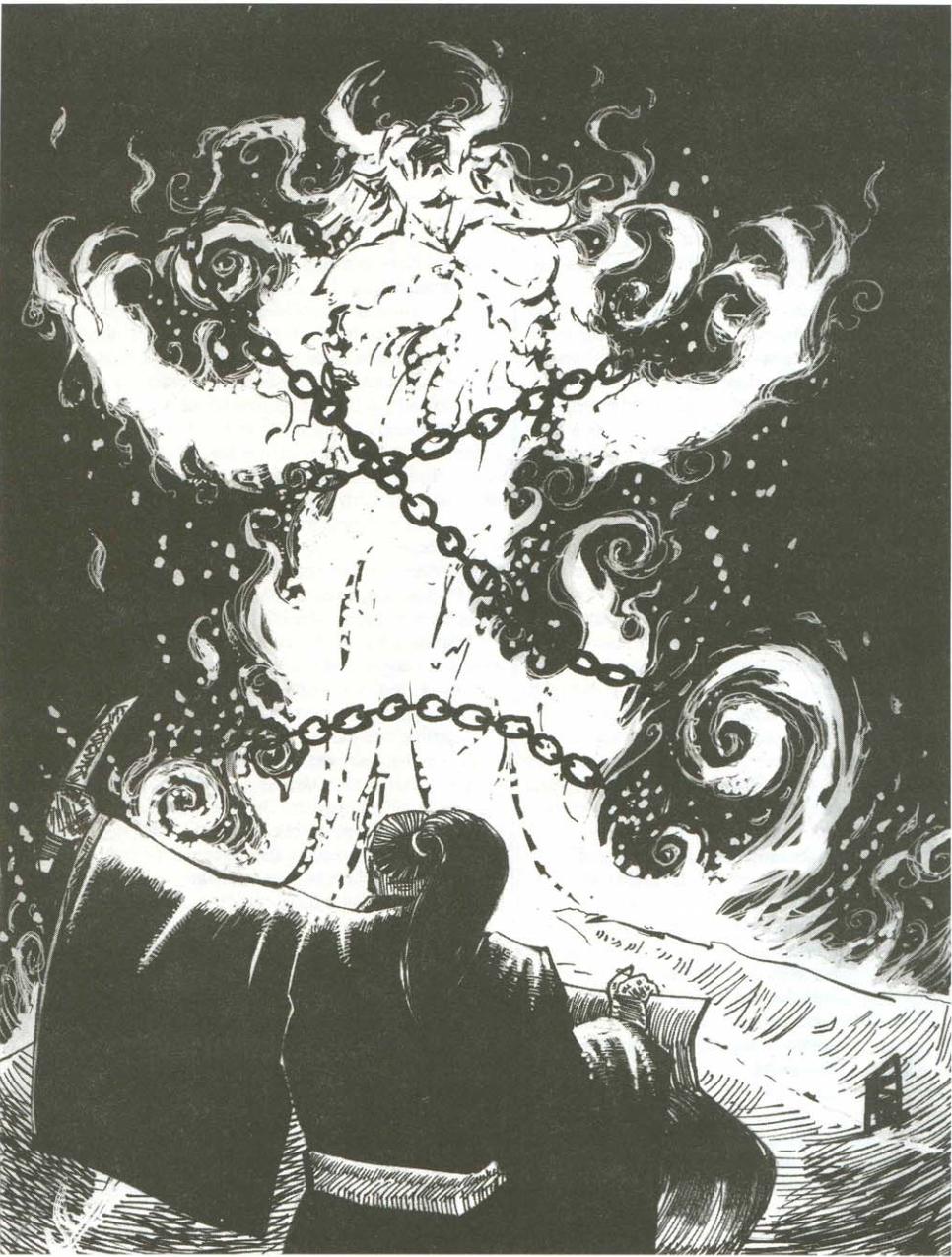
Forbidden Knowledge: Oni bowel movements.
Next: our pal, Isawa Ujina.
Way of the Phoenix: If you need to escape
Original SA post Legend of the Five Rings First EditionWay of the Phoenix: If you need to escape
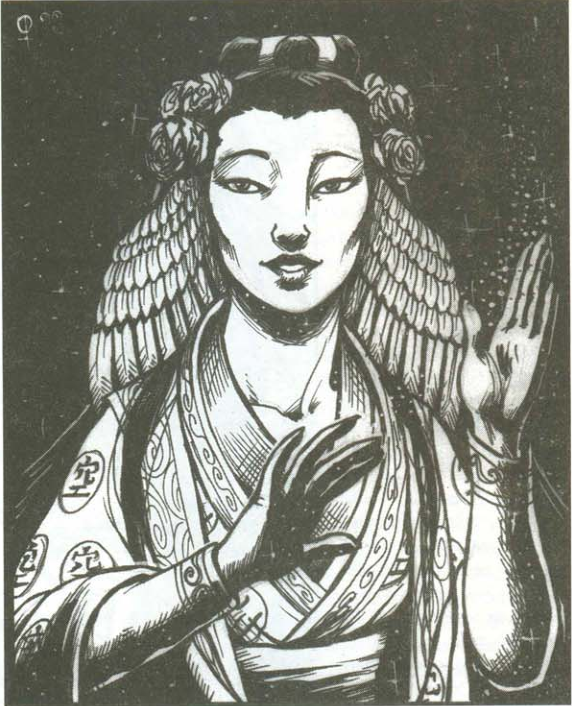
Toturi's waifu, at last!
Important NPCs! We start with Isawa Kaede. She is the Acolyte of Void, meaning she is in line to replace the Master of Void later on. She's a little over five feet tall but somehow seems taller. Her hair and eyes are black, and her skin a darker brown than most people in her family. As a child, her younger brothers called her "little shadow" until her father made them stop.
 Her mother, Doji Ninube, died in childbirth and as such she and her father have always been close. She demonstrated great affinity for Void magic since early childhood and there's never been any real doubt that she will become the next Master of Void after her father. She's also dedicated and diligent, and while she finds joy in the life that she can feel through Void she also understands the need of control over her ability. During an accident with her still untrained powers as a child, she ended up killing her pet rabbit while trying to make it feel a nearby brook to cool it off, and on her fourteenth birthday she was attacked by a maddened bear and only survived by infusing the beast with Void awareness. Much of her learning was finished that day. She's engaged to marry Akodo Toturi, daimyo of the Lion, though she has met him only briefly. Isawa Ishi 4, Chosen by the Oracle of Void and with the Great Destiny (Oracle of Void) so you know. Void! She also knows some Dragon Kagaku, apparently. And she knows all Void spells in this book "and a few more", aside from any corebook spell determined by the GM, focused on healing and nature. But she has the DARK SECRET of her birth!
Her mother, Doji Ninube, died in childbirth and as such she and her father have always been close. She demonstrated great affinity for Void magic since early childhood and there's never been any real doubt that she will become the next Master of Void after her father. She's also dedicated and diligent, and while she finds joy in the life that she can feel through Void she also understands the need of control over her ability. During an accident with her still untrained powers as a child, she ended up killing her pet rabbit while trying to make it feel a nearby brook to cool it off, and on her fourteenth birthday she was attacked by a maddened bear and only survived by infusing the beast with Void awareness. Much of her learning was finished that day. She's engaged to marry Akodo Toturi, daimyo of the Lion, though she has met him only briefly. Isawa Ishi 4, Chosen by the Oracle of Void and with the Great Destiny (Oracle of Void) so you know. Void! She also knows some Dragon Kagaku, apparently. And she knows all Void spells in this book "and a few more", aside from any corebook spell determined by the GM, focused on healing and nature. But she has the DARK SECRET of her birth!

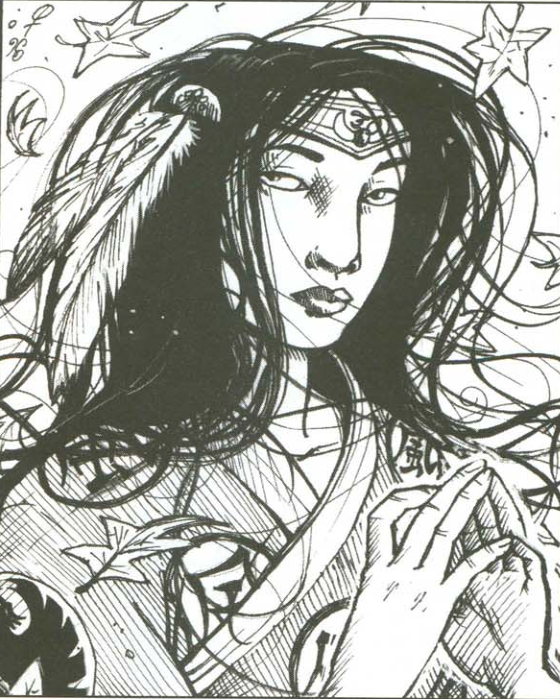
Dig the feather accessory. It's magic! Literally.
Isawa Uona is the youngest daughter of a rather mediocre shugenja in a minor Isawa family. When she was seven, she was sent to the Kakita Academy by her parents, hoping she did well enough to score a courtier position with the Crane. She showed true talent with the haiku, and the Crane were suitably impressed, but her career was cut short when she met the aged Asahina Tomo. The old master recognized the power dormant within the girl and had her brought to a ritual to awaken an Air kami within a fetish, but during the ritual the air spirits surrounded her and took her high above the ritual ground, whispering secrets to her. They released her gently and went to the north to inform the dying Master of Air, Isawa Eju, that his successor had been found. Reluctantly, Tomo and the Academy teachers released Uona and she returned to Phoenix lands for proper instruction. She has served for the last six years as Eju's assistant and apprentice, but his health has severely deteriorated and he can no longer move - rumors say he won't live for another season. Doubts arise in the council at Uona succeeding him with her youth an inexperience, and she is a little self conscious about her position but proud of her duties and fully believing she is the best person for the title. Isawa Tensai (Air) 3, very Wealthy and with Benten's Blessing, but also a Meddler suffering of Vanity and Overconfidence. She's got all Air spells and any spell the GM deems fit, focused on beauty and investigation.

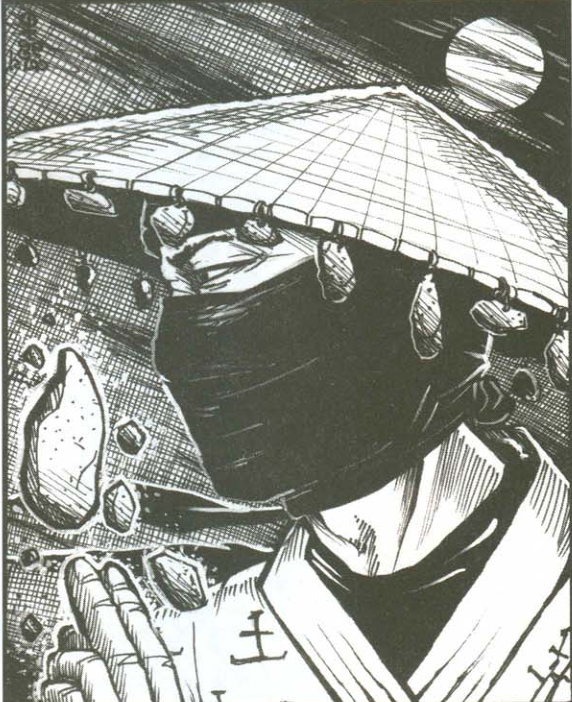
I wonder if he remembers our man Ginawa now.
Isawa Tadaka has seen more evil and danger than most Elemental Masters ever dream, and the source of more destruction against the Shadowlands than most Kuni even know. His hatred of the foul beasts is legendary and his family whispers of dark pacts and evil prophecies around him, the Master of Earth. Long centuries ago, his ancestor, Isawa Akuma, summoned and was destroyed by the most fearsome Oni ever known, who took his name and destroyed the Elemental Council. Tadaka has not forgotten this blasphemy and still seeks revenge for the slaughter of his ancestor, and his quest has led him into the darkest parts of the Shadowlands. His passion to discover new foul rituals and ways to fight Fu Leng's minions rivals the most fanatic Kuni, and has risked his life, mind and soul in his attempts. He was a quiet boy, overshadowed by his elder sister Kaede, though there were no hard feelings or jealousy between the two. In fact, they were both rather close, and regretted their parting when Tadaka went to study for a year in Crab lands, where he realized his calling when his ancestor came to him, gagged and silent but begging for his aid. He stayed with the Kuni for more time than expected until the Master of Earth himself, Isawa Rujo, went to pick him up foricbly, at which Tadaka challenged him to a magical duel where the loser would become ronin. Tadaka won, Rujo was banished for his arrogance, and the Elemental Council invited the young shugenja in. Some say the new Master of Earth is too 'close to his work' and that the mask he wears covers the first signs of Taint in his body. Isawa Tensai (Earth) 5, with an Earth of 7 (about as tough as Hida Yakamo) and all Earth spells plus any GM-set spells focused on jade and corruption. Also, Shadowlands Taint 0.2
 , Fascinated with Oni no Akuma and Driven to free his ancestor's soul.
, Fascinated with Oni no Akuma and Driven to free his ancestor's soul.
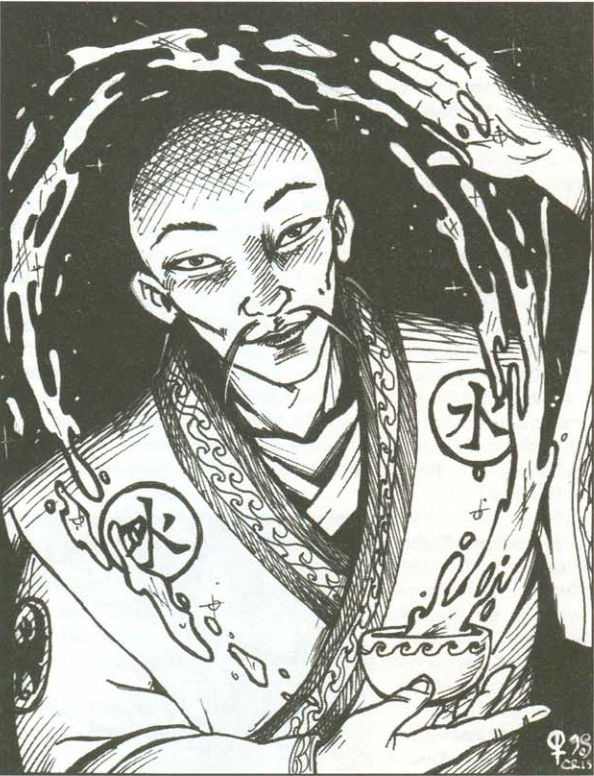
Baldy seems to be having fun.
Isawa Tomo just knew he had to walk the path of Water. He was always fascinated by the nearby Seikihi River, and for him the sea was the most awesome thing in the world - a body of water so great, no one could tell him what was on the other side! When they were children, Tomo and his older brother, Tadaka, decided to run off into the Shadowlands so their parents would never find them, as boys were wont to do
 They gave the slip to their older sister Kaede and evaded their father's patrols and spellcraft for two months. They had many adventures that summer, but ended up running afoul of bandits in Scorpion lands, and only escaped with the help of a boy named Shidachi. He traveled with them until they made it to the Scorpion heartland, where he turned them in to the Yogo who promptly sent them back to their parents. To regain favor with his father, Tomo declared his choice of Water years before such a choice was necessary. He still is filled with the joy of doing what he loves, and his childhood mischief has not dimmed with his madurity. All the same, he is very still in meditation and has a keen mind and natural ability with the Water kami. When the previous Master stepped down, she knew Tomo was ready for the post. And now, Yogo Shidachi, his old friend is coming to study at Kyuden Isawa, and Tomo is more than glad to pay the debt to the Scorpion that saved his life. Isawa Tensai (Air) 5, some ten-odd ranks short of Insight, with all Water spells and any GM-determined spells focused on deception and stealth, and an obligation to Yogo Shidachi.
They gave the slip to their older sister Kaede and evaded their father's patrols and spellcraft for two months. They had many adventures that summer, but ended up running afoul of bandits in Scorpion lands, and only escaped with the help of a boy named Shidachi. He traveled with them until they made it to the Scorpion heartland, where he turned them in to the Yogo who promptly sent them back to their parents. To regain favor with his father, Tomo declared his choice of Water years before such a choice was necessary. He still is filled with the joy of doing what he loves, and his childhood mischief has not dimmed with his madurity. All the same, he is very still in meditation and has a keen mind and natural ability with the Water kami. When the previous Master stepped down, she knew Tomo was ready for the post. And now, Yogo Shidachi, his old friend is coming to study at Kyuden Isawa, and Tomo is more than glad to pay the debt to the Scorpion that saved his life. Isawa Tensai (Air) 5, some ten-odd ranks short of Insight, with all Water spells and any GM-determined spells focused on deception and stealth, and an obligation to Yogo Shidachi.
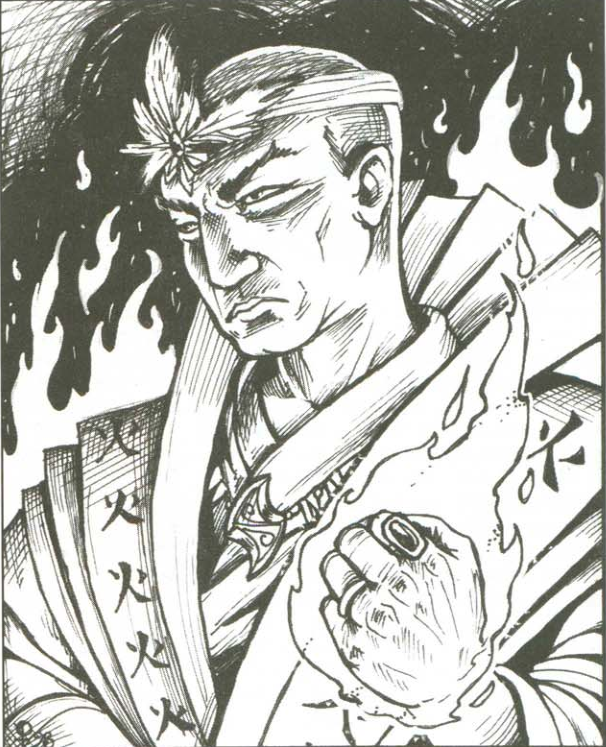
Yet to find something that he can't solve with judicious application of magic napalm.
Isawa Tsuke is the second most experienced Master in the Council and possibly the most powerful. He can certainly be considered the 'leader' of the Five. His magics can level buildings, destroy armies and slaughter those he feels 'unworthy', and while some call him malicious or vindictive he sees himself as an honorable tyrant, forced to lead because he is the only capable choice. His scorn for the other Masters is well hidden, and he considers their pacifism to be the simpering of weak minds. Their reluctance to use their powers is to him a sign of disloyalty to the Emperor and his line. He is a loyalist at the core and served in the Imperial Guard for many years before returning to lead the Council, so he has a broad grasp of political and military tactics. The Shiba aren't as confident in his leadership, afraid that he will break the convention of peace with his aggressive moves to patrol the Lion border. He has a reputation with the Clans and is not pretty: he is known for his dueling abilities and his tactic of slaughtering bandits one at a time with his spells while the troops kept them hemmed in. With the Council he deals in an extremely professional level and disputes are mediated with brutal efficiency, and only Isawa Kaede - a mere Acolyte - has ever chosen to question his will. This has not made her a friend of the Master of Fire, but any rivalry is completely one-sided on his part. Isawa Tensai (Fire) 5, with a Fire of 8 which means that he is chopping shit up something fierce, though his Water and Air are "only" 3. He's got the Higher Purpose of establishing the Phoenix as a power in the Empire and Tactician, as well as a very high Iaijutsu and Kenjutsu, but he is Brash, has Jealousy and has Blackmail: Akodo Kage at 5--- wait, isn't Blackmail an advantage?
 As can be assumed he has all Fire spells and any other spells focused on military application and destruction.
As can be assumed he has all Fire spells and any other spells focused on military application and destruction.
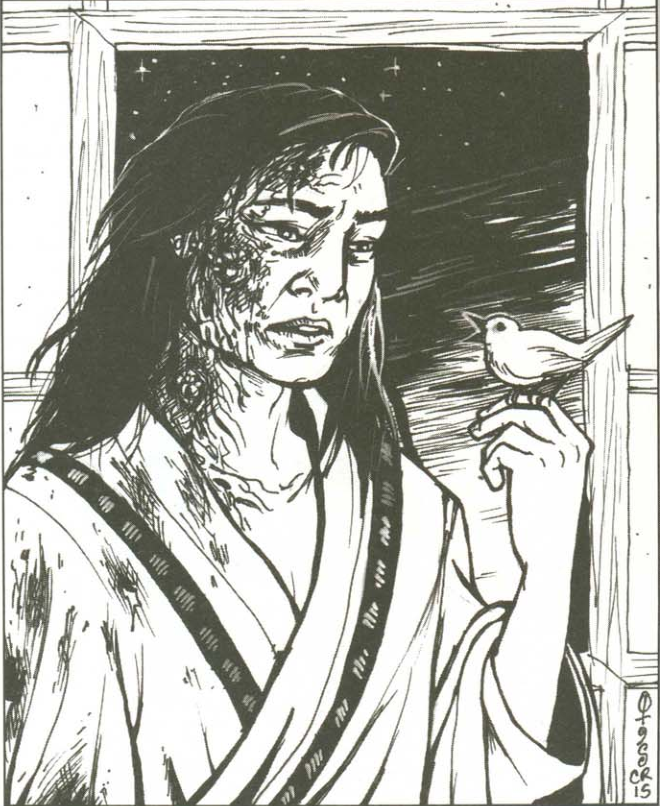
"Remember when I was the NPC leash in a terribly railroaded adventure, birdie? Good times."
When Isawa Ujina was born a pure white wren flew into the birthing chamber and circled three timesa round the bed where his mother laid. One of the midwives said it was a good omen, but her companion replied that the wren had the color of sorrow and that it heralded misfortune. Without a sound, his father cut down the woman with his sword, splashing her blood on the wren, and said that he would not tolerate the words of foolish women wishing harm upon his son. (That was definitely John there - casual abuse and murder of the lower classes is one of his Things.) The corpse was taken away and the matter never brought again. Ujina grew up to be tall and slender, agile and deft with the katana, though no one doubted that the sword would only be a pastime due to his obvious connection with the Void. When he was eight, the Master of Void came to visit his home, and Ujina approached him with the informal affection of a child to a grandfather: through their Void connection they were already familiar with each other, and Ujina's father was highly honored by the Master's request to train him. He returned to his parents' home at the age of nineteen, a quiet but friendly man with little use for formality with the servants when he could hear their blood flow the same as his own. At the age of twenty, he met Doji Ninube, daughter of a nearby Crane lord. Both were engaged to wed each other soon. Two months before the marriage, he sat in his garden while waiting for her to arrive, focusing on the sensations and smells, feeling her approach... and then the world lost its color, and around him time seemed to stand still. He could not even feel his own heart, and then the color itself began to bleed out of things. He felt a voice, both familiar and entirely alien call to him, before the world returned. Ninube did not arrive, and Ujina went out to find what happened, and at her parents' estate he met a Kitsuki investigator called Kaagi.
 After the events of Way of Shadow, he returned a much different man, his right arm lost and horribly scarred in face and body. Ninube nursed him through the worst of it, and once he was well enough they married in a small, private ceremony. After that, his father grew horribly ill, and though Ninube spent long hours keeping him company he grew worse and worse, and soon Ujina could not bear to see him as he felt the revulsion his father had both for himself and his son, both crippled and weak. The only company he could stand in time was that of Ninube and the Master of Void, who visited regularly but never stayed for long - Ninube always said he never liked her. Ujina just thought she didn't know him, but once he paid attention during a visit and noticed that his Master never let his eyes off Ninube. When questioned, the Master said that he did not know Ninube - he knew all pebbles rolling under the tide, each ant under the foundation of the castle, but not Ujina's wife. Did he? The next day, he left, and two months later Ninube was with child, but the Master would not come to Ujina's side. Five months later, during a mighty storm, she gave birth to her child: the blood-stained wren appeared on the birthing room's window, and as she entered the world Ujina felt something terribly, terribly wrong. He looked at the baby and realized that he did not know her, and neither did he know her mother. He looked at Ninube and saw the face of someone that he knew a long time ago, not one that he had seen every day for the last several years. Sending the baby downstairs, they started talking. Ujina asked her point blank if she killed his father, and Ninube said yes. He asked her if she had killed her bethrothed, and
it said yes. Her features started to slip at the edges. Ujina said he would destroy and forget the thing, but it just hissed that he could only destroy what he knew and undestrood. Something flew from her towards him, and barbs bit into Ujina's body, sending poison through his already mutilated right side. But the thing was wrong: he could destroy what he loved and he knew it now. He used his connection with the Void and unmade his wife, making her body fall apart. The wren was now whole and healthy, but standing in a pool of fresh blood. He limped downstairs, held his daughter in his hands and named her Kaede, and with that her eyes cleared and she gurgled a little like babies do. In the morning, his Master went to see him, and said that he was the Master of Void now. Ujina has raised his daughter well since that night: he remarried to one Isawa Ieku, who bore him Tadaka and Tomo. The poison still courses through his body, and he has to use his power to keep it from destroying his spirit, but his body is warped and changed from the effort. Isawa Ishiken 5, pretty much all Void spells ever, with Lost Limb and Lost Love.
After the events of Way of Shadow, he returned a much different man, his right arm lost and horribly scarred in face and body. Ninube nursed him through the worst of it, and once he was well enough they married in a small, private ceremony. After that, his father grew horribly ill, and though Ninube spent long hours keeping him company he grew worse and worse, and soon Ujina could not bear to see him as he felt the revulsion his father had both for himself and his son, both crippled and weak. The only company he could stand in time was that of Ninube and the Master of Void, who visited regularly but never stayed for long - Ninube always said he never liked her. Ujina just thought she didn't know him, but once he paid attention during a visit and noticed that his Master never let his eyes off Ninube. When questioned, the Master said that he did not know Ninube - he knew all pebbles rolling under the tide, each ant under the foundation of the castle, but not Ujina's wife. Did he? The next day, he left, and two months later Ninube was with child, but the Master would not come to Ujina's side. Five months later, during a mighty storm, she gave birth to her child: the blood-stained wren appeared on the birthing room's window, and as she entered the world Ujina felt something terribly, terribly wrong. He looked at the baby and realized that he did not know her, and neither did he know her mother. He looked at Ninube and saw the face of someone that he knew a long time ago, not one that he had seen every day for the last several years. Sending the baby downstairs, they started talking. Ujina asked her point blank if she killed his father, and Ninube said yes. He asked her if she had killed her bethrothed, and
it said yes. Her features started to slip at the edges. Ujina said he would destroy and forget the thing, but it just hissed that he could only destroy what he knew and undestrood. Something flew from her towards him, and barbs bit into Ujina's body, sending poison through his already mutilated right side. But the thing was wrong: he could destroy what he loved and he knew it now. He used his connection with the Void and unmade his wife, making her body fall apart. The wren was now whole and healthy, but standing in a pool of fresh blood. He limped downstairs, held his daughter in his hands and named her Kaede, and with that her eyes cleared and she gurgled a little like babies do. In the morning, his Master went to see him, and said that he was the Master of Void now. Ujina has raised his daughter well since that night: he remarried to one Isawa Ieku, who bore him Tadaka and Tomo. The poison still courses through his body, and he has to use his power to keep it from destroying his spirit, but his body is warped and changed from the effort. Isawa Ishiken 5, pretty much all Void spells ever, with Lost Limb and Lost Love.
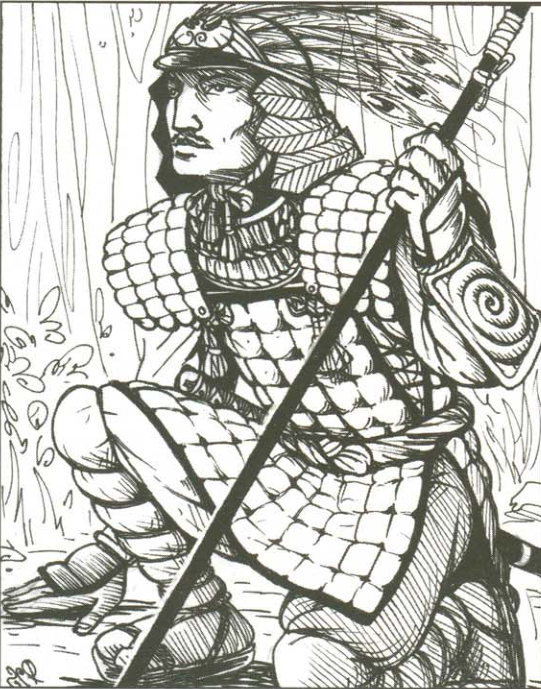
No greater love than the love between a man and his snow waifu.
Shiba Tetsu was a sour child, spoiled and unhappy. His parents were wealthy and acquired anything he wanted to assuage his boredom, but he was insufferable. Finally they decided to send him to train as a bushi, but he rebelled and ran into the Isawa woodlands. The experience would change his life forever: for days, he spoke of the 'snow maiden' he found there, and how beautiful she was. She had found him alone and crying under an oak tree and comforted him. With her encouragement, he learned that becoming a bushi was not a punishment, but a high honor and that service to the Clan was the greatest duty. When he returned, he was a changed child, bright and happy, and he excelled at the martial arts and made many friends. He spent his summers in the castle by the Isawa woodlands, seeking for his mysterious companion. He has never found her but he swears that she watches him, and he is confident that one day will find her again. Some say that he will be the next Champion, but Ujimitsu only says that his destiny is somewhere other than being the head of the Clan, which courtiers take as jealousy on the daimyo's part. Tetsu himself doesn't care about the rumors: he just wants to serve his Clan, find the snow maiden, and be the very best bushi like no one ever was. Shiba Bushi 2, with Great Destiny and True Love: Yuki no Onna. He's also Small and Gullible.

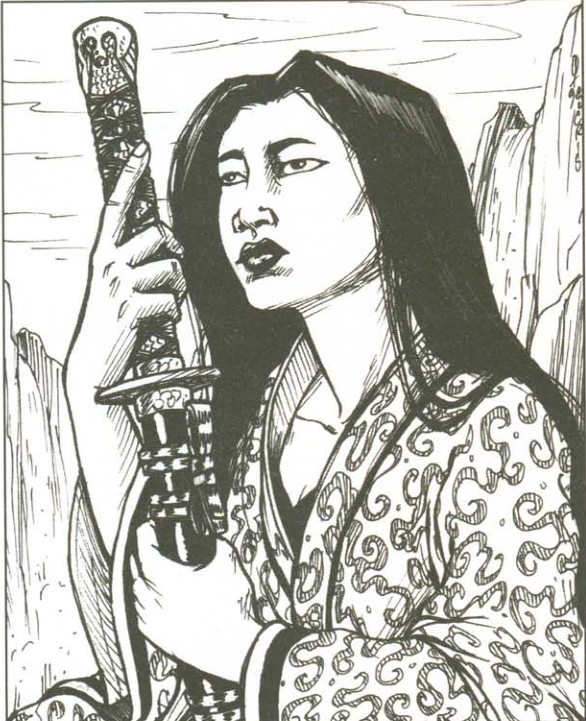
Ah, Tadaka-san...
Shiba Tsukune knew all her life what she wanted. She was the second child to a wealthy Shiba landholder, and though many thought she would live in the shadow of her older brother, Norihatsu, nothing of the sort happened: they were like twins separated at birth. As a favor to the Shiba daimyo her father sent her to the Akodo War College, where she was in constant touch with her brother through letter. Her father didn't need a Kitsu to tell him that his children shared a kharmic bond and rejoiced in the glory that they would bring to his house, but unfortunately Norihatsu suffered a riding accident on his way home from the Shiba school and broke his neck. Tsukune, training with Akodo Kage miles away in the War College, felt the loss instantly. The Elemental Masters themselves could do little for the girl, and a Kitsu shugenja told her father that Tsukune had been cut off from half her soul, and would not recover until healed. She spent a summer locked in her room, and decided to stay and train with the Shiba instead of returning to the Akodo. She devoted every waking hour to her bugei skills, making little friends other than her cousin Isawa Uona and a young Kitsu studying with her at the Isawa school. She went to the Mirumoto and came back with "Rhythm and Timing" tattooed across her shoulders, and gained the nickname 'Little Turtle' from her teachers for her cold and stoic demeanor in combat. A day before her gempukku, she was told she would serve as yojimbo to Isawa Tadaka, one of the most promising shugenja in Rokugan. When they were introduced to each other, her heart melted, and she felt things she had not felt in a decade. Three months have passed since then, and she is not able to keep him from her thoughts. She can't say how or why, but she knows she is bound to Tadaka just as she was bound to her brother. However, she remembers how she almost died when her brother died, and fears that one day will feel the same pain and not be able to survive Tadaka's journeys into the Shadowlands. Multiple School Akodo Bushi 2 / Shiba Bushi 3, way low on Insight for her effective Rank 5. She has True Love for Isawa Tadaka but Lost Love for Shiba Norihatsu.
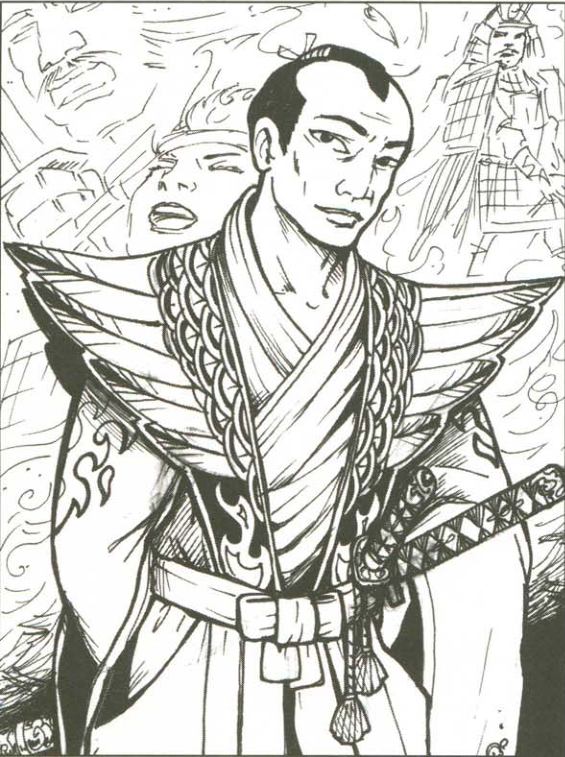
Matsu Hokitare's long lost brother.
Shiba Ujimitsu is the leader of the Shiba family and Clan Champion. On one hand he represents everything that a Phoenix Champion should be - wise, thoughtful, well-versed in bushido and dedicated to the Clan's defense - but on the other he is far more than what his appearance suggests. There was nothing overly remarkable about him when growing up. He listened to what he was told and rarely spoke back to his elders, performing well but never excelled at anything. He had an uneventful gempukku and took his post in the Phoenix borders along with dozens of other Shiba graduates. He was on patrol with his unit along the coastline one morning when the previous Champion died: Ujimitsu fell off his horse into the surf as the souls of his ancestors flowed into him, speaking in strange tongues and begging to 'his mother', the Sun, to forgive him for his failures. The Crane allies along with the patrol thought he had gone mad, but his gunso recognized the signs and as soon as he was well enough Ujimitsu was dispatched to the Shiba family palace to confirm his status. He formally took office soon after. All of it took him by surprise, as he only expected to be a yojimbo for some shugenja instead of leader of the entire Clan. In the next few days he felt he was losing himself in the cacophony of the voices of his head, coming dangerously close to irretrievable madness but Isawa Ujina and the other Masters helped him regain his equilibrium with meditation techniques and instructions. Since then, he has performed above expectations and brought a new sense of honor to his Clan. The Shiba troops are sharper now, and while the Phoenix military is still small it's no longer object of ridicule. He had a family once, but lost it some time ago when his wife committed seppuku over a matter of honor and he was forced to kill his own little daughter when she cursed the souls of the Hantei in front of the very Emperor. Only those present at the time know about it, no one talks about the matter and asking Ujimitsu about his family is tantamount to suicide. There are strange stories about Ujimitsu claiming that he moves with uncanny speed and defies the laws of nature and reality at will, with reliable reports of his presence in places hundreds of miles apart within the same hour on the same day, which Ujimitsu publicly claims to be outlandish stories though those close to him say that he enjoys the mystique and plays them up. Whether there's truth to them or not, only the Champion can say. Shiba Bushi 5, with the unique Soul of the Kami advantage that gives him the skills and knowledge of all of his ancestors, as well as having all the Shiba ancestors as an advantage. He has a Water Ring of 5 but only a Strength of 3, which is deliberate as he was weakened by an incident that is described in Winter Court: Kyuden Seppun.
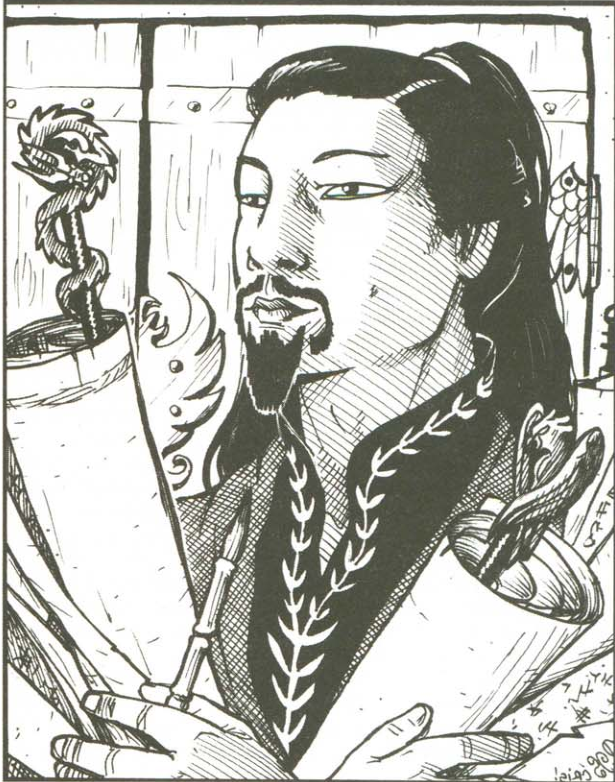
He's the best! Around!
Asako Togama was a young prodigy of the family. During his apprenticeship his master thought of teaching him humility by giving him as homework the task of translating several archaic pictographs into modern Rokuganese, including one that he had made up on the spot. Togama looked at him, left the room and returned hours later with a two hundred years old tax receipt with a character that matched exactly. He has always been precocious but that hasn't stopped him from being one of the most well-loved people in the Asako family, and he is welcomed at every court in the land for his studies and dry wit. He has traveled as far south as Kyuden Doji and to the wicked Ryoko Owari of the Scorpion in the west. Scorpion, Unicorn, Lion and Crane welcome him with open arms and though the Dragon have made no overtures of friendship Togama is certain that he'll receive an invitation to their libraries one day, and that will be his greatest feat. Recently he has become embroiled in some political trouble, though: on researching some ancient documents found beneath Otosan Uchi and the history of the Imperial line, it became known that he had found the true name of Iuchiban, but the original documents were destroyed before he could bring them to court. He didn't seem to mind the failure much, though when the subject is brought up he only asks why his work was so carefully unwritten, if it was a lie. For now he stays in the Asako palace, traveling among the Isawa and Shiba libraries, and is always willing to spend time discussing his favorite work with those who listen. Asako Henshin 2 (Air, Water), with Fascination with Iuchiban and Forbidden Knowledge (the true name of Iuchiban!)
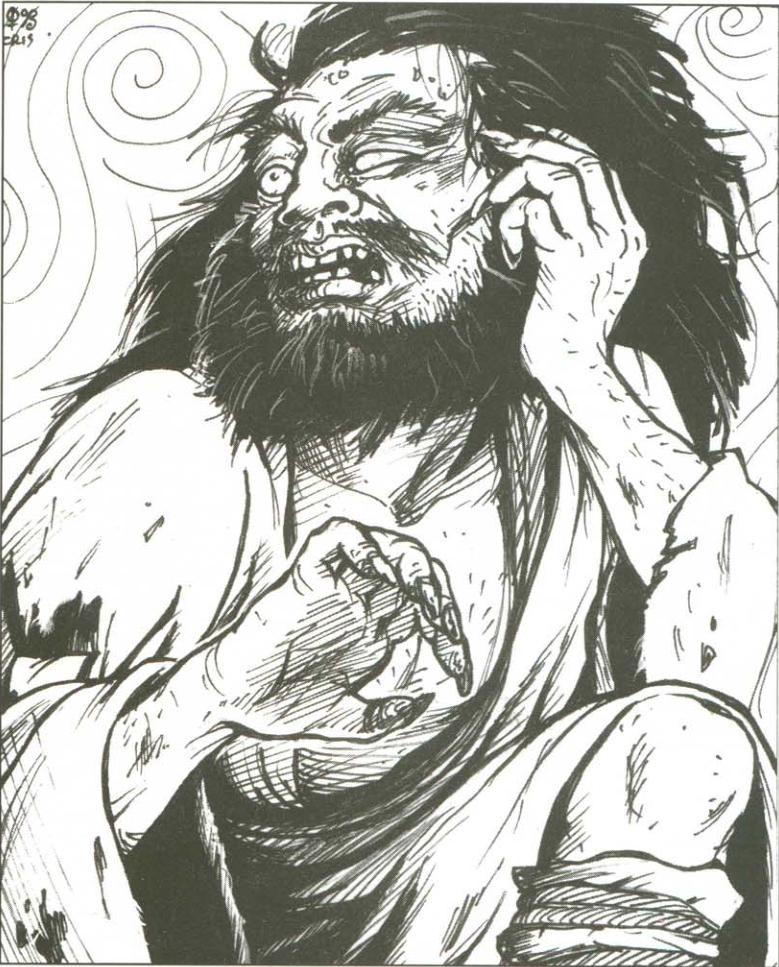
Man's seen some shit.
Asako Oyo was born one hundred and forty-two years ago to a caretaker of the Isawa library in Gisei Toshi. His mother died in childbirth and he was taken in by the small community, and he grew exposed to the stories the Asako read to him every night. His mind was extraordinary and he consumed thousands of words a day from the library's texts, but he never seemed content, always looking out the windows as if knowledge was not enough for him. When he started growing bored of the Asako mind games and puzzles they decided to train him as a henshin, but the Isawa would not let any Asako leave the library before retirement, so they decided to smuggle him out with the monks that delivered food and supplies. The ruse succeeded and he arrived to Shiro Asako alone, proudly announcing his heritage and right to attend. Over the years he exhibited unprecedented acumen with the henshin techniques, and the masters were often shocked by his depth of knowledge that was far beyond that of a student of his level. When he reached the fourth rank of training, the Fushihai analyzed his progress and with fear they realized he was progressing too fat, and they did not know what would happen to someone walking the Path of Man prematurely. They made the decision to stop his studies and assign him to the Michibiku until they were assured he was ready, but they didn't take his genius intellect into account. He put pieces together over the next couple of decades, and only years before he would have joined the Asako monks he put the final piece of the puzzle together and he managed the incredible feat of slipping into the final rank without a sensei. New vistas of comprehension opened in his mind, and he knew the Path that he was traveling... but to where? What was he striving for? What great secret plagued his spirit, and once released, where would it go? This and many other questions plagued him to the point that he recognized that insanity was only a thought away. He returned to Shiro Asako and begged for the Masters' counsel, who realized their horrible mistake - they had given him the tools to continue the Path on his own without guidance. For the next thirty years they tried to correct this mistake with deep metditative trances and intensive spiritual journeys, which were only the beginning of his suffering. They rescued his spirit, but he was no longer the Oyo they knew: he was distraught and pained, one of his eyes had gone stark white, and he spent entire weeks shivering from the things he had seen. Clarity only worsened his state, as in those moments he spoke of the future, a time when the Clans would wage war with each other, when the Dark One would return and when a darkness would sweep the land. For almost one hundred years the Fushihai and their assistants guided Oyo down the path, as his ramblings became more coherent and he spoke less and less of what he had seen, and it was determined that his visions were becoming less distant, as if he were approaching a pivotal moment in time. Two years ago, he escaped, and now he wanders the countryside, alternating between the present and minutes ahead of himself while the henshin search for him. He stumbles across the Empire, warning to anyone that listens not to trust the Asako - they are not ready. Asako Henshin 5 (Water, Fire, Earth, Air, Void) with super low Insight but with superhuman Perception and Awareness, with the Higher Purpose of warning of the henshin dangers, a Missing Eye, Enlightened Madness and Forbidden Knowledge. But wait, doesn't Phoenix Enlightened Madness need spells to trigger from? Henshin aren't shugenja, dangit book you told me this.
Sample PCs!
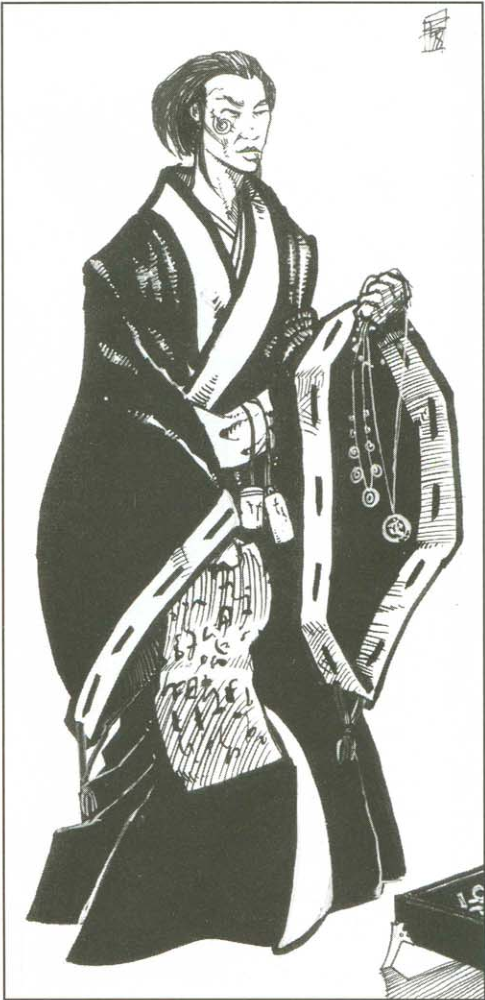
I hope those aren't anal beads, Isawa-san

When the Isawa Fetish Collector was born, a man in a battered hakama arrived at the house and told his family he just needed a place to sleep for the night. Upon seeing the baby PC and as thanks, he gave his parents a sealed scroll case to be opened at his gempukku and then went away. Fourteen years later the PC opened it, and that night he ignored his other gifts, focused on reading the scroll. He was never the same again, and his parents claimed that he was less caring of others and worried at his wanderlust, thinking he was becoming corrupted by a fascination with objects - particularly tsangusuri and other magic trinkets. Days after he read the scroll, a voice started talking in his head, knowing his heart's longing and promising to fulfill it if he would come to take it away. In visions the voice guided him to a shrine, where he found an old spice shaker, and then a new voice promised that it was a powerful item that would grant him immeasurable magic if he would follow it with another location. With each new item his powers grew, but also something inside his soul. Now he is besieged by a growing hatred, as if something is trying to break free from his body, and every time he follows a voice something terrible happens and something dies. He has learned too much to turn back now: will he accept the great power the voices offer, sacrificing everything and everyone he cares about, or seek a way to silence them and finish this monstruous magic? Isawa Shugenja with an Air focus, has a wakizashi and is not afraid to use it! (Kenjutsu 1
 )
)
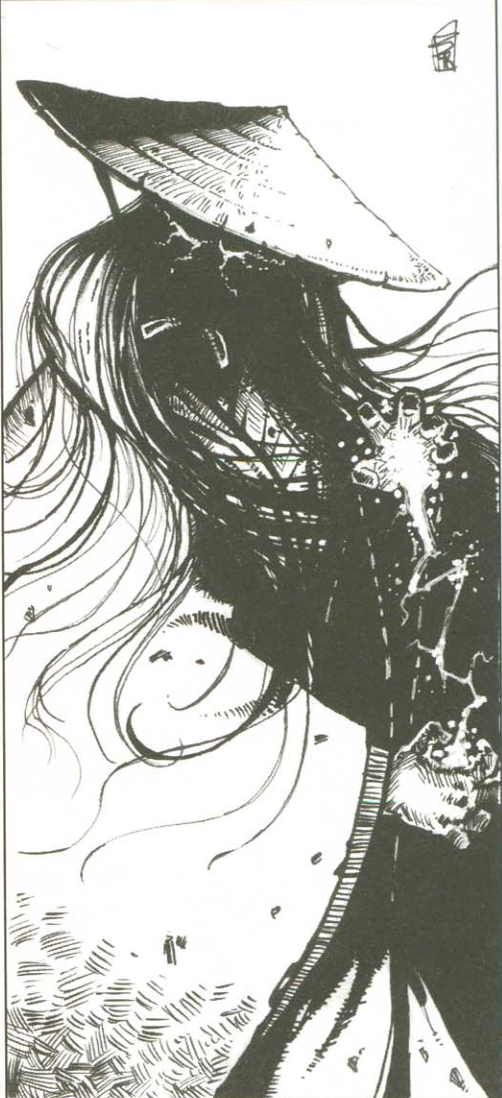
He looks like he were making an angry face.
The Amnesiac Ishi doesn't remember his name, where he was born, his parents or friends or what he was doing that ended up with him in a riverbed one week ago covered in moss and steaming blood. All that he knows is that he's a shugenja, a Void mage. He has no sensei but thinks he did before the accident, and he can almost remember a face, someone protecting him and holding him back, guiding him home when he ventured too far into the realm. He remembers a battlefield - no, maybe a battle erupted around him, a tower where everyone was his friend and he could trust them until the locusts came and destroyed everything, taking his master and someone else away. He also remembers more and more the face of a young and sturdy warrior that helped and protected him, but he can't remember where he is or whether he still lives. Somewhere there must be someone that can tell him who he is and what he was doing that caused his tragedy. Trying to find the trail through the aether is too much, too many things to look at, listen and understand. He can almost hear someone calling his name and wishes he could give in and float away, but what would become of him? He could commit seppuku now while he is still in control of what's left of his mind, but what would that accomplish? Void shugenja with a Void-triggered Enlightened Madness, that's bound to go swimmingly in a party.
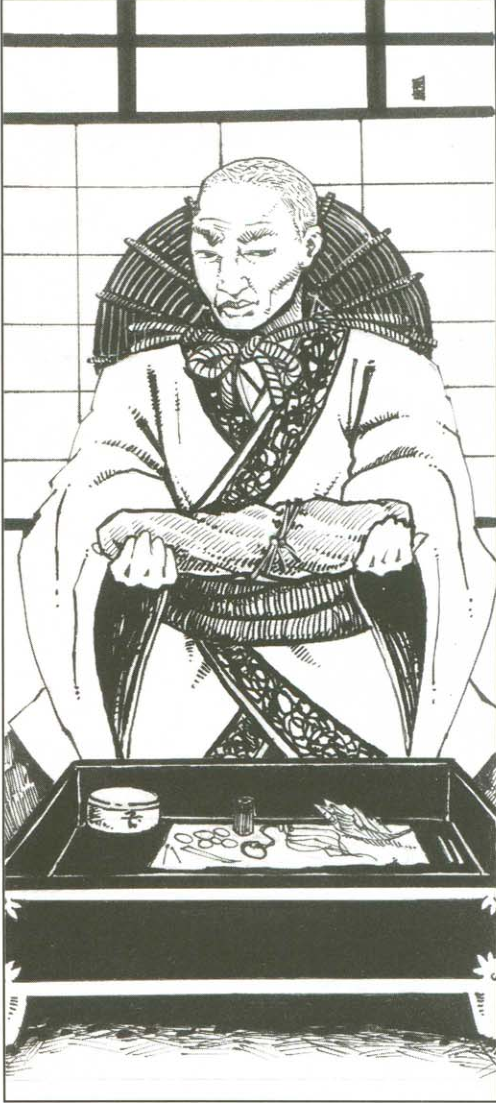
The mystic art of travel case packing.
The Asako Michibiku was born with the Dragon, spending his youth in their lofty peaks and peaceful monasteries, but one day an Asako Fushihai came to him. He did not understand then, and did not believe the Master when he told him that he had lived to four hundred years old in his previous life and had been nearly immortal before being struck down by a villainous Isawa. He believes now, the Path of Man has been revealed and his soul remembers more and more of it with each day. They say he is destined for 'glorious ascension' and the things that he can accomplish even without training must be proof of the Asako's claims, but he realizes there are flaws in the scheme. How come such an established Asako wasn't reborn in the family? Wouldn't the Path prevent such mistakes? And if it does, what did he do that caused his errant rebirth? Sometimes when walking the Path he senses others nearby, but that is impossible - his Fushihai told him that everyone must walk the Path alone. Is he sure who he is? Asako Michibiku, with the Riddle of Air and all Rings at 2, as well as a load of skills at 1 and 2, including some Dragon-only stuff like Ichi-miru or Nazodo. Also, a Dark Secret of the GM's choice and a Nemesis!
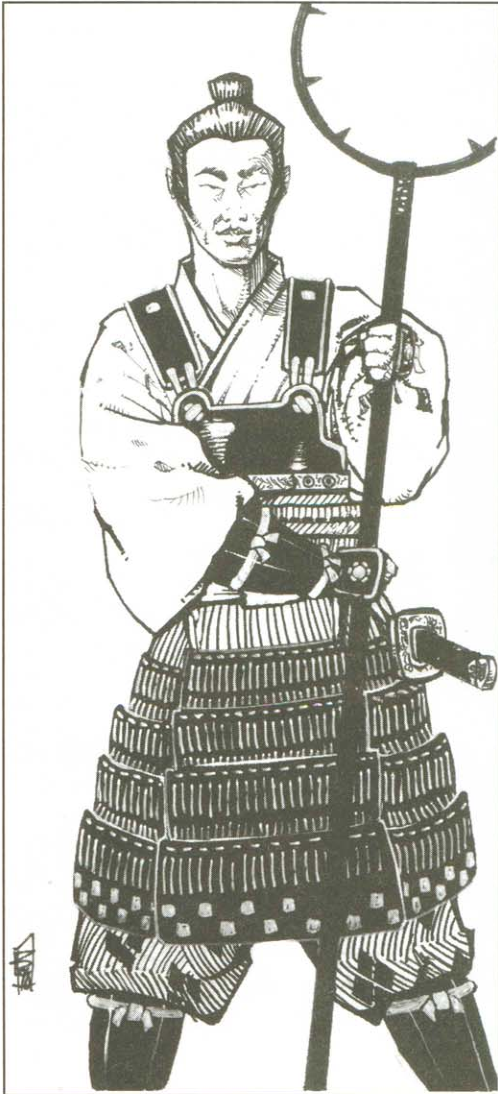
That's a sasumata, a man-catcher.
The Shamed Yojimbo failed his duty. He was tasked to protect one Isawa shugenja, but now he is gone and the yojimbo is shamed for his loss. The shugenja is thought dead, destroyed when his Ishiken was killed during an attack on his stronghold, but the PC knows better - he is alive, though he has no idea where he is. All that he remembers of the last hours he spent with him was that the Ishiken was working on a special session where the "gates of Amaterasu's throneroom would be cast open and the future of the world laid out like a roadmap." He remembers a battlefield, a great battlefield where he was the only defense against the invaders, and a field of locusts descending on the Ishiken's tower, desiring the secrets that the Void Master knew of the next world. The enemies forced him back into the meditation room, where the mages were locked in a deep trance, and as they overwhelmed him and struck down the Ishiken, his charge - his friend vanished in a violent release of energy. Since that day, he has felt him. Not here, not near, but he is alive. A mon recovered from the raiders revealed that they were Moto - but for what purpose would they attack the Phoenix so savagely? Could it have anything to do with the spell that took his friend? The Shiba have called for his seppuku but he can't give up. He must be out there somewhere, and even though some in his own family call him ronin for his disobedience, he can't allow himself to listen. He must be true to his vow. Shiba Bushi, reasonable stats but average Reflexes, trained in kenjutsu and yarijitsu. Also, a Kharmic Tie to the shugenja and Bad Reputation for having lost him.
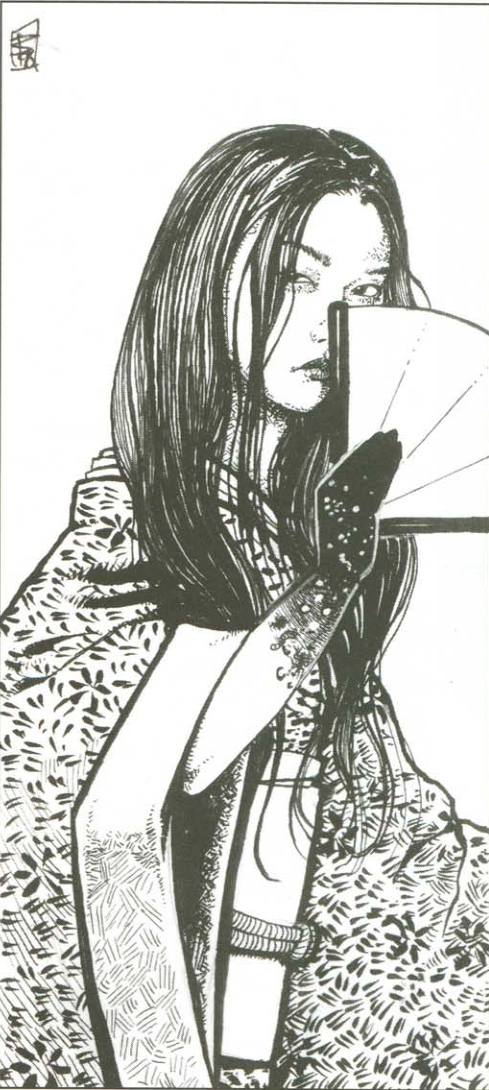
That's some Kirby shit.
For the Corrupted Henshin, she thinks it started with her father but she can't be sure. She doesn't remember much about her parents, having been taken in while very young to study with the Fushihai. She was told that her father had been killed before birth and that her mother had slipped into madness as a result, and was now in the care of a local minor daimyo. Years of preparation with the Asako all but erased the shadows of her past until one year ago she noticed a rash on her hand. Within weeks, her skin became rough and dark. The Asako healers could do nothing against the infection and soon they were rumors of Taint, but neither Kuni nor Kitsuki brought in to study the phenomenon could identify it. Furthermore, she grew stronger, as if the dark patch provided her with new strength. Then, the flashes began: images of things to come, half-remembered scenes of the future, a time when the darkness would spread across all of her and swallow her in its cold embrace. If the Asako were ever to discover what she is becoming, she would be doomed to die, never knowing about her father and what he passed on to her, so she fled. She's since heard that the Asako were hunting her, and on a visit to her mother she could only make out one word: Shosuro.
 Asako Henshin with the Riddle of Fire, but for some reason Earth is her strongest Ring. She's got Precognition as an Inner Gift and a Major Ally in the daimyo that takes care of her mother, but she is a Black Sheep and she also has the Taint - come on guys, the Shadow and the Taint aren't the same thing.
Asako Henshin with the Riddle of Fire, but for some reason Earth is her strongest Ring. She's got Precognition as an Inner Gift and a Major Ally in the daimyo that takes care of her mother, but she is a Black Sheep and she also has the Taint - come on guys, the Shadow and the Taint aren't the same thing.
Ancestors! Isawa Akuma sought to discover the secrets of identity, and in his studies he discovered that his goal would be found away from the Empire. Despite the Crab's warnings he ventured into the Shadowlands never to be seen again. Ironically, the Oni he summoned in his quest for identity stripped him of the thing that he had been seeking all these years. For 3 points, characters gain their Void in Free Raises to combat Oni, but they are also born into the lowest social climates (3-point Social Disadvantage) due to his fall. Which makes no sense with Isawa Tadaka since he's the son of the Master of Void and has Akuma as an ancestor. Naka Kaeteru was the first Grand Master of all the Elements. He was born to a humble family and took it upon himself to see the world, wandering Rokugan and learning from everything. He came upon a monk and asked what he was doing: "Thinking", he said, and Kaeteru joined him in "thinking." He gathered many followers in his meditation, and the Phoenix took him and his teachings into their Clan, calling him their Spiritual Guide. To this day, he is revered both by Shinsei monks and the Asako. For 14 points (!) a shugenja is considered to have a Void two ranks higher than it is and may always add two additional dice for meditating or helping others meditate, but if the PC's Honor is reduced to 1 or less Kaeteru will abandon them forever. Isawa Ijime was born into a large and uncaring family, the youngest daughter among many older boys who bullied her relentlessly. She escpaed into imaginary places to retreat from the world, and at the age of 8 she discovered she could make the images manifest but hid her ability fearing more scorn from her family. Her powers activated unwillingly when a magistrate was visiting, and he took her to the Isawa even though she was well beyond the age of training. The Isawa simply expected her to catch up normally. At the age of 16, finally prepared for her gempukku, she died of a rupture in her head with a snarl of anger and abuse in her face. The Phoenix burned her body with honor, never understanding her magic. A disadvantage ancestor, foe 3 points PCs see all contested rolls having their TN increased in 5, all social rolls having their TN incresed in 10, Void considered 1 lower for purposes of dueling and all meditation attempts done with a TN of 40, but at least they get one die bonus to all skills involving puzzles and investigations. Just three points for all of that? Isawa Takao was an amazing Master of Fire, far exceeding the expectations of his sensei during training and deciding the fate of the Isawa at the age of 21. The other Masters thought his methods rash but his station afforded him some leeway. At the age of 24, he sought to challenge the Oracle of Fire to see who was the strongest. When the time came, a great tower of fire rose from the earth, and Takao watched it dance - then he stepped forward into it and was instantly consumed by the flame. For 2 points characters get one extra die when casting fire spells but are also assumed to have the Brash disadvantage. If they already have it, the TN for all Honor tests is 25. Shiba Toriiko had the Oracle of the Wind as her aunt. As a little girl, she asked her aunt to do a trick, and the Oracle saw her future and her expression soured. To know the future is to deny hope, she said, but Toriiko solemnly replied that there's always hope for peace. She died defending it. For 1 point, characters are always eligible for the Kharma Rule when dying in the name of peace, thus making her the most worthless ancestor that isn't a Disadvantage. Shiba Kaigen stood at a critical moment of history, guarding a mountain pass when a Lion force sought to invade Phoenix lands. He and his men held against the superior Lion forces with unorthodox strategy and the power of the kami while a message was sent to the Isawa. Without his sacrifice, the whole Clan could have fallen. Only bushi may take him as an ancestor: for 2 points, if a shugenja within 10 feet of the character spends a Void point they gain an extra action for the round, that cannot be an attack. Asako is Asako. For 4 points, she gives a 6-point True Friend, but they also inherit her son's anger in the form of the Brash disadvantage, and if the PC is ever betrayed by someone they will be Driven to their downfall. Asako Ingen was a pioneer in the research of the Gift. He was convinced that the Riddles were only the beginning and sought to unravel the puzzle. At the end of his life he finally managed to lay down the groundwork for the modern view of the Path, but old age claimed him before it could be fully realized. His last words were reportedly "I would be as a god!", and in the 800 years since his death many other great Asako thinkers and scholars of the Gift have died with the same words on their lips, on the verge of a great discovery before unexpected death takes them. For 5 points, characters are considered to be 1 School Rank higher for Riddles, which makes Ingen a must for any henshin. Asako Hanasaku discovered much of what now fills the Asako libraries by the expedient and outrageous method of trying pretty much anything on himself. From poisons to fish, plants to inks, he rubbed, scraped, snorted and otherwise consumed all that he could find to understand its properties. He ended up killing himself with the Jin-Hana Saku poison after completing his research on it. For 4 points, the PC is afflicted by unquenchable curiosity (TN 20 Willpower roll to avoid trying out something new) but they get a free rank on all rolls involving Medicine, Poison, Herbalism and any Lore involving strange events and information. Kitsu Taiko was born to an unremarkable peasant family, a strong child that learned to walk before his peers could crawl. When he was very young, his house was assaulted by brigands that killed his family and sought to sell him into slavery, but he somehow called the spirits of long-dead fires to counterattack. The Kitsu that found the boy claimed they had been led to him by the spirit of a fire-like, lion-maned beast. They took him into their school at the age of 4, where he showed great affinity for Fire and grew to prominence as one of the most deadly shugenja in the Empire. Though the Isawa deny it, the Ikoma records are clear: when he retired from the Emperor's service he was invited to the Elemental Council as the Master of Fire. Both Lion and Phoenix shugenja can take Taiko as their ancestor, and for 7 points they choose one element and are considered to be well-loved by the kami of that element (Sense, Commune and Summon spells are met with friendship, the character rolls and keeps one extra die for casting rolls)
Next: meet the Oracles!
Way of the Phoenix: Oh you wonder why
Original SA post Legend of the Five Rings First EditionWay of the Phoenix: Oh you wonder why
Alien Rope Burn posted:
Ah, I see you have the errata'd later printing of the book. In the original 1st printing, Asako Ingen was 5 points, made you considered 1 School Rank higher when using riddles, and... gave a flat 20% bonus to insight. That's right, for 5 points you would be... oh... an effective Rank 3 Asako Henshin to start. At least.
And somebody nodded and said "That sounds fine." and let it go to print.
(20%+ insight? holyyyyy)
Back to your irregularly scheduled L5R writeup!
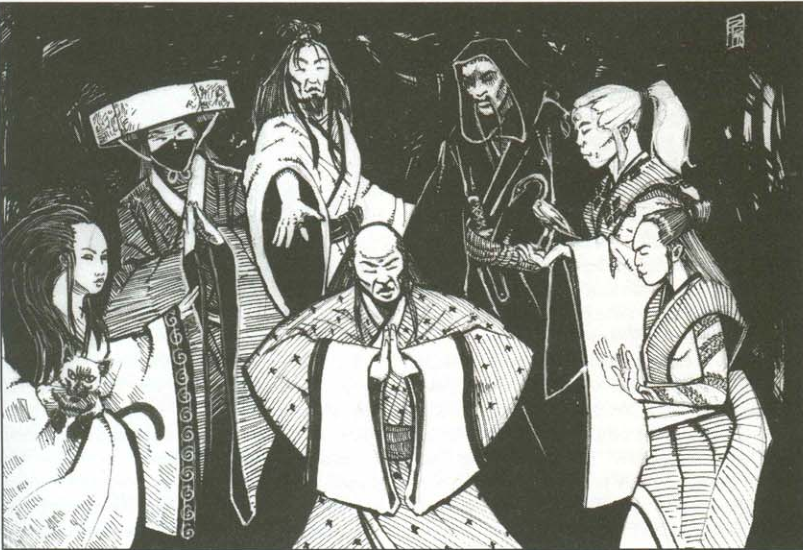
Cat is like "fuck these wizard weirdos."
We're now in the miscellaneous part of the book. First, the Oracles. We've heard of these before, but what are they? Legend has it that they were created when the Kami descended to the Earth, but there's also legends of other inhabitants before the coming of humans, like the Naga or the dragons. Phoenix studies say that the lands of the dragons (also the heavens where Lady Sun and Lord Moon live) are a vast paradise where othey mythical creatures like the Ki-Rin live. The dragons were fascinated by humanity and offered gifts to some of them, even taking them to their enchanted realm, but Lady Sun and Lord Moon grew jealous of their attention and ended up lifting the Heavens away from Rokugan's firmament. The dragons were forced to choose between taking away those mortals they loved or remaining in the earth as mortals. They instead left parts of themselves behind, choosing each one individual to serve as their voice in this world. These are the Oracles: chosen to bear part of a dragon's soul, with the gift of sight into the Celestial Heavens and thus oracular power. Even Shinsei himself is said to have sought the Oracle of Earth in defense of the Empire. However, there is still an argument on the existence of the Dark Oracles, shadow counterparts of the Oracles of Light. Not much is known about these, except that they have a connection to their Light opposite and delight in tormenting each other.
There's little information on how Oracles designate their successors. It appears that they forget any previous mortal existence, though there are records of people recognizing one of the Oracles as a long-lost family member. Whether this amnesia is the result of spiritual enlightenment or something else is unknown, but what is known is that the Oracles no longer maintain contact with the human world except as bringers of prophecy. Each one seems to live far beyond mortal lifetimes, with consistent records of an Oracle's description stretching for up to five hundred years. It is certain, however, that they retain the knowledge of their previous Oracle incarnations throughout each succession. They are absurdly powerful physically and spiritually, and their only real limitation is their genuine disinterest in affecting the governance of the Empire. They trade their knowledge of the future for stories of intrigue, war and heroism, and can rarely be found outside their hideaways. It's not unusual for an entire generation to go without an Oracle's contact. They aren't motivated by wrath or by compassion, but one Isawa researcher wrote that he saw an Oracle unmake an Unicorn hunter for claiming he would hunt down dragons for sport, to the point that the hunter's family did not remember his existence, and not even the researcher could remember his name. The homes of the Oracles change as much as them: Isawa Kaede visited the Oracle of Air in a flying palace that moved with the clouds, the Oracle of Fire lives inside the Mountain of Sleeping Thunder in lava, the Oracle of Water lives in a sleeping Naga city, the Oracle of Earth lives in a tall tower in the Twilight Mountains and the Oracle of Void (if it exists at all, there are no records of it for the last 300 years) is thought to live in Jigoku or in the border between this world or the other.
Sidetracking to Isawa's Last Wish! Remember how Asako's son, Sagoten, was to marry Isawa's daughter Akiko? And how a great magical work was being made as their wedding gift? This was Isawa's Last Wish, said to be the greatest supernatural achievement of all time, and the few who have seen it can only say that it is the closest thing to perfection they've ever witnessed. It can take any form depending on the disposition of the viewer. Now, when the Isawa and Asako split, the Emperor Hantei declared the marriage between Sagoten and Akiko void, and that neither family was worthy of Isawa's last wish. The uncompleted item was hidden in a small shrine in the Isawa mountains, and for a time this was enough until the Isawa and the Asako began feuding on who would control the shrine. Both families agreed that the unfinished artifact was dangerous, but Hantei was angered by the petty squabbling and ended up giving the Shiba the role of protectors of the shrine. But a few months ago, reports made reference to 'strange occurrences' involving the item (involving a series of brutal elemental mishaps and several deaths
 ) The artifact was meant to unite the Isawa and Asako, but its crafters did not consider the possibility that a construct capable of reacting to external stimuli could learn to teach itself. The time spent in the presence of its creators affected it: it learned humanity and empathy, but also how to kill, destroy and wither life. Its makers made the terrible error of trapping hundreds of kami in the artifact, driving them mad, and over the centuries they have become sponges for arcane knowledge and human emotions. When someone looked into it, their lives were laid open for the deranged kami to absorb, and now possessing the secrets of the Asako and the prowess of the Isawa the artifact is attempting to reach out to those outside the Clan. When the Emperor realized this he issued two orders: only Shiba bushi would ever be allowed to approach the device again, and it would be deconstructed at once. Those accidents and deaths can be attributed to the item defending itself from its former protectors. There's been a stalemate for the last few months, and the latest reports to the Emperor are bleak: the Phoenix can't destroy Isawa's Last Wish without fighting it, but that means losing more of their knowledge to it, and if it lashed out it could kill thousands. Even the most promising shugenja would fall in time, their knowledge and memories absorbed. The Phoenix have created an abomination they can't control.
) The artifact was meant to unite the Isawa and Asako, but its crafters did not consider the possibility that a construct capable of reacting to external stimuli could learn to teach itself. The time spent in the presence of its creators affected it: it learned humanity and empathy, but also how to kill, destroy and wither life. Its makers made the terrible error of trapping hundreds of kami in the artifact, driving them mad, and over the centuries they have become sponges for arcane knowledge and human emotions. When someone looked into it, their lives were laid open for the deranged kami to absorb, and now possessing the secrets of the Asako and the prowess of the Isawa the artifact is attempting to reach out to those outside the Clan. When the Emperor realized this he issued two orders: only Shiba bushi would ever be allowed to approach the device again, and it would be deconstructed at once. Those accidents and deaths can be attributed to the item defending itself from its former protectors. There's been a stalemate for the last few months, and the latest reports to the Emperor are bleak: the Phoenix can't destroy Isawa's Last Wish without fighting it, but that means losing more of their knowledge to it, and if it lashed out it could kill thousands. Even the most promising shugenja would fall in time, their knowledge and memories absorbed. The Phoenix have created an abomination they can't control.

So, the lands of the Phoenix! They are located in the far northeastern ends of the Empire, and thus spared much of Rokugan's bloody conflicts. There's a magical aura around the area, an atmosphere that is anathema to violence. The territory is dotted with holy shrines and monasteries, and there is an unspoken agreement among Rokugani not to wage battles in Phoenix lands that has held for centuries. The Isawa Woodlands are among the most magical and least known areas in the Empire, where the Isawa conduct their research in privacy. The forest is considered off-limits to those not of the Phoenix. The tree kami are very powerful and the Isawa use their wood for scroll paper, after offering the appropriate prayers to every tree they cut down lest it curses them with bad luck. Most paths in the woodlands are hidden and require a guide to navigate them, with forest kami hiding the larger roads from the Isawa palace to Shiro Asako and Ajiroi Oku Shiro unless travelers have a Phoenix Clan member with them. Shugenja often meditate among the trees, and Isawa tradition holds that those preparing for their gempukku spend at least one night alone in the woods to contemplate the universe and their place within it. Aside from the Isawa and the spirits, there's also a large contingent of kenku in the forest, who have developed a strong rapport with the local humans. Heimin make a living as hunters and woodcutters: they know many secrets about the land they live in, both the kenku and the shugenja hold them in high regard and they are better treated than almost any other peasant group in Rokugan. Kyuden Isawa lies east of the forest, along the shore of the great eastern sea. Its walls are pitfully small and hopelessly inadequate against military assault, but protective runes, mighty spells and bound spirits defend the Phoenix home. Last time the Isawa palace was attacked was because they unwittingly harbored the killer of Osano-Wo, and his Lion-born son came for justice. He screamed for his father to aid him in battle and the castle gates were thrown open by a great blast of lightning, and upon this display of divine intervention the Isawa turned the killer over immediately. Beneath the castle lies its great library, the largest collection of magical knowledge in Rokugan, with every spell invoked or cast in the Empire making its way here for Isawa study and cataloguing. The library wards are even stronger than those of the castle above it. Most of the Isawa peasantry lives along the coastline, living as fishermen and merchants, and since they live in such isolation they welcome materials and news from the rest of the Empire. They are hard-working and friendly. There are also another three Isawa castles with smaller libraries that the family uses to discuss private matters and impress foreign courtiers. The Shiba castle lies in the plains south of the Isawa territory, through which any invaders have to pass to attack the Clan. The rich fields and open plains of the Shiba lands are much like any other place in Rokugan, and rather than holy shrines and wandering shugenja they are dotted with checkpoints, military barracks and the occasional marching formation. The number of Phoenix bushi is small but they make their presence felt as much as in any Lion or Crab province: they're well behaved and the peasantry is comforted by their protection. The Phoenix winters are bitter, but the Shiba fields are among the most fertile in the Empire and trade flourishes between them and their Crane allies. The castle itself is on a swath of land between the Isawa forest and the sea, a seemingly haphazard affair of unconnected courtyards, keeps and bastions, but the bushi school within teaches its students well and it only takes a small contingent of soldiers to protect the approach to the Isawa lands. Some suggest the layout of the castle isn't haphazard at all, but following some mysterious, arcane pattern. The only Kaiu engineer to ever visit the palace went insane soon after leaving.
 The Asako live in the
mountains, both in the eastern spurs of the Great Northern Mountains and throughout the smaller range of the Mountains of Regret. The Asako territories have a similar atmosphere to the Dragon territories: beautiful, lonely and mysterious. There are shrines and holy sites in the mountains, from the shrine to Uikku to secret Gisei Toshi itself. Pilgrims often comment on the serenity of the landscape, blemished only by the odd in or Asako palace. Winters in the mountains are particularly beautiful and the Emperor sometimes holds Winter Court at an Asako estate. Though technically outside the Clan land, many nearby shrines are cared for and protected by them. No other major Clan is nearby, so the Phoenix are the only ones who can tend to them, but the official political borders are never changed to reflect this - it wouldn't do to have the peaceful Phoenix controlling more territory than, say, the Lion. The monks that tend to the shrines just shrug and carry on as they have for hundreds of years. The Asako also have holdings spread out between the other Phoenix territories, but none on the inner borders. Thus, no Asako village or town ever has to contend with other Clans. Some say that this was one of Asako's requests, others say that this is how the Phoenix protects the militarily weak Asako, but either way the family has managed to remain disregarded for almost a thousand years, which is how they like it. Their largest holding is their palace, which is still small compared to the Shiba and Isawa palaces. It's little more than a defensible mountain fortress, and although beautiful the Asako rarely share it with others, prefering to hold court in their castles to the south. For social gatherings, they prefer Gisu Castle, overlooking the Shrine of the Ki-Rin. The most interesting site in Asako lands is a tiny village, Doro Owari Mura, which takes in very few visitors. It is self-sufficient with low-profile trade with the Isawa and Mantis Clan merchants, and no one has any reason to go there. It is where the Fushihai live, and few of them ever leave the village. Even those who do go only to the Great Library in Kyuden Isawa to pass on instructions to the Asako there before returning. No one has ever visited the Road's End Village and returned with knowledge of its true purpose: in fact, most remember nothing, or pleasant recollections of an uneventful stay at most.
The Asako live in the
mountains, both in the eastern spurs of the Great Northern Mountains and throughout the smaller range of the Mountains of Regret. The Asako territories have a similar atmosphere to the Dragon territories: beautiful, lonely and mysterious. There are shrines and holy sites in the mountains, from the shrine to Uikku to secret Gisei Toshi itself. Pilgrims often comment on the serenity of the landscape, blemished only by the odd in or Asako palace. Winters in the mountains are particularly beautiful and the Emperor sometimes holds Winter Court at an Asako estate. Though technically outside the Clan land, many nearby shrines are cared for and protected by them. No other major Clan is nearby, so the Phoenix are the only ones who can tend to them, but the official political borders are never changed to reflect this - it wouldn't do to have the peaceful Phoenix controlling more territory than, say, the Lion. The monks that tend to the shrines just shrug and carry on as they have for hundreds of years. The Asako also have holdings spread out between the other Phoenix territories, but none on the inner borders. Thus, no Asako village or town ever has to contend with other Clans. Some say that this was one of Asako's requests, others say that this is how the Phoenix protects the militarily weak Asako, but either way the family has managed to remain disregarded for almost a thousand years, which is how they like it. Their largest holding is their palace, which is still small compared to the Shiba and Isawa palaces. It's little more than a defensible mountain fortress, and although beautiful the Asako rarely share it with others, prefering to hold court in their castles to the south. For social gatherings, they prefer Gisu Castle, overlooking the Shrine of the Ki-Rin. The most interesting site in Asako lands is a tiny village, Doro Owari Mura, which takes in very few visitors. It is self-sufficient with low-profile trade with the Isawa and Mantis Clan merchants, and no one has any reason to go there. It is where the Fushihai live, and few of them ever leave the village. Even those who do go only to the Great Library in Kyuden Isawa to pass on instructions to the Asako there before returning. No one has ever visited the Road's End Village and returned with knowledge of its true purpose: in fact, most remember nothing, or pleasant recollections of an uneventful stay at most.
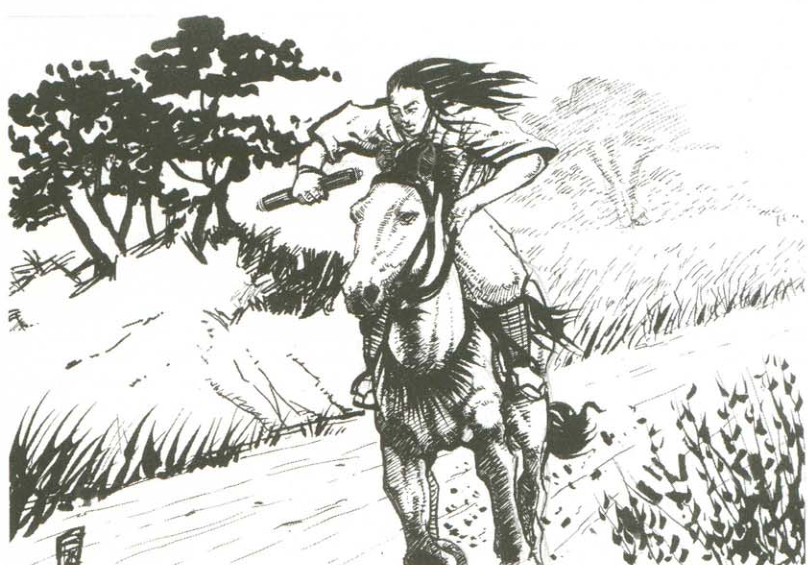
tiny head
Spell research! Aw yis, time to get the caster supremacy on. Spell research happens when a shugenja wants a new effect that no other known spell really matches. When this happens, the first instinct is to go to the Clan's libraries for research. The information each library covers varies from Clan to Clan: the Kuni favor Earth-based magics to fight the Shadowlands, the Soshi favor information gathering through Air magic and so on. Of course, it is necessary to obtain permission from the head of the school before using their facilities. Normally this head is the family daimyo, though they often delegate this responsibility to someone more pedagogically inclined. If the family daimyo is not the school head, permission must be obtained from both before proceeding. Assuming the Clan sponsors the research, the researcher works under their auspices: this means the Clan owns the spell, and this may result in a Secret Spell if the Clan refuses to share it. The researcher's notes are customarily left in the school's libraries regardless of the project's outcome. Those who went to another Clan's school have a trickier time, depending on inter-Clan relations. Friendly Clans have less of a trouble and the resulting spells are customarily acquired both by the student's school and their home school, but it will be very difficult to obtain permission from Clan elders to use their facilities when both Clans are at each other's throats. Ronin shugenja and those disgraced in their school have an ever tougher time, though it is not strictly impossible to develop a spell without a research library. New graduates of a school are hardly ever granted permission for research due to their inexperience (Rank 3+ shugenja are usually granted permission, Rank 2 on occasion).
As for the rules: the player must write the spell's effect in detail, and the GM may reject it if the description is less than 200 words long. It should include information on what core RPG spells it resembles the most, what element is the most appropriate and how the shugenja will get the relevant kami's attention, the target or area of effect, whether it effects a permanent change or lasts for a period of time, and so on. The description should also include what Raises do for the spell. The GM can take as long as they want to evaluate the 'grant proposal' (at least one game session) and can require changes to the spell, reject it completely or accept it as written. The GM determines the spell's TN, casting time, duration, mastery level and concentration depending on the effect wanted. If the resulting mastery level is beyond the shugenja's Ring + School Rank, the spell is beyond their capacity and they must try again with a less-powered proposal. Spell research takes at least one month of dedicated study with no traveling, adventuring or other significant duties. To research a spell, roll Ring + School Rank against the spell's Mastery Level x 10. There is a chart with things that modify the TN: having the element as a school's favored element lowers it, for instance (and Isawa shugenja always get this bonus since their school teaches all elements), while being a ronin or otherwise not allowed to use a research library raises it considerably. Increasing the research time also lowers it, as well as knowing several spells on that element or giving the spell an unusual requirement like requiring full sunlight to cast or a dram of oni blood and such. There are also lists on what spells of a given element should be able to do (it'll be much harder to heal things with Fire, if even possible), as well as how to figure out Mastery levels and ultimate TNs. Small modifications to a spell don't go through all of this, they're just Raises to use on a spell that already exists. Once a spell is successfully researched, it is traditional to write up three copies and give them to the school: one is ceremonially returned to the researcher, and this ceremony usually carries a small Glory bonus, especially if the head of school is suitably impressed and invites important functionaries to witness it. No reputable school accepts maho research, of course.
The Tao of Shinsei! Shiba's record of the lessons of Shinsei grew from that first night as he followed the monk thorugh the countryside, taking him to the palaces of each Kami to gather the Seven Thunders. As they passed through villages, Shinsei would stop and converse with the peasants, and from these conversations the Tao was born. When they reached the end of their journey in the city of Isawa, Shinsei commanded Shiba to lay down his pen: the text was finished and forever would remain there. The Isawa that remained with Shiba when the Thunders left argued for months on the text, some calling its wisdom 'blasphemous' to the religion of the Fortunres. After much debate, it was decided that the Phoenix would begin a detailed study of the Tao, with the intention of finding its faults, but they were challenged to find any fault with the book and eventually began to find ways to integrate the Tao with their own religion. However, much of the research into the Tao in the Isawa library is fairly recent because of a fire that swept through Gisei Toshi seven hundred years ago, and even the original manuscript was nearly destroyed, only saved by the sacrifice of many Asako. After the fire, the greatest of the Asako librarians dedicated the rest of their lives to finding scraps of the Tao in other scrolls, discovering quoted material and questioning those who had studied its mysteries, and they have recovered a great deal of what was lost.
Some 30 years after the war with Fu Leng, a strange occurrence came to the attention of the Council. By now, only one of the original Isawa siblings remained. On a rolling plain, a young boy had been found by the villagers. No older than four, he was playing on a stream that arose from a nearby black boulder, with no one anywhere to be found. Deciding that he had been abandoned, the peasants took him to their village and searched for his parents to no avail: no one was missing a little boy in miles. The child was unusual, with green-gold eyes, and he could speak clearly. At the age of four, completely untutored in the Tao, he could speak verse and quote text. At the time, peasants in Rokugan were not even fully aware of the existence of the Tao of Shinsei, much less able to recite it or teach it to a four year old. When the Council was informed, the boy was brought to Kyuden Isawa and the Asako questioned him. In a deep passage of the Tao, the Emperor is talking about the nine children of Sun and Moon but Shinsei corrects him saying that they were ten, and that Hantei would never know his youngest brother. The standard interpretation of this enigmatic passage was that this tenth 'child' was humanity, but when the boy was discovered it created a frenzy: could he be the Tenth Kami? He was kept at Kyuden Isawa and named Uikku, a name that means 'gift'. As he grew it became clear that his mind was weak and that he had been touched by the kami, and no magic could heal the distant view in his eyes and no scholar could deal with his severe autism. In time he began to speak of things other than the Tao, of futures and enigmas that he did not pretend to understand. At the command of the Master of Void his words were written down and kept, and soon the Asako realized he was speaking prophecy and solving 'gaps' in the Tao itself. Uikku never 'awoke' but still he became one of the foremost figures in Rokugani religion and wisdom, with his prophecies and clarifications of the Tao taken as truth as much as if Shinsei himself had spoken them. He died at the age of 18 and mourned as an Isawa, and a shrine to his honor with the words of his final prophecy was erected around the stream where he was found.
Shinseism! First, Shinsei said, there was nothing. From nothing came duality and from duality came the Five Rings, and everything is part of their cycle. To the Brotherhood of Shinsei, distinctions between Rings are an illusion: they are the energy of the universe given form, and thus everything arises from nothing and eventually returns to the Void. To obtain enlightenment and free yourself from the endless cycle of rebirth, Shinsei said that you must overcome your perceptions and realize the fundamental nothingness of the universe. The world is a place of illusions and suffering, and seeing beyond them and embracing the Five Rings leads to oneness with eternity.
Shinsei's teaching comprises more than just one conversation with the Hantei Emperor. As word of their conversation spread, it attracted curious samurai from across Rokugan, and many begged him to become their sensei. Before leaving for the Shadowlands, he held a brief number of lectures on his philosophy. For four nights, he sat under a pine tree to lecture, and each of these lectures was written down by his students. Over the years different accounts have appeared, sometimes decades after the fact, making it difficult to determine exactly which teachings were his, and the practice used by some monks of assuming the name of previous masters when writing their own texts doesn't help. A sutra is an extrapolation of the teachings of of the Tao. For instance, the Diamond Sutra central to the Shingon sect expands on the Tao, and the sect's founder claimed to have received it 'from Shinsei himself' but some believe that he wrote it on his own, which doesn't stop people from studying the Diamond Sutra. Skeptics say that if Shinsei did all the talking attributed to him by his followers, Fu Leng would have taken Rokugan without a fight.

When Shinsei died in the Shadowlands (and some remain unconvinced that he did) he left behind no successor or passed on the mantle of leadership, perhaps to prevent a dynasty of teachers from arising. As legend has it, on the morning he and the Seven Thunders departed he delivered his final lecture, called the Sermon on the Path of Purification, which laid out the rules for monastic life. He recommended that his followers wandered Rokugan and spread the message, and emphasized the need for frequent meetings to deliberate on communal issues. At first, the Brotherhood of Shinsei was disorganized and scattered, and for many years his followers wandered the countryside as mendicants, gathering together every few years at Shinsei no Sumai Mura, the Holy Home Village. These meetings would shape the spread of Shinseism in the following centuries, taking up doctrinal and organizational issues and giving shape to the major sects. Each of these sects has attained recognition through one of these councils. Eventually, monks started to settle around the village, excepting some Agasha mystics that retreated to their mountains, only to return fifty years later with astounding spiritual attainments that encouraged others to retreat as well. The rules laid down in the Path of Purification were amended and new rules governing monasteries were instituted. Members of a monastery are organized in a loose hierarchy. Positions are supposed to be chosen on merit, but sometimes they just go to former members of the samurai clases. All members of a monastery wear a colored over-robe of their sect. Above the initiates there are rishi (Rank 1-2) and above these are sozu supervisors, both of which wear a black over-robe. Sojo (Rank 4) head a monastery and wear a purple over-robe, while Dai-sojo (Rank 5) wear red robes and oversee several monasteries for their sect leaders.
Over the centuries, new forms of Shinseism appeared, and while the Brotherhood initially tried to enforce doctrinal purity and adherence to the five 'canon' sutras this did not stop monks from coming up with their own interpretations and attracting followers, and the matter was eventually dropped. The first of this divisions came from a monk named Basso and his 'lost' Diamond Sutra, an esoteric interpretation of the Lotus Sutra that Basso stressed over the other teachings of Shinsei. Another sect, Shintao focuses more on meditation than the study of Shinsei's teachings: its masters note that Shinsei didn't have the benefit of the Tao of Shinsei to achieve enlightenment. Followers eschew the traditional rules of the Path of Purification. A subsect, Rinzai, focuses on enigmatic riddles called koan, designed to shatter the student's perceptual framework. These and many other sects have different practices and strange kinds of magic: for instance Shingon is an enigma even to the Dragon, and it teaches advanced meditation techniques said to free the mind of all ilusion. But no matter what sect a monk belongs to, each monastery follows down the rules set down by Shinsei in the Path of Purification. Monks do not eat meat, avoid violence and killing for any reason, remain celibate, avoid glutony and drunkenness, do not defile holy places and do not commit murder or rape. The teachings of Shinsei advocate the Eight Petals of the Lotus: right understanding, right thought, right speech, right action, right livelihood, right effort, right mindfulness and right concentration. This makes it hard for a monk to lie, cheat or steal. The Brotherhood isn't perfect, of course. They are forbidden from engaging in political activities but some monasteries have become politically powerful. Shinsei shunned the accumulation of wealth but some monasteries use a loophole to enrich themselves while keeping individual members poor, and while monastic rules prevent the continuation of social distinctions in the community these have become a problem from time to time. A few monks continue to live as wanderers, coming and going as they please, staying at monasteries for shelter and living from begging from lay people.
What was that, you wanted rules for monks? Wait for Way of Shinsei, sucker.
Strangely for the Phoenix clan book, there's only two nemuranai. Ofushikai is the ancestral sword of the Phoenix, created for Shiba by his wife, Tsamaru, as a gift on the day of their son's birth. When held by the appropriate wielder, they receive the ability to survive in the ocean without any source of air. At any time, the chosen wielder can summon it no matter the distance, and by spending a Void point all combat in a 20 feet radius stops, leaving all those affected unable to attack, cast offensive spells or use aggressive techniques. The Phoenix Clan Armor is kept by the Council and entrusted to the Champion when the Clan is forced into war. It was forged in the fires of Sleeping Thunder Mountain by an ancient Dragon Clan Champion (!) Once worn, it can only be removed by the owner, and it fits perfectly to the proportions of the chosen wearer. When in use, it radiates a 10 feet aura into which no spells can be cast. The wearer can allow individual spells inside for beneficial purposes, though. It also gives the user the ability to Sense Void as if cast by an Ishiken of the same rank, once per day.
Next: meet the Imperials!
Kyuden Seppun: Doomed Highborn Murderous Manchildren: Origins
Original SA post Legend of the Five Rings First EditionKyuden Seppun: Doomed Highborn Murderous Manchildren: Origins
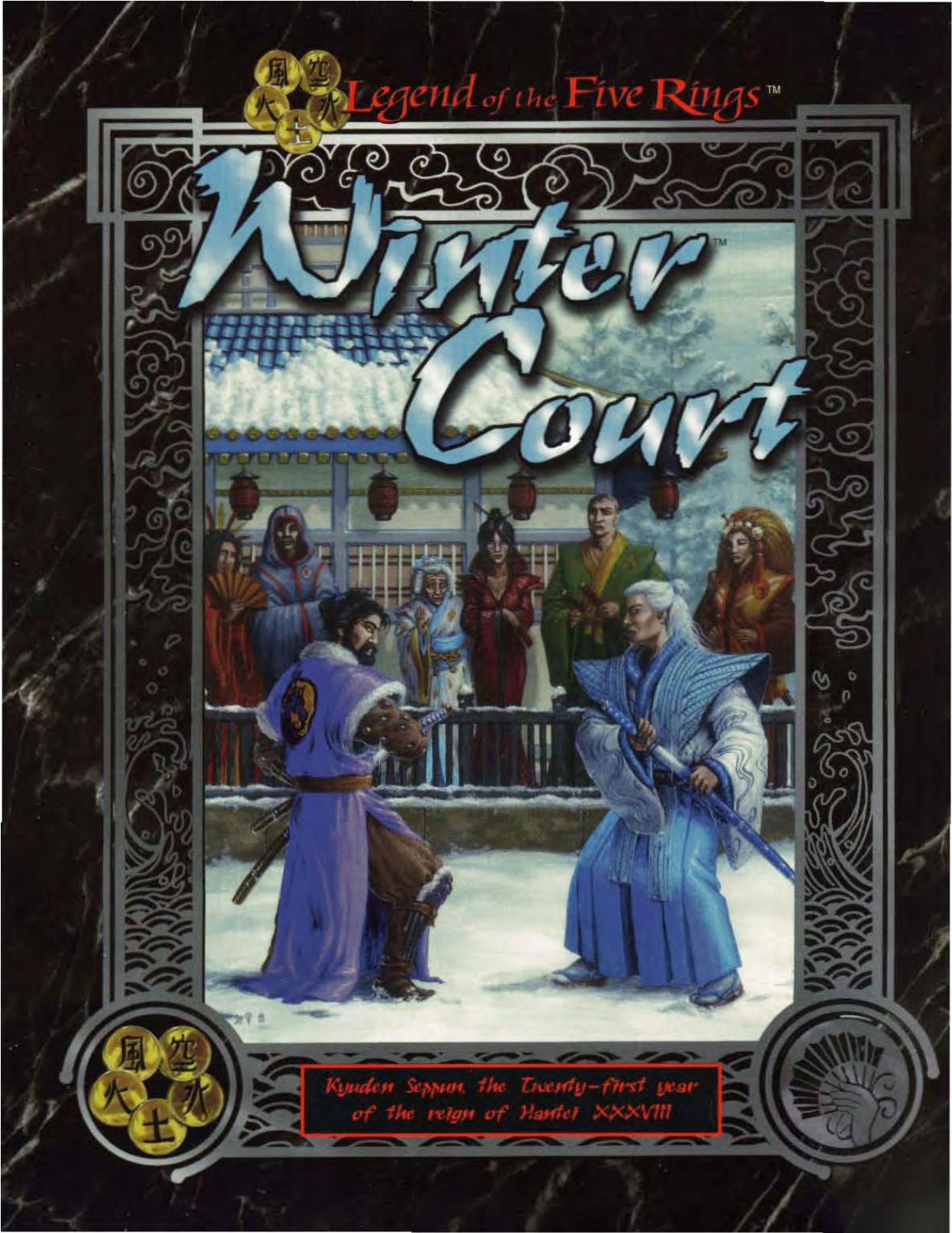
Look at that pimpin' robe. The Unicorn should win on style alone.
Welcome to Kyuden Seppun! Properly this book is called Winter Court, as can be seen on the picture above, but there are several Winter Court books in the line that bear the name of the estate where the year's Winter Court is being held. This book is the "clan book" for the Imperial families, as well as a metaplot book that pushes events closer to the beginning of the CCG's timeline (remember, 1E is written in the past of the CCG) and a general guide to Rokugan's society and culture. Much of the information here has already been written up in the other books we've seen some far, and this book has a serious case of "alright, now we'll write about THIS" that needed better editing to get under control. This book is helmed by Ree Soesbee along with the AEG crew, including people like Rob Vaux, John Wick, Chris Hepler, Jennifer Brandes and a host of others!
The book opens to an invitation for the PCs from Kakita Ryoku, she who wrote that Winter novel that keeps getting quoted in the clan books. She's also the Emperor's own aunt and his Mistress of Ceremonies! Grand celebrations are about to unfold in Kyuden Seppun, the ancestral home of the Seppun family just north of Otosan Uchi. Guess the Emprah wasn't feeling like going far this year!
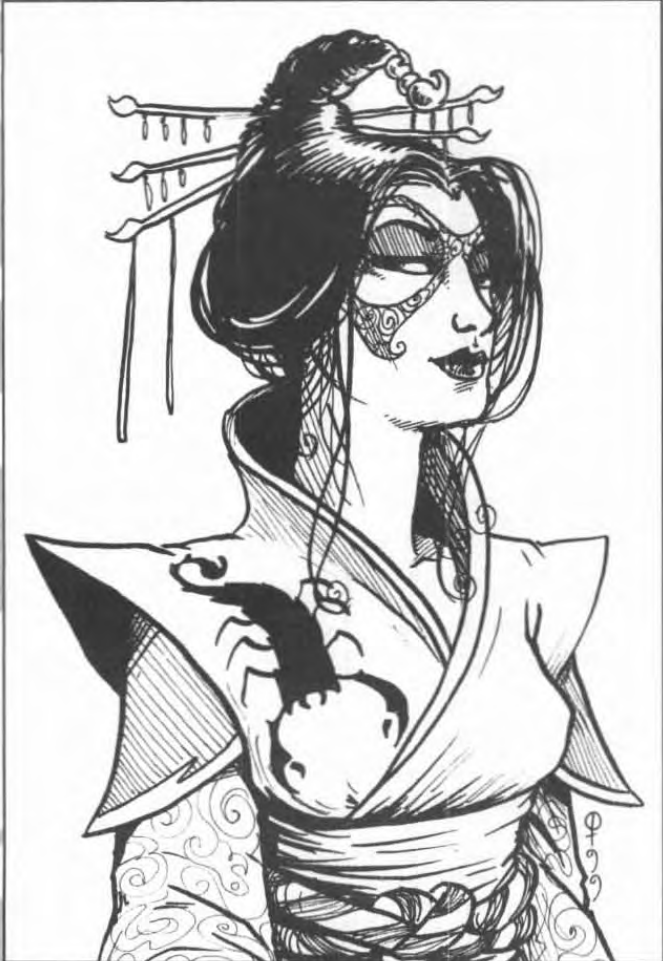
Smug.
And then we take a deep dive into the morass of RPG FICTION. Strap yourselves in, this involves Doji Hoturi and Bayushi Kachiko! All of this happens ten years in the past, mind you. Kachiko (still Shosuro Kachiko at this time) is with her father, the Shosuro daimyo, and her brother Hametsu. She considers him completely inept, and he considers her headstrong and unknowing of a woman's 'proper place', and stammers as he tells his father, Koshurin, of the rumors going on around her - after all, she is "not unattractive." She is to be married to the Crab, he says, but the daimyo stops him saying that she's not even worthy of the dogs in the Kaiu Wall. Kachiko listens to all of this while bristling with anger, and suddenly Koshurin sends Hametsu away with a barked order. Dad is really pissed: Hametsu tried to kill Kachiko, and she returned the favor by actually sending an assassin after him, the Shosuro heir himself. He considers her a failure and a fool, but she can still have some use. The unthinkable has happened: Bayushi Shoju, the Clan Champion, wants her hand in marriage. There are plans if she can survive the winter, he says. In the year's Winter Court, her engagement to Hiruma Maruku of the Crab will be broken, and if she survives the dishonor she is welcome to marry the daimyo. Kachiko smiles inwardly, as she knew the news from days ago, but when she leaves she notices that her hands are actually bleeding from how deep her fingernails had bitten into her palms. Hoturi, meanwhile, is training with his brother Kuwanan under the watchful sight of their sensei, Kakita Toshimoko. The wizened sensei praises Hoturi lightly for the improvement in his technique, but he is interrupted by the young men's father, Satsume, who doesn't have nice things to say for Hoturi and instead praises Kuwanan. While the boys return to their training, Satsume goes on a walk with Toshimoko. He's got some trouble: the Winter Court is coming but he has Imperial business to attend to in the Asako lands. A daimyo must be sent, but he curtly stops Toshimoko when he suggests Hoturi. He will not have his "idiot son" shaming the clan by cavorting with any samurai-ko he finds, his appetites are too well known. The old duelist suggests one Asahina Dorai, but Satsume has an even lesser opinion of that kid. Toshimoko snarks that a fool would be better that someone that would enjoy himself and bring the Clan honor, and Satsume wonders why he hasn't sent Toshimoko to a monastery. Then again, he could turn the Shrine to Uikku into a geisha house. Toshimoko finally manages to trap him by offering to guard Hoturi's honor personally and giving his word, and Satsume can't go against the word of his own respected sensei. Annoyed, he grabs Kuwanan's boken and half-spars half-fights Hoturi, pummeling him down with a flurry of blows. He brings his own son down with heavy blows, and as blood trickles from Hoturi's split cheek Satsume snarls that he is weak and useless, and may the Fortunes have pity on the Crane. He'll never prove himself worthy to him.
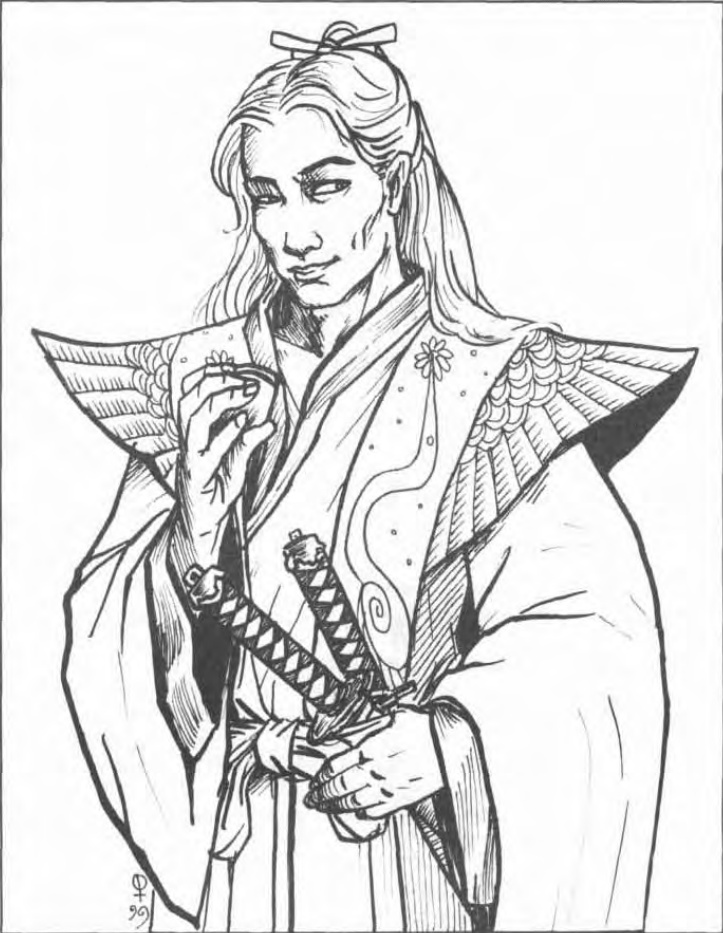
Smugger.
Winter Court begins and that little bit where Hoturi duels and kills the Hiruma fiancee from Way of the Crane happens. The courtiers are buzzing with rumors and whispers about the Shosuro maiden saved by the son of the Crane daimyo in front of the entire assemblage. As it turned out, the Crane also had a hand in things: they learned of the breach of engagement, and Kakita Yoshi had been quietly sent to speak with the Hiruma boy, getting into his head ideas of Kachiko being unfaithful and maybe even pregnant already. Now, the Scorpion owed the Crane for saving their daughter's life. Kachiko is feeling pretty smug about things, and so is Hoturi, who is already thinking of bedding Kachiko. Both think little of each other at this point as they meet politely. She thinks he's beautiful but lacking intelligence, and he thinks he's just like all women - magnificent but a harridan under the polite conversation. During their polite talk Hoturi quotes the Tao of Shinsei, and Kachiko internally rolls her eyes: all men can quote the Tao, even her own brother. Hoturi says that his sister Shizue reads it to him while he trains, which actually surprises Kachiko. She says she thought that such tasks were 'beyond' the minds of noblewomen, and he laughs - why should women be refused anything? Those who say women are not 'suited' to learning don't know of their abilities. Kachiko remembers having her hand blackened by Hametsu's tutor for even approaching the book, and in spite of herself she grows interested in the Crane. They pass two courtiers arguing, and Kachiko amuses herself at their ineptitude - and then notices Hoturi is amused too. He knows the game, she realizes. They gossip on the two men, an Unicorn trying to score a rich wife and a Lion trying to marry his ugly daughters, and both Hoturi and Kachiko come to see that the other part is far more intelligent than they thought. Hoturi ends up challenging Kachiko to a game of go - though of course, that's not the actual game that he is offering. He is slowly growing enthralled with her intelligence, and she sees in his gaze both lust and respect, and the latter emotion she is unprepared to accept or control.
So, the past! Hantei waits while his brothers and sisters fight in the Tournament of the Kami. Hantei, the youngest son, waits his turn patiently. A voice rings in his head as he watches each of his siblings pass by to challenge him, but he simply waits. Of Hida, the voice says that he wishes for an easy victory, but it will never be so. He is destined to fight eternally, and eternity does not give his secrets so easily. When the great warrior passes him by, Hantei remembers the Heavens bitterly, all of it lost to him. He hates the earth, the cold and dirty and arrogant piece of mud and clay. Shinjo calls him out, and yet he waits: the voice says that she is brave and yet cursed by their father's wrath, and that she will be the last one of them to truly die. He remembers dreaming of her calling to him to join them in their dark prison, and shudders at the thought. Bayushi tries to get him to join him, but then it's his turn to duel Shiba. The voice says that the twins (they were twins?) are much alike in temperament and deed, will struggle between themselves and reach the same conclusion: betrayal. Hantei remembers his epic fight with Onnotangu, Lord Moon, and how he tore his body open to free his siblings. Doji interrupts his thoughts to call to him, and yet the voice tells him that she is not for him - the stars claimed her for another, and soon she will not remember the Heavens. This is her world, and nothing can change that. Shit, Hantei had the hots for his own sister?

quote:
In another life, another world, she would have been his.
Shit!
Anyway, she goes off to duel Akodo and he grumbles some more, remembering how he tried to catch her as she fell to the earth. When they all landed on the mortal realm they looked up to him, and he bitterly thinks on how they had never seen the beauty and joy of the heavens, or known the agony that he had endured, the countless years of hiding and training - what he lost, when he fell. He notices Togashi looking at him and asks him why he won't challenge him to lead the land he despises so. Or is this a contest to decide who will rule over the others? He fought and died for them, sacrificed his place in the heavens for them and yet they think of themselves as his equals. Togashi replies that Hantei sees him looking at him, but he doesn't really see. They stare at each other for a long time, and eventually both smile. The voice says that he will never be parted from his people: Togashi is his father's favored, and a darkness will rest in his heart until one of his own slays him. Hantei says that perhaps he doesn't know the things Togashi does, but he sees the one thing he can't see: where he turns his back. He offers to challenge him, but Togashi says no. He already knows who will win. At last it's Akodo vs Hantei, and Akodo is beaming with the joy of battle and his visions of a strong, merciless and shining Empire. It will be as their Mother, but Hantei asks, what does he know of the Heavens? They duel, and it's the thing of legends, mountains springing where they step, earth rumbling with their battle cries. Finally Akodo forgets himself and raises his sword to crush his brother, but Hantei turns his blade to blind him with the light of Lady Sun. This opened Akodo's eyes to the Heavens, and shamed he lets his arms down. He was about to kill his own little brother. Hantei sheathes his sword and forgives him, but the voice says that Akodo children will be the death of his children. The Lion will steal Hantei's throne and his last son will die by their hand. The voice calls Hantei 'son' and tells him to destroy Akodo, but he refuses, and Togashi murmurs about how when the last Akodo falls, so will the last Hantei.
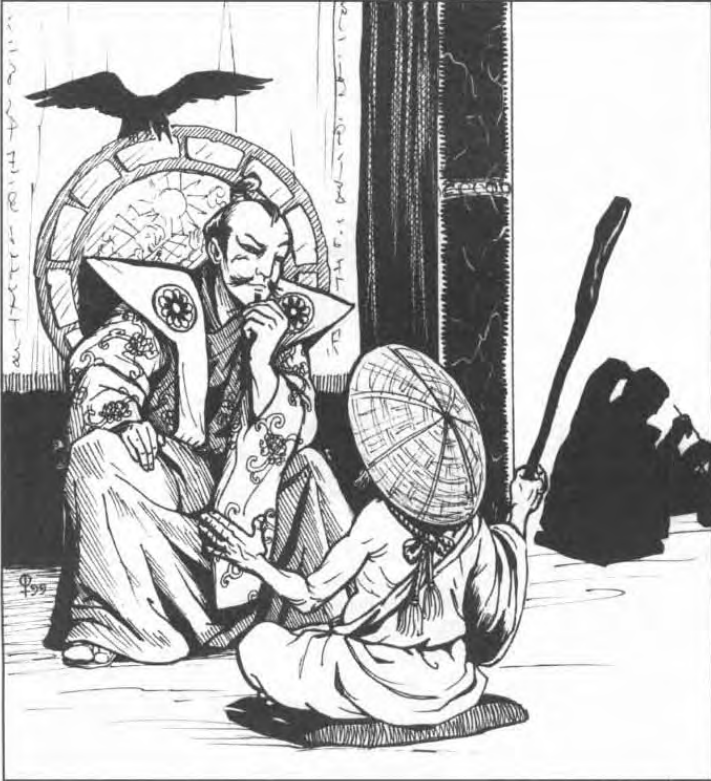
"Ah, yes, interesting... you're making this shit up as you go, Shinsei, aren't you."
So, Rokugan! As we know, we have the samurai, who are the top class. The Emperor and his family are at the top of the samurai ladder, with the major daimyo of the Seven Clans under him, then the vassal family daimyos and so on. Only samurai can wear daisho, the two noble swords. The Emperor creates the laws and is the nominal head of religion, using a bureau of administrators (from the Otomo, Miya or Doji families typically) to handle the daily affairs of state. In spite of this it's the Seven Clans who hold actual military power in the realm. The thing is, all land officially belongs to the Emperor, who allocates them among the Clans. Otosan Uchi, the Empire's capital, was built to accomplish the necessary tasks of bureaucracy, along with maintaining roads, taxes, the Imperial army, communication and political infrastructure. The actual system was mostly created by Lady Doji and her son, Nio. All of the food raised by the Clans belongs to the Empreror, who then gives out portions of rice to his people. Instead of actually transporting the rice to the capital, a system was devised in which the rise was counted in units of koku (the amount necessary to feed one man and his family for a year). These koku were first counted using small wooden pieces that later became the familiar golden koku coins. Each year, administrators go and take the Emperor's share from the Clans' wealth, and then dole out koku that can be redeemed from the Emperor's stores. Since the economy is based on the yearly crops, the value of koku rises or decreases in time, and even the Yasuki would be hard pressed to create 'price guides' for items with the erratic nature of the economy. The Emperor gives his people through the Clan Champions enough koku to feed them. Each landholding samurai can also get 3-7 koku per year above the amount necessary to feed their peasants, while daimyo get one koku per samurai at their service. This money is for outfitting costs. Landholders can also get 10 koku per village, which may not sound like much but it's the equivalent of 10 family salaries a year.
There's two kinds of samurai: nobility and gentry. Nobility are the actual samurai family members, while gentry are warriors that have proved themselves in combat or some other noteworthy activity and have been granted land and title. Many nobles consider gentry to be kind of 'new money', and older families constantly remind gentry of their status and need to prove themselves worthy of the name they've borrowed. An example of this is a peasant spearman named Reju, who in a fierce battle happens to save a Doji samurai. After the battle is over, the Doji decides to reward the spearman with land and a title. He is now known as Doji Reju and has three villages under his control. Every year he collects taxes, keeps a small part for himself and sends the rest to his lord, who collects a small part from the total taxes he gets and sends the rest to his lord, and so on and so on up to the Emperor. After several generations, Doji Reju's great-grandson (also named Reju) rescues an Imperial princess from a Shadowlands Oni. Extremely impressed, the Doji daimyo gives Reju more towns to control, the right to raise an army and, with Imperial approval, a family name, Osuka. He is still known as Doji Reju in the official Imperial scrolls and that's how outsiders know him, but within the Doji family he is now Osuka Reju, with much more prestige as a minor member of the kuge class. But basically you can have PCs with custom family names and say that "oh yeah, they actually are vassals of So-and-So family" which is neat.
A great deal of the Empire's politics coms from social mobility within one level: a samurai might wish to become a great general, or a courtier might hope to become an Imperial advisor. These rankings might seem arbitrary, but they are strictly adhered to and their relevance is always taken into account. Furthermore, such moves are more easier than advancing to a higher social class: a samurai maiden of a low family might be allowed to marry into a more prestigious one if her dowry is exceptional (
 ) but it's extremely unlikely that a heimin will be allowed to marry even the lowest samurai. The
kuge are the elite of the samurai. These include the Hantei, Otomo and Seppun families, the daimyo of each Great Clan and the members of their immediate families. There might be several thousand samurai with the family name 'Doji' in the Empire but only a select few are actually part of the Doji noble house. Others are actually adopted into the house, and may bear the greater family's name or a vassal family name as we've seen. The vassal families aren't considered part of the kuge even though they're still samurai. A samurai that uses their own personal house name in official matters rather than the name of their lord's house insults their lord's name. Below the kuge are the
buke, the bulk of the samurai caste: the generals, warlords and other powerful but non-landed individuals in a Clan. The buke come from the original farmers that fought for the Seven Clans: they rebelled against high taxation and from them came the proto-samurai. They cover all warrior types from the lowest foot-soldier to the highest governor-general. The buke also include the lesser sons and daughters of the kuge, the ones that don't stand to inherit the family's power or land. Below these are the
bonge, the commoners. These include heimin and hinin. Non-eta commoners are eager to distinguish themselves in any way possible in the hope of one day being allowed in to the ranks of the buke or joining lesser kuge families by marriage. Geisha aren't officially considered bonge, but a class of their own, and they are expected to comport themselves as if they were samurai even though they have none of their rank, social prestige or power. There's also ji-samurai, "half-samurai" which are vassal family warriors, eager to distinguish themselves and raise their position through glory in battle.
) but it's extremely unlikely that a heimin will be allowed to marry even the lowest samurai. The
kuge are the elite of the samurai. These include the Hantei, Otomo and Seppun families, the daimyo of each Great Clan and the members of their immediate families. There might be several thousand samurai with the family name 'Doji' in the Empire but only a select few are actually part of the Doji noble house. Others are actually adopted into the house, and may bear the greater family's name or a vassal family name as we've seen. The vassal families aren't considered part of the kuge even though they're still samurai. A samurai that uses their own personal house name in official matters rather than the name of their lord's house insults their lord's name. Below the kuge are the
buke, the bulk of the samurai caste: the generals, warlords and other powerful but non-landed individuals in a Clan. The buke come from the original farmers that fought for the Seven Clans: they rebelled against high taxation and from them came the proto-samurai. They cover all warrior types from the lowest foot-soldier to the highest governor-general. The buke also include the lesser sons and daughters of the kuge, the ones that don't stand to inherit the family's power or land. Below these are the
bonge, the commoners. These include heimin and hinin. Non-eta commoners are eager to distinguish themselves in any way possible in the hope of one day being allowed in to the ranks of the buke or joining lesser kuge families by marriage. Geisha aren't officially considered bonge, but a class of their own, and they are expected to comport themselves as if they were samurai even though they have none of their rank, social prestige or power. There's also ji-samurai, "half-samurai" which are vassal family warriors, eager to distinguish themselves and raise their position through glory in battle.
So, gifts! They're really important. The monetary valor of the gift matters much less than the sentimental one. The way a Rokugani gives a gifts can indicate whether they respect the other part, are friends to them or their deadliest enemy. It is considered impolite to give useful gifts, if not outright insulting. Being given money implies that the samurai's daimyo does not provide for them. The things a samurai can't ask for, now those are gifts. Purchasing them can be hard, since for one buying stuff is considered dishonorable for samurai, and buying things for say, a daimyo can be pointless since the daimyo already owns anything they want in their province. It's not the worse idea but it's not something that will get people into the Winter Court. It's the thought and presentation that counts: significance, personal meaning and enlightenment all matter.
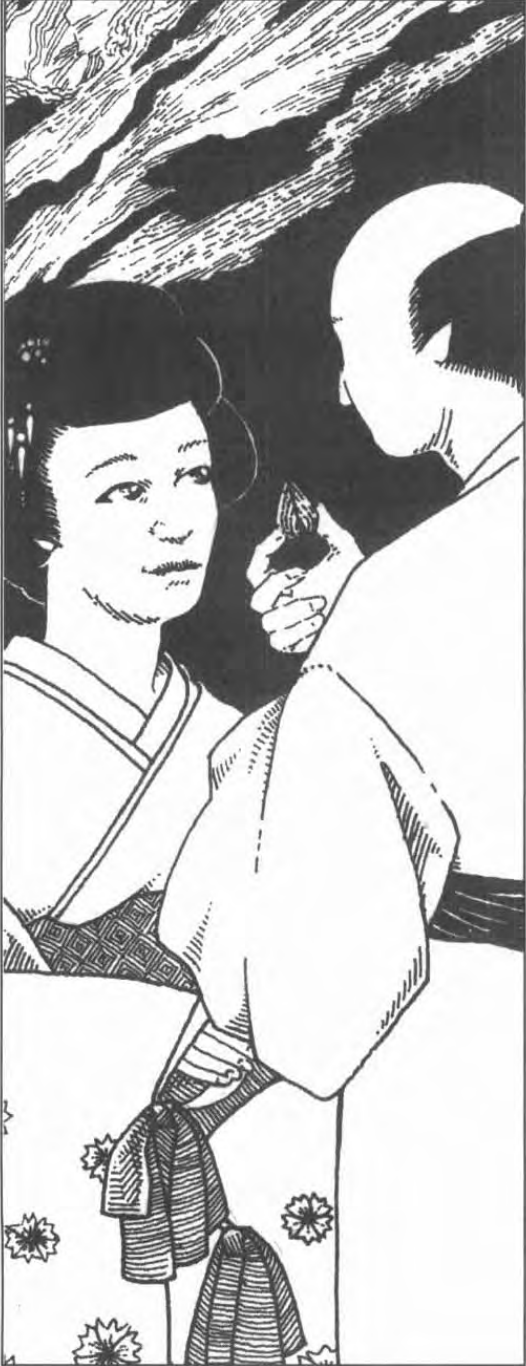
"And this, is the pick of Valhallen, gaijin god of rock and roll."
Bathing! Of course there's etiquette for bathing. It's particularly delicate in a party made up of both sexes or members of different houses. What's considered obscene or normal can vary wildly among the Clans and families. Cleanliness is a cultural imperative and nudity does not have the stigma of Western cultures. Save for the Unicorn and their 'foreign' ways, magistrates of all Clans and families have little trouble with properly chaperoned co-ed bathing. This is not frequently encouraged and most people usually wish to bathe alone or in sex-segregated groups, but co-ed bathing is better than no bathing at all. Some public bath-houses exist for travelers, usually maintained by low-ranking samurai and house servants for chaperone duty. On the road, samurai scrub down once a week with a sponge, and it's taboo to expose themselves in public without the benefit of a bathing house. Swimming is also done in light clothing unless done privately. Different rules also apply to warrior maidens compared to prim and proper samurai daughters as well.
Speaking of samurai-ko, they are treated with the deference due to a lady of their station unless they are dressed and prepared for war. When they are in 'mannish' attire they are referred to using their military title. Samurai-ko have all the rights of men, and they have no restriction in their actions so long as they are dressed and act appropriately to their station. They're still female, however, and must abide by some social conventions. Women are expected to speak more softly than men and move more slowly with smaller gestures and motion. Unmarried men and women aren't allowed to be alone together, so samurai-ko often have a 'honor retainer' to follow them around and ensure all proper social conventions are followed. Other conventions of etiquette: a samurai's house is sacred, respected by all members of the samurai caste, even enemies of the family. By carrying their weapons into a samurai's house, they disrespect a thousand years' worth of ancestors and risk angering their own. When a samurai arrives at a house they are espected to announce themselves to the gateman and await the reception. The gateman might politely offer a cup of tea to the visitor and inform respectfully that the host is not at home and 'will be back tomorrow'. This is the conventional answer even if the samurai is gone for weeks, or is actually inside but doesn't want to or cannot see visitors. It's inappropriate to ask about their whereabouts as the host might just be inside with a more prestigious visitor. A copy of the visitor's mon and chop is traditionally left to record visits. To speak with their lord, a samurai should ask the lord's advisor or house shugenja for an appointment. The daimyo will then set a date, though they might just say that the appointment "will be made" and then never set a date, but such treatment is extremely dishonorable and will decrease the retainers' loyalty to the daimyo.
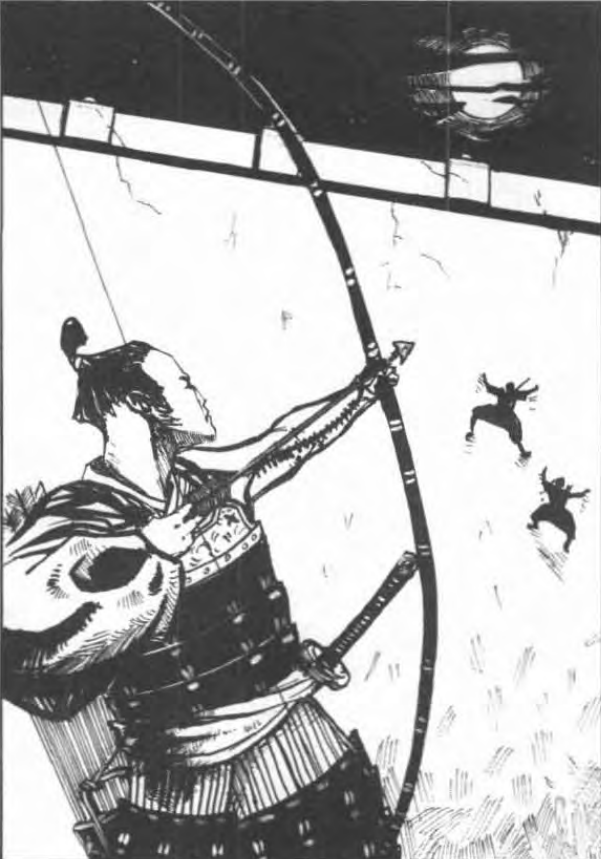
And then your poor guards have to do target practice on tiny ninja, all because you were an asshole and didn't want to have a meeting.
Next: there is, a house, in New Orleans.
Kyuden Seppun: Life at the top
Original SA post Legend of the Five Rings First EditionKyuden Seppun: Life at the top
So, the Imperial families! For over a thousand years, the Hantei have ruled in an unbroken line, severed only by civil war and righted by the actions of the Clans. (Well I guess it's not unbroken then, is it?) All the Clans have their niche and provide a service to society, but what are the contributions of the Hantei? The Ikoma historians count several instances where the line was dissolved only to be restored by a nearly lost son or daughter miraculously discovered in their histories. The Cranes have intermarried with the Hantei almost exclusively, so the Imperial line has as much of a connection to Lady Doji as to Hantei himself. Yet the Hantei continue to rule, and when the Emperor raises his hand, the world moves.
The Hantei are the ruling house of the Emerald Empire. They are the political head of the nation as well as its relgious leader. As the Emperor descends from Amaterasu Omikami, Queen of the Fortunes, the line of her son rules over all mortal life. The First Hantei was proclaimed Emperor of all Rokugan by his siblings, but it was his grandson, Hantei Ningi (Hantei III) who created the Imperial Court and established the Emerald Champion. He was a brilliant man, though some say that he was the first true mortal ruler of the line. His father and grandfather are said to have ascended into the heavens when they tired of rulership.
MonsieurChoc posted:
Goddamn do I hate how L5R misuses the the suffix "-ko".
Funny you say that! The Emperor is referred to as tenno, Heavenly Sovereign. Both tenno and tenno-ko (fuuuuuck you L5R) have served as the leader of the Empire. The heir assumptive is known as kotaishi, and is traditionally educated by the foremost Shintao priests of the Empire as one of the Emperor's jobs is to decide matters of doctrine and so they must be thoroughly familiar with both the religion of the Fortunes and the Tao of Shinsei. For many generations the Imperial line has remained apart from familial infighting and brotherly rivalry over the throne, and one of the means they use to keep the line of succession clear is the Ritual of Abdication performed shortly after the coronation of an Emperor or the death or retirement of the previous one. The aged Emperor renounces the claim to the name "Hantei" when retiring and becomes a Shinsei monk as customary, the eldest son becomes the new Emperor and is allowed to use the name Hantei, as well as his wife and children. But only the direct family of the Emperor can use this name, and the other children of the retired or dead Emperor ritually renounce their claim and join the Otomo or Seppun families. When there is no son born to the Hantei Emperor or they die before they can ascend, things become more murky: sometimes a daughter takes up the throne as Empress, sometimes Otomo or Seppun brothers of the ruler are given permission to renounce their Abdication to take back their name, and in other stories the line was all but destroyed in some catastrophe and the closest blood kin of the ruler had to be traced through the Otomo line. Hantei Emperors have three 'naming' periods in their life. FIrst they have a child name, given to them by their parents, and the name they use until their gempukku. After that, the princes choose their adult names, usually taken from the Hantei histories or from one of the Empire's famous heroes. When they are crowned, princes lose this name and become just "Hantei", while their previous name is struck from the Ikoma records. This tradition symbolizes how the Emperor joins the ranks of the Celestial Heaven and leaves behind the trappings of the mortal world, but it only actually started with Hantei X - previous Emperors did keep their names.
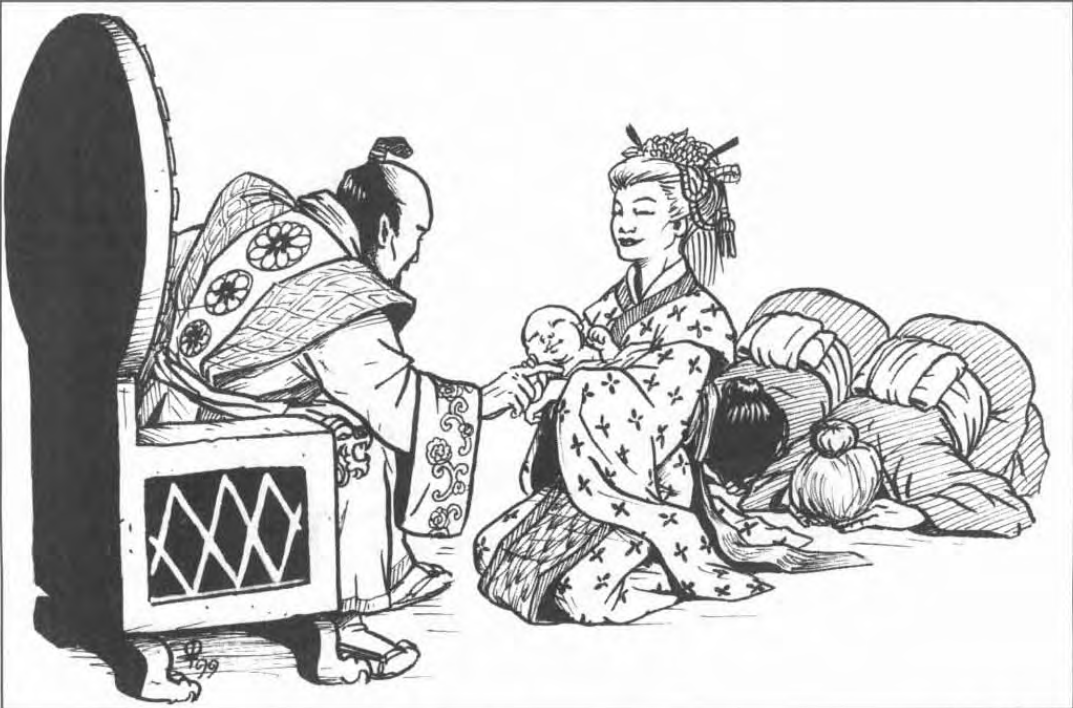
Coochie-coochie-coo~
The first Hantei died shortly after the War with Fu Leng, wounded in the final battle. He continued to rule while the wound weakened him and eventually died with his brothers and sister at his side. In Shosuro Furuyari's play, Death of the First Hantei, his death happens in the battlefield and his son, Hantei Genji the Shining Prince, returns with his mortally wounded father, takes up his no-dachi and destroys the rest of Fu Leng's armies while Doji, Akodo and Bayushi stand with their dying brother. The Ikoma and Asako insist that the first Hantei continued to rule after the war and that one day he merely vanished in a cloud of smoke and sunlight to return to the Heavens.
 After the death of his father, Hantei Genji (who was also known as a great poet and patron of culture) made great strides to establish Shinseism in the Empire. Assisted by the Seppun he created temples, established holy sites of the kami and taught the traditions and legends of the Heavens to all the people of the realm. Shortly after his coronation he proclaimed that the religion of the Seven Fortunes and the Tao were of one mind, and that both religions should be seen as aspects of the same belief, thus unifying many of the primitive tribes of Rokugan. Temples and holy shrines flourished under his rule, and by the time of Hantei VI the main district of Otosan Uchi alone had 24 temples in locations where Shinsei walked, gave speeches or performed some miracle. The Seven Clans built semi-private Clan temples over the next hundred years dedicated to the wisdom the little monk imparted to their founders, and they have since become the cornerstones of Shinseism within the Clans and popular pilgrimage sites. The study of the Tao and its practices are common throughout the Empire, and his words hold greater prominence in the hearts of the people than even the Seven Fortunes. Every home, poor or wealthy, noble or peasant, holds some small token of Shinsei's words or deeds. Shintao prayers at shrines or at home follow the same general pattern throughout the land: ritual purification of hands and mouth with clean water, offerings of food or coins, two bows, two claps and two bows again before praying. In larger or more affluent houses, Shintao priests and shugenja perform the rituals. Priests can and do marry and have children, and there are priestesses as well. Some of them are middle-aged retirees from the Clans, but most priests are just simple folk that felt the calling of the Tao. They're usually assisted by white-robed young unmarried ladies,
taomiko, that learn about the Tao and the rituals that a wife will need at home. Most shrines celebrate regular
matsuri, festivals to show respect to the kami.
After the death of his father, Hantei Genji (who was also known as a great poet and patron of culture) made great strides to establish Shinseism in the Empire. Assisted by the Seppun he created temples, established holy sites of the kami and taught the traditions and legends of the Heavens to all the people of the realm. Shortly after his coronation he proclaimed that the religion of the Seven Fortunes and the Tao were of one mind, and that both religions should be seen as aspects of the same belief, thus unifying many of the primitive tribes of Rokugan. Temples and holy shrines flourished under his rule, and by the time of Hantei VI the main district of Otosan Uchi alone had 24 temples in locations where Shinsei walked, gave speeches or performed some miracle. The Seven Clans built semi-private Clan temples over the next hundred years dedicated to the wisdom the little monk imparted to their founders, and they have since become the cornerstones of Shinseism within the Clans and popular pilgrimage sites. The study of the Tao and its practices are common throughout the Empire, and his words hold greater prominence in the hearts of the people than even the Seven Fortunes. Every home, poor or wealthy, noble or peasant, holds some small token of Shinsei's words or deeds. Shintao prayers at shrines or at home follow the same general pattern throughout the land: ritual purification of hands and mouth with clean water, offerings of food or coins, two bows, two claps and two bows again before praying. In larger or more affluent houses, Shintao priests and shugenja perform the rituals. Priests can and do marry and have children, and there are priestesses as well. Some of them are middle-aged retirees from the Clans, but most priests are just simple folk that felt the calling of the Tao. They're usually assisted by white-robed young unmarried ladies,
taomiko, that learn about the Tao and the rituals that a wife will need at home. Most shrines celebrate regular
matsuri, festivals to show respect to the kami.
There's some stuff on the Court and the role of the Champion that we've seen in the Crane book already. We're also told that Hantei and Togashi were perhaps the least alike of the Kami, and that they fought often as Hantei tried to rule the Empire from which Togashi withdrew. Hantei knew that Togashi could see everything in the world, except his own role in the future that he beheld. For this reason, Togashi and his 'children' have always stood apart, afraid to change the future they beheld and unsure if their actions would change the future for better or worse. Yet the Hantei always call on their enigmatic Dragon brothers for this ability. They have always known that the future the Dragons see is certain without their involvement, and so they have sometimes used this ability against the Togashi for the sake of the Empire: if an detrimental outcome was certain, Hantei would force Togashi to send troops or make a commitment to gain the possibility of change in that certainty.
Iuchiban! Little is known about his early life, though some suspect that he was part of the Hantei Emperors or somehow attached to them. The Hantei know this more than any, as only they know of his true birth and nature: he was the youngest son of an Emperor, always struggling with his rank. Through Otomo dedication and patience the records have been changed, erased and rewritten. Even the Scorpion have three different versions of Iuchiban's origin, all wrong. The Imperial line has always known that Iuchiban was one of their own. To them, he was a madman that broke the Celestial Order, rose up against his brother and resorted to blasphemies to take the throne, and failed. They understand his rage and frustration at the politics of the Clans, but refuse to admit to his bloodlust or hatred of the Empire. Somehow, Iuchiban acquired a text of blood magic written by some maddened Kuni, and he improved upon his theories and hypothesis. He saw how to take up the Throne with maho-tsukai powers, and for years he kept his unholy research quiet, gaining total mastery of black magic. He used unwary servants or minor courtiers to feed his blood rites, knowing that as an Imperial he would be unquestioned. At last, he ended up raising bodies from the Imperial Graveyard, using the remains of ancient heroes, Champions and Emperors to attack his brother. And he was put down... the first time.
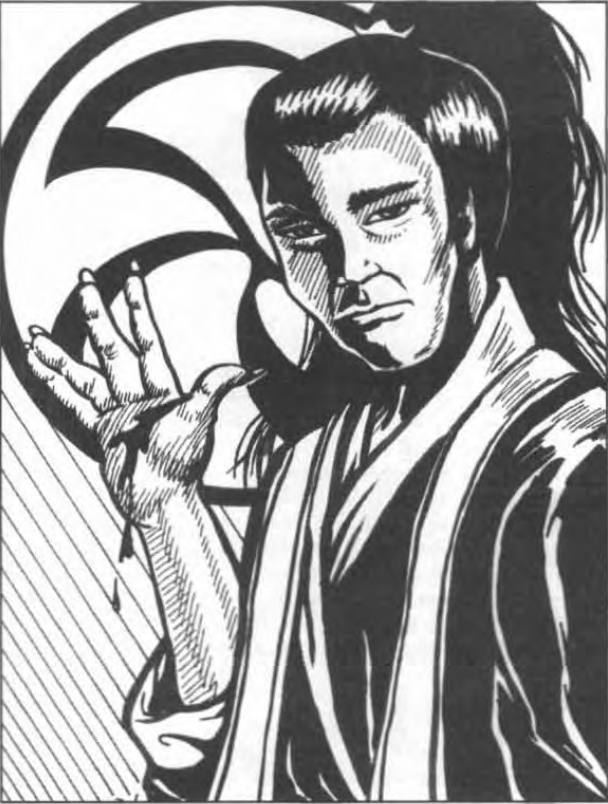
Iuchiban's like 'sup'
The Wisdom of the Heavens is the record of the final words of each Emperor, collected by Seppun scribes at every Hantei's deathbed. Only the Imperial Scribe and the Emperor himself can read it, though snippets have 'leaked' to the Ikoma and Bayushi records. Some of these statements might be forgeries by clever courtiers that want to stain the Imperial line!

quote:
It is not important to fight best. It is important to fight last. That way, when you defeat your opponent, there are no others to take his place.
Only get involved in the fights you know you can win.
When possible, allow others to do your speaking for you - this way, you can accuse them of misunderstanding.
Be a mother to the Empire - give it what it wants, and it will not look elsewhere for its needs. Treat it as a child, and protect it from its own desires, and it will flourish. Keep your thoughts and justifications to yourself: a child needs to know only what to do, and what not to do. Anything else confuses the issue, and explanations make you appear fallible.
Always have a scapegoat.
Think complex, talk of complex plots, but always use something simple.
Do not devote time to the plan. Put all your energy into contingencies. Something will always go wrong with the plan.
Never kill a fanatic, or he becomes a martyr. A living man is easy to destroy; a dead man is unquestionable in the eyes of his followers.
Know your enemy's weakness, but do not use it. Allow others to know it, and let them perform your will.
Knowledge is not power. Power is the ability to deny knowledge.


The Seppun mon, two bamboo branches under the Imperial chrysantemum. They are allowed to use the symbol of Hantei, but only as part of the mon and not on its own, as that is reserved solely to the Hantei.
The Seppun family! Their story starts with a woman from a wandering tribe, who had finally found a place to call home in a rolling valley. She was the holy woman of the tribe, keeper of their gods and speaker to Sun and Moon. She raised her staff and cried to the sky, asking the Great One to send her a sign, and as she spoke thunder rippled from the heavens and a tremendous wind sprang from the seashore. She fell to her knees, and when the thunder ceased and the sky returned to the rose of dawn she looked up: in the hilltop eight figures with eyes of flame stood. One of them told her to stand and say her name, and she replied in fear that she was Seppun, which was actually the title of the holiest of celestial servants. Hoping that the godly beings would take pity on her, she begged them to allow her to serve, and that she would guard their children forever and teach them the ways of the Great Ones and the small, and so Seppun became the first follower of Hantei.
The Seppun are perhaps the closest to the Emperor, both in blood and fellowship. Others may vie for the Emperor's attentions but the Seppun are always in the Imperial graces. The first Seppun was the most dedicated to the ideals and words of Shinsei: she sponsored the first temples of the Tao, unified both religions along with the Isawa and brought education and enlightenment to the nobility of the new Empire. Their palace, Kyuden Seppun, stands at the base of the mountains to the north of the Crane provinces, just in sight of the walls of Otosan Uchi. It is a widespread, sprawling structure, about as old as the Imperial City itself, and both Hantei and Doji lived here while the city was being built. Thus it became the "Second Home of the Hantei." It has large shrines for the study of scholarly texts, magnificent gardens full of rare and exotic plants, and elaborate rooms for the courtiers. Its libraries aren't as grand or encompassing as the Ikoma libraries or as blessed with ancient texts as those of the Isawa, but they still contain many valuable scrolls and lessons. Shinseist art flourished here first, and the first Four Temples of Shinsei stand outside its walls even now. Teachers trained by Lady Seppun went out into the land spreading the wisdom of Shinsei through the Clans, and Kyuden Seppun became the administrative and cultural center of the early Empire. Even today, hundreds of years later, there are still many kofun (graves used by the primitive Rokugani before Iuchiban and the use of cremation ceremonies), stone figures and other reminders of those times. There are no walls or legions of bushi in Kyuden Seppun, and the same villages that feed Otosan Uchi also support it. It serves as a summer home for the Hantei and a separate home for his children should they marry before the Emperor steps down. Certain political, administrative and ceremonial activities still take place here as well.
The grave of Lady Seppun was spared by Imperial Edict from the Emperor's command to burn all dead bodies post-Iuchiban. Her mausoleum stands on the edge of the palace grounds and it is widely held to be haunted; certainly the Seppun believe that the spirit of their founder still walks by the local small stream, whispering secrets of the Emperor's line. It is open to anyone that wishes to pay respects, however, and its walls are covered in magnificent paintings. Its construction is distinctive of the primitive pre-Kami people that lived around the area of Otosan Uchi, in alternating layers of clay and sand. It's said that Seppun was to be raised to the Heavens to serve Amaterasu herself and thus a miniature sky of constellations, Sun and Moon and the Fortunes was painted on the ceiling to accompany her, but something went wrong and her spirit could not ascend. The Four Temples are the site of numerous pilgrimages, holding some of Rokugan's most prestigious shrines and relics, and many daimyo throughout history have chosen them for their retirement. The current High Monk is Tetsuya, formerly Kaiu daimyo Kaiu Oshuda, who has used his engineering abilities to reinforce the temples and build a new wing for the year's Winter Court in Kyuden Seppun. The Imperial Library in the Seppun palace contains a large number of poems associated with Hantei, many related to important historical events. There's little hard historical fact to find, but lot on the moods and motives of the last millenium. Art in Rokugan is profoundly interested in natural scenery and landscape, with the basic tenets being that nature is beautiful, harmonious and in certain ways can have an ethical or moral dimension, ideas shaped by Shinseist belief. The Shadowlands are the opposite of this, with no sense of place and existing outside the natural order. Snow, the ocean and flowers are common motifs in Rokugani art, coming from a speech that Doji Nio did on these three elements of nature and how they symbolize nature as a whole.
(Yeah, it really says little about the Seppun family itself, don't it.)
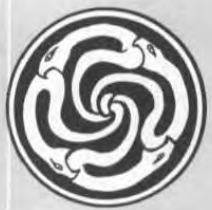
The Otomo family mon, a bunch of snakes biting each other. Totally not creepy and treacherous, you guys.
The Otomo family! Some background first. In the early days of the Empire, the Hantei line ruled with an iron fist, refusing to delegate any political administration to those not of the line. This worked for about four hundred years, but the expansion of the Clans made it harder and harder for the Hantei to administrate the Empire. In the 4th and 5th centuries, the administration fell on the hands of the Crane, Phoenix and Scorpion. The powerful and organized alliance of daimyo Doji Raigu, Shiba Gaijushiko and Bayushi Atsuki was known as the Gozoku, and they took advantage of the Emperor's age and vanity to hold power for a century. For the reigns of Hantei V and VI they held a great deal of control on their decisions, but when the popular Hantei Yugozohime (Hantei VII) took over as Empress not even their might as enough to overcome her and the support of the Lion and the unified Imperial families. Around the middle of the 6th century the functions that the Gozoku carried out were left to the Seppun and Otomo and never returned to the Clans. Since then, the Otomo have kept below the surface of Imperial politics, leaving the spotlight in matters of law and recordkeeping to the Seppun. They fight for the security of the Empire, and to keep an alliance of daimyo from ever threatening the power of the Hantei again. Thus, they began a strategy of subtle encouragement to conflict, disagreement and war among the Clans, one that cements the Emperor's power even today. In order to do this the Otomo encourage new cultural and political movements, quietly supporting and controlling rebeliousness and smuggling information to those who oppose current trends. One of their adages is "A common enemy can build a common state." A third-century Otomo daimyo, inspired by Scorpion magistrate Soshi Saibankan, wrote a lengthy text on a system of law that relied on the spiritual guidance of a man's ancestors and their own honor. The ritsuryo system was established as fundamental legal code after a century and the general populace accepted its validity - after all, what man would choose to lie knowing that his ancestors heard his words? (In Way of the Lion it says that Kitsu mediums were common in courts until one time one of them was communing with an ancestor at a trial, only for Scorpion agents to produce the 'ancestor' who was very much still alive and not in Yomi.
 )
)
The Miya family has its origins in the final days of the first war against Fu Leng. Once the Seven Thunders defeated the DARK BROTHER and the Empire's armies swept away his hordes, a single Oni penetrated Otosan Uchi. It was killed by the Hantei's bodyguards, but not before striking him with a poisoned claw. Delirium wracked him and he was cloistered away from the public eye. At this time, Miya was a young servant of the first Otomo, just one year past his gempukku, of quick mind and ready charm. It was a sign of favor that he was allowed to carry and bring packages for his master while Otomo stayed with the Emperor. One day, Miya delivered a fateful message: the war was won with the death of the last great Oni Lord, and Akodo was hastening to return to palace. Hantei himself addressed the young man, telling him that he had brought him the greatest gift any man could receive: hope. The Emperor commanded Miya to tell all of his people that the Emperor sent his blessings. Stammering his thanks, Miya fled the room to carry out the Imperial will, and he turned to his friends for assistance. An Ide gave him a mount, a Kaiu gave him a sketchy map that was the best record of the lands, and the other Clans also offered help, including a plain woodsaw from an Agasha. Five ronin also pledged their lives to the "Emperor's Herald." In the aftermath of the war, Miya found a tired and desperate people. It was hard even for an armed band to travel, and he realized that the word of the Emperor's Peace would just be mockery for the people without evidence of the promised future. With the saw in his hand, he had a vision, and at every new town he and his men appeared at dawn and worked without explanation for hours, repairing houses, building wells and burying the dead. At noon he would speak at last, announcing the Emperor's blessing and moving on. Sometimes a man or woman left homeless by the war would join him, and in time the size of his band and his own skills grew to the point they could set entire towns on the path to recovery in one morning of work. The Emperor's Blessing remains to this day in the form of wandering crews of carpenters. Two years later, a much more mature and stronger Miya returned to the capitol at the head of a band of fanatical followers. Hantei the Second ruled now, and the Otomo were clearly second to the Seppun in Hantei's alliance. But in Miya, Otomo saw opportunity: he could take him into his house and strengthen his position, or give Miya a house of his own, one deeply indebted to the Otomo. Whispers and favors were exchanged and by the time Hantei II was formally crowned Miya's ascension was assured.
The Miya have always had a close bond to the Minor Clans, among their many duties. They were often the instrument that delivered the Emperor's approval when a request was granted, and have kept particularly close ties to the Fox Clan. When the Unicorn returned, the Fox were the first to recognize their kin, and rushed the news to their allies. Through Miya influence a 'foreign barbarian' was allowed in the Emperor's court to present their evidence, and the Miya were the ones to bring word back to the Unicorn Champion - once again, a Miya carried the Emperor's Blessing to his people. They have always found kindred souls in the Unicorn Clan, particularly with the Ide family. The family does not have the glory of their early days or the privilege of having the Hantei's siblings joining their ranks, but they remain a strong force in Rokugan's politics, filling many positions in the bureaucracy and a surprising number of magistrate posts. They are the only group outside the Seven Clans with hereditary positions among the Emerald Magistrates, and highly sought after as arbitrators and judges due to their temper and devotion to the Emperor's Law in letter and spirit. They also control the important position of the Emperor's Herald, which is traditionally held by the Miya daimyo. The current daimyo, Miya Yoto, instead has given it to his son Satoshi and many suspect that he'll turn leadership of the family to him this winter. Yoto has sparked some scandal with his openly positive view of ronin, and many believe it would be for the best if he retired before something unfortunate happens.
Speaking of Minor Clans! Traditionally ronin come from the ranks of ji-samurai or the illegitimate children of samurai fathers and heimin mothers. Children are always considered part of their father's caste (unless the mother is Otaku or Matsu, mind you) and as such these children are samurai despite their common birth and 'tainted' origins. However, unless the samurai can prove their father's identity with witnesses, they are considered ronin, able to claim some status but not too far removed from heimin. Many of those claiming to be samurai are actually simple peasants with no testimony or skill with the blade to back up their claims. Ronin are an enigma for many parts of the Empire. They must be treated as samurai, but not as grandly as those in the nobility. They are more than peasants, but less than buke. For the most part they are ignored and reviled, refused a part in society but unwilling to descend into the peasant hierarchy. Lesser sons and daughters of minor houses often become ronin when their father's land is divided. Unless they've made a name for themselves they may be removed from their oath of fealty by a jealous sibling or forced to renounce their claim in a coup. The children of these samurai are also considered ronin. But from these lesser samurai come some of the greatest tales of bravery and courage.
If a ronin performs some great feat they may be accepted into a clan as a minor member, with all attendant duties and privileges. Small bands of ronin, juzimai also gather for protection and survival - many of these wreak havoc as bandits and mercenaries, while others struggle to create a life for themselves by founding villages or joining the troops of a minor clan. During war, ronin are given opportunities that they may not otherwise see, and in times like these Minor Clans are born. During the current reign of Hantei the 38th, there are thirteen Minor Clans in Rokugan. The two most powerful Minor Clans are the Fox and the Mantis. They are the oldest Minor Clans and the only two allowed to maintain ambassadors to the Imperial Court. The Fox are the descendants to the original Unicorn Clan that stayed in Rokugan when Shinjo left on her great journey, owners of the surname "Kitsune" and often serving as hunters and woodsmen for the Champion. The Mantis once had a family name too, but it was stripped from them when one of their daimyo attempted to assassinate Hantei the 17th.
Minor Clans do not just appear out of the blue: they are created by the Emperor from ronin bands or lesser houses of the Seven Great Clans. When a group earns the right to form a Minor Clan they are formally given a katana from the Emperor's hands, and if the Minor Clan is ever disgraced and their status is broken the sword is broken by the Emperor's hand. It is exceptionally difficult to become a Minor Clan, and most bands who attain the status have years of history performing dramatic deeds for the Emperor or a major lord. Not all of them have family names: only seven family names are recorded to have been given to Minor Clans, and over half of them have no house name. Family names are given separately by the Emperor's command. More on Minor Clans in Way of the Minor Clans, sucker!
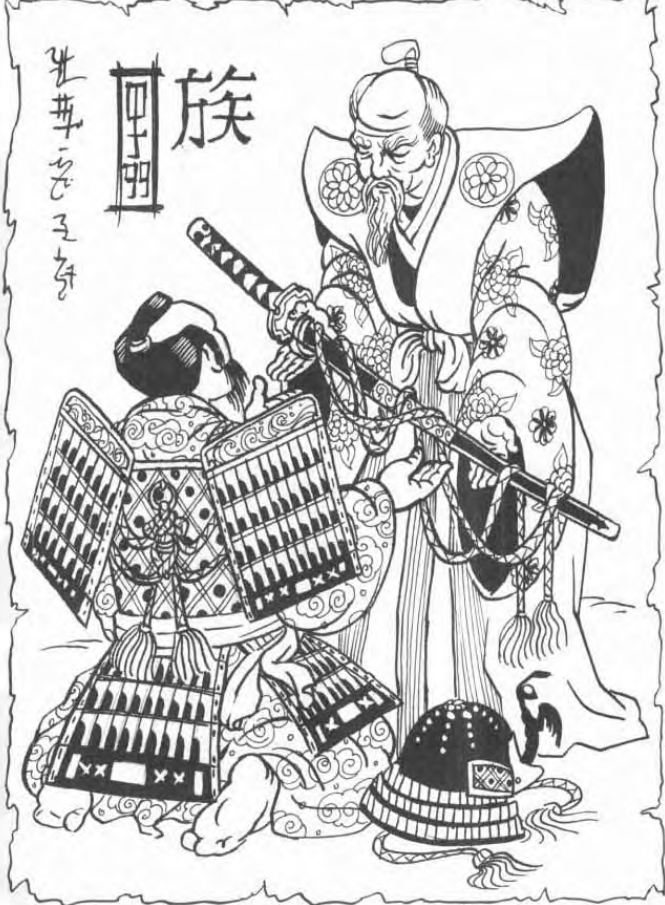
"Okay, you guys are bros, don't go trying to kill my grandsons or anything." *centuries later* "GODDAMMIT MANTIS"
Next: Bayushi "Bugs Bunny" Kachiko.
Kyuden Seppun: What's up, doc
Original SA post Legend of the Five Rings First EditionKyuden Seppun: What's up, doc
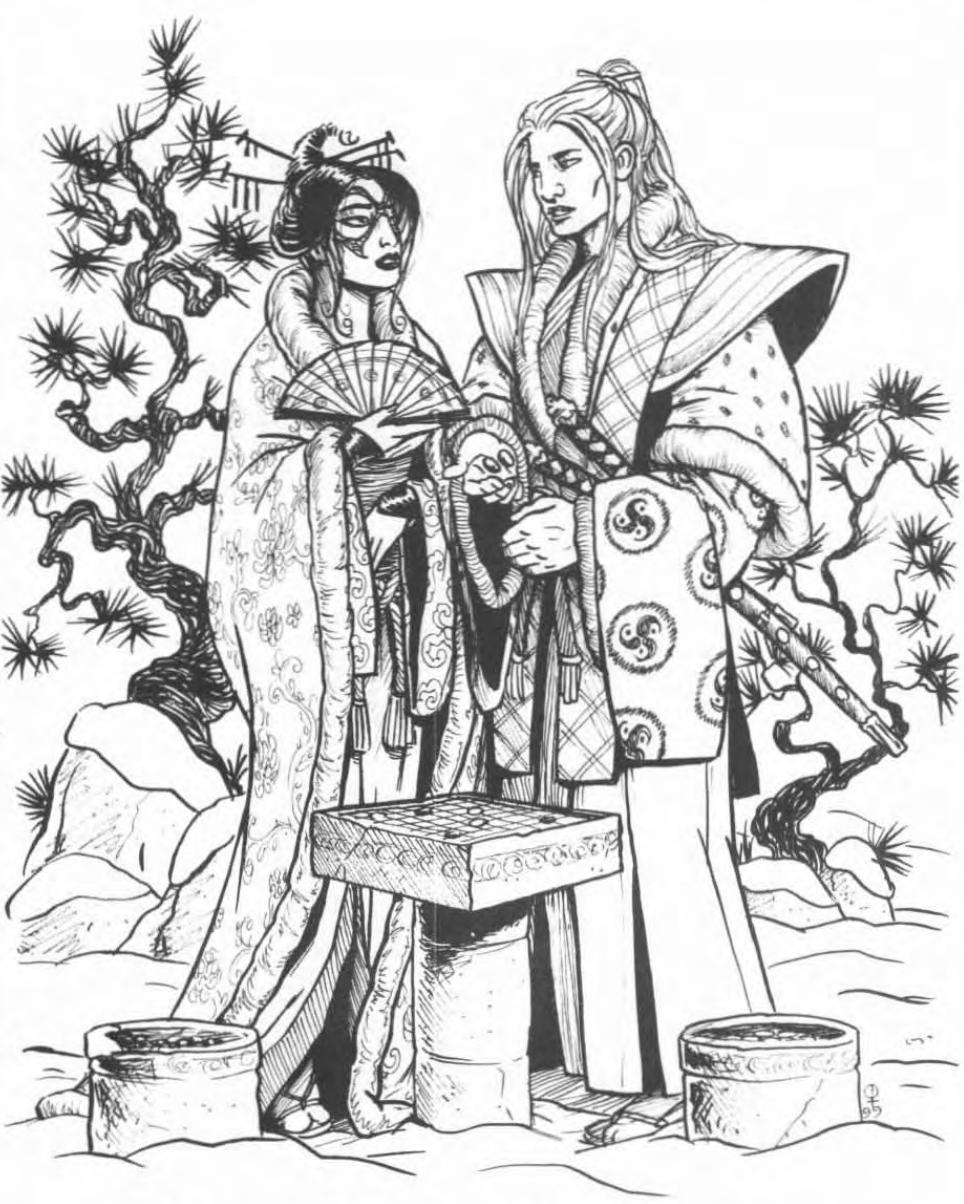
God, we'll never be free from these assholes.
You thought RPG FICTION was over, right? You wish you were so lucky.
quote:
The fan was Kachiko's, but no one needed to know how he had received it.
Hoturi, the entire fucking court saw her giving it to you after you murdered that Hiruma kid, what the fuck. Anyway he gives instructions to some other lady, who is all giggly and smitten with him, and in his mind he declares the beginning of his game with Kachiko. Speaking of her, Kuni Yori - who is the Crab ambassador for this Winter Court - is arguing with Shosuro Koshurin over Kachiko. They had an agreement, and if she won't marry dead Maruku then she'll have to marry his brother. The Crab have the Crane support in this, and no champion will save her now! Koshurin is like 'sure, whatever' and Yori vows that Kachiko and Maruku's brother, Atsumasi, will be married tonight. Kachiko was present and hearing all of this, though, and once Yori leaves she angrily says that Shoju will have Koshurin's head for this. Her father mocks her for looking like a junshin, easy to read and easy to control, and Kachiko swears she'll see him dead while he walks away laughing. Inwardly, though, she is a lot calmer, and she tsk-tsks at Hoturi. Was this all that he could do? Meanwhile, the bumbling Lion and Unicorn courtiers from earlier (Akodo Matsigoshi and Ide Itagi) are also having an argument. They had another marriage agreement, but Itagi has a juicier prospect now and called it off. Matsigoshi is pretty mad, but the Ide doesn't care - his house has greater allies now! The rumors start flying and Kachiko begins to understand Hoturi's ploy - somehow, he planted the idea that she was to marry the Unicorn. Her skills with intrigue are enough to fend off either the Crab or Unicorn proposals, but both at the same time? Undeterred, she goes off on a walk with Ide Itagi, containing her revulsion while the pudgy courtier looks at her like a piece of meat. He is incredibly easy to manipulate, and she hints that she wants to marry him post-haste, even without her father's permission. She tells him to go to her chambers at night to perform the ceremony, and Itagi falls over himself to agree.
At night, Itagi and his guards march through the palace to Kachiko's rooms. He finds Hiruma Atsumasi storming out of the chamber along with his men. Itagi puts on a show of courage and tells him that he is here to claim his bride, but Atsumasi says that he is the brother of Maruku, who was to marry that 'horrendously ugly' woman. Itagi warns him that he insults his bride at his own risk, but after a moment Atsumasi starts laughing. Things seem about to go bloody but the Crab ultimately relinquishes all claims to Kachiko: if Itagi wants her, he can have her. Pushing past the Unicorn guards he leaves, laughing, and Itagi rushes to the room. Kachiko is there, obviously weeping under her wedding veil and thick makeup. Itagi holds her hands to comfort her while the maids fetch a monk for the ceremony. It's a short affair, and they are married! The doors open... and Akodo Matsigoshi walks in, wondering what the actual hell is going on. He calls for Kachiko, and another set of doors is open, revealing the real Kachiko. Matsigoshi demands an explanation and Kachiko says that, as promised, his daughter is married to a man of great station. Matsigoshi is outraged, thinking that she was going to marry Kachiko's brother instead. Itagi does not understand: if Kachiko is there, then who did he marry? 'Kachiko' lifts her veil... it's one of Matsigoshi's ugly daughters. The monk finishes the ceremony, and the Lion maiden cries most maiden-like. It's Hoturi's turn now, Kachiko muses.
It gets worse.
So, the Winter Court! Many of the Great Clans host one, but it's the Emperor's Winter Court the one with the most prestige. In preparation for the winter the clans engage in cutthroat political negotiations to determine where the next Imperial court will be held. For Clans like the Crane it's about keeping the Emperor's favor; for others, it's the wealth of the Imperial Court and the physical presence of the Emperor to listen to their troubles first. Also, the hosting Clan can see to the 'comfort' of ambassadors from other Clans and make sure their requests aren't as well executed or received as they might be. In a year of war, the location of the court is critical to how the conflict is seen and supported. The official announcement is made on the first week of the month of the Rooster, and is celebrated with much pomp and ritual exchange of gifts between the Emperor and the host Clan or family. After the announcement is made, invitations are made, officially by the host but written at the Emperor's command. Only invited individuals are allowed to stay the winter in the Emperor's presence. Other invitations are sent to the Seven Clans to distribute among their lesser members, but these invitations do not allow access to the Hantei, only the functions of the court. The host family gets almost unlimited access, as it's their palace.
By right of birth, the daimyo of the Seven Families (Hida, Shiba, Bayushi, Doji, Shinjo, Togashi and Akodo) are invited, as well as the highest member of the monastery of the Tao and the Seppun, Otomo and Miya daimyo. Only in two occasions the daimyo of the lesser families have not received invitations, both in times of war. Members of the Imperial Court are always invited as well, from advisors and courtesans to ambassadors and formal courtiers. The Emerald Champion also gets an invitation for them and their immediate family, as well as the most prestigious Emerald Magistrates. The invitations are genuine, but it's commonly accepted that the magistrates will be responsible for any trouble or danger the Emperor finds while en route. The Clan daimyo also get a number of additional invitations to give to worthy or suitable ambassadors, and they can request additional invitations with political negotiations and calling of favors. Minor Clans receive very few invitations, always clearly addressed to an individual - they just don't have the leeway of the Great Clans. They can try to ally with a Great Clan to obtain more invitations, but that kind of assistance always comes with strings attached. The invitations of the Seven Clans are in many cases not carefully traced, and given freely with little notice of where they were obtained. The invitations thus become a tradable item, and though the Emperor realizes they will be exchanged as favors this is seen as very appropriate in Rokugan. Ronin are rarely seen in the Winter Court, and are the only ones that have their invitations questioned. They will not be accepted on their own unless they are a very important ronin like the poet Rezan or the Master of the Elements. They may attend as member of someone else's retinue, but samurai or daimyo that bring ronin into the Winter Court are treated as if they made a serious social error.
The Court has many traditions, of which some of the most important are the Imperial Appointments. During the duration of the Court, daimyo are made, inheritances formally given and positions of the court arranged. Several functions like the Tournament of the Emerald Champion, Imperial weddings or formal clan alliances or the naming of the Imperial Advisor only take place during Winter Court. These ceremonies take place after much political wrangling, due to the great power the Emperor wields over Rokugani nobles - without the Hantei's support, Clans will refuse to accept a daimyo as Champion of their house, and without the Emperor's approval a Clan cannot appoint a new ruler of a house or give one of their noble house members in marriage. Scorpions often come to courts to observe and keep their interests alive, and they deliberately send their most beautiful maidens and accomplished courtiers to marry them to other Clans to ensure they have a say - or at least an ear - in politics across the Empire.
The Imperial Advisor is one of the most important appointments. The Emperor has several advisors for each major aspect of court (financial, political, warfare, etc.) but the Imperial Advisor is the head of the Emperor's council. It's their job to make appointments to the court, advise the Emperor and make sure the Hantei is familiar with events in the Empire before they receive visitors or give Imperial Decrees. It is thus a very important job with a lot of political power, and the most prestigious non-inherited position in the Imperial Court. Currently the Advisor is Kakita Yoshi, though Bayushi Kachiko seems to be inheriting his position at this Winter Court, an action that angers the Kakita daimyo greatly. Whispers say that she is gaining this post through seduction and blackmail and that Hantei the 38th is prisoner in his own palace, and riskier rumors say that Kachiko's son with Shoju is half-brother to the Imperial Heir.
The formal inception of a daimyo is one of the most important types of ceremonies at court. Lesser vassal houses can be officially ratified by their superior and all minor daimyo in a Clan are ratified by their Champion, but the primary daimyo of each family and the Champions can only receive their titles from the Hantei in person. If a death occurs in a year, the person that would inherit the title becomes sozokunin daimyo, "heir to the throne", and takes up their responsibilities and tasks though their position is not official. This often causes problems if the Emperor chooses to name another as leader of the Clan. Rarely the Hantei's will differs from the blood lineage of the Clan: the Emperor won't choose someone outside the clan's noble lineage to take up the post but they might choose a 'more capable' second-born son or daughter over the first-born. Formally the Emperor only needs to recognize the new Champion but the appointment of a Clan or family leader usually involves many traditions and rituals. Often the Winter Court is held in a Clan's lands when a new Champion is appointed to celebrate (and test the courtesy of) the new leader. In one unique case, both Crab and Scorpion Champions died in a great battle over disputed territories. The Emperor, angry at the war, named Seppun sozokunin to lead both Clans and force them to make peace until the year's Winter Court.
Seppuku! It is one of he most important rituals in the Empire. "Chest cutting" (what the hell, it's belly-cutting) is the ritual of proving courage in the face of death. It ends with the death of the practitioner but the death blow itself is not the point, but rather the moments leading to it. Before the ceremony, the samurai spends the day in a temple dedicated to an family kami or appropriate Fortune, writing poems and letters to loved ones. At sunset, the samurai is blessed and consecrated, dresses in white and approaches the dais upon which the ceremony will be performed. The samurai kneels on a mat to protect the soil from their blood, reads a copy of their final poem, and announces their will and purpose of the seppuku. Then, they draw their wakizashi and perform three deep cuts. They are not supposed to cry out in pain as that is a disgrace and dishonor to them and their house. Once the final cut is completed or it looks like the samurai will make a sound, a close friend or relative working as their second steps behind them and cuts their head off to ensure they die with honor. Seppuku is not done to protect the samurai's own honor, but that of their family. It is only done in extreme cases and not simply to remove blights to personal honor, only when the purpose is larger than the samurai's life. It cannot be done without express permission of the samurai's lord no matter the circumstances. Situations where seppuku could likely be approved are loyalty conflicts between the lord and the Emperor, atoning for dishonorable actions that stain the samurai's house or family, or avoiding dishonorable defeat (daimyo often give their generals permission for seppuku before they depart). Sometimes a samurai gains seppuku permission in order to avoid execution, the most dishonorable of deaths. One of the least used reasons for seppuku is kanshi, ritual suicide to reprove a lord's actions. A daimyo rarely accepts kanshi politely, of course, but the samurai must still ask for their permission. It is considered bad form to refuse a kanshi request, as it angers the house spirits and may bring bad fortune upon the daimyo. Female samurai that aren't samurai-ko may perform jigai, cutting their own throat with a tanto. A male child that hasn't achieved their gempukku will also be allowed to kill themselves with jigai. Children that are too young to kill themselves to comply with a daimyo's seppuku requests will be killed by their parents as their duty before they themselves commit seppuku.
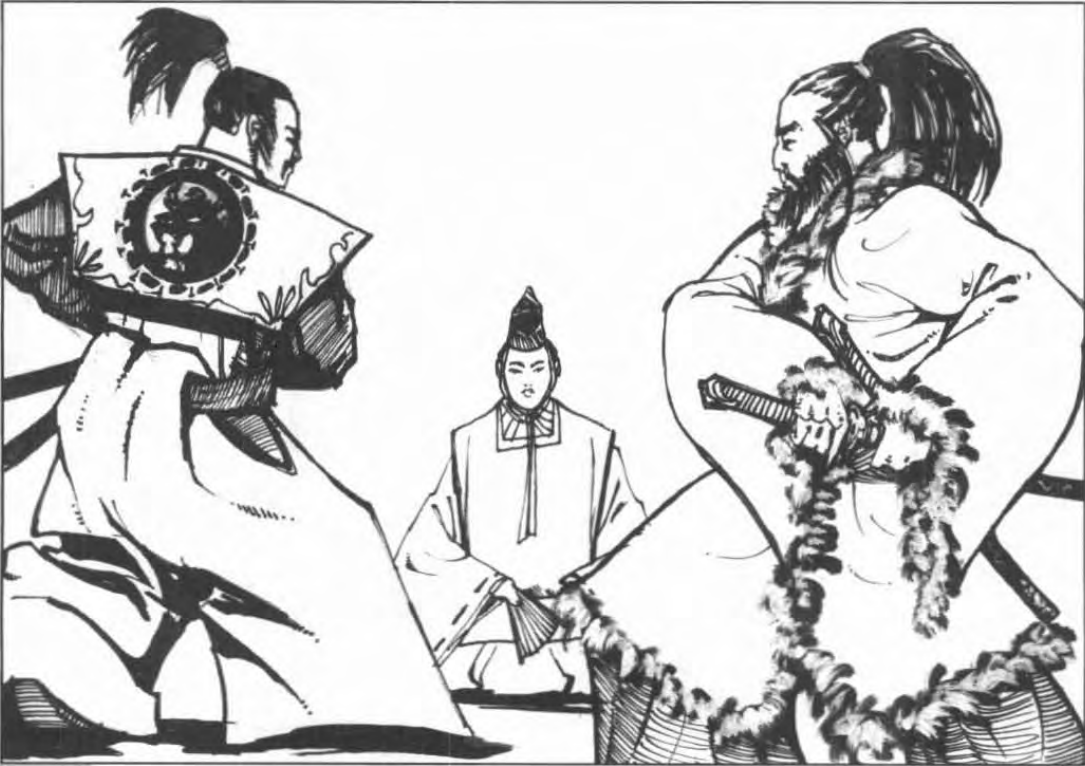
Unicorns still styling over the other dorks.
Customs of war! Samurai follow a very specific way to put on armor, and those who don't put armor in the traditional way are considered unlucky and many times not even allowed to fight. We get a long form example where Matsu Tsuko puts on her heavy armor piece by piece with up to thirteen assistants supporting her. This is really '90s as hell, with the whole ARMOR IS SUPER HARD TO PUT ON NO YOU CAN'T WEAR IT FOREVER YOU AD&D MONKEY AAAAA. Other rituals involve testing swords using the bodies of executed criminals. A superior katana must cut through seven bodies in one stroke, but most only manage three. An insult against a sword is an insult against the bushi, their family and Clan. Such an insult can only be removed by using the sword against the offender, especially if it's an enemy or servant. Any minor offense, even accidentally touching the sword or scabbard is enough. Another ritual is wearing the sword blade down, as it makes an iaijutsu draw difficult and thus indicates peace. Taking the enemy's head is also important, and often samurai in battle carry 'head bags' on their obi to collect heads to later present to the daimyo. If they are satisfied the heads will be sent back to their families for proper burial, but if displeased by their enemies' conduct on the battlefield they may leave the heads on the field for the animals, one of the most dishonorable ways to treat someone's remains.
Duels! To set up a duel, the reasons for it must fall between acceptable parameters, a proper challenge must be made, the type of duel must be decided and the appropriate rituals and ceremonies must be performed. A samurai can avenge a slight to their honor with a duel challenge, or they may accept a challenge for someone else such as a courtier, their daimyo or their spouse. It is not acceptable to challenge someone significantly higher in station (3+ Glory points) or if the samurai's own honor has not been stained - they can't claim someone else's insult as their own unless they are asked to intercede. Insults from a superior of higher station must be taken with honor, and if they can't be ignored the samurai should ask their daimyo to take up responsibility to avenge the insult to their house. Further, a samurai cannot initiate or accept a duel to the death unless they have their daimyo's full support. There are many types of duels in Rokugan, of which the most popular is ketsuiki or first blood duel. It allows samurai to defend their honor without bringing the attention of their lord or shaming their house. Ketsuiki duels are iaijutsu duels that end with blood is drawn, and samurai that strike after the first wound are considered extremely dishonorable. Shi duels or duels to the death are less common and always take place in very serious circumstances, like a battlefield or in a formal setting between two bitter enemies. Challenging someone to this kind of duel over a lesser matter is dishonorable and the challenged samurai can always honorably refuse, especially if their daimyo forbids them to accept it. Shugenja have taryu-jiai, their own type of duel using raw magic power, that can be even more dangerous to them than bushi duels. Duels can allow other weapons, like a couple of Crab whaling on each otehr with tetsubo or whatever the samurai have at hand if they can't get to their swords, or more esoteric things like two courtiers dueling in a poetry competition. Witnesses are integral: a messenger delives the challenge, which must be public, and even spontaneous duels must begin with a formal proposal that entails all the insults or dishonors that spurred the duel. The challenged is free to admit to the insults. Afterwards, witnesses are assembled, as a duel without witnesses is nothing more than an honorless battle. Preferently and especially in shi duels a samurai's daimyo attends as well, and if one of the duelists is championing someone else the noncombatant in question will certainly attend. That person is expected to suffer the same fate as their champion if they fall, from inflicting the same wounds the proxy takes on themselves to actually killing themselves if their duelist dies. Once the duel ends, the matter is settled and it's considered insulting to the spirits of both duelists to bring it up again, even if new testimony or evidence regarding the matter pops up.
Art! Rokugani love their art. At the heart of what they see as beautiful is the basic principles of life, the simple essence of things. They love imperfection in acknowledgement of the inherent limitations of human creative power: humans are ultimately incapable of creating perfection, but as Kakita Wayozu put it, it's not attaining perfection that matters but the act of striving towards it. Scuplture and paiting are only some of the few mediums of art. Another example is ikebana, the art of flower arrangement. Ikebana arrangements are mainly displayed in tokonoma, alcoves in a room that are regarded as sacred places of communion between people inside and nature outside. Poetry is considered the highest asset of a truly skilled functionary in court circles due to Hantei Genji's accomplishments as a poet, and both nobles and commoners study noh, kabuki and other related forms of song and dance. The tea ceremony is one of Rokugan's finest arts, and many of the finest Kakita iemoto (headmasters) of the tea ceremony schools attend the Emperor's Winter Court to bring their art to the finest nobles of the land. Not all tea drinking in Rokugan involves the tea ceremony: all social classes drink sadou tea, a greenish beverage served warm with little ceremony. Cha-no-yu, the tea ceremony itself, uses precious dan-cha leaves only used for it and the coronation of an Emperor. Konishiko, daughter of Lady Doji, created the tea ceremony as a way to break common segregations of class and social standing by creating a single form of tea serving for everyone, but though it is popular in the comparatively egalitarian Crane Clan her ideas were not readily accepted among the nobility. As its popularity grew, the tea ceremony became a way to show off social grace and willingness to understand each other, and today daimyo rarely invite diplomats to their house without immediately inviting them to a tea ceremony. The longest form of it can take up to 4 hours where all movements are carefully measured, and its formality helps create a sense of unity. All participants have their role, from the host to the greater and lesser guests. The invitation is made by the host with very personal letters made with the finest calligraphy, inks and papers, the guests arrive slightly before the arranged time, change their clothes and exchange greetings over small fruits and warm water in a garden next to the hut where the ceremony takes place The host arrives, greets the guests and invites each one inside. They wash their hands and mouths in a stone bowl of water and enter the tea hut, which is adorned with calligraphy, drawings and seasonal haiku poems. After a short time the guests may ask about the poems, compliment the garden and tea hut and talk about the beauty of their surroundings. Light food is served over the small talk (rice and fish meals) and then the actual ceremony begins, with the host carefully serving tea to each guest. At the end, small cakes are given, the guests eat them slowly and one by one they leave the hut.
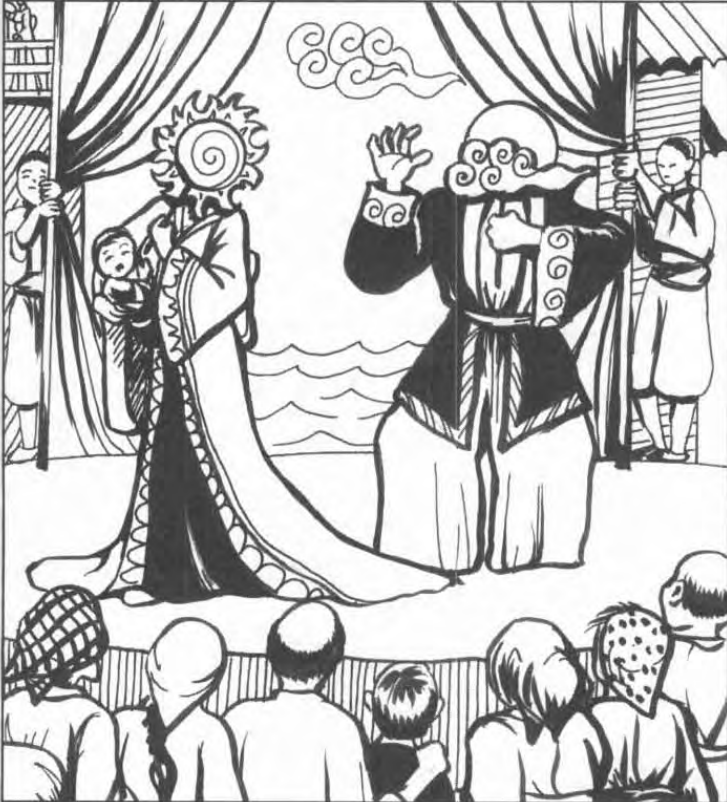
No, I don't understand Brechtian plays either.
Mon and heraldry! Samurai usually incorporate their Clan's colors into formal clothing, while private clothes are usually greys and browns. In formal occasions they wear hats, from the simple or very extravagant. Heraldry is broken down by Clan, family, house and individual. The crest of a family is a simple design intended to identify the house with the Clan it owes fealty to, and usually has the same colors as the Clan, only differing in intensity and hue. Each major family has a mon of their own, and each vassal family has a variation on this mon. Many of the mon motifs are based on nature, like each of the animals the Clans identify why (Crab, Scorpion and so on). The chrysantemum is the Imperial mon and only the Hantei line can use it, while other Imperial representatives use the crest of the Emerald Champion, the laurel wreath. The Court often flies ban, flags over the current residence of the Emperor to show their authority, and these flags bear the Imperial mon followed by the host Clan or family mon. Another type of flag, the hata, is carried during travel or on the field, and are the source for the respected rank of hatamoto ('banner bearer') It's not unusual for a samurai to receive a personal mon from their daimyo for deeds of notable courage. These mon are individual and not inherited by the bearer's children, unless the samurai is particularly impressive.
Tournaments of skill are held across the Empire throughout the year. Iaijutsu and kenjutsu duels with wooden swords are common, and the Crab customarily hold a tetsubo competition with a magnificent tetsubo covered in jade as the prize. Courtiers watch the tournaments carefully for good and ill purposes, to reward honorable and skilled bushi with glory and prestige and also to make note of the bushi's skills, keep tabs on their enemies, allies and minor daimyo that join the festivities. The Emerald Champion often sponsors a tournament of their own, where three-man bushi teams from different clans enter open competitions of poetry, kenjutsu, iaijutsu, grace, etiquette and athletics. The victors of this tournament can gain up to 3 Glory points and the right to sit at the Emerald Champion's table at the night's feast.
Geisha are entertainers, trained in the arts of music, poetry and conversation. They're highly respected, but still hinin in the Celestial Order. There are ten ranks of geisha, from rank 1 novices to rank 4+ masters. A council of Madams in Otosan Uchi assigns them by visiting teahouses and rating geisha on courtesy, grace, beauty and knowledge. They are not prostitutes or "receptacles for sex" :???:, but they allow samurai to break their frigid attitude for a moment, letting them laugh or feel pleasure, sorrow or fear. A geisha's finest moment comes when she can help a samurai face and accept the emotions the social structure of Rokugan forces them to deny. They are not courtesans, and not usually members of the samurai caste though they might have been born to samurai parents. Normally they are beautiful daughters of heimin or ji-samurai. Geisha house madams send ronin samurai to visit towns and villages and scout girls to purchase from their parents for the house, and they carry money, identification and papers for the house to do so. Once a geisha house buys they contract the girls lose all rights and privileges and their only purpose is serving well in the house and honoring their duty, and perhaps one day buy out their contract to set on their own. A few geisha of rank 6+ are purchased by rich daimyo to become courtesans but this is an unattainable hope for most. There are male geisha as well to cater to samurai-ko, rarer than their female counterparts. None have ever gone beyond the fourth rank but they are still respected by their peers in the profession. Geisha are taught the finest arts and culture of the Empire and are common sights in the Winter Court as daimyo wish to show off the arts of their domain. The Crane rarely bring such ladies in since they have their own Kakita Artisans, but the Scorpion make common use of geisha. Concubines are often around samurai and daimyo, though the practice edges in dishonor and disgrace. Samurai-ko of impressive enough station can also have an equivalent, though rumors will certainly fly. The current Hantei has quite a few concubines, all beautiful and cultured Court ladies, which receive a certain amount of status - particularly since there is no current Empress. Courtesans can include daughters sold to geisha houses or given to the Emperor as gifts (the arrangement is similar to that of marriage), and are often called upon for the purposes of creating male heirs if the official wife is barren, uncooperative or seems to only produce daughters. Concubines get half their master's glory and may move freely within their territories, and in many Clans they receive respect equivalent to the offical wife and often head their household and finances. They don't receive this status if not born samurai, though neither are they treated as true heimin or himin depending on their birth. In no case can they inherit legally, though their children can.
Funerals! They are some of the most serious and ritualized traditions of the Empire. Many of the Clans have their own variants, but they all share a common form based on a ceremony used since the reign of Hantei XII. Before him, corpses were buried in the ground or in large ritual tombs, but with the rise of Iuchiban and the Bloodspeakers the Hantei made an edict for all bodies to be cremated before reaching their final resting place. On the funeral day, four days after death, the anointed and purified body is cremated. The days leading up to the ceremony have prayers, offerings to the kami and the Sun Mother and a ritual burning of scrolls with last words from the living of the death. It is believed (the Kitsu state it as fact) that the spirit of the dead keep close to their remains for those four days, listening to all that the living have to say. Only eta actually handle the dead bodies but nearly all shugenja and monks are trained in the necessary rituals and preparations for a funeral. Immediately after death the eta moisten the lips of the deceased as their final food and drink for the journey to the beyond. Afterwards, the body is oiled and cleaned, and then lies in state in their bedchamber with a honor guard of the house's samurai. This is as much for respect as for Crab practicality that has spread to the other Clans: more than one 'dead' body has risen and families always fear that a beloved friend might have been a secret maho-tsukai.

The bedside is decorated with ribbons and carvings and prepared to receive visitors. A chief mourner, typically a spouse or best friend, is chosen to ensure that the deceased is properly mourned and that their spirit doesn't return to take revenge on the living if they don't feel they're properly missed. The house shugenja prepares a death notice, and some service is always given to each member of the deceased's family, no matter how small. The death is announced to visitors and passers-by with white lanterns, people wear white mourning clothes and eat special food for funeral occasions. On the day of the funeral itself eta dress the body in finery and put it on a pine palanquin for transport to the funeral site and the pyre prepared for it. A nearby altar is covered in Shintao and Fortune ribbons and talismans and a guidepost bearing the name and deeds of the deceased is placed outside the house. The pyre's wood is blessed, the closest friends and family of the deceased enjoy a meal in the crematorium, and then the body is burned. Afterwards the guests pick through the bones with chopsticks and pass them to each other, and then Shintao monks perform a second ceremony to assist the spirit on their journey to Jigoku. Often at state funerals of Champions, daimyo or Imperials a Kitsu will 'journey' with the spirit for the next 35 days. The crematory urn stays at an altar in the family's house, also for 35 days, and incense sticks are always lit for it. After that period of time is over the urn is finally buried in the family graveyard, though some families like the Akodo bury their most valued heroes in locations where they can be visited often, like the Hall of Ancestors. There are many other traditions like turning the dead person's head to the north, away from the Shadowlands, or to the west so that the Sun can guide them. Most Kitsu carry blessed salt always for funeral rituals. Each mourner also gives the family an obituary gift, and then the family returns another gift at the end of the 35-day period. Funeral ritual means that some acts are always linked to death and bad luck - it is ill-advised, for instance, to stick chopsticks in food straight up, as this is only done at the pre-cremation final meal.
Inheritance issues can be disputed for months or years without a first son. The daimyo of the deceased decides the official order of inheritance. Normally the most powerful or closest daimyo handles the matter, though the Emperor may send magistrates to the area to oversee the division if an important land or item is in dispute. This supervision in many cases is to ensure the loyalty of the local daimyos. Both the Emperor and the Clan Champion often send magistrates, which causes some minor friction. Other daimyo can dispute the inheritance if the deceased only had daughters, but the first daughter may inherit with approval of the deceased's daimyo, especially if she is already married. Sometimes a Kitsu's testimony is sought, but this testimony will be disputed outside of Lion lands. The reading of the will takes place after the final funerary monument is placed, as by then the spirit is supposed to be in Jigoku and cannot be consulted on the matter. Even if the ghost of the deceased shows up to yell at people over their will, the deceased's wishes aren't legally important unless consigned to a will. Some legal circumstances can disqualify a child from inheritance, some common to the Empire and some varying from Clan to Clan. Scheming Scorpions and Cranes will certainly interested on inheritors' backgrounds in order to manipulate any trouble that pops up to affect the inheritance. Noble bushi cannot disown their children, and can at most command their seppuku if they commit a dishonorable act. This becomes a complication if, say, a half-hinin son of the samurai with a geisha pops up - they are still technically samurai and able to inherit.
Festivals! This post is already growing long so let's take a quick look at the common festivals of the Rokugani year.
- Oshogatsu: the New Year's Day festival, on the first day of the month of the Hare when spring begins. It is when all Rokugani celebrate their "birthday" (adding one year to their age) and so all family celebrations are held at this time. Proper families spend the day after the festival at home, thanking the kami for another year, and the Emperor offers prayers for the well-being of the nation.
- 7-5-3 Festival: this festival is held on the 13th day of the Dragon for five year old boys and seven or three year old girls. These numbers are considered unlucky, and so they go to the local shrines to be blessed by Shintao monks. They dress in their best clothes and are followed by their family members, who wear white veils to keep spirits from paying attention to them so that ancestors and good spirits only see the children. It is considered lucky to buy chitose-ame, 'thousand-year candy' to include the ancestors of the last thousand years in the rite.
- Cherry Blossom Festival: CHERRY BLOSSOM CHERRY BLOSSOM. Cherry blossom viewing has a long story in Rokugan, and the Tale of Genji (the chronicle of Hantei Genji) dedicates a whole chapter to his court at a viewing party. It is celebrated on the 23rd day of the Dragon, and traditionally people gather under blossoming cherry trees to offer up prayers to Kuroshin, kami of agriculture, for a plentiful year's harvest.
- Doll/Kite Festival: this festival is held on the 25th day of the Serpent. It was originally only for girls but the custom now includes male children. They receive expensive gifts from their families, intended for use when they become adults, and the girls gather doll sets in tiered plaforms and the boys fly brilliant kites. The dolls represent the Imperial court, and it's traditional for girls to go around and appreciate each other's doll sets.
- Chrysantemum Festival: celebrated on the 6th day of the Horse, believed to be the day of the Kami's descent to Earth. For seven days, four before and three after, all labor stops and not even peasants pick up their tools. The festival celebrates the Imperial House and the founders of the Clans. But Rokugani also believe the Shadowlands celebrate a ritual on the fourth day of the festivities where they stage a massive bonfire and throw captives and other unfortunates in, and so many people choose to stay indoors on the 10th of the Horse, just in case.
- Setsuban Festival: celebrated on the 8th day of the Monkey, a very lucky date. Flower offerings are made to ward off ilness and disasters and people make excursions to view autumn leaves. No man may shed blood on this day, all executions are put off, the occasional prisoner is given freedom and the Emperor is expected to celebrate the coming of peace.
- Kanto Festival: one of the oldest festivals with its origins in the primitive period of Rokugan's history. Due to an Isawa legend that people are overcome by sleepiness in summer and thus catch diseases, on the second day of the Rooster (the hottest part of the summer) people raise kanto, great poles of lumber, to drive the sleepiness away. The poles are covered with lanterns and kept lit around the clock for three days to ward off sleepiness and encourage productive activity.
- Bon Festival: celebrated on the last day of the Dog to honor the dead and appease the souls of the ancestors. It is an honorable festival in which ancestors hear the supplications of their families and help them through the coming year. The streets of the cities are filled with representations of the Kami, the Dragons and white-faced 'ghosts' and spirits. Fireworks, parades, music and dancers mark the festival, and cakes of bleached white rice and brown sugar are made to remind people of death being part of all life. It is customary to signify the end of the festival with small, colored paper lanterns, which spirits unable to find the Bridge of Stars can follow to find their way to peace.
- Festival of the River of Stars: this festival celebrates two stars at the end of the River of Stars, a brightly lit portion of the night sky. One star, the Weaver, was named after an Isawa maiden who was so fine a weaver that the Fortunes beseeched Shiba to allow her to live forever and weave them clothing; the other, the Cowherd, was named after a minor member of the Akodo house. Both loved each other but were not allowed to marry, and so they begged the Fortunes to grant them a way to be together. They became stars upon death, seeing each other across the River without dishonoring their families, but once a year they are allowed to be together. People gather on the ninth night of the ninth month to 'chaperone' the lovers, and it's a very romantic occasion.
- Festival of the Moon's Wrath: a winter festival celebrated during the Winter Court. Courtiers cease talking from sunset on the 7th day of the Rat to sunrise on the 9th day to silence the Earth in tribute to the Moon. Rokugan remains quiet, afraid to break the silence and bring the wrath of Lord Moon upon them. The Rokugani believe that the moon is where Onnotangu lives, looking down with jealousy at the Empire and feeling contempt and anger to his children and bitterness at being tricked by his wife. The festival turns away his wrath.
- Shouting Day: celebrated in the 4th day of the Tiger, it is not attended by samurai as it is below their station. Rokugani men of lower classes gather and shout out their stresses and anxieties to Osano-Wo. The largest Shouting Day celebration occurs at Mura Sabishii Toshi, where the festival was founded after a tsunami ruined a year's crops. An old farmer saw this as an unprovoked attack by Osano-Wo, stood upon a large stone and started ranting at the top of his lungs, soon joined by the populace of the village until the sun shone upon them. The festival of

- Toshi no Ichi: the year-end fair, celebrated just before New Year on the 28th day of the Tiger. Participants prepare for the kami and the Sun Mother to visit the land. Houses are cleaned, streets are brushed clear and peasants customarily receive new clothes from their daimyo. At dusk, the Shintao monks hold a great ritual for the cleaning of the temples: they are emptied, the walls and floors scrubbed, the bells rung 49 times for the Fortunes, and then peasants and nobles are allowed back in.
- Seven Festivals of the Kami: festivals for each of the Seven Kami across the year, rarely celebrated outside their home Clans.
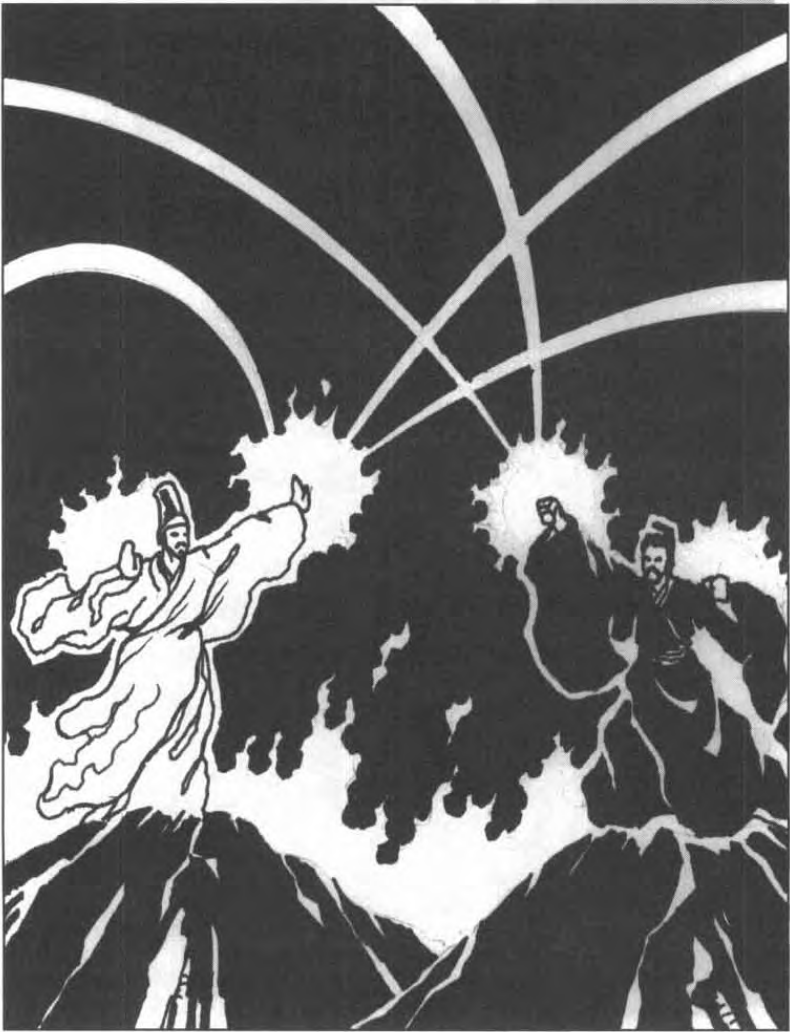
The festival of WICKED LASER BEAMS
Oh, right, months! There are 12 months of 28 days each. Most of the Empire uses the traditional animal names for them but the noble class gives them the names of the great Kami. They are the Hare, the Dragon (sometimes Tortoise), the Serpent, the Horse, the Goat (sometimes Sheep), the Monkey, the Rooster (sometimes the Crane), the Dog, the Boar, the Rat, the Ox and the Tiger. The hours of the day from 6 AM on follow the same pattern. The Kami calendar is arranged as Sun, Moon, Hantei, Akodo, Doji, Shiba, Bayushi, Shinjo, Hida, Togashi, Fu Leng and the month of the Tenth Son, Mankind.
Next: love, Yoritomo and other delusions.
Kyuden Seppun: My Chemical Romance
Original SA post Legend of the Five Rings First EditionKyuden Seppun: My Chemical Romance
quote:
Oyasuminasai, my companions!
Evening has come to our gentle court, with all of its rich splendor and grace. Do you see the rising moon in the heavens? Its cold beauty is more fair than the face of the loveliest maiden - but its wrath is just as deadly. You do not understand, I see? Well, let me grant you the simple wisdom of a woman, used to whispers in the night. You believe that all of Rokugan's dangers lie in politics and wars?
Young one, you have much to learn.
The sparks in a man's eyes when he sees the maiden he loves, the whispers they exchange in the night - overheard by some ambitious Scorpion. These are the most careful negotiations, the politics of love and the warfare between two souls. Marriage? Oh, no, of course not, my friend. Love has nothing at all to do with marriage. Some strange Unicorn must have put that idea into your mind.
Ugggh.
Anyway, more RPG FICTION. Kachiko holds a black go stone while talking to a Mantis courtier. He isn't comfortable in dealing with Kachiko and would much rather talk to her father or brother, but Kachiko reassures him that she is doing the negotiations because her father doesn't want word of the alliance between their Clans known. She rubs shoulders with him and tells him that everything is going to be just fine, and gives him instructions. It's her time to make her play.
By now, Kachiko and Hoturi have spent two months playing their game in the court. The Emperor is calling forth ambassadors and representatives of the Clans, and Hoturi notices Kachiko and her brother Hametsu approaching His Imperial Majesty, but without their father. Apparently they're trying to present a gift, but Hametsu stammers and generally cocks up the formalities - it doesn't help that he only had ten-minute notice that he was going to meet the Emperor in person. When he leaves an overly long pause hang, Kachiko steps in and with perfect manners delivers the gift on behalf of the Shosuro house. She makes sure to move so that attention is kept on her body instead of her eyes, but after the gift-giving ritual is done she dares to look at the Emperor for a moment and sees that she has his complete attention, the dream of every courtier. She can also feel the eyes of the court glaring at her with hatred and Hametsu hisses that their father will kill her for this after they're out of earshot, but she doesn't care.
Neither does Hoturi, who later is talking with Toshimoko and Daidoji Uji. The Mantis Clan has declared publicly in court that they're taking over a Crane shore fortress and that's that. Uji notes that the Crane can retake the fortress with Doji Satsume's leadership, if he returns from the Asako lands, but then there's the snow to deal with. Toshimoko is incensed at the Mantis insult and yells that battles aren't fought in winter, and that Yoritomo (the Mantis daimyo) is sending his men to die, but Uji counters that so will the Crane men. Hoturi tires of their arguing and calls them to order: his father won't be able to make it, but he will lead the Crane. The Doji don't have the armies to take the fortress, so Uji will lend his forces but under Hoturi's command. For once, Hoturi is actually behaving like a lord. Kakita Yoshi walks into the room with news: the Scorpion have pledged their formal support and propose sending a neutral embassador to send to the Mantis, in the name of peace. They'll send... Kachiko. Both Toshimoko and Uji start laughing after a moment of surprised silence - what, the Scorpion think they're going to seduce Yoritomo out of the castle? Toshimoko is laughing to the point of tears, but Hoturi doesn't think this is amusing at all: the stakes of his game have been raised.
At the Crane fortress, Kachiko is talking to Yoritomo, a huge man with a rough voice. He warns her to stay inside rather than coming to the wall to observe the Crane forces, but Kachiko says that she isn't his prisoner and that he should remember their bargain: the Crane prepare their attack , the Mantis honorably withdraw and gain advantage in the Court with Scorpion backing. There's only a problem - Yoritomo wants a fight. Kachiko says that the Mantis will go to the Winter Court and gain the Emperor's favor and abundant trade rights, but Yoritomo snarls that she should watch her words. The Mantis daimyo doesn't give two shits about the game, and that makes the entire situation extra dangerous! Hoturi watches her at a distance, and then a Miya emissary tells him that the Mantis have agreed to negotiate, but the treaty is void if the Crane attack while the Scorpion remain in the keep. Hoturi gives the emissary a letter to give to the Mantis to end the negotiations - an Isawa letter. Yoritomo is really pissed by the letter and has Kachiko called: the trade rights have gone to the Phoenix. Grabbing her arm roughly, Yoritomo calls his men and tells them to throw her off the wall as he has no further use for her, but Kachiko still has one card left. With her life on the line, she coolly tells Yoritomo that she is under the Imperial Protection: her person is sacrosanct and if Yoritomo harms her in any fashion the Emperor's wrath will fall on his head. That gives him pause, but for an ugly moment Kachiko thinks that Yoritomo will take his chances. Eventually he relents, and says that she'll keep her as hostage. The Crane get the message that she will be released for ten thousand koku, and they decide to attack. Crane and Mantis archers trade volleys, but someone betrays the Mantis and the Crane sneak inside the palace. The Battle of Ice and Snow is glorious for Hoturi and he returns with much favor to the Court, but Yoritomo escapes safely - and so does Kachiko, who is nowhere to be found when the Crane break into the fortress.
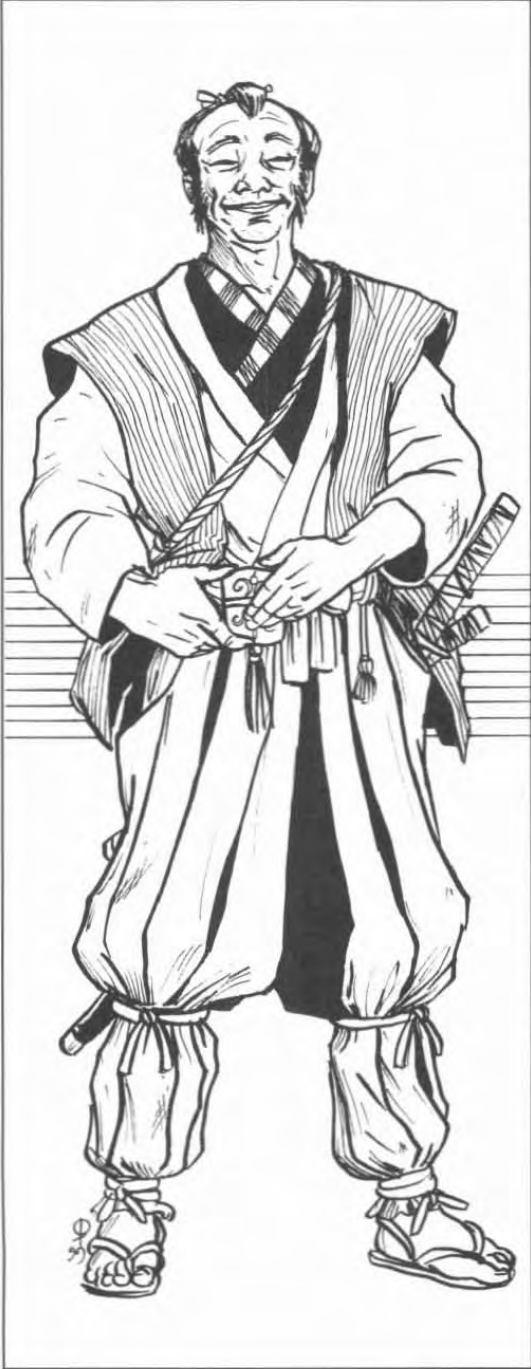
Shinjo Usuia: doin' fine.
So, marriage! It's not done for love because love is for 'lower people.' The Winter Court is a great time to create alliances and cement bargains, and what better way for it than with an arranged marriage? Children of noble lineage are brought to court hoping they catch someone's eye, and samurai seek pairings to better their station, increase their holdings and prestige and so on. Usually, bride and groom are introduced to each other after their gempukku ceremony. As a rule, unmarried men and women in Rokugan cannot be alone together unless properly chaperoned. This is usually no trouble with a samurai-ko with a vow of celibacy (and who would dare to accuse an Otaku battle maiden of betraying that vow?), but this vow is not mandatory, and so male and female samurai are usually not paired together alone even in magistrate duty. The vow is as much a genuine vow as a way to keep rumor mongers from accusing them of 'dishonorable behavior.'
quote:
After all, if a samurai-ko sleeps with a man out of wedlock, she has not only compromised her future husband, but has given her lord cause to question her loyalty by keeping secrets, and allowing emotions to rule her behavior.
Fuuuuuuuuck you L5R.
The most traditional way to not be 'alone' for a samurai-ko is by keeping a kogoto, a handmaiden whose only role is ensuring that she is never in a compromising position. It's not unheard of for the kogoto to be a male member of the samurai's family, and they typically follow her on her duties as a magistrate. Samurai-ko don't stop being one upon marriage, but society places expectations on them as women: they must take care of their husbands' finances and keep an eye on the political climate of their houses and lands. If she wants to and is able to perform both duties, she can be a battle-ready samurai all her life, assuming her daimyo agrees (and husband, if he is of greater status). This also changes from Clan to Clan and family to family: Crane women are more likely to leave behind their kenjutsu training while Matsu and Otaku married women continue serving as bushi. The more traditional Clans and families, like the Crane, the Isawa and the Crab rarely have samurai-ko, and those that exist are often treated as if they had less than their actual honor
Weddings! The traditional Shintao ceremony is celebrated in a Shinsei temple or at the family home. A Shintao priest or the family's shugenja conducts the ceremony, which is only attended by the immediate family members of the couple. Bride and groom are purified with salt, drink sake and read the words of commitment before making symbolic offerings to the kami, the ancestors of both houses, the founder of the house and the Seven Fortunes. After this, they welcome guests at a wedding reception for 20 to 200 people, usually with a representative of the Emperor attending if the couple is of noble lineage. During the celebration, the couple changes clothes several times to symbolize their rebirth, and after the ceremony the bride's new mother in law takes her away to teach her the skills she'll need as a wife while the husband goes on a pilgrimage to a holy place to celebrate it. Spring and winter are the most popular wedding seasons, immediately after and sometimes during Winter Court. Mi-ai is the practice of arranging marriages. The couple aren't expected to love or even know each other. If the participating man (or woman in Otaku and Matsu houses) is old enough they can arrange their own marriage, but usually a go-between is brought in. The mi-ai negotiations consider the social background of both sides, as well as their personalities, financial and political aspects of the union and the children they would produce. A mi-ai interview is not a guarantee of marriage, though, it's just a prospective study. Who stays in their house and who leaves it depends on the marriage. This is no concern if the marriage happens within the same family of a Clan, of course, but samurai-ko marrying into a traditionalist house abandon their own and will no longer be trained in their school techniques, and their children will belong to their father's house. Family daimyo must be alerted of all marriages and Clan Champions must approve all out of clan unions, even when the couple involved are of low political status. On some occasions magistrate, shugenja or governors approve or disapprove marriages as proxies for their lords. Emerald Magistrates may investigate and approve a cross-clan marriage or even refuse to grant the license, but if they are not careful with their reasons the daimyo involved will go over their heads and make them lose honor. Marriages that cause changes in the samurai caste (like a lesser noble marrying the son of the Lion Champion) must be officially approved by the Emperor, though an aide usually handles minor changes. Without this approval, marriages are not legal or binding and the daimyo of the married parties can simply take them away, physically if necessary, and marry them off to someone else or force them into seppuku.
quote:
There's no Romeo-san and Juliet-ko in Rokugan. After being discovered, he cuts his belly open, and her father (because she's lost her virtue to this loser) sells her to a geisha house. Bye-bye samurai caste, my dear Juliet!

Generally, out of clan marriages have the spouse with lesser status join the house of their partner, and there is no going back. Otaku Battle Maidens and female Matsu undergo gempukku earlier than other families, precisely because when they marry they sometimes leave the house and choose not to continue their lives as samurai-ko. In the Otaku case in particular, a mother that bears many daughters gives great prestige to her family, and marriages with Otaku women are based on the prospective husband's ability to produce female offspring, which strikes other houses of the Empire as odd.
 The Otaku also often veto any marriage that takes a Battle Maiden out of the Clan.
The Otaku also often veto any marriage that takes a Battle Maiden out of the Clan.
Traditionally, newlywed husbands visited their wives at a special room in the house of the wife's parents known as the 'wiving house', until their first child was born or the husband's parents died, and then they moved in together. Now married couples live together right after marriage, but the tradition is held in Isawa lands, particularly with the commoners: the groom lives with his bride's family and offers his labor for a certain amount of time in exchange for the hand of the bride. Samurai courtship involves formal nightly visits from the groom to the bride (particularly done in Winter Court so that families can become familiar with each other), and then there is a formal invitation by her parents to share rice cakes with the groom. The courtship and negotiations are arranged by a nakodo, a go-between that helps families negotiate marriages without emotional displays on either side. They are trained in negotiation and courtly functions in order to gain the most beneficial dowry for both sides, makes sure the bride has no dark secrets in her history and so on. The nakodo must pay heavy fines if the bride is discovered to be 'compromised' after the wedding. They also carry carefully curated letters between the prospective partners.
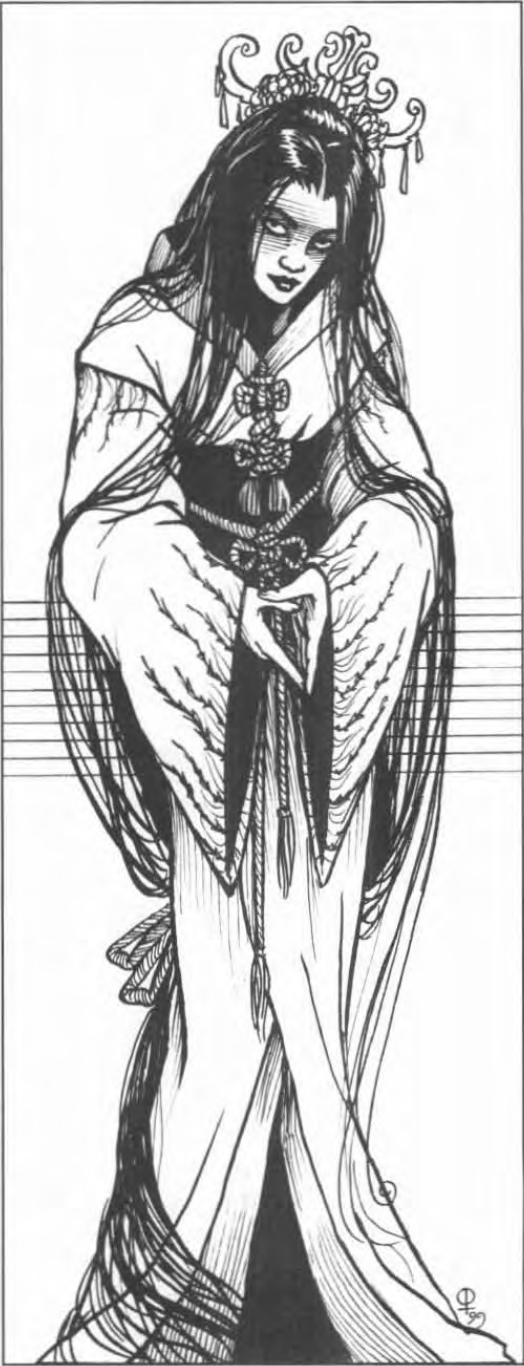
Don't tell me that hair isn't going to flip out and strangle you.
Retirement! When a samurai reaches the age of 40 they are offered inkyo, seclusion. This is the first chance they get to step down from leadership. Further opportunities are offered at ages 50, 55 and 60, after which a samurai shames their family if they remain in society. Traditionally, in retirement a samurai removes themselves from their position and passes on rights and privileges to their firstborn son (or daughter in the Matsu and Otaku families) and then joins a monastery, though many samurai prefer to move to a separate house or lesser quarters in the family's main home and continue serving as samurai without the burden of leadership. Women can retire just as men and couples often choose to do so at the same time to make the transition of leadership in a house as smooth as possible. At age 60 another ritual is held even if someone retired earlier than this, as they are considered to complete a sexagenary circle and thus symbolically return to their birth. Peasants aren't expected to work beyond age 40, though many continue to do so and their lords reward them for it. Peasant retirement is more gradual due to the lesser responsibility. Male samurai often join a sogya, a community of Tao monks. Leaders are often those who retired at an early age or were forced into retirement due to some disgrace. Female samurai can also retire to sogya without any different treatment. Upon joining, they shave their heads (women included) and take vows of celibacy and poverty. They are expected to remember their family and Clan in rituals and often return home to perform marriages, funerals and other ceremonies. Sohei are former bushi that retain their skill to defend the temples and maintain physical fitness.
Let's go to the present with astrological events! Astrology is not extremely well-known in Rokugan, but there have been enough advances for shugenja to make predictions. Indeed, more often than not these come true, and this year many notable events lie on the horizon. This will be a year of heroism, glory and warfare. Some of the most debated events at this year's Court include:
- The return of the Dragon's Tail Star: thought to be the herald of the Unicorn's return to the Empire, this star is said to be the sign of great change. Some speculate this will be the return of Shinsei, others think that the Lion or Crane will attempt to usurp the Empire.
- A brilliant red star: this was present at the birth of the Imperial Heir, and many whisper it marks the Sun's disapproval of the young Prince. It is a portent of darkness and a difficult future.
- A solar eclipse: this is thought to mark the return of a great hero, and the eyes are on Matsu Tsuko and Hida Yakamo, people wondering if they are the reincarnation of some great warrior.
- The alignment of the Weaver and the Kappa: this is an unusual convergence that happens once every hundred years and heralds the rise of the Shadowlands. On the day the stars combined, the Shadowlands did launch a massive attack on Kuni castle (the events of the Twilight Honor adventure book)
- Sunlight raining down as tears of crystal: this happened for three minutes over the Hall of Ancestors of the Akodo. Many of these crystals are being brought to Winter Court to amuse the courtiers. This omen is yet to be interpreted.
- A star falling from the heavens: this one left a mile-long tear in the Phoenix lands and left a strange lump of rock and clay. Astrologers of the Scorpion, Phoenix and Dragon have rushed to the impact site and local monks continue carrying out banishing rituals to send whatever evil spirits infected the star away. The Shiba ambassador leaked before Winter Court that they intended to move the star's 'bones' and perhaps bring them to the Emperor for study.
The impending war between Lion and Crane has rocked the Empire this year. Once it was restricted to minor border skirmishes but now it threatens to break out into full-scale war. Both Akodo and Doji ambassadors are spending a lot of time in obtaining the Emperor's favor. One of the recent battles, on the plains of Gaiju Shindai, involved over five hundred samurai on each side, and the courtiers have used the bloody battle as ground for boons, favors and other political gains. An unpredictable favor in this 'minor war' is the friendship between Akodo TOturi and Doji Hoturi: both are present at the Court, though not talking to each other, most likely on orders of Doji Satsume. To the north, the Phoenix have suffered an 'invasion' of mujina and kappa that harass villages and destroy caravans. The Crab deny it but the Phoenix accuse them of allowing them through the Kaiu Wall to harass the trade of other Clans, and Master of Fire Isawa Tsuke is one of the Crab's loudest critics. This might prove to be the first real conflict between Phoenix and Crab in history. More than words would fly if Hida Kisada or his son were present, but as usual no Hida come to Winter Court, and mysterious Kuni Yori remains the Crab ambassador. There's rumors around him, and public knowledge of his alliance with the Scorpion Champion, Bayushi Shoji. In the South, Nezumi steal everything that isn't nailed down, and the Daidoji refuse the aid of the amused Crab. The ratlings have sent an 'ambassador' (a female named Iyatakko) to the court of Garden Under Shadow City that insists their migration is due to a "bad-bad walking dark, runs strong through the night on many legs." The Daidoji continue to slaughter tribes and the ratlings threaten the peasants in the villages of Earthquake Fish Bay. Another issue is with the Falcon Clan, a minor clan with some rich lands on the border of the Shinomen Forest. A farmer reported the attack of "long, snake-like, green-skinned men" that spoke in strange tongues, and peasants have fled their homes and refuse to work their fields. The Falcon turned to the Crab for help with this strange threat, but they are newcomers to politics and unfortunately implied that the creatures were Shadowlands 'escapees', and so Hida Tsuru conquered the Falcon province and put in Crab peasants to work it. Falcon threats and arguments have done nothing, as the Crab now consider those lands abandoned and that the Falcon did not fulfill their duty to protect the Emperor's people. The Unicorn, particularly the Iuchi (who live close), have offered to help the Falcon for a price, and at this Winter Court a Falcon representative is expected to seal the bargain with Iuchi Daiyu. This might mean that the Unicorn will go to war with the Crab, and many courtiers would like to know what the Falcon is offering that would entice the Unicorn to go to war with their allies - and many more would pay to stop the bargain from taking place.
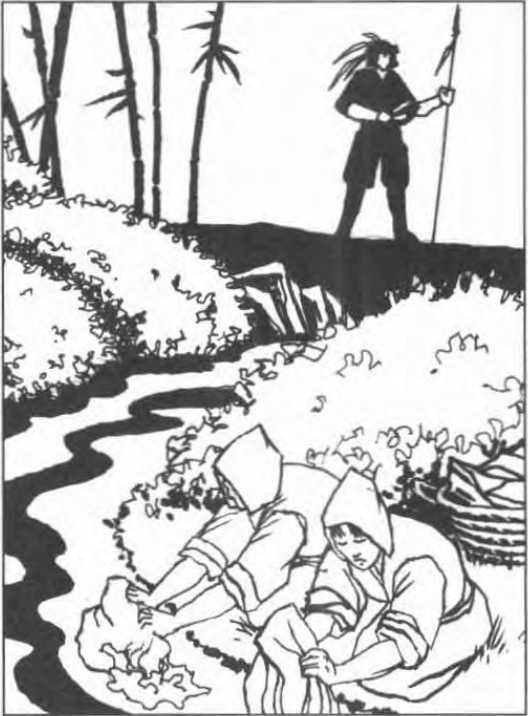
"Fuckin' doomed murderous highborn manchildren." "I hear ya."
Plans and intrigues! Many of these aren't public knowledge and their participants have no desire to make them so.
- The Crab: as mentioned, they've sent few ambassadors as usual to the Hantei. Kuni Yori has a letter for the Emperor to be delivered at the Festival of Lights near the end of winter. Some believe that the war asks permission to wage war on the Unicorn for their intromission in the Falcon affair, some believe that it is a request for the Crab to deal with the Nezumi 'problem' in Crane lands as the Crab dislike the open slaughter of the ratlings but know not all Clans share their positive stance towards the nezumi. Still others, familiar with Hida Kisada's contempt of the Hantei, murmur that the letter is an open threat of war against the Imperial House. In the minds of some, notably the Scorpion, the Crab are on the brink of rebellion against the Emperor.
- The Crane: they have more important matters to deal with than the nezumi attacks on Daidoji lands. For one, there's the war between them and the Lion. At first, the war was laughable: the Crane had a significant advantage in food and other items that the Lion could not risk losing, and the Doji could simply 'cash in' Lion koku that they had saved over the last five years to effectively steal all of their rice and doom the Lion armies to death by starvation, but some unknown source is now supplying the Lion and now their forces are on the Crane border. If the Crane can discover who is feeding the Lion, their courtiers can certainly find a way to stop the transaction. In addition, Doji Hoturi is acting strangely, seemingly distracted and unable to remember his purpose in court. There are rumors of his legendary affair with Bayushi Kachiko, but she is ice-cold when his name is brought up. Kakita Toshimoko believes that he is unhappy with the potential war and the possibility of finding his old friend, Akodo Toturi, on the battlefield. Furthermore, Doji Kuwanan is still held in Lion lands despite his father's letter asking him to come home. The Lion would not stoop so low as to keep a warrior from defending his family's name and lands, so there must be another reason why Kuwanan hasn't returned, and some whisper that he has changed his allegiance.
- The Dragon: as always, little is known of what happens in their territories. The Kitsuki representatives speak glowingly of their Champion's wisdom and loyalty, but little of his plans. But Togashi Yokuni does have plans: he has been seen in Scorpion territories, meeting with Bayushi Shoju. Phoenix spies report that the talk only lasted hours, but that Shoju seemed tense, in a dark mood and unwilling to discuss the matter. As for Yokuni, he was nowhere to be seen.
- The Hantei: for reference, this book assumes that the events of Code of Bushido (reviewed here, it's Wick as hell) happen. If the PCs allow Otomo Yoroshiku to retain her position and if she survives the module she will certainly be at her uncle's court showing off her new husband. Whatever Clan she chooses to marriage, they will have significant advantage in the year's Court and will be allowed numerous small favors. Her true father, Shinjo Gidayu, is also in court, and is central to the Falcon affair: somehow a Falcon spy learned the secret of Yoroshiku's birth and threatened the Unicorn daimyo with blackmail if they don't help the Falcon retake their land from the Crab. Also, the Seppun are sponsoring many challenges and tournaments and other artistic endeavors this Court. Their daimyo, Seppun Daiori, humbly requests audiences with the Akodo and is practically offering tribute to the Matsu, which causes the other Imperial families to quickly rebuke the Seppun for their impolitic behavior.
- The Lion: they have the most attending dignitaries aside from the Seppun themselves, possibly to obtain the Emperor's favor in the upcoming war. Akodo Toturi and Matsu Tsuko are here, though the latter is more interested in obtaining accurate maps on the Seppun-Crane frontier. Akodo Toturi has had three private meetings with the Emperor and has also spent time dealing with Doji Hoturi, Kakita Yoshi and Kakita Toshimoko to bring lasting peace between them. The Kitsu have plans of their own: they have discovered the link between the Nezumi and the Crane and want to exploit it. See, the ratlings claim they are looking for a mystic artifact known as the Bow of Jade to kill the Oni that drove them away from their homes in the Shadowlands. The Crane don't know of this artifact but the Kitsu do thanks to their contacts in the realm of the dead, and have heard tales of a small temple south of the Yasuki palace that might hold the item. If the Kitsu can get the Bow first, the Crane won't be able to help the ratlings and their provinces will continue to suffer. Matsu Tsuko is also demanding that the Unicorn make good on a bargain to provide the Lion with several caravans of rice, but the Unicorn claim that they have been stolen to bandits. The Lions are all but accusing the Unicorn of theft. A major Matsu vassal was ambushed on the way to Winter Court as well, and the Lion claim that Crane treachery spawned the attack. And the Akodo and Matsu rift continues to widen: Tsuko and Toturi are rarely seen in each other's company and already two messengers between the Akodo lord and the Matsu daimyo have been killed for failing in their duties.
- The Phoenix: their reputation as pacifists is being tested this year due to their increasingly thinning patience after suffering the mujina pranks. The Isawa temper has snapped several times in court already as they find their clothes change colors, their hair grows whole feet and entire scouting troops have been sent to the wrong places. What's worse, two mujina have followed their representatives to the Emperor's court. They are desperate to hide the mujina pranks and gain the Emperor's support to get rid of the ones in Isawa lands, and Isawa Kaede has repeatedly attempted to force the Crab to send experienced units to help them. Isawa Tsuke is also in court and threatens to find a way to burn the mujina out at any cost, and the rivalry between him and the Acolyte of Void has grown in the year, which does little for Tsuke's mood. If anyone meets the Phoenix for too long, they will undoubtedly begin to notice the unusual occurrences in their quarters: the Phoenix will try to stall by implying they are spirits bound by Phoenix magics, but as the disturbances grow the Isawa become notably upset and cut negotiations short.

- The Unicorn: they have sent their finest iaijutsu master, Shinjo Usuia, to the Court in order to provide a serious challenger for the position of Emerald Champion. Usuia is a nice guy that has little actual interest in the post, and is into iaijutsu more as a sport than anything else. He wants to meet Kakita Toshimoko in a duel of skill and hopefully improve his technique, and is also interested in the Seppun libraries in order to discover the location of the Ukyo Blade, a gift from Shinjo herself to the Fox Clan that was lost when an earthquake destroyed the ancient Fox palace near Otosan Uchi. Doji Satsume shows no sign of ceasing his duties but he is nearing his age of retirement and might soon be forced out of the post, and the Shinjo intend to seize it as smoothly as possible. Otaku Kamoko is attending Winter Court for the first time. She only became daimyo last spring, and though Ide Tadaji is instructing her in the ways of the court she seems bored, annoyed and unhappy, already committing numerous minor faux pas. Tadaji fears for her life and tries to control her anger, barely averting numerous conflicts between her and Matsu Tsuko. Kamoko is obsessed with avenging her mother and believes the Matsu had a hand in it. The tension between the Lion and the Iuchi is another obstacle. The Iuchi don't have the supplies to send to the Lion, but the Lion wants them anyway. If the Ikoma go to war with the Iuchi, they won't be able to help the Falcon, which will have the Crab moving further north and might end up forcing the Unicorn into a war on two fronts that they cannot win. To avert this, the Ide and Iuchi are furiously attempting to engage the Crane in negotiations to obtain food. The Crane don't know the true intentions of the Unicorn and think their food is going to the Falcon, but they will certainly cut off trade if they find they're unwittingly feeding the Lion.
- The Scorpion: the Scorpion are
quote:
The Scorpion's plans are far too complex to discuss as 'minor notes', such as we've done with the overarching political goals of the other clans.

Anyway, the Scorpion have their mitts on all aspects of the Court or at least know of them all. Their primary interests now are Kisada's seeming hatred of the Emperor and his letter, and the difficulties surrounding the Seppun daimyo. Deep beneath the Bayushi palaces, a deep chasm opened in the Bayushi Labyrinth. The Bayushi assumed the pit was designed to capture and destroy invaders. A group of Yogo lowered one of their own into the pit in an attempt to map out the Labyrinth, and found a room full of scrolls, weapons, items of jade and gold and other strange things, and three skeletons - one of which wore a fractured mask. Bayushi Shoju immediately sent trusted servants and bushi to dig up the small cavern and bring its contents for study, and Yogo Junzo oversaw the operation personally. Both Shoju and Junzo stayed home this year to examine the items, and Bayushi Kachiko has been sent in Shoju's place. After all, the court of the Emperor is work "for ladies and men who cannot handle the strength of the sword," said Junzo.
 Kachiko's spies still bring her messages of what's going on home, and she happens to have a fine obsidian mirror with her, one that her ally in the Yogo brought to her
before his companions found the broken cave. She's yet to discover the full extent of the mirror's powers but sometimes it has shown her activities in the Bayushi palace, as clear as if she were there. Shoju, meanwhile, is looking for the lost Black Scrolls. The Scorpion only have seven; the Phoenix, three; the other two are lost. Yogo Junzo in particular wants them back at all costs, but Shoju doesn't trust his motives even though he could release the forbidden power of the ones he has at any time. Shoju still wonders if he could be the one Yogo to betray the Scorpion's trust. Kachiko is busy supplying the Falcon through the winter, to keep them negotiating with the Crab and the Unicorn, and though she doesn't know what exactly goes on with the Isawa they're taking advantage of it by manufacturing reasons to keep people in the Phoenix quarters as long as possible to make them flip out, which has helped them secure valuable trade agreements that would have otherwise gone to the Elemental Council. She also wants to introduce her son, Bayushi Daiyu, to Imperial society, and hopefully foster him to the Seppun. Kachiko and the Scorpion Clan know how precarious the Throne is: Kisada could make the Hantei line fall with a small push, and the Scorpion intend to stop that or avenge the Emperor's death if it happens, and take any advantage that follows - even if that leads to the Throne itself.
Kachiko's spies still bring her messages of what's going on home, and she happens to have a fine obsidian mirror with her, one that her ally in the Yogo brought to her
before his companions found the broken cave. She's yet to discover the full extent of the mirror's powers but sometimes it has shown her activities in the Bayushi palace, as clear as if she were there. Shoju, meanwhile, is looking for the lost Black Scrolls. The Scorpion only have seven; the Phoenix, three; the other two are lost. Yogo Junzo in particular wants them back at all costs, but Shoju doesn't trust his motives even though he could release the forbidden power of the ones he has at any time. Shoju still wonders if he could be the one Yogo to betray the Scorpion's trust. Kachiko is busy supplying the Falcon through the winter, to keep them negotiating with the Crab and the Unicorn, and though she doesn't know what exactly goes on with the Isawa they're taking advantage of it by manufacturing reasons to keep people in the Phoenix quarters as long as possible to make them flip out, which has helped them secure valuable trade agreements that would have otherwise gone to the Elemental Council. She also wants to introduce her son, Bayushi Daiyu, to Imperial society, and hopefully foster him to the Seppun. Kachiko and the Scorpion Clan know how precarious the Throne is: Kisada could make the Hantei line fall with a small push, and the Scorpion intend to stop that or avenge the Emperor's death if it happens, and take any advantage that follows - even if that leads to the Throne itself.
Let's wrap this up by talking about history. There are two dating systems in Rokugan. First is the Emperor's Right, refering to the time the current Hantei has reigned, so dates are like "the fourteenth year of the reign of Hantei XIX" This causes some difficulty when the Emperor dies since the name of the year changes immediately, to say "the first year of the reign of Hantei XX" Since the dates refer to the year in which the Hantei was crowned rather than born things become confusing. The years are also refered to in the same order as the months by the animals that favor them ("the second year of the Rat in the reign of Hantei XIV"), which makes entire historical scrolls incomprehensible with small omissions. A second, less common way is the Isawa's Calendar, which dates events since the 'mythical' founding of Gisei Toshi.
So, have a small list of events!
- First and second centuries: the founding of the Mantis Clan and Fox Clan.
- Third and fourth centuries: Battle of Cherry Blossom Lake. Minor skirmish between Phoenix and Lion resolved with a treaty at Mamoru Kyotei Toshi. The Unicorn meet a gaijin called Moto in their journeys. The Crab-Crane War. The destruction of the Snake Clan by the Isawa.
- Fifth century: the first gaijin ambassadors arrive at the Imperial Court. The gaijin invade and occupy White Stag. Battle of the Raging Seas and Battle at White Stag. Gaijin influence purged from Rokugan. (Five hundred years in the past!? Fucking fantasy stasis.) The Mantis receive the family name Gusai. Matsu Itagi goes to the Shadowlands. The Unicorn fight the Living Darkness. The Victory with No Strike and the foundation of the Asahina family.
- Sixth and seventh centuries: first battle with Iuchiban and the Bloodspeakers. Battle of Kenson Gakka. The Mantis shame their name by attempting to assassinate the Emperor. Their noble family are granted seppuku and the name Gusai removed by decree.
- Eight and ninth centuries: attack by the Shadowlands against the Crab. Loss of Hiruma Castle. Battle of the Cresting Wave. Battle of the Sleeping River between Iuchiban and the Clans. Asahina Yajinden is sentenced by the Asahina. The castle at Morikage Toshi is destroyed and ghosts haunt it to this day. Sparrow Clan formed from disaffected Crane samurai. Agasha Kitsuki forms the Kitsuki family. Daidoji support the Crab against the Shadowlands across the Tidal Landbridge. The Return of the Unicorn and their assault on the Kaiu Walls. The Unicorn fight the Lion and Scorpion in the Battle of White SHore Plain. Agasha Daijoku discovers the secret of Agasha's code. Battle at Kyuden Tonbo.
- Tenth and eleventh centuries: Night of Falling Stars, Crane lose Shiro no Yojin to the Lion. Wasp Clan formed by Tsuruchi, granted Minor Clan status by Hantei the XXXVIII.
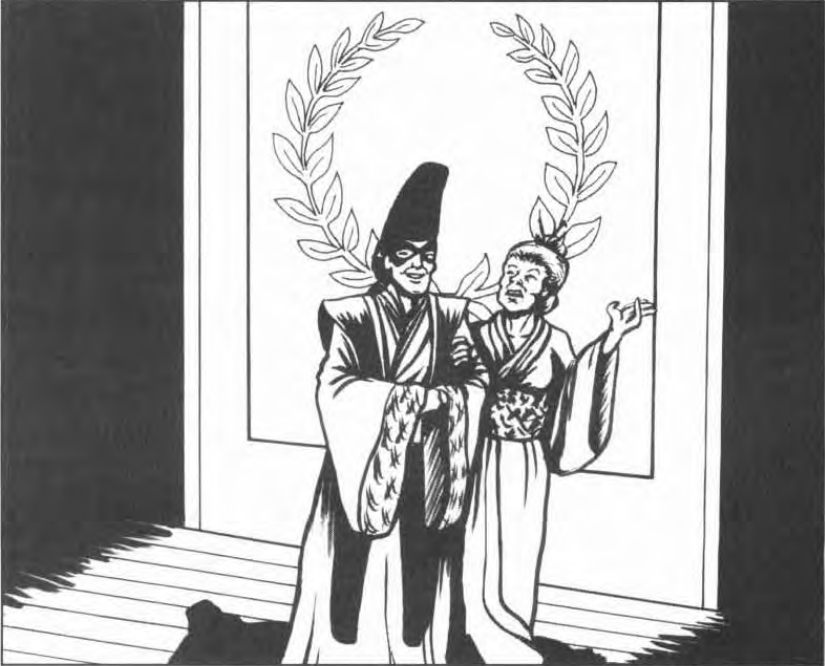
"But Pa, I'm telling you! Kids these days, they have no respect." "Yeah, Ma. Yeah."
Next: the bomb explodes.
Kyuden Seppun: :catstare:
Original SA post Legend of the Five Rings First EditionKyuden Seppun:

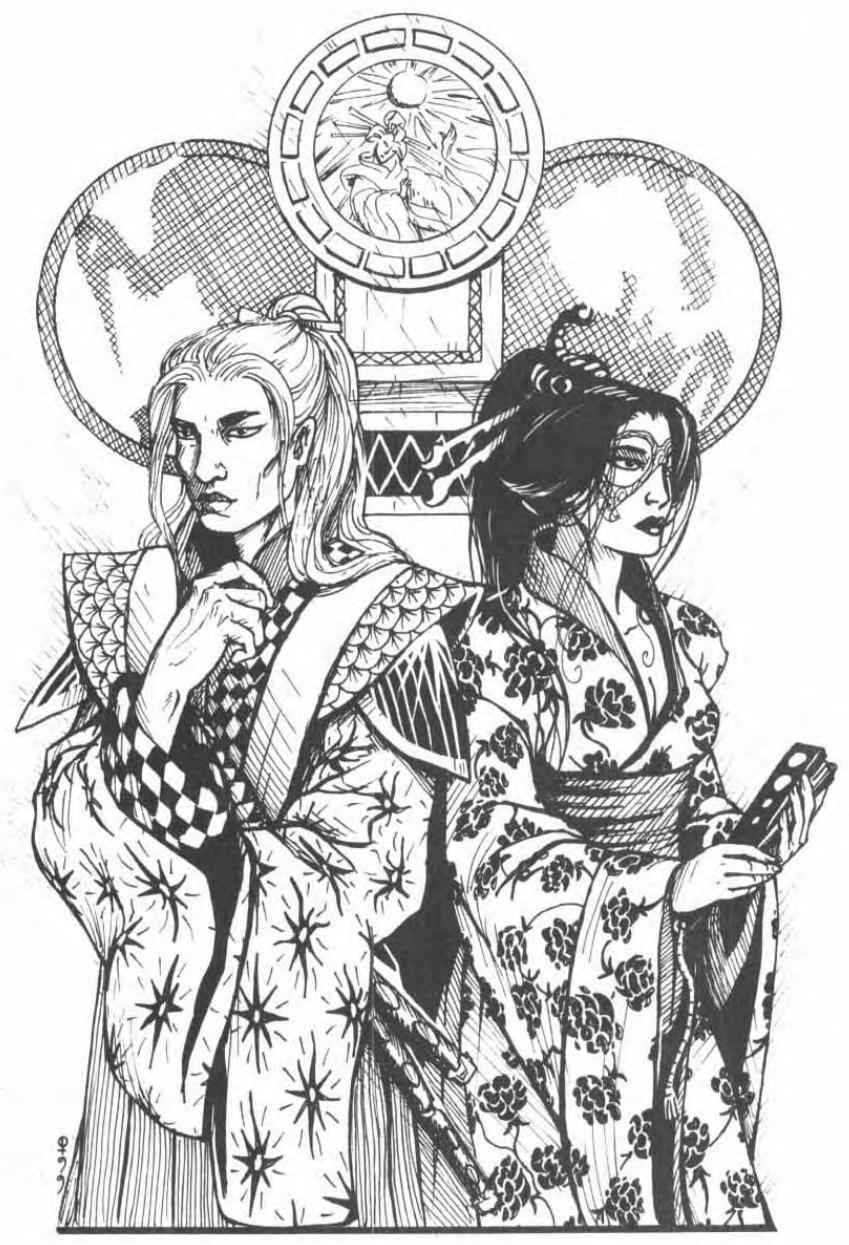
Fuuuuuuuuck youuuuuuuuuuuuuuuuuuuuuuuuu
Let's wrap this fucking RPG FICTION up. Kachiko strides across the hallways of Kyuden Seppun, followed by her chambermaids. Who are gossiping to hell and back, even though Kachiko is like, right there and can hear them just fine. They're talking about how she's been with "the Doji", and how Shoju is furious! Who would want to marry the Scorpion Champion anyway? Kachiko stops and makes some comment about spring, while inwardly smirking about how her maids - the spies of her late father - will be married off to the sons of a minor Kitsuki lord and off her back soon. Very sad, and very appropriate!

She then goes off alone to see Hoturi. By now, they're basically head over heels for each other, and their game has been the most interesting thing. There's rumors floating around in court regarding their meetings, but no one is able to prove anything, and most assume it's just a sexual fling instead of THE GAME. They talk about the game some more, but of course, they're not really talking about the game. The game, the game, the game. They both hold up their hands towards each other, thiiiis close to the forbidden pleasures of holding hands together, but they stop short of closing that line. Kachiko and Hoturi both think the same thing: he will come tomorrow, and the final game must begin tonight, whatever the price. At the same time, another figure strides through the corridors: it's the Phoenix Clan Champion, Shiba Burisagi. He has been very busy trying to figure out the causes for the authentic chaos that has wrapped the Winter Court these months, thinking it was the work of a Shadowlands power or secret cult; instead, he found two children playing at games, but now their cruel amusements must end.
At night, Kachiko steps out of her chamber, alone, leaving her brother and maids all soundly asleep. She has plans in her head, but they are cut short by the appearance of Burisagi, who isn't in the mood for games of any sort. The Phoenix accuses her point-blank of being behind the chaos that has wracked the Emperor's court, the lives and futures ruined by her games and pride. Kachiko tries to deflect the accusations, but when Burisagi says that he will bring her head and that of her lover to the Emperor, she finally snaps in anger threatening that her accuser will not lay a finger on her, or him. Burisagi laughs darkly at the sole show of real emotion from the Scorpion.
And then, this happens.
quote:
"Now I see that your hatred of our clan has led you to this." She reached for the collar of her kimono and tore, the thin fabric shredding beneath her fingernails.
Surprise rocked his face. "What are you doing?"
Another rough yank, another sound of tearing fabric. "Your words were sweet, dear Phoenix, but convincing my maid that my brother wished to see me here, alone... that was breathtaking."
"Woman. I do not understand..." Burisagi backed away another step, toward the lighted ground of the court. Inside, music played and courtiers watched the play, unaware of the dangerous dance just a few feet away.
"Did you think to kill me once you had defiled me, or were you content to let me live with the shame?" Her hands reached up, pulling at her hair, tumbling it down in disarray.
"No..."
Her scream of fear and outrage broke the still beauty of the court.
The Emperor and his entourage come into the scene, finding Kachiko on the ground, sobbing and her clothes torn and sullied. She points one finger at Burisagi, who can't even begin to explain himself before the Emperor points his fan at him. And then Doji Hoturi cuts his head off.

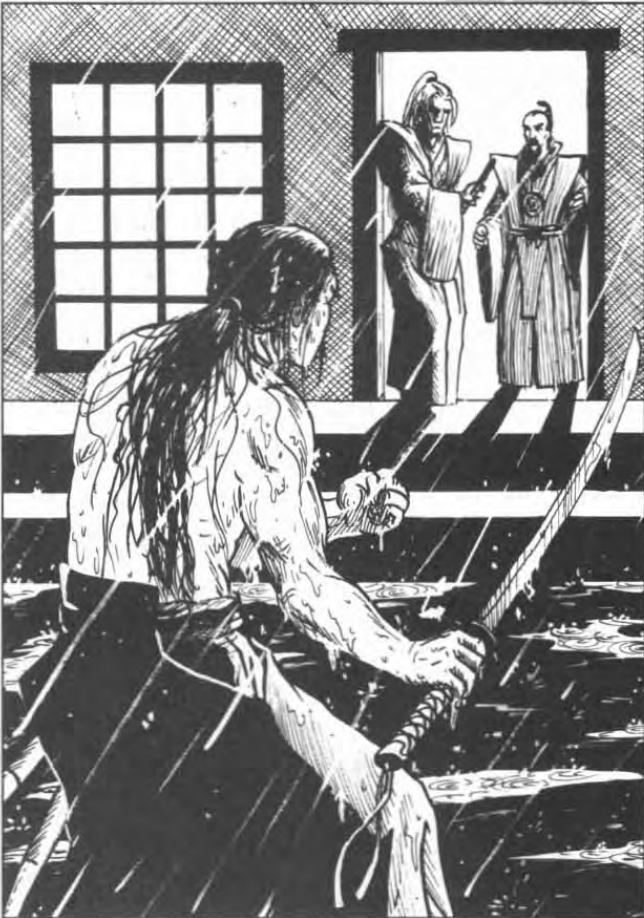
"Curse your plot armor!"
Toshimoko compliments his student on the perfect cut, but says that he should have allowed the Phoenix to draw his blade first as a man of honor. Hoturi counters that he was a man of honor, but not a man of the Code: a true samurai would have been always ready for death. His eyes meet Kachiko's and for a moment there's a faint glimmer of unity, and then it's gone. Next day, Shoju arrives and marries Kachiko, who is now Bayushi Kachiko. Despite all the rumors, she is one of the most powerful women in the Empire now, and the Emperor himself offers her a place at his side as advisor and says she will always be welcome at his court. The wedding breaks a lot of hearts, including Hoturi. Later, she has her wedding night with Shoju, a man that wants her beauty and also knows of the power of his mind, a man that can understand her strength - but one she can never love.
quote:
In the half-light of the new moon, Kachiko looked into Shoju's eyes and reached for the scarlet cords of his elaborate mask. His hand stopped hers, trembling with desire, frustration and understanding.
As for Hoturi, he IRRADIATES LOSS and has a
SPOILERS: KACHIKO AND HOTURI FUCK LIKE RABBITS.
Alright, some fucking actual game content at last! First, new skills. Falconry is the ability to train birds of prey. It takes two months to train a bird at 12 hours per week, with a Free Raise every 8 extra hours per week or every extra month. Each week short of the minimum two months increases the TN in 5 and no less than 10 hours per month can be spent on training. TN 20 each week to make training stick or else another week must be added to that. Once the training is done the falconer rolls a contested roll against the bird's Intelligence, and on a success the bird is loyal, with Raises making it able to understand more complex commands. Stats for birds? Figure them out yourself, sucker. Obiesaseru is a specialized form of Intimidation used to put the fear of Amaterasu into samurai. It can only be used by Imperial Guardsmen or Emerald Magistrates on duty for the Emerald Champion. Contested Obiesaseru roll against the target's Willpower to freeze them for one round, with Raises used to increase the number of frozen rounds or people affected. Frozen characters can flee or defend themselves but can't attack the intimidator or anyone behind them. Against non-humans or non-Rokugani, it works the same as regular Intimidation. The character using it must have some sort of visible Imperial badge of office. New Advantages: Imperial spouse (2 points) gives a PC a Seppun or Otomo spouse and thus access to the Imperial Court, reliable and speedy news of courtly happenings and invitations to events, audiences and such. On the other hand, the Imperials might take action if they feel the life of their 'cousin' is in danger and will generally drop off with little warning to see that they're being well-treated.
Gentry basically gives a PC land. Most samurai have no land and instead are paid stipends by their lord. Having land means being able to collect taxes from it, but it also carries responsibility for its security and administration. It costs 5 points to get a single village to tax and govern, with more villages costing another 5 points each, 1 extra point per farm, 2/4/6 points for Holdings like blacksmiths, mines, sake works and so on and 2 points for Followers (10 Rank 0 samurai every 2 points, samurai must be at least Rank 2 to have Followers) There are two harvest periods per year, and at those times the PC and their men should go out to collect taxes. One die is rolled per farm (each village is counted as a farm), and these dice may explode. That's the total koku the character gets, plus 3/4/5 koku per Holding and another 5 koku per village. From these they must pay at least 3 koku to their lord and 1 to each samurai under their command. There's also a small table to roll on to represent events like poor harvests and bandits that take away koku dice, bountiful harvests that give more koku dice, and "unusual or supernatural events" that are excuses for GM fuckery. GMs are also encouraged to outright give players villages at Rank 2.
New disadvantages: Cruel (3 points, 4 for Otomo) makes the PC a cruel jerk. They're expected to behave cruelly, can't ever spend their last Void Point or raise their Void above their lowest Ring. Spoiled (3 points) makes the character a spoiled brat, and it works something like the Compulsion disadvantage: Willpower roll against TN 15 when they see something (or someone) they might want and on a failure they must do everything they can to procure the object of their desire or similar.
The Imperial Families and Schools are here! Only Seppun and Otomo, though, Miya will have to wait. Hantei are not recommended as PC material, though they don't get much in the way of rules anyway, only that they can have any High or Bugei skill in the game because you're not telling the Emperor that this is a special secret skill of a Clan or whatever. The Imperial Schools are restricted to Imperials generally. Only after calling in some hefty favors can Clan samurai attend them and even then only those with real noble blood in their veins (at least 5 points of Social Advantage), and Seppun and Otomo PCs have to spend at least 3 points in Social Advantage just to be able to play. Also, Imperials can't learn Kaze-do or any Low or Craft skill. Seppun and Otomo PCs can buy Benten's Blessing for 2 points due to their Crane ties, but if they do they must also get a 2-point Obligation to their house.
The Seppun family (+1 Willpower) teach the Seppun Miharu school of Imperial Guardsmen. +1 Perception, 3.5 Honor. Only Seppun (or rarely, other Imperials with Seppun mothers) can attend. The training is grueling and generally Seppun graduate earlier than other samurai. They're trained in iaijutsu, but mostly to draw their swords quickly in emergencies; the Emperor has the Emerald Champion and a buttload of Kakita duelists to stand for him in matters of honor. There are only a few hundred miharu in the Empire and most of the Imperial Guard is actually composed of Lion and Crane bushi, and thus the Seppun train a little in their schools - not enough to pick up their techniques but enough to know how they fight together, and so they can buy Lion or Crane Allies at one point less. Their skills are Archery, Battle, Defense, Etiquette, Iaijutsu, Kenjutsu and Obiesaseru.
- Rank 1: the miharu may add and keep their School Rank to any Willpower or Honor roll to resist temptation away from their duty, including fear, fatigue, seduction or the pleas of their own dying children.

- Rank 2: for the first round of combat the miharu may roll (Perception) extra dice and keep an extra die, and they may make a simple Perception test to avoid being surprised by ambushes and such. The TN is 5 x the ambusher's Honor, but school-trained assassins get to roll 5 x their School Rank instead.
- Rank 3: the miharu may roll their Honor against a TN of 5 x target's Awareness to see through physical disguises, magical illusions, ninja magic, Oni shapeshifting powers, Shosuro acting and so on. The GM may also set a TN to use this ability against traps, hidden doors and other items.
- Rank 4: the miharu gets two actions per round, which can be used for attack or anything else.
- Rank 5: the miharu selects a character to attune themselves to, and when they are within (School Rank) yards of the character they're guarding they can reflexively spend one Void Point to transfer any damage or harmful spell effects to themselves. This works even if the bushi's eyes are closed, their back is turned, they're sleeping or whatever. The attuned character must be declared at the beginning of each day and the ability lasts until the next morning.
Pretty cool school, but it's going to be hard to justify them being away from the Hantei line.
The Otomo family (+1 to any mental trait) teach the Otomo Seiyaku school. +1 Intelligence, 3.7 Honor. Seiyaku is the Rokuganese word for "covenant" or "agreement", and these courtiers work to further the Emperor's power and keep the Clans from uniting against the Imperial line. Their skills are Courtier, Calligraphy, Etiquette, Kenjutsu, Obiesaseru, Manipulation and Law.
- Rank 1: the courtier can, once per week per rank, speak to their contacts in their family and across the Empire and thus they get to learn one GM-determined critical fact about the adventure.
- Rank 2: the courtier gets to be present even in inter-clan negotiations as the Emperor's eyes, and any time someone actively disagrees with them or publicly accuse them of distorting the truth they lose the courtier's School Rank in Honor points. If the disagreement occurs in private, the courtier can spend a day spreading rumors in a public setting like court or a city and make an Intelligence + Courtier roll against the target's Honor x 5 to make the Honor loss stick. The courtier can't reduce Honor through rumormongering without actual basis, however.
- Rank 3: if the courtier spends at least ten minutes talking to someone, they can slant the facts to imply the most horrible outcome possible. For instance, they can mention that a certain Lion is hot-tempered and people will start bringing many guards to any dealings with that Lion as they now see him as horribly rude and violent. Or they can say to a Crane that they know the Crab are doing training exercises in their borders and the Crane will think that their nearby lands are unprotected and mass forces against the "incoming attack." They must succeed at an Intelligence + School Rank roll against a GM-determined TN that will vary depending on the complexity of the action and the amount of truth the courtier offers, and if they use their Rank 1 technique first to gather relevant facts they get a Free Raise to their roll.
- Rank 4: the Hantei notice seiyaku of this rank; now, the courtier has the Imperial Protection and no one will challenge them to a duel or otherwise attack or injure them unless the aggressing character has a Glory of 7+, the permission of the courtier's daimyo, the Emerald Champion or a member of the Hantei family. If someone doesn't have at least one of these and still attacks the courtier, they will be executed immediately without a trial, have their family name removed from their Clan's rolls or end up with their hands and feet cut off and their sword broken.
- Rank 5: the courtier may spend a Void Point to force a samurai to do as they wish. If the person does not obey and their Honor is less than that of the courtier, they'll be forced to become ronin or commit seppuku. If the command contradicts or dishonors the samurai's daimyo, they may spend 2 Void Points to carefully refuse the command with honor. If a PC samurai agrees to a seiyaku's command and dies in the attempt, they get to use the Kharma Rule for their next character with an extra free rank to a Trait, their Honor or their Glory.
Yikes. These guys can wreak havoc if allowed, but probably are the courtier school that relies the most on having the GM tailor the campaign to them, even more than the Doji courtiers.
Important NPCs!
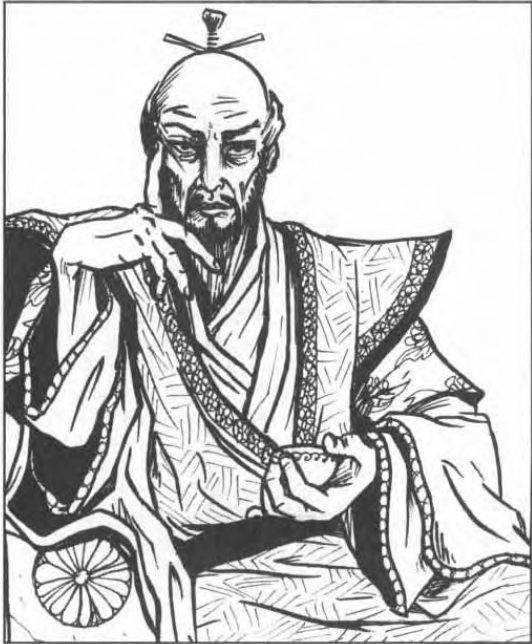
"Can you doomed highborn manchildren cut the crap for ONE SECOND? No? Okay, fuck it."
The one, the only, the Emperor of Rokugan, Hantei the 38th! He is an aging man, over 45 years old ("aging?"
 ) His son, Sotorii was born to a young Crane concubine many years after his wife died. Immediately after his birth the Emperor married the concubine and made her Empress, but she died only three years later. Known before his enthronement as
Hantei Jodan, the Emperor used to be a daring young prince full of dreams of a better Empire, but now he is weary, aged and bitter against an Empire that seems eternally divided against itself. He is an unusual man and his greatest desire is to retire and leave behind him a fragile peace for his son to inherit and upon which the glories of the Empire can be rebuilt. Some courtiers see the Emperor and realize that he is not the epitome of honor he is said to be, but they don't understand the burden that is upon him. The Emperor must sacrifice himself for all things, and the glory of the Empire is the honor of the Emperor. Kakita Bushi 5, low in Rings (though individual stats like Intelligence or Awareness are high) but almost makes his Insight score on sheer skills. Honor 3 and the only NPC with Glory 10 for obvious reasons. Also, knows how to handle a tetsubo.
) His son, Sotorii was born to a young Crane concubine many years after his wife died. Immediately after his birth the Emperor married the concubine and made her Empress, but she died only three years later. Known before his enthronement as
Hantei Jodan, the Emperor used to be a daring young prince full of dreams of a better Empire, but now he is weary, aged and bitter against an Empire that seems eternally divided against itself. He is an unusual man and his greatest desire is to retire and leave behind him a fragile peace for his son to inherit and upon which the glories of the Empire can be rebuilt. Some courtiers see the Emperor and realize that he is not the epitome of honor he is said to be, but they don't understand the burden that is upon him. The Emperor must sacrifice himself for all things, and the glory of the Empire is the honor of the Emperor. Kakita Bushi 5, low in Rings (though individual stats like Intelligence or Awareness are high) but almost makes his Insight score on sheer skills. Honor 3 and the only NPC with Glory 10 for obvious reasons. Also, knows how to handle a tetsubo.
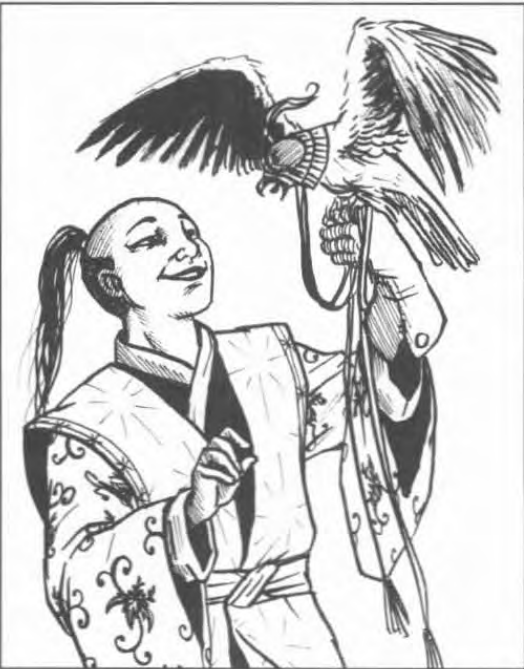
Stay safe, kiddo

Hantei Sotorii is a ten year old kid, as brash and impetuous as any kid his age. He enjoys falconry, swordplay and stories of his ancestors, and strives to be worthy of the blood in his veins! But, he has a dark secret... he doesn't want to go to sleep. Because in his dreams, for the last few years, something dark lurks, a voice that whispers to him of blood and revenge. He doesn't know who the voice belongs to or why it has chosen him, but he fears the night. There's also a cute story about how in the last year he went to the Otaku lands but an Otaku Battle Maiden barely older than himself stopped his caravan and told him to go home in polite but curt terms. The Imperial Guard wasn't too pleased, neither was the Battle Maiden contingent, until Sotorii stepped out of his palanquin to address the Unicorns as best he could. Though he managed to fuck it up by calling their commander a "girl" (which almost made her draw her sword) he ended up learning that the local river had washed away the banks and the palanquin could not proceed. The Maidens had crossed the river by riding. Now, the Otaku have given a pair of mated steeds to the Emperor for two hundred years, but no Emperor had ever rode them, only the Otaku women. Until Sotorii shrugged, said he would, and to the surprise of literally everyone managed to make the Battle Maiden's otherwise stubborn warhorse calm down. The Battle Maiden, truly impressed, got him up the saddle, and the young prince has sworn since that day that the herd racing through the Emperor's plains will serve their new leader with honor.
 Kakita Bushi 0, with very low stats since he's, you know, a ten-year old. Also Dark Secret (The Voice)
Kakita Bushi 0, with very low stats since he's, you know, a ten-year old. Also Dark Secret (The Voice)

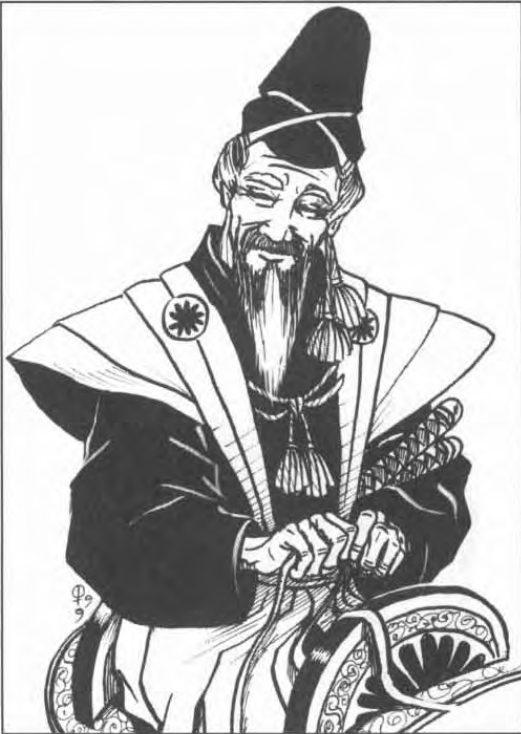
He knows who the real heroes are.
Miya Yoto is the aged, weak daimyo of the Miya family, who continues to impress the Empire with his insistence on peace. He's a skilled negotiator, always trying to find the best, most amiable solution to any situation. Recently, he has passed on the mantle of Imperial Herald to his son, Satoshi, and though not officially retired he's been preparing for it for the last three months. Many believe he'll finally shave his head and join the monasteries at this Winter Court. He is a distant descendant of the famed ronin poet, Rezan, and has sparked a bit of a scandal with his high-minded view of ronin. For years he has struggled to bring the wavemen to a better light in the Empire, and has even invited the now famous ronin shugenja Koan to the Miya palaces. Because of his outspoken views many think it would be for the best if he retired to teaching at the Miya school and let his son handle family affairs. However, Satoshi isn't all that his father would want him to be: he has no respect for ronin or the Minor Clans, and although Yoto struggles to change his mind Satoshi refuses. When he is the Miya daimyo, the Minor Clans will gain a powerful enemy in the Imperial court. Both are attending this Winter Court, and both deny any rumors of the change in leadership. Yoto is a Doji Courtier 4, below Insight, with Benten's Blessing and Voice. Also, Gullible

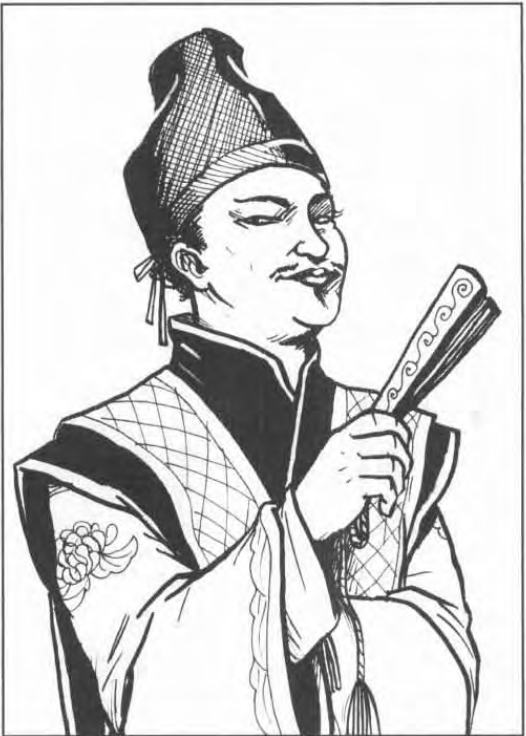
Just one magic scarf away from being a wuxia villain.
Otomo Banu has as his fondest childhood memory his father beating a villager to death. He was only five, but clearly remembers how his father lashed the peasant and then had his village headman put to death for "standing by and doing nothing." A few months later, his father died, and his mother had little time to raise him so she left him in the care of an Otomo sensei, Otomo Gayuko, who was bitter and unforgiving towards the young man. At the age of 13, he had a distinct vision of what he wanted and how to treat people. He grew to become a cruel but tempered individual, mastering the arts of manipulation and deception. He is an effete man, and his attendants are all lovely young men with little respect for station or authority
 But he behaves as if beyond reproach, entirely concerned with his looks and attaining power and forgetting about his duties. He takes great pleasure in the discomfort of annoyance of others and often sets events in motion to make a samurai look foolish and then draw attention to them. After all, he is Otomo - who would dare touch him? (The PCs, probably.) Otomo Seiyaku 2, with really low stats and Insight, but otherwise not much to look at. Even a starting courtier PC could give him trouble.
But he behaves as if beyond reproach, entirely concerned with his looks and attaining power and forgetting about his duties. He takes great pleasure in the discomfort of annoyance of others and often sets events in motion to make a samurai look foolish and then draw attention to them. After all, he is Otomo - who would dare touch him? (The PCs, probably.) Otomo Seiyaku 2, with really low stats and Insight, but otherwise not much to look at. Even a starting courtier PC could give him trouble.
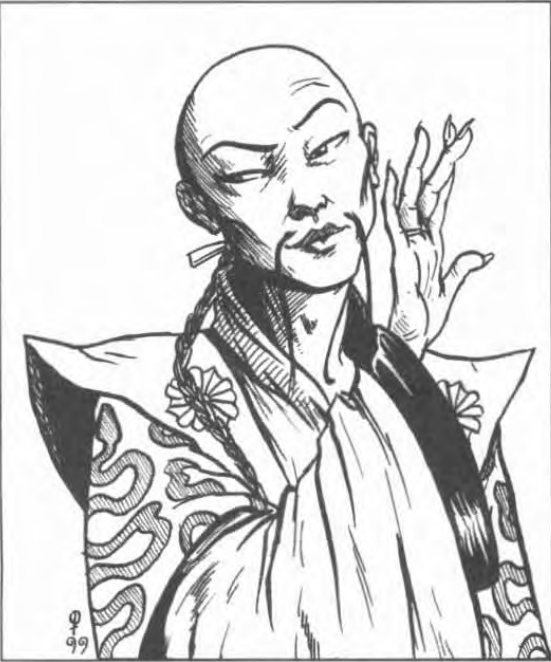
Another one for the list of people to kaze-do out of existence.
Otomo Sorai is the Otomo daimyo, thin and ineffective-looking but responsible for more trouble than any other three Imperial courtiers combined. He grew in wealth and splendor, and as a spoiled child he soon grew bored with his privileges. He ended up finding new entertainment in manipulating his playmates, starting fights between rivals and engineering disputes over toys. He then graduated to the palace servants, thoroughly enjoying their misfortunes, and his family recognized his raw talent for manipulation. By the time of his gempukku he was already a political player, and not even Scorpions could match his ability for control. His family impressed on him the duty to the Emperor and then set him loose. As a seiyaku, he has been a smashing success, thoroughly destroying alliances between Clans with a few words, starting wars and toppling daimyo. The pointless bloodshed he engenders has never troubled him: a few thousand dead are perfectly desirable as long as his targets are occupied. He's never forgotten his duties, though, and only inflicts damage on those who would threaten the Emperor, but he still enjoys playing and watching his "playmates" scurry around. He's also very good at hiding the damage he causes, and to most of the Court he is just a dignified, honorable man above petty squabbles, warm and friendly. Otomo Seiyaku 5, again with terrible stats for someone of that Rank.
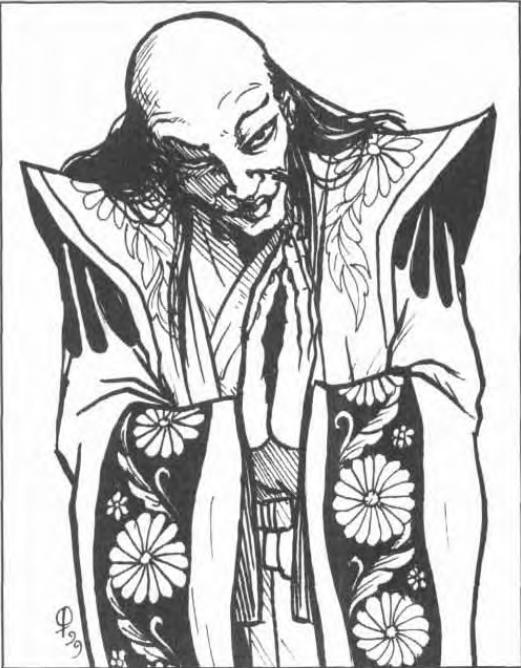
Living the dream.
Seppun Baka is the Emperor's Chief Historian. Most Isawa can't match his knowledge of the Tao of Shinsei or the Prophecies of Uikku and none can deliver the appropriate sermons as sweetly as him. As a child, he wanted to become a holy man and studied sacred texts with zeal, but he grew enthralled with the opulence and pomp of the court and vowed to live his life in luxury instead of seclusion. Thanks to his dedicated study and his family position he secured a post in the Emperor's library upon coming of age, and soon the Emperor came to depend on him for advice as he always had an answer for his questions on Shinsei or the beliefs of the Kami. In a few years he went from a simple historian to one of the close circle of Imperial Advisors, and he's been eternally grateful to the Emperor for the opportunity since. He is the most openly fawning of the advisors and despised by the court as a sycophant, but he doesn't care. Many have sought to control him, but all efforts have been rebuked: the Emperor will not have his favorite sullied by Clan interests. And, since Sotorii also looks up to him, Baka might just be the Emperor's favorite sycophant for the rest of his life. He is small and dresses in dark robes, always coated in expensive Unicorn perfumes, and constantly speaking of the humility of his position and how "unworthy" he is of holding it. Some find his talk soothing, some just want to throttle him, and over the years he's become quite experienced at telling one from the other. Doji Courtier 4, again with low stats, relatively few skills as well. Sworn Enemy (many)

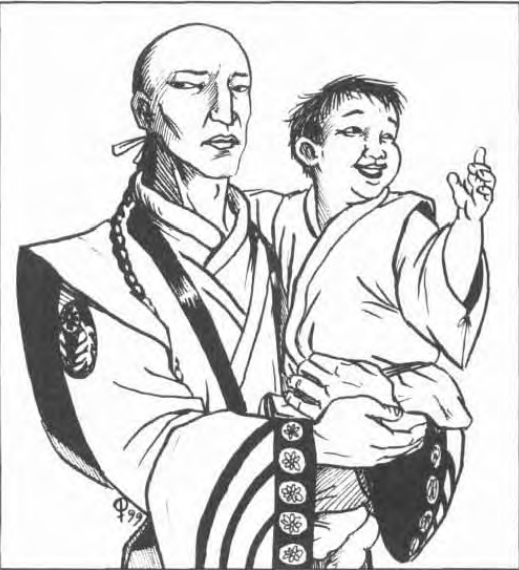
Don't talk to me or my son ever again.
Seppun Daiori is the Seppun daimyo. He's only been daimyo for seven years but he already looks aged and stern, as if the weight of the Empire rested upon his shoulders. He was companion to the Emperor as a youth and served in the frontline as a miharu, leading a career of honor protecting dignitaries and taking many wounds in the line of duty, serving as Captain of the Guard for many years. He still bears a scar on his left hand from an incident ten years back when the Crab attacked an Otomo envoy. Since then, he's been of little use to the Guard, and ended up in an advisory position. At 35, he's aging but not yet 'old', and thought of serving until retirement but ended up ascending to the lordship of his house when his brother, the former Seppun daimyo, died during an oni attack. He is unfit for leadership in the court, but his military bearing has served him well and has raised his family's influence to new heights. Their influence has allowed the Crane to keep the city of Toshi Ranbo, kept the Unicorn from attacking Kyuden Ikoma and maintained peace between the Crab and the Iuchi over the Falcon villages. At the court, he seems distracted and speaks sharply when called to attention, and spends much time in the Lion quarters though his influence seems to be behind the Crane. Since the death of the mother of his son, Hotaitaka, he has raised him alone and refuses to leave him to a nurse. Hotaitaka is a happy four-year old and any who treat him with care and courtesy will gain his father's approval
 BUT! Daiori has a lot of things going on. Seven years back, he was traveling with his brother when their caravan came under attack. Akodo Kage, head of the guards, tried valiantly to save the Seppun daimyo and failed. Daiori learned why later, as Kage intended to put him in the Seppun throne and control him. Daiori refused, but Kage produced many guardsmen that would testify that he was at his brother's side when he died, and that the wound that killed him was done with a small knife at close range. The wound that Daiori took in that battle never healed properly and he's taken to consume opium painkillers prescribed by Soshi Bantaro of the Scorpion. Since then, he's been in Kage's camp, though that doesn't mean he's always been for the Lion. He now waits for Kage's instructions about the Crab and the Unicorn, and hates being a pawn, but fears incrimination and anything that would happen to his son. He knows Hotaitaka is not his, but loves him as his real child, and his wife died in mysterious circumstances when he stood for the Fox against a questionable Yasuki merchant. Kage sent a note regretting her death and asking about his son's well-being.
BUT! Daiori has a lot of things going on. Seven years back, he was traveling with his brother when their caravan came under attack. Akodo Kage, head of the guards, tried valiantly to save the Seppun daimyo and failed. Daiori learned why later, as Kage intended to put him in the Seppun throne and control him. Daiori refused, but Kage produced many guardsmen that would testify that he was at his brother's side when he died, and that the wound that killed him was done with a small knife at close range. The wound that Daiori took in that battle never healed properly and he's taken to consume opium painkillers prescribed by Soshi Bantaro of the Scorpion. Since then, he's been in Kage's camp, though that doesn't mean he's always been for the Lion. He now waits for Kage's instructions about the Crab and the Unicorn, and hates being a pawn, but fears incrimination and anything that would happen to his son. He knows Hotaitaka is not his, but loves him as his real child, and his wife died in mysterious circumstances when he stood for the Fox against a questionable Yasuki merchant. Kage sent a note regretting her death and asking about his son's well-being.
 Seppun Miharu 4, on the level with Insight, shame about his Chemical Dependence and Permanent Wound.
Seppun Miharu 4, on the level with Insight, shame about his Chemical Dependence and Permanent Wound.
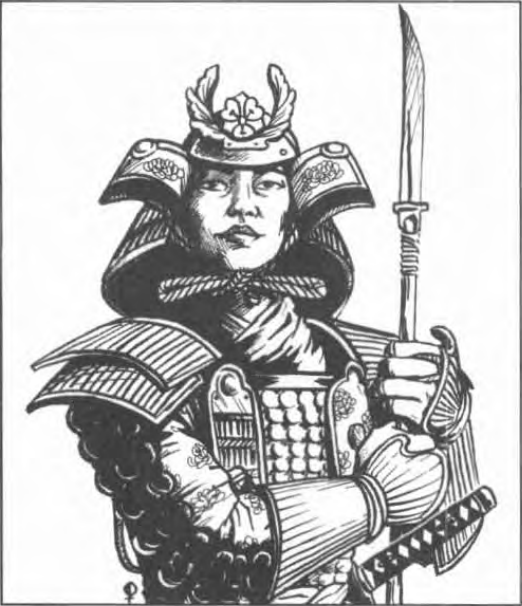
"I am the generic-est!"
Seppun Ishikawa was the firstborn son of an influential Imperial retainer, and studied at the Kakita academy after demonstrating skill in martial arts. Though he was accepted due to favors owed to his father he quickly distinguished himself honestly, demonstrating both real skill and tactical intellect. He was offered a position in the Imperial Guard after returning, and though taking the post meant the removal of his family name (a practice instituted in the Guard to prevent rivalries between samurai of different Clans) he quickly accepted. His ability caught the eye of Doji Satsume and he served as Emerald Magistrate for several years, but he was missed in the Guard and returned to become its Captain. He fulfills his duty to the Imperial family, cares deeply for them and would not hesitate to lay his life down for theirs. Otherwise, he is unremarkable and only slightly taller than other people in the Guard, but those who look beyond appearances sense great strength in him. Seppun Miharu 4, good stats and a Great Destiny, also has Suzume Mukashino as an Ally. Soft Hearted, though.
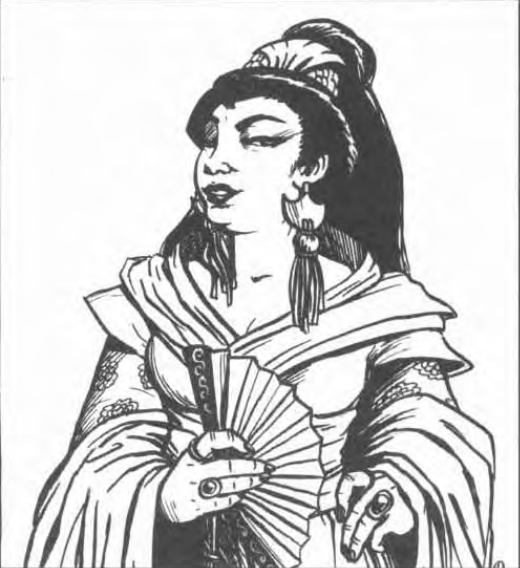
I mean, you have to be a Scorpion to get away with showing cleavage.
Seppun Kossori was the only daughter to a powerful Seppun and grew up spoiled and treated to every desire. (Another one? Welp.) When she was six, she was asked what she wanted, and she said she wanted to marry a Doji man. Her parents agreed to send her to the Doji school to teach her what they were made of and hoping she would learn to be a lady there, but it was the worst possible decision - with the Doji she learned to get what she wanted and soon she was prying favors from everyone she could. She soon figured out that her charms worked better on men than women, and many mornings she woke up next to a samurai that had offered her his favor or a precious stone he had reserved for his own wife. As an adult, she has developed a taste for sake, especially the stronger shochu, which has reduced what inhibitions she possesses; many times she'll claim not to remember what she has done. She tried to seduce Bayushi Akeu while drunk, and he's had this knowledge hanging over her since. She's not very bright, and though she has cut down on her drinking she still gets herself into dangerous situations. Doji Courtier 3, four points or so short of Insight. Bad Reputation (Tease) and Compulsion (Sake), also Frail Mind which... I can't find anywhere? Uh. Lots of points into Gentry and Wealth, though! Also two points in Seduction, a Low skill that she should not have and that will get her into lots of hot water if revealed publicly.
Doji Masekari's mother died when she was very young to a wasting disease called ogugai. She spent her childhood learning from a loyal servant of the family, and she had perfect manners at the age of eight, when she was also told she would marry a man called Doji Shogo. Some thought she would reach her gempukku sooner than most, but her sensei disagreed and just as she was about to graduate she was told she would have to wait two years more. She grew sullen and despondent and spent most of her two years in seclusion, while her father worried that she would succumb to the ogugai. When she finally underwent her gempukku and got married, her new husband managed to shake her off her stupor and made her smile once more. Their marriage was blessed with good fortune, and two years later she bore him their first son, Ogugu. Many speak highly of Masekari's charmed life, but the strong morals she learned from her father keep her from falling into decadence. Not all is happiness, though: Shogo was called to the Kaiu Wall due to his skills and station with the Court, and word on him has been scarce lately. A Scorpion called Bayushi Akeu has started to hang out with her, and he implies he knows more about her husband than he should, and those conversations leave her distracted and confused. Rumors grow around her, and some say that Shogo is dead, and while she doesn't like Akeu his attention seems genuine... Seppun Courtier 2 (just Doji Courtier with a different name), with a Kharmic Tie to her mother (wait, how does that work if she's dead?) and a True Friend in Doji Shogo, also True Love!
Doji Shogo was born to a great courtier, Doji Tobuzu, who wanted his son to wield the blade as a Kakita. Even before Shogo could walk his father got him into the Kakita Academy, and vowed to get him a Seppun bride. The negotiations lasted several days, and involved getting two Doji brides in return for the Seppun, and to have Shogo's firstborn daughter offered in marriage to the Scorpion. Young Shogo excelled at his studies and he underwent his gempukku at the age of 15, when he was presented with a Kakita blade and news of his future wife, Seppun Masekari. His status as a bushi grew in the meanwhile, but he later learned that her gempukku would be delayed, a great shame for the Seppun family. Shogo did not wish to bring further shame upon his future in-laws and used the two years to train himself further in the arts, and when the wedding finally happened he presented a great painting made by himself to his new father in law. The wedding went swimmingly, and though Masekari acted cold at first he got her smiling before the evening was done. Masekari bore him first a son, and then a daughter, and though Shogo never let emotion show in his face he knew he had to give her to the Scorpions in time. When his own sister was to marry Bayushi Akeu he went to their wedding, while Masekari stayed back after getting sick. Shogo drank a little too much and ended in the arms of a pretty Scorpion lady, and he woke up next morning to Bayushi Akeu chiding him for his "dishonorable behavior" with the Scorpion's sister. Shogo was completely dismayed by his conduct but Akeu said he would cover up for him. Funnily enough, on the way back it was clear to him than more than one day had passed.
 That was two years back: now, Akeu asked him to go to a small village in Crab lands, escorted by a friend of Akeu's, where he'll learn the final favor the Scorpion wants of him. Kakita Bushi 2, on the level with insight. Pretty good duelist, an Imperial Spouse in Seppun Masekari, and an Obligation to Bayushi Akeu
That was two years back: now, Akeu asked him to go to a small village in Crab lands, escorted by a friend of Akeu's, where he'll learn the final favor the Scorpion wants of him. Kakita Bushi 2, on the level with insight. Pretty good duelist, an Imperial Spouse in Seppun Masekari, and an Obligation to Bayushi Akeu

Bayushi Akeu was born a Soshi, but at the age of eight he stood before a Bayushi samurai and told him with reverence that he wanted to serve his family. The young samurai, Bayushi Aramoro, was impressed by the boy: he took him in and convinced his parents that he would serve the Clan better as a Bayushi. Akeu joined the Bayushi courtier school and developed his skills as a speaker. He was (and is) a small man and has never really gotten over it, always wearing clothes that make him look larger than he is. He is smart, though, and has amassed a number of favors. Doji Shogo is the kind of man he likes to toy with. He has been invited to the Winter Court, a shock considering how young he is, but his family has noted his rise and his recent marriage to a Doji lady. Only time will tell how Akeu will end up. Presently, he spends most of his time with the beautiful Doji Masekari. Bayushi Courtier 2 with Rank 1 Insight, with Blackmail on Doji Shogo. Incidentally, there's a plot seed regarding the whole mess with Shogo, Akeu and Masekari: basically, the PCs can be asked to look into Shogo's disappearance by Masekari's handmaid, and if they follow the hints in the court (which might entail passing an Intelligence + History roll at 40, because fuck actually understanding your system's odds) they'll end up learning from Akeu that he wanted to embarrass Shogo in an "elaborate, harmless prank" that involved the Crab Clan recruiting peasants from their villages. As it turned out, Shogo joined a Crab garrison and is now holed up in a fortress besieged by Shadowlands goblins, and the PCs will have to hurry to save him while Akeu continues to court Masekari.
Suzume Mukashino is aged and wise. With age and wisdom come a new understanding of time, and patience; with time and patience comes a plateau of understanding and wisdom. With wisdom and understanding comes comprehension of order in the universe. With order, comes perfection. With perfection, comes eternity. Which basically is a long way to say that Mukashino is an old codger with some very long stories to tell. He is a pariah in the courts to those that see him coming and a revered samurai to those ambushed by his stories. And yet, somehow, a Scorpion invitation for the Winter Court never fails to appear in his hands. Each year, both bushi and courtiers alike shudder at seeing him arrive. His favorite tactic is finding a samurai of high rank alone and start telling a simple story that somehow ends up encompassing every detail of Rokugani culture, and it's considered a great dishonor to one's self and to Mukashino to ignore him or leave him while he's still telling his story. Suzume Bushi 3 but we'll have to wait until Way of the Minor Clans to find out what that does. He also has Stealth 1 because his footsteps are naturally quiet. He doesn't actually try to hide his movement, he's just really good at finding his way next to a samurai. My favorite NPC in this damn book.
There's only two ancestors in this book. Shiba Murayasu was born to a wealthy Otomo mother and a Phoenix father. He was brilliant in his training as a bushi, and soon ended up as a junior sensei, and made full sensei at the young age of 26. When Hantei XVI met a tragic end, his son (a childhood friend of Murayasu) took up the throne as Hantei XVII, and requested him to come back to train at the Seppun dojo. Thus he became sensei to one of the few ruling Hantei to be trained outside of the Kakita Academy. In fact, Hantei XVII fell in love with one of Murayasu's cousins even though he was married to a Doji, and broke tradition again by being buried in Phoenix lands after his death. For 9 points, characters with Murayasu as their ancestor reduce their TN to hit any character that has attacked them in the previous round by 5, and declare their actions last no matter how initiative is rolled (though the actions still play out in initiative order) However, they never gain more than one extra die from declaring Full Attacks. Seppun was Seppun, and for 4 points a character that leads troops to defend the Emperor forces their opponent (human) generals to cap their Battle skill by their Honor. Neat!
Whispers and rumors! Bayushi Kachiko and Doji Hoturi had an affair that lasted well into the first year of her marriage, but she suddenly refused to deal with him. Less than a year later, she bore Shoju a son, and though she has been pregnant since she's had no other kids. Their son, Bayushi Dairu, is nearly twelve years old now, skilled with a sword and with beautiful blue eyes. Bayushi Shoju and Yogo Junzo, meanwhile, aren't attending this Winter Court due to that funny business involving excavations in the Bayushi labyrinth. Daidoji Uji is attending the Emperor's court to demonstrate the techniques of his house, and he is bringing in a gaijin sai-bore as a curiosity. Learning gaijin techniques is forbidden and he'll not demonstrate its use, but it's still interesting as an object of art. He's also achieved School Rank 5 and a Fire of 3, and gotten one point in Subojutsu. Togashi Mitsu is in a pilgrimage through the courts of each Clan, and his latest stunt involves learning how to act (Acting 2). Some say that he is traveling with a tall, swarthy man, that seems very familiar with the practices of the Dragon even though he has no tattoos or armor. Shiba Ujimitsu has a secret: back when his wife had to kill herself (because her father was discovered as a traitor and the Emperor had demanded the removal of his whole line), his daughter, Saija, cursed the Emperor openly in front of the court. Then, all the voices that are always with the Phoenix Champion talked to him and said that if he really, really loved his daughter, and was willing to give up his life not once but twice and cut her head off now, they would save her. He did as they demanded; the next thing he remembers is being with a Phoenix vassal profoundly thanking him for saving his daughter's life, in a palace days away from Otosan Uchi. He looked down at the man's daughter, a baby, and he saw Saija's eyes on hers. Since then, Ujimitsu has never been as strong as he used to be, which is why his Strength is only 3 though his Water Ring is 5. As for the daughter, she would grow up to be Shiba Tsukune.
 She doesn't remember anything of Saija's life and only knows that when she sees her Champion sometimes she feels a strange sense of love and pride, and she might never know the reason. Isawa Uona is also in court, as her mentor and Master of Air has recently passed away and her formal induction in the Elemental Council will take place this winter. And there's an unknown Lion as well, an angry Lion that rages at the Matsu strictures and only cares about his duty as a soldier in the field. His name is Matsu Gohei!
She doesn't remember anything of Saija's life and only knows that when she sees her Champion sometimes she feels a strange sense of love and pride, and she might never know the reason. Isawa Uona is also in court, as her mentor and Master of Air has recently passed away and her formal induction in the Elemental Council will take place this winter. And there's an unknown Lion as well, an angry Lion that rages at the Matsu strictures and only cares about his duty as a soldier in the field. His name is Matsu Gohei!
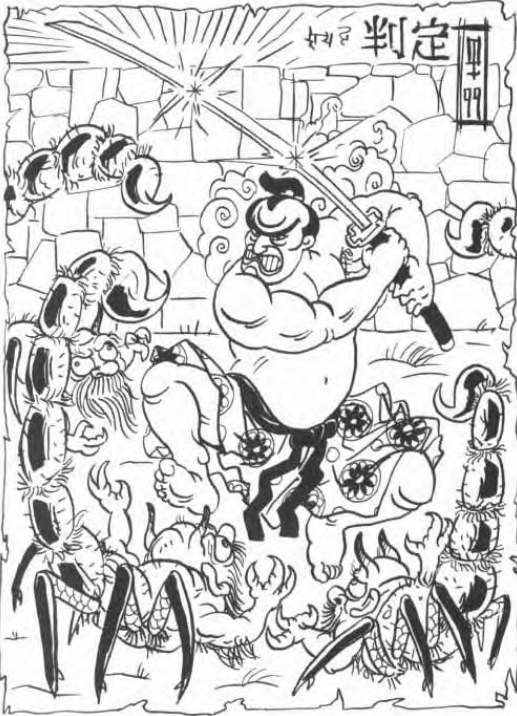
Hantei V was the
 est
est
Imperial Nemuranai! The most precious magic objects in the Empire are the relics of the Hantei. The Ancestral Sword of the Hantei was forged by Doji Yasurugi. It is a huge no-dachi, the blade of which had grown golden since its creation. Legend says that the fifth Hantei carried into battle against the Shadowlands, helping a Crab Clan weakened by Lion and Crane predations stem off the tide. The Emperor fought the vile hordes in person, saved the Crab and returned to punish the offending Clans harshly. Akkuai-uo, as it is also known, is a no-dachi that bursts into a dark flame when wielded by a Seppun, Otomo or Hantei and strikes as if the wielder had a Strength of 6, and doubles its damage against any creature that does not offer fealty to the Emperor of Rokugan or otherwise breaks the Celestial Order. The Mirror of Seppun stays in a shrine in Miya lands and isn't in the Emperor's possession.The Miya family has as duty guarding it, and it's said to be a gift from Amaterasu to Seppun to remind the mortal world that the sun's light will never be far. When an Emperor is enthroned the Miya bring the mirror for the ceremony and officially give it to the Emperor, who must always then give it back at the end. No rules though. The Rock of the Kami rests in a small shrine in Doji lands carefully tended by Asahina shugenja. It is small, not more than three feet in diameter, and legend marks it as the place where the Kami first touched the Earth. I guess the Kami must've been really close for that!
 No rules for this one, either.
No rules for this one, either.
Finally, we get some notes on how to use courtly skills in game, giving them an extra oomph. Calligraphy includes the ability to write beautifully, and so PCs with high Calligraphy will have an easier time getting permissions to see other people because their request will look pretty. Etiquette can also be used with people of lesser station to treat them appropriately without going overboard with politeness. Medicine includes basic first-aid as well as the ability to determine when people are sick or suffer some other condition like insanity or the effects of drugs. Meditation can be used to gain insight into problems or to keep cool when under emotional stress. Theology covers knowledge of the Fortunes, both great and small, and the locations of their shrines, while Shintao covers knowledge of the Tao, the Celestial Order, some knowledge of the Code of Bushido and can even be used as Etiquette when dealing with monks. Manipulation can be used defensively with an Awareness + Manipulation roll at TN (5 x target's Manipulation) to tell when a target is trying to manipulate someone. And that's it!
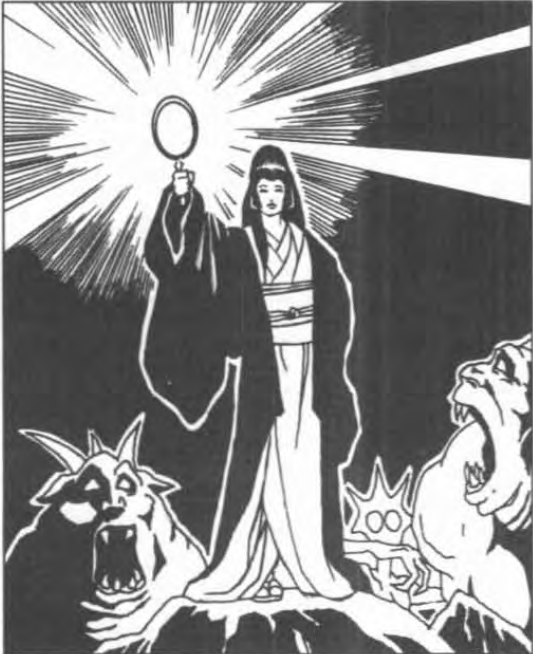
OH SHIT WE'RE REALLY FUCKING UGLY
Next: uh, let me get my list!